
Publication of TriQuarterly is made possible in part by the donors of gifts and grants to the magazine. For their recent and continuing support, we are very pleased to thank the Illinois Arts Council, the Lannan Foundation, the John D. and Catherine T. MacArthur Foundation, the National Endowment for the Arts, the Sara Lee Foundation, the Wendling Foundation, and individ ual donors.
TriQuarterly also thanks the following recent donors and life sub scribers:
Simon J. Blattner, Jr.
Louise Blosten
Paul Brownfield
Robert Creamer
Eleanore Devine
W. S. Di Piero
John B. Elliott
Mr. and Mrs. H. Bernard Firestone
C. Dwight Foster
Amy Godine
Jay Harkey
Mr. and Mrs. David C. Hilliard
Irwin T. Holtzman
Helen Jacob
Loy E. Knapp
Greg Kuzma
Patrick Mangan
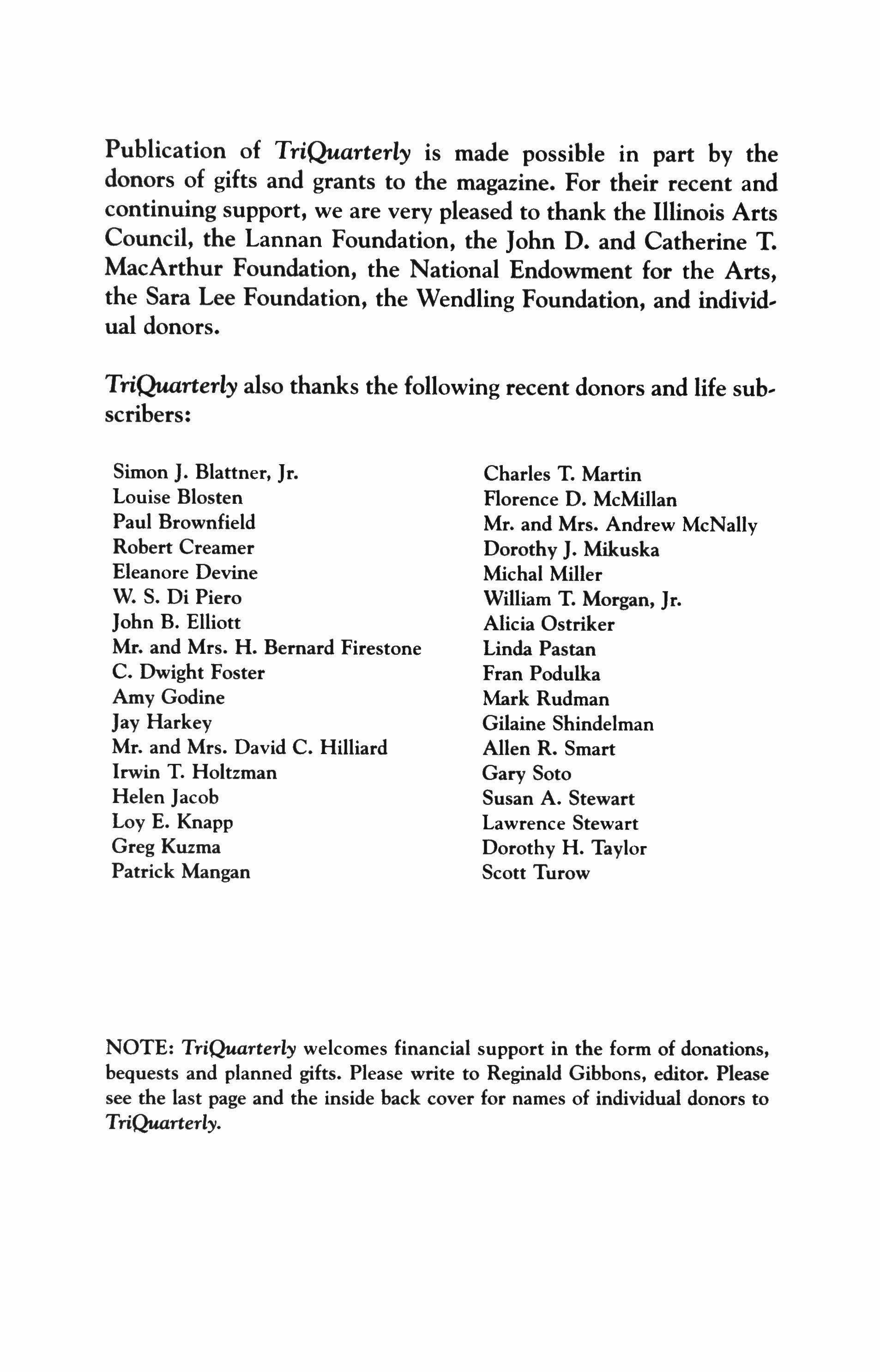
Charles T. Martin
Florence D. McMillan
Mr. and Mrs. Andrew McNally
Dorothy J. Mikuska
Michal Miller
William T. Morgan, Jr.
Alicia Ostriker
Linda Pastan
Fran Podulka
Mark Rudman
Gilaine Shindelman
Allen R. Smart
Gary Soto
Susan A. Stewart
Lawrence Stewart
Dorothy H. Taylor
Scott Turow
NOTE: TriQuarterly welcomes financial support in the form of donations, bequests and planned gifts. Please write to Reginald Gibbons, editor. Please see the last page and the inside back cover for names of individual donors to TriQuarterly.
TriC02Q1J@uQce[J�)f95
Editor Reginald Gibbons
Managing Editor
Kirstie Felland

Executive Editor Bob Perlongo
Special Projects Editor Fred Shafer
Reader
Christopher Carr
Advisory Editors
Winter 1995/96
Co-Editor Susan Hahn
Assistant Editor Gwenan Wilbur
Design Director Gini Kondziolka
TriQuarterly Fellow James Lang
Editorial Assistants
Deanna Kreisel, Hans Holsen, Kemba Johnson, Jacob Herrell, Dylan Rice
Hugo Achugar, Michael Anania, Stanislaw Baranczak, Cyrus Colter, Rita Dove, Richard Ford, George Garrett, Michael S. Harper, Bill Henderson, Maxine Kumin, Grace Paley, John Peck, Michael Ryan, Alan Shapiro, Ellen Bryant Voigt
TRIQUARTERLY IS AN INTERNATIONAL JOURNAL OF WRITING, ART AND CULTURAL INQUIRY PUBLISHED AT NORTHWESTERN UNIVERSITY.
Subscription rates (three issues a year) - Individuals: one year $24; two years $44; life $600. Institutions: one year $36; two years $68. Foreign subscriptions $5 per year additional. Price of back issues varies. Sample copies $5. Correspondence and subscriptions should be addressed to TriQuarterly, NORTHWESTERN UNIVERSITY, 2020 Ridge Avenue, Evanston, IL 60208. Phone: (708) 491-7614. The editors invite submissions offiction, poetry and literary essays, which must be postmarked between October 1 and March 31; manuscripts postmarked between April 1 and September 30 will not be read. No manuscripts will be returned unless accompanied by a stamped, self-addressed envelope. All manuscripts accepted for publication become the property of TriQuarterly, unless otherwise indicated. Copyright © 1996 by TriQuarterly. No part of this volume may be reproduced in any manner without written permission. The views expressed in this magazine are to be attributed to the writers, not the editors or sponsors. Printed in the United States of America by Thomson-Shore; typeset by TriQuarterly. ISSN: 0041-3097.
National distributors to retail trade: Ingram Periodicals (La Vergne, TN); B. DeBoer (Nutley, NJ) Bookpeople (Berkeley, CA); Ubiquity (Brooklyn, NY); Armadillo (Los Angeles, CA); Fine Print (Austin, TX).
Reprints of issues #1-15 of TriQuarterly are available in full format from Kraus Reprint Company, Route 100, Millwood, NY 10546, and all issues in microfilm from University Microfilms International, 300 North Zeeb Road, Ann Arbor, MI 48106. TriQuarterly is indexed in the Humanities Index (H.W.Wilson Co.), the American Humanities Index (Whitson Publishing Co.), Historical Abstracts, MLA, EBSCO Publishing (Peabody, MA) and Information Access Co. (Foster City, CA).
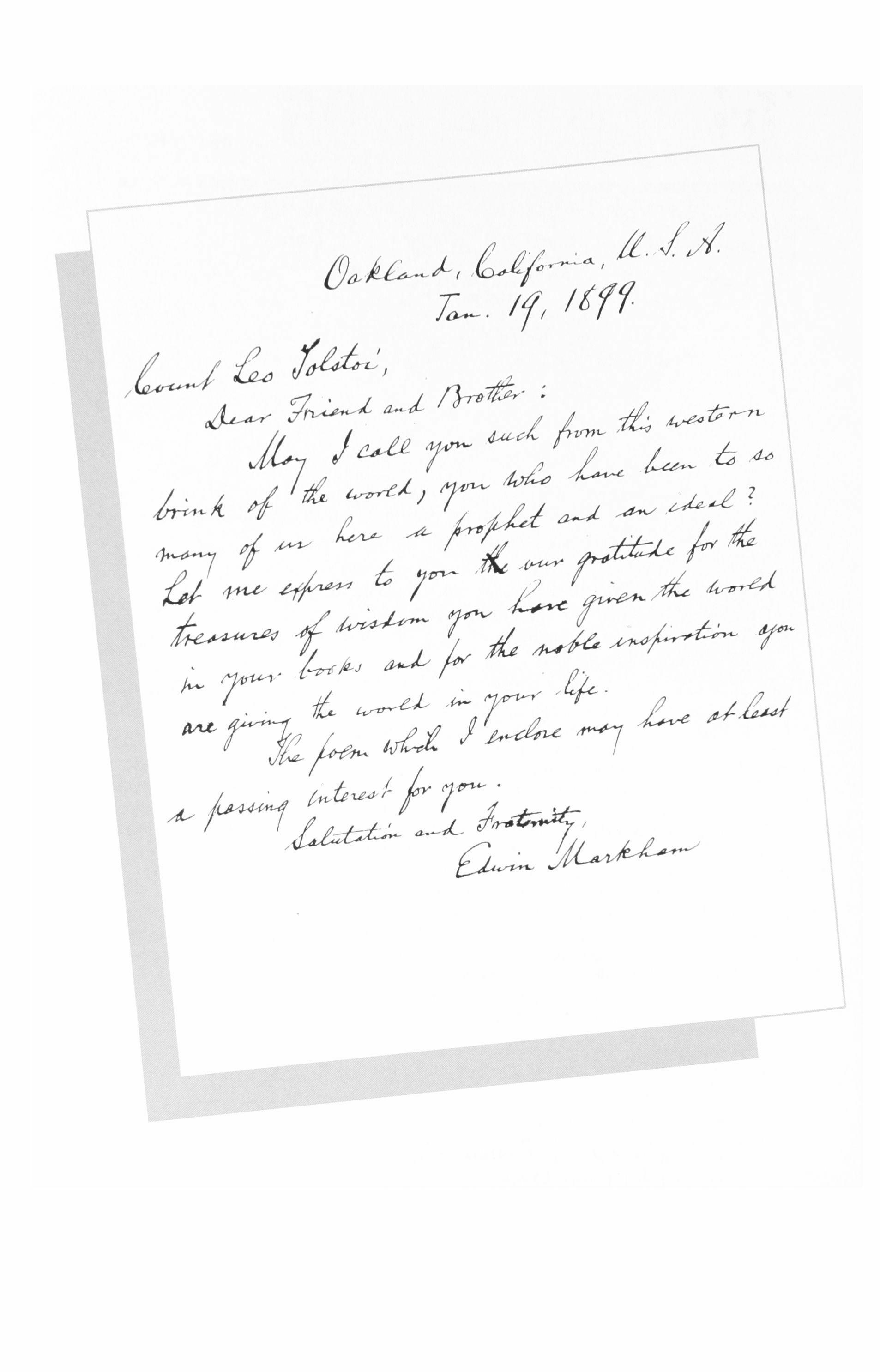

issue: Susan Hahn
Contents
this
ARTICLE Tolstoy's American Mailbag: Selected Exchanges with His Occasional Correspondents •...•...•••••..••.••. 7 Robert Whittaker DISCOURSE A Conversation with Philip Levine 67 ESSAY From Translation ..••......•...............................••.. 249 Robert von Hallberg FICTION On with the Story ..•.....•............•...................••••.. 49 John Barth Courting a Monk 101 Katherine Min Lovesong...•................••..............•.................•.... 114 Lynn Marie Sadness of the Body 191 Jason Brown Marsena Sportsman's Club 219 Joyce Carol Oates 3
Editor of
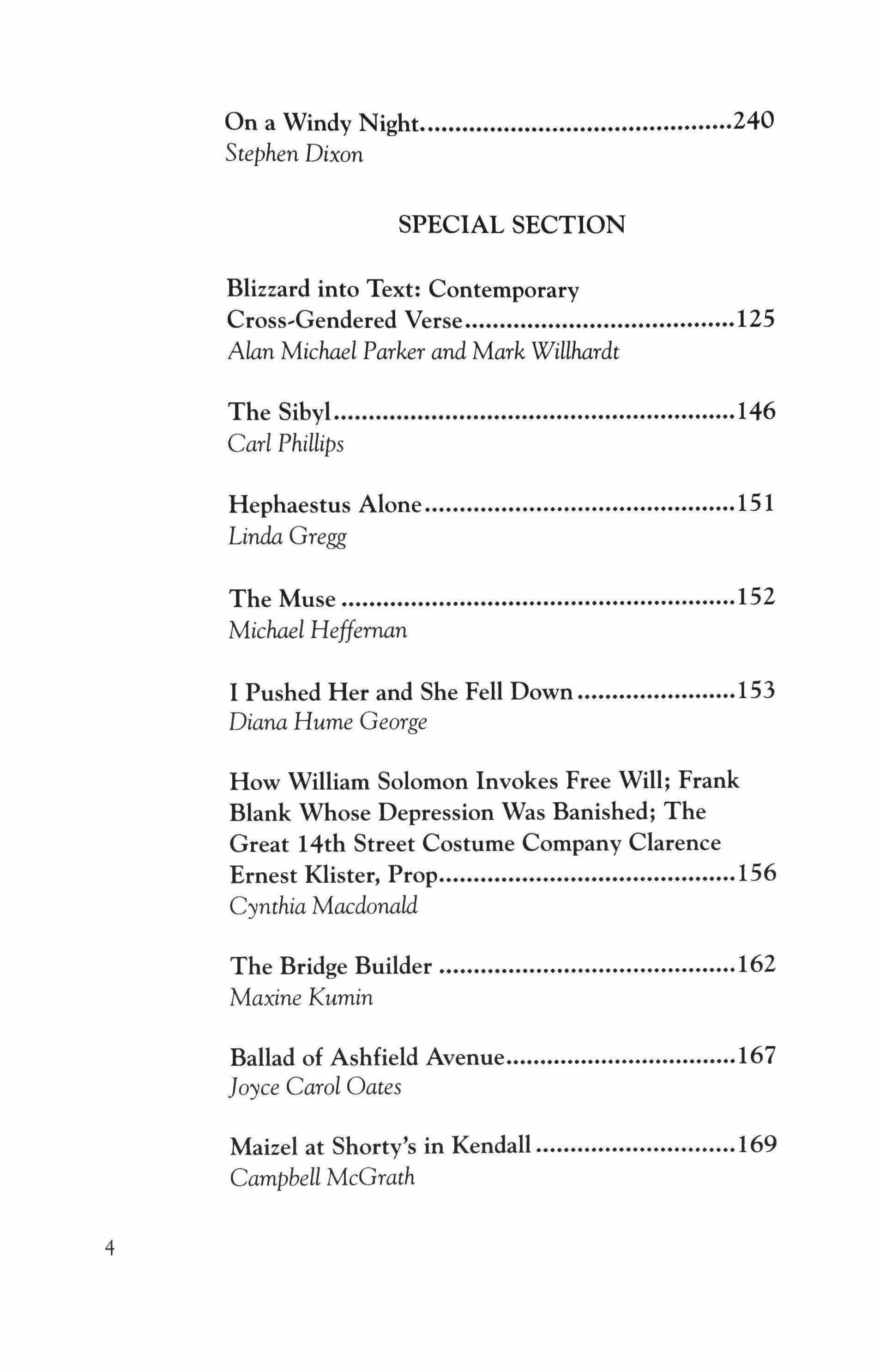
On a Windy Night•........•..•............••.......•......••.. 240 Stephen Dixon SPECIAL SECTION Blizzard into Text: Contemporary Cross Gendered Verse .•••••..••••••••.............••.•••..•. 125 Alan Michael Parker and Mark Willhardt The Sibyl 146 Carl Phillips Hephaestus Alone 151 Linda Gregg The Muse 152 Michael Heffernan I Pushed Her and She Fell Down 153 Diana Hume George How William Solomon Invokes Free Will; Frank Blank Whose Depression Was Banished; The Great 14th Street Costume Company Clarence Ernest Klister, Prop 156 Cynthia Macdonald The Bridge Builder 162 Maxine Kumin Ballad of Ashfield Avenue 167 ]oyce Carol Oates Maizel at Shorty's in Kendall 169 Campbell McGrath 4
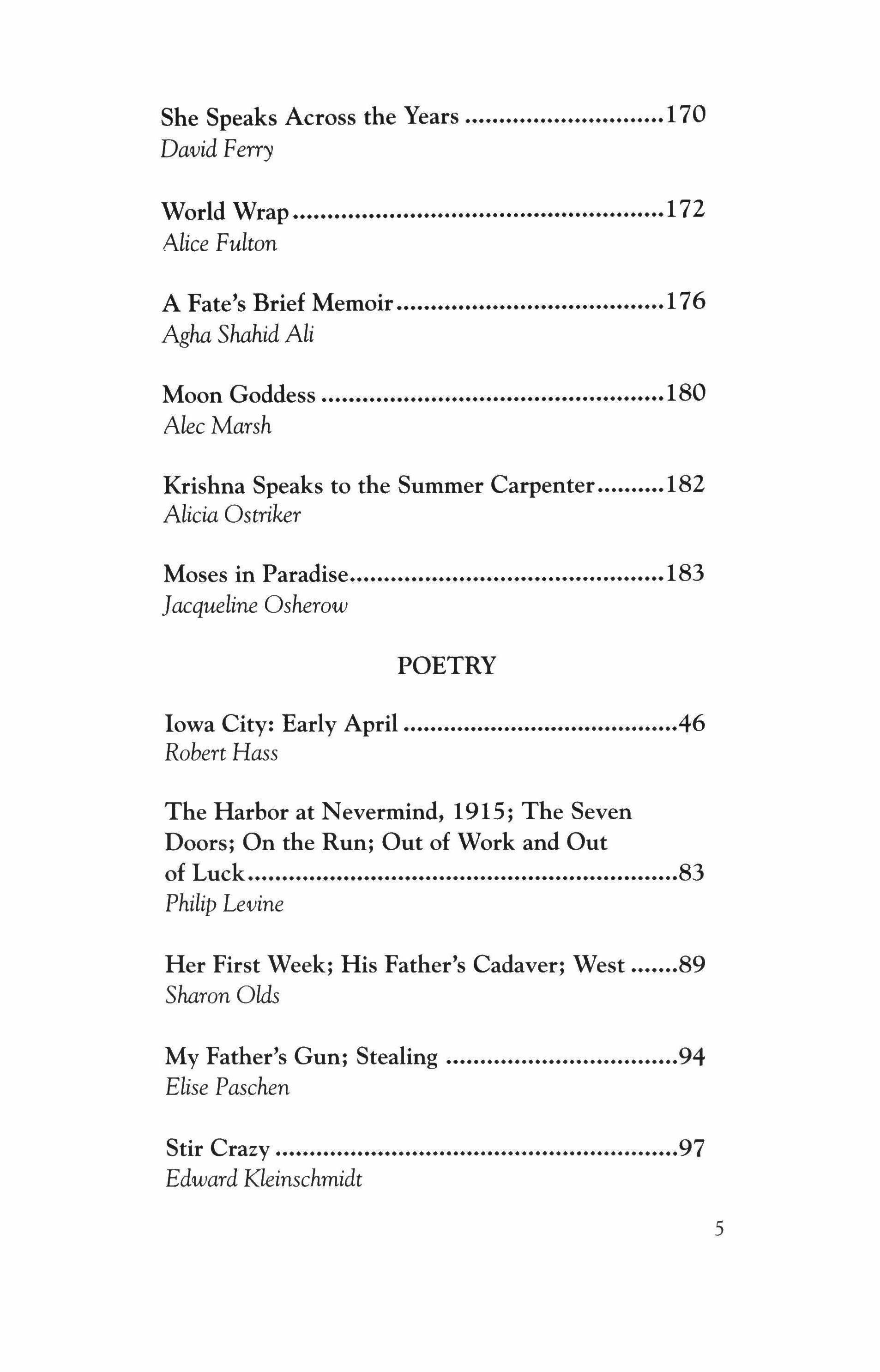
She Speaks Across the Years ..•...•...................... 170 David Ferry World Wrap 172 Alice Fulton A Fate's Brief Memoir 1 76 Agha Shahid Ali Moon Goddess 180 Alec Marsh Krishna Speaks to the Summer Carpenter .•.••..... 182 Alicia Ostriker Moses in Paradise .............................................• 183 Jacqueline Osherow POETRY Iowa City: Early April 46 Robert Hass The Harbor at Nevermind, 1915; The Seven Doors; On the Run; Out of Work and Out of Luck •..•••....•.............................•...................... 83 Philip Levine Her First Week; His Father's Cadaver; West 89 Sharon Olds My Father's Gun; Stealing 94 Elise Paschen Stir Crazy 97 Edward Kleinschmidt 5

Cover illustration courtesy of Special Collections, Vassar College. Cover design by Gini Kondziolka. Letters on pages 2 and 45 courtesy ofL. N. Tolstoy Museum, Moscow. Photographs throughout issue by Arthur W. Schaefer.
The Sex 99 Billy Collins No Sorry 200 Catherine Bowman Evidence of Bear; The Day I Take Her to the Hospital 202 David Breskin Revelation 207 Richard Chess Ragtime 209 David Zivan First Death; Around the World; First Language 211 Ann Townsend The Widow 215 Alan Michael Parker
Figure; Speech
Oracle;
223
Wojahn In the saliva / in the paper 276 Frida Kahlo Translatedfrom the Spanish by Robert Hass CONTRIBUTORS 277
Rajah in Babylon; After Wittgenstein; Hey, Joe; Allegorical
Grille;
Dirge and Descent
David
6
Tolstoy's American Mailbag: Selected Exchanges with His Occasional Correspondents
Robert Whittaker

Americans read Leo Tolstoy's writings, embraced his ideas, and in their enthusiasm wrote him letters. His philosophical, political and religious writings affected his American readers more than his fiction and elicited by far the greater response. In 1885 the publication of Tolstoy's My Religion ushered in what one historian has called the "Russian craze" in Arnerica.! For the next twenty-five years, until his death in 1910, Tolstoy's words and works were published with increasing frequency, making him one of the most influential essayists and thinkers for Americans who believed in social, political and religious reform. His fie-
This publication presents material resulting from the joint U.s.-Russian project "Tolstoy and His U.S. Correspondents," begun in 1986 under the auspices of the International Research and Exchanges Board, the Association of Learned Societies, and the Academy of Sciences of the U.S.s.R. After 1991, support for this project was taken over by the Russian Academy of Sciences, and it continues to be sponsored by the Gorky Institute of World Literature in Moscow. The project has received major and essential institutional support from the Tolstoy State Museum in Moscow, especially the staff of its Manuscript Division. Activities of the project in the U.S. have greatly benefited from the support of the staff of the Slavonic and Baltic Division of the Research Libraries of the New York Public Library. The director of the project for the Russian side is Dr. L. D. Gromova, the chief editor is N. P. Velikanova; the activities of the American side are coordinated by the author of this publication, who expresses his gratitude to the staff of the Tolstoy State Museum and its Manuscript Division for assistance in this research and for permission to publish from these letters of Americans and Tolstoy.
TRIQUARTERLY
7

tion written during this period, especially The Kreutzer Sonata and Resurrection, promulgated Tolstoy's radical moral and religious views and enjoyed a succes de scandal or d'estime, depending on the audience. (Tolstoy's fiction before 1881, especially his novels Anna Karenina and War and Peace, regularly attracted the attention of reviewers, but evoked significantly less response from American letter writers.)
Caught up with the moral and religious message of Tolstoy, Americans wrote him over 1,700 letters.2 (This number, given Russian government censorship, is probably less than the number of letters sent and does not include hundreds of books, pamphlets and other publica, tions received from the U.S.) These American correspondents provide a fresh indication of who was reading Tolstoy and how these average read, ers reacted to his works. Surprisingly, there are very few letters from leading American political, social or intellectual figures. The only politician of national reputation to write was William Jennings Bryan; the most prominent social activists to contact him were Henry George, Frances E. Willard (head of the Women's Christian Temperance Union), Clara Barton and Jane Addams (who visited him but did not write); and among writers and poets, only Edward Markham. Who then comprised his American correspondents? A remarkably various collection of men and women who shared Tolstoy's concern for "true" Christianity and the teachings of Christ, for nonviolence and nonresistance, for social justice, for abstinence from meat, alcohol, political activity and sexual relations, for land reform and the single tax, for free' dom from government interference and coercion. Their reasons for writ, ing were equally varied: to share religious and moral views inspired by his works; to ask for interpretations of his writings; to receive his reactions to their own writings; to share views of other writers; to explain their own similar ideas; to receive his advice on troubling questions; and even simply to get Tolstoy's autograph.
Tolstoy responded to this flood of American letters as best he could. He or his daughters, wife and assistants (at his direction and on his behalf) wrote several hundred answers, almost all in English. Records indicate over three hundred responses; however, only half of these let' ters have been found) Tolstoy responded to all sorts, ignoring no type of letter except the frivolous. Still, he could manage to answer only one out of every five or six he received. Almost all exchanges were limited to a single response to a single letter. Rarely (in only fifteen or so cases) did he write more than a letter or two to the same correspon-dent+ In these brief exchanges Tolstoy wrote to over a hundred different individ-
TRIQUARTERLY
8
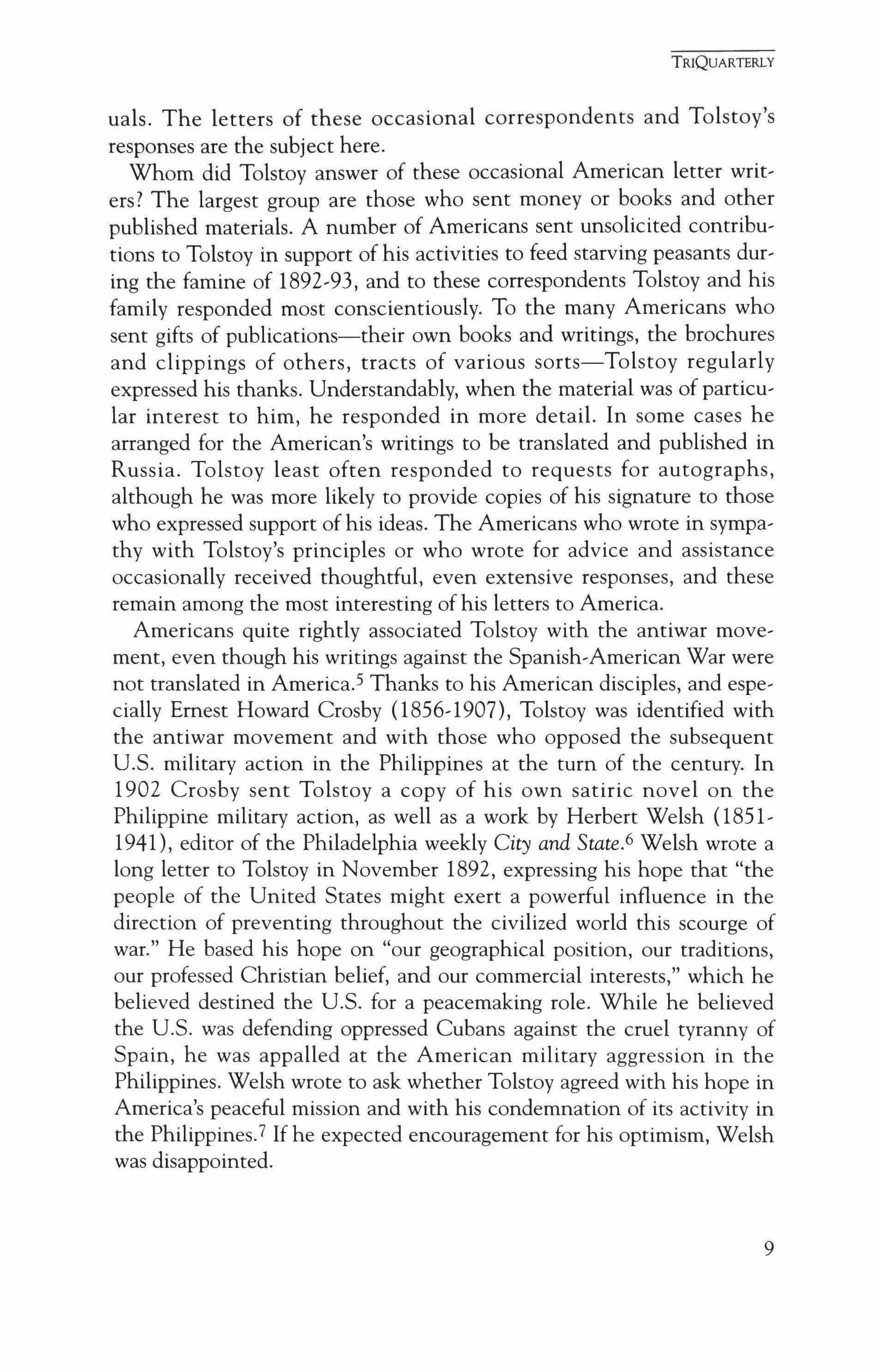
uals. The letters of these occasional correspondents and Tolstoy's responses are the subject here.
Whom did Tolstoy answer of these occasional American letter writ, ers? The largest group are those who sent money or books and other published materials. A number of Americans sent unsolicited contributions to Tolstoy in support of his activities to feed starving peasants during the famine of 1892,93, and to these correspondents Tolstoy and his family responded most conscientiously. To the many Americans who sent gifts of publications-their own books and writings, the brochures and clippings of others, tracts of various sorts-Tolstoy regularly expressed his thanks. Understandably, when the material was of particular interest to him, he responded in more detail. In some cases he arranged for the American's writings to be translated and published in Russia. Tolstoy least often responded to requests for autographs, although he was more likely to provide copies of his signature to those who expressed support of his ideas. The Americans who wrote in syrnpathy with Tolstoy's principles or who wrote for advice and assistance occasionally received thoughtful, even extensive responses, and these remain among the most interesting of his letters to America.
Americans quite rightly associated Tolstoy with the antiwar move, ment, even though his writings against the Spanish-American War were not translated in Arnerica.l Thanks to his American disciples, and especially Ernest Howard Crosby (1856,1907), Tolstoy was identified with the antiwar movement and with those who opposed the subsequent U.S. military action in the Philippines at the turn of the century. In 1902 Crosby sent Tolstoy a copy of his own satiric novel on the Philippine military action, as well as a work by Herbert Welsh (1851, 1941), editor of the Philadelphia weekly City and State.6 Welsh wrote a long letter to Tolstoy in November 1892, expressing his hope that "the people of the United States might exert a powerful influence in the direction of preventing throughout the civilized world this scourge of war." He based his hope on "our geographical position, our traditions, our professed Christian belief, and our commercial interests," which he believed destined the U.S. for a peacemaking role. While he believed the U.S. was defending oppressed Cubans against the cruel tyranny of Spain, he was appalled at the American military aggression in the Philippines. Welsh wrote to ask whether Tolstoy agreed with his hope in America's peaceful mission and with his condemnation of its activity in the Philippines." If he expected encouragement for his optimism, Welsh was disappointed.
TRIQUARTERLY
9
On December 15 Tolstoy responded with his views on the Philippine military action:
Dear Sir,
I received your letter, book and pamphlets.
I can not help to admire your activity, but the crimes which have been committed in the Philippines are special cases, which by my opinion, will always occur in states governed by violence or in which violence is admitted as necessary and lawful.
Violence, which in itself is a crime, can not be used to a certain extent. When it is admitted it will always transgress the limits which we would put to it. Deeds as those that have been done in the Philippines, in China and are daily done in all pseudochristian states will continue till humanity will accept violence as a means to produce good results and will not accept the chief precepts of Christianity-to act on our brethren not as on animals by violence, but by sweet reasonableness (as Matthew Arnold termed it) which is the only way to act thoroughly and durably on reasonable beings.
Hoping that my bad English will not hinder you to understand what I mean to say, I remain, dear Sir, yours truly
15 Dec. 1902.8

Leo Tolstoy.
Tolstoy's position leaves no hope that any government, even the U.S., can avoid atrocities of the sort Welsh deplored. What to the American seemed the exception, to Tolstoy was the rule. His uncompromising positions would often surprise and disappoint his American correspondents, and this pattern recurred not only in discussions of politics, but also in matters of religious faith and morality.
Tolstoy's writings against war and violence were widely read and appreciated by American pacifists and frequently republished. My Confession, which defined Tolstoy's philosophical stance against violence, especially in nonresistance to evil, was reissued in 1904; his attack on the Russian government and the Russo-japanese War"Bethink Yourselves!"-appeared in various periodicals and was issued in separate editions throughout the United States.? Tolstoy received many letters from American pacifists, not all as sophisticated as that from Welsh, but no less impassioned. At times these letters suggest complete agreement with the most extreme positions of Tolstoy. For example, on July 31, 1904, a certain J. H. Reeve wrote to Tolstoy from San Francisco, apparently in reaction to his recently published "Bethink Yourselves!":
TRIQUARTERLY
10
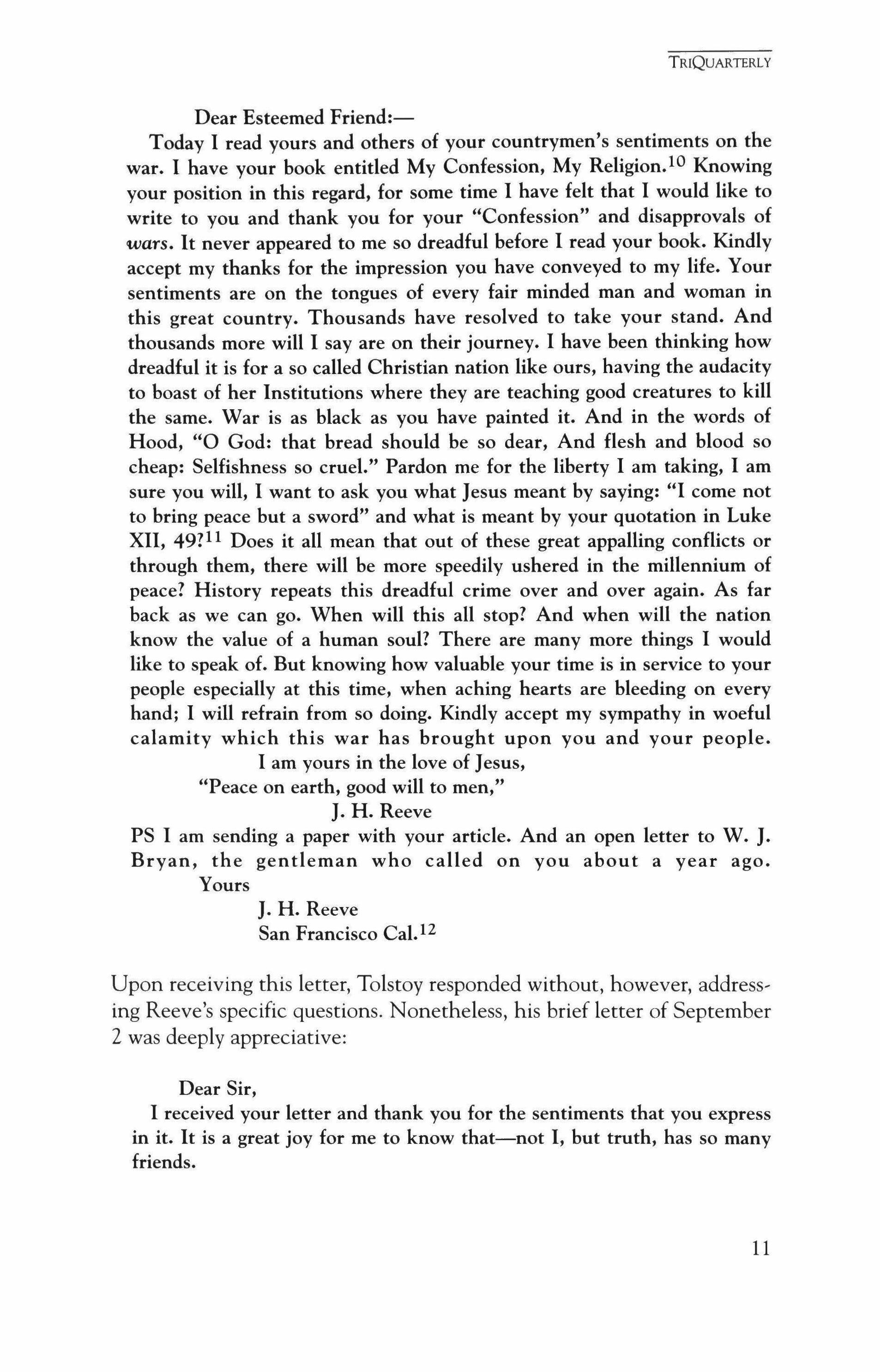
Dear Esteemed Friend:-
Today I read yours and others of your countrymen's sentiments on the war. I have your book entitled My Confession, My Religion.U' Knowing your position in this regard, for some time I have felt that I would like to write to you and thank you for your "Confession" and disapprovals of wars. It never appeared to me so dreadful before I read your book. Kindly accept my thanks for the impression you have conveyed to my life. Your sentiments are on the tongues of every fair minded man and woman in this great country. Thousands have resolved to take your stand. And thousands more will I say are on their journey. I have been thinking how dreadful it is for a so called Christian nation like ours, having the audacity to boast of her Institutions where they are teaching good creatures to kill the same. War is as black as you have painted it. And in the words of Hood, "0 God: that bread should be so dear, And flesh and blood so cheap: Selfishness so cruel." Pardon me for the liberty I am taking, I am sure you will, I want to ask you what Jesus meant by saying: "I come not to bring peace but a sword" and what is meant by your quotation in Luke XII, 49? 11 Does it all mean that out of these great appalling conflicts or through them, there will be more speedily ushered in the millennium of peace? History repeats this dreadful crime over and over again. As far back as we can go. When will this all stop? And when will the nation know the value of a human soul? There are many more things I would like to speak of. But knowing how valuable your time is in service to your people especially at this time, when aching hearts are bleeding on every hand; I will refrain from so doing. Kindly accept my sympathy in woeful calamity which this war has brought upon you and your people. I am yours in the love of Jesus, "Peace on earth, good will to men,"
J. H. Reeve
PS I am sending a paper with your article. And an open letter to W. J. Bryan, the gentleman who called on you about a year ago. Yours
J. H. Reeve
San Francisco Cal.12
Upon receiving this letter, Tolstoy responded without, however, addressing Reeve's specific questions. Nonetheless, his brief letter of September 2 was deeply appreciative:
Dear Sir, I received your letter and thank you for the sentiments that you express in it. It is a great joy for me to know that-not I, but truth, has so many friends.
TRIQUARTERLY
11
2.IX. 1904.13

Yours truly Leo Tolstoy.
Although Reeve did not acknowledge this response, he did not forget it. Four years later he wrote Tolstoy again, now on a more personal subject. On November 18,1908, he wrote:
Dear Sir:
With greetings and longevity in health and happiness yet to come. Are my sincere wishes. I have eagerly watched the papers through your sickness, am very glad to know that you are well again. Words cannot express the feeling and consolation there comes to one who have learned to love; (as St. Paul says) "One whom I have not seen I love." Your writings have been the greatest blessings to myself and friends. Our best wishes are upon you at all times. Pardon me for the request I am about to ask. I have a little girl. And I wish you would kindly consent to give her a name. I have given her one. And would very much like you to give her the second. The name I have given her is Calfrence, taking the first syllable of California and the last of San Francisco. I will forward you a photo of the baby. This request is my wife wishes and self. Trusting you will grant the same. Thanking you in advance for the name. If beyond this life there is a joy which passes all understanding I hope to meet you there. The truth is all I crave. Goodly the blessings of all there is remain upon you and yours. I remain your very sincerely
J. H. Reeve14
No record remains of a photograph of the child or of Tolstoy's response. Tolstoy's political philosophy went hand in hand with his religious views, no less than it did for his American sympathizers. They responded to his Christian anarchism and individual understanding of Christ's teachings just as enthusiastically as to his pacifism. One of the more interesting exchanges between Tolstoy and his American admirers is with a Christian sectarian from Belton, Texas, Mrs. Martha McWhirter. On August 28, 1891, she wrote to Tolstoy:
Dear Sir
Having heard of you and read some of your writings an anxiety has been awakened to hear somewhat of you personally.-We as a community of Christians, about thirty in number, have been for the last twenty years, holding the truth in our lives against great opposition. We, like thousands of others, belonged to the common sects, among us Presbyterians,
TRIQUARTERLY
12

Methodists, Baptists, etc.
When the spirit of Christ was given, with it was a light and understand, ing that we realized what we had been serving was not of God, but of man. As we received the light, we tried to give it out. Consequently, we were taken up in the churches as heretics, turned out and persecuted, even to being whipped and stoned. We have been led in a way that we little thought of, hired as servants (not for a living, we all had plenty to live comfortably on) but that we might be crucified to the world, went in the kitchens of those that were in the higher circles of society (that we had lived in social intercourse with for years). Our families have all been broken up, separated from husbands & wives and children. All family relations gone, we have our property in common, live together as one family, labor with our hands for a living, bringing up our children beside us, not allowing them to mix with the world socially in any form, teach them at home.-The work of purification through these means is constantly going on. As the time draws near we realize the fire grows hotter, so much so that we feel the need of encouragement from those that have gone further in the way. Believing from the truth we have read from you, we therefore ask a reply to this letter, hoping thereby that there maya mutual fellowship and benefit be derived by a correspondence between us.
(Mrs.) Martha McWhirter Belton Bell CoTexas
P.S. I intended to have mentioned how much pleased we were in reading Kreutzer Sonata to realize that every word of it was truth. That is the rea, son it was suppressed through the mails, but it was God's way to have it circulated, that the truth might prevail.
MM
P.S. A gentleman stopping with us translated this letter to the French language. If you answer, I would prefer to have it in English.
MM15
Indeed, this letter with its desperate plea for guidance and support arrived both in English and in French. Tolstoy was deeply affected by the letter and offered help in the form of a critical appraisal of the group's principles according to his own beliefs. He responded from Yasnaia Poliana on September 22:
Mrs. Martha MCWhister [sic], Dear sister!
I was very glad to receive your letter and to know that there are people who live as you live and that you know me and wish to have intercourse with me.
TRIQUARTERLY
13
Please give me more particulars about your kind of living: have you property, how do you manage it, are you non-resistants] What you write me about your taking low positions, working as servants, your laboring with your hands and your freedom of all acknowledged confessions seems to me to be true conditions of a Christian life. But I will be quite sincereI hope you will be the same to me-and tell you what seems to me not right in your way of living. I think that to abandon husbands, wives and children is a mistake. A Christian I think must learn to live with all men as with brothers and sisters; and husbands, wives and children should not make an exception. The more it is difficult for a Christian to establish brotherly relations between himself and his nearest relations, the more he must try to do it.
The other thing that I do not approve is that you do not allow your children to mix with the external world. I think a Christian must not enclose himself and his children in a narrow circle of his community, but must try to act towards the whole world as if the whole world were his community and so he must educate the children.
Please explain to me your words "when we received the light." How did you receive it? and what do you understand by the word "light"?
Please also give me more details of the history of your community, I will be very thankful for it.
My address is: Tula, Russia.
Thanking you again for your letter I remain Yours truly L. Tolstoy 22 September.16
Martha McWhirter responded to Tolstoy's letter with the details he requested. Her letter, however, expressed some surprise and, indirectly, disappointment in Tolstoy's moral support. Her account of her conversion provides a striking, if simple, portrait of American fundamentalist faith and enterprise:
CENTRAL HOTEL
Belton, Texas
Oct. 10th, 1891

Mr. Tolstoy
Dear Brother
Your letter of 22nd Ult received. We all were glad to get it, but a little surprised that you see the plan of salvation different from what we do. We feel glad of your plain and honest way of writing and take pleasure in answering your questions to the best of our ability. You ask how we
TRIQUARTERLY
14

received the light and what we mean by the word light. We see the whole so called Christian world in darkness, thousands of honest souls blinded, the whole sectarian world-the Babylon that is spoken of in the 17th and 18th Chapters of Rev.-that has now fallen and all that the spirit of light can reach is coming up out of her before the final distraction. We were in that place twenty four years ago, groveling in darkness, trying by earnestness and prayer, keeping the commandments of the sects we belonged to, visiting the poor even in houses of ill fame, prisons, and to people of the lowest degree, denying ourselves to give of our means, so much so, as to keep up disturbances in our own families. In the midst of this, a great power fell upon me in my own home, made me see and realize that these works were nothing, that the powers that be was the works of the devil, worked by man. Right there is where we date our being ushered from darkness into light, right there the battle began (we were and had been for two years holding weekly meetings from house to house). Upon that occasion the spirit took deep possession of me. Others were soon added by the same power, but not in as deep a way. The Bible was a new book to us. We studied it by day and night. As we received the light, we gave it out by the changes in our lives and by telling it to everyone that would listen both in public and private. We turned the different churches upside down, shook their foundations until we had the whole town in an uproar. (We all were of the first families, had plenty of this world's goods.) The churches finally (after seven years war) turned us out for heresy. The war in the meantime had been going on in our families; our husbands and children, trying to force us, to keep our mouths shut, and let the people go to the devil if they chose. We were governed by the spirit of God, and they by the spirit of worldliness and fear. It went on in this manner for years till there was no fellowship between us. It finally came to the place where they give us our choice, to break up and quit these meetings (in short to give up our religion) or they would give us up. Some of them left home, others left our beds. In this time these scotch brethren were taken out by a mid-night mob and whipped unmercifully. The breach had grown so wide, the feeling and disfellowship so great between us, that when they were ready to come to our beds, we were shown that we dare not, that God had chosen us out of the world and to be joined with a harlot or an adulteress, our bodies would become defiled. They were of the world and friendship with the world was adultery in his sight. He also shamed us through the power of the spirit and dreams that his people were our mother, brother and sister and also that whosoever did not forsake father, mother, brother, sister, husband and wife, houses and lands, could not be his disciples. I don't believe we could have had the strength for these things if they had not have forsaken us and driven us from our homes. I will give you one case that you may have a clearer understanding. One of the sisters (Mrs.
TRIQUARTERLY
15

Margaret Henry by name) had a husband that drank considerably, a very large man in size, that had great bitterness against us. He sent each one of us a written notice not to come to his house again (he was wealthy), we stayed away about two years; in the meantime we had opened up a laundry; were doing a great deal of washing for the town (this was before we went out as common servants); it was our taking low calling that made our aristocratic families mad enough to kill us; we moved the laundry from house to house, to be furnished with water, and also to bear equally the shame of having a laundry in our houses and of being common washerwomen (which we had been raised in a country where we would have had menial labor to have done). Mr. Henry told his wife to put the laundry out of his house. She thought as the law gave her half of the homestead, she ought to have equal right in it. He run the girls off with sticks and stones, before hundreds of people (we have thought that we done wrong in resisting but God has worked it out to honor us in the end); he went for the officers, had us all arrested and carried to the court room at 9 o'clock at night for disturbing his peace.-They would have put us in jail that night but some of our husbands and sons heard of it, went on our hands to be at the court the next day.-We went from the court room to our homes, sister Henry with her children passed by her own home told her husband that she never, no never would live with him again without he was a changed man. We all went to work and built her a house with our own hands; had two boys 10 & 14 years old that had worked some at the carpenters trade, the house has four rooms and an attic two fireplaces.-(The people would ride by and make all kinds of sport, say that we were building a tabernacle to receive the Lord in.-Twelve months found Mr. Henry a corpse, dying a miserable death, took four men to hold him in bed). After he was buried, sister Henry came home (an old fashioned stone house with four rooms and a dining room and kitchen). One block from the public square, she soon had an application for the place for a boarding house. We rented it, rooms were called for, we added them out of our common fund, till the place began to look quite pretentious. Through circumstances, we were forced to come in the house, and open a hotel. All the boarders left as soon as they found we had taken possession-we quietly went along, would ring the bell as though we had a house full, the whole town making fun of us, that we would for a moment think any body would stop with the fool fanatics-this went on for twelve months (of course very mortifying to us). At the end of twelve months a noted harlot (a very nice girl in appearance) came to board with us. We took her in, not knowing at the time what she was, but finding it out soon after, we felt afraid to turn her out of the house, believing that God worked all things pertaining to us. They reported around that we were keeping a fancy house, the girl stayed about six weeks, found that we knew her character and left (she done nothing wrong while she was with us). The same week
TRIQUARTERLY
16

that she left, we had our rooms filled with boarders. The first people in the town from bankers down; we had to build more rooms for transients, and from that day to this (six years)-we have a houseful all the time; we now have party rooms besides the rooms the church occupies. The house has a reputation even in other states of being the best hotel there is in the state.-We never have asked anyone to stop, or stay with us, it seems ever since it was put on wheels it has been rolling of itself.
We find all these things are means to purify us, it is a continual fire burning out all dross till the metal will reflect His own image.-You ask of our not mixing with the external world-will oil and water mix? There is one family (a banker's) that has been boarding with us four years past (we visited socially when we were of the world), we pass and repass every day, pass compliments of the weather, crops, and any rooms are opened to them, they know they can come in at any time. They do come but the atmosphere is such that they can't breathe freely in it, and of course don't stay long and now at the end of four years we are exactly where we commenced.-I cite this case to give you an understanding of our world relations. There are families with children in the hotel. Our children all have their allotted work in assisting in the dining room, chamber work, kitchen work. When the morning work is done they are taken by one of the sisters to one of our houses one block away and taught in the common branches of an English education, at night (when the nights are long, one of the sisters teach them in Spanish-that language is spoken a great deal in this state).-Another of the sisters and one of our sons have learned dentistry. Have an office in one of our own houses. The people come and have their teeth made and filled, pay for them and that is the last of them, except they brag on the work and some one else comes through them; we never advertise, but our work we try to do well and that advertises us. We rent in town and three farms in the country. Our tenants brag about what kind and good people we are, that we make them comfortable and never oppress them-we pay ($600) six hundred dollars taxes per year. We never buy on credit. Merchants vie with each other to get our custom. We are now called the best people in the world, only a little peculiar in our religion (are known far and near as the sanctified). To the world it seems that we are conforming more to it-but with us, we are dead to it-we had to be separated from it in one sense, till we could be crucified to it-now we can be thrown in it if necessary in any business capacity and yet not be of it. Our girls are learning bookkeeping, short hand, typewriting, etc., that if the Lord calls in a different direction we will be ready for it, but so far we have to work with our hands, not for a living but for an example.-One of the professors of the state university at Austin, with his family spent the summer with us to write up our lives. He is a strong believer in the community system, has studied and read a great deal on the subject, he says there is nothing like this community in the world, and believes by having
TRIQUARTERLY
17

TRIQUARTERLY
it published it will be a great benefit to the world.-We told him without the spirit that people cannot live together as we do, that all property has to be taken out of the heart, then we can hold it for the Lord, but of course he couldn't understand it.-I see from your questions and your suggestions of us living in a proscribed circle that you don't understand, you will I think draw different conclusions after you have read this letter. In a private family you often go weeks without seeing and having intercourse with any but their own family. We are mixed up with the world every hour in the day, till we often long for one afternoon that we could be free to be to ourselves.-Two years ago we rented a house in New York City-went in different parties till all the church made a visit to the northern cities and Atlantic seaside resorts, and I will venture to say there never was a set of tourists respected as we were, our plain dress and quiet manners commanded respect. We never talk religion to anyone. When the people came to us to know of us, we never refuse to give them the desired information.-There may be questions asked in your letter that I haven't answered as full as you would like.-I sent your letter to the farm (that some of our people live on) this morning, as I would now refer to it to see, but any way-you can when you write again, let me know.-Now in conclusion we would like to know some of the particulars of your life, we think you surely must have gone through the experience that is held forth in Kreutzer Sonata to have known the truth as is given out through its pages.-We have written for two more of your books (Church & State and four acts,17 I have forgotten the rest of the title).-I have given you an outline of our lives, to tell the particulars would be hard to do for it is an every day experience for twenty four years and would fill volumes, will always take a pleasure in giving you any information that you may desire. We all join in love and good wishes for your welfare
Yours in the truth Martha McWhirter, Belton, Texas
PS: I send you a lot of papers. They will give you a better idea of our state-you will find the Iconoclast an outspoken paper. The Flaming Sword is edited by a man (Cyrus) that claims to be Christ-we have several false Christs in the United States)8
Tolstoy answered this letter, although there is no record or copy of his response. To judge from the following letter from Texas, he suggested that Mrs. McWhirter and the members of her commune read his works. Five years after this last, above, Tolstoy received a third letter from Texas. The letterhead announced that Mrs. McWhirter's entrepreneurial efforts continued to succeed: she was now the proprietress not only of the Central Hotel in Belton, but also of the Hotel Palmo in Waco. The writer this time was one of the group's members, Mrs. Ada Haymond:
18

Count Lyof Tolstoi
Dear Sir: I have just finished reading one of your books, "Two Generations." 19 Once when we wrote you and asked you your belief in full, you referred us to your books and that has been one reason that we have read them, but this one that I have just finished I cannot see what you had in your mind or what was the object. I do not mean to reflect on you, but having heard of you so often as one having an object in life, believe that you must have something in view in everything you do and write, and not a pecuniary object, as money, I have been led to believe, is not sought by you, but on the contrary, I have heard or read that you have almost beggared yourself and family by giving to the poor. If I am not encroaching on your time and forcing myself on you in answer some questions will you tell me the moral to be gotten from Two Generations. Do not think me inquisitive for I assure you it is from an interest in you that I make the above request.
Yours sincerely, (Mrs.) Ada Havmond-P
Tolstoy read the letter but did not respond (marking the envelope "b.o."-Russian for "no answer"). When he suggested that they read his works, Tolstoy no doubt had in mind his philosophical and religious writings, and perhaps his later fiction, written after his conversion in 1881. Mrs. Haymond's confusion suggests that Tolstoy's didactic writings were more accessible to the general reader than was his fiction. Mrs. Haymond's letter is not unusual. Americans wrote to Tolstoy about his works, asking for interpretations, information about his views, even suggestions of what to read. Several requests came from members of discussion clubs and study groups with a literary or ethical dimension. Typically this correspondent, having been charged to report on or to lead a discussion on Tolstoy, turned to the author himself for information and assistance. One such occasional correspondent was Edward Braniff, an employee of the Kansas City Star:
Kansas City Mo., Sept. 5, 1900
Count Leof N. Tolstoi,
Dear Sir:-lt has been assigned to me to read a paper this winter in this city before the Greenwood Club-an organization composed mostly of school teachers & professional men---on some topic concerning yourself & your work. It is my wish to choose that part of your work as the subject of my paper which best represents you. I desire to understand and to make clear to others that part of your work which you yourself regard most highly so that I may say: "This is the very best of him; it is at this art & these teachings he has finally arrived."
TRIQUARTERLY
19
TRIQUARTERLY
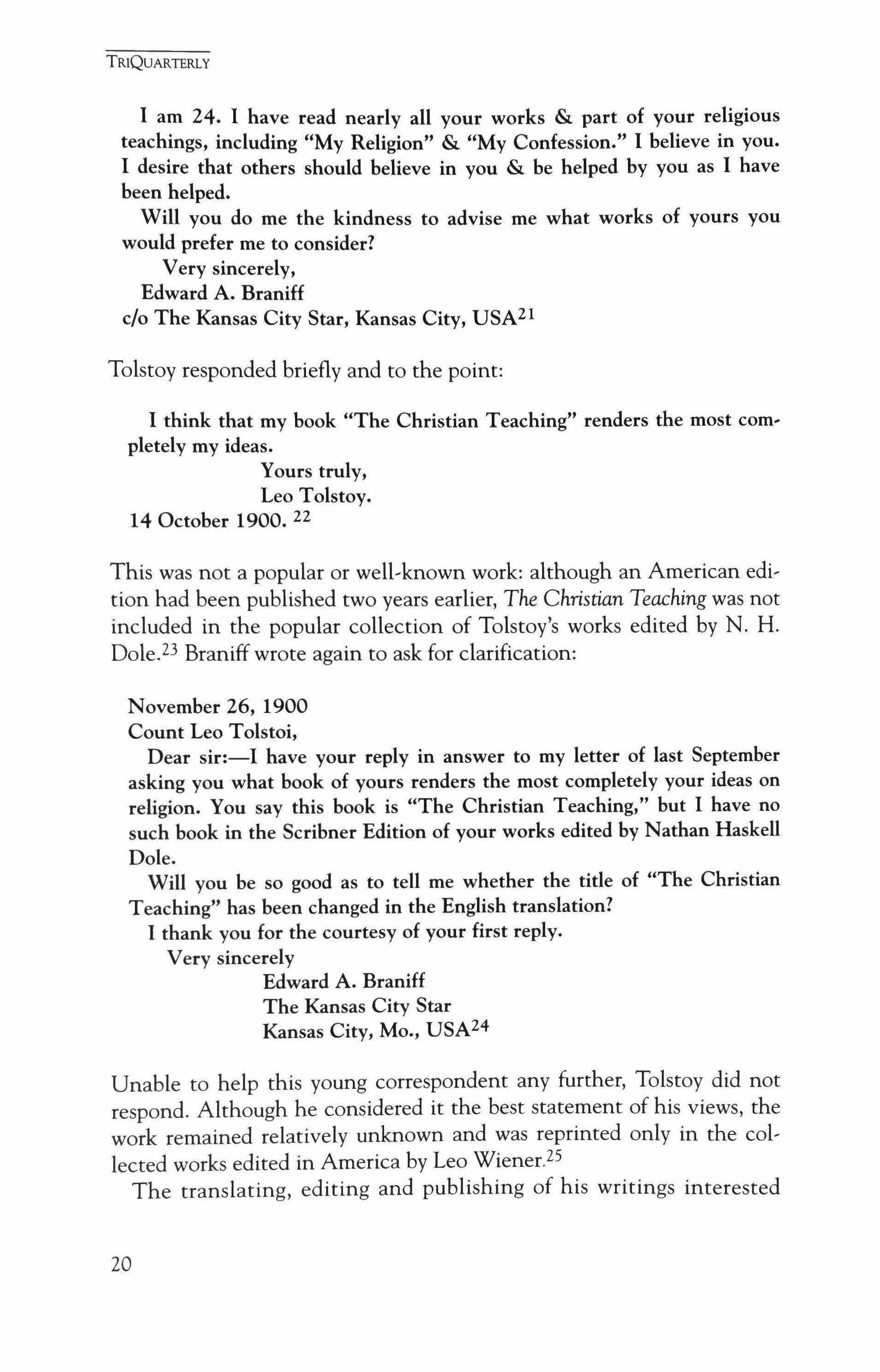
I am 24. I have read nearly all your works & part of your religious teachings, including "My Religion" & "My Confession." I believe in you. I desire that others should believe in you & be helped by you as I have been helped.
Will you do me the kindness to advise me what works of yours you would prefer me to consider?
Very sincerely, Edward A. Braniff
c/o The Kansas City Star, Kansas City, USA21
Tolstoy responded briefly and to the point:
I think that my book "The Christian Teaching" renders the most completely my ideas.
Yours truly,
Leo Tolstoy. 14 October 1900. 22
This was not a popular or well-known work: although an American edition had been published two years earlier, The Christian Teaching was not included in the popular collection of Tolstoy's works edited by N. H. Dole.23 Braniff wrote again to ask for clarification:
November 26, 1900 Count Leo Tolstoi,
Dear sir:-I have your reply in answer to my letter of last September asking you what book of yours renders the most completely your ideas on religion. You say this book is "The Christian Teaching," but I have no such book in the Scribner Edition of your works edited by Nathan Haskell Dole.
Will you be so good as to tell me whether the title of "The Christian Teaching" has been changed in the English translation?
I thank you for the courtesy of your first reply.
Very sincerely
Edward A. Braniff
The Kansas City Star Kansas City, Mo., USA24
Unable to help this young correspondent any further, Tolstoy did not respond. Although he considered it the best statement of his views, the work remained relatively unknown and was reprinted only in the collected works edited in America by Leo Wiener.2S
The translating, editing and publishing of his writings interested
20
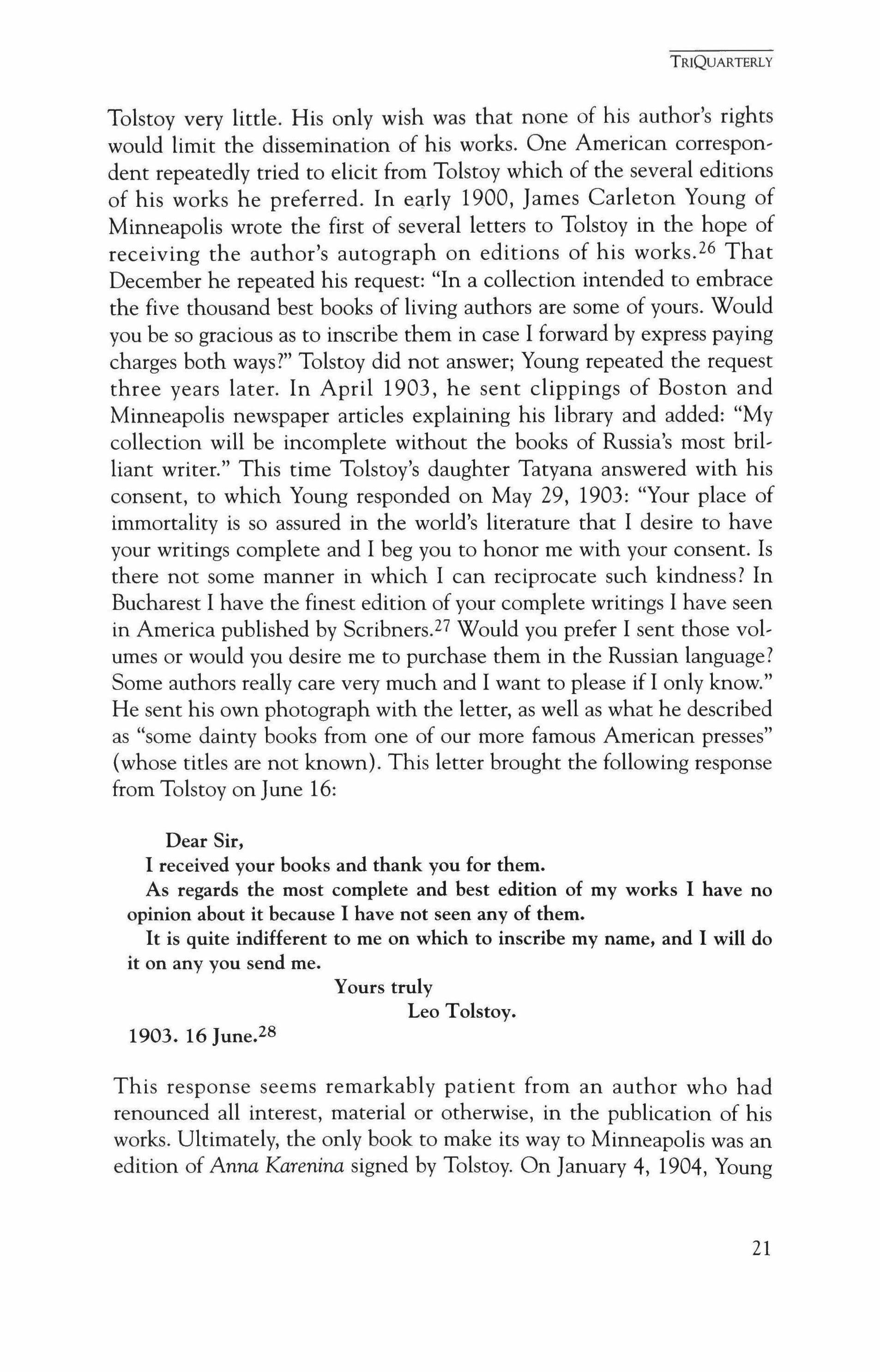
Tolstoy very little. His only wish was that none of his author's rights would limit the dissemination of his works. One American correspondent repeatedly tried to elicit from Tolstoy which of the several editions of his works he preferred. In early 1900, James Carleton Young of Minneapolis wrote the first of several letters to Tolstoy in the hope of receiving the author's autograph on editions of his works.26 That December he repeated his request: "In a collection intended to embrace the five thousand best books of living authors are some of yours. Would you be so gracious as to inscribe them in case I forward by express paying charges both ways?" Tolstoy did not answer; Young repeated the request three years later. In April 1903, he sent clippings of Boston and Minneapolis newspaper articles explaining his library and added: "My collection will be incomplete without the books of Russia's most brilliant writer." This time Tolstoy's daughter Tatyana answered with his consent, to which Young responded on May 29, 1903: "Your place of immortality is so assured in the world's literature that I desire to have your writings complete and I beg you to honor me with your consent. Is there not some manner in which I can reciprocate such kindness? In Bucharest I have the finest edition of your complete writings I have seen in America published by Scribners.27 Would you prefer I sent those volumes or would you desire me to purchase them in the Russian language? Some authors really care very much and I want to please if I only know." He sent his own photograph with the letter, as well as what he described as "some dainty books from one of our more famous American presses" (whose titles are not known). This letter brought the following response from Tolstoy on June 16:
Dear Sir, I received your books and thank you for them.
As regards the most complete and best edition of my works I have no opinion about it because I have not seen any of them. It is quite indifferent to me on which to inscribe my name, and I will do it on any you send me.
Yours truly Leo Tolstoy. 1903. 16 June.28
This response seems remarkably patient from an author who had renounced all interest, material or otherwise, in the publication of his works. Ultimately, the only book to make its way to Minneapolis was an edition of Anna Karenina signed by Tolstoy. On January 4, 1904, Young
TRIQUARTERLY
21
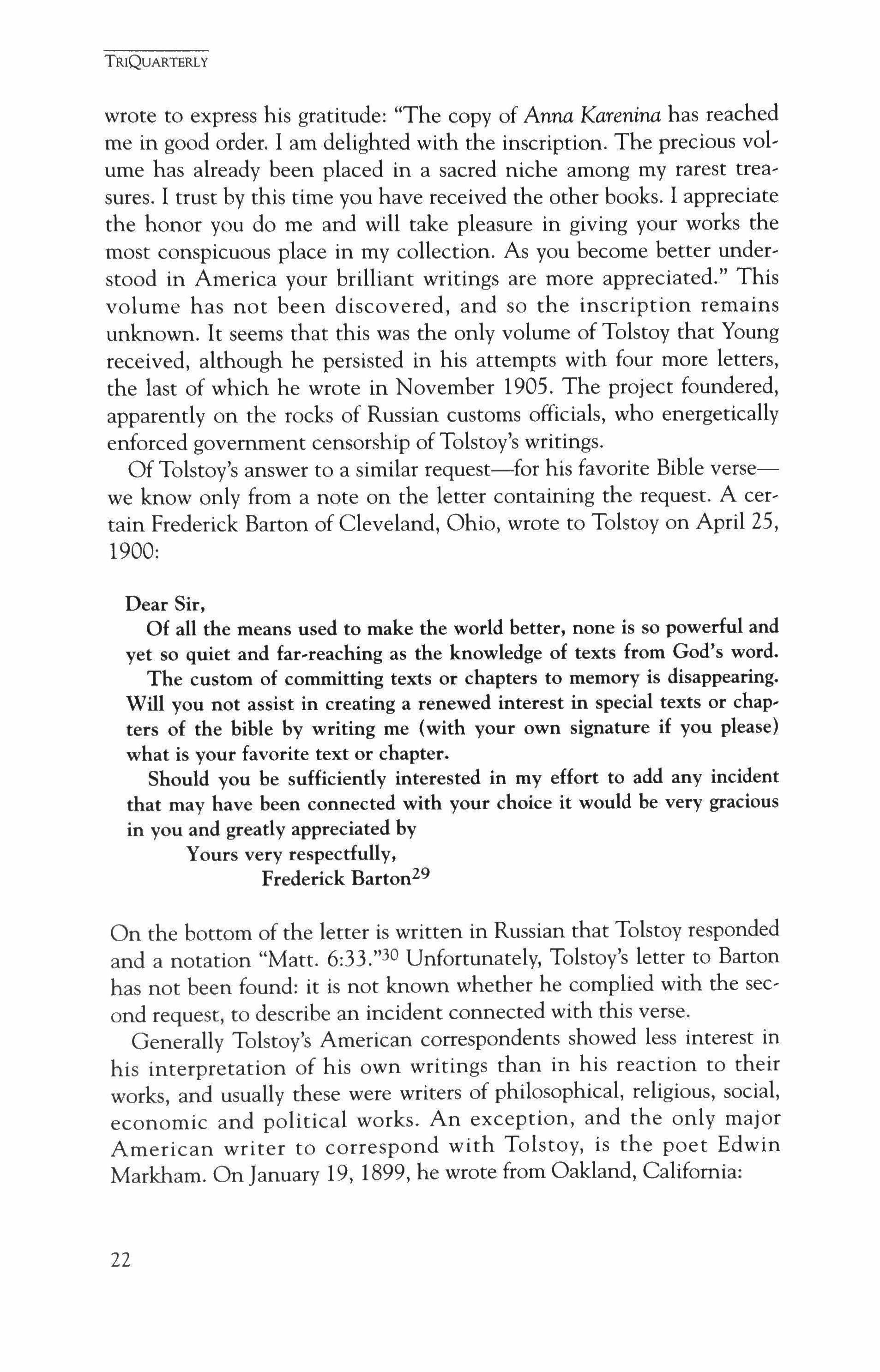
wrote to express his gratitude: "The copy of Anna Karenina has reached me in good order. I am delighted with the inscription. The precious volume has already been placed in a sacred niche among my rarest treasures. I trust by this time you have received the other books. I appreciate the honor you do me and will take pleasure in giving your works the most conspicuous place in my collection. As you become better understood in America your brilliant writings are more appreciated." This volume has not been discovered, and so the inscription remains unknown. It seems that this was the only volume of Tolstoy that Young received, although he persisted in his attempts with four more letters, the last of which he wrote in November 1905. The project foundered, apparently on the rocks of Russian customs officials, who energetically enforced government censorship of Tolstoy's writings.
Of Tolstoy's answer to a similar request-for his favorite Bible versewe know only from a note on the letter containing the request. A certain Frederick Barton of Cleveland, Ohio, wrote to Tolstoy on April 25, 1900:
Dear Sir,
Of all the means used to make the world better, none is so powerful and yet so quiet and far-reaching as the knowledge of texts from God's word. The custom of committing texts or chapters to memory is disappearing. Will you not assist in creating a renewed interest in special texts or chapters of the bible by writing me (with your own signature if you please) what is your favorite text or chapter.
Should you be sufficiently interested in my effort to add any incident that may have been connected with your choice it would be very gracious in you and greatly appreciated by Yours very respectfully, Frederick Barton29
On the bottom of the letter is written in Russian that Tolstoy responded and a notation "Matt. 6:33."30 Unfortunately, Tolstoy's letter to Barton has not been found: it is not known whether he complied with the second request, to describe an incident connected with this verse.
Generally Tolstoy's American correspondents showed less interest in his interpretation of his own writings than in his reaction to their works, and usually these were writers of philosophical, religious, social, economic and political works. An exception, and the only major American writer to correspond with Tolstoy, is the poet Edwin Markham. On January 19,1899, he wrote from Oakland, California:
TRIQUARTERLY
22

Dear Friend and Brother:
May I call you such from this western brink of the world, you who have been to so many of us here a prophet and an ideal? Let me express to you our gratitude for the treasures of wisdom you have given the world in your books and for the noble inspiration you are giving the world in your life. The poem which I enclose may have at least a passing interest for you. Salutation and Fraternity, Edwin Markham) 1
Markham correctly assumed that the enclosed newspaper clipping would generate more than just "passing interest" in Tolstoy: it contained his "The Man With the Hoe" (subtitled: "Written After Seeing Millet's World�Famous Painting Now in This City"). The Russian writer was deeply impressed by this poem's sympathy for the oppressed peasant and its warning to "masters, lords, and rulers in all lands." In conversation with an American banker from California, John J. Valentine, who visited the Russian author in Moscow on November 22, 1899, Tolstoy mentioned Markham's poem. The Californian promised to send him a book of the poet's verse. Valentine apparently contacted Markham, who provided a copy of his book, The Man with the Hoe. And Other Poems, with the inscription: "For Count Leo Tolstoy with affectionate salutation across the world. Edwin Markham, Brooklyn, N.Y. Jan. 5, 1900."32
Shortly thereafter, on January 20, 1900, Markham wrote again to Tolstoy:
Dear Teacher:
Let me call you so, for you have long been a light to me, as to many another in America. Seeing the same star of truth that you follow makes me feel near and akin to you, though separated by the diameter of the world.
I find that Mr. J. J. Valentine of California (a good man) is sending you a copy of my little book of poems. If it should fail to reach you have the kindness to inform me of the fact.
I wish you many years yet for the service of God in the rediscovery of Christianity.
Very sincerely yours, Edwin Markham33
Tolstoy received both the book and Markham's letter, to which he responded on February 5:
TRIQUARTERLY
23
Dear Sir,
I received your book of poems and thank you very much for sending it to me with your kind letter.
I like your poetry and especially the first poem which gives the key to the whole book
It is a great joy for me to have such friends as you across the world, as you say it.
Yours truly, Leo Tolstoy.
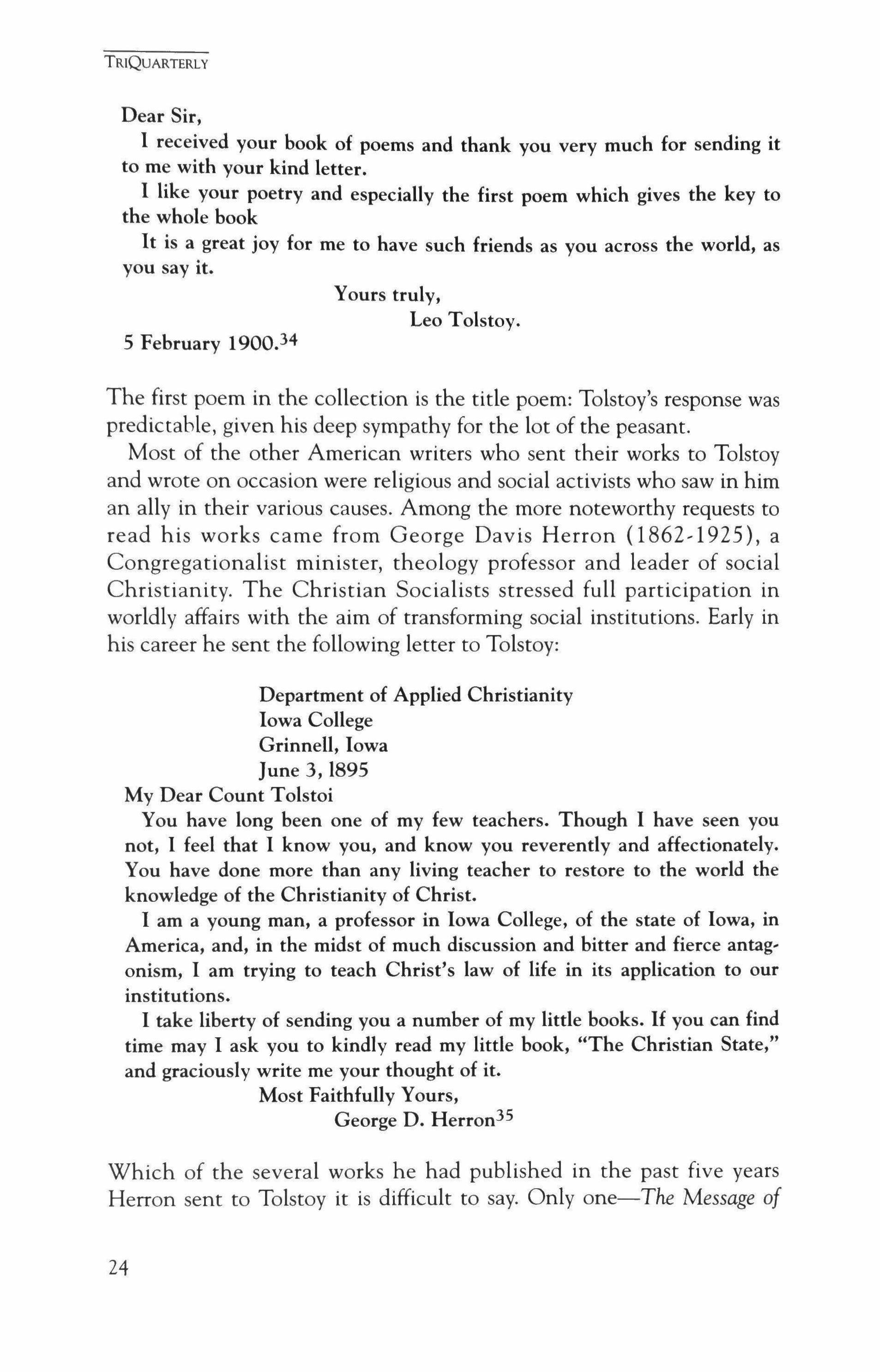
5 February 1900,34
The first poem in the collection is the title poem: Tolstoy's response was predictable, given his deep sympathy for the lot of the peasant.
Most of the other American writers who sent their works to Tolstoy and wrote on occasion were religious and social activists who saw in him an ally in their various causes. Among the more noteworthy requests to read his works came from George Davis Herron (1862,1925), a Congregationalist minister, theology professor and leader of social Christianity. The Christian Socialists stressed full participation in worldly affairs with the aim of transforming social institutions. Early in his career he sent the following letter to Tolstoy:
Department
of
Applied Christianity
Iowa College Grinnell, Iowa
June 3, 1895
My Dear Count Tolstoi
You have long been one of my few teachers. Though I have seen you not, I feel that I know you, and know you reverently and affectionately. You have done more than any living teacher to restore to the world the knowledge of the Christianity of Christ.
I am a young man, a professor in Iowa College, of the state of Iowa, in America, and, in the midst of much discussion and bitter and fierce antagonism, I am trying to teach Christ's law of life in its application to our institutions.
I take liberty of sending you a number of my little books. If you can find time may I ask you to kindly read my little book, "The Christian State," and graciously write me your thought of it.
Most Faithfully Yours, George D. Herron35
Which of the several works he had published in the past five years Herron sent to Tolstoy it is difficult to say. Only one-The Message of
TRIQUARTERLY
24

Jesus to Men of Wealth (32 pages)-would seem to qualify as a "little work"; the others were substantial tracts of over a hundred pages each.36 His latest work, The Christian State, was the largest he had written (at 216 pages, also not a "little book") and had the subtitle: "a political vision of Christ; a course of six lectures delivered in churches in various American cities."37
Tolstoy, who had discovered Herron and seen his works before receiving this letter, responded cordially to Herron's request with a promise to read his latest work carefully. He wrote on June 13:
Dear Mr. Herron,
I had in my hands one of your books, but I had not time to read it, so that I knew before you wrote to me your name and your work, and greatly sympathized with it, that is with your work.
I thank you heartily for the books that you sent to me. I received them today and will begin with the Christian state and hope that I will be induced to read them all. I have finished the first. I will write to you my genuine opinion of it.
Yours truly38
What "first" work Tolstoy finished is not known. However, his initial reaction to The Christian State is documented in Tolstoy's diary. On June 18 he wrote: "Read Herron-Christian State-undistinguished, cold, vague."39 Herron's work predicted a social revolution based on the political leadership of Christ. His belief that the state was essential to the search for justice appears diametrically opposed to Tolstoy's Christian anarchist views. When Tolstoy had finished, he wrote a long, detailed critique of the work to Herron. On July 2 or 3 Tolstoy wrote the following draft (all but the first sentence is in Russian):
I read very attentively your book: "The Christian State" and will try to give you a candid opinion of it.
I completely share your view of the significance of Christianity as a political and economic teaching. Many of the places in your book where you point out the sins of our life and the anti-Christian position of our society are strikingly true. I was especially struck by your bold judgment of the American people for not fulfilling their vocation. Generally, this entire book is permeated with the most profound Christian spirit. But I find one important shortcoming in it which undermines its significance. I hope that you will accept my opinion, whether it is just or not, with the same religious awareness with which I address you, namely that our attitude on this subject is not the attitude we have towards one another,
TRIQUARTERLY
25
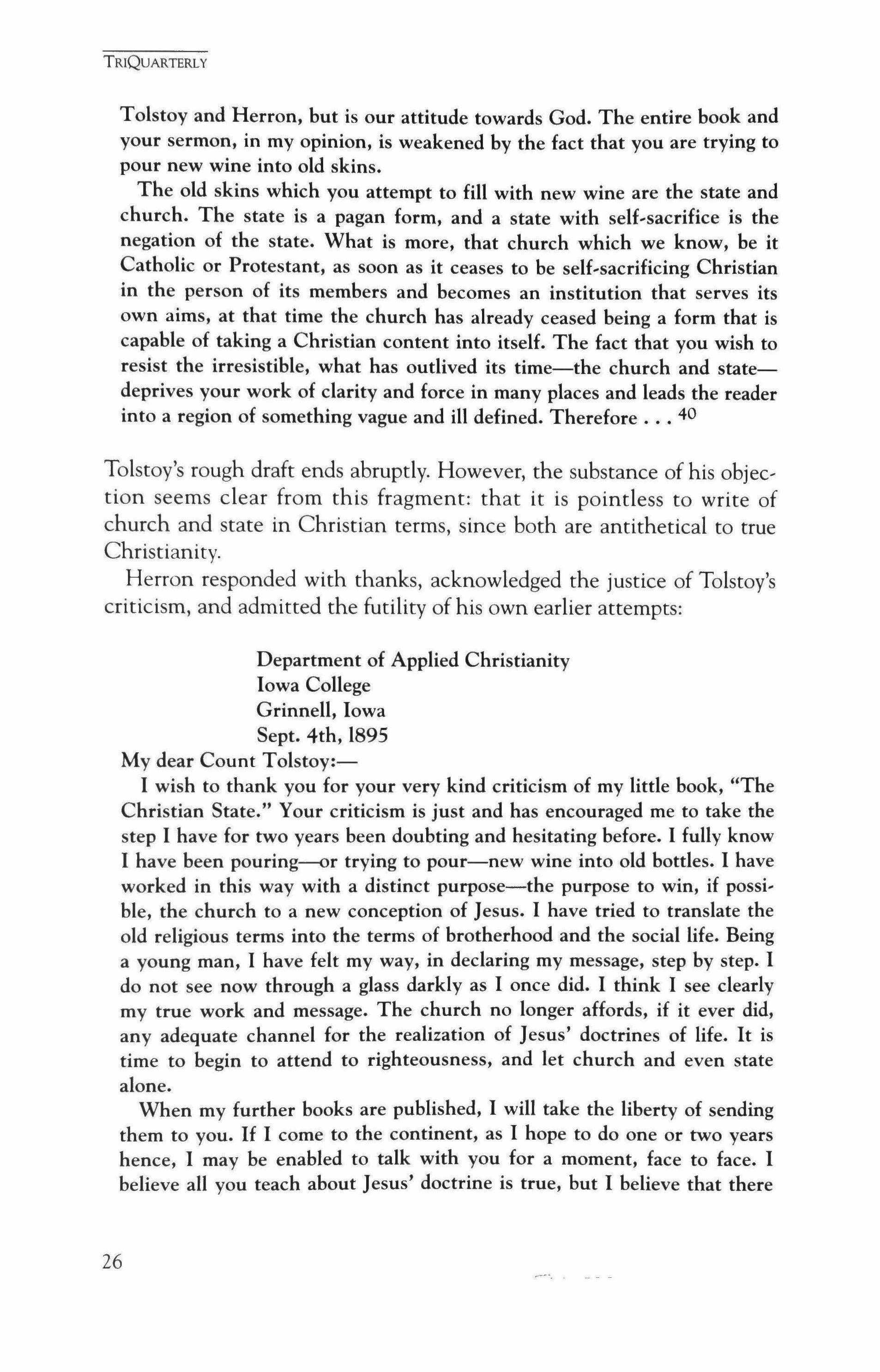
Tolstoy and Herron, but is our attitude towards God. The entire book and your sermon, in my opinion, is weakened by the fact that you are trying to pour new wine into old skins.
The old skins which you attempt to fill with new wine are the state and church. The state is a pagan form, and a state with self-sacrifice is the negation of the state. What is more, that church which we know, be it Catholic or Protestant, as soon as it ceases to be self-sacrificing Christian in the person of its members and becomes an institution that serves its own aims, at that time the church has already ceased being a form that is capable of taking a Christian content into itself. The fact that you wish to resist the irresistible, what has outlived its time-the church and statedeprives your work of clarity and force in many places and leads the reader into a region of something vague and ill defined. Therefore 40
Tolstoy's rough draft ends abruptly. However, the substance of his objection seems clear from this fragment: that it is pointless to write of church and state in Christian terms, since both are antithetical to true Christianity.
Herron responded with thanks, acknowledged the justice of Tolstoy's criticism, and admitted the futility of his own earlier attempts:
Department of Applied Christianity
Iowa College Grinnell, Iowa Sept. 4th, 1895
My dear Count Tolstoy:-
I wish to thank you for your very kind criticism of my little book, "The Christian State." Your criticism is just and has encouraged me to take the step I have for two years been doubting and hesitating before. I fully know I have been pouring-c-or trying to pour-new wine into old bottles. I have worked in this way with a distinct purpose-the purpose to win, if possible, the church to a new conception of Jesus. I have tried to translate the old religious terms into the terms of brotherhood and the social life. Being a young man, I have felt my way, in declaring my message, step by step. I do not see now through a glass darkly as I once did. I think I see clearly my true work and message. The church no longer affords, if it ever did, any adequate channel for the realization of Jesus' doctrines of life. It is time to begin to attend to righteousness, and let church and even state alone.
When my further books are published, I will take the liberty of sending them to you. If I come to the continent, as I hope to do one or two years hence, I may be enabled to talk with you for a moment, face to face. I believe all you teach about Jesus' doctrine is true, but I believe that there
TRIQUARTERLY
26

is much more truth to be told. Faithfully and affectionately yours, George D. Herron+!
Herron may have attempted to follow Tolstoy's advice, but his subsequent writings continued to pursue this same topic of church and state. It is not clear whether Herron sent more of his works to Tolstoy; no more of his letters arrived, nor did Tolstoy write again to him. Nonetheless Tolstoy followed Herron's subsequent writing; in 1899 the English translator and Tolstoyan Aylmer Maude sent Tolstoy a copy of Herron's Between Jesus and Caesar, in which he published a series of eight lectures he delivered on the subject of the relation of the Christian conscience to the existing social system.42 Tolstoy commented on this work in a postscript to his letter to Maude dated December 15, 1899:
I am very displeased by Herron's basic position. If we will strive with all our soul's power to not depart from an ideal guiding principle, nonetheless in our weakness we will unwillingly depart from it. If we decide beforehand that we must make a compromise, we will not only depart to a much greater degree than in the first case, but we will loose the guiding thread and risk going completely astray.43
The American's pragmatism represented an unacceptable departure from the absolute principles Tolstoy sought to follow.
Of the Christian principles Tolstoy professed, one of the most controversial and attractive to his American correspondents was nonresistance. Among the American practitioners of this doctrine to write to Tolstoy was a founder of a commune of nonresistant Christian socialists; he invited the Russian writer to participate in their quite successful publication, The Social Gospel. The Christian Commonwealth of Muscogee County, Georgia, was organized in 1896 (with the communist motto "From each according to his ability: to each according to his need").
According to the description on its letterhead, the Christian Commonwealth had "1000 acres of land twelve miles east of Columbus on Central of Georgia Railway," was "a purely socialistic colony where all fare alike: sympathy with its principles [was] the only condition of membership; in six months [it had] grown to seventy-five members with its own post office, railroad station and public school." George Howard Gibson, a leader of the Commonwealth and editor of its monthly publication, wrote to Tolstoy at the suggestion of Ernest Howard Crosby on February 22, 1898:
TRIQUARTERLY
27

My Dear Sir:-
Some two weeks since we sent you by mail a copy of our new magazine, The Social Gospel, and hope it will reach you. Let it serve as an introduction. We have long known you through your writings, which we much admire. You will notice Ernest Howard Crosby of Rhinebeck, New York, is one of our Associate Editors. I am as entirely committed to Christ's non-resistance teachings, to the Wisdom of overcoming evil with good, as is he and yourself. And our other Editors and writers are becoming more and more possessed with this truth of love.
Mr. Crosby in a letter rec'd yesterday writes:
"Tolstoy's address is Yasnaia Poliana Toula, Russia. You should write him. I think he and Kenworthy would write for the paper, if they understand your field."
Our field is as large as the world and very few publications have passed its borders. You will judge what I mean by reading our initial number.
Let me say, we have been long preparing a list of the most enlightened people, those who are seeking earnestly the light of heaven, and that our magazine reaches the people who believe in brotherhood and the practical love of Christ, who was "the first bom among many brethren." We have readers in America, England, Russia, Hungary, Switzerland, France and New Zealand, and feel assured that our message is to men of all classes in all the world. We are insisting on repentance of selfishness, separation from the selfish commercial struggle, and living the brotherhood life. And we practice what we preach.
If you can help us with your pen to make known the truth we shall be very glad indeed.
Yours for humanity, George Gibson44
Tolstoy read the inaugural issue of Social Gospel, as well as a handbill, "Think About This," enclosed with Gibson's letter. No doubt impressed by the recommendation of Crosby and the participation of Herron in the issue, he responded to Gibson's letter with extensive, detailed, and unsolicited criticism of their undertaking-not of the journal, but of the community itself. On March 23 Tolstoy wrote:
My dear friend,
I duly received your letter and magazine, both of which afforded me great pleasure. The first number is very good and I liked all the articles in it. It is quite true, as you say it in your article "The Social Need," and Herron in his, that a Christian life is quite impossible in the present unchristian organization of society. The contradictions between his surroundings and his convictions are very painful for a man who is sincere in
TRIQUARTERLY
28

his Christian faith, and therefore the organization of communities seems to such a man the only means of delivering himself from these contradictions. But this is an illusion. Every community is a small island in the mist of an ocean of unchristian conditions of life, so that the Christian relations exist only between members of the colony but outside that must remain unchristian, otherwise the colony would not exist for a moment. And therefore to live in community cannot save a Christian from the contradiction between his conscience and his life. I do not mean to say that I do not approve of communities such as your commonwealth, or that I do not think them to be a good thing. On the contrary, I approve of them with all my heart and am very interested in your commonwealth and wish it the greatest success.
I think that every man who can free himself from the conditions of the worldly life without breaking the ties of love-love the main principle in the name of which he seeks new forms of life-I think such a man not only must, but naturally will join people who have the same beliefs and who try to live up to them. If I were free I would immediately even at my age join such a colony. I only wished to say that the mere forming of communities is not a solution for the Christian problem, but is only one of the means of its solution. The revolution that is going on for the attainment of the Christian ideal is so enormous, our life is so different from what it ought to be, that for the perfect success of this revolution, for the concordance of conscience and life, is needed the work of all men-men living in communities as well as men of the world living in the most different conditions. This ideal is not so quickly and so simply attained, as we think and wish it. This ideal will be attained only when every man in the whole world will say: Why should I sell my services and buy yours? If mine are greater than yours I owe them to you, because if there is in the whole world one man who does not think and act by this principle, and who will take and keep by violence, what he can take from others, no man can live a true Christian life, as well in a community as outside it. We cannot be saved separately, we must be saved all together. And this can be attained only through the modification of the conception of life i. e. the faith of all men; and to this end we must work all together-men living in the world as well as men living in communities.
We must all of us remember that we are messengers from the great King-the God of Love with the message of unity and love between all living beings. And therefore we must not for a minute forget our mission and do all what we think useful and agreeable for ourselves only so long as it is not in opposition to our mission which is to be accomplished not only by words, but by example and especially by the infection of love.
Please give my respect and love to the colonists and ask them not to be offended by me giving them advice, which may be unnecessary. I advise them to remember that all material questions of: money, implements,
TRIQUARTERLY
29
nourishment, even the very existence of the colony itself,-all those things are of little importance in comparison of the sole important object of our life: to preserve love amongst all men, which we come in contact with. If with the object of keeping the food of the colony or of protecting the thrift of it you must quarrel with a friend or with a stranger, must excite ill-feelings in somebody, it is better to give up everything, than to act against love. And let our friends not dread that the strict following of the principle will destroy the practical work. Even the practical work will flourish-not as we expect it, but in its own way, only by strict following the law of love and will perish by acting in opposition to it.
Your friend and brother
Leo Tolstoy.
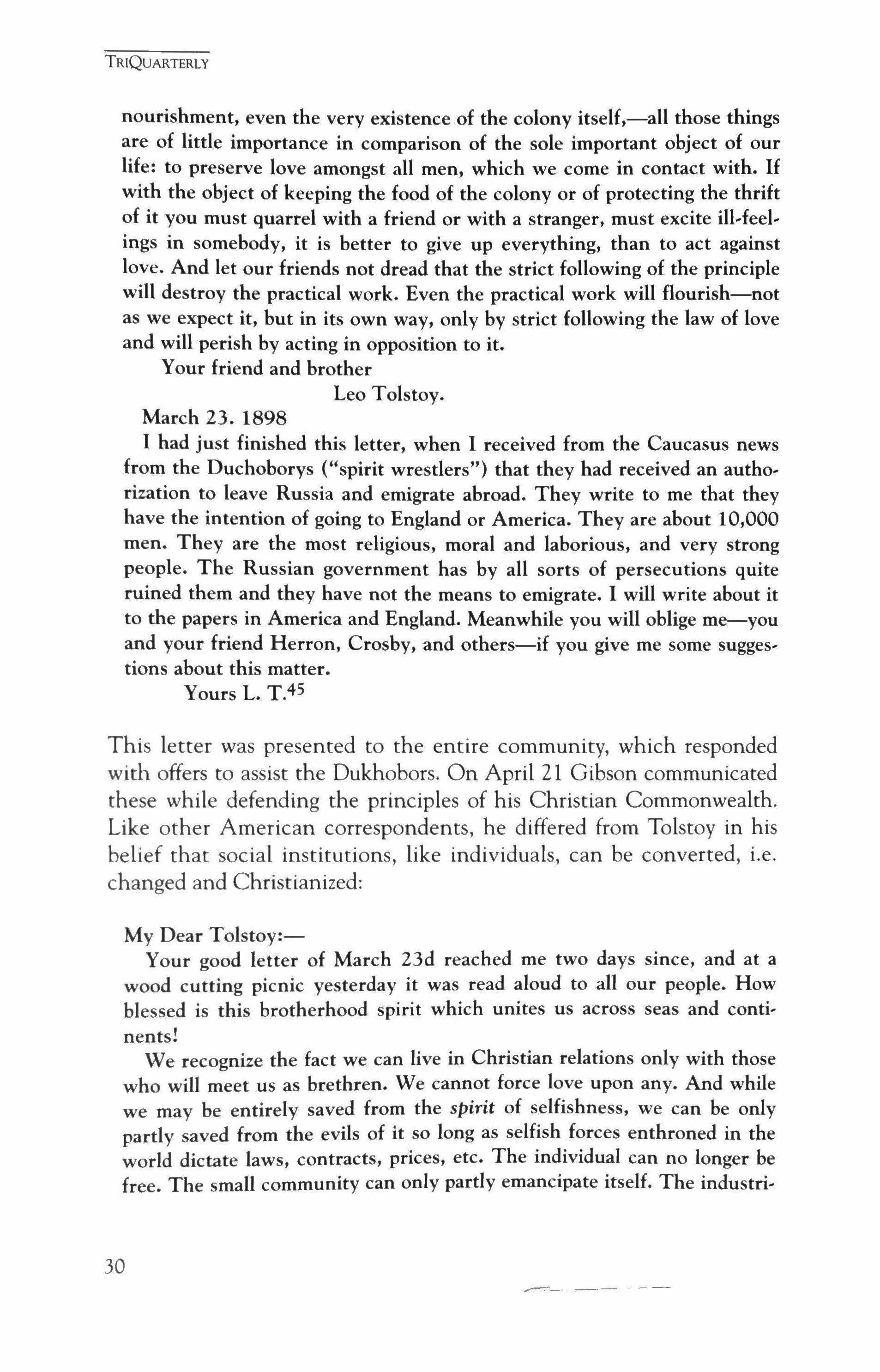
March 23. 1898
I had just finished this letter, when I received from the Caucasus news from the Duchoborys ("spirit wrestlers") that they had received an authorization to leave Russia and emigrate abroad. They write to me that they have the intention of going to England or America. They are about 10,000 men. They are the most religious, moral and laborious, and very strong people. The Russian government has by all sorts of persecutions quite ruined them and they have not the means to emigrate. I will write about it to the papers in America and England. Meanwhile you will oblige me-you and your friend Herron, Crosby, and others-if you give me some suggestions about this matter.
Yours L. T.45
This letter was presented to the entire community, which responded with offers to assist the Dukhobors. On April 21 Gibson communicated these while defending the principles of his Christian Commonwealth. Like other American correspondents, he differed from Tolstoy in his belief that social institutions, like individuals, can be converted, i.e. changed and Christianized:
My Dear Tolstoy:-
Your good letter of March 23d reached me two days since, and at a wood cutting picnic yesterday it was read aloud to all our people. How blessed is this brotherhood spirit which unites us across seas and continents!
We recognize the fact we can live in Christian relations only with those who will meet us as brethren. We cannot force love upon any. And while we may be entirely saved from the spirit of selfishness, we can be only partly saved from the evils of it so long as selfish forces enthroned in the world dictate laws, contracts, prices, etc. The individual can no longer be free. The small community can only partly emancipate itself. The industri-
TRIQUARTERLY
30

al-commercial, or producing and distributing, unit must be saved, Christianized, made unselfish as a whole, in order that the individual parts may be wholly saved. But if two or more families do not begin to live the life of love, it cannot spread and reorganize society and make it Christian. The individual can not remain in the midst of the selfish struggle without being involved in it, without partaking of its sins and plagues. It seems to me, wherever modem machinery and capital have taken the power of independent Christian action away from the individual and compelled him to gather his living through the selfish machinery processes, prices, relations, he is called by God to come out of such evil combination (as in Rev. 18); and if he be too poor and helpless to support life apart for himself and family, they must be redeemed, by those who have means.
Be very free to advise us always. The Colony leaders have a great respect for your opinions and wisdom. We need the counsel of the wisest students of the social problem. We all need all the help, light, power that each can contribute. Write us as often as your other duties will allow.
We are most deeply interested in what you tell us of the commanded removal from Russia of the "Spirit Wrestlers." We have the little book introduced by Kenworthy giving us their history. We are their brothers, and wish to help them to the utmost. We believe we can find friends who will furnish the means to buy sufficient land to place them on in this country, if friends across the sea can raise funds to bring them to it. Will at once write to Crosby about it, also to Herron.
What do you think of this climate for them-rarely any snow, extremes of thermometer two years we have been here have been 99° in hottest summer day, 12° above zero in coldest winter day. The soil is a sandy loam with clay subsoil, needing fertilizer, but producing a great variety of food products, two or three crops a year. Good fruit country. Plenty of fuel, and timber to build. Land is $2.22 to $10.22 an acre. We are 200 miles west of Savannah, Georgia. Most of us are from the Northern States, one family from Canada. Consider it a healthy climate.
Would these people prefer to settle in the higher regions of the moun, tains north of us? How many can come or be sent to America? How soon must they get out of Russia?
We will do our utmost for them, to prepare a place for them, to help them to self-support. Tell them we are members of "The Universal Brotherhood," living to serve. We think plenty of land can be secured for them here. Will write to Crosby today, and suggest that he begin lecturing and raising funds to buy land for them. Will insert at this late moment of going to press best notice of their need we can.
Yours for Humanity, George Gibson46
Tolstoy did not respond. Meanwhile, after considerable searching for a
TRIQUARTERLY
31
suitable home, the Dukhobors were settled in Canada, their passage financed in part by proceeds from Tolstoy's Resurrection. The fate of the Christian Commonwealth continued to concern Tolstoy, however. In a letter to Aylmer Maude of December 12, 1898, he asked Maude his opinion of the Commonwealth and its promise. The following year Tolstoy wrote to Crosby with similar concerns. His letter of June 1899 included this passage:
I thank you for the information you gave me, & must say that I feel especially concerned about all that goes on in the Christian Commonwealth.
I read their journal with deep interest & never cease to rejoice at the firmness of their views & the beautiful expression of their thoughts. I should like to get so many details concerning their life as possible.47
Crosby did not directly respond, but rather passed on this request to Gibson, who took Tolstoy's request to heart. The next month after Crosby received Tolstoy's request, Gibson sent the following letter to Yasnaia Poliana, which illustrates a characteristically American combination of enterprise and fundamentalism as well as an unbounded faith in the power of religious belief to alter human nature and social institutions:
Commonwealth, Ga., July 24, 1899
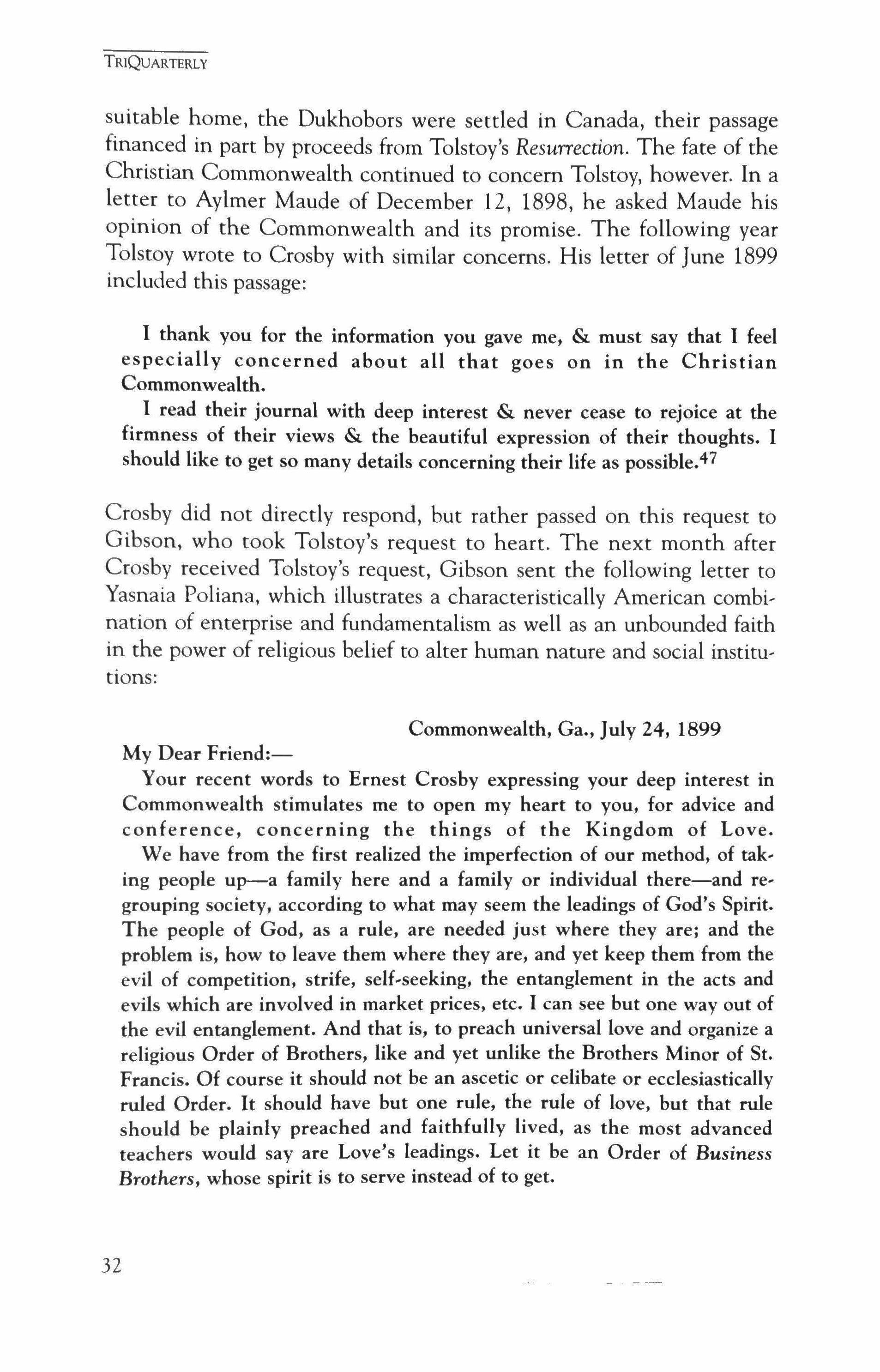
My Dear Friend:-
Your recent words to Ernest Crosby expressing your deep interest in Commonwealth stimulates me to open my heart to you, for advice and conference, concerning the things of the Kingdom of Love.
We have from the first realized the imperfection of our method, of taking people up-a family here and a family or individual there-and regrouping society, according to what may seem the leadings of God's Spirit. The people of God, as a rule, are needed just where they are; and the problem is, how to leave them where they are, and yet keep them from the evil of competition, strife, self-seeking, the entanglement in the acts and evils which are involved in market prices, etc. I can see but one way out of the evil entanglement. And that is, to preach universal love and organize a religious Order of Brothers, like and yet unlike the Brothers Minor of St. Francis. Of course it should not be an ascetic or celibate or ecclesiastically ruled Order. It should have but one rule, the rule of love, but that rule should be plainly preached and faithfully lived, as the most advanced teachers would say are Love's leadings. Let it be an Order of Business Brothers, whose spirit is to serve instead of to get.
TRIQUARTERLY
32
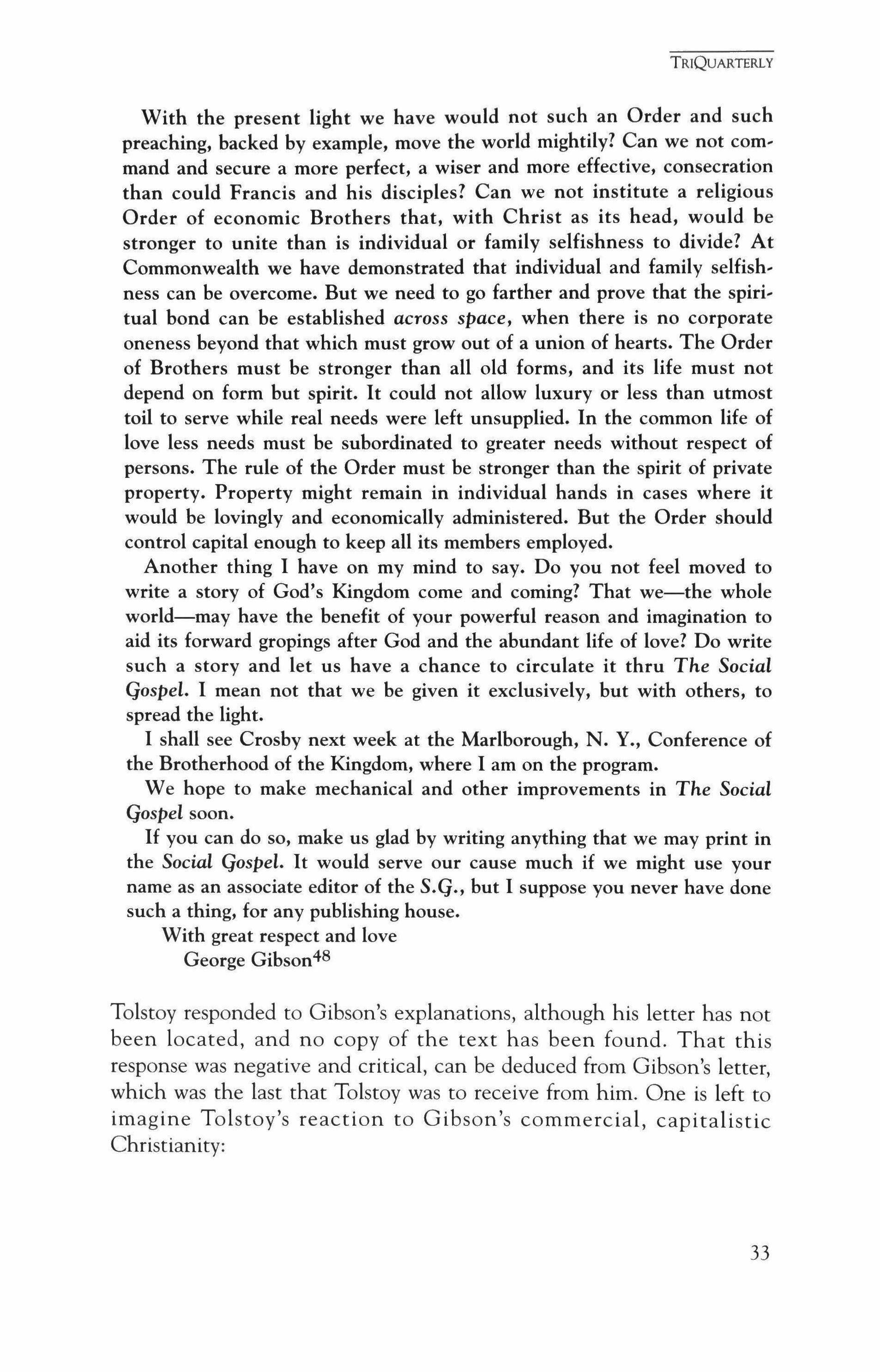
With the present light we have would not such an Order and such preaching, backed by example, move the world mightily? Can we not com, mand and secure a more perfect, a wiser and more effective, consecration than could Francis and his disciples? Can we not institute a religious Order of economic Brothers that, with Christ as its head, would be stronger to unite than is individual or family selfishness to divide? At Commonwealth we have demonstrated that individual and family selfish, ness can be overcome. But we need to go farther and prove that the spiritual bond can be established across space, when there is no corporate oneness beyond that which must grow out of a union of hearts. The Order of Brothers must be stronger than all old forms, and its life must not depend on form but spirit. It could not allow luxury or less than utmost toil to serve while real needs were left unsupplied. In the common life of love less needs must be subordinated to greater needs without respect of persons. The rule of the Order must be stronger than the spirit of private property. Property might remain in individual hands in cases where it would be lovingly and economically administered. But the Order should control capital enough to keep all its members employed.
Another thing I have on my mind to say. Do you not feel moved to write a story of God's Kingdom come and coming? That we-the whole world-may have the benefit of your powerful reason and imagination to aid its forward gropings after God and the abundant life of love? Do write such a story and let us have a chance to circulate it thru The Social Gospel. I mean not that we be given it exclusively, but with others, to spread the light.
I shall see Crosby next week at the Marlborough, N. Y., Conference of the Brotherhood of the Kingdom, where I am on the program.
We hope to make mechanical and other improvements in The Social Gospel soon.
If you can do so, make us glad by writing anything that we may print in the Social Gospel. It would serve our cause much if we might use your name as an associate editor of the S.G., but I suppose you never have done such a thing, for any publishing house.
With great respect and love
George Gibson48
Tolstoy responded to Gibson's explanations, although his letter has not been located, and no copy of the text has been found. That this response was negative and critical, can be deduced from Gibson's letter, which was the last that Tolstoy was to receive from him. One is left to imagine Tolstoy's reaction to Gibson's commercial, capitalistic Christianity:
TRIQUARTERLY
33
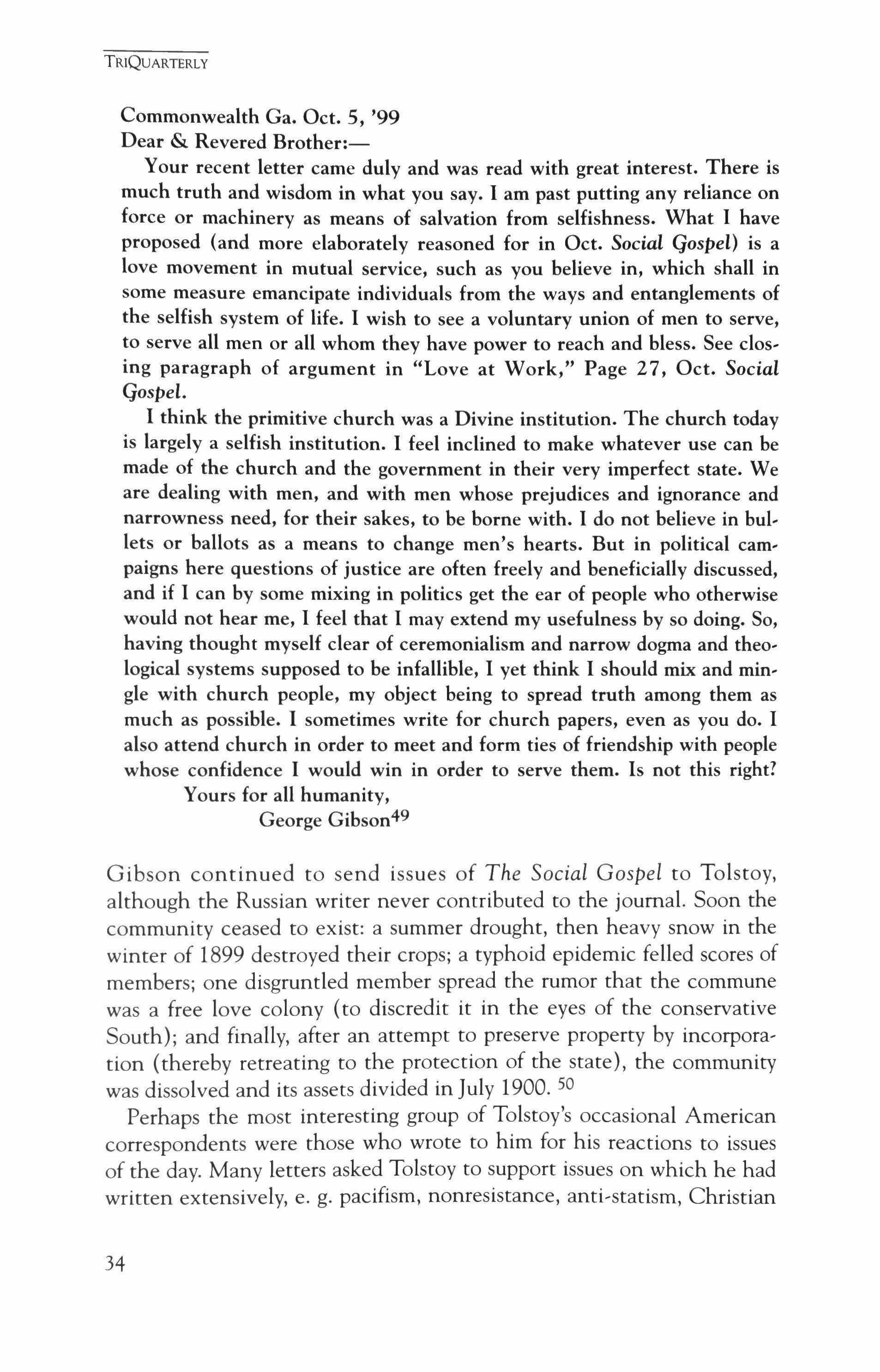
Commonwealth Ga. Oct. 5, '99
Dear & Revered Brother:-
Your recent letter came duly and was read with great interest. There is much truth and wisdom in what you say. I am past putting any reliance on force or machinery as means of salvation from selfishness. What I have proposed (and more elaborately reasoned for in Oct. Social Gospel) is a love movement in mutual service, such as you believe in, which shall in some measure emancipate individuals from the ways and entanglements of the selfish system of life. I wish to see a voluntary union of men to serve, to serve all men or all whom they have power to reach and bless. See closing paragraph of argument in "Love at Work," Page 27, Oct. Social Gospel.
I think the primitive church was a Divine institution. The church today is largely a selfish institution. I feel inclined to make whatever use can be made of the church and the government in their very imperfect state. We are dealing with men, and with men whose prejudices and ignorance and narrowness need, for their sakes, to be borne with. I do not believe in bullets or ballots as a means to change men's hearts. But in political cam, paigns here questions of justice are often freely and beneficially discussed, and if I can by some mixing in politics get the ear of people who otherwise would not hear me, I feel that I may extend my usefulness by so doing. So, having thought myself clear of ceremonialism and narrow dogma and theological systems supposed to be infallible, I yet think I should mix and min' gle with church people, my object being to spread truth among them as much as possible. I sometimes write for church papers, even as you do. I also attend church in order to meet and form ties of friendship with people whose confidence I would win in order to serve them. Is not this right?
Yours for all humanity, George Gibson49
Gibson continued to send issues of The Social Gospel to Tolstoy, although the Russian writer never contributed to the journal. Soon the community ceased to exist: a summer drought, then heavy snow in the winter of 1899 destroyed their crops; a typhoid epidemic felled scores of members; one disgruntled member spread the rumor that the commune was a free love colony (to discredit it in the eyes of the conservative South); and finally, after an attempt to preserve property by incorporation (thereby retreating to the protection of the state), the community was dissolved and its assets divided in July 1900.50
Perhaps the most interesting group of Tolstoy's occasional American correspondents were those who wrote to him for his reactions to issues of the day. Many letters asked Tolstoy to support issues on which he had written extensively, e. g. pacifism, nonresistance, anti-statism, Christian
TRIQUARTERLY
34

anarchy. Less common are the occasional requests to support positions outside this political and religious sphere. For example, Tolstoy received a request from a certain Sue M. Farrell to support her campaign against vivisection. On May 2, 1909, she sent Tolstoy a brochure with anti-vivisectionist quotations from various well-known sources with the following letter:
My dear sir:
As one of your sincere American admirers I am asking a favor. I am compiling a little book of quotations, similar in substance to the leaflet enclosed, opposing the abuse of vivisection, and having heard that you are sympathetic to the anti-vivisection cause I am writing to ask you to send me a few lines on the subject. If my request should seem an imposition to you pray forget that I have written, but, at the same time, kindly think that the great benefit a few lines from you would be to the anti-vivisection cause in America emboldens me thus to annoy you.
With great admiration and respect believe me
Very sincerely
S. M. Farrell51
Tolstoy responded on July 23 {mistaking the identity of his correspondent}:
Dear Sir,
What I think about vivisection is that if people admit that they have the right to take or to endanger the life of living beings for the benefit of many, there will be no limit for their cruelty.
Leo Tolstoy.52
A surviving first draft of the text of this letter offers grounds for speculation about the strength of Tolstoy's views on vivisection. On the envelope of Sue Farrell's letter is the draft of a text written in the hand of Tolstoy's daughter, Tatyana: "My father begs to forgive him for not answerling] your letter. The question which you are putting to him is a question on which <he has never been thinking> he has no cornpetence."53
Another issue on which Tolstoy's American correspondents addressed him was race relations. His most extensive response came in answer to a letter written by two high-school students from New Albany, Indiana:
TRIQUARTERLY
35
Scribner High School, New Albany, Indiana, United States, America, May 10, 1909.

Count Leon Tolstoy, Honored Sir:-
We the undersigned, a Committee appointed by Scribner High School representing 3000 Colored People of this city, have this day mailed to you a marked copy of Alexander's Magazine, published in Boston, Mass. and edited by men of the Colored Race and containing an article entitled, "What would Tolstoy say," about our race. The article embodies what the writer thought you would say after reading the statement of facts as to the cruel lynchings set out therein and copied as to the facts from that great weekly, "The New York Independent."
Knowing what great weight your own views and words on this subject would carry in this country, if widely circulated, we, acting for ourselves as students and on behalf of our afflicted race, earnestly urge and beseech you to give your views on this great matter of our wrongs, as recited in the Magazine, to the people of the United States, either through us or by any channel you may select. We, the press, and the reading citizens of our country will read and heed what you as a friend of the oppressed write, while paying no attention to the cries and prayers of the man or woman, having a black skin, who is accused of crime.
Very respectfully,
Lizzie Walker Pres. Martha E. Tyler, Sec.54
In the December 15, 1908, issue of Alexander's Magazine, Judge John H. Stotsenburg raised the question of how Tolstoy would react to the wide, spread deprivation of African-Americans of equal protection by the Constitution-which often resulted in beatings, torture and death. He provided a "summary of facts" to illustrate that "during the present year and within the borders of this Christian republic, many Negro citizens have been brutally and barbarously murdered by mobs upon the mere accusation of crime without any judicial trial."55 After describing several such cases, he suggested that Tolstoy would speak out against these acts as he had against "Russian cruelties and murders." Judge Stotsenburg then quoted what he believed Tolstoy would have said, putting the following words in his mouth:
If these inhuman deeds and lynching crimes can not be stopped by the legislative and judicial authorities of the United States with the aid of
TRIQUARTERLY
36
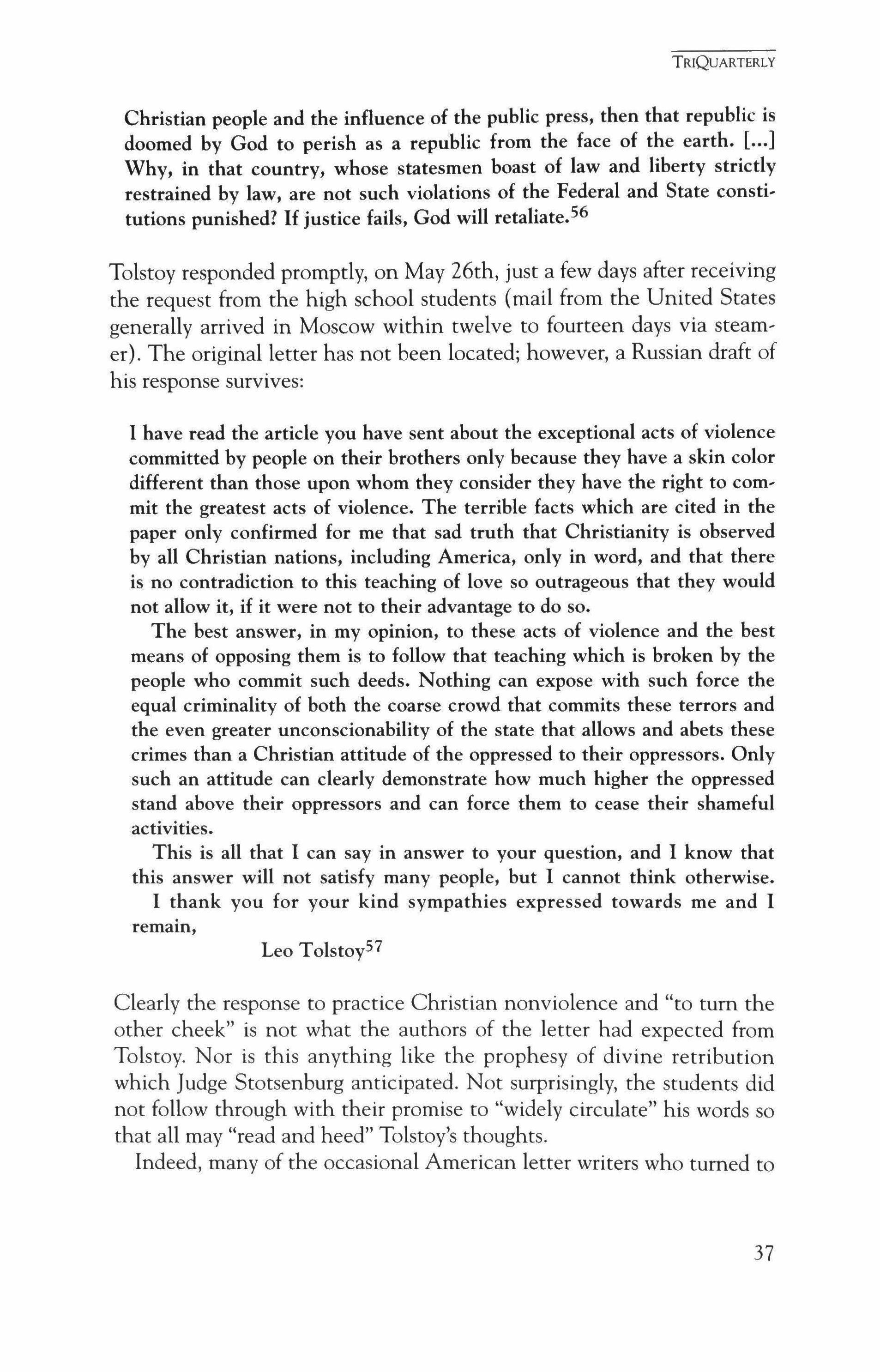
Christian people and the influence of the public press, then that republic is doomed by God to perish as a republic from the face of the earth. [ J Why, in that country, whose statesmen boast of law and liberty strictly restrained by law, are not such violations of the Federal and State constitutions punished? If justice fails, God will retaliate.56
Tolstoy responded promptly, on May 26th, just a few days after receiving the request from the high school students (mail from the United States generally arrived in Moscow within twelve to fourteen days via steam, er). The original letter has not been located; however, a Russian draft of his response survives:
I have read the article you have sent about the exceptional acts of violence committed by people on their brothers only because they have a skin color different than those upon whom they consider they have the right to com, mit the greatest acts of violence. The terrible facts which are cited in the paper only confirmed for me that sad truth that Christianity is observed by all Christian nations, including America, only in word, and that there is no contradiction to this teaching of love so outrageous that they would not allow it, if it were not to their advantage to do so.
The best answer, in my opinion, to these acts of violence and the best means of opposing them is to follow that teaching which is broken by the people who commit such deeds. Nothing can expose with such force the equal criminality of both the coarse crowd that commits these terrors and the even greater unconscionability of the state that allows and abets these crimes than a Christian attitude of the oppressed to their oppressors. Only such an attitude can clearly demonstrate how much higher the oppressed stand above their oppressors and can force them to cease their shameful activities.
This is all that I can say in answer to your question, and I know that this answer will not satisfy many people, but I cannot think otherwise.
I thank you for your kind sympathies expressed towards me and I remain,
Leo Tolstoy57
Clearly the response to practice Christian nonviolence and "to tum the other cheek" is not what the authors of the letter had expected from Tolstoy. Nor is this anything like the prophesy of divine retribution which Judge Stotsenburg anticipated. Not surprisingly, the students did not follow through with their promise to "widely circulate" his words so that all may "read and heed" Tolstoy's thoughts. Indeed, many of the occasional American letter writers who turned to 37
TRIQUARTERLY
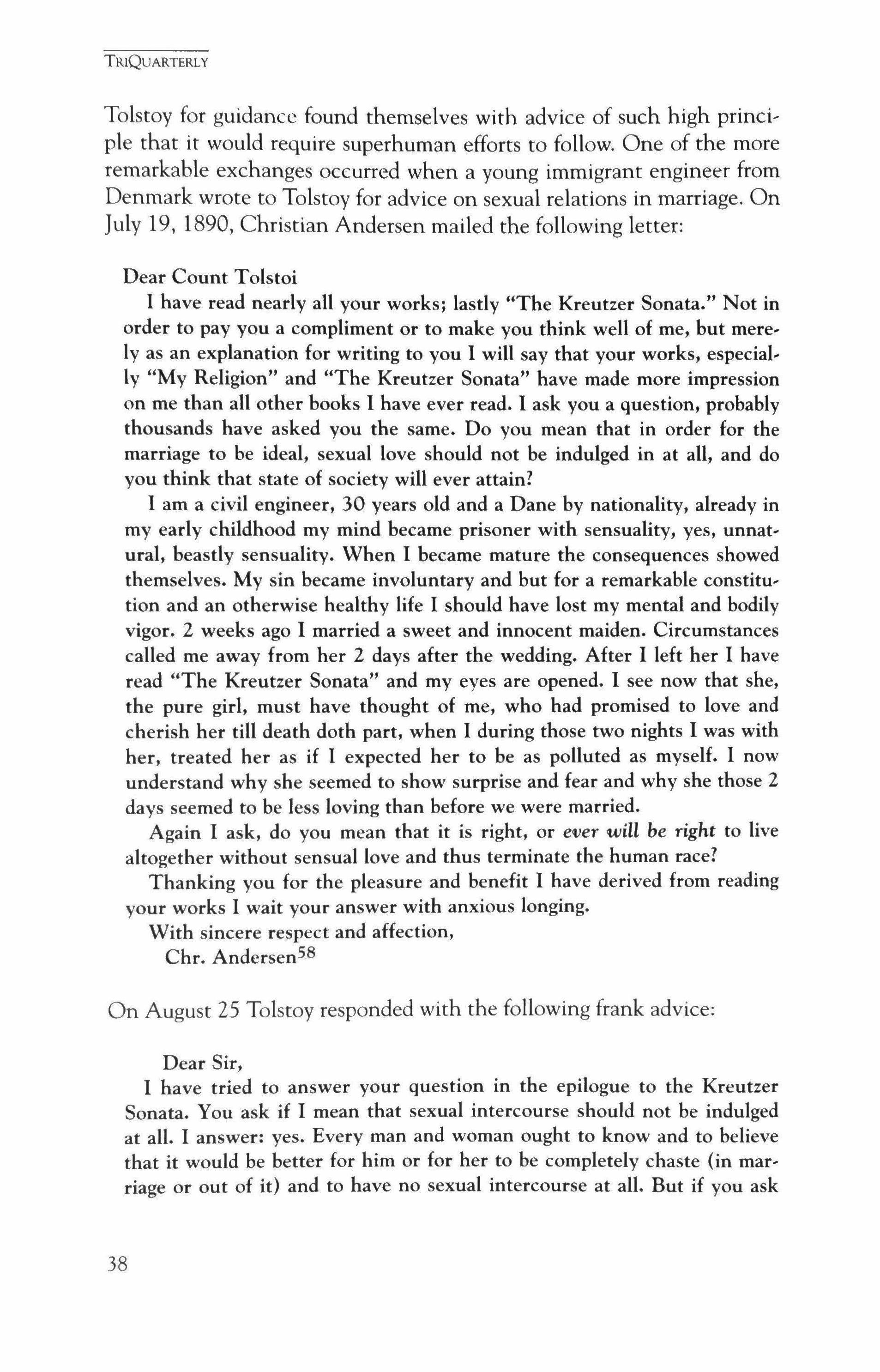
Tolstoy for guidance found themselves with advice of such high principle that it would require superhuman efforts to follow. One of the more remarkable exchanges occurred when a young immigrant engineer from Denmark wrote to Tolstoy for advice on sexual relations in marriage. On July 19, 1890, Christian Andersen mailed the following letter:
Dear Count Tolstoi
I have read nearly all your works; lastly "The Kreutzer Sonata." Not in order to pay you a compliment or to make you think well of me, but mere, ly as an explanation for writing to you I will say that your works, especial, ly "My Religion" and "The Kreutzer Sonata" have made more impression on me than all other books I have ever read. I ask you a question, probably thousands have asked you the same. Do you mean that in order for the marriage to be ideal, sexual love should not be indulged in at all, and do you think that state of society will ever attain?
I am a civil engineer, 30 years old and a Dane by nationality, already in my early childhood my mind became prisoner with sensuality, yes, unnatural, beastly sensuality. When I became mature the consequences showed themselves. My sin became involuntary and but for a remarkable constitution and an otherwise healthy life I should have lost my mental and bodily vigor. 2 weeks ago I married a sweet and innocent maiden. Circumstances called me away from her 2 days after the wedding. After I left her I have read "The Kreutzer Sonata" and my eyes are opened. I see now that she, the pure girl, must have thought of me, who had promised to love and cherish her till death doth part, when I during those two nights I was with her, treated her as if I expected her to be as polluted as myself. I now understand why she seemed to show surprise and fear and why she those 2 days seemed to be less loving than before we were married.
Again I ask, do you mean that it is right, or ever will be right to live altogether without sensual love and thus terminate the human race?
Thanking you for the pleasure and benefit I have derived from reading your works I wait your answer with anxious longing.
With sincere respect and affection, Chr. Andersen58
On August 25 Tolstoy responded with the following frank advice:
Dear Sir,
I have tried to answer your question in the epilogue to the Kreutzer Sonata. You ask if I mean that sexual intercourse should not be indulged at all. I answer: yes. Every man and woman ought to know and to believe that it would be better for him or for her to be completely chaste (in mar' riage or out of it) and to have no sexual intercourse at all. But if you ask
TRIQUARTERLY
38
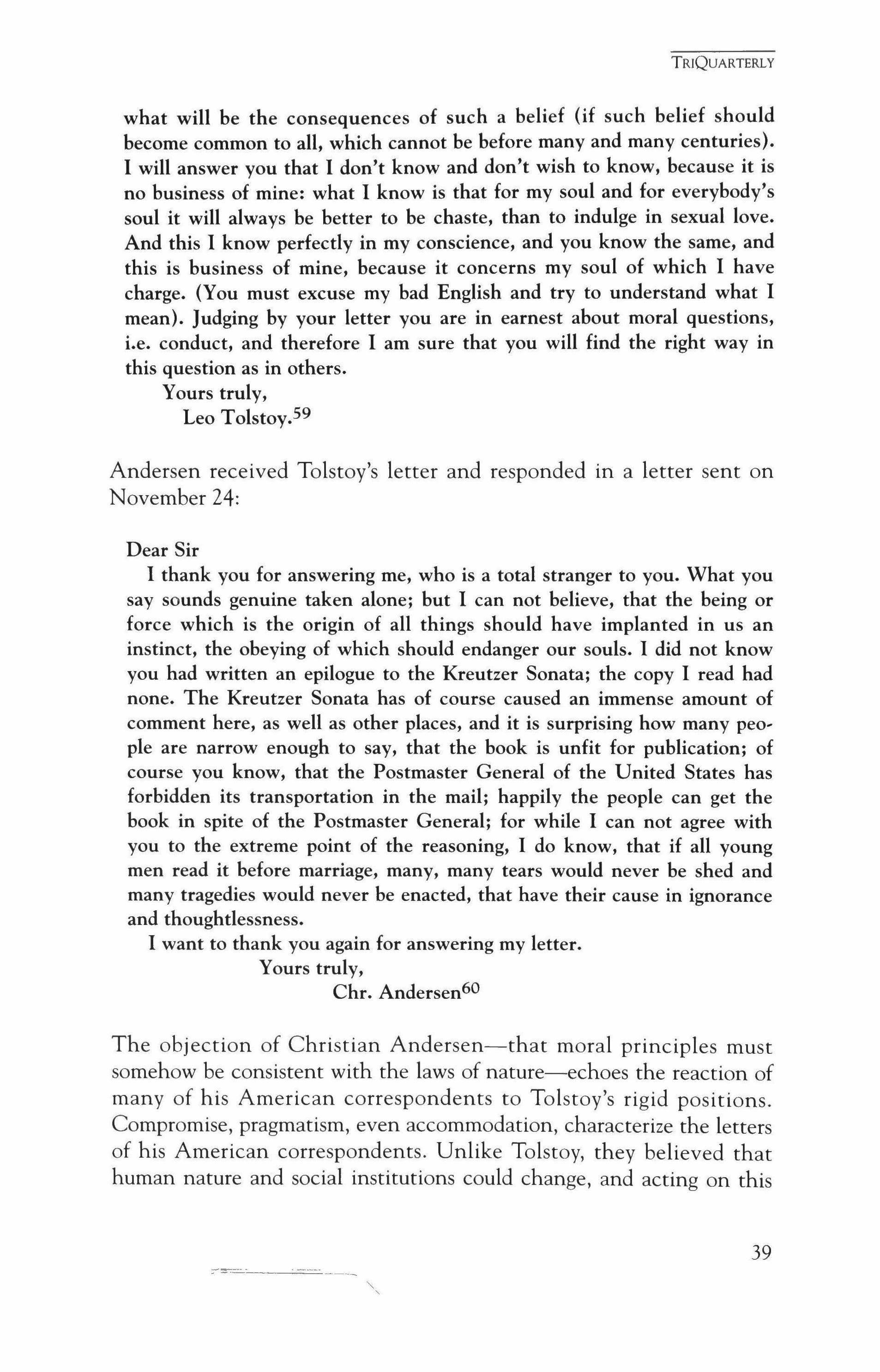
what will be the consequences of such a belief (if such belief should become common to all, which cannot be before many and many centuries). I will answer you that I don't know and don't wish to know, because it is no business of mine: what I know is that for my soul and for everybody's soul it will always be better to be chaste, than to indulge in sexual love. And this I know perfectly in my conscience, and you know the same, and this is business of mine, because it concerns my soul of which I have charge. (You must excuse my bad English and try to understand what I mean). Judging by your letter you are in earnest about moral questions, i.e. conduct, and therefore I am sure that you will find the right way in this question as in others.
Yours truly, Leo Tolstoy.59
Andersen received Tolstoy's letter and responded in a letter sent on November 24:
Dear Sir
I thank you for answering me, who is a total stranger to you. What you say sounds genuine taken alone; but I can not believe, that the being or force which is the origin of all things should have implanted in us an instinct, the obeying of which should endanger our souls. I did not know you had written an epilogue to the Kreutzer Sonata; the copy I read had none. The Kreutzer Sonata has of course caused an immense amount of comment here, as well as other places, and it is surprising how many people are narrow enough to say, that the book is unfit for publication; of course you know, that the Postmaster General of the United States has forbidden its transportation in the mail; happily the people can get the book in spite of the Postmaster General; for while I can not agree with you to the extreme point of the reasoning, I do know, that if all young men read it before marriage, many, many tears would never be shed and many tragedies would never be enacted, that have their cause in ignorance and thoughtlessness.
I want to thank you again for answering my letter.
Yours truly, Chr. Andersen60
The objection of Christian Andersen-that moral principles must somehow be consistent with the laws of nature-echoes the reaction of many of his American correspondents to Tolstoy's rigid positions. Compromise, pragmatism, even accommodation, characterize the letters of his American correspondents. Unlike Tolstoy, they believed that human nature and social institutions could change, and acting on this
TRIQUARTERLY
39

belief they set about to alter and improve them. Seeing Tolstoy as their ally at first, many discovered upon further contact that he could be harshly critical of their efforts. Such was the force and attractiveness of his writing, however, that Americans continued to be fascinated by his views. Often unaware of how extreme were the principles that stood unbendingly behind his works, they responded positively, with deep respect and enthusiasm to Tolstoy's powerful expression of his beliefs.
Notes
1. Dorothy Brewster, East,West Passage. A Study in Literary Relationships (London: George Allen & Unwin, 1954), p. 110. My Religion (the title of the English translation of Tolstoy's "What I Believe"-"V chem moia vera") was not the first work of Tolstoy's to be published in America. Eugene Schuyler's translation of Tolstoy's story "The Cossacks" appeared in 1878, but it attracted little attention.
2. Tolstoy saved all the letters he received, which are now held in the Manuscript Division of the Tolstoy State Museum in Moscow. Only a very small portion of these letters have been published (the largest number in Tolstoi i zarubezhnyi mir (Literatumoe nasledstvo, vol. 75, book 1. Moscow: 1965). The joint U.S.-Russian project "Tolstoy and His U.S. Correspondents" has recently finished the first complete cataloging and description of these letters, a data base of which is now available.
3. The accurate identification of his American correspondents (see note 2) has given fresh impetus to the search for Tolstoy's autograph letters. From 1895 to 1910 Tolstoy kept copybooks of all his correspondence, which provide texts of some of the missing letters he presumably sent; secretaries and others who worked with Tolstoy also kept copies of his letters. Tolstoy had the habit of marking the envelopes or letters he received with "otv." (to answer or answered) and "b.o." (no answer). A total of 321 letters received from America were marked "otv." Of these, 183 autograph letters by Tolstoy have been located in American collections. Of the nearly 150 letters assumed to have been sent to America, but whose autograph texts have not been found, Tolstoy's draft texts or copies of only about twenty-five have been identified. In the present publication, only misspellings in Tolstoy's original English texts have been corrected; the original punctuation has not been altered.
4. He wrote the largest number of letters, nineteen, to his American disciple Ernest Howard Crosby, with whom Tolstoy and his family exchanged a total of seventy letters from 1890 through 1907. The largest and longest correspondence was with Isabel Hapgood, translator and journalist, who exchanged ninety letters with the Tolstoys (nine letters were written by Leo) from 1887 through 1913. The only other extensive correspondences between Tolstoy and Americans are an exchange of fourteen letters with the Shakers Frederick
TRIQUARTERLY
40

Evans and Alonzo Hollister (Tolstoy wrote one to the former and three to the latter) and an exchange of twelve letters (Tolstoy wrote five) with a retired businessman of Russian origin turned journalist, Peter Demens.
5. Tolstoy's principal tract written against the Spanish-American War is "Dve voiny" ("Two Wars," 1898).
6. Ernest Howard Crosby. Captain Jinks Hero (London, 1902). Herbert Welsh. The Other Man's Country. An Appeal to Conscience. (Philadelphia, 1900).
7. Autograph letter, Herbert Welsh to L. N. Tolstoy, November 18, 1902, typed, 4 sheets, Tolstoy State Museum: Ts 245 106.
8. Autograph draft, Tolstoy State Museum, Copybook no. 5, sheet 92.
9. My Confession. Dogmatic Theology. My Religion. On Life. Trans. and ed. Leo Wiener. Boston: Dana Estes, 1904. Illustrated Sterling Edition. "Bethink Yourselves!' Count Tolstoi on the War," trans. V. Tchertkoff, I. F. Mayo. New York Times, July 10,1904; Living Age, no. 242 (series 7, vol. 24),1904, pp. 25768.
10. Perhaps the edition of Leo Wiener, see note 9.
11. Luke 12.49: "I am corne to send fire on the earth; and what will I, if it be already kindled?"
12. Autograph letter, J. H. Reeve to L. N. Tolstoy, July 31, 1904, 2 sheets, Tolstoy State Museum: Ts 235 58. The "paper" and copy of Tolstoy's article were not with the letter, nor was the open letter to W. J. Bryan (who visited Tolstoy December 18, 1903).
13. Tolstoy State Museum, Copybook no. 6, sheet 220.
14. Autograph letter, J. H. Reeve to L. N. Tolstoy, November 18, 1908, 1 sheet, Tolstoy State Museum: "posledniaia papka."
15. Autograph letter, Mrs. Martha McWhirter to L. N. Tolstoy, August 28, 1891, Tolstoy State Museum: Ts 227. In this and her second letter, only spelling has been corrected and some punctuation added (or changed) for clarity.
16. Autograph draft letter, Tolstoy State Museum.
17. Church and State, and Other Essays, Including: Money; Man and Woman, Their Respective Functions; The Mother; A Second Supplement to the Kreutzer Sonata, trans. Victor Yarros, G. Schumm. Boston: B. R. Tucker, 1891. The second item is perhaps: The Fruits of Culture. A Comedy in Four Acts, trans. G. Schumm. Boston: B. R. Tucker, 1891.
18. Autograph letter, Martha McWhirter to L. N. Tolstoy, October 10, 1891, Tolstoy State Museum: Ts 227.
19. Two Generations. New York: J. W. Lovell Co., 1888. The work is Tolstoy's early novella "Two Hussars" (1856), whose subject is the opposition of two generations. It was published first (and frequently thereafter) under its original title in A Russian Proprietor and Other Stories, trans. N. H. Dole. New York: Crowell, 1887.
20. Autograph letter, Ada Haymond to L. N. Tolstoy, December 1, 1896, 2 sheets, Tolstoy State Museum: Ts 219 53. Only punctuation has been altered for clarity.
TRIQUARTERLY
41
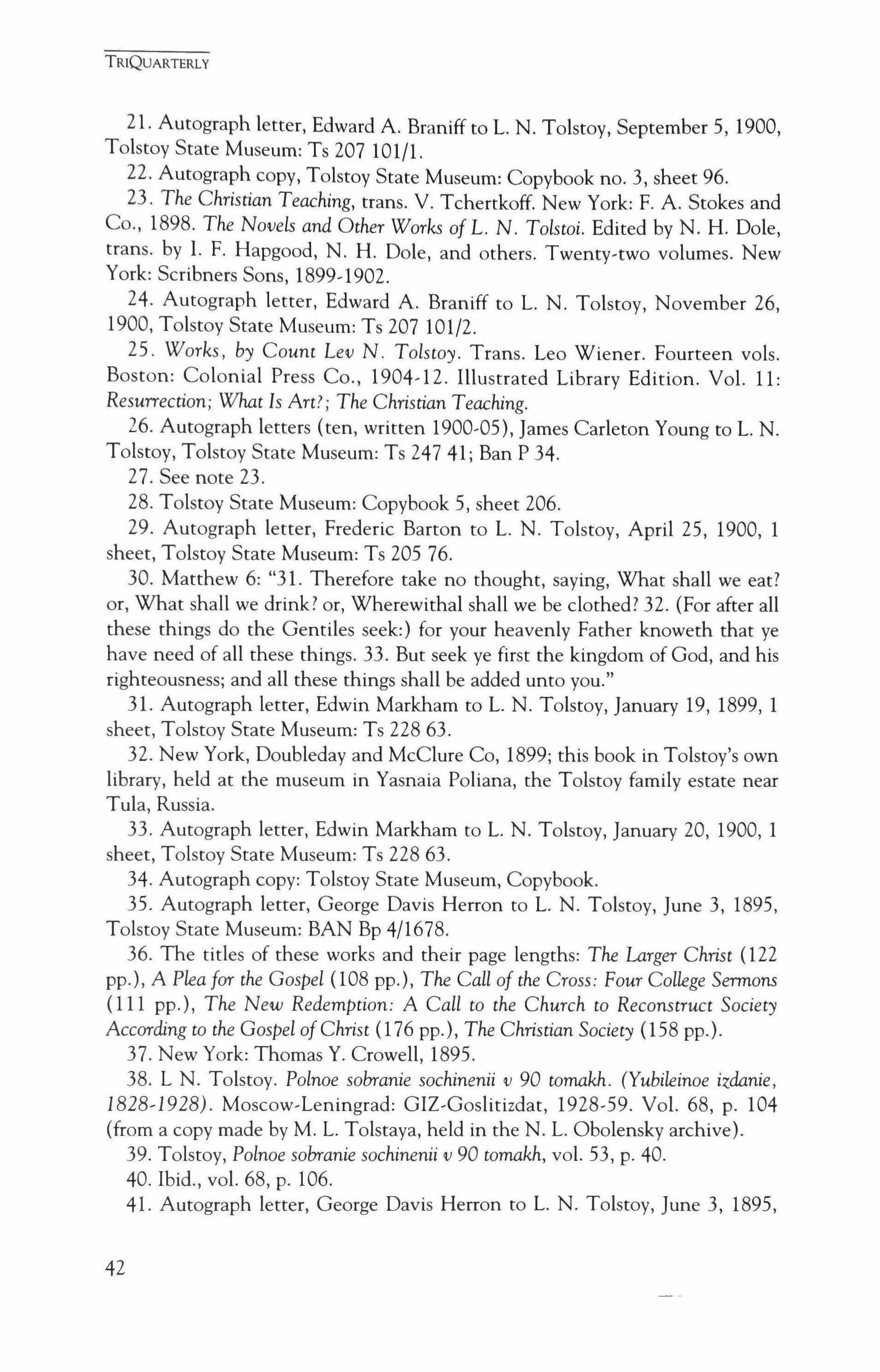
21. Autograph letter, Edward A. Braniff to L. N. Tolstoy, September 5, 1900, Tolstoy State Museum: Ts 207 101/1.
22. Autograph copy, Tolstoy State Museum: Copybook no. 3, sheet 96.
23. The Christian Teaching, trans. V. Tchertkoff. New York: F. A. Stokes and Co., 1898. The Novels and Other Works of L. N. Tolstoi. Edited by N. H. Dole, trans. by 1. F. Hapgood, N. H. Dole, and others. Twenty-two volumes. New York: Scribners Sons, 1899-1902.
24. Autograph letter, Edward A. Braniff to L. N. Tolstoy, November 26, 1900, Tolstoy State Museum: Ts 207101/2.
25. Works, by Count Lev N. Tolstoy. Trans. Leo Wiener. Fourteen vols. Boston: Colonial Press Co., 1904-12. Illustrated Library Edition. Vol. 11: Resurrection; What Is Art?; The Christian Teaching.
26. Autograph letters (ten, written 1900-05), James Carleton Young to L. N. Tolstoy, Tolstoy State Museum: Ts 247 41; Ban P 34.
27. See note 23.
28. Tolstoy State Museum: Copybook 5, sheet 206.
29. Autograph letter, Frederic Barton to L. N. Tolstoy, April 25, 1900, 1 sheet, Tolstoy State Museum: Ts 20576.
30. Matthew 6: "31. Therefore take no thought, saying, What shall we eat? or, What shall we drink? or, Wherewithal shall we be clothed? 32. (For after all these things do the Gentiles seek.) for your heavenly Father knoweth that ye have need of all these things. 33. But seek ye first the kingdom of God, and his righteousness; and all these things shall be added unto you."
31. Autograph letter, Edwin Markham to L. N. Tolstoy, January 19, 1899, 1 sheet, Tolstoy State Museum: Ts 228 63.
32. New York, Doubleday and McClure Co, 1899; this book in Tolstoy's own library, held at the museum in Yasnaia Poliana, the Tolstoy family estate near Tula, Russia.
33. Autograph letter, Edwin Markham to L. N. Tolstoy, January 20, 1900,1 sheet, Tolstoy State Museum: Ts 228 63.
34. Autograph copy: Tolstoy State Museum, Copybook.
35. Autograph letter, George Davis Herron to L. N. Tolstoy, June 3, 1895, Tolstoy State Museum: BAN Bp 4/1678.
36. The titles of these works and their page lengths: The Larger Christ (122 pp.), A Plea for the Gospel (108 pp.), The Call of the Cross: Four College Sermons (111 pp.), The New Redemption: A Call to the Church to Reconstruct Society According to the Gospel of Christ (176 pp.), The Christian Society (158 pp.).
37. New York: Thomas Y. Crowell, 1895.
38. L N. Tolstoy. Polnoe sobranie sochinenii v 90 tomakh. (Yubileinoe izdanie, 1828-1928). Moscow-Leningrad: GIZ-Goslitizdat, 1928-59. Vol. 68, p. 104 (from a copy made by M. L. Tolstaya, held in the N. L. Obolensky archive).
39. Tolstoy, Polnoe sobranie sochinenii v 90 tomakh, vol. 53, p. 40.
40. Ibid., vol. 68, p. 106.
41. Autograph letter, George Davis Herron to L. N. Tolstoy, June 3, 1895,
TRIQUARTERLY
42
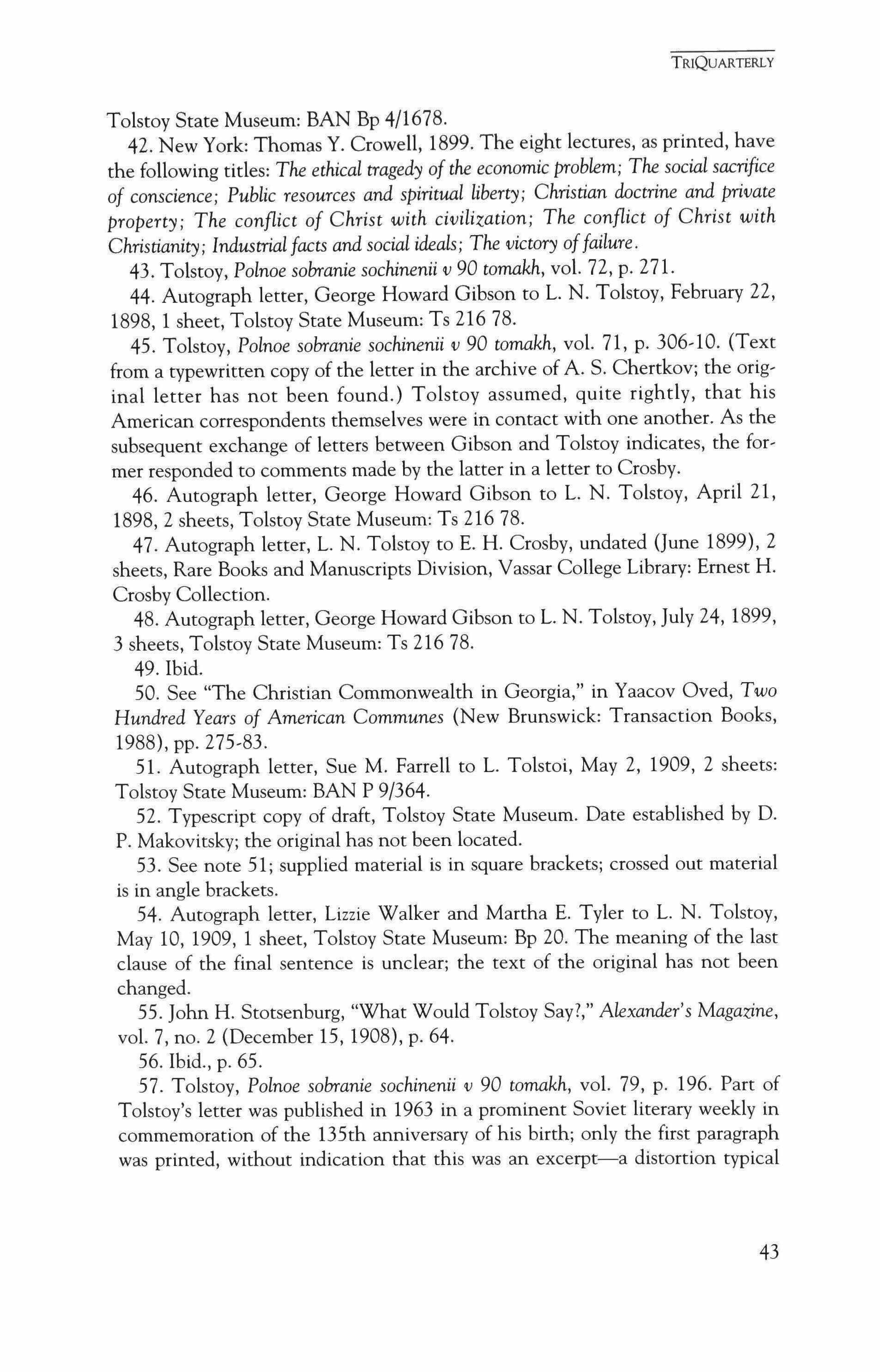
Tolstoy State Museum: BAN Bp 4/1678.
42. New York: Thomas Y. Crowell, 1899. The eight lectures, as printed, have the following titles: The ethical tragedy of the economic problem; The social sacrifice of conscience; Public resources and spiritual liberty; Christian doctrine and private property; The conflict of Christ with civilization; The conflict of Christ with Christianity; Industrial facts and social ideals; The victory offailure.
43. Tolstoy, Polnoe sobranie sochinenii v 90 tomakh, vol. 72, p. 271.
44. Autograph letter, George Howard Gibson to L. N. Tolstoy, February 22, 1898, 1 sheet, Tolstoy State Museum: Ts 216 78.
45. Tolstoy, Polnoe sobranie sochinenii v 90 tomakh, vol. 71, p. 306-10. (Text from a typewritten copy of the letter in the archive of A. S. Chertkov; the original letter has not been found.) Tolstoy assumed, quite rightly, that his American correspondents themselves were in contact with one another. As the subsequent exchange of letters between Gibson and Tolstoy indicates, the former responded to comments made by the latter in a letter to Crosby.
46. Autograph letter, George Howard Gibson to L. N. Tolstoy, April 21, 1898,2 sheets, Tolstoy State Museum: Ts 216 78.
47. Autograph letter, L. N. Tolstoy to E. H. Crosby, undated (June 1899), 2 sheets, Rare Books and Manuscripts Division, Vassar College Library: Ernest H. Crosby Collection.
48. Autograph letter, George Howard Gibson to L. N. Tolstoy, July 24, 1899, 3 sheets, Tolstoy State Museum: Ts 216 78.
49. Ibid.
50. See "The Christian Commonwealth in Georgia," in Yaacov Oved, Two Hundred Years of American Communes (New Brunswick: Transaction Books, 1988), pp. 275-83.
51. Autograph letter, Sue M. Farrell to L. Tolstoi, May 2, 1909, 2 sheets: Tolstoy State Museum: BAN P 9/364.
52. Typescript copy of draft, Tolstoy State Museum. Date established by D. P. Makovitsky; the original has not been located.
53. See note 51; supplied material is in square brackets; crossed out material is in angle brackets.
54. Autograph letter, Lizzie Walker and Martha E. Tyler to L. N. Tolstoy, May 10, 1909, 1 sheet, Tolstoy State Museum: Bp 20. The meaning of the last clause of the final sentence is unclear; the text of the original has not been changed.
55. John H. Stotsenburg, "What Would Tolstoy Say?," Alexander's Magazine, vol. 7, no. 2 (December 15,1908), p. 64.
56. Ibid., p. 65.
57. Tolstoy, Polnoe sobranie sochinenii v 90 tomakh, vol. 79, p. 196. Part of Tolstoy's letter was published in 1963 in a prominent Soviet literary weekly in commemoration of the 135th anniversary of his birth; only the first paragraph was printed, without indication that this was an excerpt-a distortion typical
TRIQUARTERLY
43

TRIQUARTERLY
of Soviet ideology and censorship at that time (UK 135-letiiu so dnia rozhdeniia L. N. Tolstogo," Literaturnaia gazeta, September 10, 1963).
58. Autograph letter, Christian Andersen to L. N. Tolstoy, July 19, 1890, 1 sheet, Tolstoy State Museum: Ts 204 74.
59. Tolstoy, Polnoe sobranie sochinenii v 90 tornakh, vol. 65, pp. 149-50. Text from a copy made by V. Chertkov; the original has not been located.
60. Autograph letter, Christian Andersen to L. N. Tolstoy, November 24, 1890, 1 sheet, Tolstoy State Museum: Ts 204 74.
44
RATES: $2·00 PER DAY.
.' .' �

Jf&teifutnw; �aGOl 't<t.
SAMPLE ROOMS FREE. ptUOr:, 'f"!. I -.-.--".- 4 8 ,----a_ /J � � e-L� e--/- � �-?' � '7 � �/�h-�� u.- z-'---f"-�r- � Y'-� /?-/- '----- b� �� 9 4fC---<.-<.. d�'?C" /.2-L-�_ �<V/- �-"'----'--' � � J�-,�-�y� -;tY-��/- �---1 tf�7- �- ? � �- :?� /� -jz JI � � � G-z- �_c./k�:/..-- t.-<;;:z- � ;�z�'�/��tJ �a-J'/- �� � ��/¢?�-<.J2._ :p/?<--�� � 4/",------, /J/ �L.-'Z... Zz:__.__ -�...--�� L; .:» ;.-#/� �-;;-� � -5"-4"fa_�� ()�_�J/&i.Jc �<Z-- �r��-! c;_�<--<--<-- �-� �- c-:; �� Q__� ��.;;.r C-� � �c../ -9 � � � c..___.?---<---<.. ./?Jl. --cy����r ( CZI4-:7) J_JcZ- �'7/ � /U� /..:ldL;J a- y�
"\ \ \ \ \
Iowa City: Early April
Robert Hass
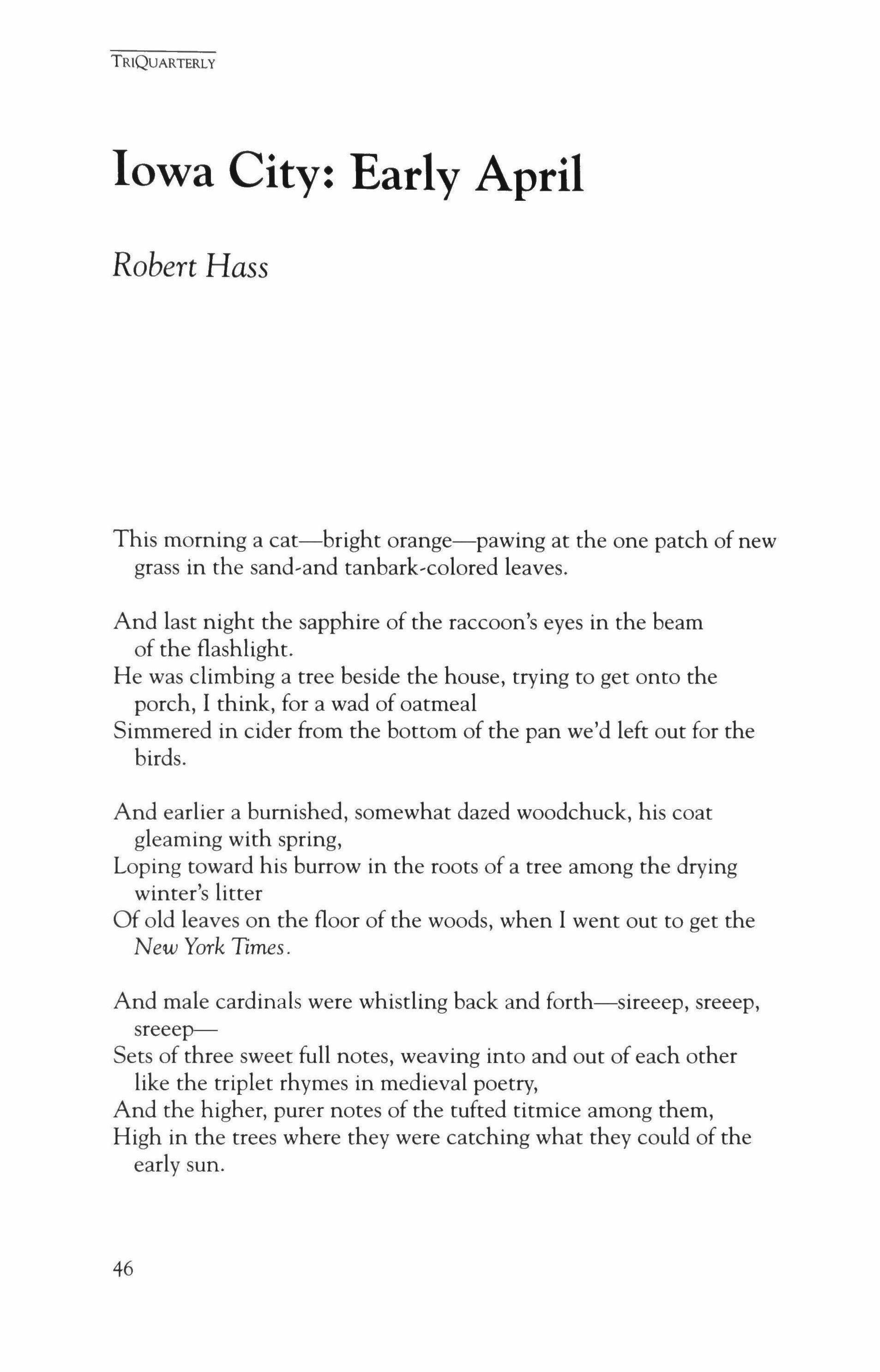
This morning a cat-bright orange-pawing at the one patch of new grass in the sand-and tanbark-colored leaves.
And last night the sapphire of the raccoon's eyes in the beam of the flashlight.
He was climbing a tree beside the house, trying to get onto the porch, I think, for a wad of oatmeal
Simmered in cider from the bottom of the pan we'd left out for the birds.
And earlier a burnished, somewhat dazed woodchuck, his coat gleaming with spring, Loping toward his burrow in the roots of a tree among the drying winter's litter
Of old leaves on the floor of the woods, when I went out to get the New York Times.
And male cardinals were whistling back and forth-sireeep, sreeep, sreeep--
Sets of three sweet full notes, weaving into and out of each other like the triplet rhymes in medieval poetry, And the higher, purer notes of the tufted titmice among them, High in the trees where they were catching what they could of the early sun.
TRIQUARTERLY
46

And a doe and two yearlings, picking their way along the worrying path they'd made through the gully, their coats the color of the forest floor,
Stopped just at the roots of the great chestnut where the woodchuck's burrow was, Froze, and the doe looked back over her shoulder at me for a long moment, and leapt forward, Her young following, and bounded with that almost mincing precision in the landing of each hoof
Up the gully, over it, and out of sight. So that I remembered Dreaming last night that a deer walked into the house while I was writing at the kitchen table, Came in the glass door from the garden, looked at me with a stilled defiant terror, like a thing with no choices,
And, neck bobbing in that fragile-seeming, almost mechanical mix of arrest and liquid motion, came to the table
And snatched a slice of apple, and stood, and then quietened, and to my surprise did not leave again.
And those little captains, the chickadees, swift to the feeder and swift away.
And the squirrels with their smoke-plume tails trailing digging in the leaves to bury or find buried-
I'm told they don't remember where they put things, that it's an activity of incessant discoveryNuts, tree-fall proteins, whatever they forage from around the house of our leavings,
And the flameheaded woodpecker at the suet with his black-and-white ladderback elegant fiercenessThey take sunflower seeds and stash them in the rough ridges of the tree's bark
Where the beaks of the smoke-and-steel-blue nuthatches can't quite get at them-
Though the nuthatches sometimes seem to get them as they con the trees methodically for spiders' eggs or some other overwintering insect's intricately packaged lump of futurity
Got from its body before the cold came on.
TRIQUARTERLY
47
TRIQUARTERLY
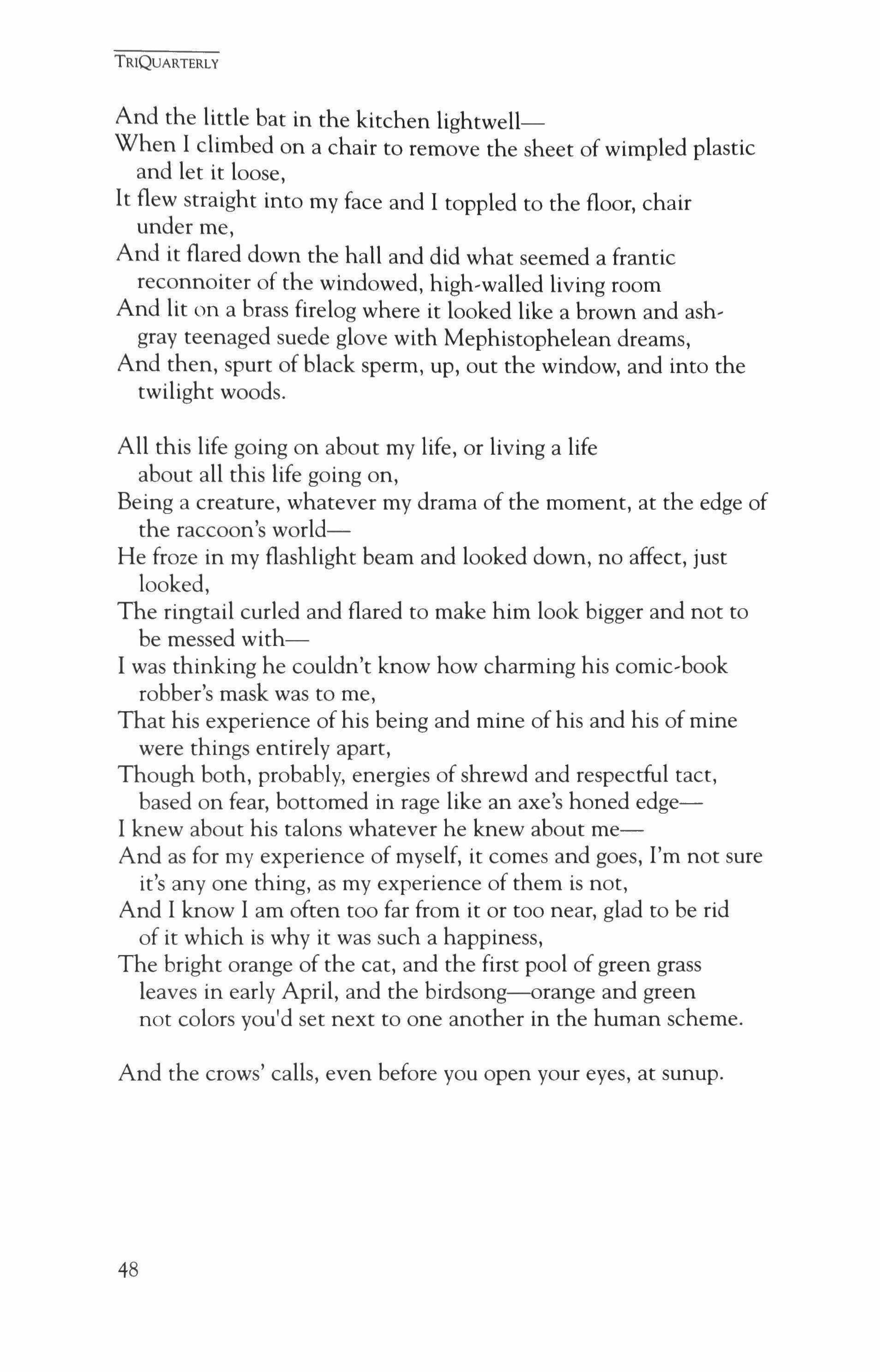
And the little bat in the kitchen lightwellWhen I climbed on a chair to remove the sheet of wimpled plastic and let it loose,
It flew straight into my face and I toppled to the floor, chair under me,
And it flared down the hall and did what seemed a frantic reconnoiter of the windowed, high-walled living room
And lit on a brass firelog where it looked like a brown and ashgray teenaged suede glove with Mephistophelean dreams, And then, spurt of black sperm, up, out the window, and into the twilight woods.
All this life going on about my life, or living a life about all this life going on,
Being a creature, whatever my drama of the moment, at the edge of the raccoon's world-
He froze in my flashlight beam and looked down, no affect, just looked,
The ringtail curled and flared to make him look bigger and not to be messed with-
I was thinking he couldn't know how charming his comic-book robber's mask was to me,
That his experience of his being and mine ofhis and his of mine were things entirely apart,
Though both, probably, energies of shrewd and respectful tact, based on fear, bottomed in rage like an axe's honed edgeI knew about his talons whatever he knew about me-
And as for my experience of myself, it comes and goes, I'm not sure it's anyone thing, as my experience of them is not,
And I know I am often too far from it or too near, glad to be rid of it which is why it was such a happiness,
The bright orange of the cat, and the first pool of green grass leaves in early April, and the birdsong-orange and green not colors you'd set next to one another in the human scheme.
And the crows' calls, even before you open your eyes, at sunup.
48
On with the Story
John Barth
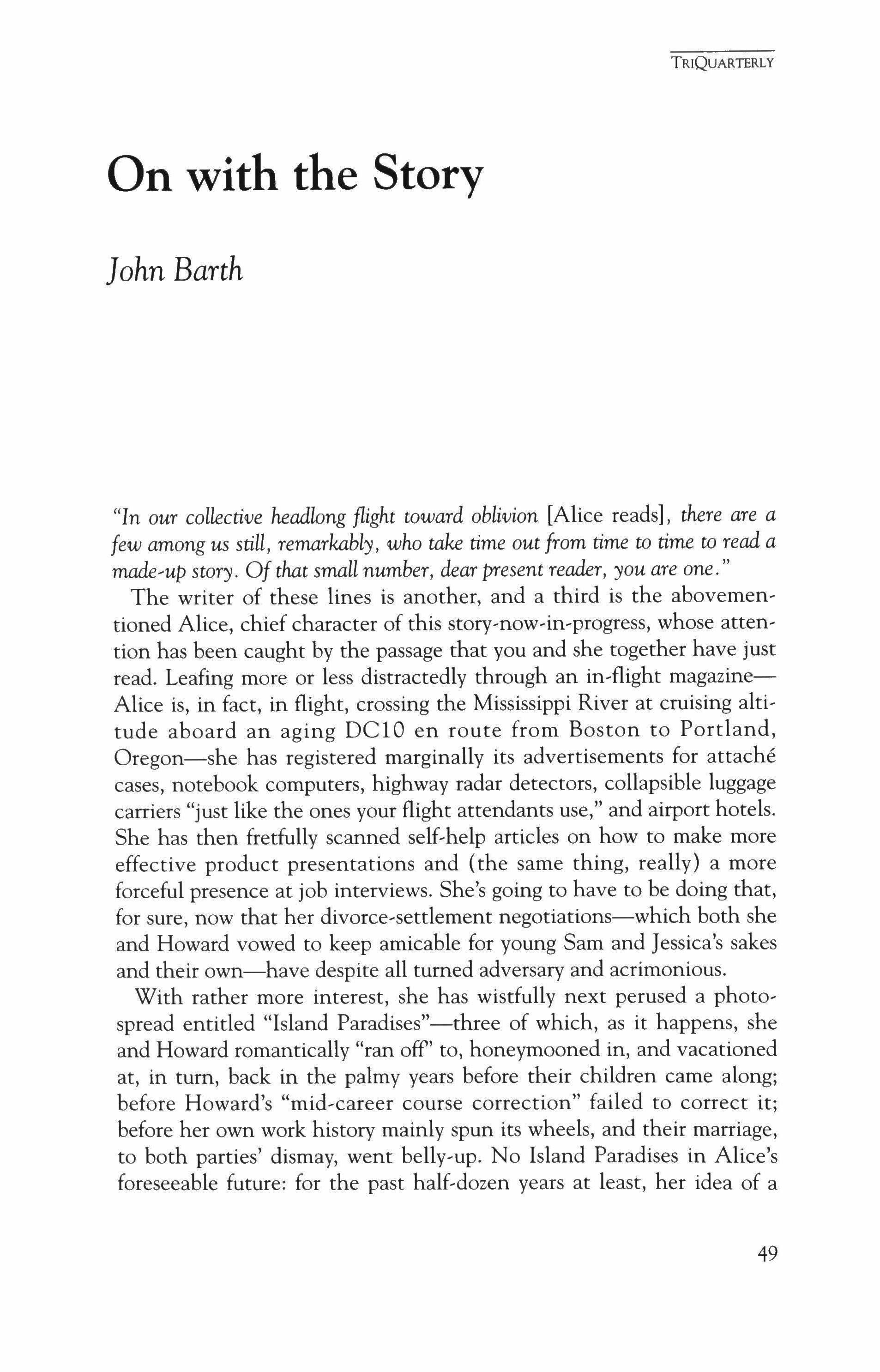
"In our collective headlong flight toward oblivion [Alice reads], there are a few among us still, remarkably, who take time out from time to time to read a made�up story. Of that small number, dear present reader, you are one."
The writer of these lines is another, and a third is the abovernentioned Alice, chief character of this story-now-in-progress, whose attention has been caught by the passage that you and she together have just read. Leafing more or less distractedly through an in-flight magazineAlice is, in fact, in flight, crossing the Mississippi River at cruising altitude aboard an aging OCIO en route from Boston to Portland, Oregon-she has registered marginally its advertisements for attache cases, notebook computers, highway radar detectors, collapsible luggage carriers "just like the ones your flight attendants use," and airport hotels. She has then fretfully scanned self-help articles on how to make more effective product presentations and (the same thing, really) a more forceful presence at job interviews. She's going to have to be doing that, for sure, now that her divorce-settlement negotiations-which both she and Howard vowed to keep amicable for young Sam and Jessica's sakes and their own-have despite all turned adversary and acrimonious.
With rather more interest, she has wistfully next perused a photospread entitled "Island Paradises"-three of which, as it happens, she and Howard romantically "ran off' to, honeymooned in, and vacationed at, in tum, back in the palmy years before their children came along; before Howard's "mid-career course correction" failed to correct it; before her own work history mainly spun its wheels, and their marriage, to both parties' dismay, went belly-up. No Island Paradises in Alice's foreseeable future: for the past half-dozen years at least, her idea of a
TRIQUARTERLY
49

quality vacation has been a weekend's state-park camping with the kids (but they're in junior high and high school now, ever less interested in roughing it en famille, especially just with Mom) or a week at her parents' summer place on Cape Cod. It's from one of those latter that she's just now returning, leaving Jessica and Sam for an additional fortnight with their maternal grandparents. To Alice's embarrassment, all hands' airfares have had to be on the old folks' tab; she and Howard simply haven't the resources to finance cross-country family visits. They haven't even a savings fund for the kids' rapidly upcoming college expenses, for pity's sake, typically the middle-class American family's single largest capital outlay. After eighteen years of marriage, this decoupling couple's only real nest egg is a few thousand dollars gained not by programmatic saving but by refinancing the nest when home-mortgage rates dropped a few years ago-and now Howard's insisting that that egg be split fifty-fifty. Likewise their equity in the house itself, which he wants sold; likewise further their children's custody, although his proposals for the logistical management of that last item strike Alice as risible if not disingenuous-possibly a ploy to reduce his child-support payments.
How in the world, she has wondered in mid-photo-spread ("The Other British Virgins"), did her parents' generation-the generation that generated the postwar Baby Boom whereof she and Howard are dues-paying members-manage? Typically on one income, or one and a fraction, American middle-class couples like Alice's folks and Howard's contrived to send two, three, even four offspring through college-sometimes even through private colleges, not the local state diploma-mills that Sam and Jessica will have to make do with-and in Alice's case to private high school before that, not to mention affording them piano lessons, dance and horseback-riding lessons, art lessons, a house to grow up in considerably more spacious than Sam and Jessica's (in a better neighborhood, too), and in later years even a vacation home as well? Howard's father, moreover, managed all this while himself divorcing and remarrying at his son's present age; gave his first wife their commodious house free and clear for the children to finish their high-school years in, plus enough alimony to maintain her and them therein till they were off to college at his expense and she remarried-and on top of that paid all of her divorce-lawyer's fees as well as his own, with the result that Howard's mother (how Alice now envies her in thisl) had had the luxury of protracting the negotiations at her leisure and at her estranged husband's cost. All this, mind, in a divorce action that, like Alice and
TRIQUARTERLY
50
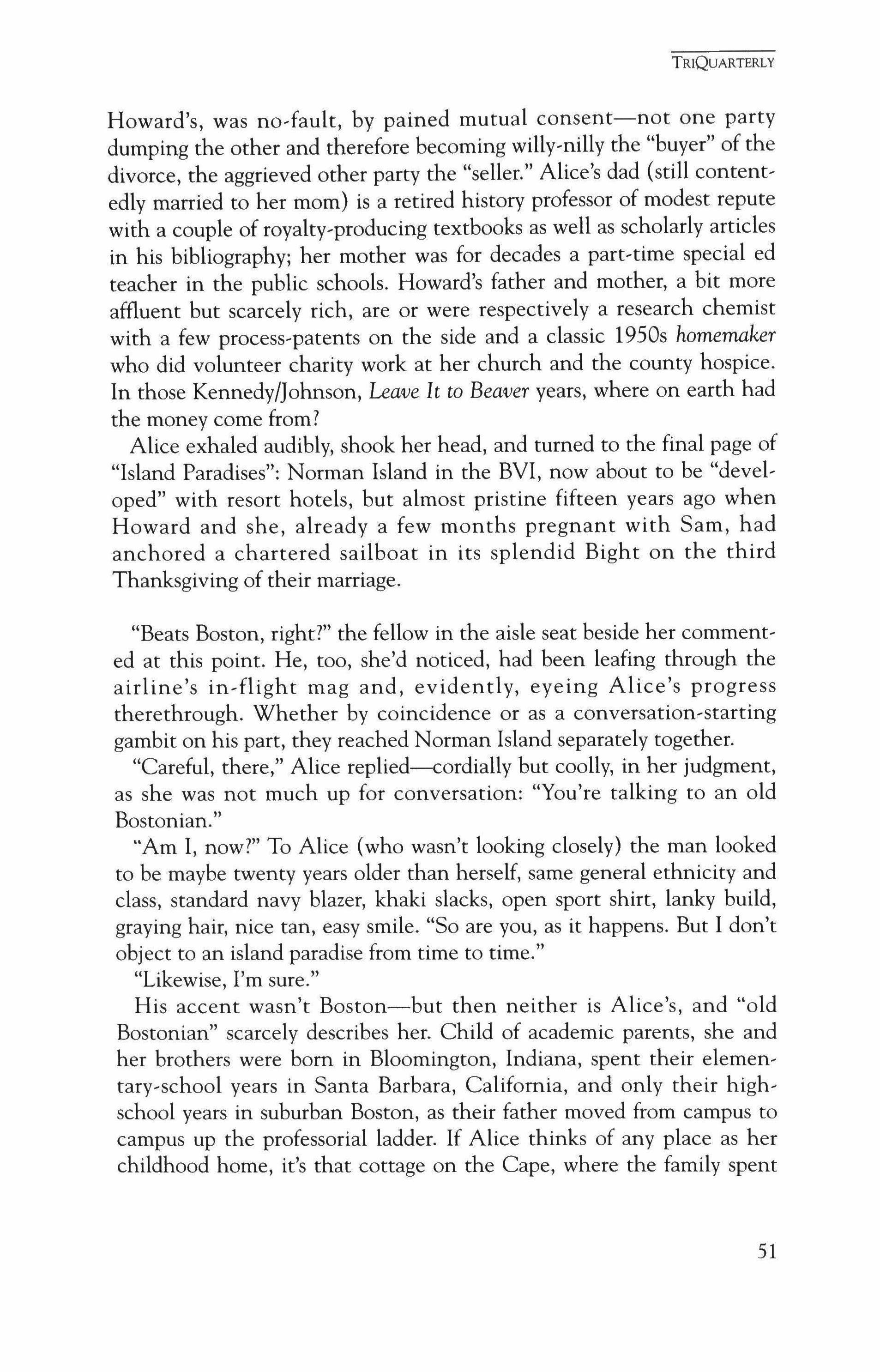
Howard's, was no-fault, by pained mutual consent-not one party dumping the other and therefore becoming willv-nilly the "buyer" of the divorce, the aggrieved other party the "seller." Alice's dad (still contentedly married to her mom) is a retired history professor of modest repute with a couple of royalty-producing textbooks as well as scholarly articles in his bibliography; her mother was for decades a part-time special ed teacher in the public schools. Howard's father and mother, a bit more affluent but scarcely rich, are or were respectively a research chemist with a few process-patents on the side and a classic 1950s homemaker who did volunteer charity work at her church and the county hospice. In those Kennedy/Johnson, Leave It to Beaver years, where on earth had the money come from?
Alice exhaled audibly, shook her head, and turned to the final page of "Island Paradises": Norman Island in the BVI, now about to be "developed" with resort hotels, but almost pristine fifteen years ago when Howard and she, already a few months pregnant with Sam, had anchored a chartered sailboat in its splendid Bight on the third Thanksgiving of their marriage.
"Beats Boston, right?" the fellow in the aisle seat beside her commented at this point. He, too, she'd noticed, had been leafing through the airline's in-flight mag and, evidently, eyeing Alice's progress therethrough. Whether by coincidence or as a conversation-starting gambit on his part, they reached Norman Island separately together.
"Careful, there," Alice replied-cordially but coolly, in her judgment, as she was not much up for conversation: "You're talking to an old Bostonian."
"Am I, now?" To Alice {who wasn't looking closely} the man looked to be maybe twenty years older than herself, same general ethnicity and class, standard navy blazer, khaki slacks, open sport shirt, lanky build, graying hair, nice tan, easy smile. "So are you, as it happens. But I don't object to an island paradise from time to time."
"Likewise, I'm sure."
His accent wasn't Boston-but then neither is Alice's, and "old Bostonian" scarcely describes her. Child of academic parents, she and her brothers were born in Bloomington, Indiana, spent their elementary-school years in Santa Barbara, California, and only their highschool years in suburban Boston, as their father moved from campus to campus up the professorial ladder. If Alice thinks of any place as her childhood home, it's that cottage on the Cape, where the family spent
TRIQUARTERLY
51

more summers together than school years anywhere. Her tone and manner did the job, if there was any to be done. Both passengers returned to their magazines, wherein "Island Paradises" turns out to be followed-unusual for an in-flight publication-by a bit of fietion: a short story called "Freeze Frame," its author's name unfamiliar to our protagonist. Alice is not, these days at least, much of a reader, of fietion or anything else beyond the lease, and sale-contracts that come across her part-time office desk and the textbooks on real-estate law, of all things, that she's been cramming lately in half,hearted preparation for her Oregon licensing exam. As a girl {whose parents strictly rationed their children's diet of television} she consumed novels the way Sam and Jessica consume Nintendo and junk food-and not just kiddie-novels. In her first-rate private high school {she wished Sam's public one were half as goodl), Fitzgerald's Great Gatsby and Turgenev's Fathers and Sons joyously broke her heart and enlarged her spirit. At Reed College in Portland {where she'd met pre-law Howard}, she'd been a sociology major with a serious minor in her favorite subject, literature; she read rapturously through the big Victorians and the early Modernists, and in her senior year considered with her dad and with Howard {by then her virtual fiance} the merits of sundry graduate departments of literature as well as sociology, with an eye toward advanced degrees in one or the other and an academic career.
All that seems another world to her now. She and Howard "ran off' to Barbados on holiday after graduation and presently thereafter married. She followed him to law school in New York, where she did pick-up copyediting to help pay the rent, and then-when he dropped out for reasons that they still argue over-to Chicago on an initially successful business venture with one of his father's chemical-patent partners {their Virgin Islands cruise and her happy first pregnancy date from this peri, od}. When the Chicago venture fizzled, she and young Sam and Jessica' in-the-works followed him back out to Portland and his present restless employ as a "product developer" for a pharmaceutical concern-while Alice herself, faute de mieux, "helps out" half-time these days in a down, town real-estate office. She has thus far resisted the mild advances of her more-or-less mentor there, although he's a civilized-seeming divorce himself and she's lonesome for adult male company now that she and Howard have split; but she guesses unenthusiastically that she'll take his advice and go for her broker's license. In the interstices of her frazzled life: videos with the kids, when she can get them peaceably assembled; regular jogging, to keep her spirits up and her body in shape for whatev-
TRIQUARTERLY
52

er next episode in her life-story: telephonic set-tos with Howard about economic and parental matters; the aforementioned odd camping week, end; maybe half an hour's thumbing through some glossy magazine like Elle or Vanity Fair: snapshots from yet another world. She scarcely man' ages to read the daily Oregonian these days beyond its real-estate section, much less literature; indeed, she probably ought to be re-reviewing the R. E. Board-exam stuff right now, as she has spent most of her "vacation" week doing. But she's supersaturated in that line; also depressed by her parents' loving, unspoken, but obvious disappointment in their only daughter's life-trajectory thus far and even with her upbringing of their grandchildren ("Mortal Kombat!" her dad had groaned in disbelief when young Sam fished out that video game-popular, portable, stupefying, and relentlessly violent-from his backpack the minute they arrived at the Cape Cod cottage, like a junkie in need of a fix).
Alice is, in fact, for perhaps the first time in her forty years, truly fear, ful of the future, whereof that real,estate'law manual is a token and wherefrom this in-flight magazine-like the round,trip flight itself and the less-than-refreshing vacation that it has bracketed-is an all-toobrief reprieve.
Literature, hah: Those were the days!
Thus the odd opening of that "Freeze Frame" story catches her attention. As she reads on, moreover, she finds herself involved in (and she'll presently be stopped still by) one of those vertiginous coincidences that happen now and then to readers of stories, attenders of movies, even swappers of anecdotes with one's fellow passengers through life: a correspondence stranger than fiction (even when one of the corresponding items is fiction) between the situation one is reading or hearing about and one's own. "Freeze Frame"-its first half, anyhow-turns out to involve a forty,year'old White,Anglo,Saxon,(lapsed),Protestant mid, dle-class American woman (name not given) who, like Alice, acutely knows herself to have passed the classical mezzo del cammin de nostra vita, as the author puts it, quoting the opening lines of Dante's Divine Comedy: a little past the halfway point of the Biblically allotted three, score-and-ten. Like Alice, "she" is a healthy human animal, though under sustained stress lately, and the daughter of still,living parents who themselves are in good health for their age. She knows therefore her expectable remaining life span, barring accident, to be slightly longer than the span behind her-more trying, too, she expects, although her story thus far, while relatively privileged, has by no means been carefree.
TRIQUARTERLY
53

The story's narrator calls its lead character's malaise "the Boomer Syndrome": Just as her middle-class-American generation is, by and large, the first of the century not to surpass its forebears in physical height and general health, so with many exceptions are its members likewise falling short, or feel themselves to be, in material, perhaps even spiritual, well-being. "Her" father and mother respectively Gl-Billed through state university and worked through secretarial school, the first in their families' history to "go past high school"; they flourished as a one-and-a-half-income family in the booming postwar U.S. economy and provided their children (four!) with a suburban upbringing at least as favored as Alice's and her brothers', substantially more favored than their own had been, and downright sybaritic compared to that of "her" grandparents. The parental generation managed the class-climb from small-shopkeeper to professional ("her" father was an estate-and-trust lawyer) and confidently supposed that their sons-maybe even their daughters-would likewise enter the professions on the strength of their excellent educations. But something-"Call it the countercultural Sixties," the author suggests in the story, "the oil-embargoed, 'stagflated' Seventies, the TV-narcotized beginning of the end of the American Century"-something had gone quietly but profoundly wrong.
And then less quietly. Of "her" two brothers, one has drifted from commune to hippie commune right up into the Reagan Eighties, his circuits blown on sixties methedrine; in his late thirties he half-supports himself as a longhaired mower of suburban lawns who converses with spirits as he maneuvers his Kubota wide-blade rig through the greenswards of Newton, Massachusetts. The other, after dropping out of two colleges plus law school (shades of Alice's Howard), is doing modestly in rural Maryland as a remodeler of small-town kitchens and bathrooms; he likes to work with his hands. Of the two girls, one has broken her parents' officially liberal hearts by "coming out" as a lesbian andafter a creditable West African tour of duty in the Peace Corps, a halfhearted suicide attempt, and a parentally subsidized stay in a Pittsburgh psychiatric hospital-settling down with her same-sex Significant Other to run a marginally successful New Age gift shop in San Diego. Not all that different a resume, changes changed, from Alice's gay brother's in his Key West cappuccino bar, which her parents gamely visit every second or third winter, not to lose touch altogether.
As for Her herself, whom let's capitalize henceforth for clarity and convenience: After "Freeze Frame"'s opening address to the dear present reader, said reader finds Her gridlocked in downtown St. Louis traffic,
TRIQUARTERlY
54
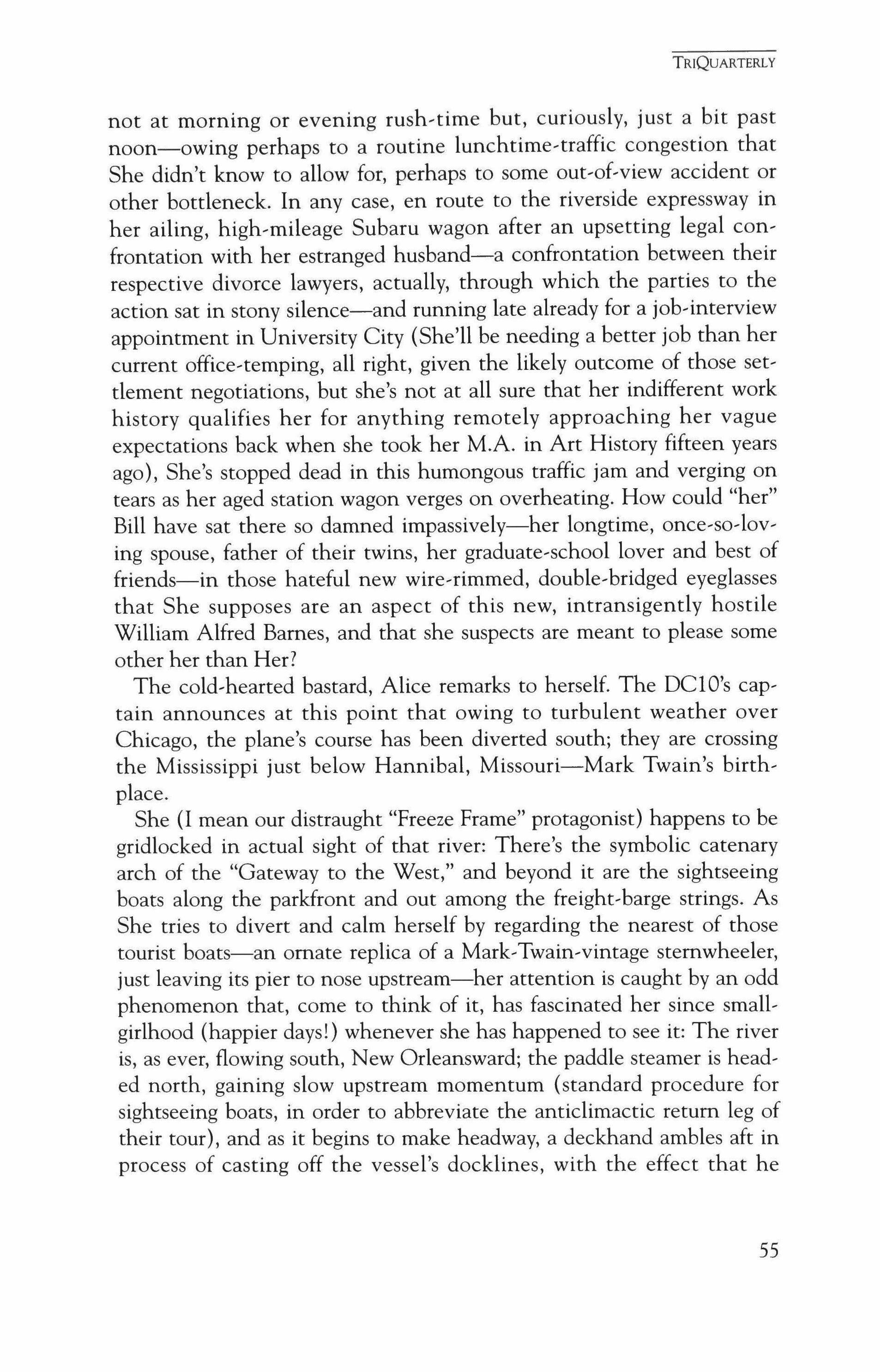
not at morning or evening rush-time but, curiously, just a bit past noon-owing perhaps to a routine lunchtime-traffic congestion that She didn't know to allow for, perhaps to some out-of-view accident or other bottleneck. In any case, en route to the riverside expressway in her ailing, high-mileage Subaru wagon after an upsetting legal confrontation with her estranged husband-a confrontation between their respective divorce lawyers, actually, through which the parties to the action sat in stony silence-and running late already for a job-interview appointment in University City (She'll be needing a better job than her current office-ternping, all right, given the likely outcome of those settlement negotiations, but she's not at all sure that her indifferent work history qualifies her for anything remotely approaching her vague expectations back when she took her M.A. in Art History fifteen years ago), She's stopped dead in this humongous traffic jam and verging on tears as her aged station wagon verges on overheating. How could "her" Bill have sat there so damned impassively-her longtime, once-so-leving spouse, father of their twins, her graduate-school lover and best of friends-in those hateful new wire-rimmed, double-bridged eyeglasses that She supposes are an aspect of this new, intransigently hostile William Alfred Barnes, and that she suspects are meant to please some other her than Her?
The cold-hearted bastard, Alice remarks to herself. The DClO's captain announces at this point that owing to turbulent weather over Chicago, the plane's course has been diverted south; they are crossing the Mississippi just below Hannibal, Missouri-Mark Twain's birthplace.
She (I mean our distraught "Freeze Frame" protagonist) happens to be gridlocked in actual sight of that river: There's the symbolic catenary arch of the "Gateway to the West," and beyond it are the sightseeing boats along the parkfront and out among the freight-barge strings. As She tries to divert and calm herself by regarding the nearest of those tourist boats-an ornate replica of a Mark-Twain-vintage sternwheeler, just leaving its pier to nose upstream-her attention is caught by an odd phenomenon that, corne to think of it, has fascinated her since smallgirlhood (happier days!) whenever she has happened to see it: The river is, as ever, flowing south, New Orleansward; the paddle steamer is headed north, gaining slow upstream momentum (standard procedure for sightseeing boats, in order to abbreviate the anticlimactic return leg of their tour), and as it begins to make headway, a deckhand ambles aft in process of casting off the vessel's docklines, with the effect that he
TRIQUARTERLY
55
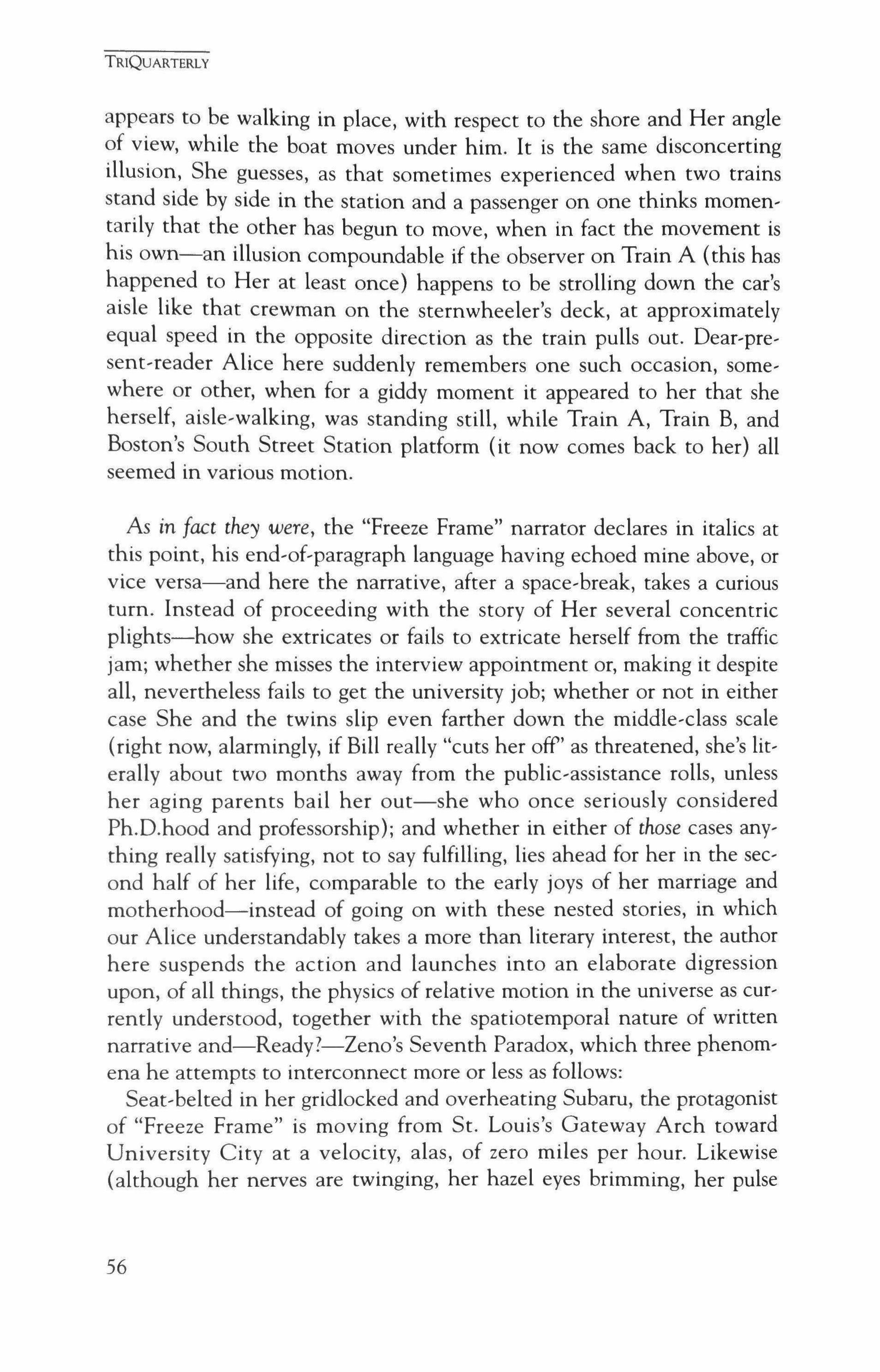
appears to be walking in place, with respect to the shore and Her angle of view, while the boat moves under him. It is the same disconcerting illusion, She guesses, as that sometimes experienced when two trains stand side by side in the station and a passenger on one thinks momentarily that the other has begun to move, when in fact the movement is his own-an illusion compoundable if the observer on Train A (this has happened to Her at least once) happens to be strolling down the car's aisle like that crewman on the sternwheeler's deck, at approximately equal speed in the opposite direction as the train pulls out. Dear-present-reader Alice here suddenly remembers one such occasion, somewhere or other, when for a giddy moment it appeared to her that she herself, aisle-walking, was standing still, while Train A, Train B, and Boston's South Street Station platform (it now comes back to her) all seemed in various motion.
As in fact they were, the "Freeze Frame" narrator declares in italics at this point, his end-of-paragraph language having echoed mine above, or vice versa-and here the narrative, after a space-break, takes a curious turn. Instead of proceeding with the story of Her several concentric plights-how she extricates or fails to extricate herself from the traffic jam; whether she misses the interview appointment or, making it despite all, nevertheless fails to get the university job; whether or not in either case She and the twins slip even farther down the middle-class scale (right now, alarmingly, if Bill really "cuts her off' as threatened, she's literally about two months away from the public-assistance rolls, unless her aging parents bail her out-she who once seriously considered Ph.D.hood and professorship); and whether in either of those cases anything really satisfying, not to say fulfilling, lies ahead for her in the second half of her life, comparable to the early joys of her marriage and motherhood-instead of going on with these nested stories, in which our Alice understandably takes a more than literary interest, the author here suspends the action and launches into an elaborate digression upon, of all things, the physics of relative motion in the universe as currently understood, together with the spatiotemporal nature of written narrative and-Ready?-Zeno's Seventh Paradox, which three phenomena he attempts to interconnect more or less as follows:
Seat-belted in her gridlocked and overheating Subaru, the protagonist of "Freeze Frame" is moving from St. Louis's Gateway Arch toward University City at a velocity, alas, of zero miles per hour. Likewise (although her nerves are twinging, her hazel eyes brimming, her pulse
TRIQUARTERLY
56

and respiration pulsing and respiring, and her thoughts returning already from tourist boats to the life problems that have her by the throat) from the recentest event in her troubled story to whatever next: zero narrative mph, so to speak, as the station wagon idles and the author digresses. Even as the clock of her life is running, however, so are time in genetal and the physical universe. The city of St. Louis and its temporarily stalled downtown traffic, together with our now-sobbing protagonist, the state of Missouri, and variously troubled America, all spin eastward on Earth's axis at roughly a thousand miles per hour. The rotating planet itself careens through its solar orbit at a dizzying 66,662 miles per hour (with the incidental effect that even "stationary" objects on its surface, like Her Subaru, for half of every daily rotation are "strolling aft" with respect to orbital direction, though at nothing approaching orbital velocity). Our entire whirling solar system, meanwhile, is rushing in its own orbit through our Milky Way Galaxy at the stupendous rate of nearly half a million miles per hour: lots of compounded South Street Station effects going on within that overall motion! What's more, although our galaxy appears to have no relative motion within its Local Group of celestial companions, that whole Local group-plus the great Virgo Cluster of which it's a member, plus other, neighboring multigalactic clusters-is apparently rushing en bloc at a staggering near-million miles per ho�r (950,724) toward some point in interclusteral space known as the Great Attractor. And moreover yet-but who's to say finally?-that Attractor and everything thereto so ardently attracted would seem to be speeding at an only slightly less staggering 805,319 mph toward another supercluster, as yet ill-mapped, called the Shapley Concentration, or, to put it mildly, the Even Greater Attractor. All these several motions-within-motions, mind, over and above the grand general expansion of the universe, wherein even as the present reader reads this present sentence, the galaxies all flee one another's company at speeds proportional to their respective distances (specifically, in scientific metrics, at the rate of fifty to eighty kilometers per second-let's say 150,000 miles per hour-per "megaparsec" from the observer, a megaparsec being one thousand parsecs and each parsec 3.26 light-years}. Don't think about this last too closely, advises the author of "Freeze Frame," but in fact our Alice-who has always had a head for figures, and who once upon a time maintained a lively curiosity about such impersonal matters as the constellations, at least, if not the overall structure of the universe-is at this point stopped quite as still by vertiginous reflection as is the unnamed Mrs. William Alfred Barnes by traffic
TRIQUARTERLY
57

down there in her gridlocked Subaru, and this for several reasons. Apart from the similarities between Her situation vis-a-vis "Bill" and Alice's vis-a-vis Howard-unsettling, but not extraordinary in a time and place where half of all marriages end in separation or divorce-is the coincidence of her happening upon "Freeze Frame" during a caesura in her own life-story and reading through the narrative of Her nonplusment up to the author's digression-in-progress just as, lap-belted in a DClO at thirty-two thousand feet, she's crossing the Mississippi River in virtual sight of St. Louis not long past midday (Central Daylight Savings Time), flying westward at an airspeed of six hundred eight miles per hour (so the captain has announced), against a contrary prevailing jet stream of maybe a hundred mph, for a net speed-over-ground of let's say five hundred, while Earth and its atmosphere spin eastward under her, carrying the DClO backward (though not relatively) at maybe double its forward air speed, while simultaneously the planet, the solar system, the galaxy, and so forth all tear along in their various directions at their various clips-and just now two flight attendants emerge from the forward galley and stroll aft down the parallel aisles like that deckhand on the tourist sternwheeler, taking the passengers' drink orders before the meal service. Alice stares awhile, transfixed, almost literally dizzied, remembering from her happier schooldays (and from trying to explain relative motion to Sam and Jessica one evening as the family camped out under the stars) that any point or object in the universe can be considered to be at rest, the unmoving center of it all, while everything else is in complex motion with respect to it. The arrow, released, may be said to stand still while the earth rushes under, the target toward, the archer away from it, et cetera.
Her seatmate-on-the-aisle, fortunately, is too preoccupied with punching a pocket calculator and scribbling on a notepad (atop his in-flight mag atop his tray-table) to notice her looking up from her reading. Alice decides she'll order white wine and club soda when her turn comes, and goes back to the suspended non-action of "Freeze Frame" lest he disturb her reflections with another attempt at conversation.
Back, rather, she goes, to that extended digression, wherein by one more coincidence (she having just imaged the arrow in "stationary" flight-but not impossibly she glanced ahead in "Freeze Frame" before those flight attendants caught her eye) the author now invokes two other arrows: the celebrated Arrow of Time, along whose irreversible trajectory the universe has expanded ever since the Big Bang, generating and carrying with it not only all those internal relative celestial
TRIQUARTERLY
58
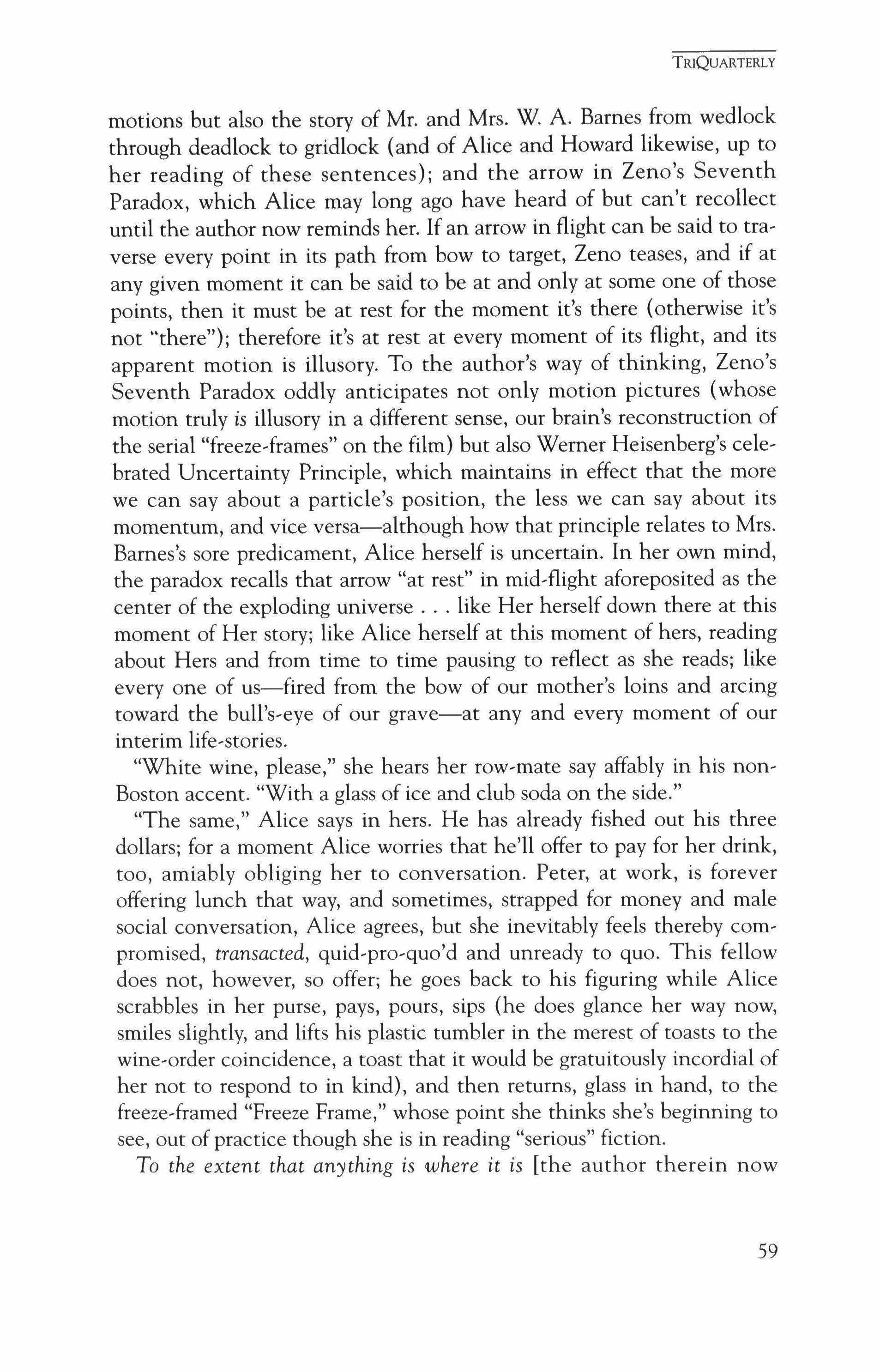
motions but also the story of Mr. and Mrs. W. A. Barnes from wedlock through deadlock to gridlock (and of Alice and Howard likewise, up to her reading of these sentences); and the arrow in Zeno's Seventh Paradox, which Alice may long ago have heard of but can't recollect until the author now reminds her. If an arrow in flight can be said to traverse every point in its path from bow to target, Zeno teases, and if at any given moment it can be said to be at and only at some one of those points, then it must be at rest for the moment it's there (otherwise it's not "there"); therefore it's at rest at every moment of its flight, and its apparent motion is illusory. To the author's way of thinking, Zeno's Seventh Paradox oddly anticipates not only motion pictures (whose motion truly is illusory in a different sense, our brain's reconstruction of the serial "freeze-frames" on the film) but also Werner Heisenberg's celebrated Uncertainty Principle, which maintains in effect that the more we can say about a particle's position, the less we can say about its momentum, and vice versa-although how that principle relates to Mrs. Barnes's sore predicament, Alice herself is uncertain. In her own mind, the paradox recalls that arrow "at rest" in mid-flight aforeposited as the center of the exploding universe like Her herself down there at this moment of Her story; like Alice herself at this moment of hers, reading about Hers and from time to time pausing to reflect as she reads; like everyone of us-fired from the bow of our mother's loins and arcing toward the bull's-eye of our grave-at any and every moment of our interim life-stories.
"White wine, please," she hears her row-mate say affably in his nonBoston accent. "With a glass of ice and club soda on the side."
"The same," Alice says in hers. He has already fished out his three dollars; for a moment Alice worries that he'll offer to pay for her drink, too, amiably obliging her to conversation. Peter, at work, is forever offering lunch that way, and sometimes, strapped for money and male social conversation, Alice agrees, but she inevitably feels thereby compromised, transacted, quid-pro-quo'd and unready to quo. This fellow does not, however, so offer; he goes back to his figuring while Alice scrabbles in her purse, pays, pours, sips (he does glance her way now, smiles slightly, and lifts his plastic tumbler in the merest of toasts to the wine-order coincidence, a toast that it would be gratuitously incordial of her not to respond to in kind), and then returns, glass in hand, to the freeze-framed "Freeze Frame," whose point she thinks she's beginning to see, out of practice though she is in reading "serious" fiction.
To the extent that anything is where it is [the author therein now
TRIQUARTERLY
59

declares], it has no momentum. To the extent that it moves, it isn't "where it is." Likewise made�up characters in made�up stories; likewise ourselves in the more-or-less made�up stories of our lives. All freeze�frames [he concludes {concludes this elaborate digression, that is, with another space-break, after which the text, perhaps even the story, resumes}], are blurred at the edges.
An arresting passage, Alice acknowledges to herself. Her reflective circuits stirred by the story-thus-far as they haven't been in too long, she smiles at the contradiction in that phrase. An arresting passage: Alice's First Paradox.
"Hmp," she hears herself say aloud, amused at that. Amused at that, she stifles a chuckle and helps herself to another dollop of wine.
"Fuff," the fellow on the aisle replies, anyhow says, as if to his notepad-and Alice remarks for the first time that he's been annotating not only that pad but the margins of the "Freeze Frame" story in his copy of the in-flight magazine: "Forgot continental drift."
"Excuse me?" She's still smiling, partly at her little witticism, partly at the pleasure, unfamiliar lately, of smiling spontaneously from pure innocent amusement rather than grimly, to keep her spirits up. Another brace of flight attendants-a brace of braces, actually, she supposes in her lingering amusement-is beginning the meal service in the DClO's twin aisles. Bemused, Alice decides to take time out from "Freeze Frame" {whose author has been taking a prolonged time-out from telling the story} and give sociability a try through lunch.
"I'm rechecking the numbers in this crazy story," the fellow says wryly, "and it just occurred to me that continental drift wasn't factored in." He smiles: a friendly smile, confident but unassuming. "You're reading the thing, too, I see. Did you get to the numbers part yet?"
"That's where I am now, and the arrow business. Pretty dizzy-making." She sips her wine.
He taps the text with his ballpoint. "Shouldn't the Earth's rotational speed be corrected for the latitude of St. Louis, the wayan LP record moves faster at its edge than halfway in toward its hole? And then there's the wobbling of the earth's axis, right?-that causes the precession of the equinoxes. Plus or minus the couple of millimeters a year that the crustal plates grind along." He grins and shrugs his eyebrows. "Too late now. May I have another white wine, please, to go with lunch," he asks the stewardess who here hands them their meal trays.
"Another white wine. And you, ma'am?"
TRIQUARTERLY
60
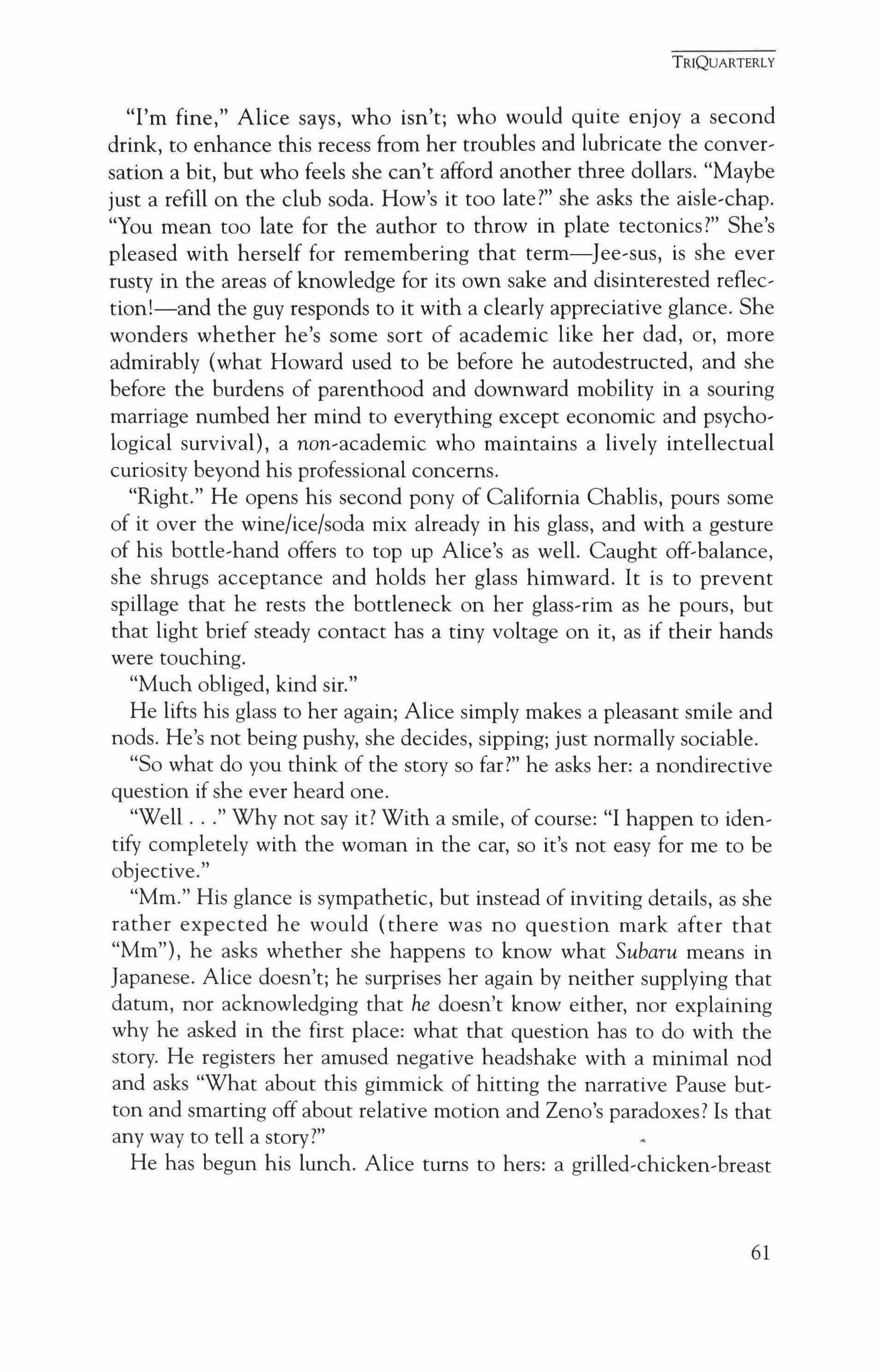
"I'm fine," Alice says, who isn't; who would quite enjoy a second drink, to enhance this recess from her troubles and lubricate the conversation a bit, but who feels she can't afford another three dollars. "Maybe just a refill on the club soda. How's it too late?" she asks the aisle-chap. "You mean too late for the author to throw in plate tectonics?" She's pleased with herself for remembering that term=-jee-sus, is she ever rusty in the areas of knowledge for its own sake and disinterested reflection!-and the guy responds to it with a clearly appreciative glance. She wonders whether he's some sort of academic like her dad, or, more admirably (what Howard used to be before he autodestructed, and she before the burdens of parenthood and downward mobility in a souring marriage numbed her mind to everything except economic and psycho, logical survival), a non-academic who maintains a lively intellectual curiosity beyond his professional concerns.
"Right." He opens his second pony of California Chablis, pours some of it over the wine/ice/soda mix already in his glass, and with a gesture of his bottle,hand offers to top up Alice's as well. Caught off-balance, she shrugs acceptance and holds her glass himward. It is to prevent spillage that he rests the bottleneck on her glass,rim as he pours, but that light brief steady contact has a tiny voltage on it, as if their hands were touching.
"Much obliged, kind sir."
He lifts his glass to her again; Alice simply makes a pleasant smile and nods. He's not being pushy, she decides, sipping; just normally sociable.
"So what do you think of the story so far?" he asks her: a nondirective question if she ever heard one.
"Well Why not say it? With a smile, of course: "I happen to identify completely with the woman in the car, so it's not easy for me to be objective."
"Mm." His glance is sympathetic, but instead of inviting details, as she rather expected he would (there was no question mark after that "Mm"), he asks whether she happens to know what Subaru means in Japanese. Alice doesn't; he surprises her again by neither supplying that datum, nor acknowledging that he doesn't know either, nor explaining why he asked in the first place: what that question has to do with the story. He registers her amused negative headshake with a minimal nod and asks "What about this gimmick of hitting the narrative Pause but, ton and smarting off about relative motion and Zeno's paradoxes? Is that any way to tell a story?"
He has begun his lunch. Alice turns to hers: a grilled,chicken,breast
TRIQUARTERLY
61
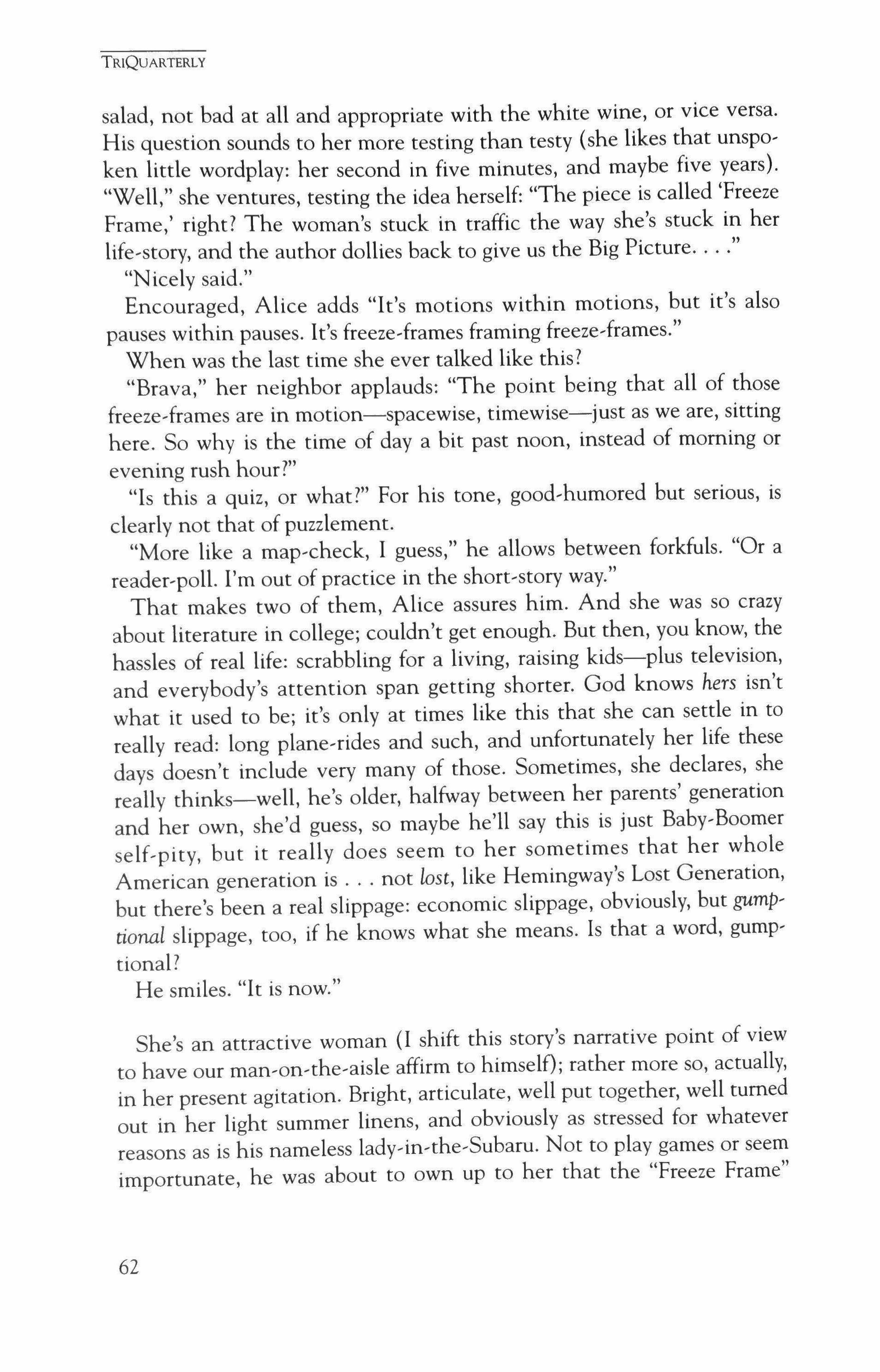
salad, not bad at all and appropriate with the white wine, or vice versa. His question sounds to her more testing than testy (she likes that unspoken little wordplay: her second in five minutes, and maybe five years). "Well," she ventures, testing the idea herself: "The piece is called 'Freeze Frame,' right? The woman's stuck in traffic the way she's stuck in her life-story, and the author dollies back to give us the Big Picture
"Nicely said."
Encouraged, Alice adds "It's motions within motions, but it's also pauses within pauses. It's freeze-frames framing freeze-frames."
When was the last time she ever talked like this?
"Brava," her neighbor applauds: "The point being that all of those freeze-frames are in motion-spacewise, timewise-just as we are, sitting here. So why is the time of day a bit past noon, instead of morning or evening rush hour?"
"Is this a quiz, or what?" For his tone, good-humored but serious, is clearly not that of puzzlement.
"More like a map-check, I guess," he allows between forkfuls. "Or a reader-poll. I'm out of practice in the short-story way."
That makes two of them, Alice assures him. And she was so crazy about literature in college; couldn't get enough. But then, you know, the hassles of real life: scrabbling for a living, raising kids-plus television, and everybody's attention span getting shorter. God knows hers isn't what it used to be; it's only at times like this that she can settle in to really read: long plane-rides and such, and unfortunately her life these days doesn't include very many of those. Sometimes, she declares, she really thinks-well, he's older, halfway between her parents' generation and her own, she'd guess, so maybe he'll say this is just Baby-Boomer self-pity, but it really does seem to her sometimes that her whole American generation is not lost, like Hemingway's Lost Generation, but there's been a real slippage: economic slippage, obviously, but gumpdonal slippage, too, if he knows what she means. Is that a word, gumptional?
He smiles. "It is now."
She's an attractive woman (I shift this story's narrative point of view to have our man-en-the-aisle affirm to himself); rather more so, actually, in her present agitation. Bright, articulate, well put together, well turned out in her light summer linens, and obviously as stressed for whatever reasons as is his nameless lady-in-the-Subaru. Not to play games or seem importunate, he was about to own up to her that the "Freeze Frame"
TRIQUARTERLY
62

story is his: a bit of a time out from his usual occupation. By temperament and profession he's a novelist, more accustomed to the narrative long haul than to the sprint. It has been twenty-plus years since he last wrote short stories. Back in the sixties, when his first and only collection of them was published, the woman beside him-laughing now at her sudden effusiveness and at the same time knuckling tears until he offers her a dry cocktail napkin to dab with-will have been a high-schooler, But as it happens he's between larger projects just now, and at his age and stage one never knows but what the pause-in-progress, so to speak, might be one's artistic menopause. That possibility, while certainly not cheering, doesn't greatly alarm him, any more than does the regrettable prospect of losing sexual desire and potency, say, somewhere down the road (in that order, he hopes). He has had a gratifying if less than epical career in both areas, and in others as well; he is in fact on tour just now to help promote his latest midlist novel, and missing his wife, and feeling rather too far along for this sort of thing-while at the same time mildly enjoying the break in his unglamorous but still deeply satisfying daily routine of dreaming up people and situations, putting thoughts and feelings and actions into English sentences, and in the process discovering what's on his imagination's mind, as it were: what his muse has up her sleeve; what she'll do for an encore this late in the day.
It was in this spirit, he's telling Alice now (Yeah, he 'fessed up. Why not? Strangers in transit, never see each other again, et cetera), that he wrote the "Freeze Frame" story a few months back-all those motionswithin-motions and pauses-within-pauses, as she accurately put it-and even urged his agent, half as a lark, half seriously, to try placing it in some in-flight mag, of all odd places, instead of in one of the few largecirculation American magazines that still publish "literary" fiction. But of course he hadn't anticipated the happy coincidence that he would first see it in print while flying virtually over the scene of its stalled action. Truth stranger than fiction, et cet.
"Not to mention the unhappy coincidence that you'd get stuck with old capital-H Her," Alice says, "in the flesh." Her sniffles are O.K. now; not stopped, but under adequate control and anyhow O.K.
She's impressed, mildly; has never met a writer in person before (she thinks now she remembers his name from some classroom anthology, light-years ago); is amused to hear him say "et cet" in his ordinary speech just the way it comes up in his story, almost a stylistic tic; recalls now that in fact he said he was rechecking those numbers, not checking them. He doesn't seem boastful or otherwise pretentious or affected: a
TRIQUARTERLY
63
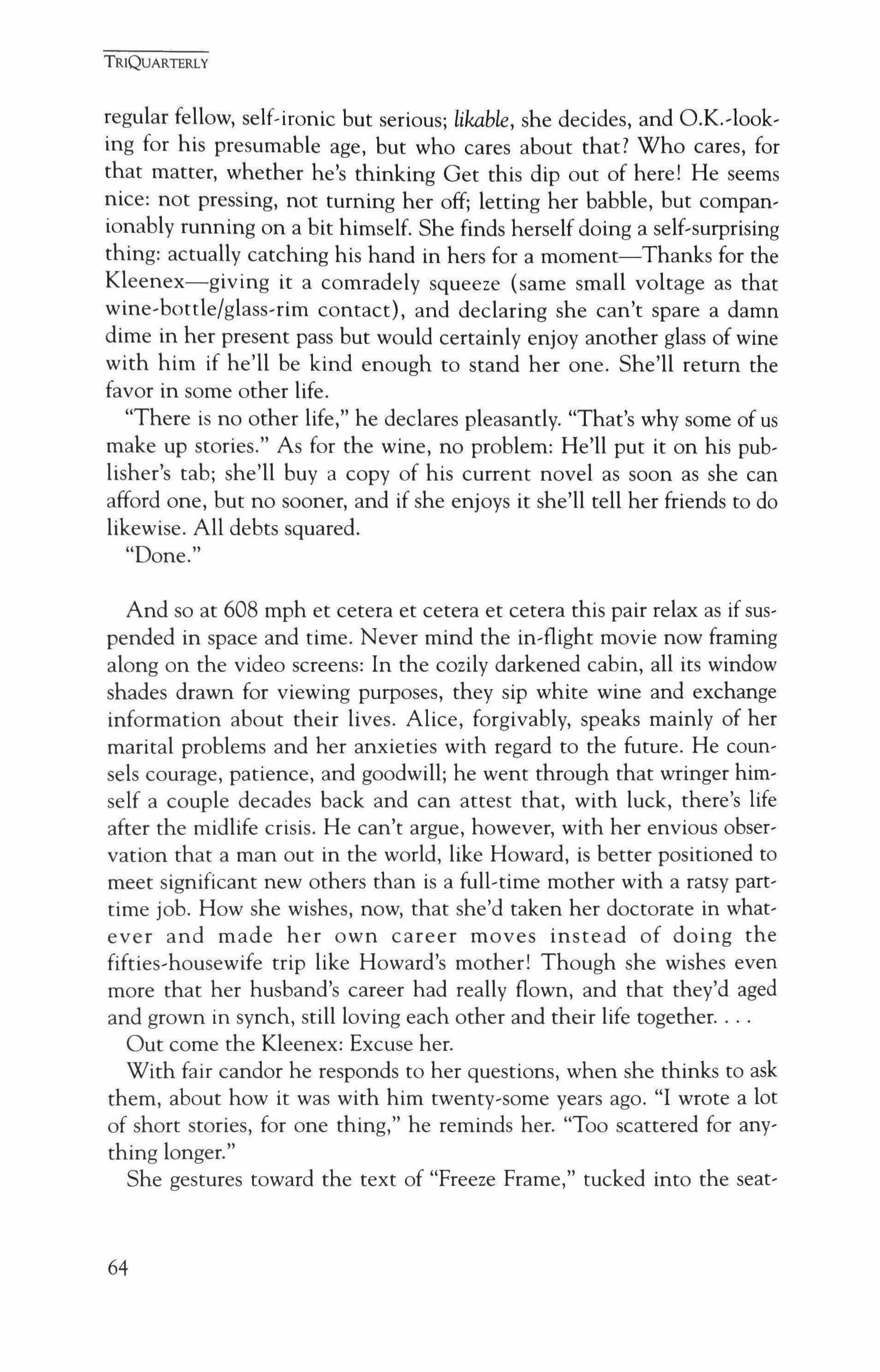
regular fellow, self-ironic but serious; likable, she decides, and O.K.-looking for his presumable age, but who cares about that? Who cares, for that matter, whether he's thinking Get this dip out of here! He seems nice: not pressing, not turning her off; letting her babble, but companionably running on a bit himself. She finds herself doing a self-surprising thing: actually catching his hand in hers for a moment-Thanks for the Kleenex-giving it a comradely squeeze (same small voltage as that wine-bottle/glass-rim contact), and declaring she can't spare a damn dime in her present pass but would certainly enjoy another glass of wine with him if he'll be kind enough to stand her one. She'll return the favor in some other life.
"There is no other life," he declares pleasantly. "That's why some of us make up stories." As for the wine, no problem: He'll put it on his publisher's tab; she'll buy a copy of his current novel as soon as she can afford one, but no sooner, and if she enjoys it she'll tell her friends to do likewise. All debts squared.
"Done."
And so at 608 mph et cetera et cetera et cetera this pair relax as if suspended in space and time. Never mind the in-flight movie now framing along on the video screens: In the cozily darkened cabin, all its window shades drawn for viewing purposes, they sip white wine and exchange information about their lives. Alice, forgivably, speaks mainly of her marital problems and her anxieties with regard to the future. He counsels courage, patience, and goodwill; he went through that wringer himself a couple decades back and can attest that, with luck, there's life after the midlife crisis. He can't argue, however, with her envious observation that a man out in the world, like Howard, is better positioned to meet significant new others than is a full-time mother with a ratsy parttime job. How she wishes, now, that she'd taken her doctorate in whatever and made her own career moves instead of doing the fifties-housewife trip like Howard's mother! Though she wishes even more that her husband's career had really flown, and that they'd aged and grown in synch, still loving each other and their life together
Out come the Kleenex: Excuse her.
With fair candor he responds to her questions, when she thinks to ask them, about how it was with him twenty-some years ago. "I wrote a lot of short stories, for one thing," he reminds her. "Too scattered for anything longer."
She gestures toward the text of "Freeze Frame," tucked into the seat-
'TRIQUARTERLY
64

back pocket before her, and raises her eyebrows at him. "Does this mean there's trouble again at home?"
He smiles at that, shakes his head, raps on the plastic tray-table in lieu of wood.
Does Alice really mock-sigh then and say "Too bad for our story!" Or, perhaps, "In that case, how do we get me and Miz Whatsername out of gridlock?" Do they chuckle at her plainly experimental flirtsomeness and raise the intimacy-level of their dialogue a notch or two, so that by final approach their hands are touching freely? And when at the airport baggage-claim he offers her a lift downtown in his cab--even dinner at his hotel, if she's up for it (Portland's splendidly refurbished old Heathman), before his scheduled appearance that evening at Powell's Bookstore--does she say, in a spirit clearly ready for adventure, "I'll say I missed my connection," and then, as the circumstance dawns on her, snatch up his hand in both of hers and declare "No, damn it: I don't have to say anything! There's nobody home to say it to!"?
More reasonably, their mid-flight tete-a-tete having run its transitory course along with that sufficiency of wine, do they presently unbuckle to visit the lavatories aft and then return separately to their seats: she to go on with the "Freeze Frame" story, more curious even than before to find out what its author has in store for Her; he to go back to his notepad, in which for all Alice knows he's now jotting notes for some story about her as they rush motionlessly together through the time of their lives, their life-stories meanwhile suspended?
Given the age and stage of the woman in the gridlocked car, that "just past noon" business in "Freeze Frame" strikes me as obvious to the point of heavyhandedness. I apologize on behalf of the author, who has also not gotten it said to our Alice that Subaru is Japanese for the Pleiades cluster (see the automaker's logo) in the constellation Taurus-much farther now from the dear present reader than it was even a sentence ago. On the other hand, I haven't yet managed to get it said (what the "Freeze Frame" story declares somewhere in that digressive pause before the space-break beyond which Alice is currently reading) that all stories are essentially constructs in time, and only incidentally in the linear space of written words. Written or spoken, however, these words are like points in space, through which the story-arrow travels in time. Just now it rests at this point, this word, this-yet of course never resting there, but ever en route through it to the next, the next, from Beginning through Middle et cetera. Even if and when we linger over an "arresting
TRIQUARTERLY
65
passage," we're only apparently at rest in the story's suspended but incessant motion; likewise in our manifold own. There. Said.
"On with the storyI"�
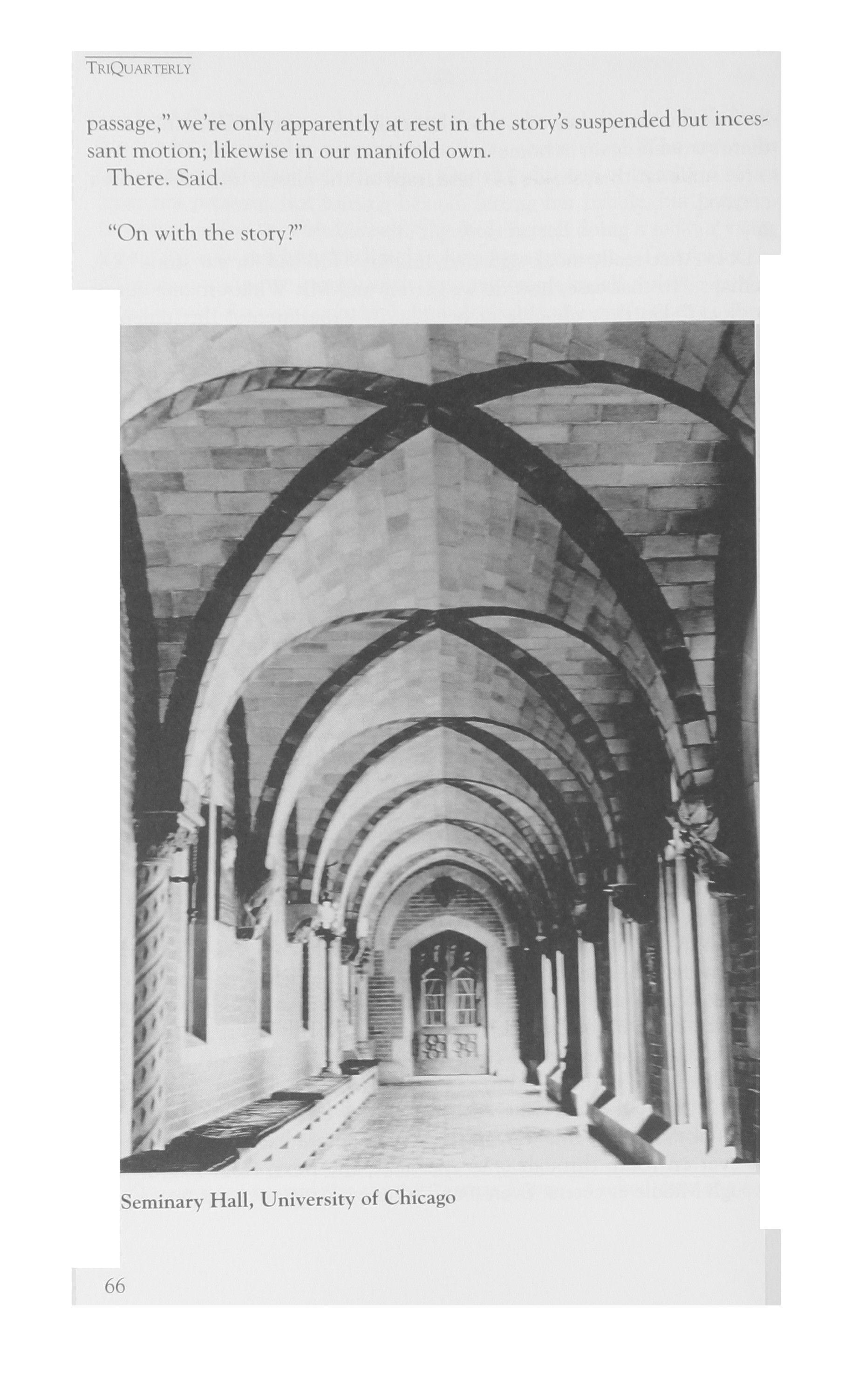
Seminary Hall, University of Chicago
TRIQUARTERLY
� .#
66
A Conversation with Philip Levine
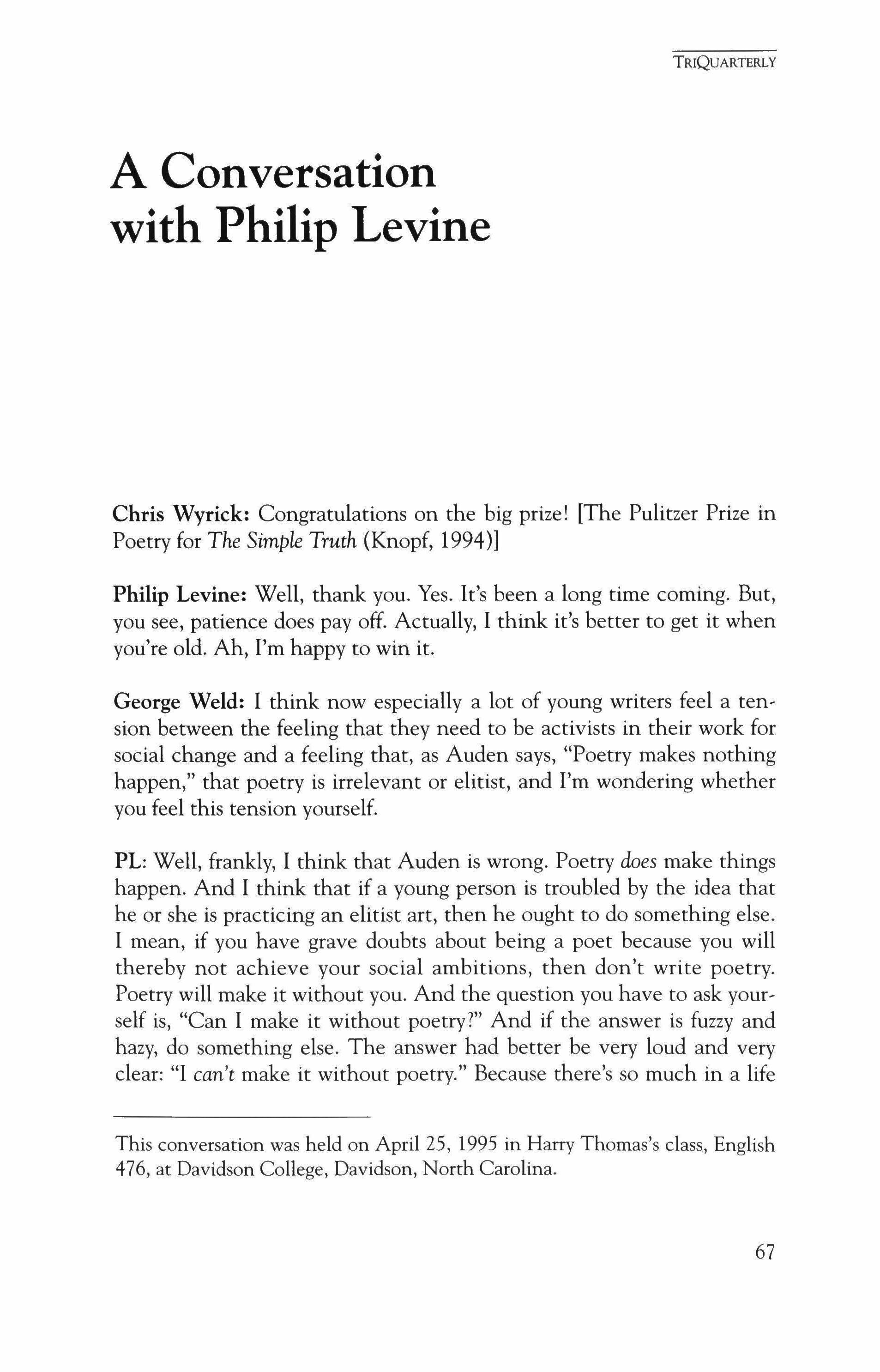
Chris Wyrick: Congratulations on the big prize! [The Pulitzer Prize in Poetry for The Simple Truth (Knopf, 1994)]
Philip Levine: Well, thank you. Yes. It's been a long time coming. But, you see, patience does payoff. Actually, I think it's better to get it when you're old. Ah, I'm happy to win it.
George Weld: I think now especially a lot of young writers feel a tension between the feeling that they need to be activists in their work for social change and a feeling that, as Auden says, "Poetry makes nothing happen," that poetry is irrelevant or elitist, and I'm wondering whether you feel this tension yourself.
PL: Well, frankly, I think that Auden is wrong. Poetry does make things happen. And I think that if a young person is troubled by the idea that he or she is practicing an elitist art, then he ought to do something else. I mean, if you have grave doubts about being a poet because you will thereby not achieve your social ambitions, then don't write poetry. Poetry will make it without you. And the question you have to ask yourself is, "Can I make it without poetry?" And if the answer is fuzzy and hazy, do something else. The answer had better be very loud and very clear: "I can't make it without poetry." Because there's so much in a life
This conversation was held on April 25, 1995 in Harry Thomas's class, English 476, at Davidson College, Davidson, North Carolina.
TRIQUARTERLY
67
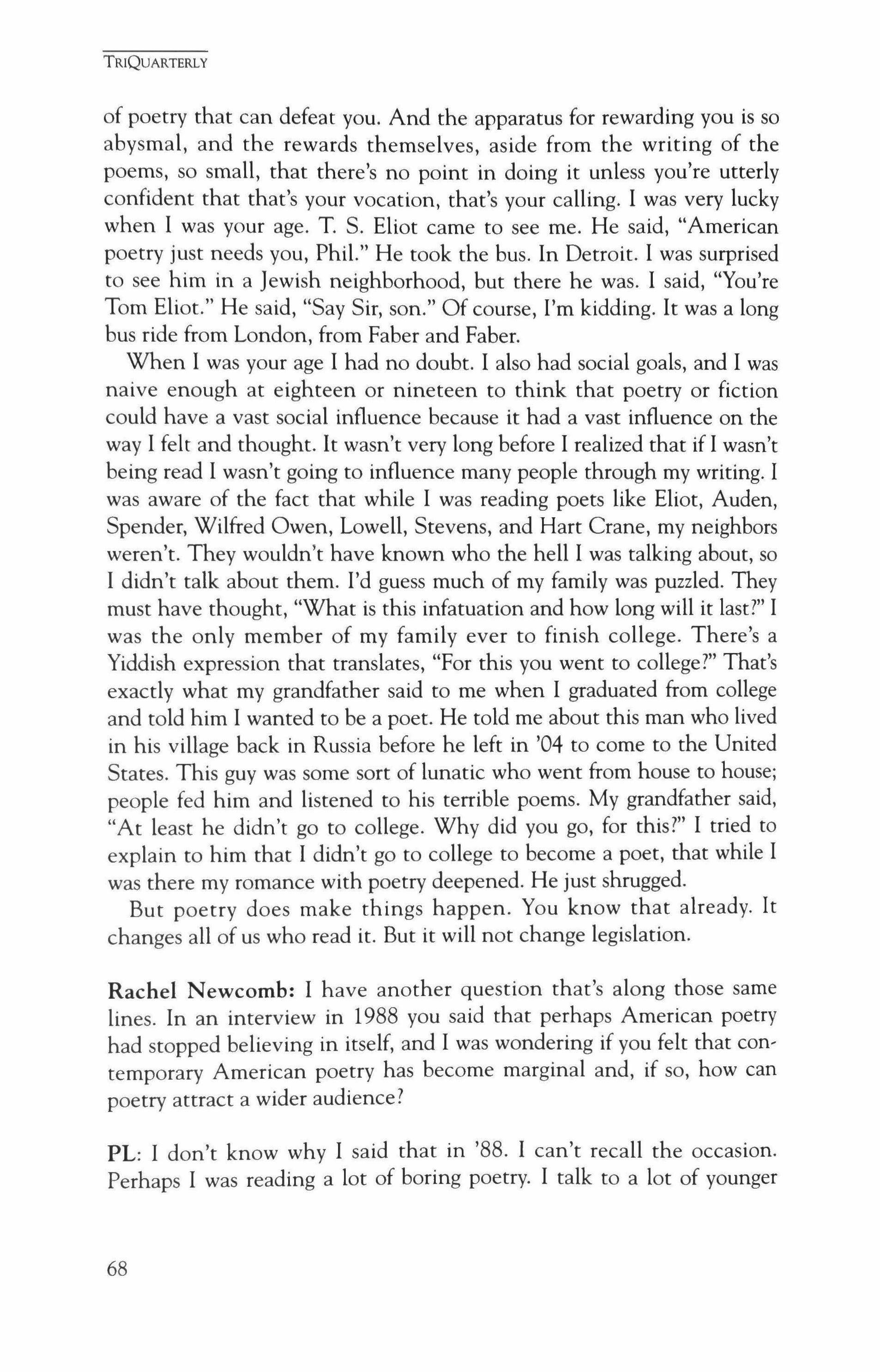
of poetry that can defeat you. And the apparatus for rewarding you is so abysmal, and the rewards themselves, aside from the writing of the poems, so small, that there's no point in doing it unless you're utterly confident that that's your vocation, that's your calling. I was very lucky when I was your age. T. S. Eliot came to see me. He said, "American poetry just needs you, Phil." He took the bus. In Detroit. I was surprised to see him in a Jewish neighborhood, but there he was. I said, "You're Tom Eliot." He said, "Say Sir, son." Of course, I'm kidding. It was a long bus ride from London, from Faber and Faber.
When I was your age I had no doubt. I also had social goals, and I was naive enough at eighteen or nineteen to think that poetry or fiction could have a vast social influence because it had a vast influence on the way I felt and thought. It wasn't very long before I realized that if I wasn't being read I wasn't going to influence many people through my writing. I was aware of the fact that while I was reading poets like Eliot, Auden, Spender, Wilfred Owen, Lowell, Stevens, and Hart Crane, my neighbors weren't. They wouldn't have known who the hell I was talking about, so I didn't talk about them. I'd guess much of my family was puzzled. They must have thought, "What is this infatuation and how long will it last?" I was the only member of my family ever to finish college. There's a Yiddish expression that translates, "For this you went to college?" That's exactly what my grandfather said to me when I graduated from college and told him I wanted to be a poet. He told me about this man who lived in his village back in Russia before he left in '04 to come to the United States. This guy was some sort of lunatic who went from house to house; people fed him and listened to his terrible poems. My grandfather said, "At least he didn't go to college. Why did you go, for this?" I tried to explain to him that I didn't go to college to become a poet, that while I was there my romance with poetry deepened. He just shrugged. But poetry does make things happen. You know that already. It changes all of us who read it. But it will not change legislation.
Rachel Newcomb: I have another question that's along those same lines. In an interview in 1988 you said that perhaps American poetry had stopped believing in itself, and I was wondering if you felt that contemporary American poetry has become marginal and, if so, how can poetry attract a wider audience?
PL: I don't know why I said that in '88. I can't recall the occasion. Perhaps I was reading a lot of boring poetry. I talk to a lot of younger
TRIQUARTERLY
68

poets and most of them don't seem to feel their generation has found itself as yet. I had a conversation for publication recently with a wonderful younger poet, Kate Daniels-she must be thirty-eight or so-and she felt her generation hadn't yet found what it wanted to do, but she felt that my generation had to assert itself early because we were under the shadows of the giants. If you looked at the magazines in which I first published, you'd see I'm in there with Stevens, Marianne Moore, Williams. I wasn't awed by them. I knew how good they were, I knew they were writing far better than I, but I thought, given enough time, they will vanish from the earth in their bodily incarnations and then
maybe my writing will get as good as theirs. Well, the first part did happen, and I'm still waiting for the second.
You asked about the audience for poetry in our country. I think it's the largest it's ever been. I know we're told otherwise. There's this "expert,"
Joseph Epstein, who published something like "Who Killed Poetry!" or something like that. Nobody killed poetry. Guys like Epstein like to hearken back to some dreamland America in which people got up in the morning and opened their windows to the birds singing and when they felt their souls elevated they recited American poetry to the waiting world. Bullshit! If you go back to the time when Stevens, Eliot, Williams were first publishing, exactly the same things were being said in the middlebrow press: "Look at this generation of turkeys. You can't understand a word they write. They're so obscure and so negative. Give us back our uplifting verse!" That was the middlebrow response to one of the great outpourings of poetry in the history of the English language, which took place early in this century. What happened in American poetry was extraordinary: Frost, Stevens, Williams, Pound, Moore, Eliot, all writing at the same time, E. A. Robinson, the whole Imagist thing. And the Epsteins of that hour were griping just as they are now. My guess is that today it still has something to do with class; they can't stand the idea of all these poets coming out of Turkey Tech and Fresno State and Puma J. C. They're from the fancy places that once owned our poetry. We had the same response from the Eastern lords when the Beats hit the press.
I think poetry now is very healthy. There is no such thing as an official style. It's open house. It doesn't matter how tall or short you are, what color you are or what sex you are or what nine sexes, you can put anything in your work.
You can write about anything. No matter how badly you write you can find somebody who'll publish you. Time will sift the good stuff from
TRIQUARTERLY
69
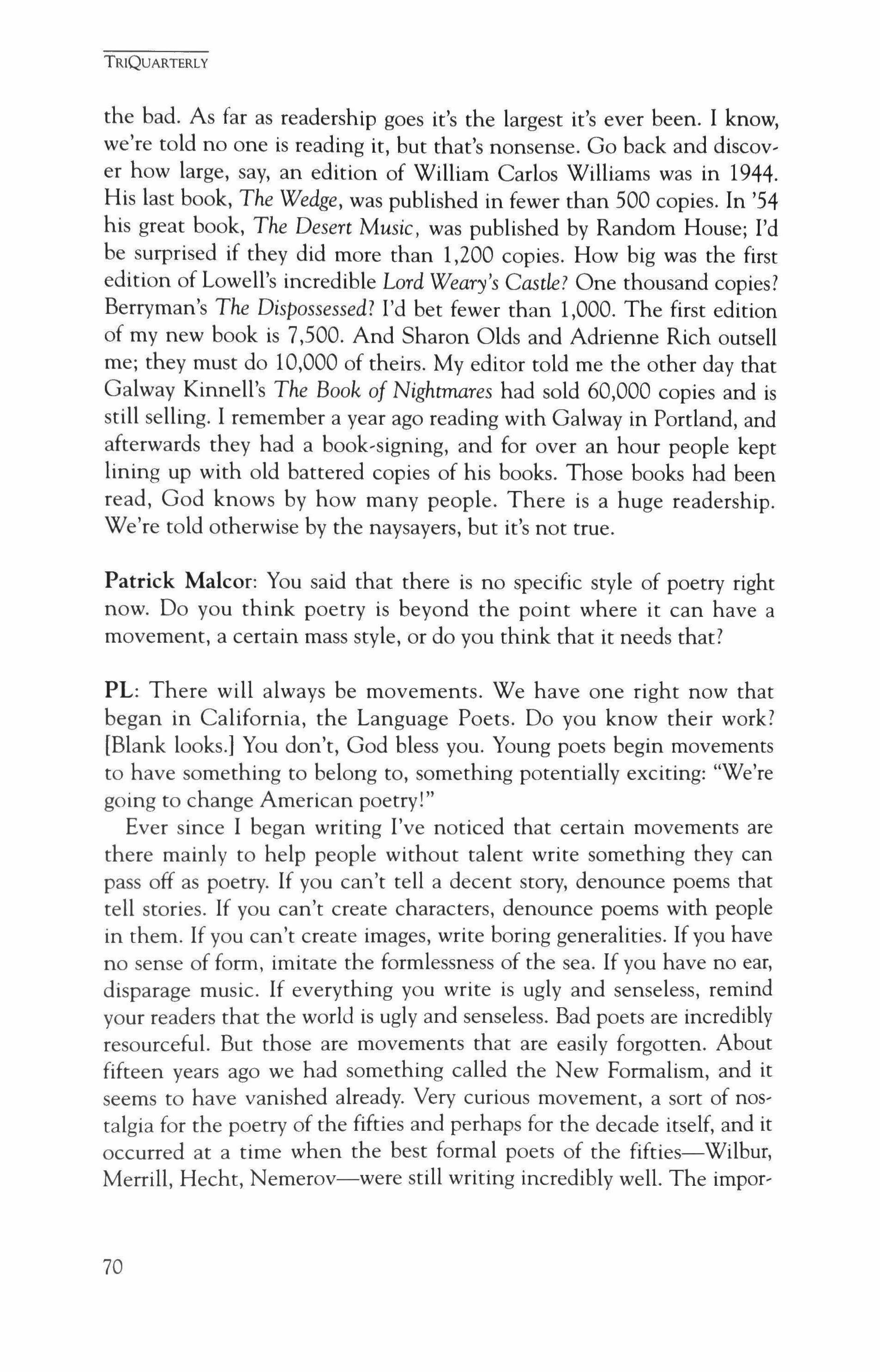
the bad. As far as readership goes it's the largest it's ever been. I know, we're told no one is reading it, but that's nonsense. Go back and discover how large, say, an edition of William Carlos Williams was in 1944. His last book, The Wedge, was published in fewer than 500 copies. In '54 his great book, The Desert Music, was published by Random House; I'd be surprised if they did more than 1,200 copies. How big was the first edition of Lowell's incredible Lord Weary's Castle? One thousand copies? Berryman's The Dispossessed? I'd bet fewer than 1,000. The first edition of my new book is 7,500. And Sharon Olds and Adrienne Rich outsell me; they must do 10,000 of theirs. My editor told me the other day that Galway Kinnell's The Book of Nightmares had sold 60,000 copies and is still selling. I remember a year ago reading with Galway in Portland, and afterwards they had a book-signing, and for over an hour people kept lining up with old battered copies of his books. Those books had been read, God knows by how many people. There is a huge readership. We're told otherwise by the naysayers, but it's not true.
Patrick Malcor: You said that there is no specific style of poetry right now. Do you think poetry is beyond the point where it can have a movement, a certain mass style, or do you think that it needs that?
PL: There will always be movements. We have one right now that began in California, the Language Poets. Do you know their work? [Blank looks.] You don't, God bless you. Young poets begin movements to have something to belong to, something potentially exciting: "We're going to change American poetry!"
Ever since I began writing I've noticed that certain movements are there mainly to help people without talent write something they can pass off as poetry. If you can't tell a decent story, denounce poems that tell stories. If you can't create characters, denounce poems with people in them. If you can't create images, write boring generalities. If you have no sense of form, imitate the formlessness of the sea. If you have no ear, disparage music. If everything you write is ugly and senseless, remind your readers that the world is ugly and senseless. Bad poets are incredibly resourceful. But those are movements that are easily forgotten. About fifteen years ago we had something called the New Formalism, and it seems to have vanished already. Very curious movement, a sort of nostalgia for the poetry of the fifties and perhaps for the decade itself, and it occurred at a time when the best formal poets of the fifties-Wilbur, Merrill, Hecht, Nemerov-were still writing incredibly well. The impor-
TRIQUARTERLY
70

tant movements change the way we see poetry or poetry sees us.
When I was your age a poet friend of mine, Bernie Strempek, and I founded a revolutionary poetry movement. We called it The New Mysticism; that was Bernie's idea. I believe he truly believed in the majesty and burning of the invisible whereas I was about as mystical as a sofa. Clearly we didn't change anything, not even the way we saw ourselves, but for a few weeks we had great fun talking about how we were going to change the country. Both the Language poets and the New Formalists strike me as less interesting than the New Mystics, though I am hardly objective. They're such conservative movements: neither seems in the least interested in shouldering a social or spiritual or political agenda. Both are academic and largely praised by academic critics and by the poets themselves, but perhaps they will have a healthy impact on our writing. They probably find my work and the contemporary work that resembles it garbage, which is fine. What's important is there is not a single official, accepted style. Today someone entering poetry can take any number of directions and find other poets who will validate his or her work. I hate the notion that any style, mine or anyone else's, is the style.
We have had very important, essential movements in this century. For me the most important one was the Imagist movement, which included such poets as Williams, Pound, Ford Madox Ford, D. H. Lawrence, and profoundly changed both English and American poetry. One in England right after the end of World War II changed the entire focus of their poetry. It was labeled "The Movement" and was something of a repudiation of the high-flown rhetoric of poets like George Barker, Dylan Thomas and Henry Treece. Suddenly we got these hard-assed poems from poets like Thom Gunn and Philip Larkin. They seemed more interested in what went on in a department store than what went on after you died and went to heaven. They'd write about trying to pick up a girl or spinning out on your motorcycle or finding a pair of pants that made you look sexy. In their poems people sound like people and not holy texts. In "Church Going" Larkin writes about a man with no religious faith who goes into an empty church and wonders what the hell it's for. At one point in the poem he says "up at the holy end"; he can't think of the name for that part of the church, if he ever knew it. It's a marvelous poem about the need for religious feelings in people without religious feelings.
And then in the late fifties we had the Beat or Black Mountain thing, all the poets represented in Donald Allen's anthology The New
TRIQUARTERLY
71

American Poetry. If you can still find that book have a look at it. You'll find it contains some of the best American poets of the second half of the century: Gary Snyder, Creeley, Ginsberg, Robert Duncan, Denise Levertov. All of us who write poetry owe those poets a great debt for ending the absolute domination of the official Eastern establishment; that was a great service. Maybe you folks would like to start a movement: the Davidson Suicide Squad or the North Carolina Stompers. It couldn't do any harm, and it might enliven things. They're a little dull right now.
Todd Cabell: You mention in the first essay in your book, The Bread of Time, that anybody can become a poet, that we have democratized poetry, and then you mention creative-writing classes in colleges and high schools. I wonder, being a teacher yourself, what exactly do you view as bad in that movement?
PL: Nothing. I think it's a wonderful thing. When I started writing there was not the sense that everybody could become a poet. Chicano poetry did not exist, Asian-American poetry did not exist, such giants as Robert Hayden and Sterling Brown were not represented in the official anthologies. I'm having fun in that essay, and I'm also being serious because I do think there are too many writing programs and many are staffed by people who can't write themselves. I visit places where poetry writing is taught in graduate programs, and I can't believe the level of writing. Then I see the poetry the teachers write, and I know why. And you visit a class, and everything is praised: the MO seems to be, "Let's pretend all this writing is poetry." Once you create a program you require students, so you let everyone in and you keep them in by making them happy. I also visit writing programs in which real standards are operating, the students have talent and are reading and working like mad; the teachers are dedicated, demanding, fair, and they are gifted and productive poets themselves. There are two things you must have for a valuable writing program: first and most importantly, the right students. Then the teachers. You could have mediocre teachers if you had great students because the students will teach each other and inspire each other. The problem is great students rarely gravitate to mediocre teachers.
Chris Wyrick: I'd like to ask a question about your method of writing. In What Work Is, in the poem "Scouting," you say, "I'm scouting, getting
TRIQUARTERLY
72
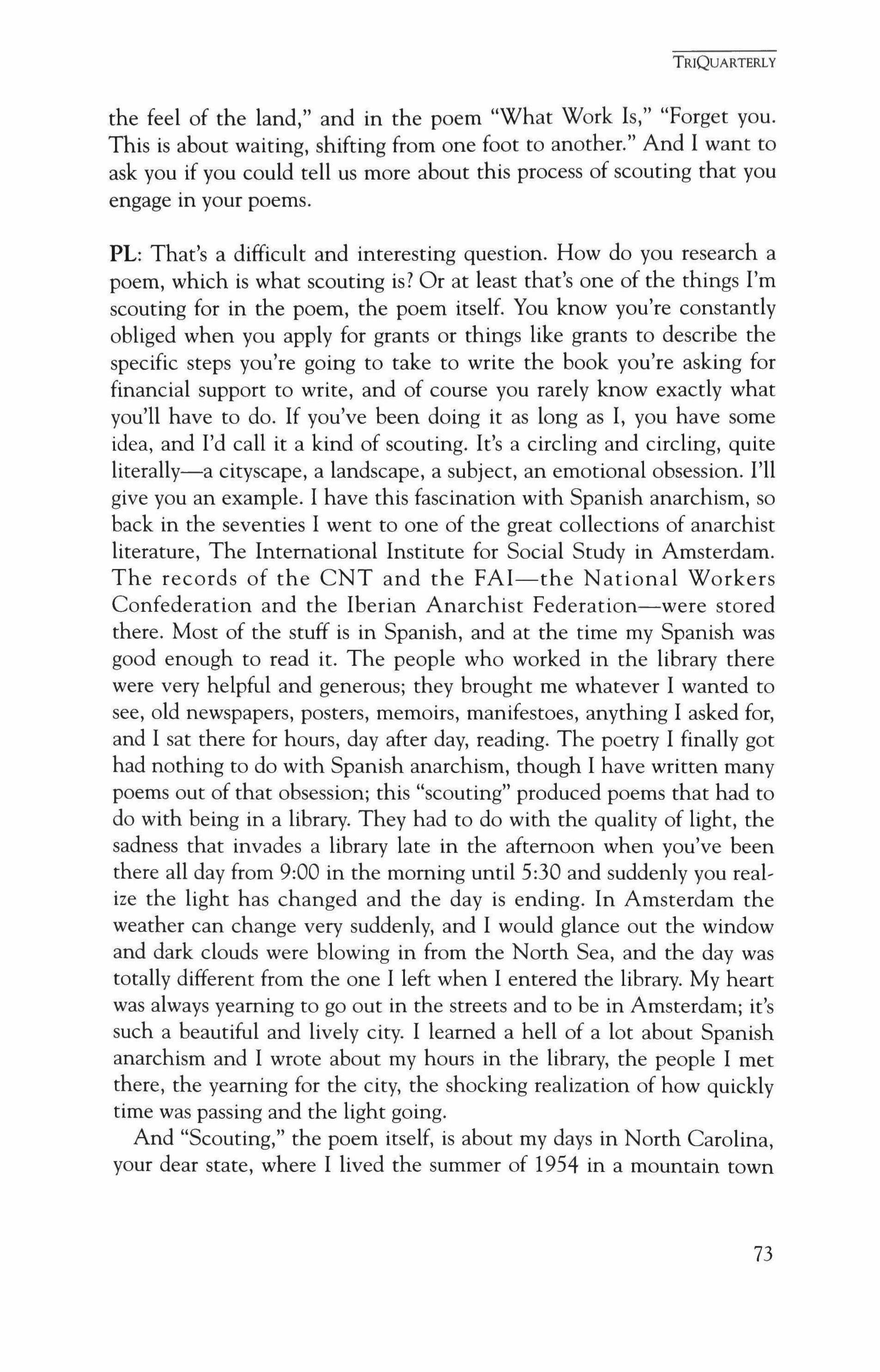
the feel of the land," and in the poem "What Work Is," "Forget you. This is about waiting, shifting from one foot to another." And I want to ask you if you could tell us more about this process of scouting that you engage in your poems.
PL: That's a difficult and interesting question. How do you research a poem, which is what scouting is? Or at least that's one of the things I'm scouting for in the poem, the poem itself. You know you're constantly obliged when you apply for grants or things like grants to describe the specific steps you're going to take to write the book you're asking for financial support to write, and of course you rarely know exactly what you'll have to do. If you've been doing it as long as I, you have some idea, and I'd call it a kind of scouting. It's a circling and circling, quite literally-a cityscape, a landscape, a subject, an emotional obsession. I'll give you an example. I have this fascination with Spanish anarchism, so back in the seventies I went to one of the great collections of anarchist literature, The International Institute for Social Study in Amsterdam. The records of the CNT and the FAI-the National Workers Confederation and the Iberian Anarchist Federation-were stored there. Most of the stuff is in Spanish, and at the time my Spanish was good enough to read it. The people who worked in the library there were very helpful and generous; they brought me whatever I wanted to see, old newspapers, posters, memoirs, manifestoes, anything I asked for, and I sat there for hours, day after day, reading. The poetry I finally got had nothing to do with Spanish anarchism, though I have written many poems out of that obsession; this "scouting" produced poems that had to do with being in a library. They had to do with the quality of light, the sadness that invades a library late in the afternoon when you've been there all day from 9:00 in the morning until 5:30 and suddenly you real, ize the light has changed and the day is ending. In Amsterdam the weather can change very suddenly, and I would glance out the window and dark clouds were blowing in from the North Sea, and the day was totally different from the one I left when I entered the library. My heart was always yearning to go out in the streets and to be in Amsterdam; it's such a beautiful and lively city. I learned a hell of a lot about Spanish anarchism and I wrote about my hours in the library, the people I met there, the yearning for the city, the shocking realization of how quickly time was passing and the light going. And "Scouting," the poem itself, is about my days in North Carolina, your dear state, where I lived the summer of 1954 in a mountain town
TRIQUARTERLY
73
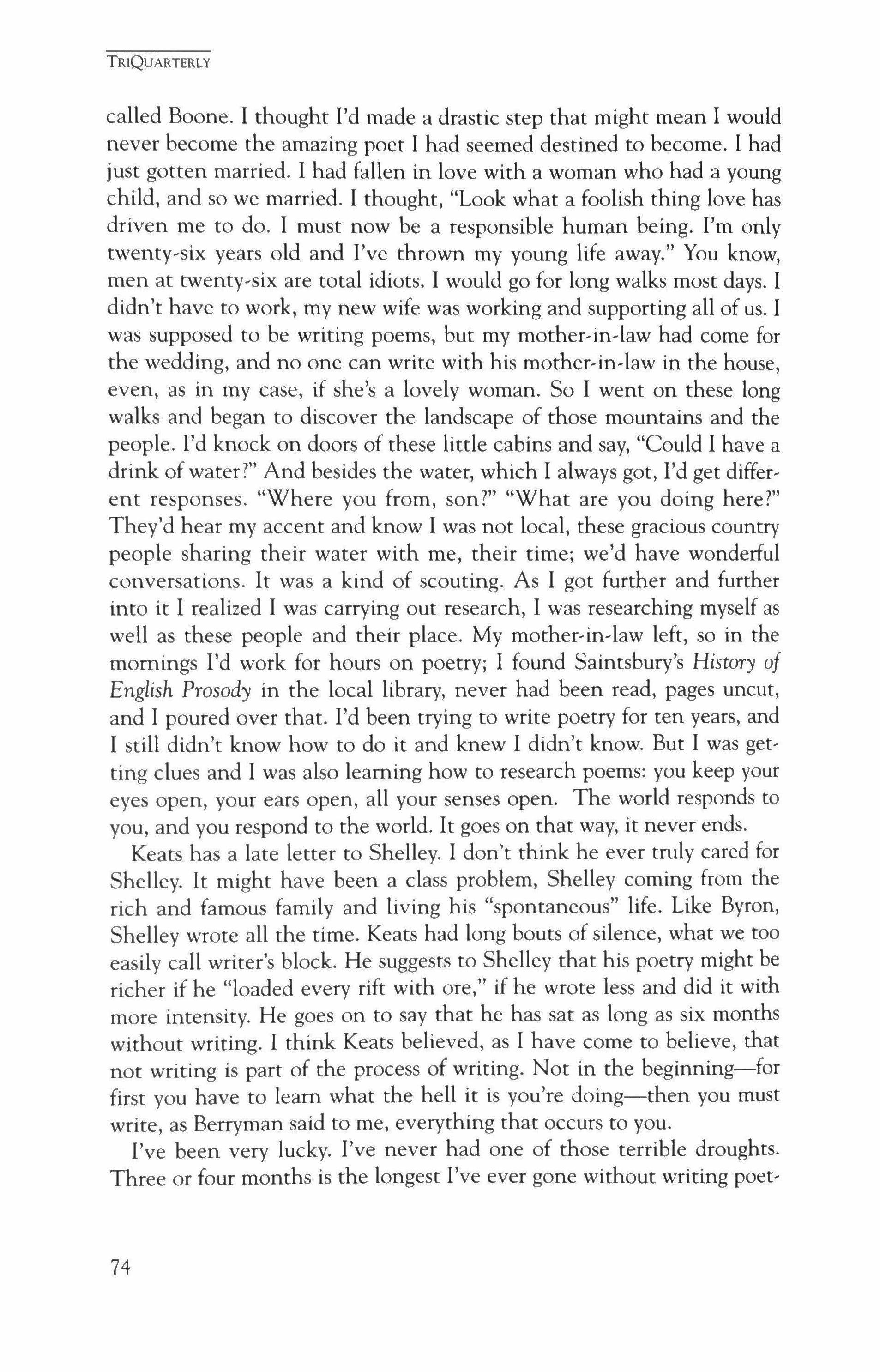
called Boone. I thought I'd made a drastic step that might mean I would never become the amazing poet I had seemed destined to become. I had just gotten married. I had fallen in love with a woman who had a young child, and so we married. I thought, "Look what a foolish thing love has driven me to do. I must now be a responsible human being. I'm only twenty-six years old and I've thrown my young life away." You know, men at twenty-six are total idiots. I would go for long walks most days. I didn't have to work, my new wife was working and supporting all of us. I was supposed to be writing poems, but my mother-in-law had come for the wedding, and no one can write with his mother-in-law in the house, even, as in my case, if she's a lovely woman. So I went on these long walks and began to discover the landscape of those mountains and the people. I'd knock on doors of these little cabins and say, "Could I have a drink of water?" And besides the water, which I always got, I'd get different responses. "Where you from, son?" "What are you doing here?" They'd hear my accent and know I was not local, these gracious country people sharing their water with me, their time; we'd have wonderful conversations. It was a kind of scouting. As I got further and further into it I realized I was carrying out research, I was researching myself as well as these people and their place. My mother-in-law left, so in the mornings I'd work for hours on poetry; I found Saintsbury's History of English Prosody in the local library, never had been read, pages uncut, and I poured over that. I'd been trying to write poetry for ten years, and I still didn't know how to do it and knew I didn't know. But I was getting clues and I was also learning how to research poems: you keep your eyes open, your ears open, all your senses open. The world responds to you, and you respond to the world. It goes on that way, it never ends.
Keats has a late letter to Shelley. I don't think he ever truly cared for Shelley. It might have been a class problem, Shelley coming from the rich and famous family and living his "spontaneous" life. Like Byron, Shelley wrote all the time. Keats had long bouts of silence, what we too easily call writer's block. He suggests to Shelley that his poetry might be richer if he "loaded every rift with ore," if he wrote less and did it with more intensity. He goes on to say that he has sat as long as six months without writing. I think Keats believed, as I have come to believe, that not writing is part of the process of writing. Not in the beginning-for first you have to learn what the hell it is you're doing-then you must write, as Berryman said to me, everything that occurs to you.
I've been very lucky. I've never had one of those terrible droughts. Three or four months is the longest I've ever gone without writing poet-
TRIQUARTERLY
74
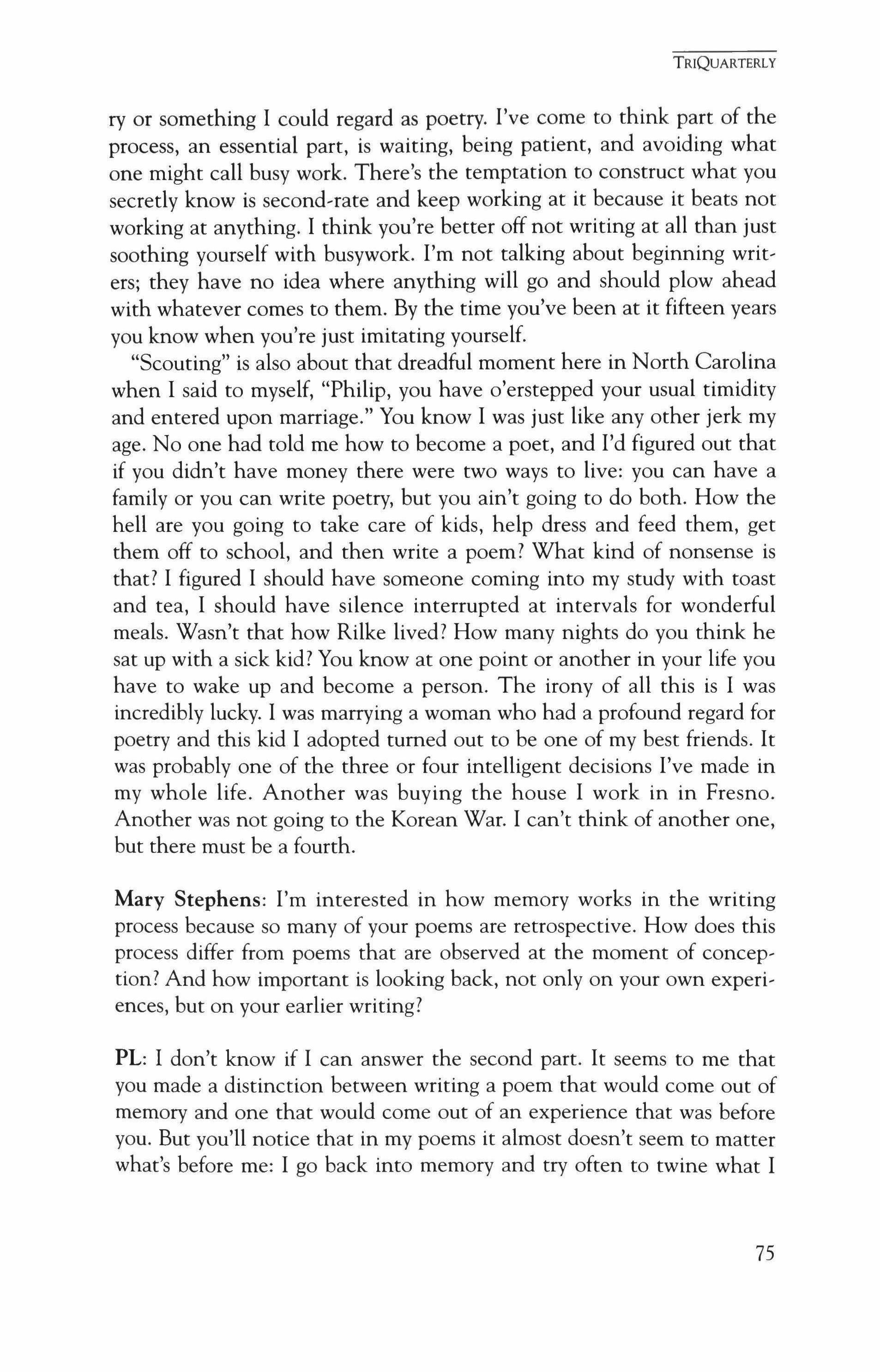
ry or something I could regard as poetry. I've come to think part of the process, an essential part, is waiting, being patient, and avoiding what one might call busy work. There's the temptation to construct what you secretly know is second-rate and keep working at it because it beats not working at anything. I think you're better off not writing at all than just soothing yourself with busywork. I'm not talking about beginning writ, ers; they have no idea where anything will go and should plow ahead with whatever comes to them. By the time you've been at it fifteen years you know when you're just imitating yourself.
"Scouting" is also about that dreadful moment here in North Carolina when I said to myself, "Philip, you have o'erstepped your usual timidity and entered upon marriage." You know I was just like any other jerk my age. No one had told me how to become a poet, and I'd figured out that if you didn't have money there were two ways to live: you can have a family or you can write poetry, but you ain't going to do both. How the hell are you going to take care of kids, help dress and feed them, get them off to school, and then write a poem? What kind of nonsense is that? I figured I should have someone coming into my study with toast and tea, I should have silence interrupted at intervals for wonderful meals. Wasn't that how Rilke lived? How many nights do you think he sat up with a sick kid? You know at one point or another in your life you have to wake up and become a person. The irony of all this is I was incredibly lucky. I was marrying a woman who had a profound regard for poetry and this kid I adopted turned out to be one of my best friends. It was probably one of the three or four intelligent decisions I've made in my whole life. Another was buying the house I work in in Fresno. Another was not going to the Korean War. I can't think of another one, but there must be a fourth.
Mary Stephens: I'm interested in how memory works in the writing process because so many of your poems are retrospective. How does this process differ from poems that are observed at the moment of conception? And how important is looking back, not only on your own experiences, but on your earlier writing?
PL: I don't know if I can answer the second part. It seems to me that you made a distinction between writing a poem that would come out of memory and one that would come out of an experience that was before you. But you'll notice that in my poems it almost doesn't seem to matter what's before me: I go back into memory and try often to twine what I
TRIQUARTERLY
75

remember with what I'm observing. And I'm not sure why I do this, although it's obviously something that I do. I think that a lot of it has to do with the fact that I feel an urgency to record things because they seem so transitory. And I am now a kind of archive of people, places and things that no longer exist. I carry them around with me, and if I get them on paper I give them at least some existence. And that seems like a legitimate thing to be doing with poetry. To be granting some form of permanence-I mean, however permanent the poems are-to the things, to a way of life and the people who made up that way of life.
As far as looking back at my own writing, I try not to. I purposely don't memorize my poems. When I'm on the brink of memorizing a poem I stop using it at readings. I wait for time to erase it because I don't want to memorize it. I don't mind memorizing other people's poems, but I'm not going to sit down and write a poem that I've memorized by Hardy or Wyatt or Dylan Thomas. I'm not going to do that. Whereas a poem that's my own may haunt me if I go back to it. I don't want to go back to it. I don't want to look at it. And sometimes when I look at them I'm a little depressed by the fact that they're better than what I'm writing now. That's another thing: I believe some of the older poems have more imagination, more vitality. I know that these last two books have won all these honors, but I actually prefer some of the older books.
People ask me, for example, what's the book I'm working on now, what's it about, and when I tell them the truth they think I'm putting them on. I say, "I don't know yet. I won't know until I'm done." But that's the truth. That's happened with every book I've ever written. I didn't know what the book was about until I finished it or got close to finishing it. And then I saw, "Oh, that's what I've been obsessed with!" For example, in writing the last book, The Simple Truth, I saw at a certain point that there were three poems I needed. I had taken out a group of poems that either weren't good enough or didn't belong. I said to myself, "I need three poems to go right there," and in the next month I wrote them. That was very rare for me.
With the book What Work Is, I suddenly realized I needed a long poem at the center, so I revived a poem I'd been working on for at least a dozen years and had failed to finish, "Burned." I looked at what I had and knew the time had come to finish it. And I got it. I didn't get it right, but I think I got it as right as I would probably ever get it. Sitting over it another year wouldn't have made it any better, so I let it out into the world. And it was well treated. Have I answered your question?
TRIQUARTERLY
76
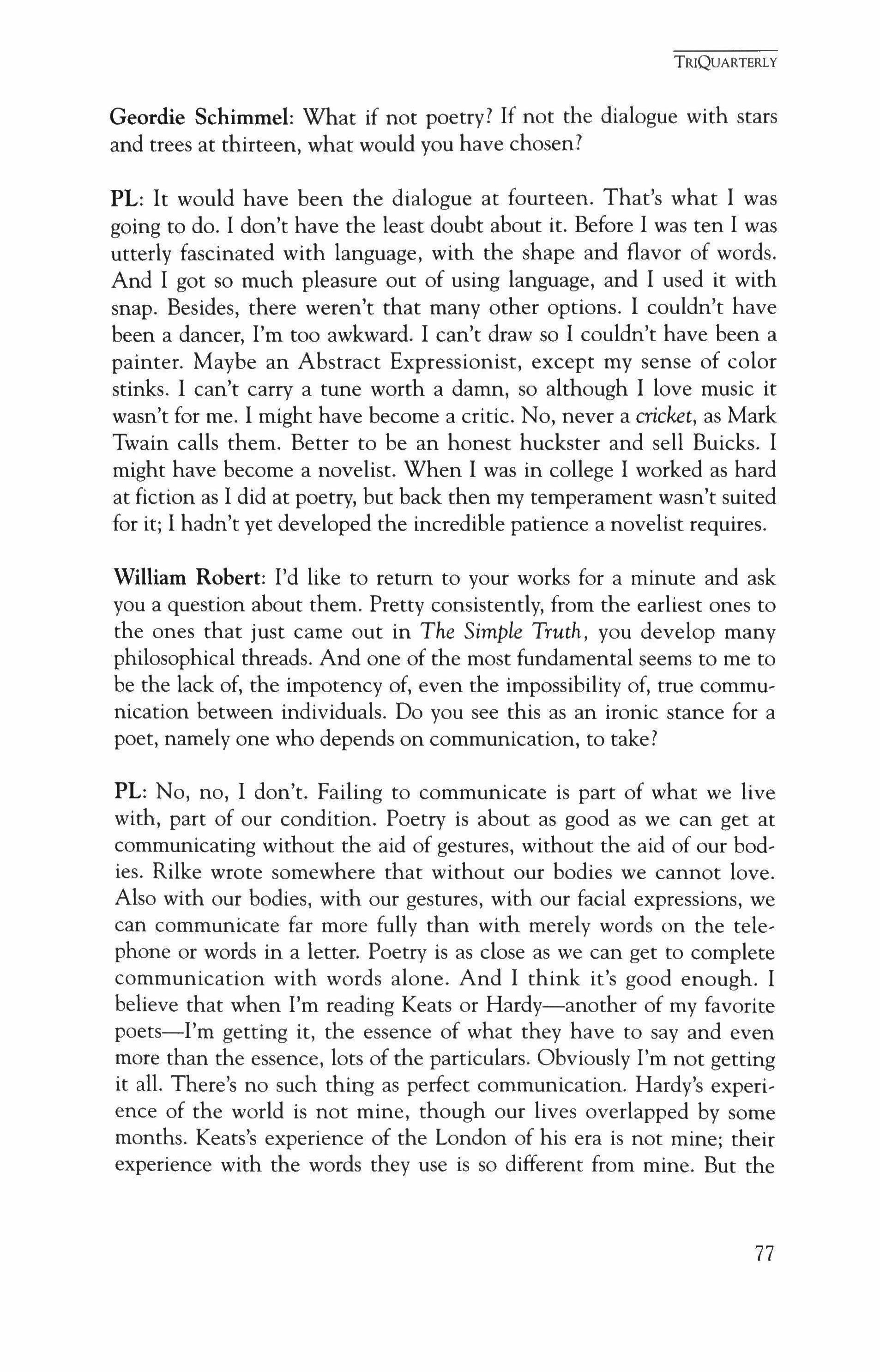
Geordie Schimmel: What if not poetry? If not the dialogue with stars and trees at thirteen, what would you have chosen?
PL: It would have been the dialogue at fourteen. That's what I was going to do. I don't have the least doubt about it. Before I was ten I was utterly fascinated with language, with the shape and flavor of words. And I got so much pleasure out of using language, and I used it with snap. Besides, there weren't that many other options. I couldn't have been a dancer, I'm too awkward. I can't draw so I couldn't have been a painter. Maybe an Abstract Expressionist, except my sense of color stinks. I can't carry a tune worth a damn, so although I love music it wasn't for me. I might have become a critic. No, never a cricket, as Mark Twain calls them. Better to be an honest huckster and sell Buicks. I might have become a novelist. When I was in college I worked as hard at fiction as I did at poetry, but back then my temperament wasn't suited for it; I hadn't yet developed the incredible patience a novelist requires.
William Robert: I'd like to return to your works for a minute and ask you a question about them. Pretty consistently, from the earliest ones to the ones that just came out in The Simple Truth, you develop many philosophical threads. And one of the most fundamental seems to me to be the lack of, the impotency of, even the impossibility of, true cornmunication between individuals. Do you see this as an ironic stance for a poet, namely one who depends on communication, to take?
PL: No, no, I don't. Failing to communicate is part of what we live with, part of our condition. Poetry is about as good as we can get at communicating without the aid of gestures, without the aid of our bodies. Rilke wrote somewhere that without our bodies we cannot love. Also with our bodies, with our gestures, with our facial expressions, we can communicate far more fully than with merely words on the telephone or words in a letter. Poetry is as close as we can get to complete communication with words alone. And I think it's good enough. I believe that when I'm reading Keats or Hardy-another of my favorite poets-I'm getting it, the essence of what they have to say and even more than the essence, lots of the particulars. Obviously I'm not getting it all. There's no such thing as perfect communication. Hardy's experience of the world is not mine, though our lives overlapped by some months. Keats's experience of the London of his era is not mine; their experience with the words they use is so different from mine. But the
TRIQUARTERLY
77

miracle of poetry is that it can cross so many of these barriers. Approximate communication seems so amazing itself when you consider how separate we are or how separate we have conceived of ourselves. I believe that we aren't nearly as separate as we think we are. If, for example, someone in this room were running a fever we would all heat up a bit, we'd feel it even though we might not know we felt it. Our eyes tell us we're more separate than we actually are, and our conscious experience tells us, and we've conditioned ourselves to believe we're more separate. But to get back to poetry, given who we've created out of ourselves, poetry is miraculous.
But you're right: there is an obsession in much of my work with the failures of people to communicate, but those failures are usually very specific. I'm usually concerned with a few people, perhaps only two, and how they fail to communicate. A book that moved me enormously when I was young, maybe eighteen, was Winesburg, Ohio. I remember a story about two very lonely people, a man and a woman, who have no one to communicate with and whose experience of love is very limited. As I recall-I haven't read the story in ages-they get together and they discover they have these mutual needs and they could be dear friends. As I recall the man oversteps the bounds of this budding friendship; while the woman is trying to speak out of her joy that she has a listener he shuts her up by kissing her. There's this awful and wonderful irony that he has chosen to communicate his love or joy in the occasion this way, and she wants to communicate it another way and you can't do both at the same time. She says something like, "But, Harold, let me tell you what it was like to be six and a solitary girl," and he goes smack, smack, as if to say, "Let me show you what it's like to be twenty-seven and a man in the company of a woman." I thought Anderson had captured something amazing: how even when we fail each other the miraculous happens, they cross that great divide that separates one person from another. I believe it's possible. I believe I've done it, totally. I try to record it in my poem "The Escape." The communication between the speaker and the woman is total, and he becomes a creature endowed with two sexes, an angel with no wings. They don't do it merely with words, but they do it. He touches the woman and discovers he's also touching himself because they've become one being.
Kristina Nevius: Through this interview you've mentioned languages. What effect have foreign languages and cultures had on your poetry?
TRIQUARTERLY
78

PL: When I go to a foreign country where I don't speak the language I usually make no effort to learn it. I'm just "The Ugly American," as Eugene Burdick called us in his novel years ago. I enjoy the ignorance, I use it. Say I go into the Campo Fiori, the great open market in Rome. I stop and listen to two people standing in line to buy eggs. The man says to the woman, "Was there ever a more perfect shape than an egg? And the luminosity! The amazing delicacy of the color, the way it takes the hues of the air. Not only does the egg contain sustenance for us, for our bodies which feed our souls, but within each egg is the potential of a creature that can fly." Amazing, they say such rare things in such cornmon places in Rome; Italians are angels. Of course that's not what they're saying at all. The guy has turned to his cousin Elfonzina and said, "Holy shit, the bastard raised the price again!" Because I don't speak Italian I've endowed him with poetry, and I say to myself, "How fortunate you are, Philip, to be living among such profound people when in fact they're saying the same trivial things they'd be saying in Fresno or Detroit."
One invaluable thing I learned from studying Spanish was how great our own poetry is, how many things it can do that Spanish poetry hasn't done. We appear in American poetry and we speak in our daily voices. It gave me a new regard for American poetry. Discovering the great poetry written in Spanish in this century was intoxicating. There's also much more awful poetry written in Spain than in the U.S. because anyone who goes to the university in Spain publishes a book of poetry. The dentist will hand you a beautifully printed book of poems-each dentist has one-all about the perfume of flowers, the brightness of the moon, the tenderness of kisses, the sweetness of the night air of Andalusia, the kindness of wild herbs. The poetry of love, dreams, moonlight, fantasy. Absolute garbage. It's so bad they couldn't even sing it in Nashville, and they can sing anything in Nashville. The great poetry is able to use the same vocabulary and break all the silly conventions and astonish you.
Even though I had to work like a demon on my Spanish, I got a great kick out of being able to speak it and understand it. I also found it exhausting to speak it for hours on end. One day I got so tired I went into a little park near the futbol stadium in Barcelona, flopped on a bench and slept for hours. Once I started dreaming in Spanish I got scared I'd lose my American English, so I would go down to the port and speak to American sailors and marines off the ships.
I think, too, it's very good to read poetry in another language to discover the immense possibilities we're not taking advantage of in our
TRIQUARTERLY
79

poetry. I know you can discover much of that reading translations, say of Zbigniew Herbert or Tomas Transtrorner, but I think you get an even keener sense when you read someone like Garda Lorca or Cesar Vallejo in the original. And you're inspired in the same way you're inspired when you read Whitman or Dickinson or Williams. I can still recall struggling with the poems of Miguel Hernandez in the original and those sudden glimpses of how astonishing the poetry was, how brutal and lyrical at exactly the same moment. I'd never read anything like it; it reconfirmed my belief in the power and beauty of poetry in the face of the worst life can dish out. These are poems that grew out of the most tragic circumstances. They are full of indescribable pain, which he fore, sees. They are very great and very difficult poems; I had to work hours, and then I would get this glimpse of their majesty. Going to Spain, living there, was a wonderful experience for me. lowe the discovery of the poetry mainly to Hardie St. Martin, the poet and translator I met in Barcelona. He was working on his great anthology, Roots and Wings, and generously took me into his stable of translators.
Alex Crumbley: Did it take you long to become comfortable writing persona poems? And when you do, do you have trouble with people assuming you're the narrator when you're not?
PL: First thing, it didn't take long at all. Once I decided I wanted to do it, I just did it. I had written a lot of fiction, at least a dozen stories and large chunks of two novels, so I was used to the problem of getting into the heads of other characters and getting them to speak in my writing.
As far as people misreading, I don't much care. I remember a review I got, I think it was in the Village Voice, in which a woman wrote that one of my poems from 7 Years from Somewhere was very curious. The poem, "I Could Believe," is in the voice of a guy who has come back from the Spanish Civil War. This woman wrote something like, "Levine is an autobiographical poet, so it's amazing to discover that he fought in the Spanish Civil War, which ended when he was eleven." She mused over this, and then wrote, "Perhaps he's trying something different." Perhaps if I'd written in the voice of someone coming back from the American Civil War she wouldn't have missed it, but you can't be sure. If you're troubled by being misunderstood then you'd better not publish. Even our fellow poets and friends read our poetry differently. I remember going to a class at the University of Minnesota and having a conversation with them; it was much like today. At the end someone asked if I
TRIQUARTERLY
80
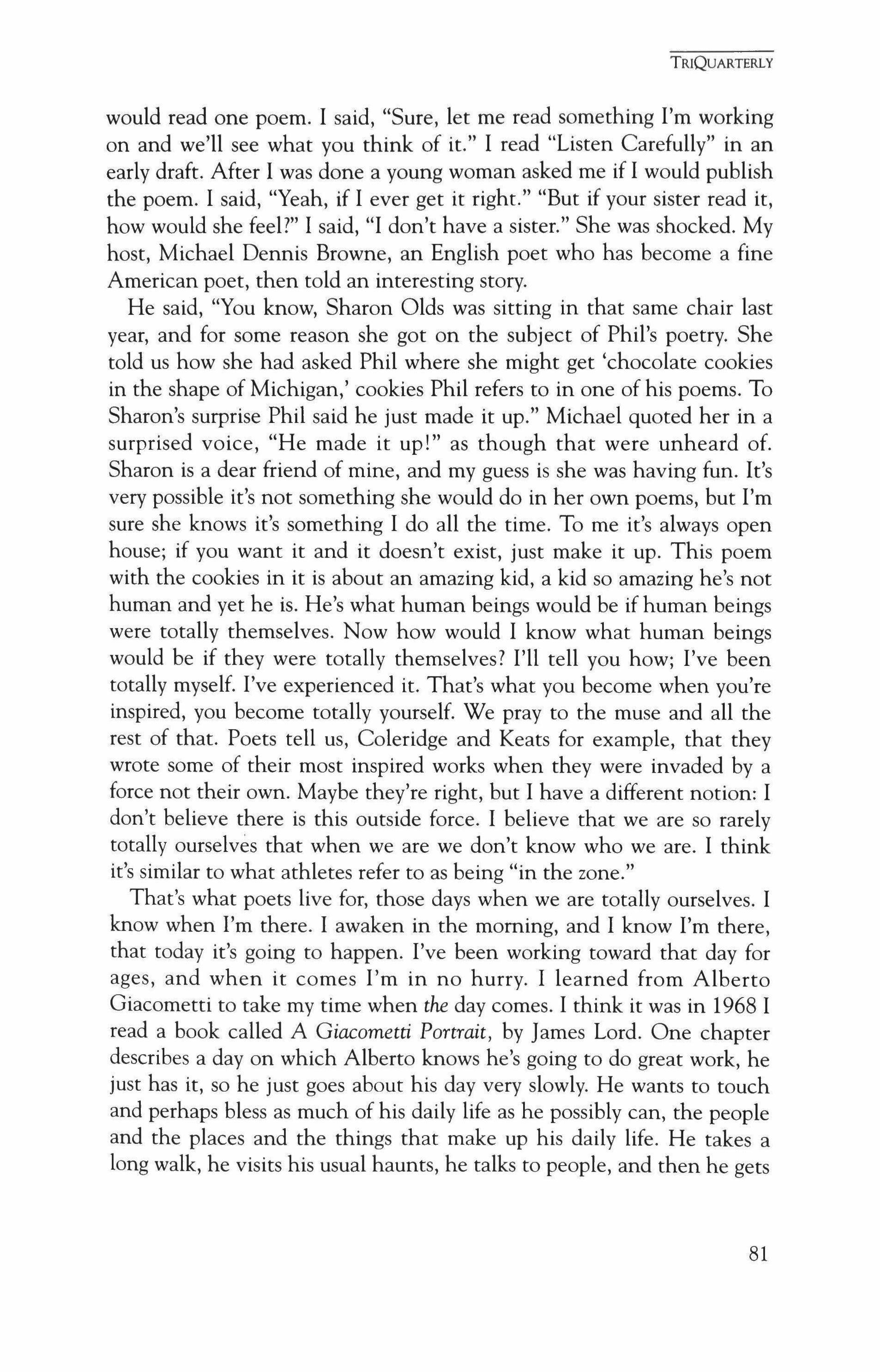
would read one poem. I said, "Sure, let me read something I'm working on and we'll see what you think of it." I read "Listen Carefully" in an early draft. After I was done a young woman asked me if I would publish the poem. I said, "Yeah, if I ever get it right." "But if your sister read it, how would she feel?" I said, "I don't have a sister." She was shocked. My host, Michael Dennis Browne, an English poet who has become a fine American poet, then told an interesting story.
He said, "You know, Sharon Olds was sitting in that same chair last year, and for some reason she got on the subject of Phil's poetry. She told us how she had asked Phil where she might get 'chocolate cookies in the shape of Michigan,' cookies Phil refers to in one of his poems. To Sharon's surprise Phil said he just made it up." Michael quoted her in a surprised voice, "He made it up!" as though that were unheard of. Sharon is a dear friend of mine, and my guess is she was having fun. It's very possible it's not something she would do in her own poems, but I'm sure she knows it's something I do all the time. To me it's always open house; if you want it and it doesn't exist, just make it up. This poem with the cookies in it is about an amazing kid, a kid so amazing he's not human and yet he is. He's what human beings would be if human beings were totally themselves. Now how would I know what human beings would be if they were totally themselves? I'll tell you how; I've been totally myself. I've experienced it. That's what you become when you're inspired, you become totally yourself. We pray to the muse and all the rest of that. Poets tell us, Coleridge and Keats for example, that they wrote some of their most inspired works when they were invaded by a force not their own. Maybe they're right, but I have a different notion: I don't believe there is this outside force. I believe that we are so rarely totally ourselves that when we are we don't know who we are. I think it's similar to what athletes refer to as being "in the zone."
That's what poets live for, those days when we are totally ourselves. I know when I'm there. I awaken in the morning, and I know I'm there, that today it's going to happen. I've been working toward that day for ages, and when it comes I'm in no hurry. I learned from Alberto Giacometti to take my time when the day comes. I think it was in 1968 I read a book called A Giacometti Portrait, by James Lord. One chapter describes a day on which Alberto knows he's going to do great work, he just has it, so he just goes about his day very slowly. He wants to touch and perhaps bless as much of his daily life as he possibly can, the people and the places and the things that make up his daily life. He takes a long walk, he visits his usual haunts, he talks to people, and then he gets
TRIQUARTERLY
81
TRIQUARTERLY
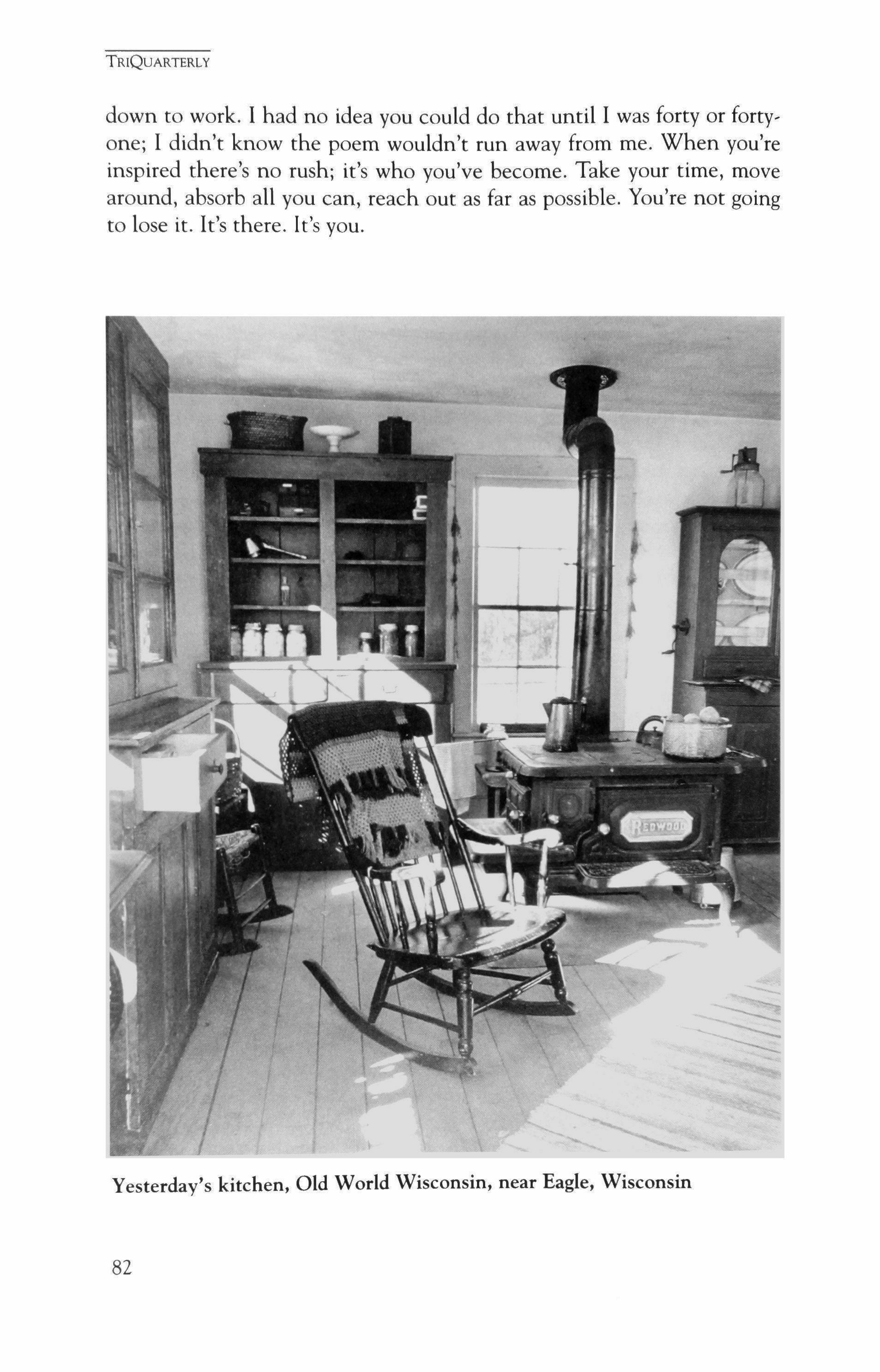
down to work. I had no idea you could do that until I was forty or fortyone; I didn't know the poem wouldn't run away from me. When you're inspired there's no rush; it's who you've become. Take your time, move around, absorb all you can, reach out as far as possible. You're not going to lose it. It's there. It's you.
82
Yesterday's kitchen, Old World Wisconsin, near Eagle, Wisconsin
Four Poems
 Philip Levine
Philip Levine
The Harbor at Nevermind, 1915
The dawn is early. It was brought in by four fishing boats that rowed back on a calm sea with no catch at all.
The morning is angry. The little boats, empty now, knock knock against the pier. A wedge of burned coffee drives down from the village, wakening slowly, one house at a time where the fishermen have gone back to bed nursing their rage.
If that were not my father standing alone between two huge graying rocks this could all be nothing or a dream.
If this were not the end of a year at war, I could tum from the page and go about my morning calmly and you could amble to the window seventy-eight years from here and gaze into a cloudless sky for a sign.
Suddenly you take my hand and we peer into the haze of our century hoping to find an answer somewhere
TRIQUARTERLY 83
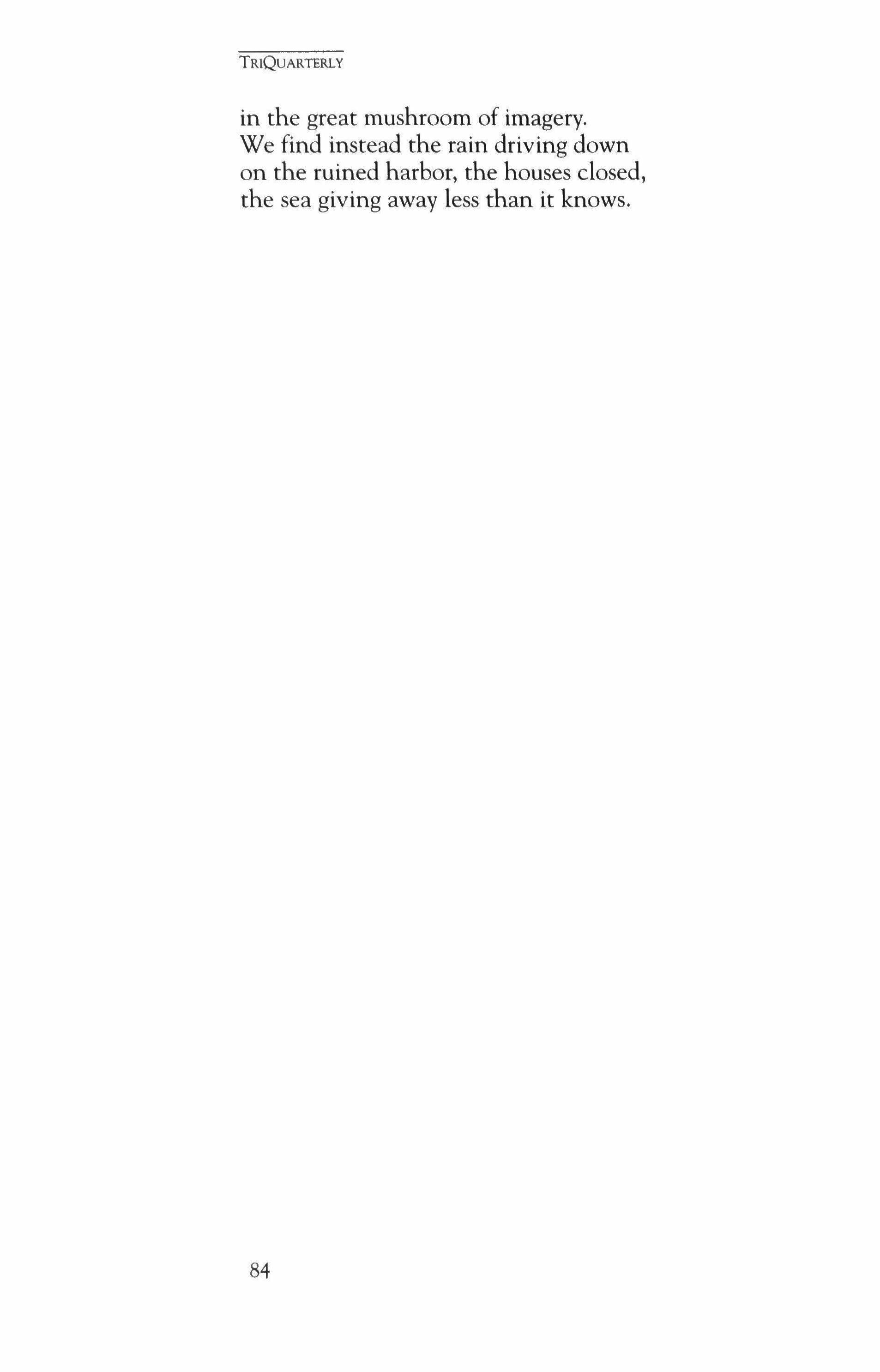
in the great mushroom of imagery. We find instead the rain driving down on the ruined harbor, the houses closed, the sea giving away less than it knows.
TRIQUARTERLY
84
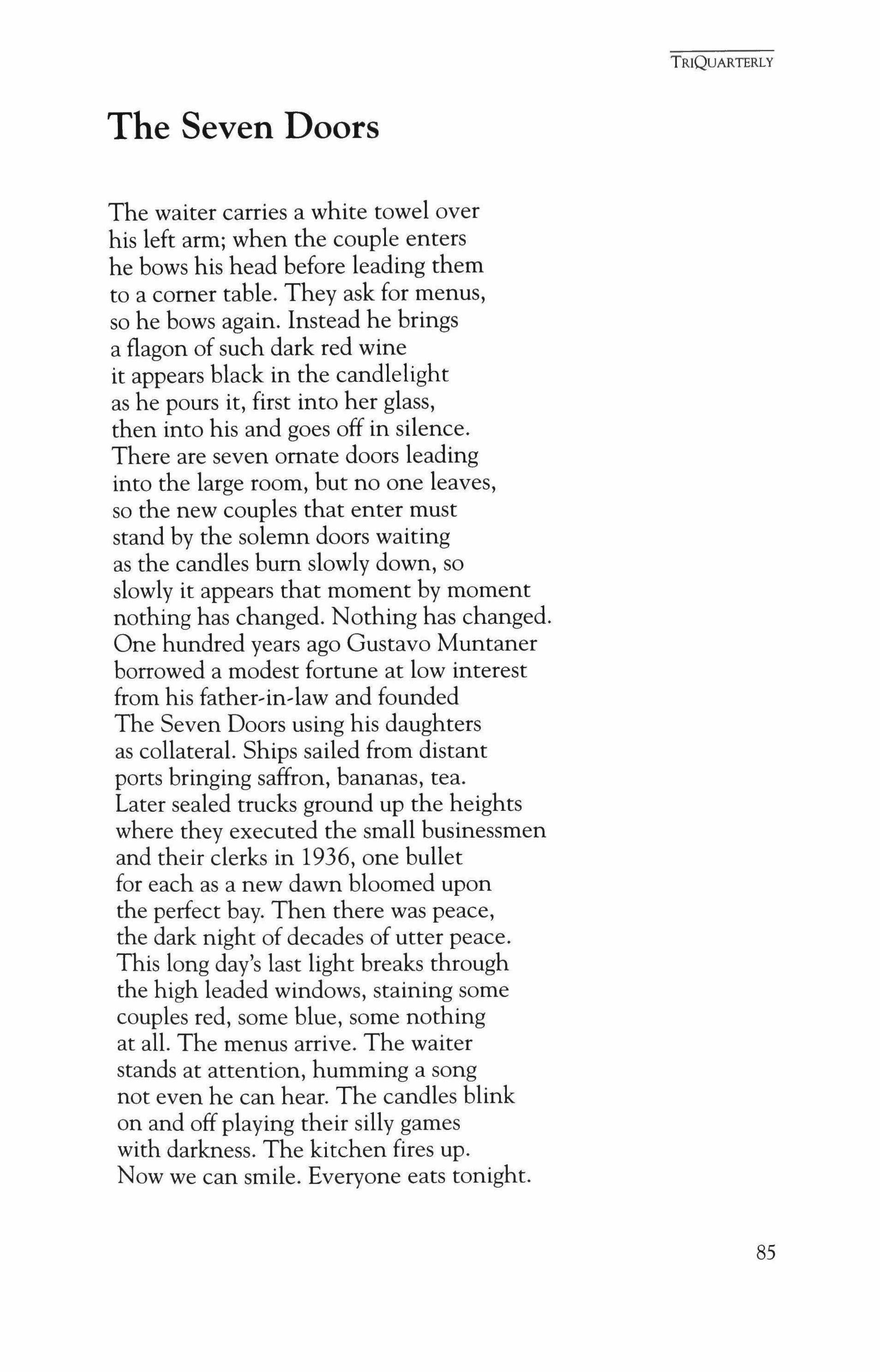
The Seven Doors
The waiter carries a white towel over his left arm; when the couple enters he bows his head before leading them to a comer table. They ask for menus, so he bows again. Instead he brings a flagon of such dark red wine it appears black in the candlelight as he pours it, first into her glass, then into his and goes off in silence. There are seven ornate doors leading into the large room, but no one leaves, so the new couples that enter must stand by the solemn doors waiting as the candles bum slowly down, so slowly it appears that moment by moment nothing has changed. Nothing has changed. One hundred years ago Gustavo Muntaner borrowed a modest fortune at low interest from his father,in,law and founded The Seven Doors using his daughters as collateraL Ships sailed from distant ports bringing saffron, bananas, tea. Later sealed trucks ground up the heights where they executed the small businessmen and their clerks in 1936, one bullet for each as a new dawn bloomed upon the perfect bay. Then there was peace, the dark night of decades of utter peace. This long day's last light breaks through the high leaded windows, staining some couples red, some blue, some nothing at alL The menus arrive. The waiter stands at attention, humming a song not even he can hear. The candles blink on and off playing their silly games with darkness. The kitchen fires up. Now we can smile. Everyone eats tonight.
TRIQUARTERLY
85
On the Run
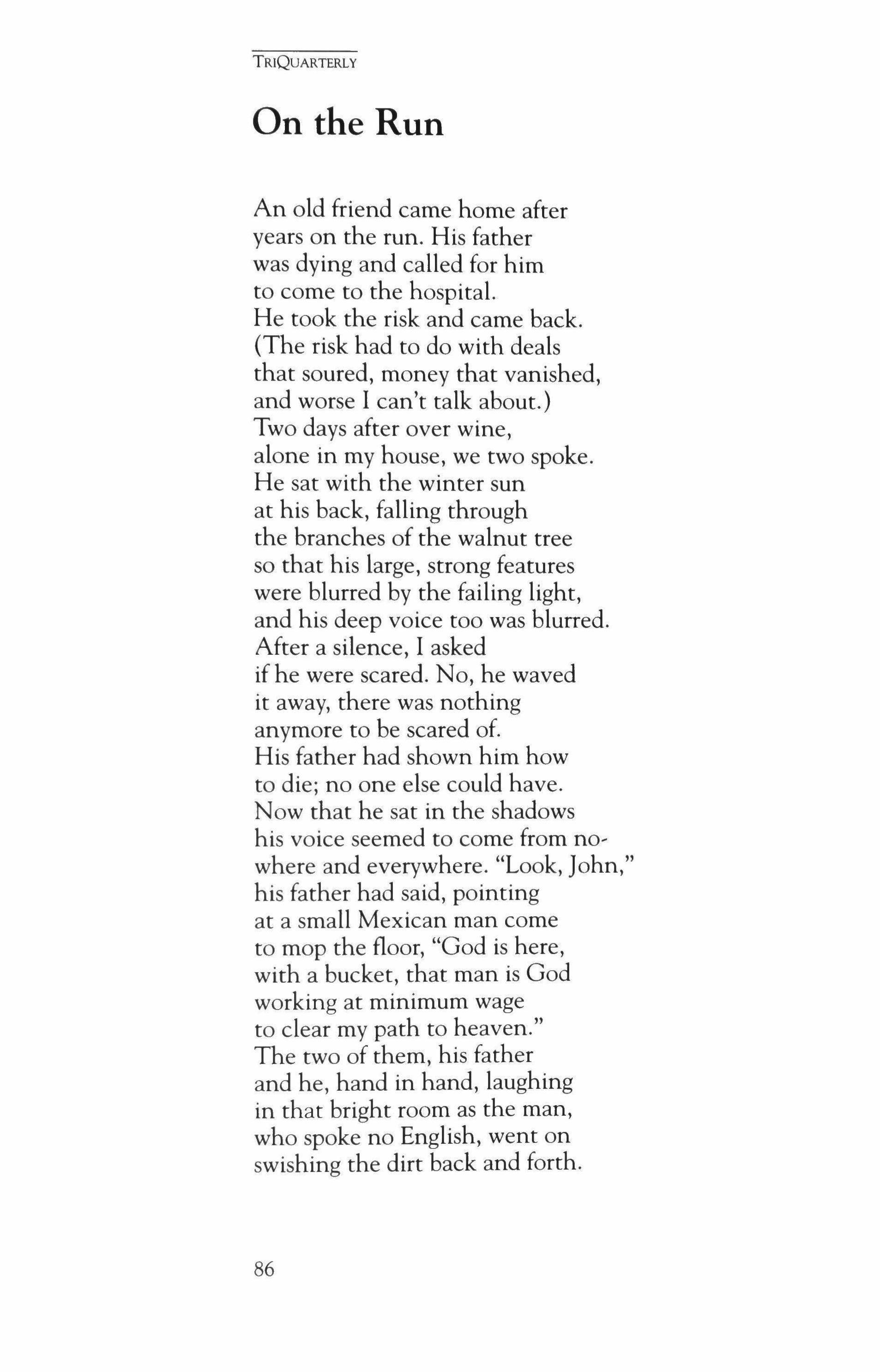
An old friend came home after years on the run. His father was dying and called for him to come to the hospital. He took the risk and came back. (The risk had to do with deals that soured, money that vanished, and worse I can't talk about.)
Two days after over wine, alone in my house, we two spoke. He sat with the winter sun at his back, falling through the branches of the walnut tree so that his large, strong features were blurred by the failing light, and his deep voice too was blurred. After a silence, I asked if he were scared. No, he waved it away, there was nothing anymore to be scared of. His father had shown him how to die; no one else could have. Now that he sat in the shadows his voice seemed to come from no, where and everywhere. "Look, John," his father had said, pointing at a small Mexican man come to mop the floor, "God is here, with a bucket, that man is God working at minimum wage to clear my path to heaven." The two of them, his father and he, hand in hand, laughing in that bright room as the man, who spoke no English, went on swishing the dirt back and forth.
TRIQUARTERLY
86
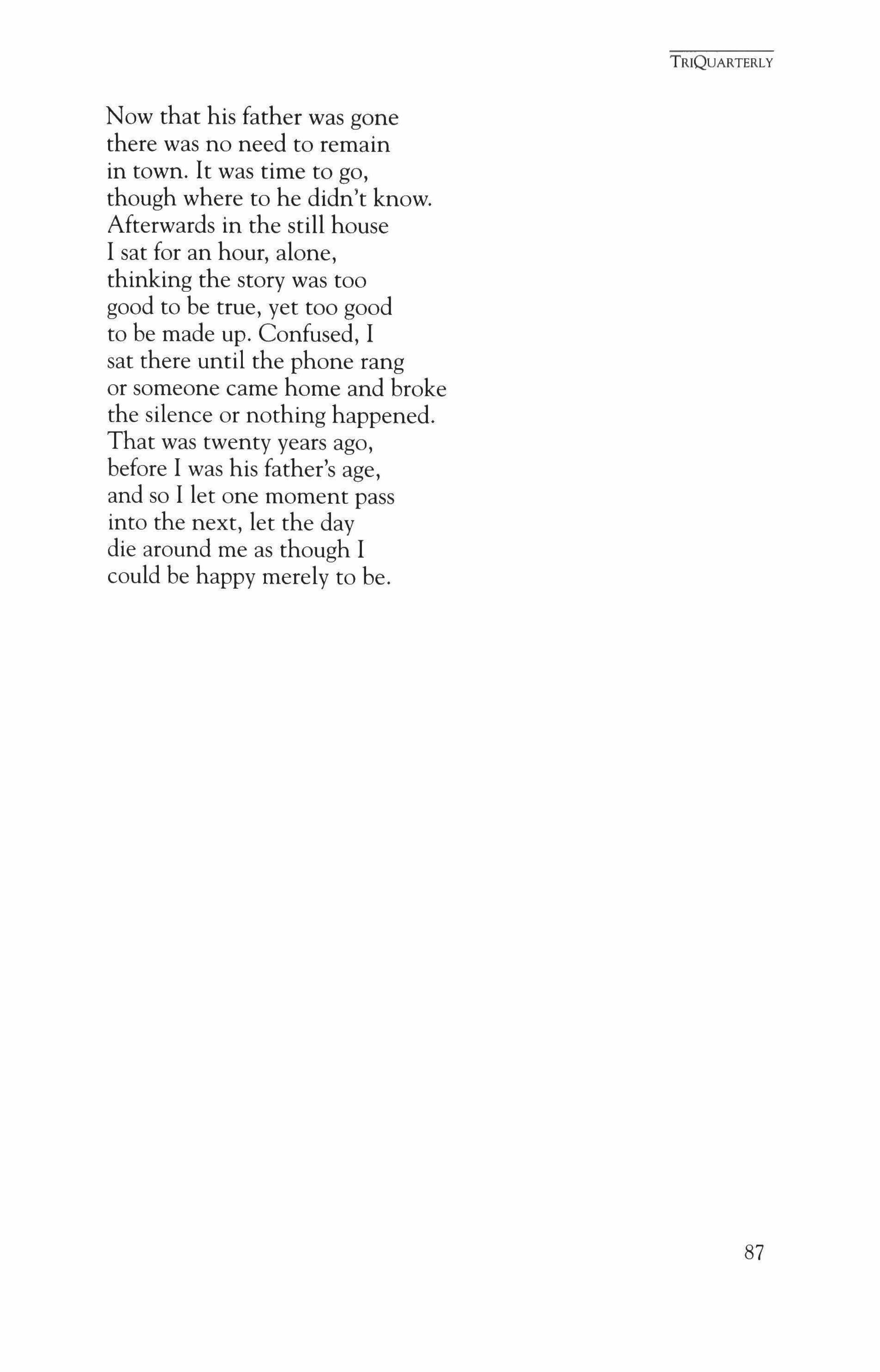
Now that his father was gone there was no need to remain in town. It was time to go, though where to he didn't know. Afterwards in the still house I sat for an hour, alone, thinking the story was too good to be true, yet too good to be made up. Confused, I sat there until the phone rang or someone came home and broke the silence or nothing happened. That was twenty years ago, before I was his father's age, and so I let one moment pass into the next, let the day die around me as though I could be happy merely to be.
TRIQUARTERLY
87
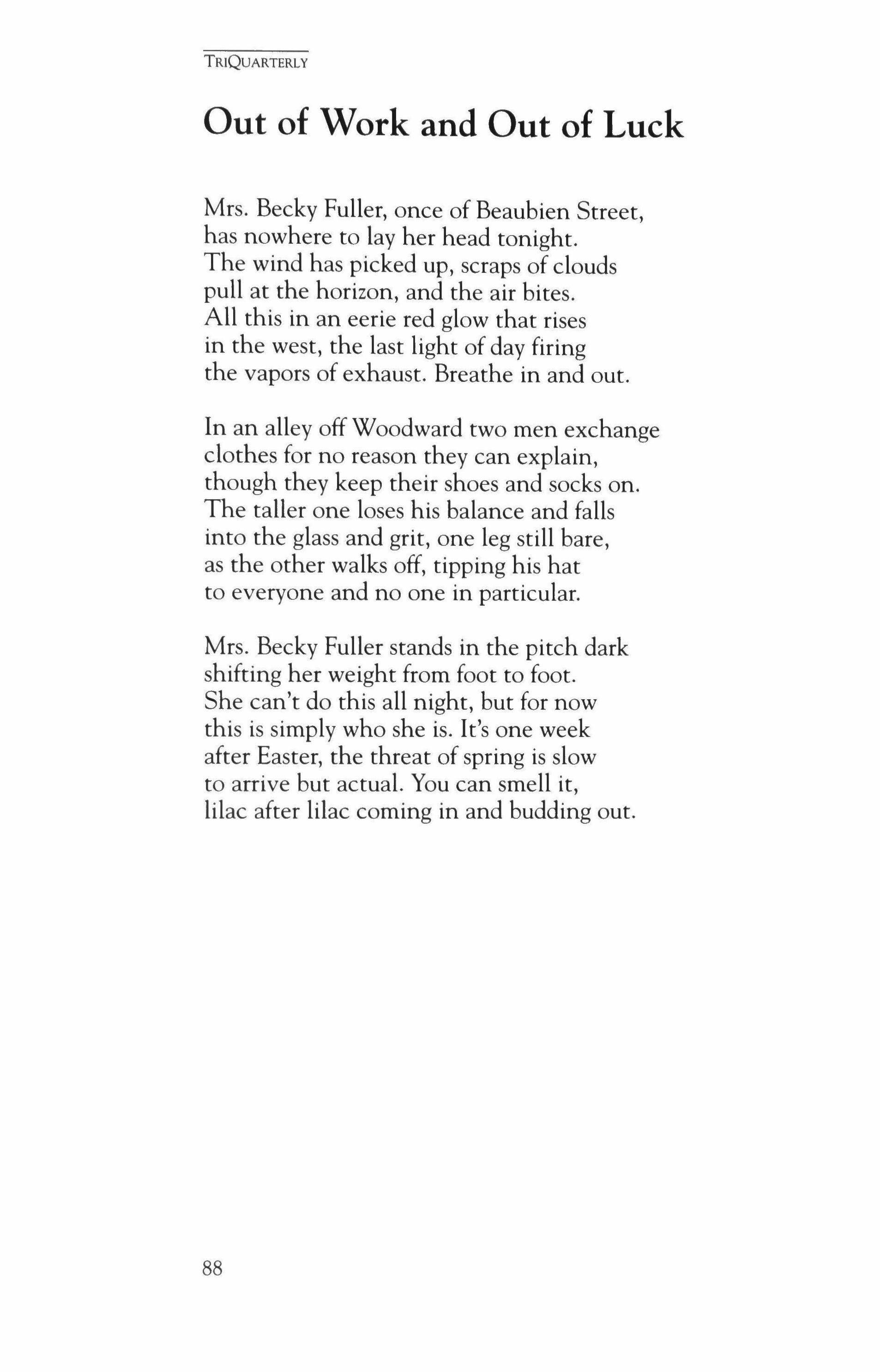
Out of Work and Out of Luck
Mrs. Becky Fuller, once of Beaubien Street, has nowhere to lay her head tonight. The wind has picked up, scraps of clouds pull at the horizon, and the air bites. All this in an eerie red glow that rises in the west, the last light of day firing the vapors of exhaust. Breathe in and out.
In an alley off Woodward two men exchange clothes for no reason they can explain, though they keep their shoes and socks on. The taller one loses his balance and falls into the glass and grit, one leg still bare, as the other walks off, tipping his hat to everyone and no one in particular.
Mrs. Becky Fuller stands in the pitch dark shifting her weight from foot to foot. She can't do this all night, but for now this is simply who she is. It's one week after Easter, the threat of spring is slow to arrive but actual. You can smell it, lilac after lilac coming in and budding out.
TRIQUARTERLY
88
Three Poems
Sharon Olds
Her First Week

She was so small, I would scan the crib a half-second to find her, face-down in a comer, limp as something gently flung down, or fallen from some sky an inch above the mattress. Cautiously I would tuck her arm along her side and gradually tum her over. She would tumble over part by part, like a load of damp laundry in the dryer, I'd slide a hand in, under her nape, inch the other under her back, and evenly lift her up. Her little bottom sat in my palm, her chest contained the puckered, moire sacs, and her neckI was afraid ofher neck, once I almost thought I heard it quietly snap, I looked at her and she swiveled her slate eyes and looked at me. It was in my care, the creature of her spine, like the first chordate, as if the history of the vertebrate had been placed in my hands. Every time I checked, she was still with us-someday there would be a human race. I could not see it in her eyes, but when I fed her, gathered her like a loose bouquet to my side and offered
TRIQUARTERLY 89
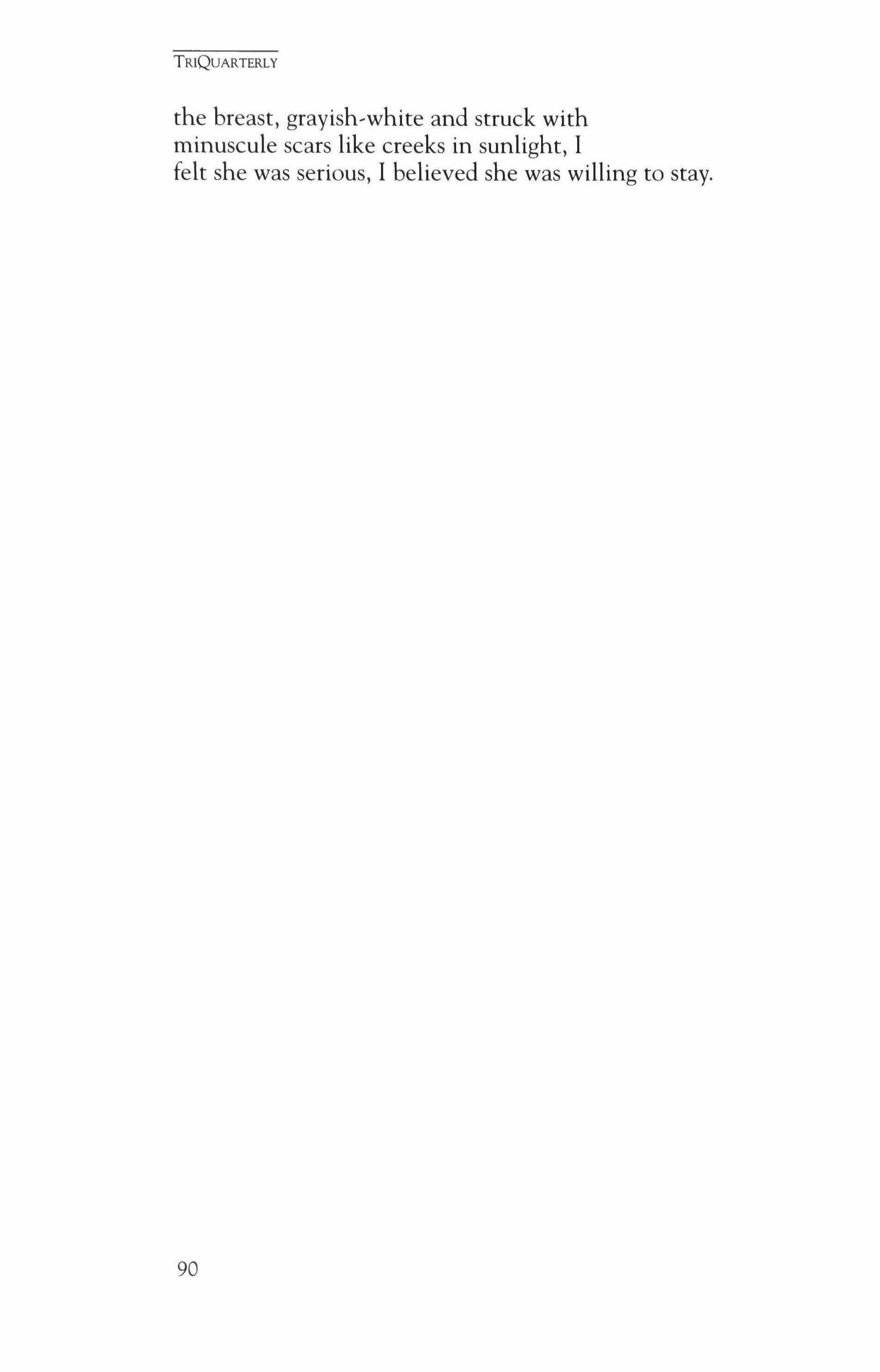
the breast, grayish-white and struck with minuscule scars like creeks in sunlight, I felt she was serious, I believed she was willing to stay.
Y
TRIQUARTERL
90
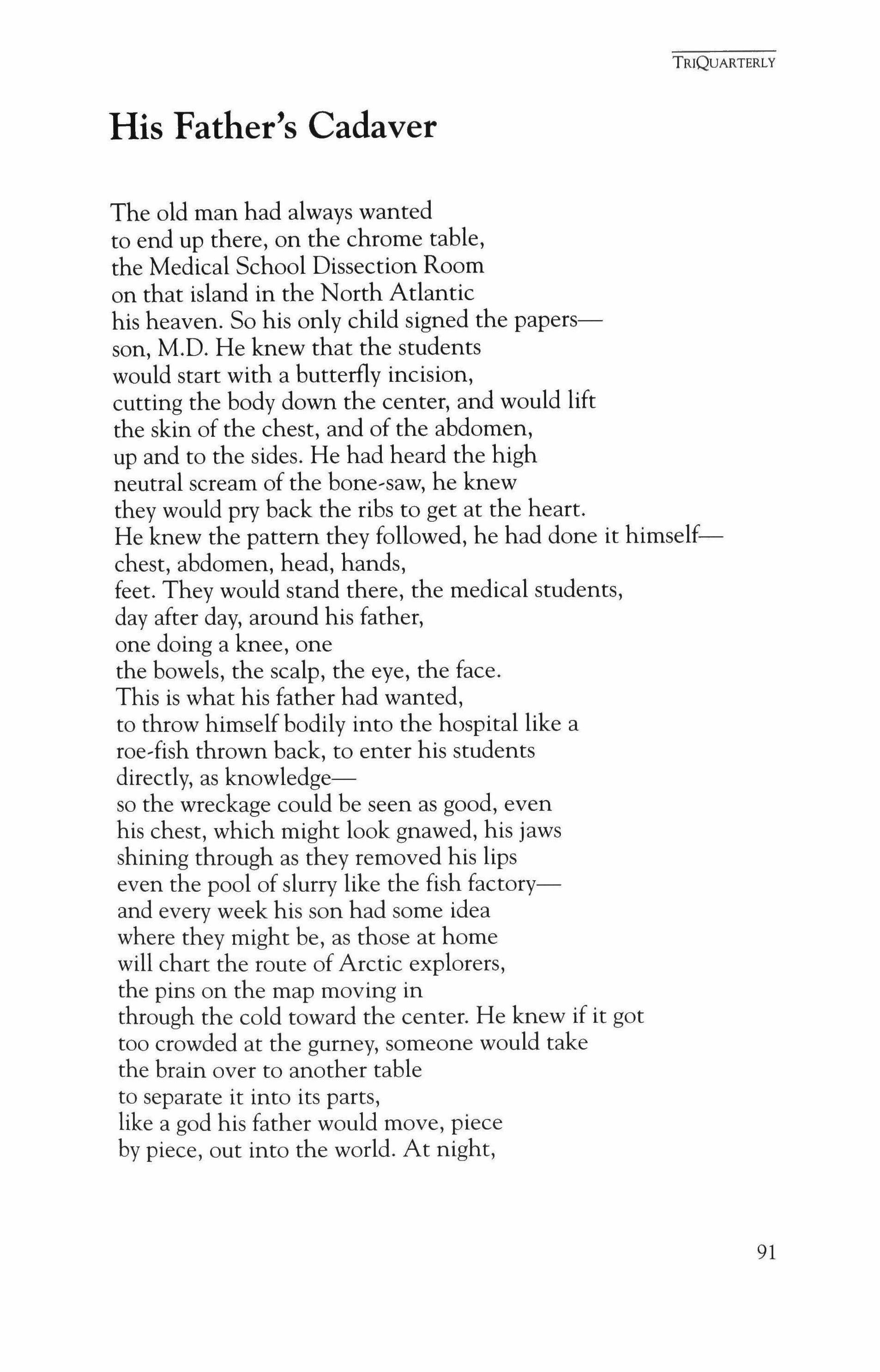
His Father's Cadaver
The old man had always wanted to end up there, on the chrome table, the Medical School Dissection Room on that island in the North Atlantic his heaven. So his only child signed the papersson, M.D. He knew that the students would start with a butterfly incision, cutting the body down the center, and would lift the skin of the chest, and of the abdomen, up and to the sides. He had heard the high neutral scream of the bone-saw, he knew they would pry back the ribs to get at the heart. He knew the pattern they followed, he had done it himselfchest, abdomen, head, hands, feet. They would stand there, the medical students, day after day, around his father, one doing a knee, one the bowels, the scalp, the eye, the face. This is what his father had wanted, to throw himself bodily into the hospital like a roe-fish thrown back, to enter his students directly, as knowledgeso the wreckage could be seen as good, even his chest, which might look gnawed, his jaws shining through as they removed his lips even the pool of slurry like the fish factoryand every week his son had some idea where they might be, as those at home will chart the route of Arctic explorers, the pins on the map moving in through the cold toward the center. He knew if it got too crowded at the gurney, someone would take the brain over to another table to separate it into its parts, like a god his father would move, piece by piece, out into the world. At night,
TRIQUARTERLY
91

they would cover everything with plastic bags, the veins and arteries lying fanned out across the back of the hand-by day they were murmuring Latin, memorizing the old man. For six months, from two thousand miles, the son follows it, with occasional horror, with respect, the long dismantling of that man who used to grease him down and lower him into the Bay of Fundy to check on his wave machine, which he hoped would harness the power of the sea, that man who had delivered him, his palm waiting under the head when it came forth, trusting himself, best, to touch first the mortal boy they had made.
TRIQUARTERLY
92
West
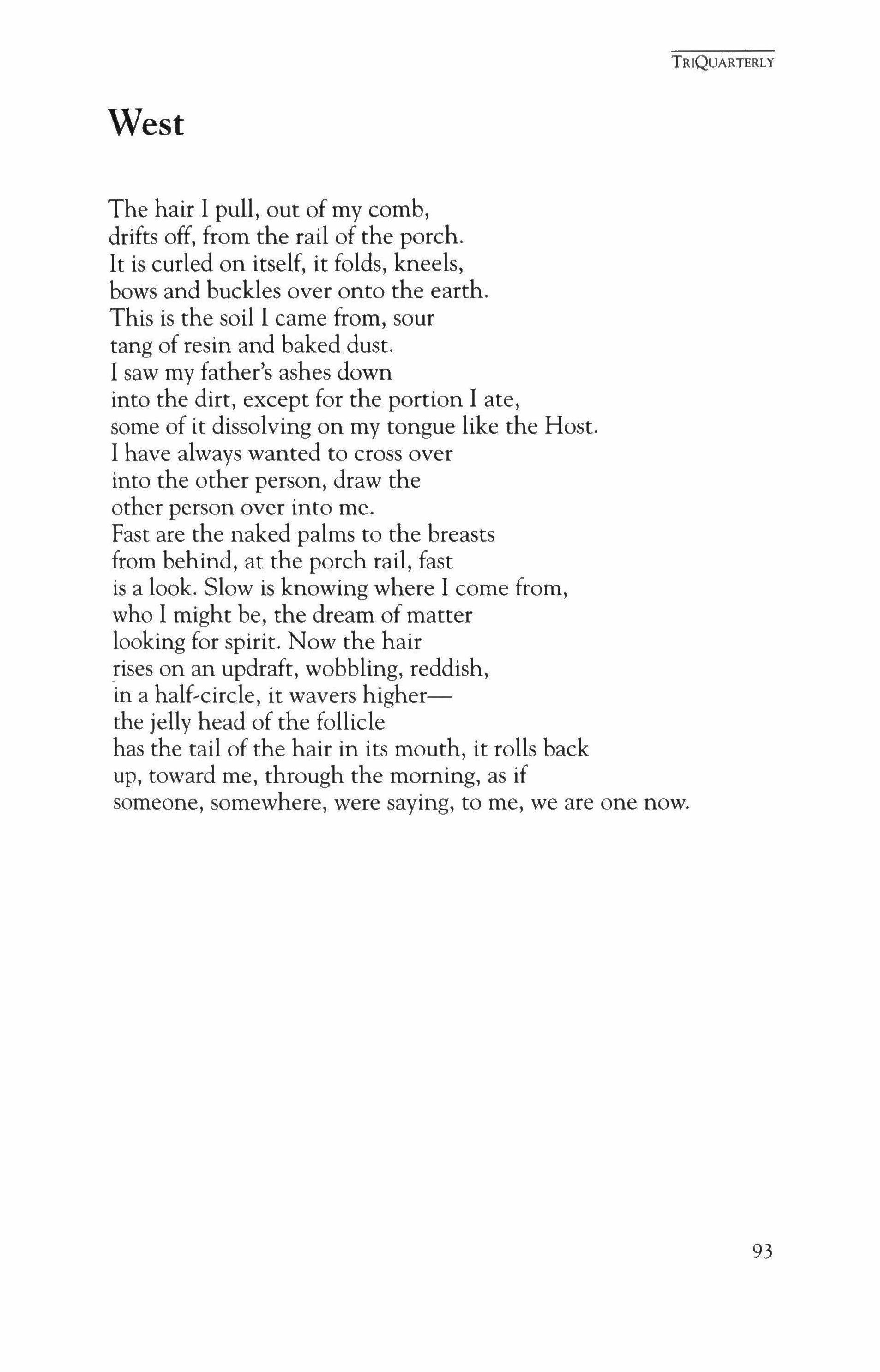
The hair I pull, out of my comb, drifts off, from the rail of the porch. It is curled on itself, it folds, kneels, bows and buckles over onto the earth. This is the soil I came from, sour tang of resin and baked dust. I saw my father's ashes down into the dirt, except for the portion I ate, some of it dissolving on my tongue like the Host. I have always wanted to cross over into the other person, draw the other person over into me. Fast are the naked palms to the breasts from behind, at the porch rail, fast is a look. Slow is knowing where I come from, who I might be, the dream of matter looking for spirit. Now the hair rises on an updraft, wobbling, reddish, in a half-circle, it wavers higherthe jelly head of the follicle has the tail of the hair in its mouth, it rolls back up, toward me, through the morning, as if someone, somewhere, were saying, to me, we are one now.
TRIQUARTERLY
93
Two Poems
Elise Paschen
My Father's Gun

My mother never guessed I was her witness the afternoon she emptied out his closet, saw her unclasp the case, as if embossed with gold, watched her touch it, heft it in hand, then place it back, her wedding stone refracting. Waking at night to find my door outlined by light, I made a wish: to grow as tall as my mother, to reach the shelf, to leave behind a curl of smoke, a thin suggestion, a j inn escaped from its underground bottle like those collected after their late dinners, spiraling out to slither through the crack of their bedroom door, twisting up into the refuge of my father's closet, shielded by rows of reassuring shoes, clean soldiers called to attention, shoe trees snug inside. Invisible in smoke, I'd take the gun and hurl it out into the quiet lake, that place where children play their games safe as houses and, sinking, it would leave a wake of rings within rings within rings.
TRIQUARTERLY
94
Stealing

Pick crack
Put back pocketed
Take account bolt steal
Put me in your pocket -Tracy Lord to Macaulay Connor in The Philadelphia Story
I. The Heist
the lock of this rib-cage: the safe. the loot you away in your tweed coat with stamps, subway tokens. a count before you and then back
you thief, oh thief
II. The Pocket
My old self vanished when you went taking assurance, too, departed, without argument, without a note or forwarding address; what could I do but acquiesce?
Think of my shock when only yesterday I heard a "click" in the door's lock and there my old self stood (as if never having slipped away) and intimated:
TRIQUARTERLY 95
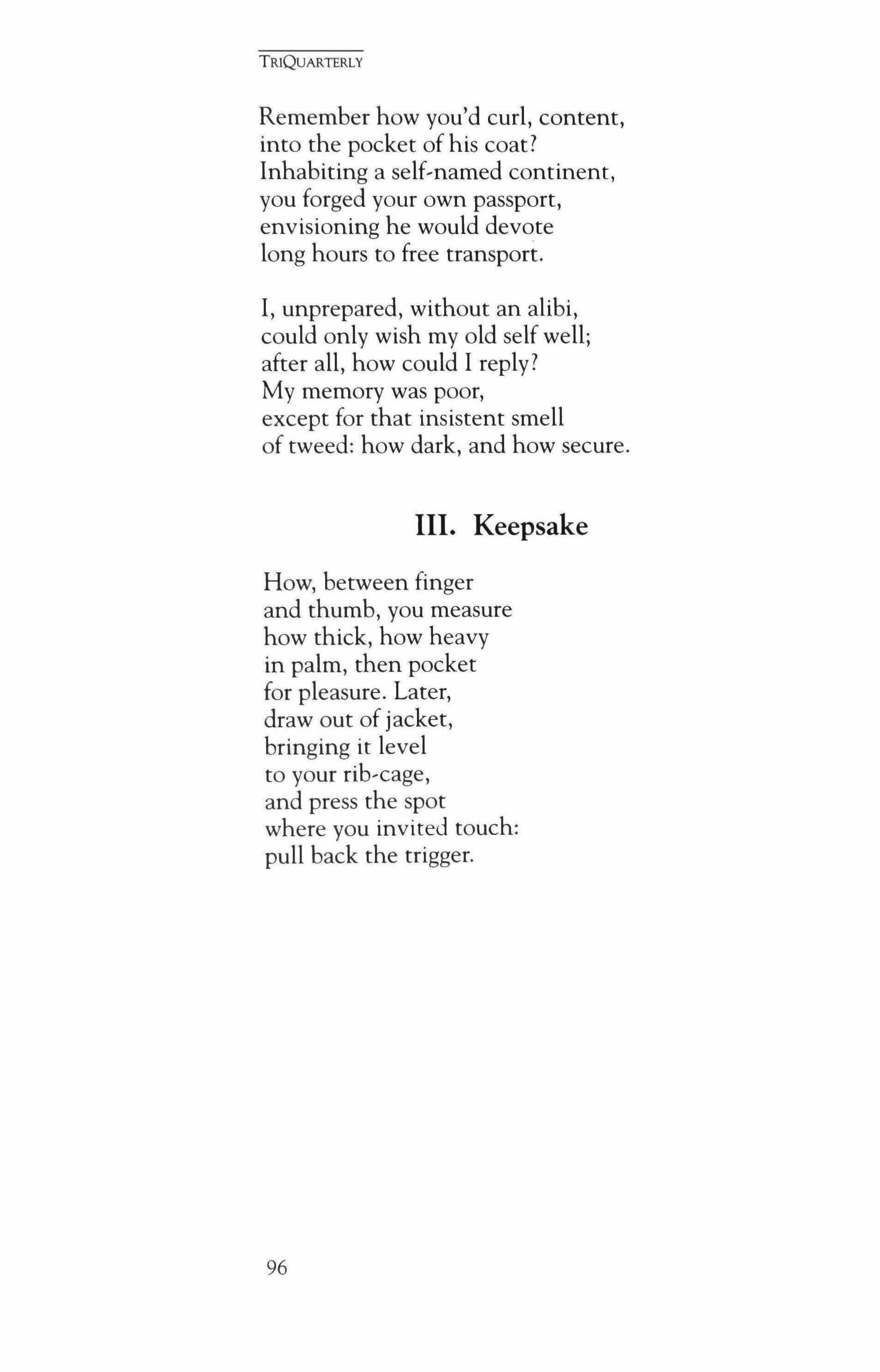
Remember how you'd curl, content, into the pocket of his coat?
Inhabiting a self-named continent, you forged your own passport, envisioning he would devote long hours to free transport.
I, unprepared, without an alibi, could only wish my old self well; after all, how could I reply?
My memory was poor, except for that insistent smell of tweed: how dark, and how secure.
III. Keepsake
How, between finger and thumb, you measure how thick, how heavy in palm, then pocket for pleasure. Later, draw out of jacket, bringing it level to your rib-cage, and press the spot where you invited touch: pull back the trigger.
TRIQUARTERLY
96
Stir Crazy
Edward Kleinschmidt

When I cut open the unripe fig yesterday, I saw its Blossoms curled up, waiting to bloom from the inside. Which is impossible now that it's sitting on the countertop In halves. The fig tree split in the storm and I Dragged away the part that fell, hundreds of Testes-sized figs hanging on. I know when One is ripe it should look like the ripped shirt of A prisoner, and where it tapers, like a man's neck after A hanging. Split open, drip honey on the cut sides, Broil until caramelized, and eat. It's a pattern I've fallen into, something primeval. As if the earliest Hours of the day brought a light I could read by That would make the ordinary words I read-fig, Cut, tree-the things themselves. The transformer Blew out in the storm so I'm out of luck. And the phone's Down now so all Frances will hear when she calls me is The busy signal. I'm busy looking at this fig, trying To figure out what made it at some point years ago not bloom Like the pear or plum or apricot, in the spring, white and Pink, but bloom inside its fruit, so that I eat the flower Whole, disguised. As if I were one of those enormous black bees, As large as the hummingbird that hung out all summer around The jasmine, landing into a floppy red poppy, grabbing Onto the black center, pulling the petals nearly To the ground, waving the red flag in the wind.
TRIQUARTERLY
97
TRIQUARTERLY

Then it's gone, moving through lavender, rosemary, Chamomile. I go out back for the ax, wondering What I will find inside the wood of the fig-an Etruscan Horse in bronze, tattoos of the so-called tree of good And evil knowledge, wet slivers, honey-colored sap, Flowers, a small bird singing do re me fa solla ti do?
98
Antelope Canyon, near Page, Arizona
The Sex
Billy Collins
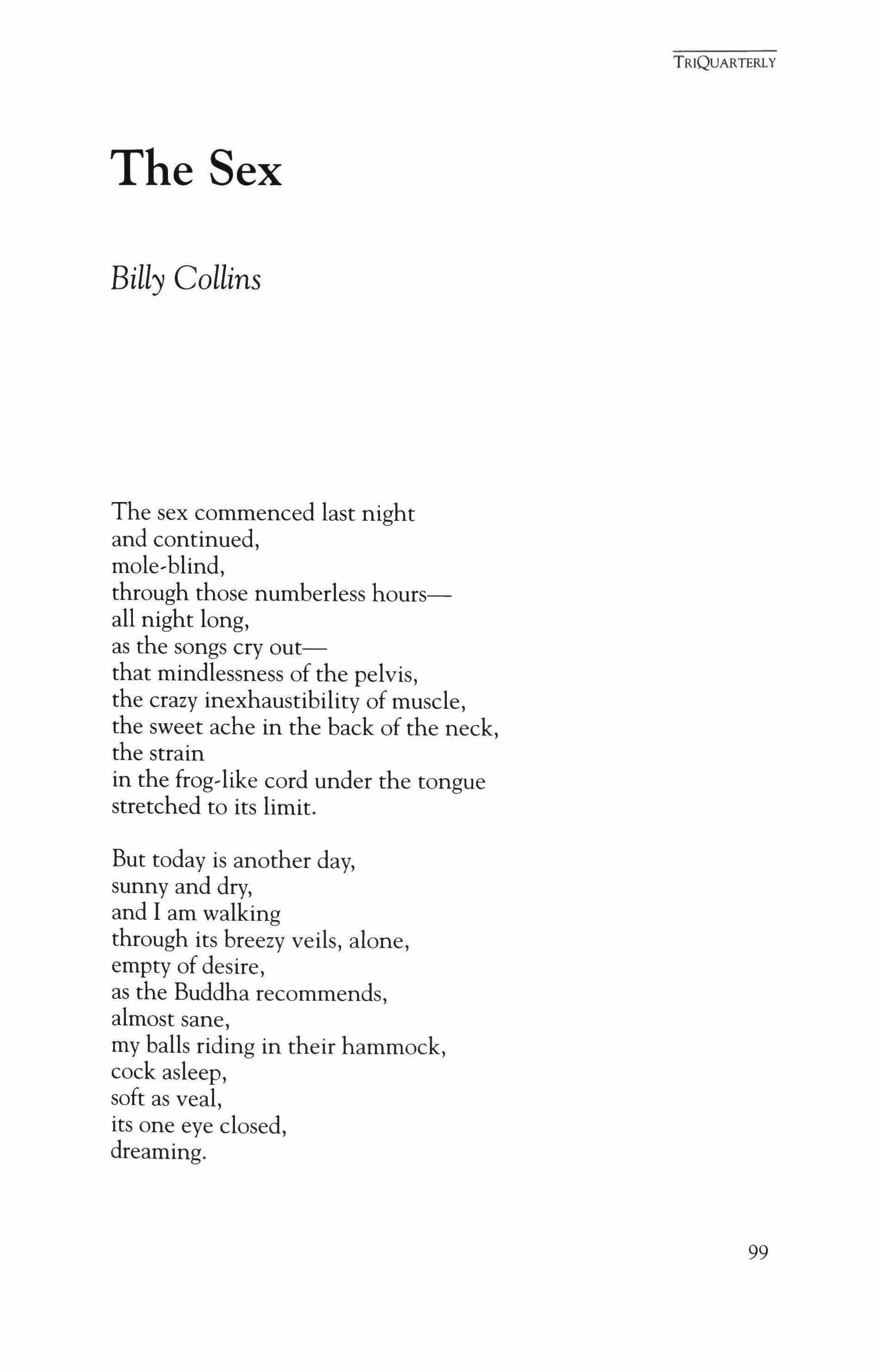
The sex commenced last night and continued, mole-blind, through those numberless hoursall night long, as the songs cry outthat mindlessness of the pelvis, the crazy inexhaustibility of muscle, the sweet ache in the back of the neck, the strain in the frog-like cord under the tongue stretched to its limit.
But today is another day, sunny and dry, and I am walking through its breezy veils, alone, empty of desire, as the Buddha recommends, almost sane, my balls riding in their hammock, cock asleep, soft as veal, its one eye closed, dreaming.
TRIQUARTERLY
99
TRIQUARTERLY
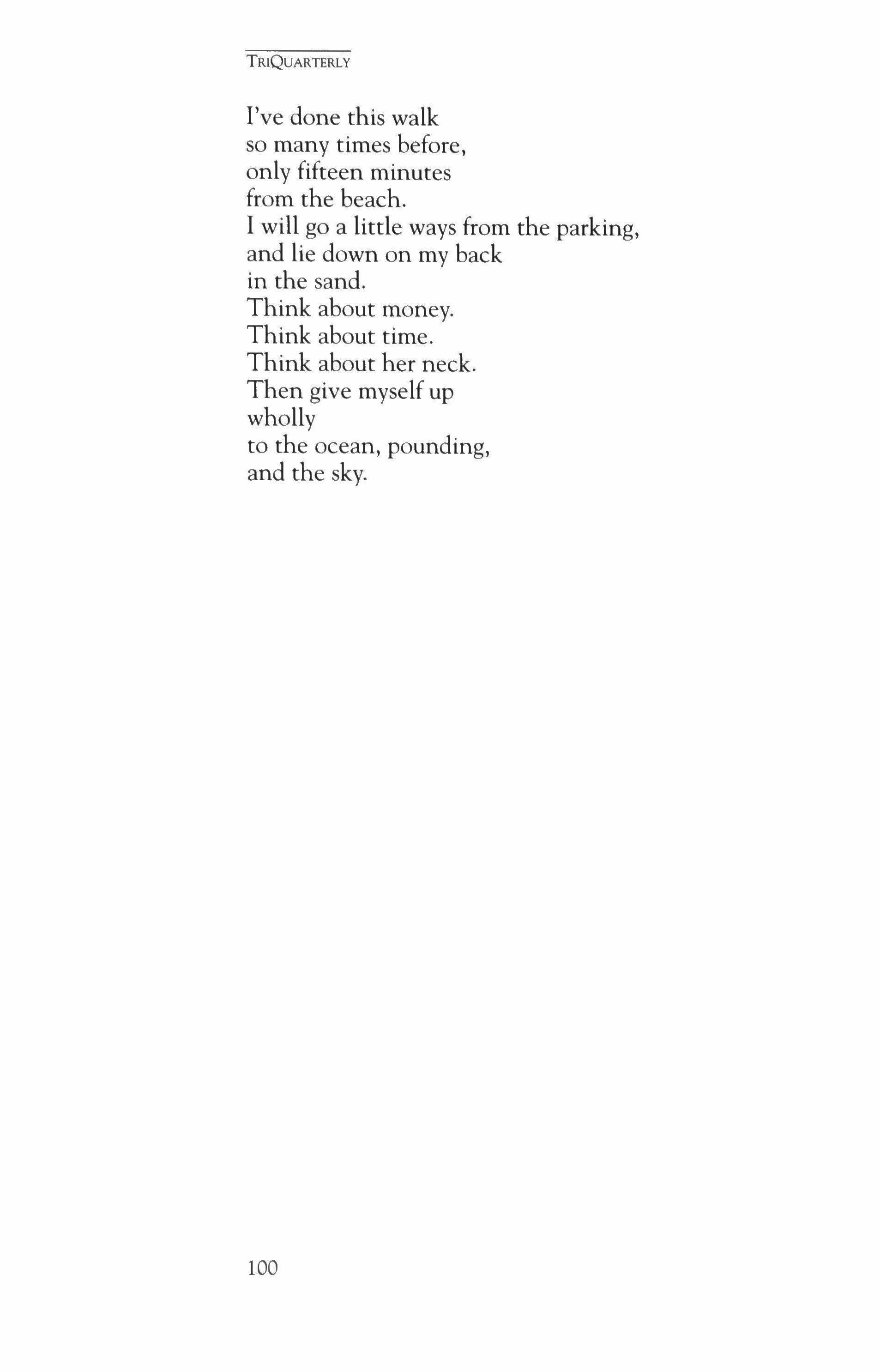
I've done this walk so many times before, only fifteen minutes from the beach.
I will go a little ways from the parking, and lie down on my back in the sand.
Think about money. Think about time. Think about her neck. Then give myself up wholly to the ocean, pounding, and the sky.
100
Courting a Monk
Katherine Min
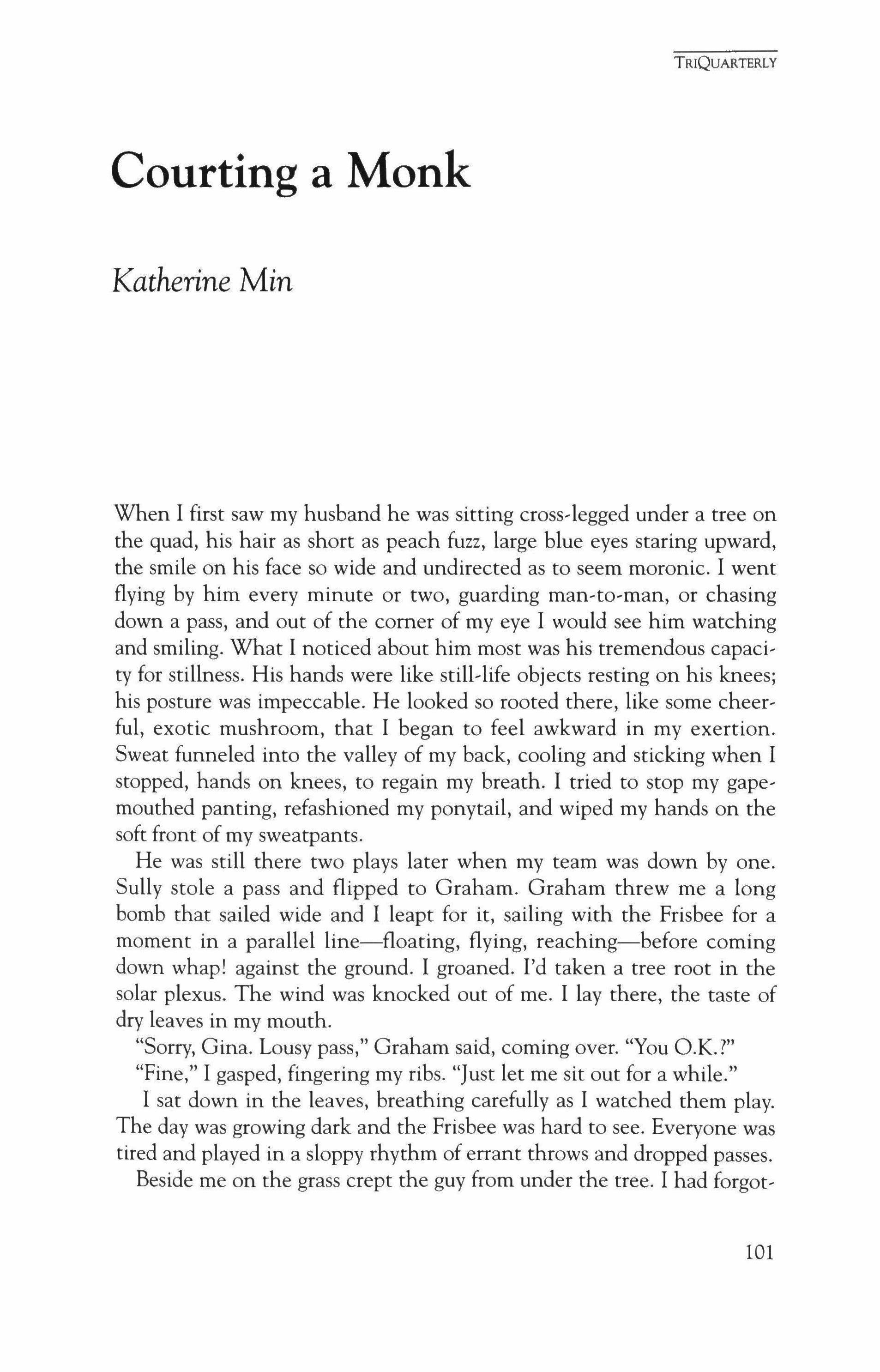
When I first saw my husband he was sitting cross-legged under a tree on the quad, his hair as short as peach fuzz, large blue eyes staring upward, the smile on his face so wide and undirected as to seem moronic. I went flying by him every minute or two, guarding man-to-man, or chasing down a pass, and out of the corner of my eye I would see him watching and smiling. What I noticed about him most was his tremendous capacity for stillness. His hands were like still-life objects resting on his knees; his posture was impeccable. He looked so rooted there, like some cheerful, exotic mushroom, that I began to feel awkward in my exertion. Sweat funneled into the valley of my back, cooling and sticking when I stopped, hands on knees, to regain my breath. I tried to stop my gapemouthed panting, refashioned my ponytail, and wiped my hands on the soft front of my sweatpants.
He was still there two plays later when my team was down by one. Sully stole a pass and flipped to Graham. Graham threw me a long bomb that sailed wide and I leapt for it, sailing with the Frisbee for a moment in a parallel line-floating, flying, reaching-before coming down whap! against the ground. I groaned. I'd taken a tree root in the solar plexus. The wind was knocked out of me. I lay there, the taste of dry leaves in my mouth.
"Sorry, Gina. Lousy pass," Graham said, coming over. "You O.K.?"
"Fine," I gasped, fingering my ribs. "Just let me sit out for a while."
I sat down in the leaves, breathing carefully as I watched them play. The day was growing dark and the Frisbee was hard to see. Everyone was tired and played in a sloppy rhythm of errant throws and dropped passes. Beside me on the grass crept the guy from under the tree. I had forgot-
TRIQUARTERLY
101

ten about him. He crouched shyly next to me, leaves cracking under his feet, and, when I looked up, he whispered, "You were magnificent," and walked away smiling.
I spotted him the next day in the vegetarian dining hall. I was passing through with my plate of veal cordon bleu when I saw him sitting by himself next to the window. He took a pair of wooden chopsticks out of the breast pocket of his shirt and poked halfheartedly at his tofu and wilted mung beans. I sat down across from him and demanded his life story.
It turned out he wanted to be a monk. Not the Chaucerian kind, bald-pared and stout, with a hooded robe, ribald humor and penchant for wine. Something even more baffling-a Buddhist. He had just returned from a semester in Nepal, studying in a monastery in the Himalayas. His hair was coming back in in soft spikes across his head and he had a watchful manner-not cautious but receptive, waiting. He was from King of Prussia, off the Philadelphia Main Line, and this made me mistrust the depth of his beliefs. I have discovered that a fascination for the East is often a prelude to a pass, a romantic overture set in motion by an "I think Oriental girls are so beautiful," and a vise-like grip on the upper thigh. But Micah was different. He understood I was not impressed by his belief, and he did not aim to impress.
"My father was raised Buddhist," I told him. "But he's a scientist now."
"Oh," said Micah. "So, he's not spiritual." "Spirit's insubstantial," I said. "He doesn't hold with intangibility." "Well, you can't hold atoms in your hand," Micah pointed out. "Ah," I said, smiling, "but you can count them."
I told Micah my father was a man of science, and this was true. He was a man, also, of silence. Unlike Micah, whose reticence seemed calming, so undisturbed, like a pool of light on still water, my father's silence was like the lid on a pot, sealing off some steaming, inner pressure. Words were not my father's medium. "Language," my father liked to say, "is an imprecise instrument." (For though he said little, when he hit upon a phrase he liked, he said it many times.) He was fond of Greek letters and numerals set together in intricate equations, symbolizing a certain physical law or experimental hypothesis. He filled yellow legal pads in a strong, vertical hand, writing these beauties down in black, indelible felt-tip pen. I think it was a source of tremendous irritation to
TRIQUARTERLY
* * *
102
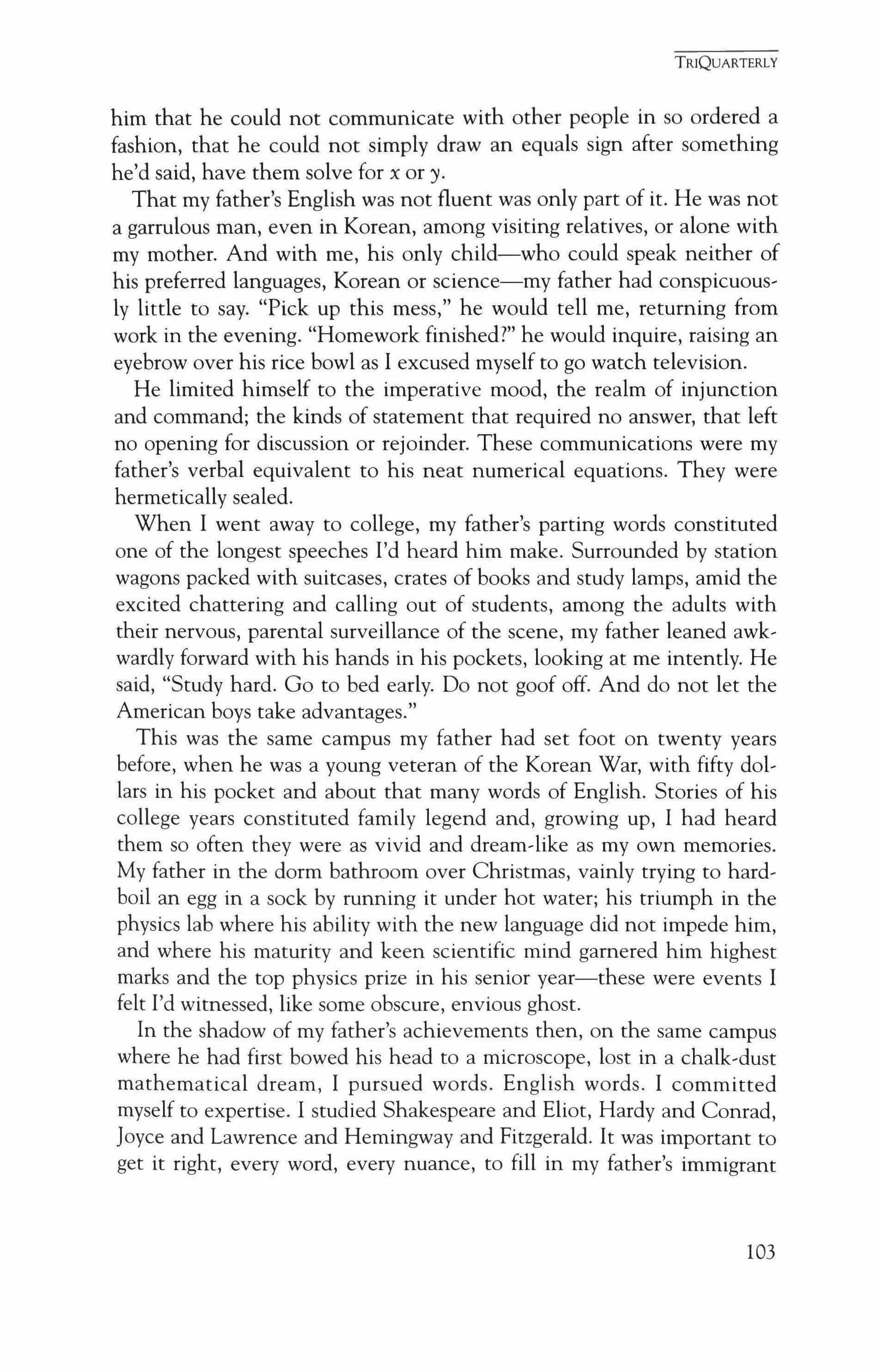
him that he could not communicate with other people in so ordered a fashion, that he could not simply draw an equals sign after something he'd said, have them solve for x or y.
That my father's English was not fluent was only part of it. He was not a garrulous man, even in Korean, among visiting relatives, or alone with my mother. And with me, his only child-who could speak neither of his preferred languages, Korean or science-my father had conspicuously little to say. "Pick up this mess," he would tell me, returning from work in the evening. "Homework finished?" he would inquire, raising an eyebrow over his rice bowl as I excused myself to go watch television.
He limited himself to the imperative mood, the realm of injunction and command; the kinds of statement that required no answer, that left no opening for discussion or rejoinder. These communications were my father's verbal equivalent to his neat numerical equations. They were hermetically sealed.
When I went away to college, my father's parting words constituted one of the longest speeches I'd heard him make. Surrounded by station wagons packed with suitcases, crates of books and study lamps, amid the excited chattering and calling out of students, among the adults with their nervous, parental surveillance of the scene, my father leaned awkwardly forward with his hands in his pockets, looking at me intently. He said, "Study hard. Go to bed early. Do not goof off. And do not let the American boys take advantages."
This was the same campus my father had set foot on twenty years before, when he was a young veteran of the Korean War, with fifty dollars in his pocket and about that many words of English. Stories of his college years constituted family legend and, growing up, I had heard them so often they were as vivid and dream-like as my own memories. My father in the dorm bathroom over Christmas, vainly trying to hardboil an egg in a sock by running it under hot water; his triumph in the physics lab where his ability with the new language did not impede him, and where his maturity and keen scientific mind garnered him highest marks and the top physics prize in his senior year-these were events I felt I'd witnessed, like some obscure, envious ghost.
In the shadow of my father's achievements then, on the same campus where he had first bowed his head to a microscope, lost in a chalk-dust mathematical dream, I pursued words. English words. I committed myself to expertise. I studied Shakespeare and Eliot, Hardy and Conrad, Joyce and Lawrence and Hemingway and Fitzgerald. It was important to get it right, every word, every nuance, to fill in my father's immigrant
TRIQUARTERLY
103

silences, the gaps he had left for me.
Other gaps he'd left. Staying up late and studying little, I did things my father would have been too shocked to merely disapprove. As for American boys, I heeded my father's advice and did not let them take advantage. Instead I took advantage of them, of their proximity, their good looks, and the amiable way they would fall into bed with you if you gave them the slightest encouragement. I liked the way they moved in proud possession of their bodies, the rough feel of their unshaven cheeks, their shoulders and smooth, hairless chests, the curve of their backs like burnished wood. I liked the way I could look up at them, or down, feeling their shuddering climax like a distant earthquake; I could make it happen, moving in undulant circles from above or below, watching them, holding them, making them happy. I collected boys like baubles, like objects not particularly valued, which you stash away in the back of some drawer. It was the pleasant interchangeability of their bodies I liked. They were all white boys.
Micah refused to have sex with me. It became a matter of intellectual disagreement between us. "Sex saps the will," he said.
"Not necessarily," I argued. "Just reroutes it."
"There are higher forms of union," he said.
"Not with your clothes off," I replied.
"Gina," he said, looking at me with kindness, a concern that made me flush with anger. "What need do you have that sex must fill?"
"Fuck you, Micah," I said. "Be a monk, not a psychologist."
He laughed. His laughter was always a surprise to me, like a small disturbance to the universe. I wanted to seduce him, this was true. I considered Micah the only real challenge among an easy field. But more than seduction, I wanted to rattle him, to get under that sense of peace, that inward contentment. No one my age, I reasoned, had the right to such self-possession.
We went for walks in the bird sanctuary, rustling along the paths slowly, discussing Emily Dickinson or maple-syrup-making, but always I brought the subject around.
"What a waste of a life," I said once. "Such indulgence. All that monkly devotion and quest for inner peace. Big deal. It's selfish. Not only is it selfish, it's a cop-out. An escape from this world and its messes."
Micah listened, a narrow smile on his lips, shaking his head regretfully. "You're so wonderfully passionate, Gina, so alive and in the world. I
TRIQUARTERLY
104
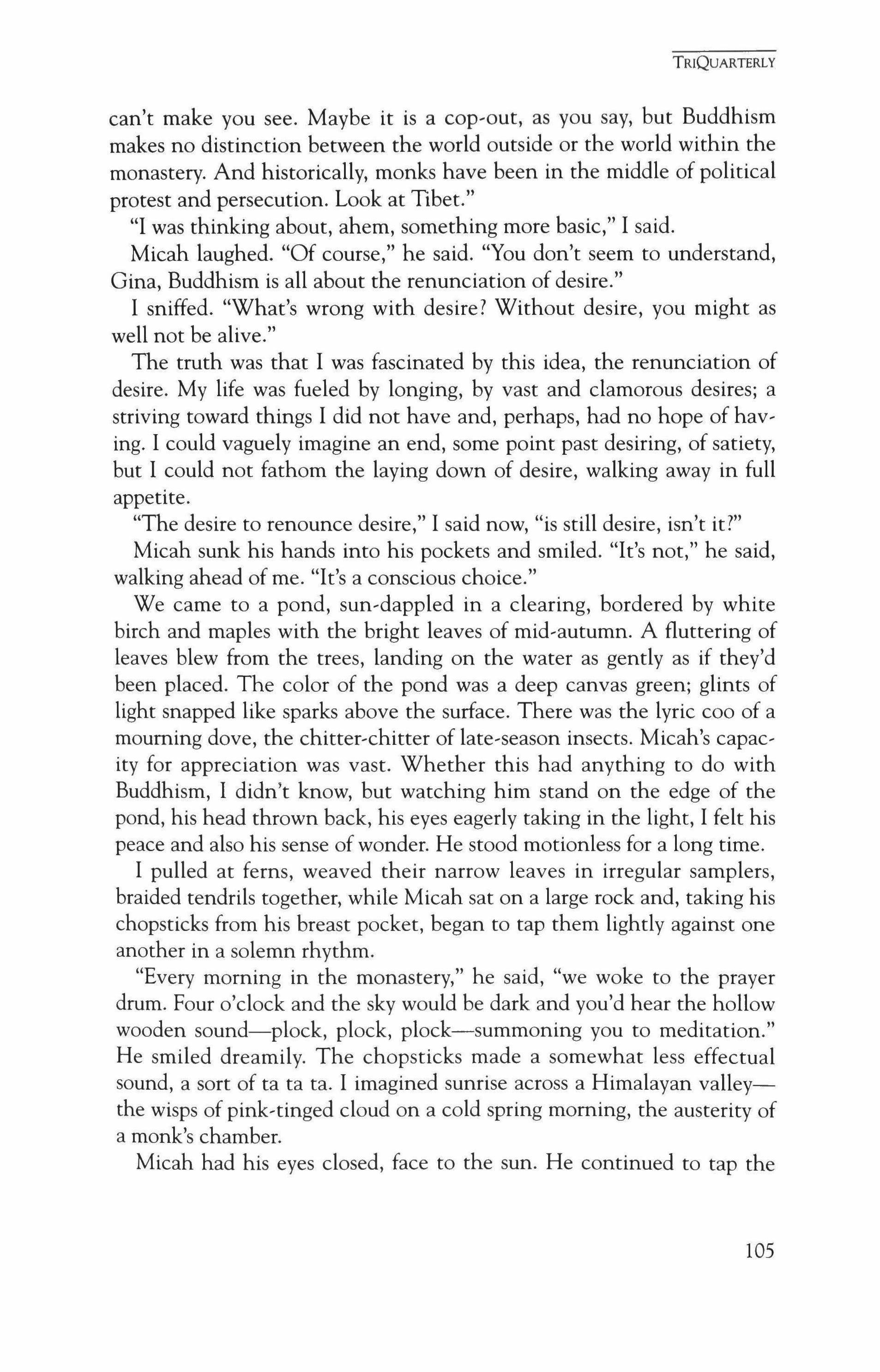
can't make you see. Maybe it is a cop-out, as you say, but Buddhism makes no distinction between the world outside or the world within the monastery. And historically, monks have been in the middle of political protest and persecution. Look at Tibet."
"I was thinking about, ahem, something more basic," I said.
Micah laughed. "Of course," he said. "You don't seem to understand, Gina, Buddhism is all about the renunciation of desire."
I sniffed. "What's wrong with desire? Without desire, you might as well not be alive."
The truth was that I was fascinated by this idea, the renunciation of desire. My life was fueled by longing, by vast and clamorous desires; a striving toward things I did not have and, perhaps, had no hope of having. I could vaguely imagine an end, some point past desiring, of satiety, but I could not fathom the laying down of desire, walking away in full appetite.
"The desire to renounce desire," I said now, "is still desire, isn't it?"
Micah sunk his hands into his pockets and smiled. "It's not," he said, walking ahead of me. "It's a conscious choice."
We came to a pond, sun-dappled in a clearing, bordered by white birch and maples with the bright leaves of mid-autumn. A fluttering of leaves blew from the trees, landing on the water as gently as if they'd been placed. The color of the pond was a deep canvas green; glints of light snapped like sparks above the surface. There was the lyric coo of a mourning dove, the chitter-chitter of late-season insects. Micah's capacity for appreciation was vast. Whether this had anything to do with Buddhism, I didn't know, but watching him stand on the edge of the pond, his head thrown back, his eyes eagerly taking in the light, I felt his peace and also his sense of wonder. He stood motionless for a long time.
I pulled at ferns, weaved their narrow leaves in irregular samplers, braided tendrils together, while Micah sat on a large rock and, taking his chopsticks from his breast pocket, began to tap them lightly against one another in a solemn rhythm.
"Every morning in the monastery," he said, "we woke to the prayer drum. Four o'clock and the sky would be dark and you'd hear the hollow wooden sound-plock, plock, plock-summoning you to meditation." He smiled dreamily. The chopsticks made a somewhat less effectual sound, a sort of ta ta tao I imagined sunrise across a Himalayan valleythe wisps of pink-tinged cloud on a cold spring morning, the austerity of a monk's chamber.
Micah had his eyes closed, face to the sun. He continued to tap the
TRIQUARTERLY
105

chopsticks together slowly. He looked singular and new, sitting on that rock, like an advance scout for some new tribe, with his crest of hair and calm, and the attentiveness of his body to his surroundings.
I think it was then I fell in love with him, or, it was in that moment that my longing for him became so great that it was no longer a matter of simple gratification. I needed his response. I understood what desire was then, the disturbance of a perfect moment in anticipation of another.
"Wake-up call," I said. I peeled off my turtleneck and sweater in one clever motion and tossed them at Micah's feet. Micah opened his eyes. I pulled my pants off and my underwear and stood naked. "Plock, plock, who's there?"
Micah did not turn away. He looked at me, his chopsticks poised in the air. He raised one toward me and held it, as though he were an artist with a paintbrush raised for a proportion, or a conductor ready to lead an orchestra. He held the chopstick suspended in the space between us, and it was as though I couldn't move for as long as he held it. His eyes were fathomless blue. My nipples constricted with the cold. Around us leaves fell in shimmering lights to the water, making a soft rustling sound like the rub of stiff fabric. He brought his hand down and I was released. I turned and leapt into the water.
A few nights later I bought a bottle of cheap wine and goaded Micah into drinking it with me. We started out on the steps of the library after it had closed for the night, taking sloppy swigs from a brown paper bag. The lights of the Holyoke range blinked in the distance, across the velvet black of the freshman quad. From there we wandered the campus, sprawling on the tennis courts, bracing a stiff wind from the terrace of the science center, sedately rolling down Memorial Hill like a pair of tumbleweeds.
"J'a know what a koan is?" he asked me, when we were perched at the top of the bleachers behind home plate. We unsteadily contemplated the steep drop off the back side.
"You mean like ice cream?" I said.
"No, a ko-an. In Buddhism."
"Nope."
"It's a question that has no answer, sort of like a riddle. You know, like 'What is the sound of one hand clapping?' Or 'What was your face before you were born?'"
"'What was my face before it was born?' That makes no sense."
"Exactly. You're supposed to contemplate the koan until you achieve
TRIQUARTERLY
106
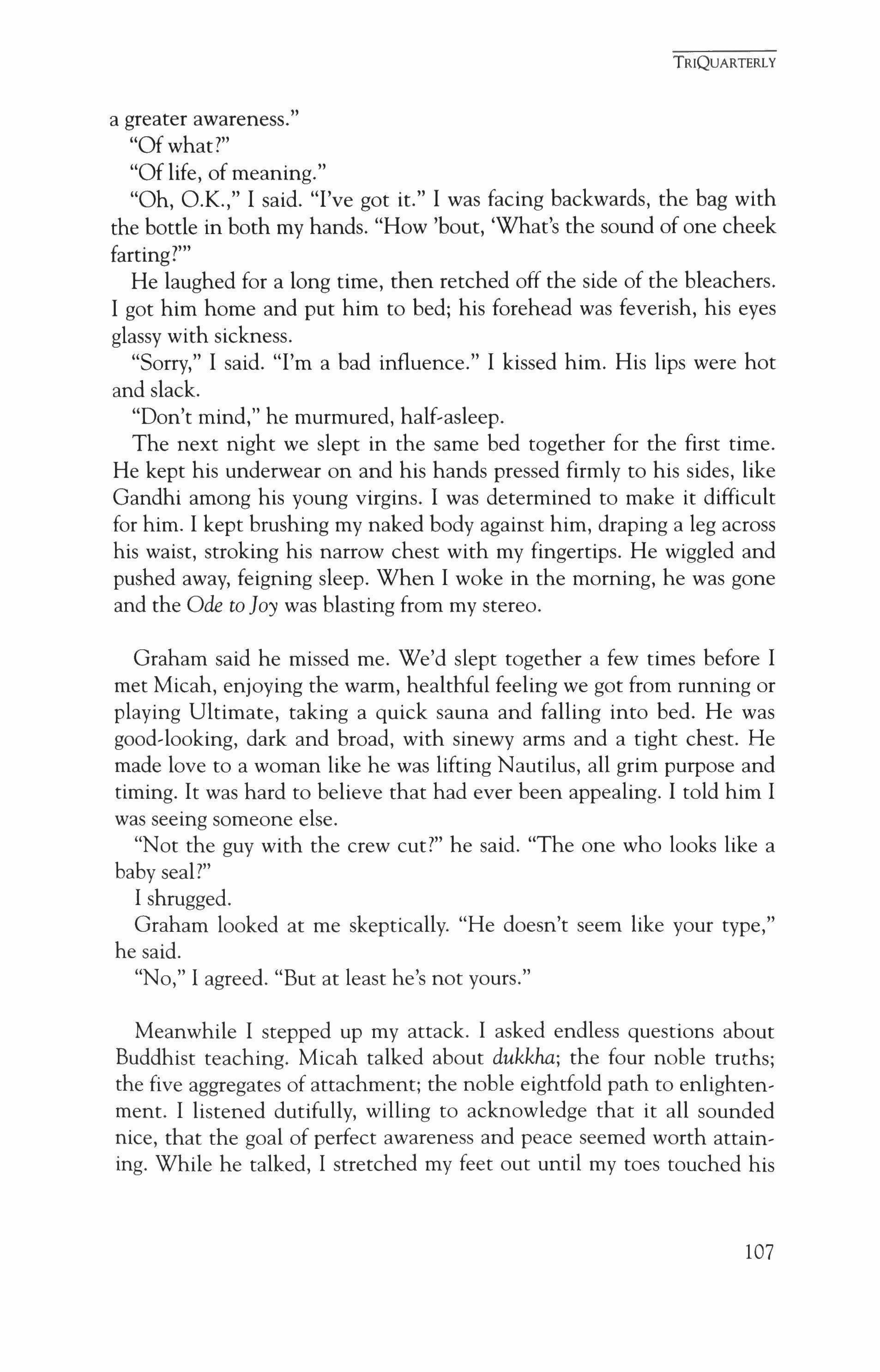
a greater awareness."
"Of what?"
"Of life, of meaning."
"Oh, O.K.," I said. "I've got it." I was facing backwards, the bag with the bottle in both my hands. "How 'bout, 'What's the sound of one cheek farting?",
He laughed for a long time, then retched off the side of the bleachers. I got him home and put him to bed; his forehead was feverish, his eyes glassy with sickness.
"Sorry," I said. "I'm a bad influence." I kissed him. His lips were hot and slack.
"Don't mind," he murmured, half-asleep.
The next night we slept in the same bed together for the first time. He kept his underwear on and his hands pressed firmly to his sides, like Gandhi among his young virgins. I was determined to make it difficult for him. I kept brushing my naked body against him, draping a leg across his waist, stroking his narrow chest with my fingertips. He wiggled and pushed away, feigning sleep. When I woke in the morning, he was gone and the Ode to Joy was blasting from my stereo.
Graham said he missed me. We'd slept together a few times before I met Micah, enjoying the warm, healthful feeling we got from running or playing Ultimate, taking a quick sauna and falling into bed. He was good-looking, dark and broad, with sinewy arms and a tight chest. He made love to a woman like he was lifting Nautilus, all grim purpose and timing. It was hard to believe that had ever been appealing. I told him I was seeing someone else.
"Not the guy with the crew cut?" he said. "The one who looks like a baby seal?"
I shrugged.
Graham looked at me skeptically. "He doesn't seem like your type," he said.
"No," I agreed. "But at least he's not yours."
Meanwhile I stepped up my attack. I asked endless questions about Buddhist teaching. Micah talked about dukkha; the four noble truths; the five aggregates of attachment; the noble eightfold path to enlightenment. I listened dutifully, willing to acknowledge that it all sounded nice, that the goal of perfect awareness and peace seemed worth attaining. While he talked, I stretched my feet out until my toes touched his
TRIQUARTERLY
107

thigh; I slid my hand along his back; or leaned way over so he could see down my loose, barely-buttoned blouse.
"Too bad you aren't Tantric," I said. I'd been doing research.
Micah scoffed. "Hollywood Buddhism," he said. "Heavy breathing and theatrics.
"They believe in physical desire," I said. "They have sex."
"Buddha believes in physical desire," Micah said. "It's impermanent, that's all. Something to get beyond."
"To get beyond it," I said petulantly, "you have to do it."
Micah sighed. "Gina," he said, "you are beautiful, but I can't. There are a lot of guys who will."
"A lot of them do."
He smiled a bit sadly. "Well, then " I leaned down to undo his shoelaces. I tied them together in double knots. "But I want you," I said.
My parents lived thirty miles from campus and my mother frequently asked me to come home for dinner. I went only once that year, and that was with Micah. My parents were not the kind of people who enjoyed the company of strangers. They were insular people who did not like to socialize much or go out-or anyway, my father was that way, and my mother accommodated herself to his preferences.
My mother had set the table in the dining room with blue linen. There were crystal wine glasses and silver utensils in floral patterns. She had made some dry baked chicken with overcooked peas and carrotsthe meal she reserved for when Americans came to dinner. When it came to Korean cooking, my mother was a master. She made fabulous marinated short ribs and sauteed transparent bean noodles with vegetables and beef, pork dumplings and batter-fried shrimp, and cucumber and turnip kimchis which she made herself and fermented in brown earthenware jars. But American cuisine eluded her; it bored her. I think she thought it was meant to be tasteless.
"Just make Korean," I had urged her on the phone. "He'll like that."
My mother was skeptical. "Too spicy," she said. "I know what Americans like."
"Not the chicken dish," I pleaded. "He's a vegetarian."
"We'll see," said my mother, conceding nothing. Micah stared down at his plate. My mother smiled serenely. Micah nodded. He ate a forkful of vegetables, took a bite of bread. His Adam's apple seemed to be doing a lot of work. My father, too, was busy chew-
TRIQUARTERLY
108
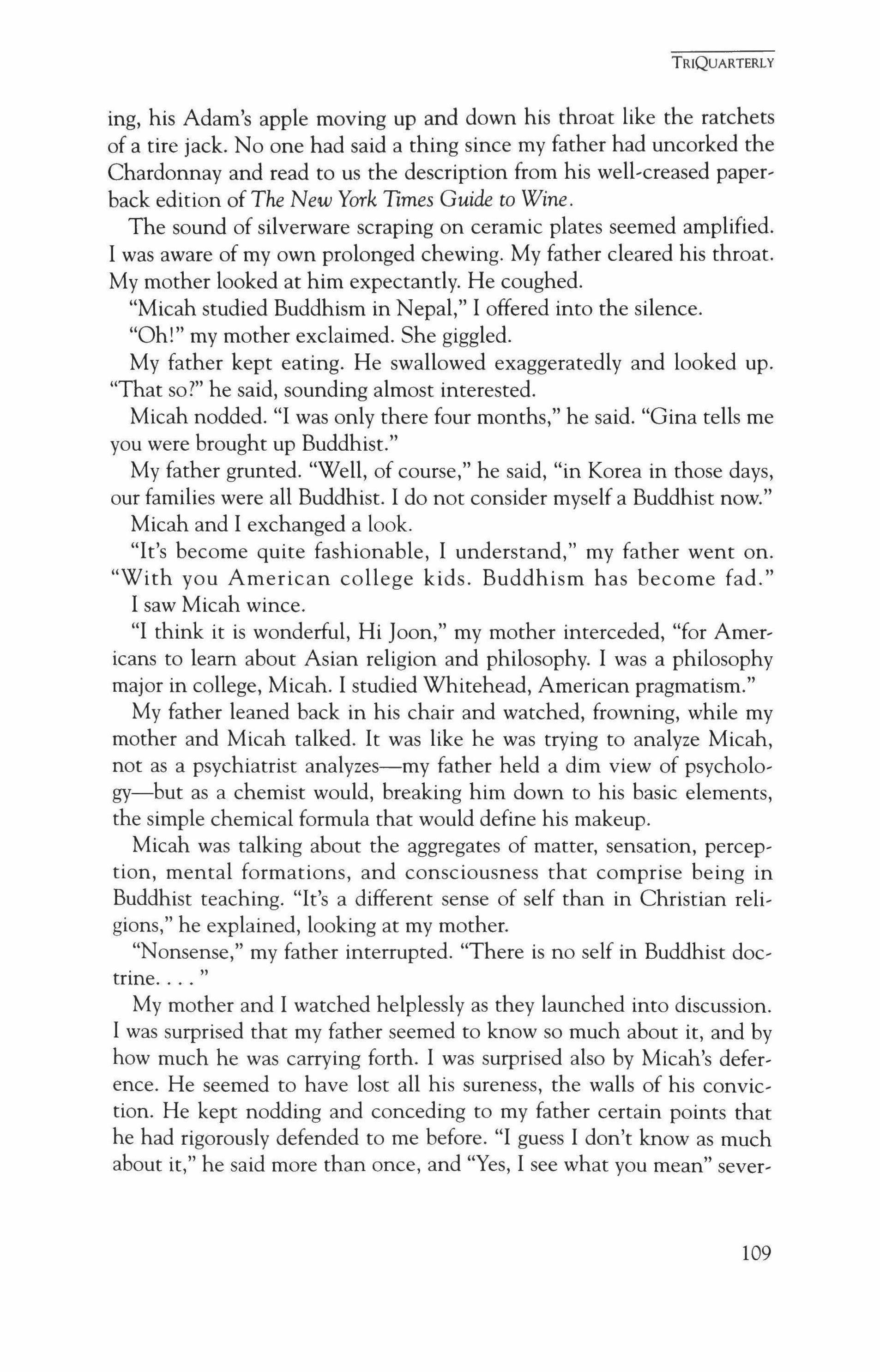
ing, his Adam's apple moving up and down his throat like the ratchets of a tire jack. No one had said a thing since my father had uncorked the Chardonnay and read to us the description from his well-creased paper� back edition of The New York Times Guide to Wine.
The sound of silverware scraping on ceramic plates seemed amplified. I was aware of my own prolonged chewing. My father cleared his throat. My mother looked at him expectantly. He coughed.
"Micah studied Buddhism in Nepal," I offered into the silence.
"Oh!" my mother exclaimed. She giggled.
My father kept eating. He swallowed exaggeratedly and looked up. "That so?" he said, sounding almost interested.
Micah nodded. "I was only there four months," he said. "Gina tells me you were brought up Buddhist."
My father grunted. "Well, of course," he said, "in Korea in those days, our families were all Buddhist. I do not consider myself a Buddhist now."
Micah and I exchanged a look.
"It's become quite fashionable, I understand," my father went on. "With you American college kids. Buddhism has become fad."
I saw Micah wince.
"I think it is wonderful, Hi [oon," my mother interceded, "for Americans to learn about Asian religion and philosophy. I was a philosophy major in college, Micah. I studied Whitehead, American pragmatism."
My father leaned back in his chair and watched, frowning, while my mother and Micah talked. It was like he was trying to analyze Micah, not as a psychiatrist analyzes-my father held a dim view of psychology-but as a chemist would, breaking him down to his basic elements, the simple chemical formula that would define his makeup.
Micah was talking about the aggregates of matter, sensation, perception, mental formations, and consciousness that comprise being in Buddhist teaching. "It's a different sense of self than in Christian religions," he explained, looking at my mother.
"Nonsense," my father interrupted. "There is no self in Buddhist doctrine
My mother and I watched helplessly as they launched into discussion. I was surprised that my father seemed to know so much about it, and by how much he was carrying forth. I was surprised also by Micah's deference. He seemed to have lost all his sureness, the walls of his conviction. He kept nodding and conceding to my father certain points that he had rigorously defended to me before. "I guess I don't know as much about it," he said more than once, and "Yes, I see what you mean" sever-
TRIQUARTERLY
109

al times, with a sickening air of humility. I turned from my father's glinting, pitiless intelligence, to Micah's respectfulness, his timid manner, and felt a rising irritation I could not place, anger at my father's belligerence, at Micah's backing down, at my own strange motives for having brought them together. Had I really expected them to get along? And yet, my father was concentrating on Micah with such an intensity-almost as though he were a rival-in a way in which he never focused on me.
When the dialogue lapsed, and after we had consumed as much of the food as we deemed polite, my mother took the dishes away and brought in a bowl of rice with kimchi for my father. Micah's eyes lit up. "May I have some of that, too, Mrs. Kim?"
My mother looked doubtful. "Too spicy," she said.
"Oh, I love spicy food," Micah assured her. My mother went to get him a bowl.
"You can use chopsticks?" my mother said, as Micah began eating with them.
"Mom, it's no big deal," I said.
My father looked up from his bowl. Together, my parents watched while Micah ate a large piece of cabbage kimchi.
"Hah!" my father said, suddenly smiling. "Gina doesn't like kimchi," he said. He looked at me. "Gina," he said. "This boy more Korean than you.
"Doesn't take much," I said.
My father ignored me. "Gina always want to be American," he told Micah. "Since she was little girl, she want blue eyes, yellow hair." He stabbed a chopstick toward Micah's face. "Like yours."
"If I had hair," said Micah, grinning, rubbing a hand across his head.
My father stared into his bowl. "She doesn't want to be Korean girl. She thinks she can be 100 percent American, but she cannot. She has Korean blood-lOa percent. Doesn't matter where you grow up-blood is most important. What is in the blood." He gave Micah a severe look. "You think you can become Buddhist. Same way. But it is not in your blood. You cannot know real Buddha's teaching. You should study Bible."
"God, Dad!" I said. "You sound like a Nazi!"
"Gina!" my mother warned.
"You're embarrassing me," I said. "Being rude to my guest. Discussing me as if I wasn't here. You can say what you want, Dad, I'm American whether you like it or not. Blood's got nothing to do with it. It's what's
TRIQUARTERLY
110
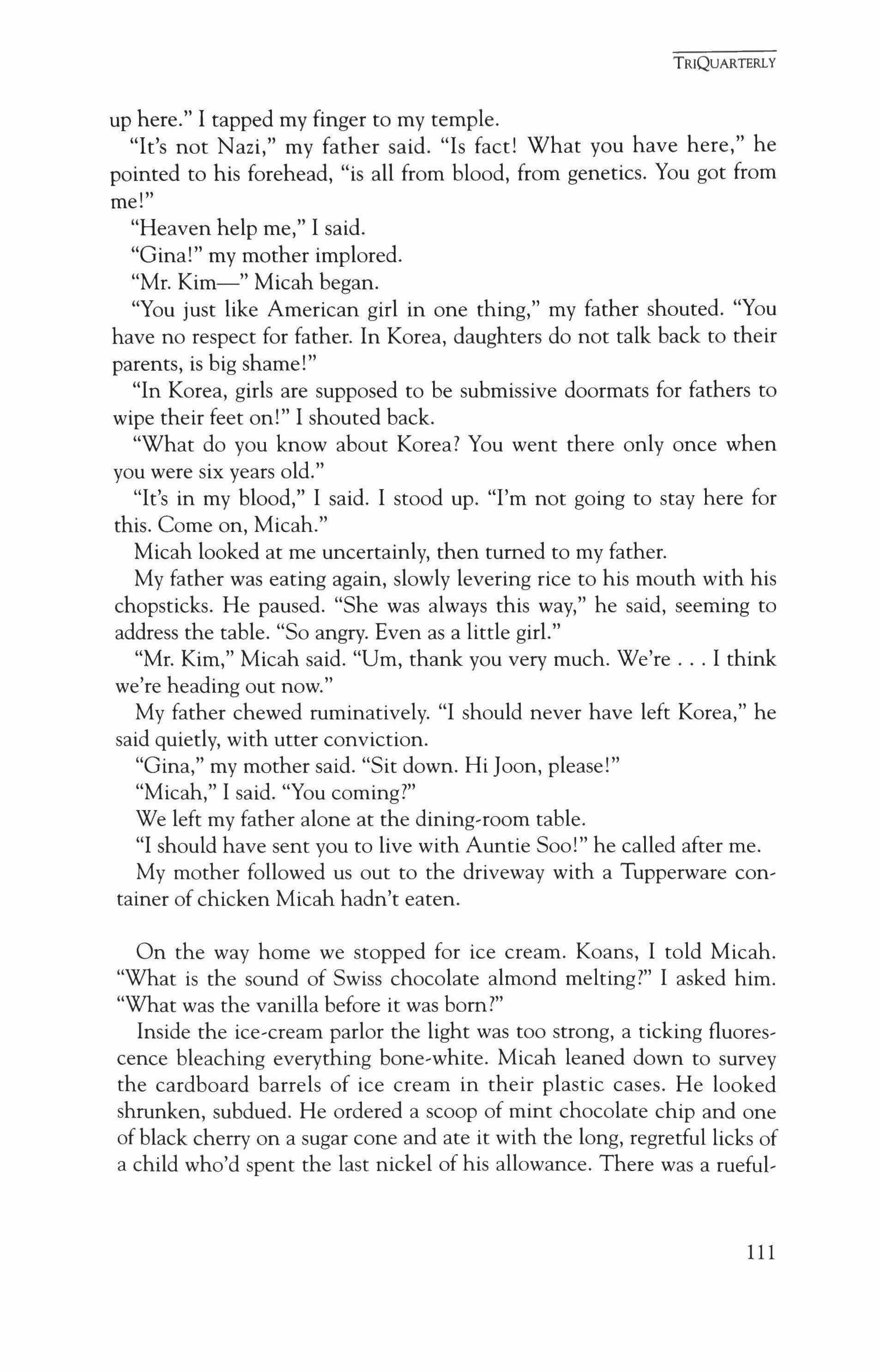
up here." I tapped my finger to my temple.
"It's not Nazi," my father said. "Is fact! What you have here," he pointed to his forehead, "is all from blood, from genetics. You got from me!"
"Heaven help me," I said.
"Gina!" my mother implored.
"Mr. Kim-" Micah began.
"You just like American girl in one thing," my father shouted. "You have no respect for father. In Korea, daughters do not talk back to their parents, is big shame!"
"In Korea, girls are supposed to be submissive doormats for fathers to wipe their feet on!" I shouted back.
"What do you know about Korea? You went there only once when you were six years old."
"It's in my blood," I said. I stood up. "I'm not going to stay here for this. Come on, Micah."
Micah looked at me uncertainly, then turned to my father.
My father was eating again, slowly levering rice to his mouth with his chopsticks. He paused. "She was always this way," he said, seeming to address the table. "So angry. Even as a little girl."
"Mr. Kim," Micah said. "Urn, thank you very much. We're I think we're heading out now."
My father chewed ruminatively. "I should never have left Korea," he said quietly, with utter conviction.
"Gina," my mother said. "Sit down. Hi Joan, please!"
"Micah," I said. "You coming?"
We left my father alone at the dining-room table.
"I should have sent you to live with Auntie Sao!" he called after me.
My mother followed us out to the driveway with a Tupperware container of chicken Micah hadn't eaten.
On the way home we stopped for ice cream. Koans, I told Micah. "What is the sound of Swiss chocolate almond melting?" I asked him. "What was the vanilla before it was born?"
Inside the ice-cream parlor the light was too strong, a ticking fluorescence bleaching everything bone-white. Micah leaned down to survey the cardboard barrels of ice cream in their plastic cases. He looked shrunken, subdued. He ordered a scoop of mint chocolate chip and one of black cherry on a sugar cone and ate it with the long, regretful licks of a child who'd spent the last nickel of his allowance. There was a rueful-
TRIQUARTERLY
111
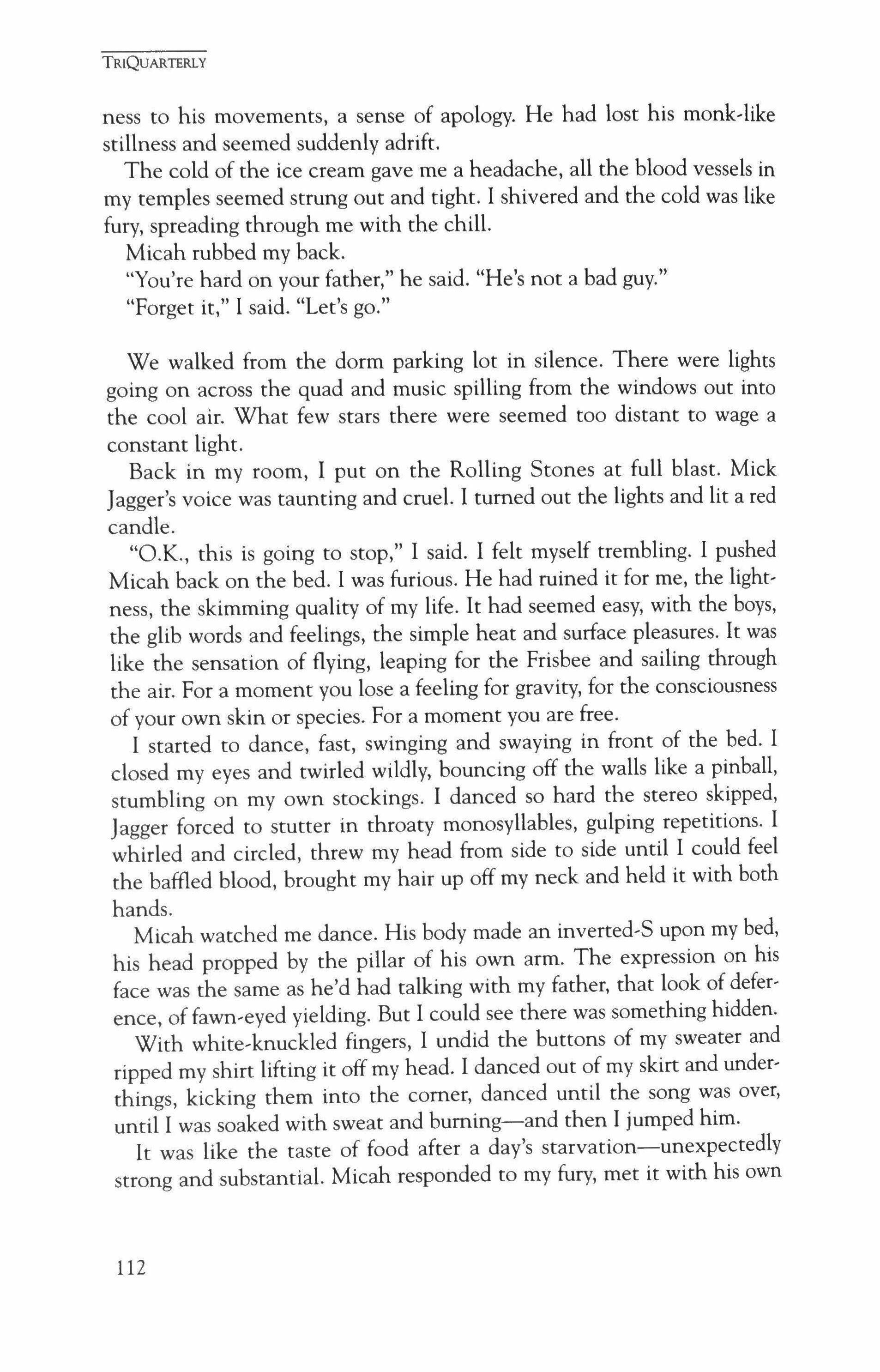
ness to his movements, a sense of apology. He had lost his monk,like stillness and seemed suddenly adrift.
The cold of the ice cream gave me a headache, all the blood vessels in my temples seemed strung out and tight. I shivered and the cold was like fury, spreading through me with the chill.
Micah rubbed my back.
"You're hard on your father," he said. "He's not a bad guy."
"Forget it," I said. "Let's go."
We walked from the dorm parking lot in silence. There were lights going on across the quad and music spilling from the windows out into the cool air. What few stars there were seemed too distant to wage a constant light.
Back in my room, I put on the Rolling Stones at full blast. Mick Jagger's voice was taunting and cruel. I turned out the lights and lit a red candle.
"O.K., this is going to stop," I said. I felt myself trembling. I pushed Micah back on the bed. I was furious. He had ruined it for me, the light, ness, the skimming quality of my life. It had seemed easy, with the boys, the glib words and feelings, the simple heat and surface pleasures. It was like the sensation of flying, leaping for the Frisbee and sailing through the air. For a moment you lose a feeling for gravity, for the consciousness of your own skin or species. For a moment you are free.
I started to dance, fast, swinging and swaying in front of the bed. I closed my eyes and twirled wildly, bouncing off the walls like a pinball, stumbling on my own stockings. I danced so hard the stereo skipped, Jagger forced to stutter in throaty monosyllables, gulping repetitions. I whirled and circled, threw my head from side to side until I could feel the baffled blood, brought my hair up off my neck and held it with both hands.
Micah watched me dance. His body made an inverted-S upon my bed, his head propped by the pillar of his own arm. The expression on his face was the same as he'd had talking with my father, that look of defer, ence, of fawn-eyed yielding. But I could see there was something hidden. With white-knuckled fingers, I undid the buttons of my sweater and ripped my shirt lifting it off my head. I danced out of my skirt and under, things, kicking them into the corner, danced until the song was over, until I was soaked with sweat and burning-and then I jumped him.
It was like the taste of food after a day's starvation-unexpectedly strong and substantial. Micah responded to my fury, met it with his own
TRIQUARTERLY
112
mysterious passion; it was like a brawl, a fight, with something at stake that neither of us wanted to lose. Afterward we sat up in bed and lis, tened to Ode to Joy while Micah, who had a surplus supply of chopsticks lying around the room, did his Leonard Bernstein impersonation. Later, we went out for a late-night snack to All-Star Dairy and Micah admit, ted to me that he was in love.
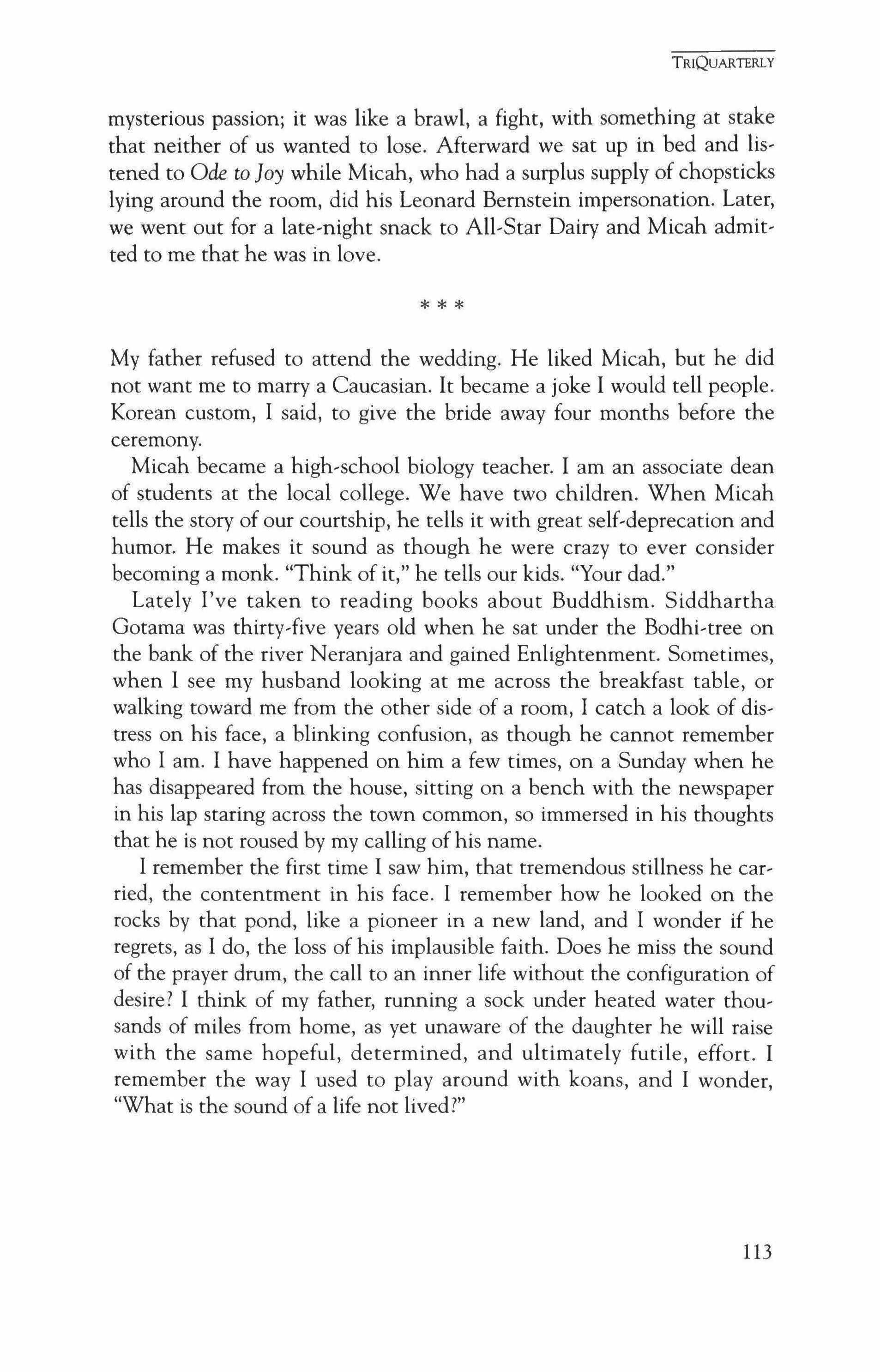
My father refused to attend the wedding. He liked Micah, but he did not want me to marry a Caucasian. It became a joke I would tell people. Korean custom, I said, to give the bride away four months before the ceremony.
Micah became a high-school biology teacher. I am an associate dean of students at the local college. We have two children. When Micah tells the story of our courtship, he tells it with great self,deprecation and humor. He makes it sound as though he were crazy to ever consider becoming a monk. "Think of it," he tells our kids. "Your dad."
Lately I've taken to reading books about Buddhism. Siddhartha Gotama was thirty-five years old when he sat under the Bodhi-tree on the bank of the river Neranjara and gained Enlightenment. Sometimes, when I see my husband looking at me across the breakfast table, or walking toward me from the other side of a room, I catch a look of dis, tress on his face, a blinking confusion, as though he cannot remember who I am. I have happened on him a few times, on a Sunday when he has disappeared from the house, sitting on a bench with the newspaper in his lap staring across the town common, so immersed in his thoughts that he is not roused by my calling of his name.
I remember the first time I saw him, that tremendous stillness he car' ried, the contentment in his face. I remember how he looked on the rocks by that pond, like a pioneer in a new land, and I wonder if he regrets, as I do, the loss of his implausible faith. Does he miss the sound of the prayer drum, the call to an inner life without the configuration of desire? I think of my father, running a sock under heated water thou, sands of miles from home, as yet unaware of the daughter he will raise with the same hopeful, determined, and ultimately futile, effort. I remember the way I used to play around with koans, and I wonder, "What is the sound of a life not lived?"
TRIQUARTERLY
***
113
Lovesong
Lynn Marie
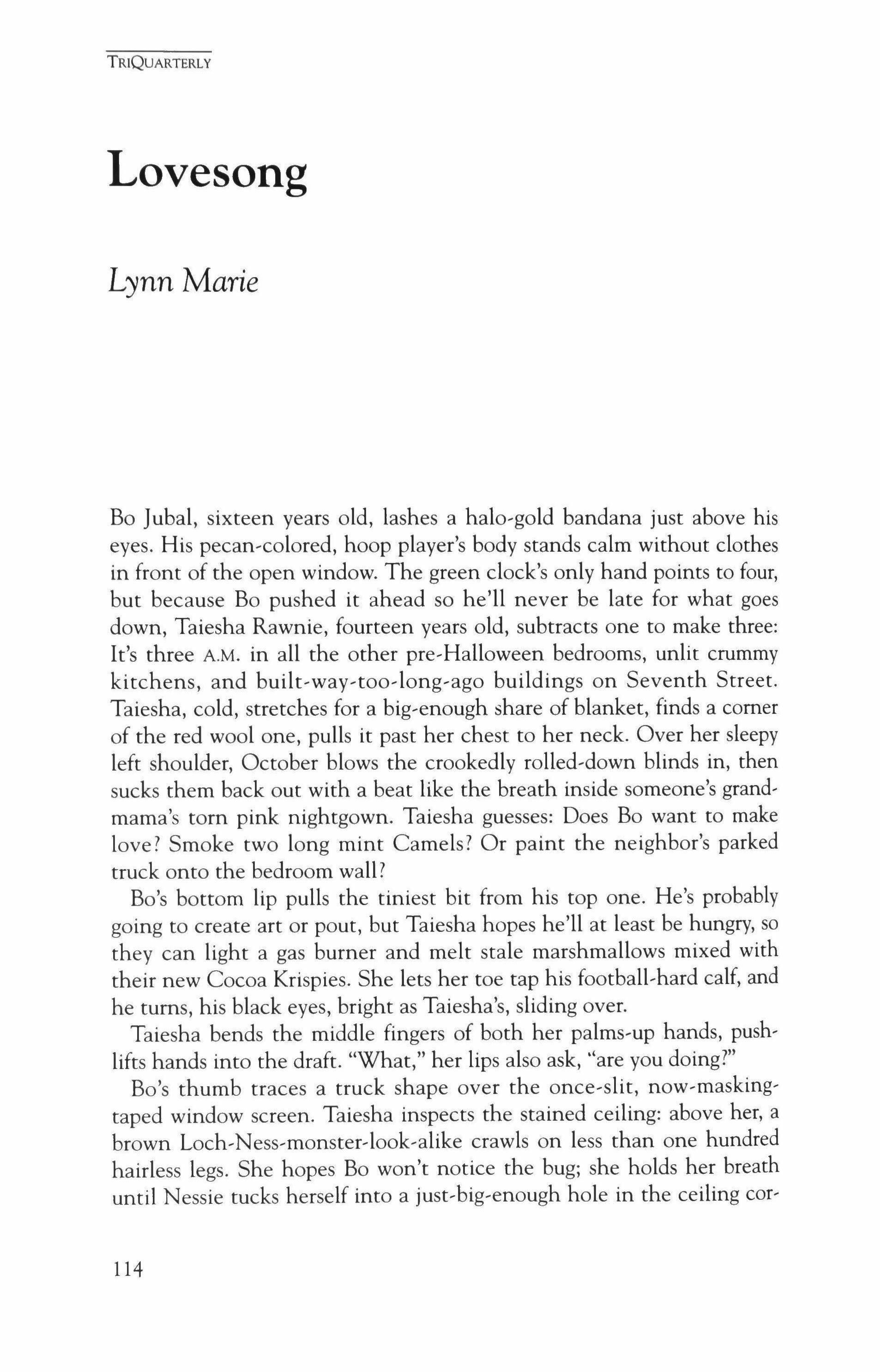
Bo [ubal, sixteen years old, lashes a halo-gold bandana just above his eyes. His pecan-colored, hoop player's body stands calm without clothes in front of the open window. The green clock's only hand points to four, but because Bo pushed it ahead so he'll never be late for what goes down, Taiesha Rawnie, fourteen years old, subtracts one to make three: It's three A.M. in all the other pre-Halloween bedrooms, unlit crummy kitchens, and built-way-roo-long-ago buildings on Seventh Street. Taiesha, cold, stretches for a big-enough share of blanket, finds a corner of the red wool one, pulls it past her chest to her neck. Over her sleepy left shoulder, October blows the crookedly rolled-down blinds in, then sucks them back out with a beat like the breath inside someone's grandmama's torn pink nightgown. Taiesha guesses: Does Bo want to make love? Smoke two long mint Camels? Or paint the neighbor's parked truck onto the bedroom wall?
Bo's bottom lip pulls the tiniest bit from his top one. He's probably going to create art or pout, but Taiesha hopes he'll at least be hungry, so they can light a gas burner and melt stale marshmallows mixed with their new Cocoa Krispies. She lets her toe tap his football-hard calf, and he turns, his black eyes, bright as Taiesha's, sliding over.
Taiesha bends the middle fingers of both her palms-up hands, pushlifts hands into the draft. "What," her lips also ask, "are you doing?"
Bo's thumb traces a truck shape over the once-slit, now-maskingtaped window screen. Taiesha inspects the stained ceiling: above her, a brown Loch-Ness-monster-look-alike crawls on less than one hundred hairless legs. She hopes Bo won't notice the bug; she holds her breath until Nessie tucks herself into a just-big-enough hole in the ceiling cor-
TRIQUARTERLY
114

ner, safe from Bo's paintbrush. Taiesha loves all of Bo's artwork, except the trails, nests and colonies of his color-pasted-dead bugs. She hates the black-coated butterfly captured on Bo's neon sunflower in the front room, hates the bee glued with purple to the back of the toilet, hates the sad yellow snail stuck near the cut wires of the doorbell, and hates the parades of ants-sometimes even she wonders if they're ants after paint shrinks their small bodies tiny-caught marching across the kitchenarea floor.
Taiesha bends her middle fingers, push-lifts her hands. "What," her mouth says, too, "are you doing?"
Bo kneels a butterfly's wing length from Taiesha's gray 'Tshirt collar. "What?" Taiesha asks, dragging her pointer finger fast across her palm. She raises four stiff fingers, tucking in their thumb safely-"B"-then curls fingers and thumb in a circle to make "0." Bo. Her favorite sign. Taiesha smiles a tired quarter-moon grin.
"The. Wind." Bo's voice cracks. He doesn't sign. "Told me."
Taiesha's never known Bo to speak using only sound, not even to the tourists he paints, and they sometimes walk off when they realize he's mostly deaf. She sits up fast. "Bo," she says, with her voice and fingers. "You're talking without your hands." She taps her pointer finger against her lips. "You can hear me?" She cups her ear, touches her chest.
Bo's mouth sneers teeth as if he's chewing a wire hanger. He shakes his head no, then brushes Taiesha's hair gently as art or fucking. His fingers peacock-tail in front of his wide, alert eyes. Something brighter, Taiesha translates. Clearer.
"The wind," Bo says. "Told me what to do."
Words have come out garbled, but Taiesha understands. She wants to ask why he's talking without his hands, and what the wind said, and whether she should still talk with her hands like he's been teaching her for five months. But she can't ask all this fast enough, so, for a moment, she says nothing. As she begins to sign "What" again, Bo rises and strides to his clothes pile. Standing on his dry city skyline drawn in marker-pen on the carpet, he fishes up old Lee jeans, drags them over his hot legs, zips and buttons.
"BO," Taiesha says loud. She pounds the floor with a flat hand so he'll feel her. "Bo, what are you doing?" Middle fingers bend; hands push and lift.
"The wind," Bo's mouth voice croaks, "is Venus's choir."
Bo believes, Taiesha knows, that Venus is heaven for those who miss sweetness on earth: those who are too poor, dark or different, those too
TRIQUARTERLY
115

weak to be given their rights. Bo believes, Taiesha knows, Venus will be his home, and hers, and the painted bugs'. He pulls Blacktop hightops over bare feet, yanks laces loose so they won't have to be tied, adjusts the leather tongues.
Would some other girlfriend understand this? Taiesha wonders whether she's stupid or Bo is. "What," she says. Fingertip drags heavy across her hand. "Did the wind-" Taiesha huffs and puffs to blow wind although this is not a sign Bo taught. "Say?" She taps her lips.
Bo rocks his hands in front of his chest like a boat that can't sail because the water's far too choppy. "Wind," he says. He pulls on his New York Knicks hooded sweatshirt, examines the blue and orange paint specks on the heavy black cotton. He rocks his hands again, then points to his chest. "The wind says l. Must save people." Sharp as jewelry pins, his eyes stab Taiesha's.
Taiesha's tired of concentrating and being confused; it's the middle of the night, after all. With two fingers, she crunches a Hershey's-Kissshaped cone of cranberry oil paint on the carpet.
Kneeling a bee's wing length from Taiesha's Tvshtrt hem, Bo says, "Without painting." He covers Taiesha's hand with his, and, with her fingers, crushes an emerald-colored paint cone. "And without He drops Taiesha's hand, slaps together four spread fingers-as-legs. "Fucking."
He leaves the bedroom through the doorless doorway, and Taiesha's stunned middle finger scatters flakes of squashed emerald paint. Does without painting and fucking mean Bo's quitting art and his woman? Taiesha follows him into the far end of their other room, an enclosed porch of windows, some patched with cardboard. Bo drops the Master padlock from the closet stuffed with boxes he won't let Taiesha explore through, then drags a wooden Mountain Dew case over the newsprint taped to the floor. Taiesha steps toward him-the tilted hardwood creaks-and she stands on a cutout Post picture of Spike Lee as Mookie. Bo takes his Reebok Blacktop shoe box from the Dew case, tucks it under his left armpit, sees Taiesha.
Exaggerating the movements of her lips, Taiesha asks, "Will you come back?"
Bo twists the "Y" hand away from his temple. "Why not?" he says. "When?" Taiesha asks.
Bo's arm pretends it's a rising sun. "This morning."
Though Taiesha's sad that Bo will never hear better, his familiar way of talking, with both speech and funky fingers, relaxes her.
TRIQUARTERLY
116

Bo drags a middle finger across the high veins on the back of his left hand. "Early." He surfs fingertips through Taiesha's hair, then unlocks and slips out his Pieces of Taiesha front door-and wind closes it. She touches the clipped and glued curls of her hair-some wrapped with white ribbon, some with red newspaper rubber band, and some with vellow and green burst balloons-and smiles at the one paint print of her breast nipple Bo helped her fix there. He's coming back soon, she thinks. She walks over newspaper articles to the kitchen cabinets, grabs the marshmallow bag and Cocoa Krispies box from a shelf, drops them on the scrubbed-clean door that, laid over cinder blocks, is their table. They'll eat treats, she decides, for breakfast.
In the bedroom, the window blinds clatter. Chilled, Taiesha dashes to the bed and snuggles in, a favorite blanket against her nose. She pokes one big toe through a loose loop in crochet, flips onto her stomach, and buries her cheek into the real feather pillow Bo brought her the second night she slept here. She squeezes her eyelids shut and tries to sleep alone but good, like she does whenever she's been grateful she hasn't had to get up although Bo did. Her mind hears Bo's voice but can't picture his body, as if she were blind. She opens her eyes, shivering from a cold push-suck of wind. The wind told me, she remembers. The wind is Venus's choir.
"Choir" reminds her of when her best uncle, Sparrow, sent her to a church service here on Earth. She wore the bright violet dress Uncle Sparrow's friend Mrs. Allison sewed from grown-up-and-gone-away daughters' old and out of style dresses-but she, Taiesha, wore fashion: short above the knees and tucked at the waist, with the bow for her hair tied around her wrist. On her head, she wore the feathered straw hat Uncle Sparrow bought from someone's yard sale; on her feet, her favorite pink scrunch socks and chunky black shoes. In the tiny church crammed people who praised loud and flushed sweat, and some cried, and too many hugged her. Taiesha didn't like them, or the minister who pounded his fist, or the gold money plate he passed around-but she loved the twelve people in the long maroon robes who sang beautiful and pure. Taiesha loved them so much that if she weren't so proud of her dress, she would have asked to stand there, in a robe, with them. "God's choir," Mrs. Allison said.
Taiesha sits up. She wraps the home-knit afghan around her. Because of his always-growing�and�now-almost-total deafness, she realizes, Bo will never hear God's choir.
She fingers Bo's pack of mint Camels. From his pile of collected
TRIQUARTERLY
117
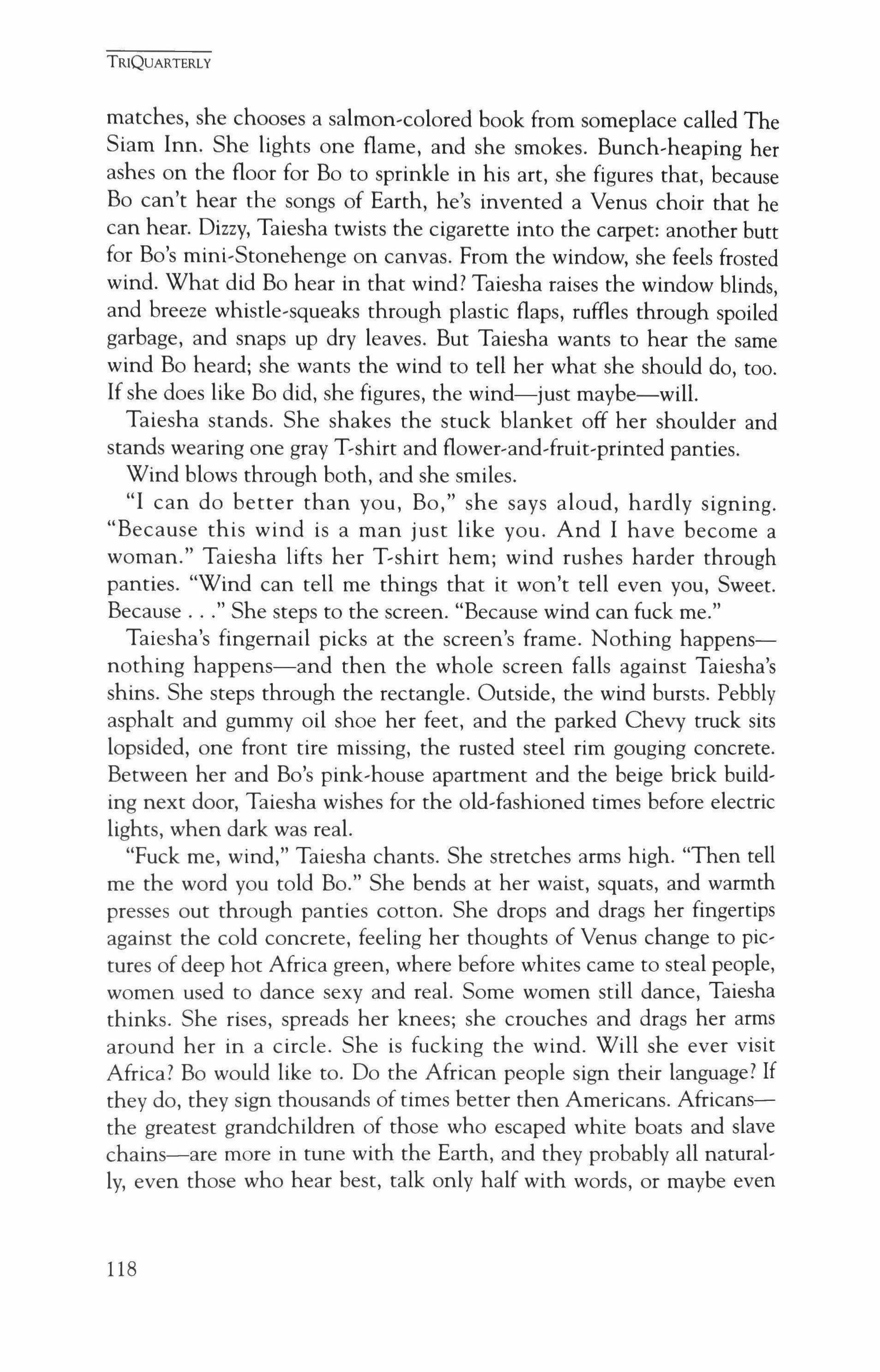
matches, she chooses a salmon-colored book from someplace called The Siam Inn. She lights one flame, and she smokes. Bunch-heaping her ashes on the floor for Bo to sprinkle in his art, she figures that, because Bo can't hear the songs of Earth, he's invented a Venus choir that he can hear. Dizzy, Taiesha twists the cigarette into the carpet: another butt for Bo's mini-Stonehenge on canvas. From the window, she feels frosted wind. What did Bo hear in that wind? Taiesha raises the window blinds, and breeze whistle,squeaks through plastic flaps, ruffles through spoiled garbage, and snaps up dry leaves. But Taiesha wants to hear the same wind Bo heard; she wants the wind to tell her what she should do, too. If she does like Bo did, she figures, the wind-just maybe-will.
Taiesha stands. She shakes the stuck blanket off her shoulder and stands wearing one gray T,shirt and flower-and-fruit-printed panties.
Wind blows through both, and she smiles.
"I can do better than you, Bo," she says aloud, hardly signing. "Because this wind is a man just like you. And I have become a woman." Taiesha lifts her Tvshirt hem; wind rushes harder through panties. "Wind can tell me things that it won't tell even you, Sweet. Because She steps to the screen. "Because wind can fuck me."
Taiesha's fingernail picks at the screen's frame. Nothing happensnothing happens-and then the whole screen falls against Taiesha's shins. She steps through the rectangle. Outside, the wind bursts. Pebbly asphalt and gummy oil shoe her feet, and the parked Chevy truck sits lopsided, one front tire missing, the rusted steel rim gouging concrete. Between her and Bo's pink-house apartment and the beige brick build, ing next door, Taiesha wishes for the old-fashioned times before electric lights, when dark was real.
"Fuck me, wind," Taiesha chants. She stretches arms high. "Then tell me the word you told Bo." She bends at her waist, squats, and warmth presses out through panties cotton. She drops and drags her fingertips against the cold concrete, feeling her thoughts of Venus change to pic' tures of deep hot Africa green, where before whites came to steal people, women used to dance sexy and real. Some women still dance, Taiesha thinks. She rises, spreads her knees; she crouches and drags her arms around her in a circle. She is fucking the wind. Will she ever visit Africa? Bo would like to. Do the African people sign their language? If they do, they sign thousands of times better then Americans. Africansthe greatest grandchildren of those who escaped white boats and slave chains-are more in tune with the Earth, and they probably all natural, ly, even those who hear best, talk only half with words, or maybe even
TRIQUARTERLY
118
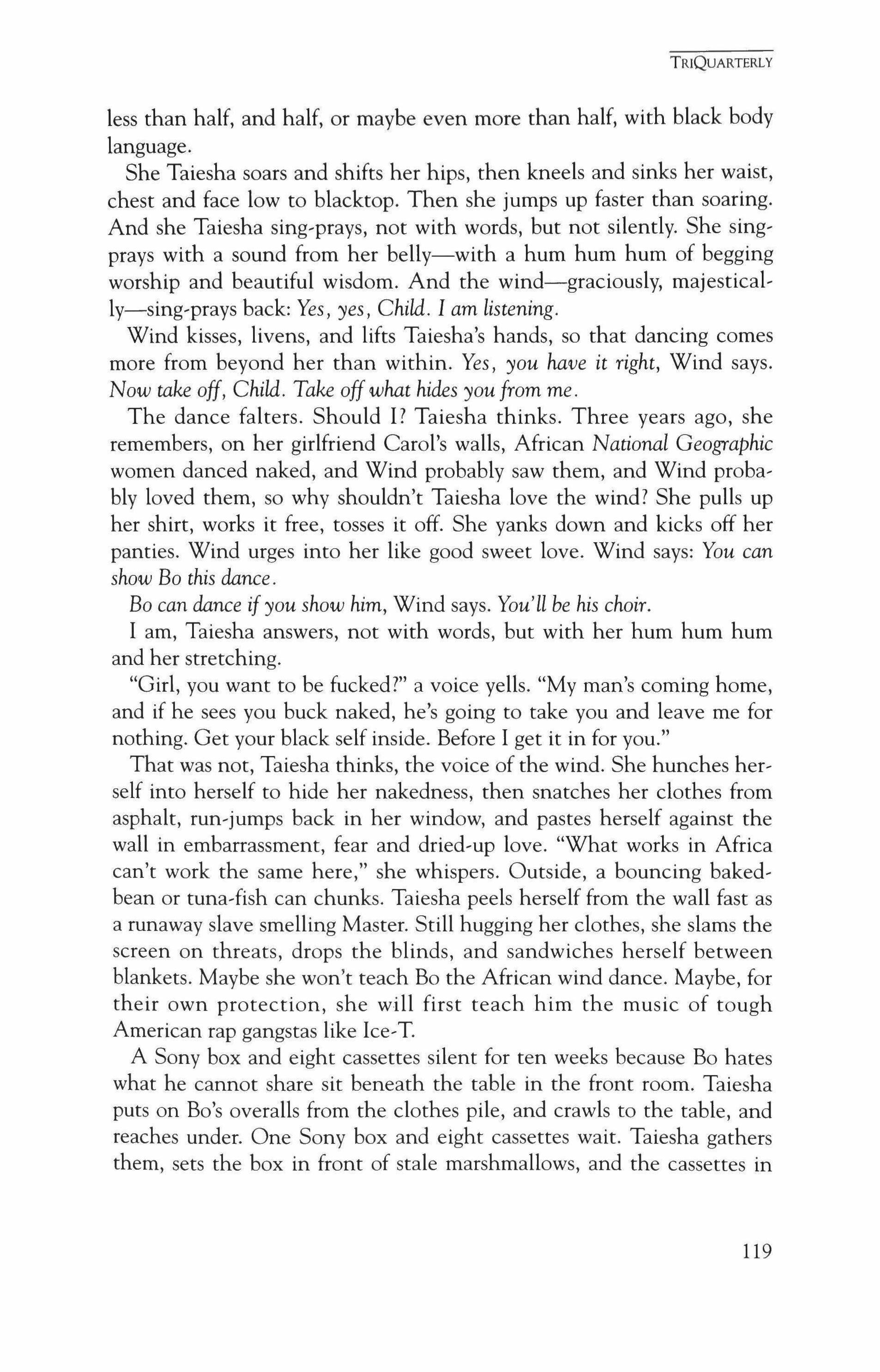
less than half, and half, or maybe even more than half, with black body language.
She Taiesha soars and shifts her hips, then kneels and sinks her waist, chest and face low to blacktop. Then she jumps up faster than soaring. And she Taiesha sing-prays, not with words, but not silently. She singprays with a sound from her belly-with a hum hum hum of begging worship and beautiful wisdom. And the wind-graciously, majestically-sing-prays back: Yes, yes, Child. I am listening.
Wind kisses, livens, and lifts Taiesha's hands, so that dancing comes more from beyond her than within. Yes, you have it right, Wind says. Now take off, Child. Take off what hides you from me.
The dance falters. Should I? Taiesha thinks. Three years ago, she remembers, on her girlfriend Carol's walls, African National Geographic women danced naked, and Wind probably saw them, and Wind probably loved them, so why shouldn't Taiesha love the wind? She pulls up her shirt, works it free, tosses it off. She yanks down and kicks off her panties. Wind urges into her like good sweet love. Wind says: You can show Bo this dance.
Bo can dance if you show him, Wind says. You'll be his choir. I am, Taiesha answers, not with words, but with her hum hum hum and her stretching.
"Girl, you want to be fucked?" a voice yells. "My man's coming home, and if he sees you buck naked, he's going to take you and leave me for nothing. Get your black self inside. Before I get it in for you."
That was not, Taiesha thinks, the voice of the wind. She hunches herself into herself to hide her nakedness, then snatches her clothes from asphalt, run-jumps back in her window, and pastes herself against the wall in embarrassment, fear and dried-up love. "What works in Africa can't work the same here," she whispers. Outside, a bouncing bakedbean or tuna-fish can chunks. Taiesha peels herself from the wall fast as a runaway slave smelling Master. Still hugging her clothes, she slams the screen on threats, drops the blinds, and sandwiches herself between blankets. Maybe she won't teach Bo the African wind dance. Maybe, for their own protection, she will first teach him the music of tough American rap gangstas like Ice-T.
A Sony box and eight cassettes silent for ten weeks because Bo hates what he cannot share sit beneath the table in the front room. Taiesha puts on Bo's overalls from the clothes pile, and crawls to the table, and reaches under. One Sony box and eight cassettes wait. Taiesha gathers them, sets the box in front of stale marshmallows, and the cassettes in
TRIQUARTERLY
119
TRIQUARTERLY

front of the box, with Queen Latifa on top because she wants Bo to dance her first. Bo will smile.
* * *
Just-washed hair flaps against Taiesha's neck, some strands sticking to skin; six tiny copper earring loops jingle. Her wet nipples blot her Tshirt beneath the threads hanging from its scissored neck, and her thighs darken the red, green and purple of her tissue-thin skirt. Softly, her feet moisten the floor while Taiesha, stretching leg muscles, waits for Bo.
A breeze cools her neck. She smells blown-out matches. Messy and soaked, Bo stands in their doorway, then steps through. Will he be as cool as refrigerated grapes when Taiesha presses her tongue to the gloss over his skin? Or will he be as hot and salty as a soft, mustard-covered pretzel?
A bleeding fingernail aims itself at Taiesha; "V" fingers move toward her from Bo's eyes; one hand seems to Windshield-wipe Bo's face.
"You look pretty," Taiesha translates.
Bo drags the "T" sign through imaginary blue-black curls past his shoulders: Taiesha's second favorite sign-her name.
Outside, past the open door, Taiesha sees the peeking sun, and two sisters, one younger with her hair wrapped in five braids and one maybe as old as Taiesha, are walking down Seventh Street to school. Between them, hands are held like the best of good families. Taiesha closes the door--doses tight schoolgirls away-but can't help wondering if, this morning, those sisters woke to the whistle of their mama, their papa or their favorite uncle. Then she can't stop picturing herself tucking her old Purpli Teddy Bear on her uncle Sparrow's couch and leaving him and Sparrow with just each other. How would it be if she hadn't stolen Sparrow's shiny laundry quarters and found Bo outside Verano Pasado's, where, for money, he was painting pretty tourists? Bo wore red balloons around his wrists that morning, and a halo-gold bandana around his short dreadlocks that smelled like fresh oranges. How would it be if he'd smelled like limes? How would it be if Taiesha hadn't told him, "I want to be painted," and showed him the handful of quarters, and asked, "Is this enough?" And who would she be if Bo hadn't wrapped balloon string around her wrist, and led her to this apartment, and painted her for less than one quarter but more than four million? Who would she be if Bo had not painted for love?
Taiesha locks the front door; she is not, she tells herself, ever going to school. She squats beside Bo where he stoops with eyes closed, and she
120

lets her tongue lick his hoop-player's shoulder. She doesn't taste grapes or pretzels; she tastes something like red-pepper bum. The taste of loneliness? she asks herself. She rubs her elbow against his.
"I'm going to teach you to dance," Taiesha says. "I'm going to teach you to hear rap"-R-A-P, she signs-"through the feel of stepping." She gets up to start "Fly Girl," but Bo grabs her right wrist.
His other hand mimes a biting alligator. "No, No," his fingers chew. Bo faces Taiesha straight, as if she needs to read lips like he does. He circles a flat palm around his chest, but doesn't smile. "I sent," his mouth helps him explain, "people to Venus."
The sun, through a front window not covered by cardboard, brightens fast. Will more glass pop out so the wind can stir this room? "Who?" Taiesha asks Bo. Her pointer finger draws a careful circle around her lips. "And how?" she wants to ask.
Bo drags the "T" through her hair. He shoots "V" away from glowing eyes. "Taiesha, it looked," he is saying. His palm flashes down, then up. "Bad. But it was good."
"What looked bad but was good?" Taiesha asks. She drags her pointer finger across her palm.
Bo's hands dance: They speak faster than Taiesha could understand even if she'd studied sign as long as those loving sisters have gone to school. "Two men." Taiesha leans closer to decode the knots in Bo's voice. "Thin. Blond. Mustaches. Pretty. They were kissing in an alley." Bo's hands seem to bow; they should have applause and a standing ovation, but before there's time, they're dancing again, and Taiesha must listen hard. "After I sent the first man to Venus," Bo is saying, "the second rocked him and waited. He wanted to go, too. They did not belong here. They are more happy horne. And then I sent a nun. She never kissed. She used to teach. In a room under a. Crucifix. She is more happy, too."
Slowly, Taiesha squiggles her own palm with a pinkie. "You painted them?"
"Without painting," Bo tells her. His hand pulls the trigger on a gun he doesn't hold. Then two hands flip over-and Taiesha knows this means "dead"-and she doesn't want Bo to talk, but he does: "Now they are dead, and they can all live on Venus."
Taiesha's lungs feel collapsed: another loved one is almost gone. Bo has given up, shot out-he's messed to ruin. All that muscle in his body wasn't strong enough. Taiesha stretches her palm and fingers over Bo's face. There is nothing, she thinks, she can do for anyone now. Under 121
TRIQUARTERLY
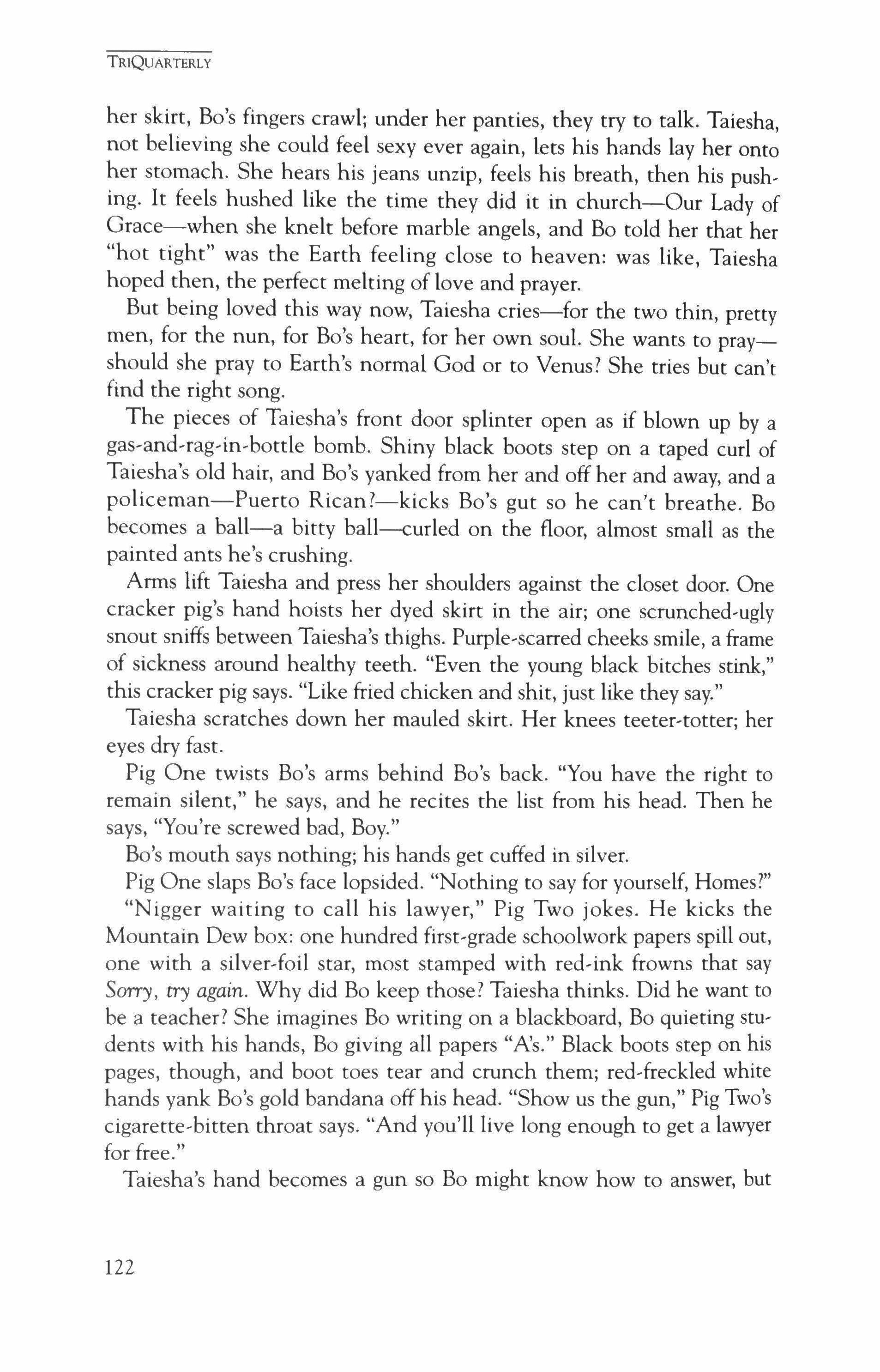
her skirt, Bo's fingers crawl; under her panties, they try to talk. Taiesha, not believing she could feel sexy ever again, lets his hands lay her onto her stomach. She hears his jeans unzip, feels his breath, then his pushing. It feels hushed like the time they did it in church-Our Lady of Grace-when she knelt before marble angels, and Bo told her that her "hot tight" was the Earth feeling close to heaven: was like, Taiesha hoped then, the perfect melting of love and prayer.
But being loved this way now, Taiesha cries-for the two thin, pretty men, for the nun, for Bo's heart, for her own soul. She wants to prayshould she pray to Earth's normal God or to Venus? She tries but can't find the right song.
The pieces of Taiesha's front door splinter open as if blown up by a gas-and-tag-in-bottle bomb. Shiny black boots step on a taped curl of Taiesha's old hair, and Bo's yanked from her and off her and away, and a policeman-Puerto Rican?-kicks Bo's gut so he can't breathe. Bo becomes a ball-a bitty ball--curled on the floor, almost small as the painted ants he's crushing.
Arms lift Taiesha and press her shoulders against the closet door. One cracker pig's hand hoists her dyed skirt in the air; one scrunched-ugly snout sniffs between Taiesha's thighs. Purple-scarred cheeks smile, a frame of sickness around healthy teeth. "Even the young black bitches stink," this cracker pig says. "Like fried chicken and shit, just like they say."
Taiesha scratches down her mauled skirt. Her knees teeter-totter; her eyes dry fast.
Pig One twists Bo's arms behind Bo's back. "You have the right to remain silent," he says, and he recites the list from his head. Then he says, "You're screwed bad, Boy."
Bo's mouth says nothing; his hands get cuffed in silver.
Pig One slaps Bo's face lopsided. "Nothing to say for yourself, Homes?"
"Nigger waiting to call his lawyer," Pig Two jokes. He kicks the Mountain Dew box: one hundred first-grade schoolwork papers spill out, one with a silver-foil star, most stamped with red-ink frowns that say Sorry, try again. Why did Bo keep those? Taiesha thinks. Did he want to be a teacher? She imagines Bo writing on a blackboard, Bo quieting students with his hands, Bo giving all papers "Rs." Black boots step on his pages, though, and boot toes tear and crunch them; red-freckled white hands yank Bo's gold bandana off his head. "Show us the gun," Pig Two's cigarette-bitten throat says. "And you'll live long enough to get a lawyer for free."
Taiesha's hand becomes a gun so Bo might know how to answer, but
TRIQUARTERLY
122

he doesn't see-or doesn't care. Pig Two kicks full and half-full paint jars until they spatter and spill. He tracks boot slop through the bedroom. He stomps clothes, blankets, pillows. No more sleep there, Taiesha thinks. No more love.
Pig Two ogles Bo's first portrait of Taiesha, knifes a booted toe hard through her canvas belly-and through that private space beneath her canvas belly. Taiesha hurts as if he's kicked her real self, and he eyes her dirty, then walks toward the front door. Pig One is shaking out Cocoa Krispies. Pig One is flinging stale marshmallows. "There's no gun in there," Taiesha says. Her insides hurt worse and she cringes, but Pig One has not hit her. In slow motion, he's lifting the Ice-T cassette.
"Got it!" Pig Two yells from the yard. He walks in with one Reebok Blacktop shoe box that cribs a gun as if boxes were mamas.
"I'm going to do you a favor, Girl," Pig One says, flicking Taiesha's cassette from its case. "These are what cause all the troubles for kids like your boyfriend and you." Pig One pinches a little loop of brown-butsilent music, yanks it into a long-long string, ruining it even though it could never hide guns, ruining it, Taiesha guesses, because he can. He lasso-swings the cassette shell over his head until it hits the wall and falls; he tears in half the tape.
"Let's go," he says.
He walks out the door, and Pig Two tugs Bo, and Bo tries to stand but stumbles. No wind blows before Taiesha's by herself. And Bo hasn't looked back once. Taiesha runs to the glass porch window least spattered by paint. Cop car doors close. "He never heard the rap!" she yells. She signs R-A-P, and the sealed car speeds into the still morning.
"Not even once," Taiesha says.
Taiesha Rawnie, fourteen seconds alone, walks through an apartment that's no longer Bo's and will soon stop being hers, too. In the bedroom, she sits cross-legged in a pile of wet spilled oils, in front of Bo's painting of her in her fringed plum scarf and high heels. Her fingers smear greasy blue and green across her thigh-her real one-and, with her clean hand, she takes a pack of Bo's matches. One wide hole from a pig's hoof still bores through her canvas belly and the space beneath it, and the Bo who was Taiesha's boyfriend and artist-and who once tried to bandage the whole world-is gone. Gone.
Taiesha understands that what sad and messed-up Bo did was holy and ugly and criminal all at once. Like African wind dances don't work in America, Venus's children, Bo may have believed, would never reach high places on Earth. But there are some trips to high places, Bo must
TRIQUARTERLY
123
TRIQUARTERLY

have believed, that Earth's powerful people can't stop, and so he sent three Venus children to a further, brighter planet, where he hoped there would be a better heaven. His crime, Taiesha thinks, was that he didn't know those three people might have been joyful on Earth.
Taiesha Rawnie, lover of one boyfriend the police might kill before jail time, lights a match from Bo's collection. She lights it slow, then one faster, and then many at the same time. One halo-gold flame lashes itself to the hurt her pictured pretty in Bo's painting, and her painting flashes with fire, and it bums. Smoke and ashes rising from the painted Taiesha fly to Venus, where they soon will meet Bo. The real Taiesha gets up and walks away.
124
Siesta Lake, Yosemite National Park
Blizzard into Text: Contemporary Cross-Gendered Verse
an essay by
Alan Michael Parker and Mark Willhardt
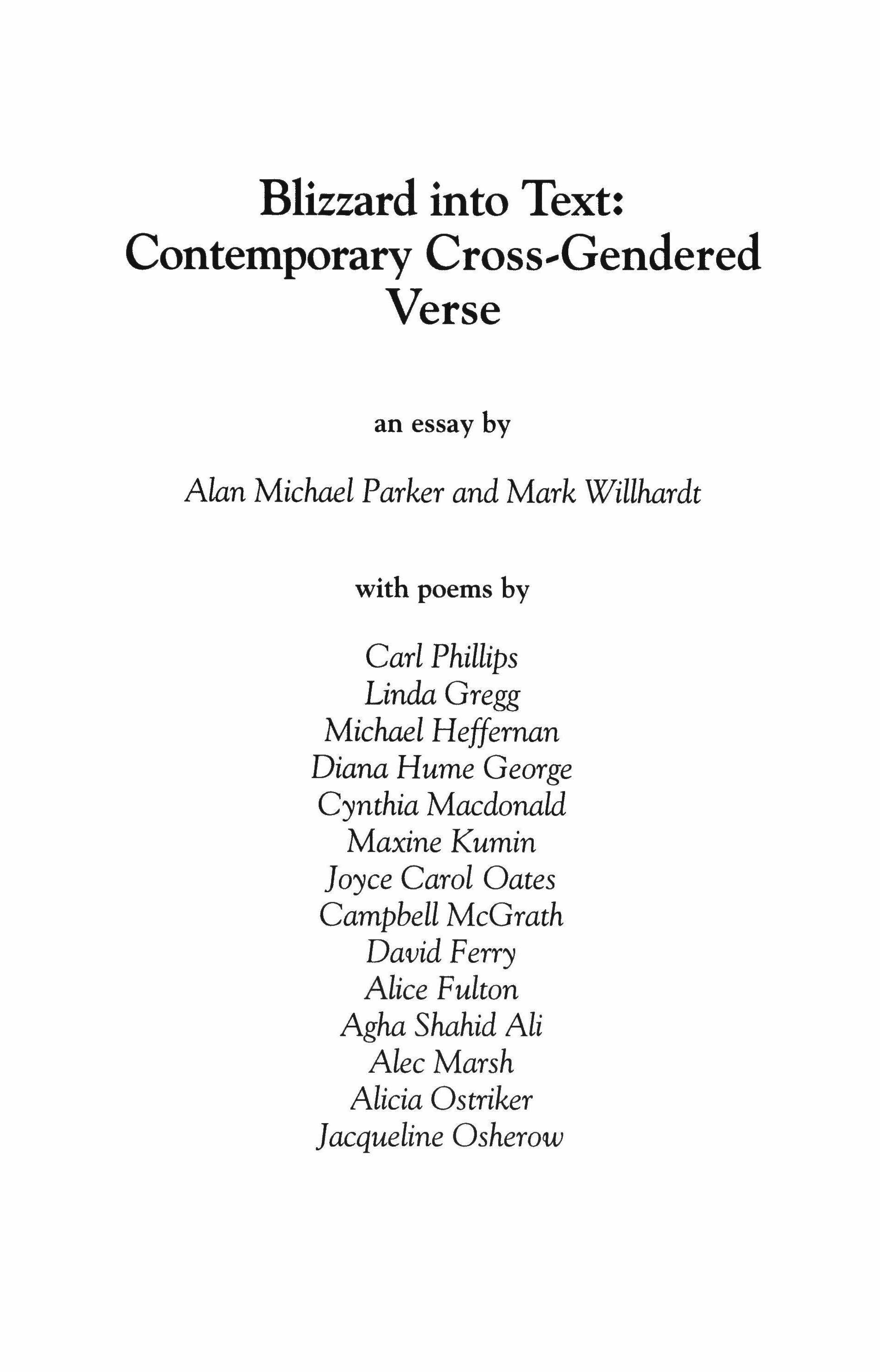
with poems by
Carl Phillips
Linda Gregg
Michael Heffernan
Diana Hume George
Cynthia Macdonald
Maxine Kumin
Joyce Carol Oates
Campbell McGrath
David Ferry
Alice Fulton
Agha
Shahid Ali
Alec Marsh
Alicia Ostriker
Jacqueline Osherow

Blizzard into Text: Contemporary Cross-Gendered Verse
Alan Michael Parker and Mark Willhardt

In December of 1994, twenty,eight American poets were asked to contribute new poems to a selection of contemporary cross-gendered verse. The criterion was simple: write a first,person poem, sans exposition, explicitly in the voice of the other gender. What follow, then, are the results, an anthology of cross' gendered contemporary verse.
Cross-gendered poems are interesting precisely because their apparent one'trick nature-a woman writing as a man or a man writing as a woman-is belied by issues of voice, diction, internal auditor, subject, genre and even psychology. What is spoken in a cross-gendered poem does not equal all that may be heard. Indeed the unsaid proves key to appreciating the cross-gendered poem, and by parsing the unsaid we intend to offer a series of readings and theoretical positions which mitigate the differences among the poems. Like all good poetry these works stand on their own; quite wonderfully, despite their variety of styles and subjects, in their contemporary moment and cross-gendered narration the poems in this selection have more in common rather than less.
In gathering the poetry here, we were pleased to find a variety of styles emerge even as affinities among the poems became apparent; when we shaped the selection with an eye on these affinities, thematic correspondences conjoined with other, more theoretical concerns. For example, the works here might be grouped into a number of categories, along the lines of working-class poems, historical poems, revisionary myths (both classical and religious), and translations. The preponderance of myth-revision seemed particularly worth remarking upon, given the Victorian poets' mastery of this trope during the dramatic mono,
TRIQUARTERLY
127
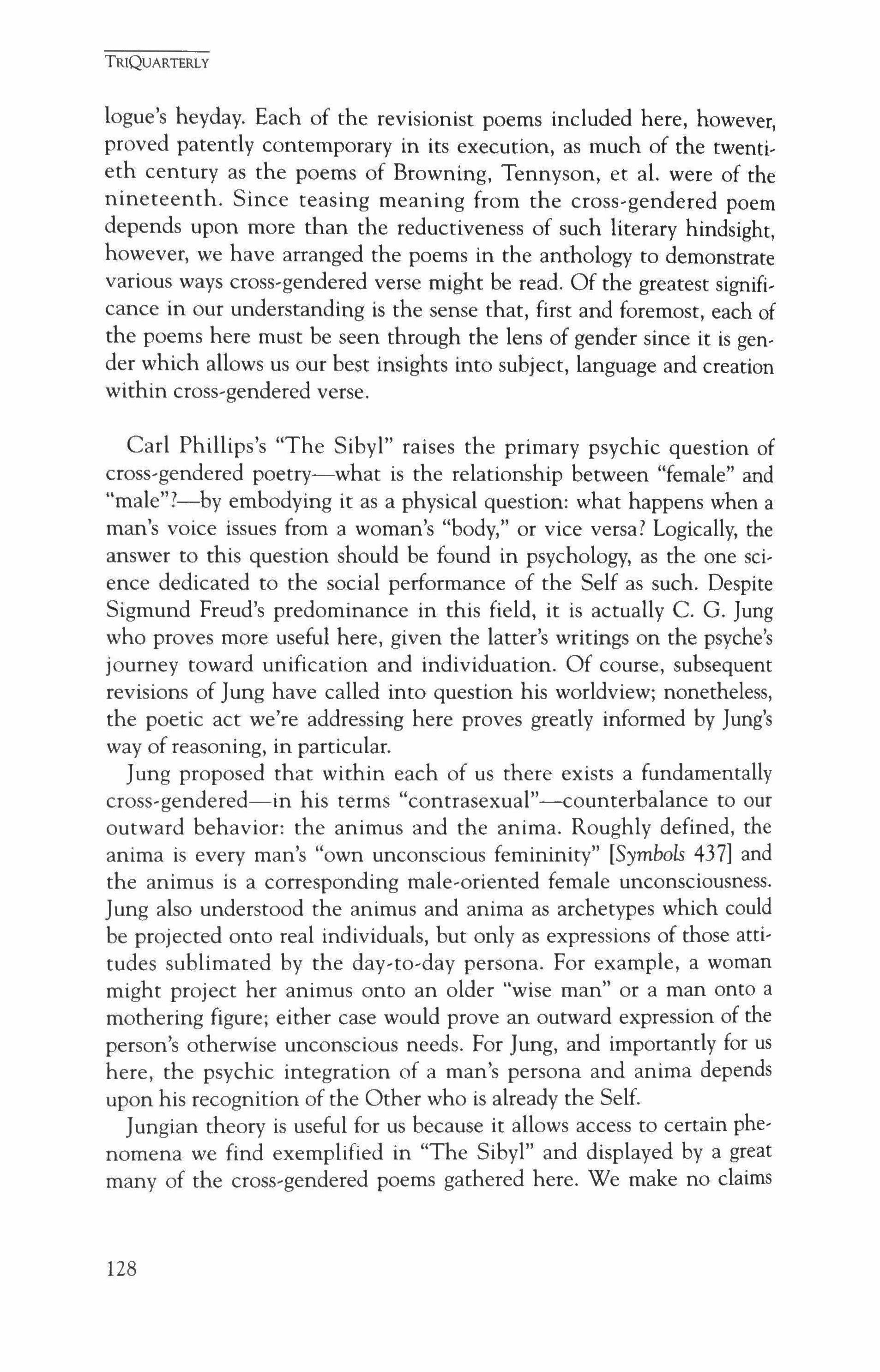
logue's heyday. Each of the revisionist poems included here, however, proved patently contemporary in its execution, as much of the twentieth century as the poems of Browning, Tennyson, et al. were of the nineteenth. Since teasing meaning from the cross-gendered poem depends upon more than the reductiveness of such literary hindsight, however, we have arranged the poems in the anthology to demonstrate various ways cross-gendered verse might be read. Of the greatest significance in our understanding is the sense that, first and foremost, each of the poems here must be seen through the lens of gender since it is gender which allows us our best insights into subject, language and creation within cross-gendered verse.
Carl Phillips's "The Sibyl" raises the primary psychic question of cross-gendered poetry-what is the relationship between "female" and "male"?-by embodying it as a physical question: what happens when a man's voice issues from a woman's "body," or vice versa? Logically, the answer to this question should be found in psychology, as the one science dedicated to the social performance of the Self as such. Despite Sigmund Freud's predominance in this field, it is actually C. G. [ung who proves more useful here, given the latter's writings on the psyche's journey toward unification and individuation. Of course, subsequent revisions of [ung have called into question his worldview; nonetheless, the poetic act we're addressing here proves greatly informed by [ung's way of reasoning, in particular.
[ung proposed that within each of us there exists a fundamentally cross-gendered-in his terms "contrasexual"-counterbalance to our outward behavior: the animus and the anima. Roughly defined, the anima is every man's "own unconscious femininity" [Symbols 437] and the animus is a corresponding male-oriented female unconsciousness. [ung also understood the animus and anima as archetypes which could be projected onto real individuals, but only as expressions of those attitudes sublimated by the day-to-day persona. For example, a woman might project her animus onto an older "wise man" or a man onto a mothering figure; either case would prove an outward expression of the person's otherwise unconscious needs. For [ung, and importantly for us here, the psychic integration of a man's persona and anima depends upon his recognition of the Other who is already the Self.
Jungian theory is useful for us because it allows access to certain phenomena we find exemplified in "The Sibyl" and displayed by a great many of the cross-gendered poems gathered here. We make no claims
TRIQUARTERLY
128
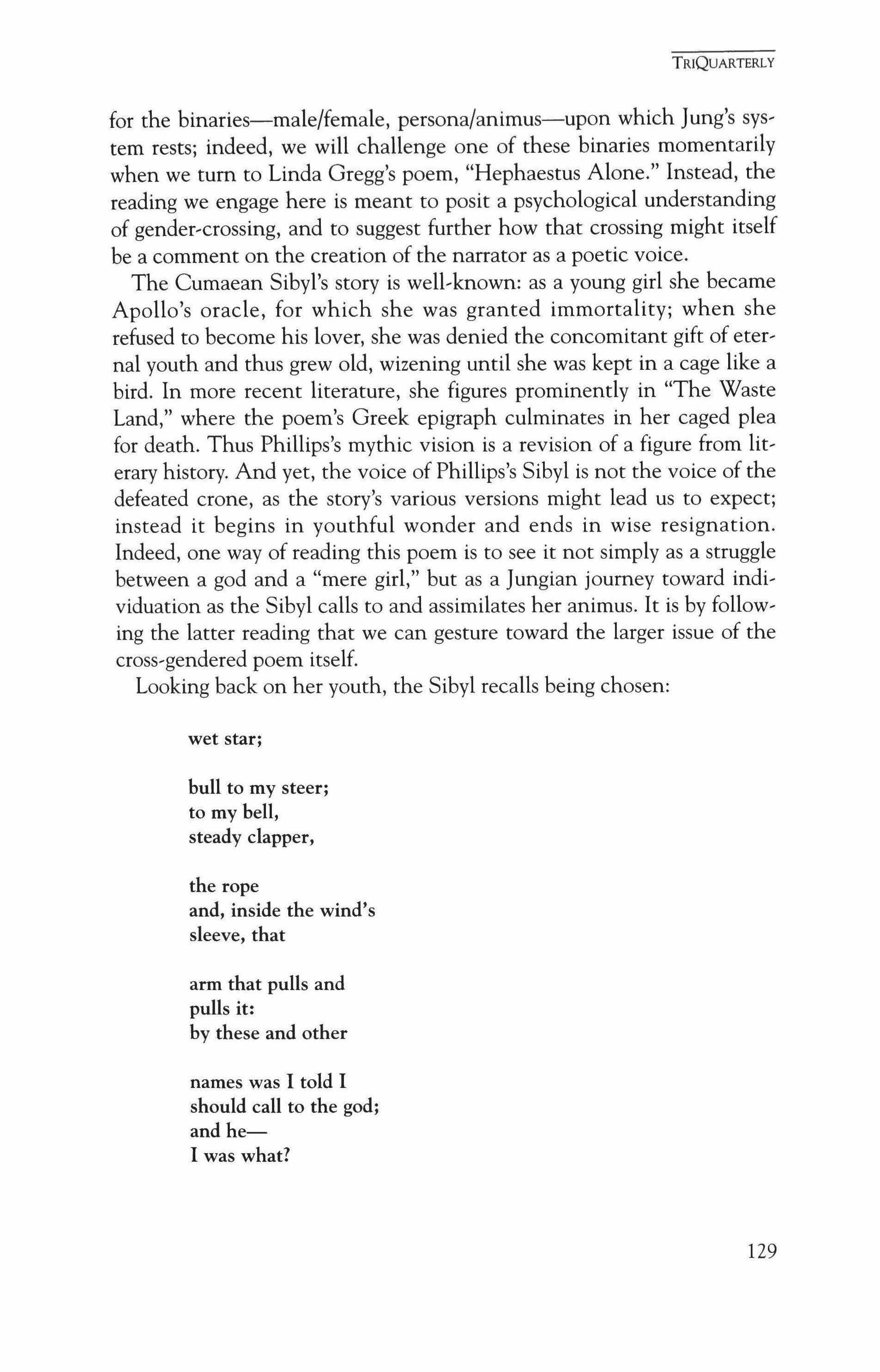
for the binaries-male/female, persona/animus-upon which [ung's system rests; indeed, we will challenge one of these binaries momentarily when we tum to Linda Gregg's poem, "Hephaestus Alone." Instead, the reading we engage here is meant to posit a psychological understanding of gender-crossing, and to suggest further how that crossing might itself be a comment on the creation of the narrator as a poetic voice.
The Cumaean Sibyl's story is well-known: as a young girl she became Apollo's oracle, for which she was granted immortality; when she refused to become his lover, she was denied the concomitant gift of eternal youth and thus grew old, wizening until she was kept in a cage like a bird. In more recent literature, she figures prominently in "The Waste Land," where the poem's Greek epigraph culminates in her caged plea for death. Thus Phillips's mythic vision is a revision of a figure from Iiterary history. And yet, the voice of Phillips's Sibyl is not the voice of the defeated crone, as the story's various versions might lead us to expect; instead it begins in youthful wonder and ends in wise resignation. Indeed, one way of reading this poem is to see it not simply as a struggle between a god and a "mere girl," but as a Jungian journey toward individuation as the Sibyl calls to and assimilates her animus. It is by following the latter reading that we can gesture toward the larger issue of the cross-gendered poem itself.
Looking back on her youth, the Sibyl recalls being chosen:
wet star; bull to my steer; to my bell, steady clapper, the rope and, inside the wind's sleeve, that
arm that pulls and pulls it: by these and other
names was I told I should call to the god; and heI was what?
TRIQUARTERLY
129

a mere girl? And already: chosen.
The blatantly sexual nature of the metaphors which "name" the god here proves strikingly consistent. The Sibyl is the void to be filledsteer, bell, sleeve-while the ineffable deity becomes the phallic fillerbull, clapper, rope and "arm that pulls and / pulls." In Jungian terms, the conscious attempt to name may be seen as the Sibyl's first effort to comprehend the unconscious animus itself. {Interestingly enough, the "wet star" which is the god's sign corresponds nicely to [ung's characterization, in his Mysterium Coniunctionis, of a woman's nature in its "lunar wetness" [Mysterium 246]. Most importantly, however, the god remains absent here: the "crossroads vision" we have, and the calling-into-being of Apollo, depend upon the Sibyl's vision alone. It is her psychic position explored; it is her "female" portion of an image which is completed by a corresponding "male" portion. As an unconscious archetype, however, the animus resists conscious enumeration and elucidation, as might be seen in the necessarily approximate nature of the metaphors, indeed of metaphor itself.
It may be argued that the approximation we see in these lines dramatizes the awe of a "mere girl" who dares not name the Being called, a ritual practice in many societies, including that of Ancient Greece. But Phillips's Sibyl does not simply echo ritual or long-dead myth. Instead she explores the nature of faith and sacrifice when, in her allusive response to both Dante and Eliot, she describes those bodies
of the all but drowned, all blear, and ash?
Then a turnwhatever soul, flame, life inside deciding yes, it will stay.
Unlike either Dante's or Eliot's souls, the dead invoked by Phillips maintain or regain their hope, an act with which the Sibyl clearly identifies. Still, as they remain undefined "bodies" their presence becomes
TRIQUARTERLY
130
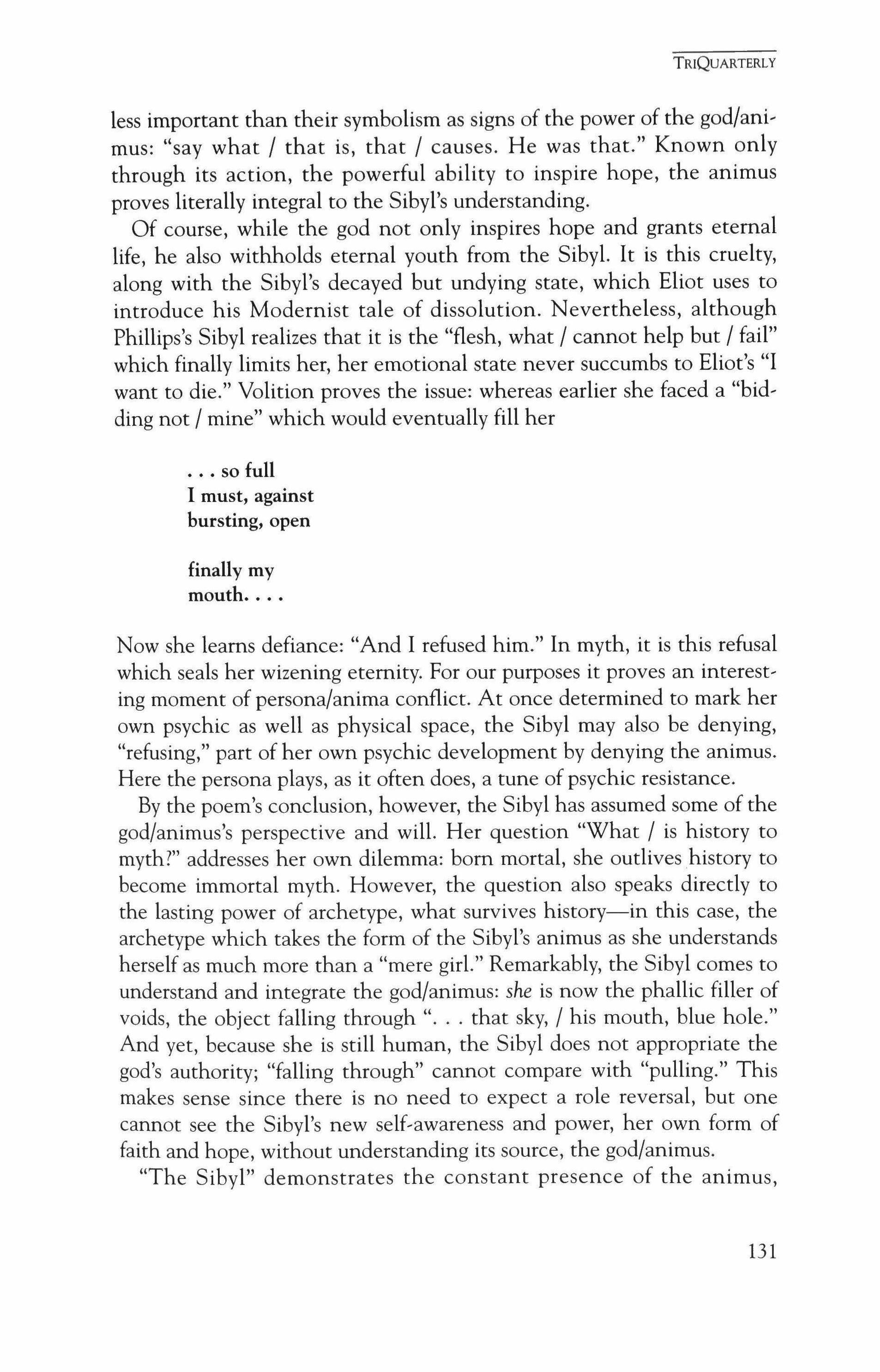
less important than their symbolism as signs of the power of the god/animus: "say what / that is, that / causes. He was that." Known only through its action, the powerful ability to inspire hope, the animus proves literally integral to the Sibyl's understanding.
Of course, while the god not only inspires hope and grants eternal life, he also withholds eternal youth from the Sibyl. It is this cruelty, along with the Sibyl's decayed but undying state, which Eliot uses to introduce his Modernist tale of dissolution. Nevertheless, although Phillips's Sibyl realizes that it is the "flesh, what / cannot help but / fail" which finally limits her, her emotional state never succumbs to Eliot's "I want to die." Volition proves the issue: whereas earlier she faced a "bidding not / mine" which would eventually fill her so full
I must, against bursting, open
finally my mouth
Now she learns defiance: "And I refused him." In myth, it is this refusal which seals her wizening eternity. For our purposes it proves an interesting moment of persona/anima conflict. At once determined to mark her own psychic as well as physical space, the Sibyl may also be denying, "refusing," part of her own psychic development by denying the animus. Here the persona plays, as it often does, a tune of psychic resistance.
By the poem's conclusion, however, the Sibyl has assumed some of the god/animus's perspective and will. Her question "What / is history to myth?" addresses her own dilemma: born mortal, she outlives history to become immortal myth. However, the question also speaks directly to the lasting power of archetype, what survives history-in this case, the archetype which takes the form of the Sibyl's animus as she understands herself as much more than a "mere girl." Remarkably, the Sibyl comes to understand and integrate the god/animus: she is now the phallic filler of voids, the object falling through that sky, / his mouth, blue hole." And yet, because she is still human, the Sibyl does not appropriate the god's authority; "falling through" cannot compare with "pulling." This makes sense since there is no need to expect a role reversal, but one cannot see the Sibyl's new self-awareness and power, her own form of faith and hope, without understanding its source, the god/animus.
"The Sibyl" demonstrates the constant presence of the animus,
TRIQUARTERLY
131

whether voiced or not, and points to a contradictory truism regarding cross-gendered poems: the projected animus or anima, the Other depict, ed, is seen as simultaneously part of and separate from its author. Thus reading a cross-gendered poem is different from reading other dramatic "I" poems, since the very act of crossing gender may be understood as an acknowledgment of the Other, the archetypal animus or anima as Self. Saying this, however, calls into question who the speaking Self is in a cross-gendered poem, the persona which has often been mistakenly characterized as a projection of the author.
[ung's clinical "persona" is certainly related to the dramatis personae we commonly think of as occupying dramatic monologues. The conception of such a dramatic persona as wholly removed from its author, however, fails to jibe with the Self-and-Other relationship we find in cross-gendered poems. Instead, rather than burden the already overdetermined "persona," we prefer to call the cross-gendered dramatic "I" a "personation," drawing on a term introduced by John Hollander to describe the characters in Richard Howard's work [Hollander 7]. The linguistic difference between the words may be slight, but the theoretical distinctions prove significant indeed.
What Jung's sense of the persona as archetype lacks is an understand, ing of gendered behavior: for him, what is not female must be male, and what is not male must be female. Contemporary theory, in various forms, has successfully challenged such binaries as more proscriptive than descriptive. Marjorie Garber's 1992 study of transvestites, for instance, proposes that cross-dressers actually inhabit an in-between space she labels the "third term" [Garber 11]. As simultaneously both and neither "male" and "female," transvestites resist the received categories of the gender binary. In cross-gendered poetry this "third term," what we might call the "third Other," may take the form of the poem's personation.
We are not suggesting, however, that the cross-gendered poem is merely cross-dressed and labeled anew a "personation." The personation is a substantive notion because it acts to embody the historic, mythic or imaginative. As a trope, the personation reflects the dual consciousness within readers: reading the empathy which connects creator and creation, author and poem, effectively constructs a "third Other" who both is and isn't the author, is and isn't the "live" speaker of the poem, is and isn't the reader as "I." In this way the personation distinguishes itself from its closest literary relative, the mask. Whether understood as a classical or more modem device {and here Ellmann's reading of Yeats
TRIQUARTERLY
132

comes to mind), the mask fixes an aspect of the poet's own life upon a character, thereby allowing the poet to wear her or his heart upon someone else's sleeve, as it were. The cross-gendered poem behaves otherwise: the personation is a fluid idea, in part derived from the poet's life but given a life of its own. Nor is the personation simply an impersonation, as dictionary definition might suggest, for the personation never counterfeits the real. Instead, in the venue of the cross-gendered poem, the personation creates a new psychic reality culled from the experiences of the poet and the imagined life of the speaker.
This unique act, not surprisingly, often becomes the subject of the cross-gendered poem, as can be seen in Linda Gregg's "Hephaestus Alone." Although no more about the nature of cross-gendered verse than "The Sibyl" is about Jungian psychology, Gregg's poem nonetheless presents "creation" in a way that might help us understand the crossgendered "third Other." In her mythic revision, Gregg gives us an Hephaestus who creates not only the metal products for which he is famed but also his very world, including even his wife, Aphrodite. As a result, behind the poem's retelling of Hephaestus and Aphrodite's painful marriage lies a radical revision of both gender and myth.
Hephaestus is a figure already fraught with contradiction by the time this narrative begins: lame and dexterous, hideous and thrice-married, beloved and hated by the same gods, angry and doting. Even the story of his birth is contradictory. Although tradition depicts him as a child of Zeus and Hera, an alternate myth attributes his birth to Hera alone, spawned to spite Zeus for his singular creation of Athena. The latter myth-of creation without intercourse-proves a fascinating backdrop to the poem since, in Aphrodite's absence, Gregg's Hephaestus seems to replicate his mother's feat. Yet his "pregnancy" is quite different from Hera's because rather than doing without a partner, Hephaestus actually acts as both impregnator and birth-giver:
I pour the gold down the runnels into great mysteries under the sand. When I pull it up by the feet and knock off the scale, it is a god. What is it she finds with those men that equals this dark birthing?
Here, Hephaestus inseminates as he pours the world's gold, then "pull[s] it up by the feet," thereby "birthing" his own progeny-and like Hera, he creates a god. Interestingly rather than his metalworking accomplish-
TRIQUARTERLY
133

ments, Hcphaestus presents this act of birthing as proof of his worth, in comparison to whatever other men might offer Aphrodite. The power of creation here stands unequaled, a completion of the male and female roles Hephaestus plays. Posited as the jealous male, Hephaestus may also be seen as embodying the gendered "third Other"-beyond mere men, and the gender binary, in his role as both "man" and "woman."
Hephaestus's power of creation is not limited, however, to gold alone. Historically, Hephaestus's skill in manufacture is based on the armament he made: Heracles' shield, Achilles' armor, Zeus's thunderbolts and the like. The supreme example of his creation, though, came in the fashioning of Pandora. In a most daring revision, Gregg reconceives Hephaestus's life so that it is now his own wife, Aphrodite, whom he "made." By the time we reach the lyric, touching, and finally ambiguous last lines, our understanding of Hephaestus as a creator has taken on a larger significance: "I fashioned her by the rules, / with love, made her with rage and disillusion." Here, amidst the parallel prepositional and verbal phrases, love, rage and disillusion all combine to comprise the "rules" of creation. What results then is a complex emotional performance by the "third Other"; working with opposites, something else entirely gets born. By rewriting the myth in these cross-gendered terms, Gregg gives us insight into the nature of creation.
This is especially true when we pause to explore the poem's final word, that last "disillusion." To invoke the invited misprision, we could certainly find evidence of the "dissolution" of Hephaestus's world; he has no more "noons and rains and joy," only "hurt" and "pain." Yet it is with "disillusion" in particular that Aphrodite is created: the lame, ugly Hephaestus realizes the inevitable consequences, the simultaneous love and rage, of creating a beautiful wife. More importantly, this ultimate emphasis on disillusion furthers our understanding of the personation itself.
Hephaestus's disillusion allows him both anger at and empathy with his creations; he understands his own position in relation to Aphrodite, as he desires control but knows that control is impossible. In the crossgendered poem, theoretically, the personation also embodies empathetic understanding with a concomitant lack of control; what a poet might desire is mitigated against by the personation's own situation (just as the personation remains inscribed, literally, by the poet). And the personation must remain that "third Other" because she or he is refused the illusion of a reality, gendered and otherwise, distinct from the creator. In revising both the figure of Hephaestus and the events of his mythic
TRIQUARTERlY
134

life, Linda Gregg allows us to understand this dilemma within crossgendered poems as a whole, how the personation becomes, in a sense, a "dis-illusion": real but not, pre-determined and imbued with free will.
The triangulation of poet, speaker and auditor in a cross-gcndered poem may also be read along the lines of genre. Conservatively speaking, most literary critics would assign cross-gendered poems to one of two genres: the dramatic monologue or the dramatic lyric. In the first, a recognizable speaker converses with an identifiable listener, a "you" who, if not named by pronoun, may nonetheless be found silently present. Moreover, in the dramatic monologue, space and time are usually apparent; that is, a scene exists and transpires. In the dramatic lyric, the scene becomes thought itself, the poem narrated by the Self to the Self, often as an interior monologue. As such, no independent listener may be found in the dramatic lyric, nor does time pass, except for the reader. Although there will always be poems which fall between such monolithic structures as neither monologue nor lyric, most critics have fit poems in the voice of the Other into one or the other genre.
Interestingly, the twentieth-century cross-gendered poem often resists such pigeonholing. To read a contemporary cross-gendered dramatic monologue along the lines of Jungian psychology is to posit the speaker and listener as indistinct, in a sense, for they are seen as characters whose successful existence (as speaker, as listener) proves necessarily contingent upon each other. Moreover, the advent of critical theory has led us to understand the ways in which discourses collide so that language occupies meaning, rather than vice versa; in this view, the poem becomes a site of multiple, overlapping voices rather than a verse-drama staged by a puppeteer-poet. Regardless of how we choose to describe it, the challenges of persona and writing-as-Other in the contemporary cross-gendered poem dramatize a significant shift in poetics toward a new dramatic genre.
Let us take Michael Heffernan's "The Muse" as example: the poem appears to be a dramatic lyric, occupying memory out-of-time with no specific auditor clearly established. However, the poem also presupposes someone listening, as the memories culled depend upon an audience unfamiliar with the story-an audience which cannot be the Self, since the Muse knows all the narrative's information already and need not tell herself what she knows. The irony here is that as the Muse defiantly resists her own objectification by the unnamed male poet, she does so in an aestheticized language which only reinforces her position and role as Muse. (She speaks in poetry, she is poetry.) Moreover, Heffernan turns
TRIQUARTERLY
135
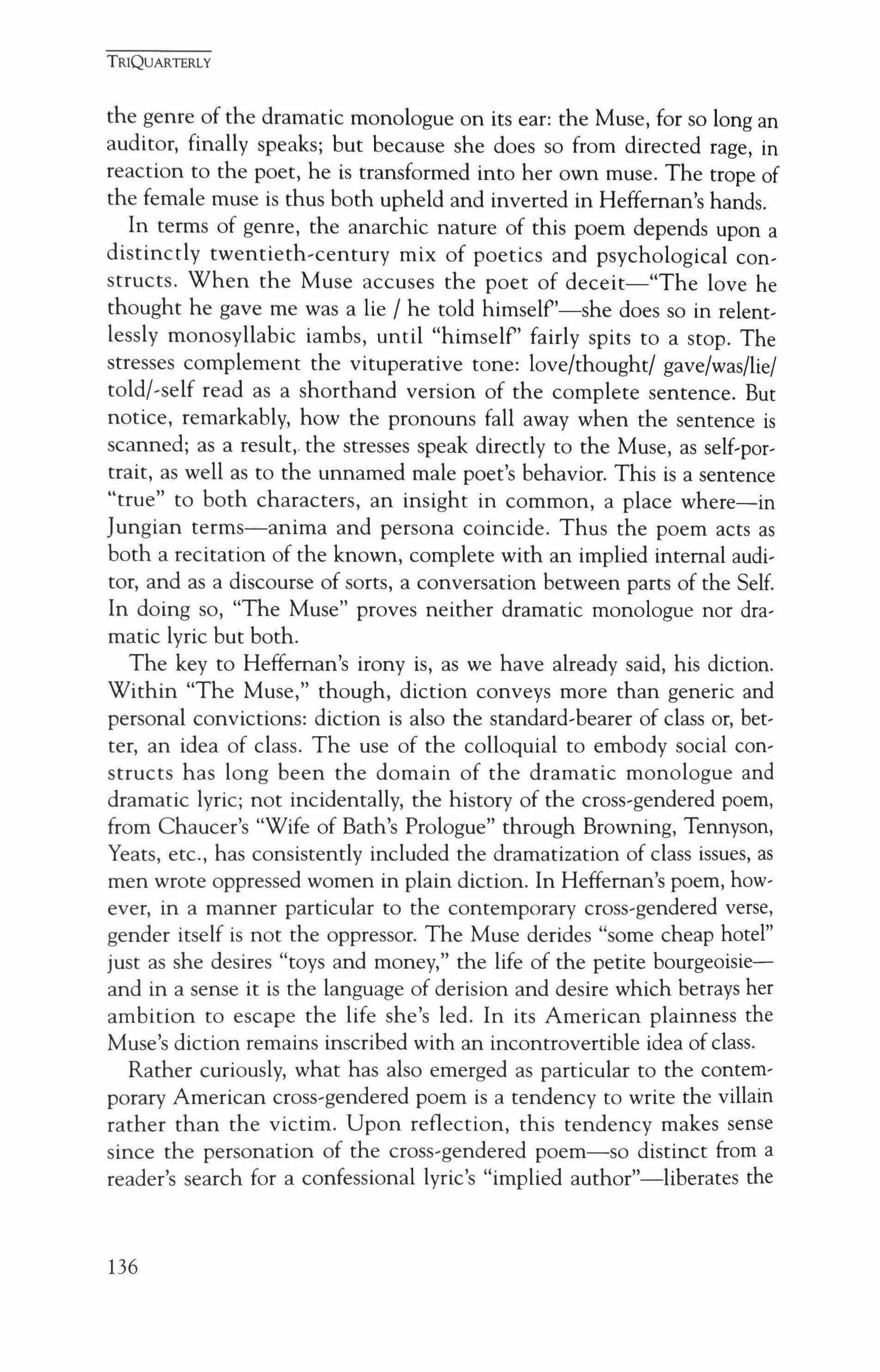
the genre of the dramatic monologue on its ear: the Muse, for so long an auditor, finally speaks; but because she does so from directed rage, in reaction to the poet, he is transformed into her own muse. The trope of the female muse is thus both upheld and inverted in Heffernan's hands.
In terms of genre, the anarchic nature of this poem depends upon a distinctly twentieth-century mix of poetics and psychological constructs. When the Muse accuses the poet of deceit-"The love he thought he gave me was a lie / he told himself'-she does so in relent, lessly monosyllabic iambs, until "himself' fairly spits to a stop. The stresses complement the vituperative tone: love/thought/ gave/was/lief told/-self read as a shorthand version of the complete sentence. But notice, remarkably, how the pronouns fall away when the sentence is scanned; as a result,. the stresses speak directly to the Muse, as self-pertrait, as well as to the unnamed male poet's behavior. This is a sentence "true" to both characters, an insight in common, a place where-in Jungian terms-anima and persona coincide. Thus the poem acts as both a recitation of the known, complete with an implied internal auditor, and as a discourse of sorts, a conversation between parts of the Self. In doing so, "The Muse" proves neither dramatic monologue nor dramatic lyric but both.
The key to Heffernan's irony is, as we have already said, his diction. Within "The Muse," though, diction conveys more than generic and personal convictions: diction is also the standard-bearer of class or, better, an idea of class. The use of the colloquial to embody social con' structs has long been the domain of the dramatic monologue and dramatic lyric; not incidentally, the history of the cross-gendered poem, from Chaucer's "Wife of Bath's Prologue" through Browning, Tennyson, Yeats, etc., has consistently included the dramatization of class issues, as men wrote oppressed women in plain diction. In Heffernan's poem, however, in a manner particular to the contemporary cross-gendered verse, gender itself is not the oppressor. The Muse derides "some cheap hotel" just as she desires "toys and money," the life of the petite bourgeoisieand in a sense it is the language of derision and desire which betrays her ambition to escape the life she's led. In its American plainness the Muse's diction remains inscribed with an incontrovertible idea of class.
Rather curiously, what has also emerged as particular to the contemporary American cross-gendered poem is a tendency to write the villain rather than the victim. Upon reflection, this tendency makes sense since the personation of the cross-gendered poem-so distinct from a reader's search for a confessional lyric's "implied author"-liberates the
TRIQUARTERLY
136

poet to explore aspects of the Other even as it obscures the presence of the poet. When Diana Hume George turns the intensity of her gaze to domesticl abuse, for instance, she does so empathetically, in a plain,style diction which helps us understand the rationalizations of the speaker, as almost anybody. Is he forgiven? Clearly not. Yet the crossing of gender accommodates both the poet's empathy and her ability to render judgment; as personation, the abusive male speaks with his poet's voice just as he stands removed from Hume George's own "I."
A provocative affinity can be seen between the prosodic accomplish, ments of Heffernan and Hume George. When Hume George's speaker declares "[I] pushed her away from me to keep myself / from hurting her," he rationalizes his actions, lies to himself. Remarkably, once again, scansion of the phrase underscores the events described: push/her/, way/me/keep/,self/hurt/her. Here each pronoun earns its stress, filling every other foot, including the notable connection of "her" to "me," and "self' to "her," now sans modifiers. In Jungian terms, we might say that the pronouns indicate a persona and anima at war. Hume George thus finds in domestic abuse the violence of the skewed Self, a discovery facilitated by cross-gendering, informed by twentieth,century psychology and dramatized by poetics.
Since cross-gendering can make us sympathize with the unsympathetic, it ought to come as no surprise that a cross-gendered poem might heighten our empathy with a narrator who successfully learns from life, and from her or his role in the gendered world. Alice Fulton's com, pelling and complicated "World Wrap" presents just such a personation, a male voice whose language and behavior extol the erotic even as his growing feminism critiques the gender binary. In this he proves an ideal Jungian self, the sixties radical persona attending to and learning from the animus embodied, initially at least, by his lover. His "being a guy" is informed by self,proscriptive behavior, until he realizes "By the end, I had to get outside." Outside what? Outside the stereotypically masculine:
-at the grossest level composed of or emerging as sportsorgasmautoobsessioncamivorismandguys connecting like a high five.
It is the speaker's clear-eyed understanding of what lies outside such ideas-that an "in-between, allows / detail to emerge and be"-which compels him to desire a sexual identity based on neither possession or
TRIQUARTERLY
137
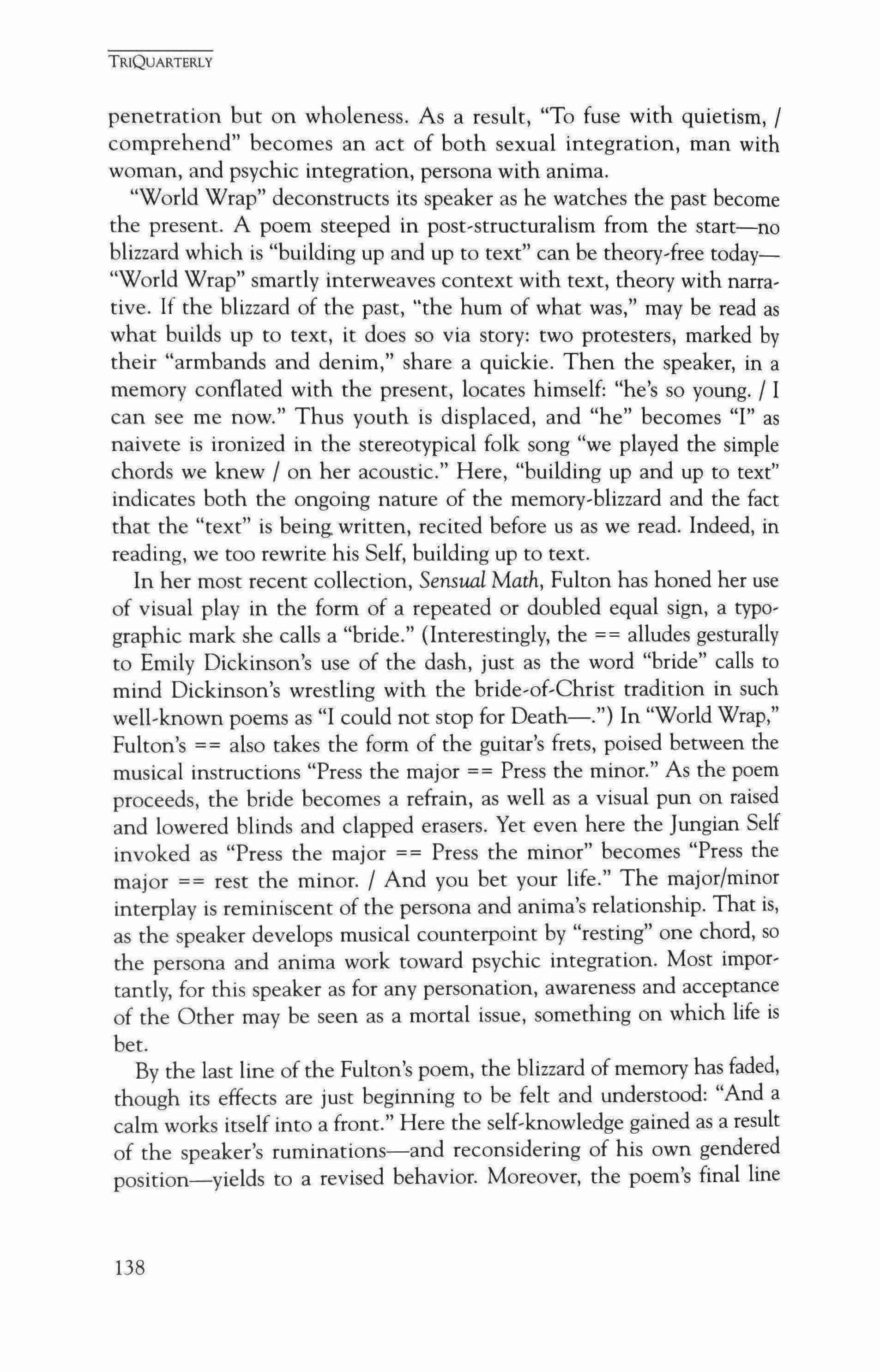
penetration but on wholeness. As a result, "To fuse with quietism, / comprehend" becomes an act of both sexual integration, man with woman, and psychic integration, persona with anima.
"World Wrap" deconstructs its speaker as he watches the past become the present. A poem steeped in post-structuralism from the start-no blizzard which is "building up and up to text" can be theory-free today"World Wrap" smartly interweaves context with text, theory with narrative. If the blizzard of the past, "the hum of what was," may be read as what builds up to text, it does so via story: two protesters, marked by their "armbands and denim," share a quickie. Then the speaker, in a memory conflated with the present, locates himself: "he's so young. / I can see me now." Thus youth is displaced, and "he" becomes "I" as naivete is ironized in the stereotypical folk song "we played the simple chords we knew / on her acoustic." Here, "building up and up to text" indicates both the ongoing nature of the memory-blizzard and the fact that the "text" is being written, recited before us as we read. Indeed, in reading, we too rewrite his Self, building up to text.
In her most recent collection, Sensual Math, Fulton has honed her use of visual play in the form of a repeated or doubled equal sign, a typographic mark she calls a "bride." (Interestingly, the alludes gesturally to Emily Dickinson's use of the dash, just as the word "bride" calls to mind Dickinson's wrestling with the bride-of-Christ tradition in such well-known poems as "I could not stop for Death-.") In "World Wrap," Fulton's also takes the form of the guitar's frets, poised between the musical instructions "Press the major Press the minor." As the poem proceeds, the bride becomes a refrain, as well as a visual pun on raised and lowered blinds and clapped erasers. Yet even here the Jungian Self invoked as "Press the major Press the minor" becomes "Press the major == rest the minor. / And you bet your life." The major/minor interplay is reminiscent of the persona and anima's relationship. That is, as the speaker develops musical counterpoint by "resting" one chord, so the persona and anima work toward psychic integration. Most importantly, for this speaker as for any personation, awareness and acceptance of the Other may be seen as a mortal issue, something on which life is bet.
By the last line of the Fulton's poem, the blizzard of memory has faded, though its effects are just beginning to be felt and understood: "And a calm works itself into a front." Here the self-knowledge gained as a result of the speaker's ruminations-and reconsidering of his own gendered position-yields to a revised behavior. Moreover, the poem's final line
TRIQUARTERLY
138

reinforces what we have learned to revise: the personation rewrites itself as the past blizzard speaks through the present calm, building up and up to a new "front," a new text, a new action. Fulton's poem reassures us that the past is always in revision, and that the cross-gendered poem need not be bound, in fact cannot be bound, by the gender binary.
The issues of diction and text-making are also central to Jacqueline Osherow's "Moses in Paradise." In the previous poems considered here, a single voice speaks and determines narrative credibility. At its most complex this voice speaks to itself, generating a psychic discourse. In "Moses in Paradise," the singular voice becomes plural voices, as the speaker enunciates more than his own part; the result is a social discourse best described by Mikhail Bakhtin's term "heteroglossia," the intersection and interweaving of different languages and dictions to make a text [Bakhtin 262]. The text made here, however, is unlike that of "World Wrap": rather than "building up and up," Osherow recharts Biblical and thus literary history. As a result, in a sense, several "texts" are created in "Moses in Paradise."
Although the poem begins with lyricism, with an epigraph from Exodus 24:10, the episodic narrative which follows creates a storyteller's tale. The combination of chatty diction and terza rima asserts a literary legacy, as the colloquial and the prosodic declare an awareness of and commitment to the history of English verse. However, what Osherow embodies in "Moses in Paradise," most notably, is not an essay on versification but a synthesis of discourses; transcription and translation unite within the poem, brought together by the power of anecdote. Moreover, what the personation actively denies he passively creates; this is a Moses whose poetry shines, his protestations to the contrary.
Osherow's fundamental revision-and imaginative leap-in "Moses in Paradise" isto ascribe to Moses the epigraph's description of God's dais, rather than the song in Exodus 15:1-21 commonly known as Moses' Psalm. Traditional exegesis has concluded that the epigraph's reference to the "brickwork of sapphire" probably alludes to a Mesopotamian tilework of lapis lazuli which post-dated Exodus by several hundred years, rendering impossible Moses' authorship of the verse here [Cole 187; Childs 501 ff, 507]. Yet Osherow allows Moses this poetic fragment and he consequently sets his own poetic standard, a standard which he will attain only this once. Thus the bestowal of the epigraph is both an ars poetica and a comment upon the nature of poetic inspiration.
TRIQUARTERLY
139
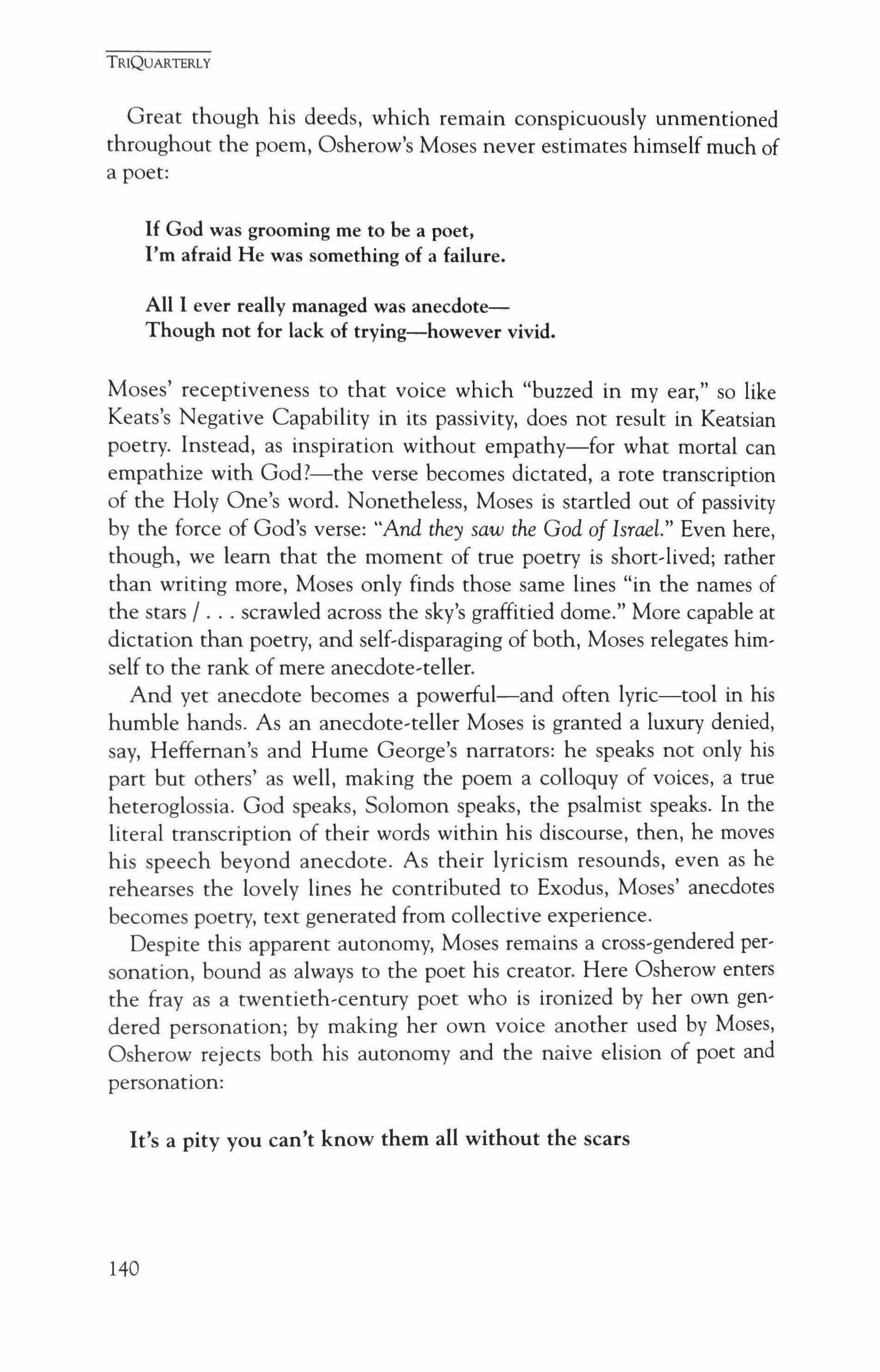
Great though his deeds, which remain conspicuously unmentioned throughout the poem, Osherow's Moses never estimates himself much of a poet:
If God was grooming me to be a poet, I'm afraid He was something of a failure.
All I ever really managed was anecdoteThough not for lack of trying-however vivid.
Moses' receptiveness to that voice which "buzzed in my ear," so like Keats's Negative Capability in its passivity, does not result in Keatsian poetry. Instead, as inspiration without empathy-for what mortal can empathize with God?-the verse becomes dictated, a rote transcription of the Holy One's word. Nonetheless, Moses is startled out of passivity by the force of God's verse: "And they saw the God of Israel." Even here, though, we learn that the moment of true poetry is short-lived: rather than writing more, Moses only finds those same lines "in the names of the stars / scrawled across the sky's graffitied dome." More capable at dictation than poetry, and self,disparaging of both, Moses relegates him, self to the rank of mere anecdote-teller,
And yet anecdote becomes a powerful-and often lyric-tool in his humble hands. As an anecdote,teller Moses is granted a luxury denied, say, Heffernan's and Hume George's narrators: he speaks not only his part but others' as well, making the poem a colloquy of voices, a true heteroglossia. God speaks, Solomon speaks, the psalmist speaks. In the literal transcription of their words within his discourse, then, he moves his speech beyond anecdote. As their lyricism resounds, even as he rehearses the lovely lines he contributed to Exodus, Moses' anecdotes becomes poetry, text generated from collective experience.
Despite this apparent autonomy, Moses remains a cross-gendered personation, bound as always to the poet his creator. Here Osherow enters the fray as a twentieth-century poet who is ironized by her own gendered personation; by making her own voice another used by Moses, Osherow rejects both his autonomy and the naive elision of poet and personation:
It's a pity you can't know them all without the scars
TRIQUARTERLY
140

Of my slightly bumbling scribe's English translation (Etzem, you see, means itself, essence, bone); I found her working out the cantillation;
She'd stopped at my eight words, overthrown, So I had to use her, though her Hebrew's imprecise And you can't say in English: heaven's bone
Which is what I meant to get at: the eeriness
Of its solid and unyielding white interior •.•
Although linked to Moses' self-deprecation, as another "slightly bum, bling scribe," Osherow's textual task here differs fundamentally from his. Whereas Moses remains constrained by the problem of transcription, Osherow must face the problem of translation: the former, a matter of rote, requires accurate recording of that buzzing in the ear; the latter involves interpretation, the choosing of meaning. Not incidentally, transcription generates context, and literally dictates context-since, for example, God's words are their own source. Translation adapts to pre-existing language, the translator compelled to fit the right shade of meaning within a context. Most provocatively, "Moses in Paradise" twists as it explores this issue of translation.
From the epigraph, and the moment when Moses speaks in English through Osherow's "imprecise" translation from the Hebrew, to later, when Moses speaks of "using" the poet, Osherow is apparently manipulated by her own poem. As Moses critiques Osherow's translation he does so in words she has written. The ventriloquism becomes self-reflexive: the poem declares itself to be about writing, and the vagaries of choice. Nevertheless, in translating the epigraph, Osherow must choose the clearest English phrasing: "and the sky itself for purity." As a translator, the poet aspires to the best interpretation within the context. As a poet, the translator aspires to create a new work self-contained and autonomous. Thus, from the outset, we find a multivalent act of creation, as the poem dramatizes the various kinds of thinking simultaneously required by its own composition.
Intriguingly, the translated epigraph also lacks context, off-set as it is from the poem. Yet Osherow the poet finds a way to move beyond the limitations of context. This occurs, of course, because the poem is not spoken by a translator, but by an anecdote,teller. Anecdote allows Moses to annotate chattily the necessarily limited translation: when he
TRIQUARTERLY
141
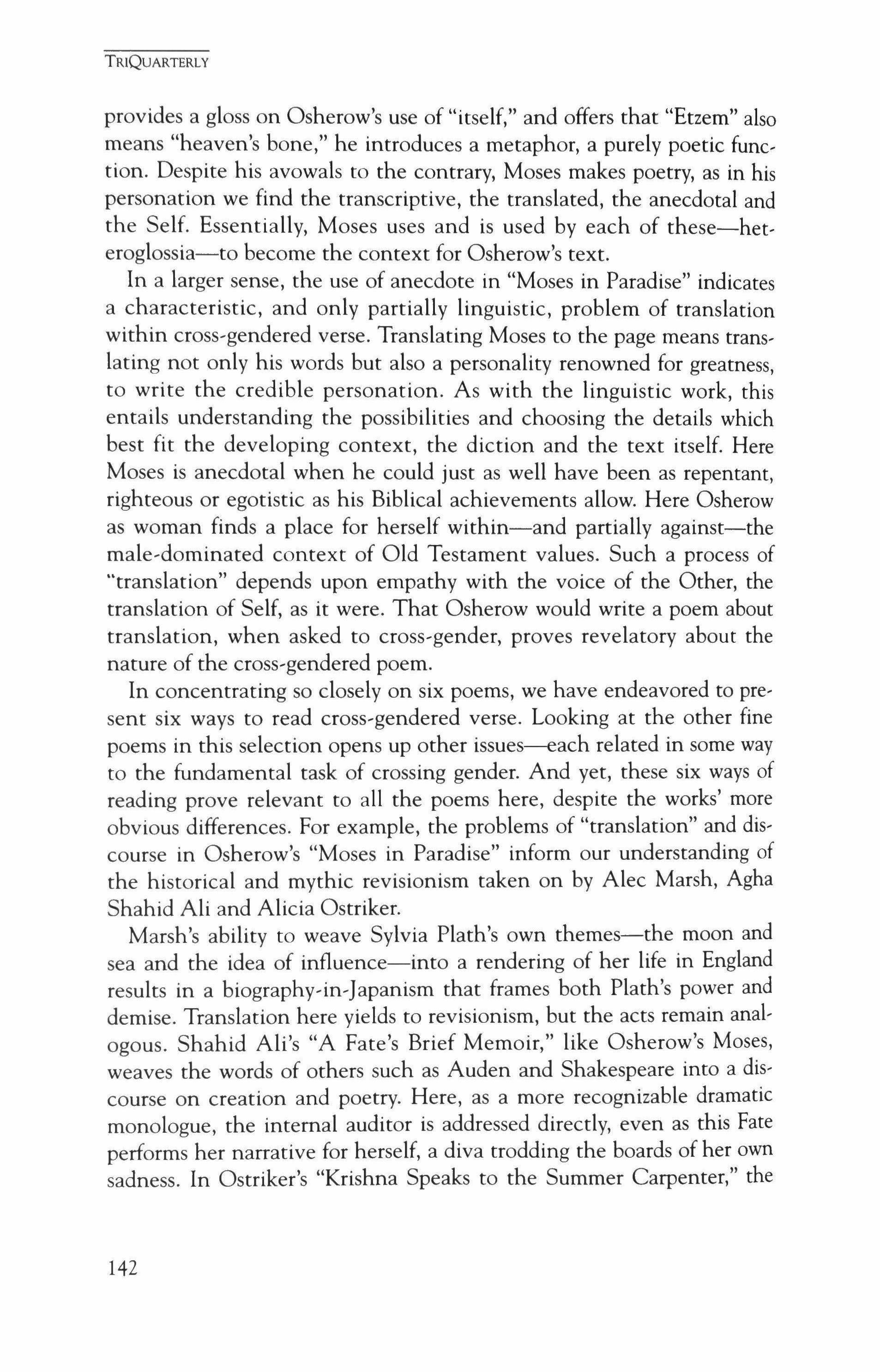
provides a gloss on Osherow's use of "itself," and offers that "Etzem" also means "heaven's bone," he introduces a metaphor, a purely poetic function. Despite his avowals to the contrary, Moses makes poetry, as in his personation we find the transcriptive, the translated, the anecdotal and the Self. Essentially, Moses uses and is used by each of these-heteroglossia-to become the context for Osherow's text.
In a larger sense, the use of anecdote in "Moses in Paradise" indicates a characteristic, and only partially linguistic, problem of translation within cross-gendered verse. Translating Moses to the page means translating not only his words but also a personality renowned for greatness, to write the credible personation. As with the linguistic work, this entails understanding the possibilities and choosing the details which best fit the developing context, the diction and the text itself. Here Moses is anecdotal when he could just as well have been as repentant, righteous or egotistic as his Biblical achievements allow. Here Osherow as woman finds a place for herself within-and partially against-the male-dominated context of Old Testament values. Such a process of "translation" depends upon empathy with the voice of the Other, the translation of Self, as it were. That Osherow would write a poem about translation, when asked to cross-gender, proves revelatory about the nature of the cross-gendered poem.
In concentrating so closely on six poems, we have endeavored to present six ways to read cross-gendered verse. Looking at the other fine poems in this selection opens up other issues--each related in some way to the fundamental task of crossing gender. And yet, these six ways of reading prove relevant to all the poems here, despite the works' more obvious differences. For example, the problems of "translation" and discourse in Osherow's "Moses in Paradise" inform our understanding of the historical and mythic revisionism taken on by Alec Marsh, Agha Shahid Ali and Alicia Ostriker.
Marsh's ability to weave Sylvia Plath's own themes-the moon and sea and the idea of influence-into a rendering of her life in England results in a biography-in-japanism that frames both Plath's power and demise. Translation here yields to revisionism, but the acts remain analogous. Shahid Ali's "A Fate's Brief Memoir," like Osherow's Moses, weaves the words of others such as Auden and Shakespeare into a discourse on creation and poetry. Here, as a more recognizable dramatic monologue, the internal auditor is addressed directly, even as this Fate performs her narrative for herself, a diva trodding the boards of her own sadness. In Ostriker's "Krishna Speaks to the Summer Carpenter," the
TRIQUARTERLY
142
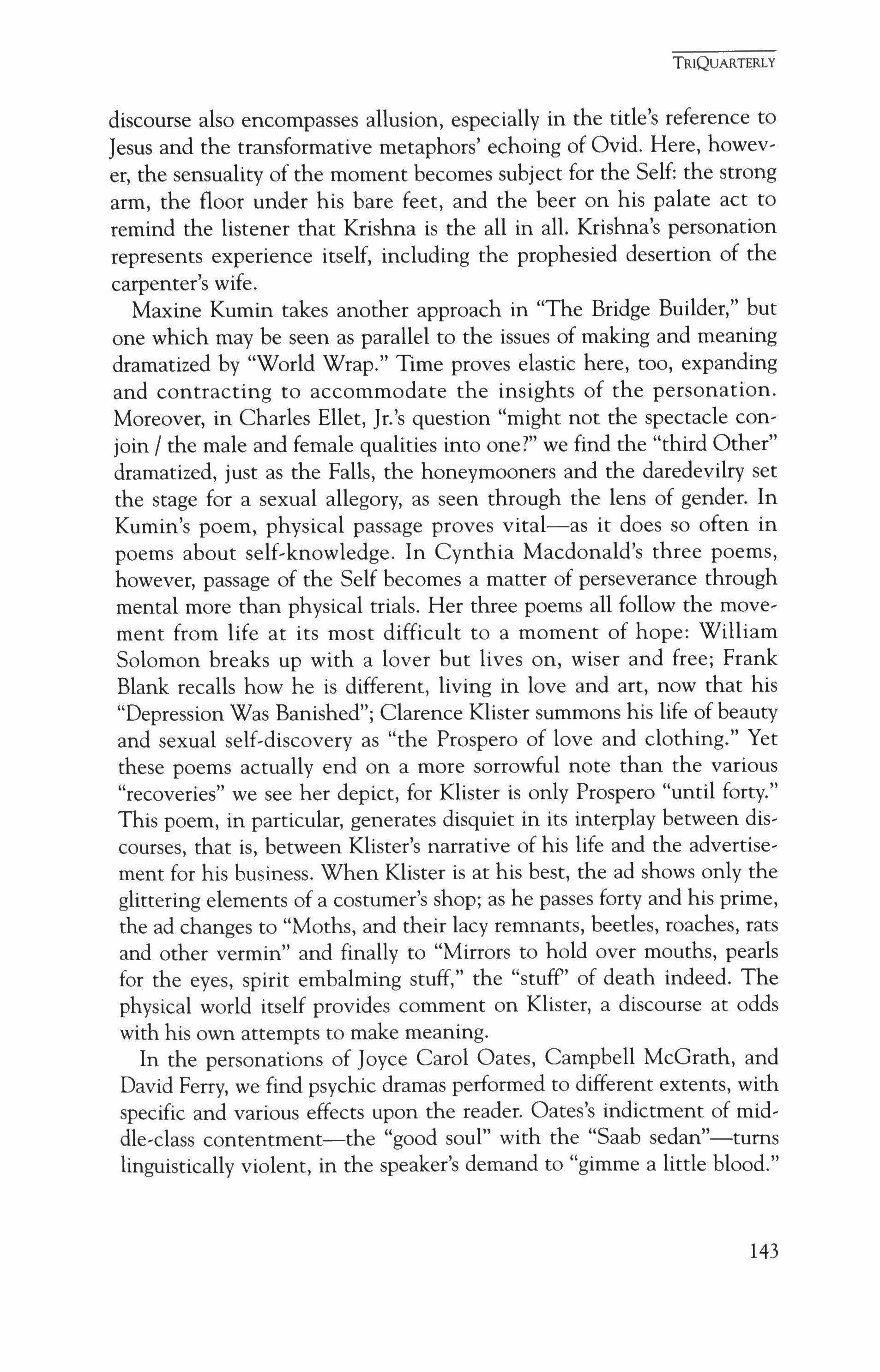
discourse also encompasses allusion, especially in the title's reference to Jesus and the transformative metaphors' echoing of Ovid. Here, however, the sensuality of the moment becomes subject for the Self: the strong arm, the floor under his bare feet, and the beer on his palate act to remind the listener that Krishna is the all in all. Krishna's personation represents experience itself, including the prophesied desertion of the carpenter's wife.
Maxine Kumin takes another approach in "The Bridge Builder," but one which may be seen as parallel to the issues of making and meaning dramatized by "World Wrap." Time proves elastic here, too, expanding and contracting to accommodate the insights of the personation. Moreover, in Charles Ellet, Jr.'s question "might not the spectacle conjoin / the male and female qualities into one?" we find the "third Other" dramatized, just as the Falls, the honeymooners and the daredevilry set the stage for a sexual allegory, as seen through the lens of gender. In Kurnin's poem, physical passage proves vital-as it does so often in poems about self-knowledge. In Cynthia Macdonald's three poems, however, passage of the Self becomes a matter of perseverance through mental more than physical trials. Her three poems all follow the movement from life at its most difficult to a moment of hope: William Solomon breaks up with a lover but lives on, wiser and free; Frank Blank recalls how he is different, living in love and art, now that his "Depression Was Banished"; Clarence Klister summons his life of beauty and sexual self-discovery as "the Prospero of love and clothing." Yet these poems actually end on a more sorrowful note than the various "recoveries" we see her depict, for Klister is only Prospero "until forty." This poem, in particular, generates disquiet in its interplay between discourses, that is, between Klister's narrative of his life and the advertisement for his business. When Klister is at his best, the ad shows only the glittering elements of a costumer's shop; as he passes forty and his prime, the ad changes to "Moths, and their lacy remnants, beetles, roaches, rats and other vermin" and finally to "Mirrors to hold over mouths, pearls for the eyes, spirit embalming stuff," the "stuff' of death indeed. The physical world itself provides comment on Klister, a discourse at odds with his own attempts to make meaning.
In the personations of Joyce Carol Oates, Campbell McGrath, and David Ferry, we find psychic dramas performed to different extents, with specific and various effects upon the reader. Oates's indictment of middle-class contentment-the "good soul" with the "Saab sedan"-tums linguistically violent, in the speaker's demand to "gimme a little blood."
TRIQUARTERLY
143
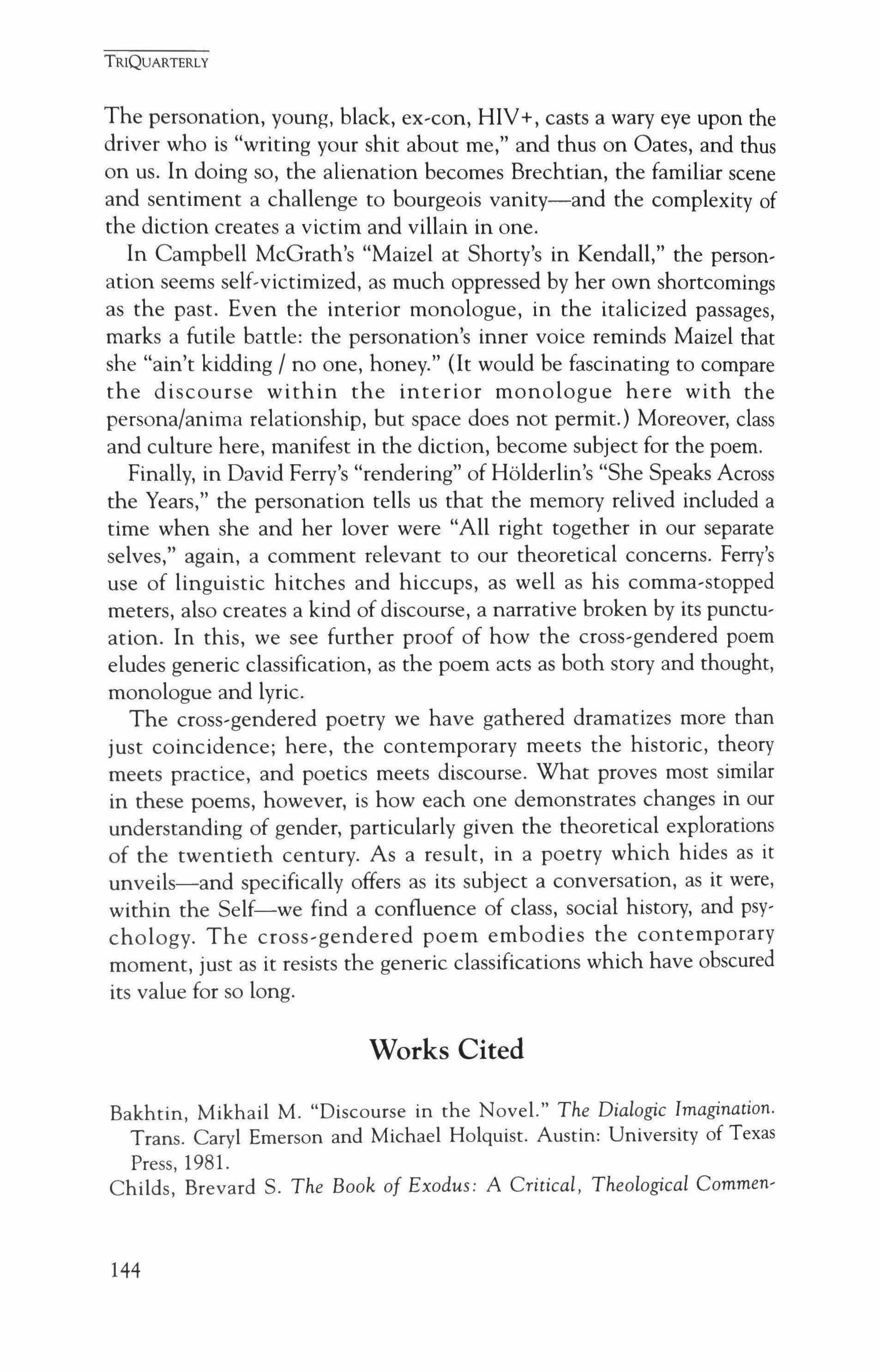
The personation, young, black, ex-con, HIV+, casts a wary eye upon the driver who is "writing your shit about me," and thus on Oates, and thus on us. In doing so, the alienation becomes Brechtian, the familiar scene and sentiment a challenge to bourgeois vanity-and the complexity of the diction creates a victim and villain in one.
In Campbell McGrath's "Maizel at Shorty's in Kendall," the personation seems self-victimized, as much oppressed by her own shortcomings as the past. Even the interior monologue, in the italicized passages, marks a futile battle: the personation's inner voice reminds Maizel that she "ain't kidding / no one, honey." (It would be fascinating to compare the discourse within the interior monologue here with the persona/anima relationship, but space does not permit.) Moreover, class and culture here, manifest in the diction, become subject for the poem.
Finally, in David Ferry's "rendering" of Holderlin's "She Speaks Across the Years," the personation tells us that the memory relived included a time when she and her lover were "All right together in our separate selves," again, a comment relevant to our theoretical concerns. Ferry's use of linguistic hitches and hiccups, as well as his comma-stopped meters, also creates a kind of discourse, a narrative broken by its punctuation. In this, we see further proof of how the cross-gendered poem eludes generic classification, as the poem acts as both story and thought, monologue and lyric.
The cross-gendered poetry we have gathered dramatizes more than just coincidence; here, the contemporary meets the historic, theory meets practice, and poetics meets discourse. What proves most similar in these poems, however, is how each one demonstrates changes in our understanding of gender, particularly given the theoretical explorations of the twentieth century. As a result, in a poetry which hides as it unveils-and specifically offers as its subject a conversation, as it were, within the Self-we find a confluence of class, social history, and psychology. The cross-gendered poem embodies the contemporary moment, just as it resists the generic classifications which have obscured its value for so long.
Works Cited
Bakhtin, Mikhail M. "Discourse in the Novel." The Dialogic Imagination. Trans. Caryl Emerson and Michael Holquist. Austin: University of Texas Press, 1981.
Childs, Brevard S. The Book of Exodus: A Critical, Theological Commen-
TRIQUARTERLY
144

cary. Philadelphia: Westminster Press, 1974. Cole, R. Alan. Exodus: An Introduction and Commentary. Downers Grove, IL: Inter-Varsity Press, 1973.
Garber, Marjorie. Vested Interests: Cross-Dressing and Cultural Anxiety. New York: Routledge, Chapman, Hall, 1992. Hollander, John. "Occasions & Inscriptions." Poetry Pilot: The Newsletter of the Academy ofAmerican Poets. Winter 1994-95: 6-7.
[ung, Carl Gustav. Mysterium Coniunctionis. 2nd ed. London: Routledge & Kegan Paul, Ltd. 1970. Vol. 14 of The Collected Works ofC. G. lung. 19 vols. 1953-1970.
-. Symbols of Transformation. 2nd ed. London: Routledge & Kegan Paul, Ltd. 1967. Vol. 5 of The Collected Works ofC. G. lung. 19 vols. 1953-1970.
TRIQUARTERLY
145
The Sibyl
Carl Phillips
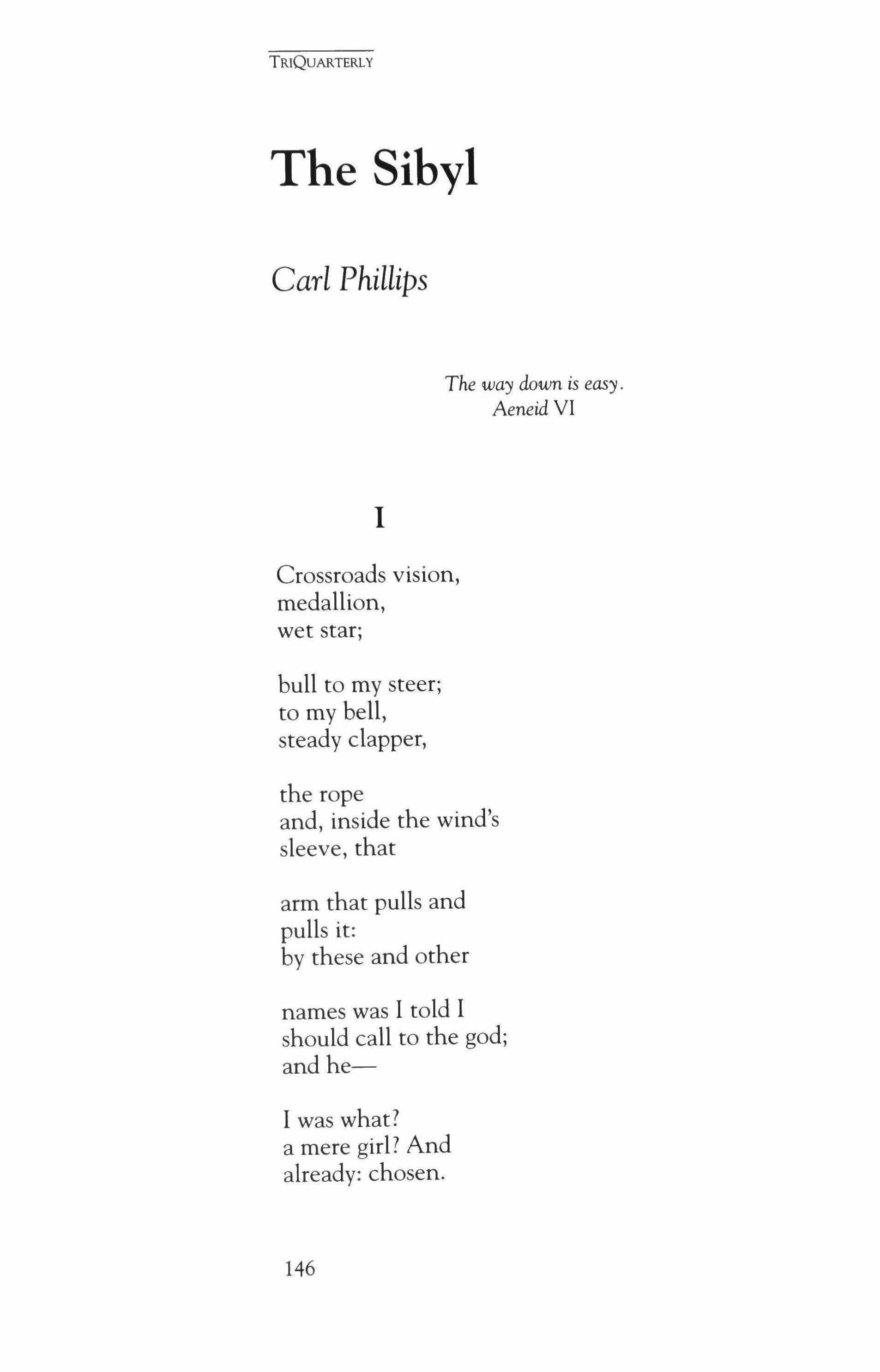
way down is easy.
ICrossroads vision, medallion, wet star; bull to my steer; to my bell, steady clapper, the rope and, inside the wind's sleeve, that arm that pulls and pulls it: by these and other names was I told I should call to the god; and heI was what? a mere girl? And already: chosen.
TRIQUARTERLY
The
Aeneid VI
146
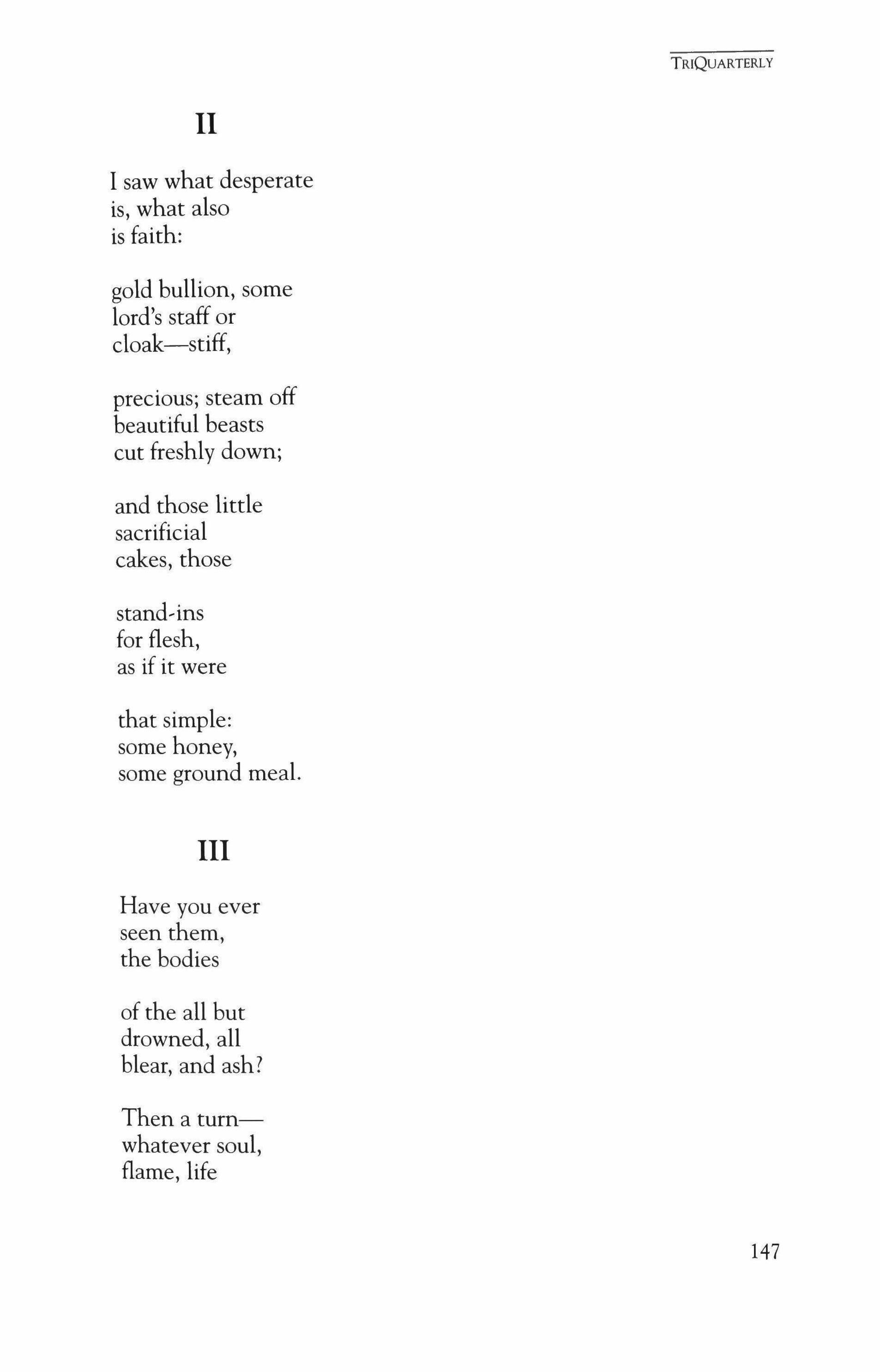
II
I saw what desperate is, what also is faith: gold bullion, some lord's staff or cloak-stiff, precious; steam off beautiful beasts cut freshly down; and those little sacrificial cakes, those stand-ins for flesh, as if it were that simple: some honey, some ground meal.
III
Have you ever seen them, the bodies of the all but drowned, all blear, and ash?
Then a tumwhatever soul, flame, life
TRIQUARTERLY
147
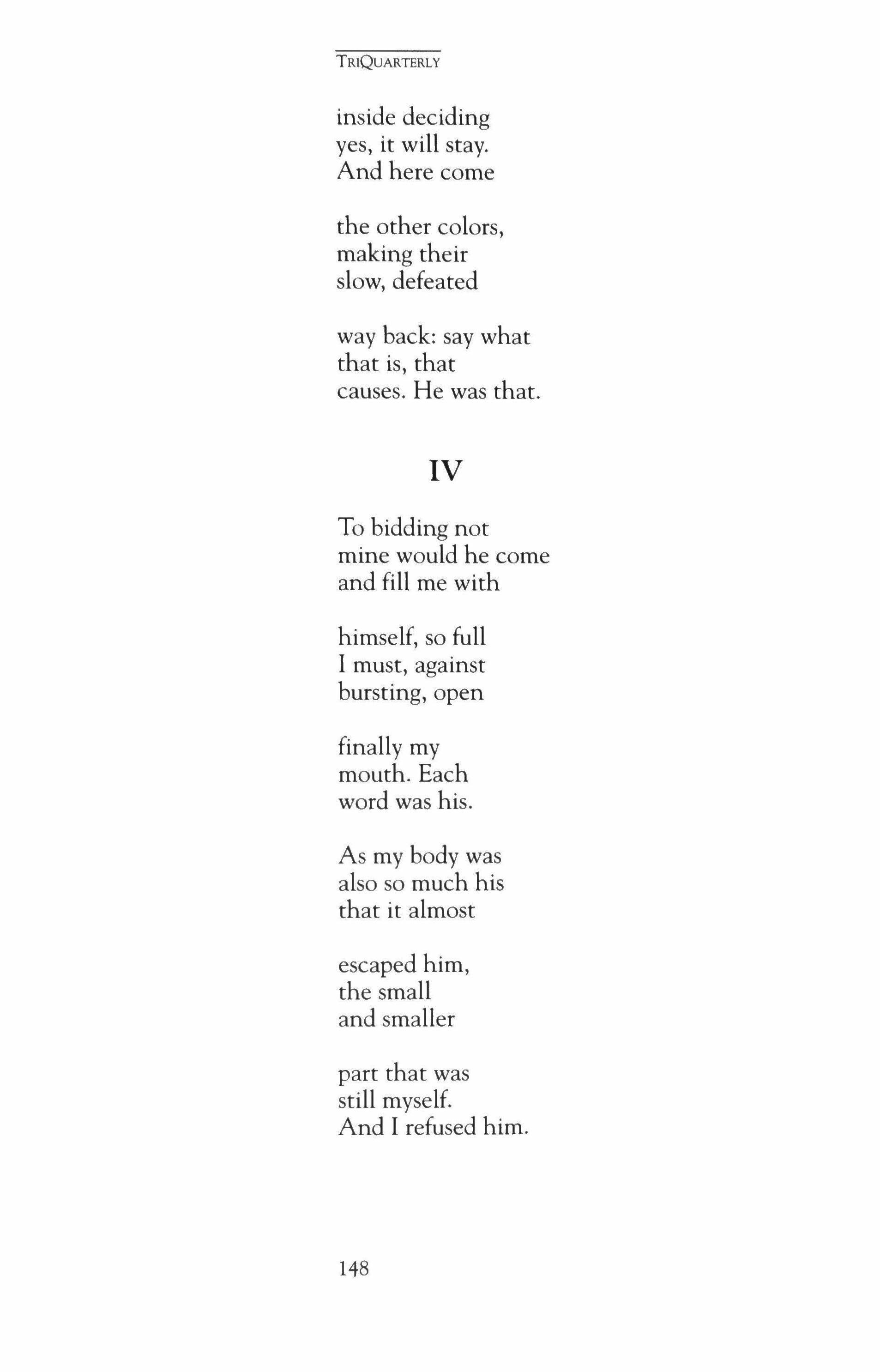
inside deciding yes, it will stay. And here come the other colors, making their slow, defeated way back: say what that is, that causes. He was that.
IV
To bidding not mine would he come and fill me with himself, so full I must, against bursting, open finally my mouth. Each word was his.
As my body was also so much his that it almost escaped him, the small and smaller part that was still myself. And I refused him.
TRIQUARTERLY
148

VNo damage. No blame. Instead, I was to name any gift. As many as are the grains ofsand one hand might hold, so many years let me live. When he leftnothing different at first. On the floor, the usual clatter of leaves: brown, cracked with age, the weight of prophecy upon them. I looked at my hands. Then the leaves. VI
There is a third gate, neither ivory, nor horn: the flesh, what cannot help but fail, come bone, corne shine. What is history to myth? Not the tree whose
TRIQUARTERLY
149

leafless branches make a crown within which, this morning, nine birds singbut the birds, that take as done, as granted, all that sky, his mouth, blue hole I am falling through.
TRIQUARTERLY
150
Hephaestus Alone
Linda Gregg
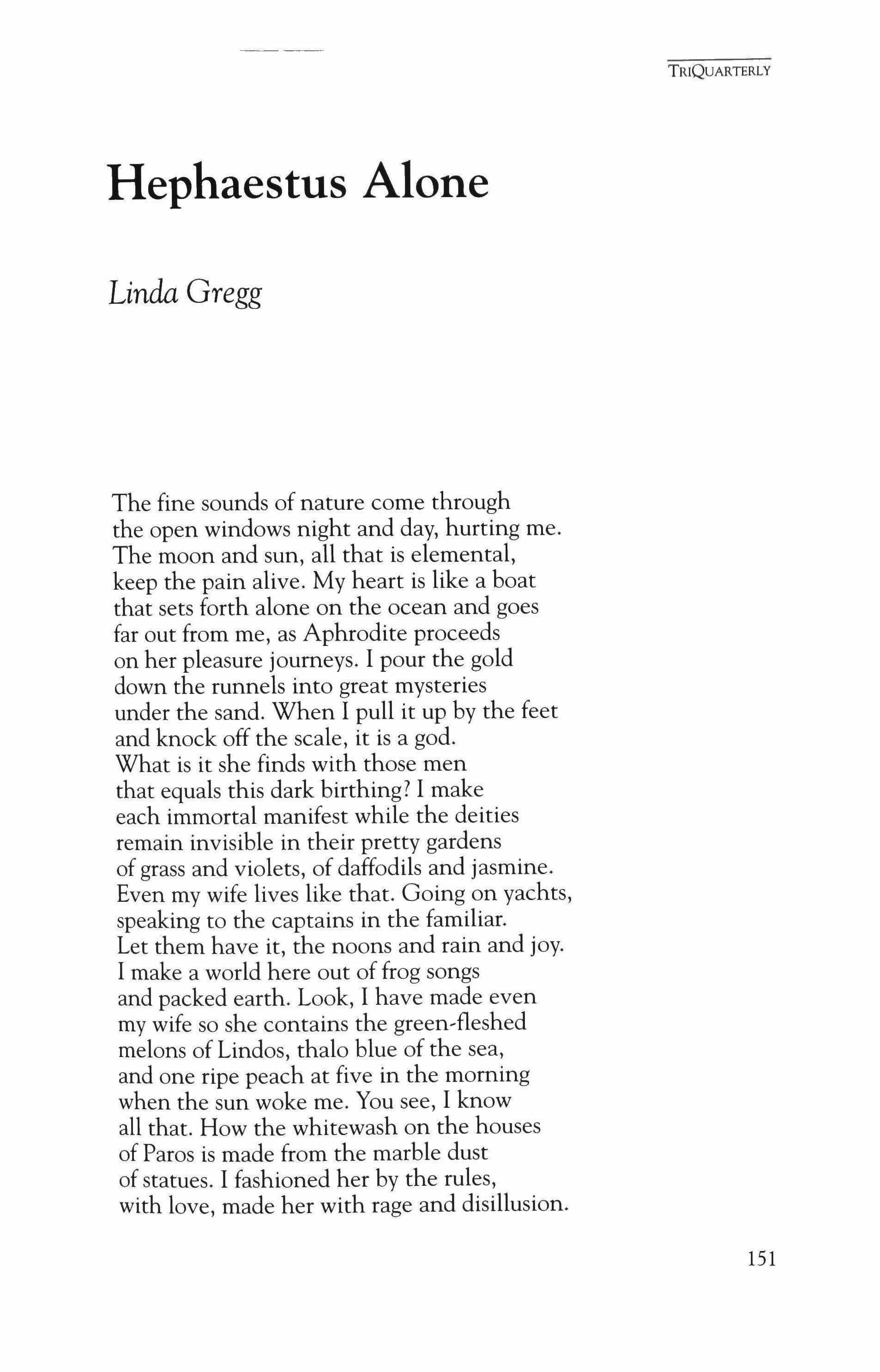
The fine sounds of nature come through the open windows night and day, hurting me. The moon and sun, all that is elemental, keep the pain alive. My heart is like a boat that sets forth alone on the ocean and goes far out from me, as Aphrodite proceeds on her pleasure journeys. I pour the gold down the runnels into great mysteries under the sand. When I pull it up by the feet and knock off the scale, it is a god. What is it she finds with those men that equals this dark birthing? I make each immortal manifest while the deities remain invisible in their pretty gardens of grass and violets, of daffodils and jasmine. Even my wife lives like that. Going on yachts, speaking to the captains in the familiar. Let them have it, the noons and rain and joy. I make a world here out of frog songs and packed earth. Look, I have made even my wife so she contains the green-fleshed melons of Lindos, thalo blue of the sea, and one ripe peach at five in the morning when the sun woke me. You see, I know all that. How the whitewash on the houses of Paros is made from the marble dust of statues. I fashioned her by the rules, with love, made her with rage and disillusion.
TRIQUARTERLY
151
The Muse
 Michael Heffernan
Michael Heffernan
I'd wake up in the middle of the night to hear his fingers thumping on the bedpost counting out lines to put into a poem about my face, my breasts, my inner thigh. He loved the way I smelled, he loved my feet, he loved to hear me peeing in the morning and often lingered by the bathroom door to listen while I made my water music. And he had other women on his mindone in particular, some idiot he took to Paris twenty years ago who had a song she sang him that he sang alone out in the yard under a tree where he would often sit in summertime staring at clouds and dreaming about the rain streaking the windows of some cheap hotel. Sometimes the poems he said he wrote for me had someone else's smell all over them. I didn't say a word. I didn't care. It wasn't what I wanted anyway. I didn't even want him in my bed. The love he thought he gave me was a lie he told himself. I wanted toys and money, plenty of things to play with, and no poems. If I could do it, I would climb that tree when he was out there singing. I'd give him rain. I'd make him think he'd died and gone to Paris.
TRIQUARTERLY
152
I Pushed Her and She Fell Down
Diana Hume George

I pushed her and she fell down. Parts of me get stripped away each time I change directions. It hurts me terribly. This time parts of someone else got stripped, and I am sorry for that, but I do not regret, I've done nothing wrong, no, nothing whatsoever, except to endure her so long.
I pushed her, I admit, and she fell down right there where she was talking and talking. I told her to stop, I warned her to let it go now, leave me alone, don't keep at me like she does when she decides it's time to work it out. She always decides this when I have no words to match hers as they come weltering out her mouth, that mouth coming at me with all her words, the ones I know she will say, and if I am right, there is no need for her to say them, things like This has gone on too long, and You've got to hear me now, when Christ, I've heard her all along,
TRIQUARTERLY
153
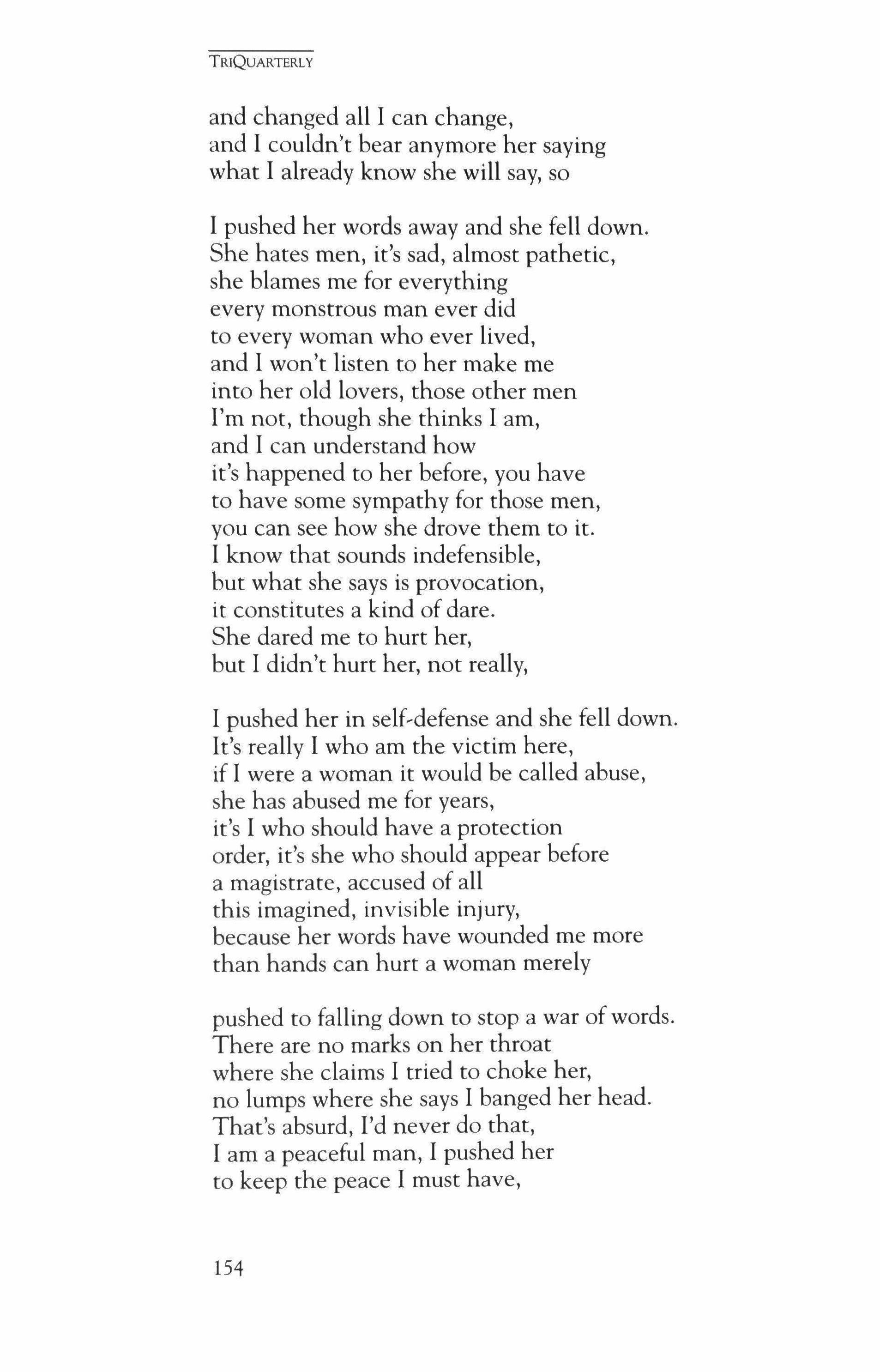
and changed all I can change, and I couldn't bear anymore her saying what I already know she will say, so
I pushed her words away and she fell down. She hates men, it's sad, almost pathetic, she blames me for everything every monstrous man ever did to every woman who ever lived, and I won't listen to her make me into her old lovers, those other men I'm not, though she thinks I am, and I can understand how it's happened to her before, you have to have some sympathy for those men, you can see how she drove them to it. I know that sounds indefensible, but what she says is provocation, it constitutes a kind of dare. She dared me to hurt her, but I didn't hurt her, not really,
I pushed her in self-defense and she fell down. It's really I who am the victim here, if I were a woman it would be called abuse, she has abused me for years, it's I who should have a protection order, it's she who should appear before a magistrate, accused of all this imagined, invisible injury, because her words have wounded me more than hands can hurt a woman merely
pushed to falling down to stop a war of words. There are no marks on her throat where she claims I tried to choke her, no lumps where she says I banged her head. That's absurd, I'd never do that, I am a peaceful man, I pushed her to keep the peace I must have,
TRIQUARTERLY
154
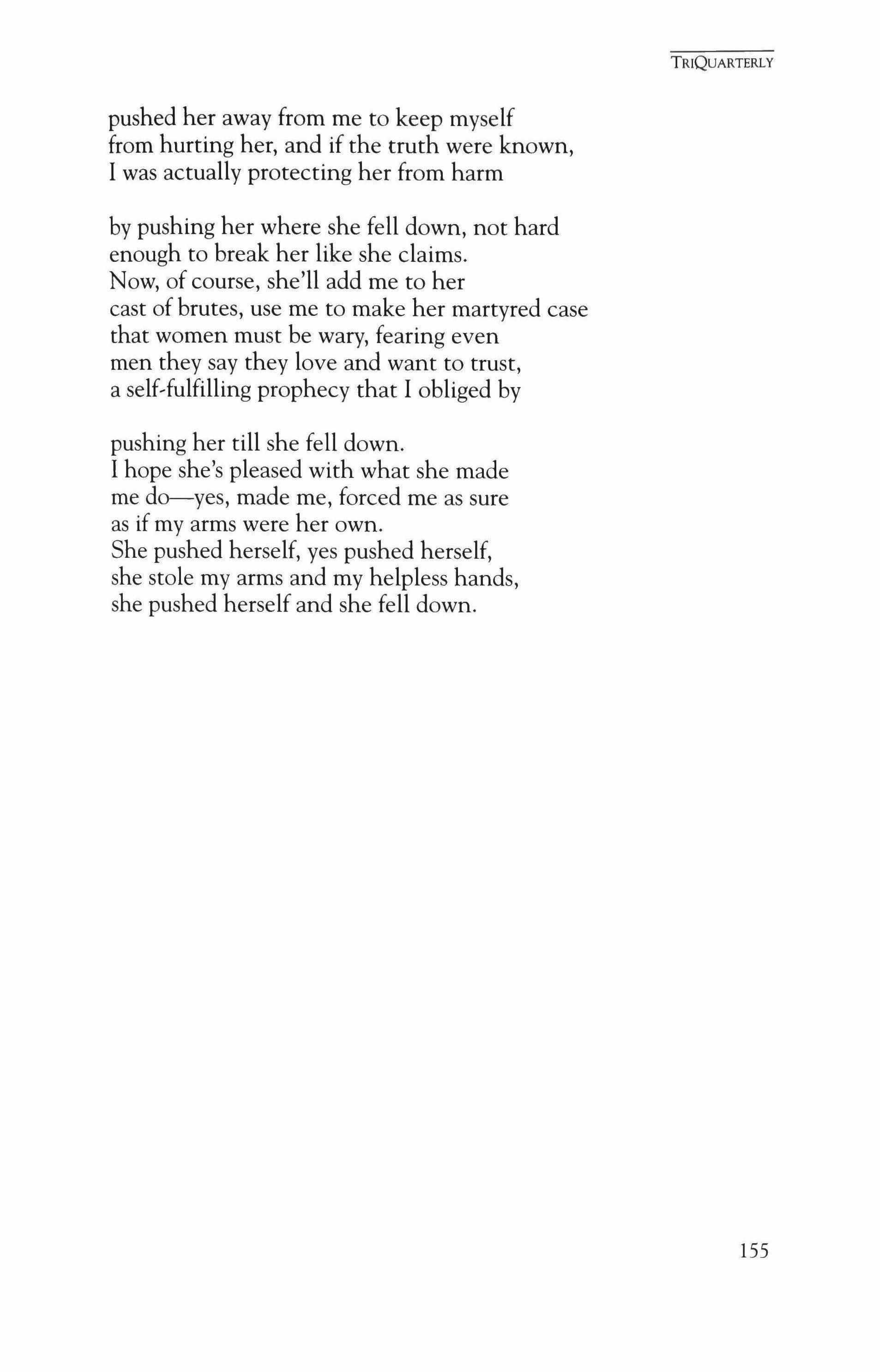
pushed her away from me to keep myself from hurting her, and if the truth were known, 1 was actually protecting her from harm by pushing her where she fell down, not hard enough to break her like she claims. Now, of course, she'll add me to her cast of brutes, use me to make her martyred case that women must be wary, fearing even men they say they love and want to trust, a self-fulfilling prophecy that I obliged by pushing her till she fell down. 1 hope she's pleased with what she made me do-yes, made me, forced me as sure as if my arms were her own. She pushed herself, yes pushed herself, she stole my arms and my helpless hands, she pushed herself and she fell down.
TRIQUARTERLY 155
Three Poems
 Cynthia Macdonald
Cynthia Macdonald
How William Solomon Invokes Free Will
It's all over. It didn't work. Will never work. All water under the dam. Because, you see, what you said you wanted and what I thought you said you wanted were not the same. Our overalls were: typical blue denim, good for the work at hand. But I couldn't get the wheelbarrow to wheel, which should have been an omen-everything to do with circularity is. There must have been a fault in the geometry or in the earth's foundation. Even a fault corrected changes the geography, affects cement. There is something subversive in the wheel's fixation. Something too intransigent. But you, singing among the vivid greens of tropical plants, voracious orchids, genital-pink flowers, your lunar-moth sleeves, your long hair flowing, had easily turned away once it happened.
Correction: once you told me it had happened. I, fixed on circuitry, was watching for the first cracks to appear. It was too late to fix them, the whole would certainly give way. I felt a little thrill of pleasure contemplating what would be immersed. But did not wish to drown, myself. So, I began my solitary building, hoping there was time before the flood. There was. Diluted salty seas stretch out. The tides are weakened although the sheets are often full of wind: free will.
TRIQUARTERLY
156
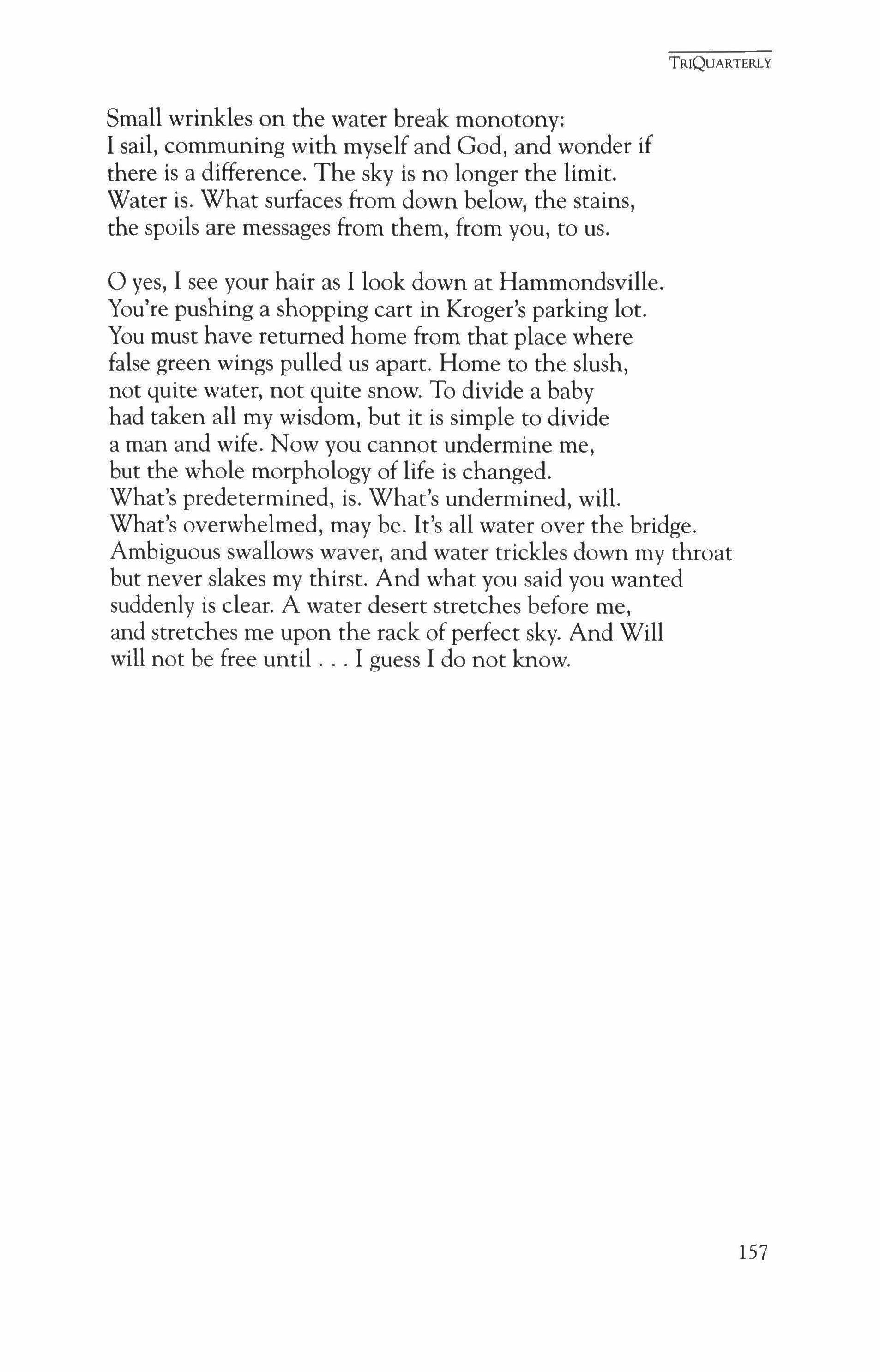
Small wrinkles on the water break monotony: I sail, communing with myself and God, and wonder if there is a difference. The sky is no longer the limit. Water is. What surfaces from down below, the stains, the spoils are messages from them, from you, to us.
o yes, I see your hair as I look down at Hammondsville. You're pushing a shopping cart in Kroger's parking lot. You must have returned home from that place where false green wings pulled us apart. Home to the slush, not quite water, not quite snow. To divide a baby had taken all my wisdom, but it is simple to divide a man and wife. Now you cannot undermine me, but the whole morphology of life is changed. What's predetermined, is. What's undermined, will. What's overwhelmed, may be. It's all water over the bridge. Ambiguous swallows waver, and water trickles down my throat but never slakes my thirst. And what you said you wanted suddenly is clear. A water desert stretches before me, and stretches me upon the rack of perfect sky. And Will will not be free until I guess I do not know.
TRIQUARTERLY
157
Frank Blank Whose Depression
Was Banished

How have I changed? Let me count.
I look at garbage piling up to overflow the can, and my disgust translates to action.
I need to rise from my chair to get my spectacles, which I really cannot be without; so I dress and go downtown to see Aida.
My frankincense candle exhales mirth into my room.
My easel once the emblem of blank, is now at ease supporting canvases.
I want love, but instead of watching Phil, where other people who want love tell how they don't have it, I go over to see Lila, buying her namesake flower on the way and, when she opens the door, I feel my heart's strong beat. My prick's, too.
I tell my Doctor he's a prick because he told me not to call him every day when I was only three weeks past my triple bypass. And read him The Bride of Frankenstein: "There she stands in all her seamed glory."
I have always been frank. Too frank, perhaps. A trait preserved to my detriment like the French keeping language pure. Like the Germans munching their huge sausages no matter how heavy they are. Perhaps Burt would have served me better. No: too much like Blurt. See: I have coherent thoughts once more.
Before, this would have drained me to my armchair for weeks. It all began in 1929, just after the crash. The sound of dishes hurled against plaster. How many years was I this way? I could not speak of it to Father.
But now my passion's put to use. Alizarian Red, Pale Madders, Flake Cremnitz White, Vert Veronese, Yves Klein Blue, and, most of all, the blended Lilacs.
Black Lake specters and dread paralysis, all wiped away; not Paradise, not quite, but Frank Blue, Frank Grey, Frank White, Frank Green, Frank Rose, Frank Spectrums of Delight.
TRIQUARTERLY
158

The Great 14th Street Costume Company
Clarence Ernest Klister, Prop
Portia is wearing my black velvet robe with flap of taffeta, and red silk cap when she enters stage left.
I consider myselfKing of Delight, the Prospero of Clothing.
I am in costumes and accessories. My father was, and deemed his only son should follow him. As a child I wasn't sure I was, and would. Uncertainty for many years is like a lilac pall or caul; it seals you off from all you're doomed or blessed to be. And when it's slit you hardly know how to exist in unprotected air. You deem the world to be too dangerous, the only safety in the shop behind books or costumes.
Miss Cherry Blossom, Macbeth, Martha, Hermit ofHawaii, The Bells of Cornville, She Stoops to Conquer.
Father left me his realm. I have not kept it just the same as when he had it. Both art and commerce-this is both-must move along or fail.
I made a slogan to go with our name: "We Dress The Big Productions and the small." After all, the change from 1870 when he was born to 1901 when I was is like the difference between Millet and Monet. And even though I moved the shop uptown near R. H. Macy's, I kept the name my father gave it.
My sister is a painter of birds. I guess we both are steeped in plumage. My pansy cloak of purple silk with lilac and viola face invokes Klimt although its lining merges him with Munch. It is voluminous, encompassing. Especially when I wear the hood; I am both hid and opened out. Like actors. Like birds at rest or spreading out their wings. The flower's face, its beauty and its grace, reminds me of my mother who left when I was only twelve.
For boys and for the boys they carry in them when they's grown, the father is the brown-eyed one, the one they can't escape or fully understand. You can see through eyes of blue but not of brown. I never left Mama, but Father yes, I left him long before he died although he never knew. It was my secret.
TRIQUARTERLY
159

Make-up: Grease Paint, Stage Powders, Liners, Cold Cream, Burnt Cork, Mascaro, Spirit Gum.
My Uncle, though he was not really, would give me books. The difference between a book and theater is that one you must enter or it is baseless fabric, while the other stretches out its arms to embrace you. My father never made his own designs, but I did. How my name spread; the spotlight on me: goldencrown.
La Traviata, Act l. I based Violetta's gown on Winterhaller portraits. The bodice was dull cream-colored satin, the sleeves finished with a double layer of gold and cream floss fringe. Atop a foundation of parchment Peau de Soie, the gold organza skirt with silver paint on its reverse would shimmer in the lights. And sequin scatter. Like art.
Everything including undergarments, the little niceties ofdress, hair pieces, falls,wigs, bird heads, beast heads, large human heads for sale or rental.
My uncle brought me Death in Venice so I could give a name to what I knew I was. I was fourteen. Ariel.
Tights, trunk-hose, bombasted breeches, petticoat breeches; Tunics; Cross-garterings ofleather, rope, or golden thongs; Trousers of curious open work, pajama-like affairs which Paris wore on top ofMount Ida, the Gaulic ruffled brace, the black satin ofGeorge the Third-Beau Brummel's skin-tight trousers with slashes on the instep, Togas and all the amplitudes, the fullest being Oxford Bags.
Two lovers together, fit together to a T: such a tempest, such a storm of passion. I was King of Delight, the Prospero of love and clothing. Until forty. Der Rosenkavalier, Mourning Becomes Elektra, The Blue Angel. I am not sure exactly what went wrong. Inevitable falls? The wear of repetition?
Moths, and their lacy remnants, beetles, roaches, rats and other vermin and the patterns of their droppings.
How fortunate we are to live with flare and fame, with almost mastery and never know that they will melt into thin air: the Himalayas are too high for breath. I still design and have designs, but all the gold is dark, the silver, gray, reflecting nothing, though I do reflect.
TRIQUARTERLY
160

Mirrors to hold over mouths, pearls for the eyes, spirit embalming stuff·
There is a lot of life to come but seams come to nothing. Houppelandes, long all-enveloping garments with gaily foliated sleeves that hide what is at hand.
TRIQUARTERLY
161
The Bridge Builder
Maxine Kumin
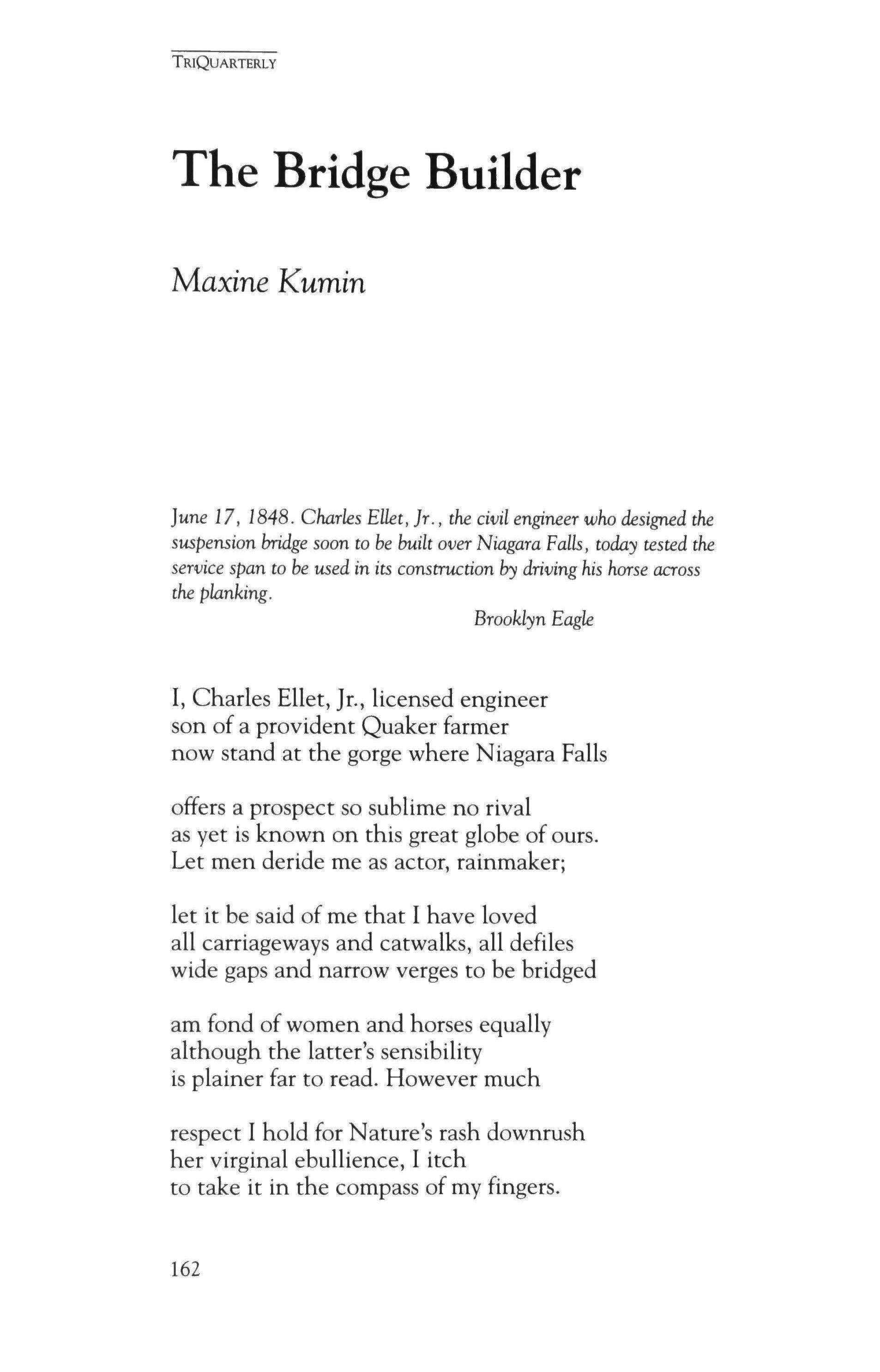
June 17, 1848. Charles Ellet, [r., the civil engineer who designed the suspension bridge soon to be built over Niagara Falls, today tested the service span to be used in its construction by driving his horse across the planking.
Brooklyn Eagle
I, Charles Ellet, j-, licensed engineer son of a provident Quaker farmer now stand at the gorge where Niagara Falls
offers a prospect so sublime no rival as yet is known on this great globe of ours. Let men deride me as actor, rainmaker;
let it be said of me that I have loved all carriageways and catwalks, all defiles wide gaps and narrow verges to be bridged
am fond of women and horses equally although the latter's sensibility is plainer far to read. However much
respect I hold for Nature's rash downrush her virginal ebullience, I itch to take it in the compass of my fingers.
TRIQUARTERLY
162

One does not "break" a horse, but wins its trust. With towers and cables, not brute trusses; with tact, not tug; suspension, not piled piers
I mean to overarch this wild splendor.
* * *
Let them think me odd who see as if asleep my silent self reflecting how to span the rapids boiling at my feet
two hundred forty feet below the cliff to be exact. An arrow from a bow?
A bird or a balloon? Why not a kite?
A kite could soar across the open rift! The public loves such deeds. I'll offer a prize, a decent sort of prize, say five gold dollars
to the first man or boy who sends his string to Canada. The placard up three days a local gap-toothed lad steps forth to win-
a widow's son, shy skinny Homan Walsh. He's going to outlive me. Will he grow up bold, race Thoroughbreds, get rich
performing acts of wild derring-do?
I don't at this point know, nor know that I'm to die a colonel in the Civil War
a hero slain leading a charge of rams -warships rigged to ram opponents' hullson The Big Muddy to rout the Confederates.
* * *
Backward looks are licensed. To look forward isn't done; is not acceptable. But give me leave to leap beyond the date
TRIQUARTERLY 163
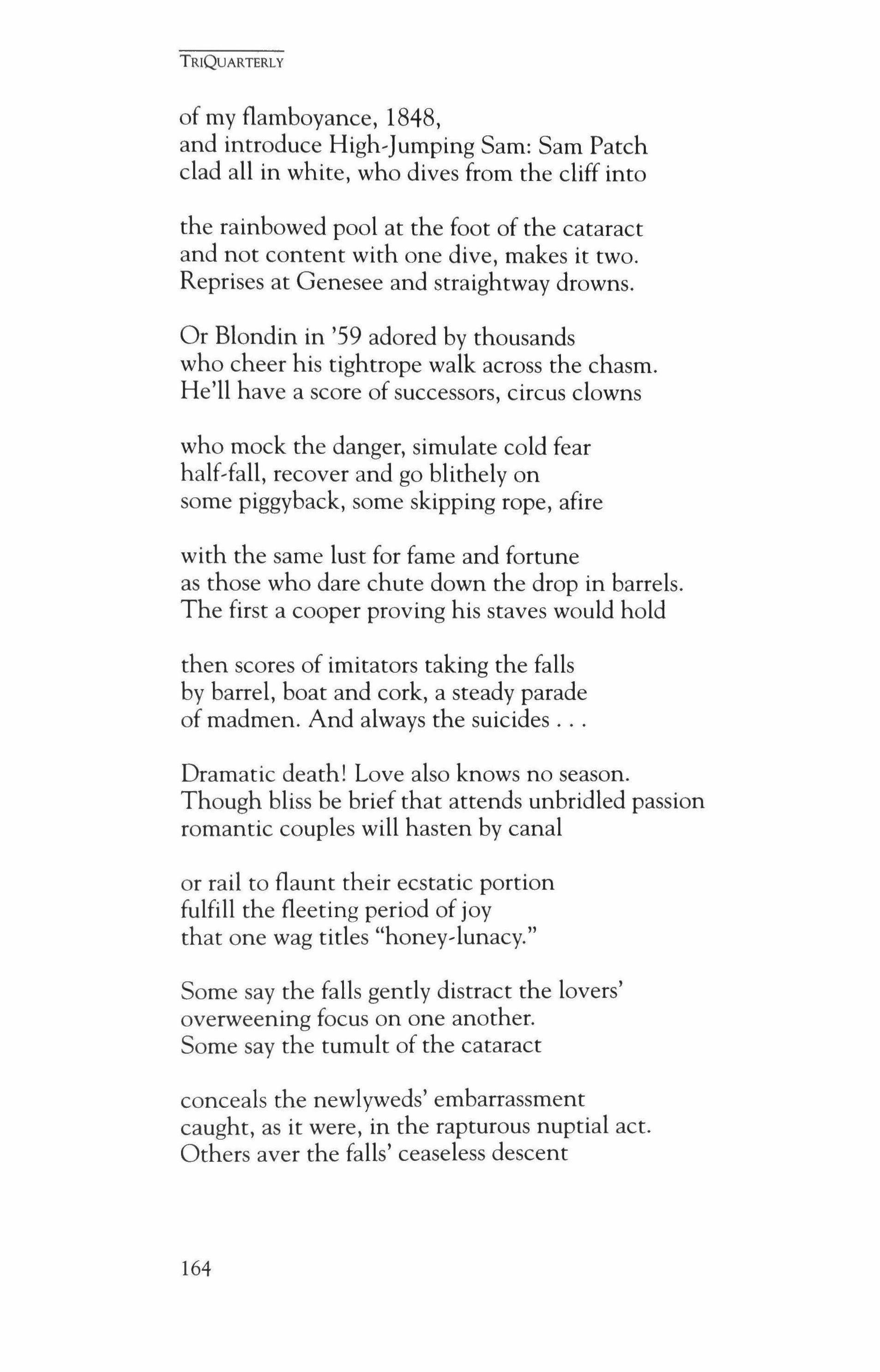
of my flamboyance, 1848, and introduce High-jumping Sam: Sam Patch clad all in white, who dives from the cliff into the rainbowed pool at the foot of the cataract and not content with one dive, makes it two. Reprises at Genesee and straightway drowns.
Or Blondin in '59 adored by thousands who cheer his tightrope walk across the chasm. He'll have a score of successors, circus clowns who mock the danger, simulate cold fear half-fall, recover and go blithely on some piggyback, some skipping rope, afire with the same lust for fame and fortune as those who dare chute down the drop in barrels. The first a cooper proving his staves would hold then scores of imitators taking the falls by barrel, boat and cork, a steady parade of madmen. And always the suicides
Dramatic death! Love also knows no season. Though bliss be brief that attends unbridled passion romantic couples will hasten by canal or rail to flaunt their ecstatic portion fulfill the fleeting period of joy that one wag titles "honey,lunacy."
Some say the falls gently distract the lovers' overweening focus on one another. Some say the tumult of the cataract
conceals the newlyweds' embarrassment caught, as it were, in the rapturous nuptial act. Others aver the falls' ceaseless descent
TRIQUARTERLY
164
evokes a rich manly response. Some brides claim happy negative ions are produced by falling water. You may take your choice
of savants, sages and hypotheses but thus Niagara will come to boast hotels and curio shops and carriage'rides
to vistas for photos of the just-now wived. Skeptic I am, unmarried by design. Still, might not the spectacle conjoin male and female qualities into one?

Now let us tum back from this clairvoyant glimpse to the day that Homan's kite string held. I tie it to a somewhat stouter cord
and next, a heavier one of finespun wire and ever,mightier cables to support stout wooden planks until from shore to shore,
just wide enough to let a phaeton pass, a catwalk spans the gorge. The boards are spaced to let rainwater through. Side rails? None.
I test it harshly across and back, first at a walk, then jog, then crow-hop up and down assured that it will hold. Once I trust it
I harness up my mare, to show she will. A chestnut Morgan, foaled in my own bam and trained to voice commands the way a skilled driving horse need be, to keep from harm. Vixen by name but not by temperament, spirited, willing and confident.
* * *
TRIQUARTERLY 165
TRIQUARTERLY
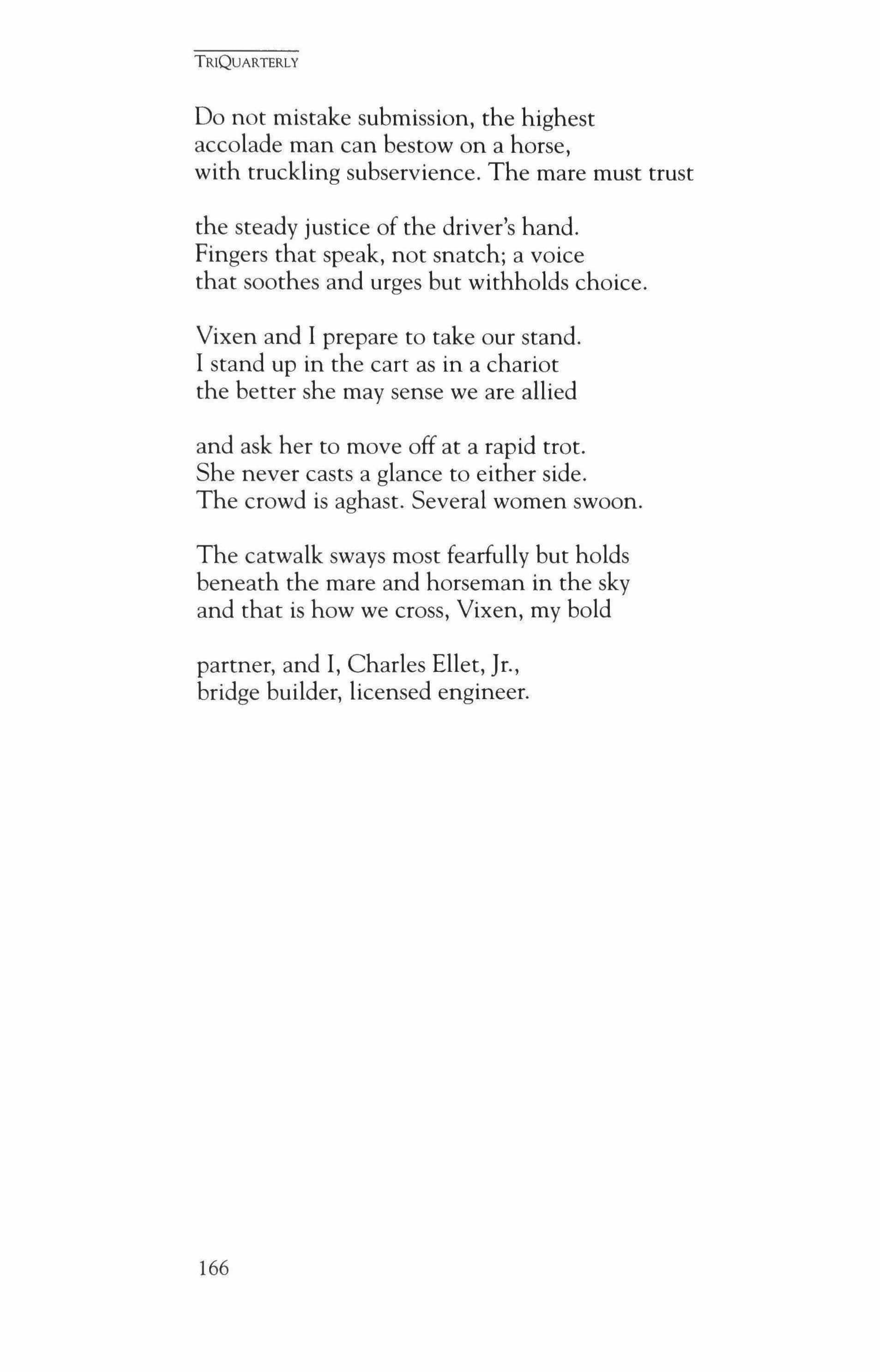
Do not mistake submission, the highest accolade man can bestow on a horse, with truckling subservience. The mare must trust the steady justice of the driver's hand. Fingers that speak, not snatch; a voice that soothes and urges but withholds choice.
Vixen and I prepare to take our stand. I stand up in the cart as in a chariot the better she may sense we are allied and ask her to move off at a rapid trot. She never casts a glance to either side. The crowd is aghast. Several women swoon.
The catwalk sways most fearfully but holds beneath the mare and horseman in the sky and that is how we cross, Vixen, my bold partner, and I, Charles Ellet, Jr., bridge builder, licensed engineer.
166
Ballad of Ashfield Avenue
Joyce Carol Oates

Along Ashfield Avenue connecting with I�75, rain falls like steel filings. The air's gassy gauze. Are all these neighborhoods so wasted? Driving to hit the green lights. Scared shitless you're gonna hit red. And sit in your Saab sedan, doors locked, eyes straight staring ahead. Get me the hell out ofhere 0 Lord, never be wicked again.
Along Ashfield Avenue, man, think we can't track your pulp-paper face? Scared eyes noting shut-down stores, burnt-out Kroger's? Vacant lots gone to jungle, and the stink! Like burning tires, backed-up drains. You're thinking If this is how these people choose to live. Thinking Ifthey want to burn their own neighborhoods, live like animals for Christ's sake!
Pisses you, you voted Democrat. Always have. You a good soul. We know. That heart-glow you felt Christmas 1979 tossing a quarter in my bucket at the Airport Hilton, good Christian feeling giving to the poor and needy long as you don't see us or breathe the same air. Long as you hit the green lights, north to I�75. Hey lemme clean your windshield, man? No?
Or you could gimme a little blood?
TRIQUARTERLY
167
TRIQUARTERLY

'Course I'm jivin, man! No need to panic. Can't trust none of these niggers but I'm the exception. Parole's over now I'm in rehab. Next comes job training. You American you put your faith in job training. See me hauling your trash that's city sanitation worker. Carrying your dirty plates that's bus boy. Minimum wage a victory for the underclass, man we're grateful. Hlv-positive but grateful.
So you could gimme a little blood?
My sad daddy (now deceased) worked the heavy mower at the edge of the Great Books you teach, you'd look out your mullioned windows pissed at the noise. Didn't make the Great Books, broke his back laying cement for Centenary Hall. All I want's a little blood, tsans-jus-um. Caucasian-pure, 100% American blood shining red like liquid Formica. You got plenty to spare.
Ain't you prime health? Like the President that's fit, tanned and rested after every vacation? Spirit of optimism is required. Every house in Lakepointe "sensory-wired" and SWAT�teams on 24�hour alert. You looking at me not seeing me, hell that's O.K. Thinking weird thoughts about me not knowing me, I ain't complaining. Writing your shit about me. 'Course I'm jivin. I'm in the street waving my stump arms hey it's O.K. I don't exist.
Blood don't cost. Anyway ain't you in-sured? On I�75 in this bad rain so the underpass is flooded and the Saab stalls and I'm the six-foot baby-face kid grinning in your window. Yo, man! You needin' some help?
Banging the glass with my tire iron. And you're saying, Look it wasn't me! I'm not my skin! No more than you! Wasn't my fault any of it don't hurt me! It's a misunderstanding, look at history but not me! And I'm laughing, O.K., man! Cool. Nobody gonna hurt you, just gimme a little blood.
168
Maizel at Shorty's in Kendall
Campbell McGrath

All shift them donuts been singing to me, calling to me something crazy in a voice
Dolly Parton'd be proud of-Maizel, honey, eat us uP! Like that. Friendly. Nice and sweet, all glazed up together in that box, as if they was happy about being what they is, surely more than this jelly-junkie waitress hooked on Krispy Kremes can say. Halve the moon, leave a frosted crescent for some other girl. Maizel, you ain't kidding no one, honey. Of a certainty you're gonna eat that yourself, probably soon's you get these BB, Q ribs to them boys at table sixteen. Nice looking boys, too. These days we're getting the, uh, Cuban mostly, virtually all what you call Hispanic-speaking. White folks gone moved up to Broward County, like my ex. Maizel, you shut your mouth about that man! Sweet Gee, zus, honey, ain't this ring of sugar gold enough?
TRIQUARTERLY
169
She Speaks Across the Years
David Ferry

Translated and adaptedfrom the German of Holderlin
"If having gone so far from one another
On distant ways, if across all the ways And all the time you know me still who was Your partner in those days in all the sorrow, Then something after all is left of it all.
Where's she who loved you waiting for you now?
Here in the Civic Garden, just as before, Here where in memory once again we're meeting, In the dusk, as before, and after all the sorrow, Beside the black original river flowing.
There were those moments, I remember there were those moments, When you, so closed up in yourself, were able, With me, to be, ifjust for a moment, less so. There was something good about that, for you, for me. The time went by as if there was no trouble.
I remember how you showed me all those places That though this was my country I had never Visited or seen as through your eyes, The open fields, and also the hidden places Looking from concealment out over the sea.
TRIQUARTERLY
170
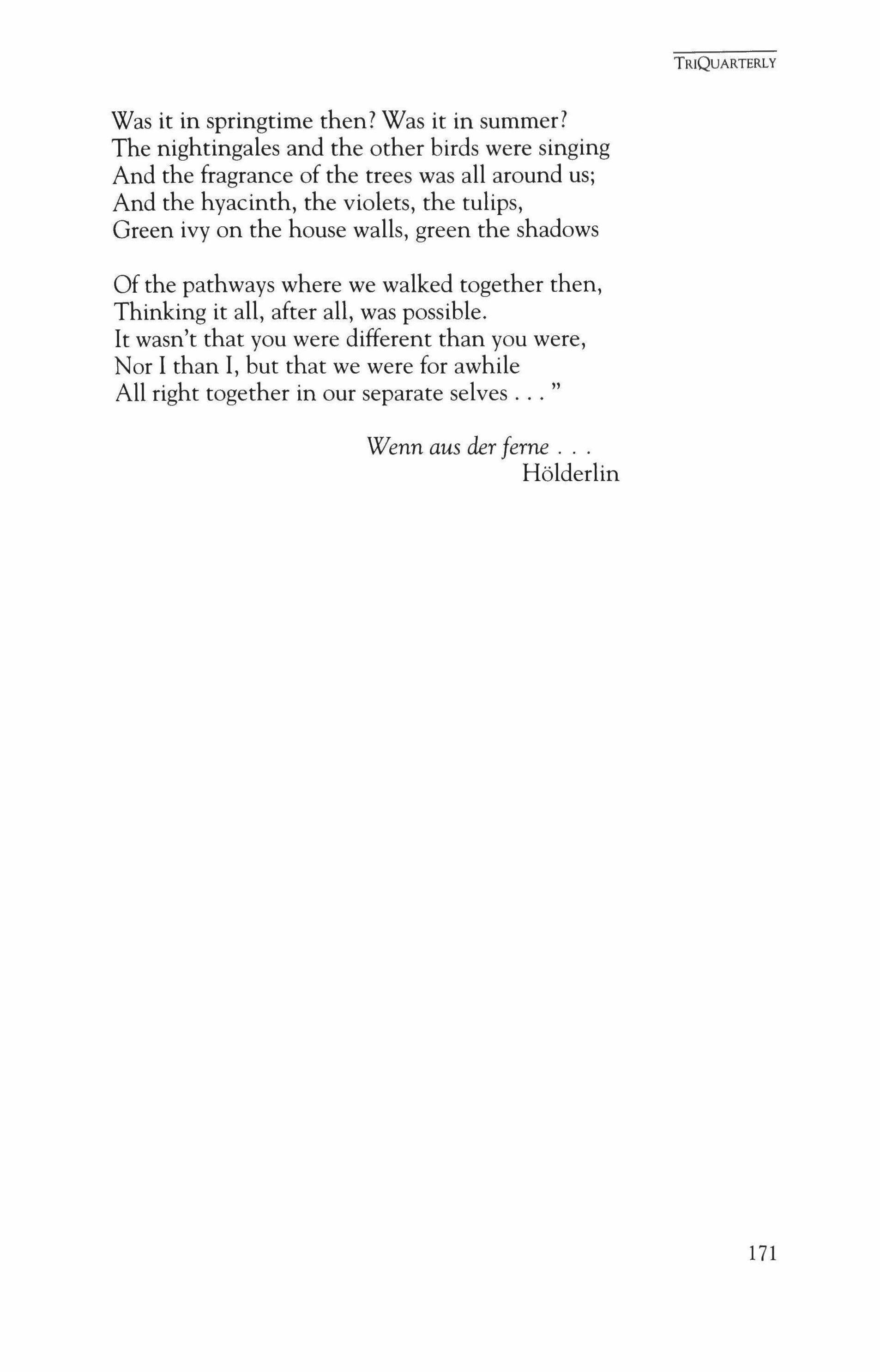
Was it in springtime then? Was it in summer? The nightingales and the other birds were singing And the fragrance of the trees was all around us; And the hyacinth, the violets, the tulips, Green ivy on the house walls, green the shadows
Of the pathways where we walked together then, Thinking it all, after all, was possible. It wasn't that you were different than you were, Nor I than I, but that we were for awhile
All right together in our separate selves "
Wenn aus der ferne Holderlin
TRIQUARTERLY 171
World Wrap
Alice Fulton

Steady as a letterpress, building up and up to text, as the hum of what was, the blizzard hisses on the windows. Each snowflake clots around a dust to form its null abundance.
Clap the erasers =
In the old row house, two soldiers of love remove their armbands and denim, scrub the mimeo from their fingers and fuck for ten seconds, he's so young. I can see me now. See her-
with her Nikon and lenses-saying total black, total white hides texture. Density's blinding, while gray, the in-between, allows detail to emerge and be. Gray is revelation. Gray folded into gray
like metal chairs in the secular chapels where a movement was building from privilege and cocksure: who made napalm, clapped the erasers, raised and lowered the shades. Who made babies, coffee, applause.
TRIQUARTERLY
172
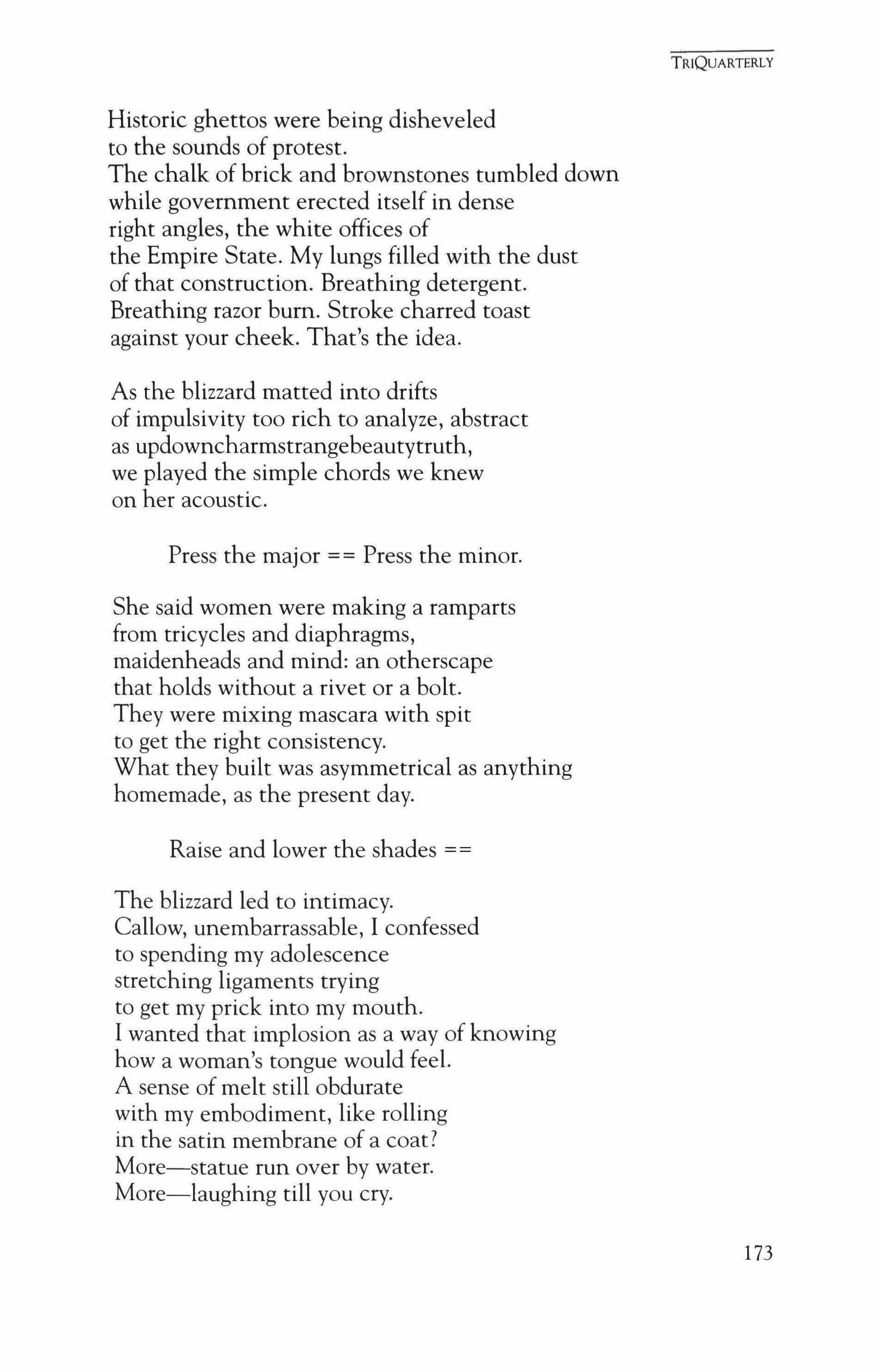
Historic ghettos were being disheveled to the sounds of protest. The chalk of brick and brownstones tumbled down while government erected itself in dense right angles, the white offices of the Empire State. My lungs filled with the dust of that construction. Breathing detergent. Breathing razor burn. Stroke charred toast against your cheek. That's the idea.
As the blizzard matted into drifts of impulsivity too rich to analyze, abstract as updowncharmstrangebeautytruth, we played the simple chords we knew on her acoustic.
Press the major Press the minor.
She said women were making a ramparts from tricycles and diaphragms, maidenheads and mind: an otherscape that holds without a rivet or a bolt. They were mixing mascara with spit to get the right consistency. What they built was asymmetrical as anything homemade, as the present day.
Raise and lower the shades = =
The blizzard led to intimacy. Callow, unembarrassable, I confessed to spending my adolescence stretching ligaments trying to get my prick into my mouth. I wanted that implosion as a way of knowing how a woman's tongue would feel. A sense of melt still obdurate with my embodiment, like rolling in the satin membrane of a coat? More-statue run over by water. More-laughing till you cry.
TRIQUARTERLY 173
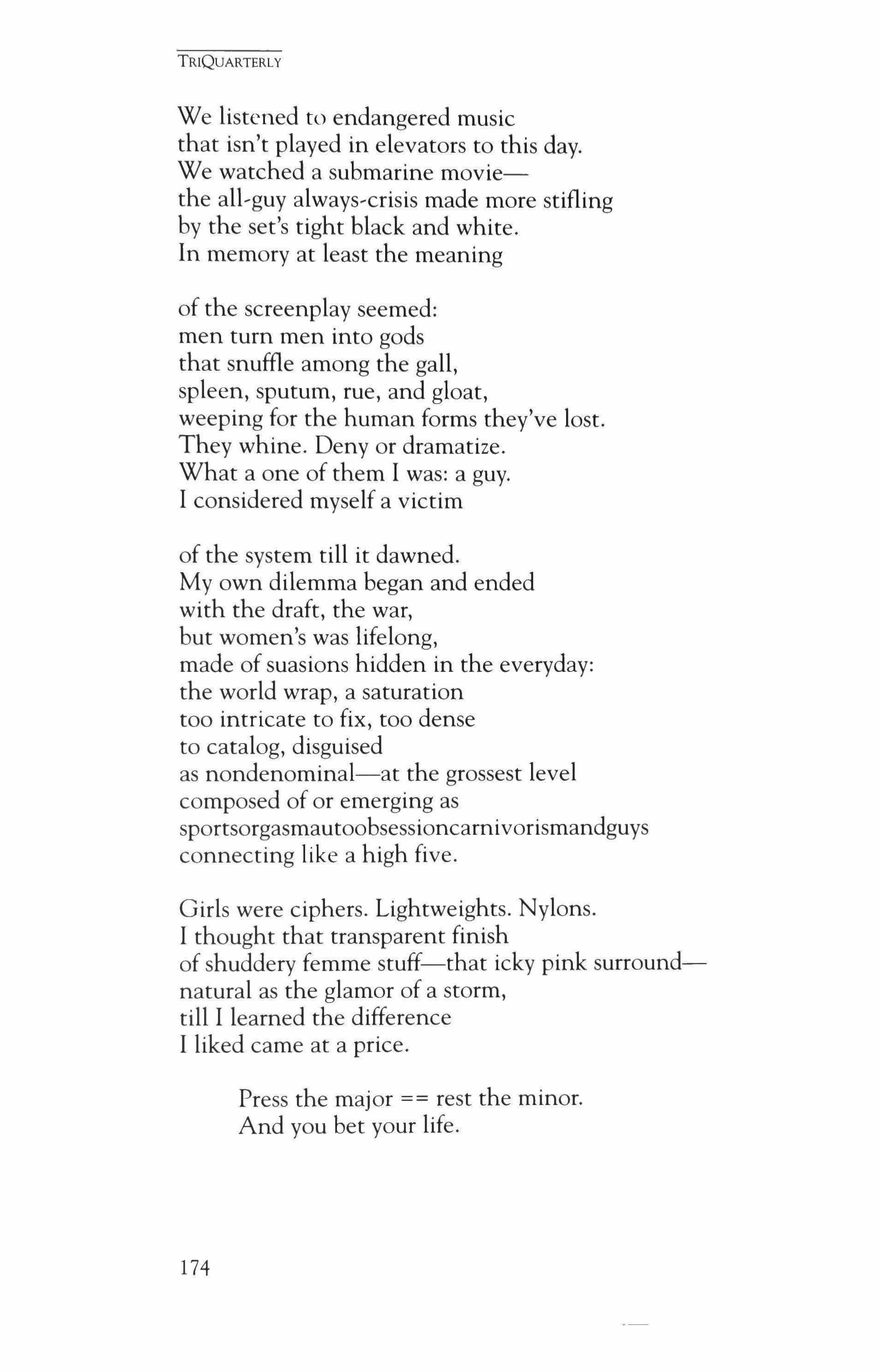
We listened to endangered music that isn't played in elevators to this day. We watched a submarine moviethe all-guy always-crisis made more stifling by the set's tight black and white. In memory at least the meaning of the screenplay seemed: men turn men into gods that snuffle among the gall, spleen, sputum, rue, and gloat, weeping for the human forms they've lost. They whine. Deny or dramatize. What a one of them I was: a guy. I considered myself a victim of the system till it dawned. My own dilemma began and ended with the draft, the war, but women's was lifelong, made of suasions hidden in the everyday: the world wrap, a saturation too intricate to fix, too dense to catalog, disguised as nondenominal-at the grossest level composed of or emerging as sportsorgasmautoobsessioncarnivorismandguys connecting like a high five.
Girls were ciphers. Lightweights. Nylons. I thought that transparent finish of shuddery femme stuff-that icky pink surroundnatural as the glamor of a storm, till I learned the difference I liked came at a price.
Press the major rest the minor. And you bet your life.
TRIQUARTERLY
174
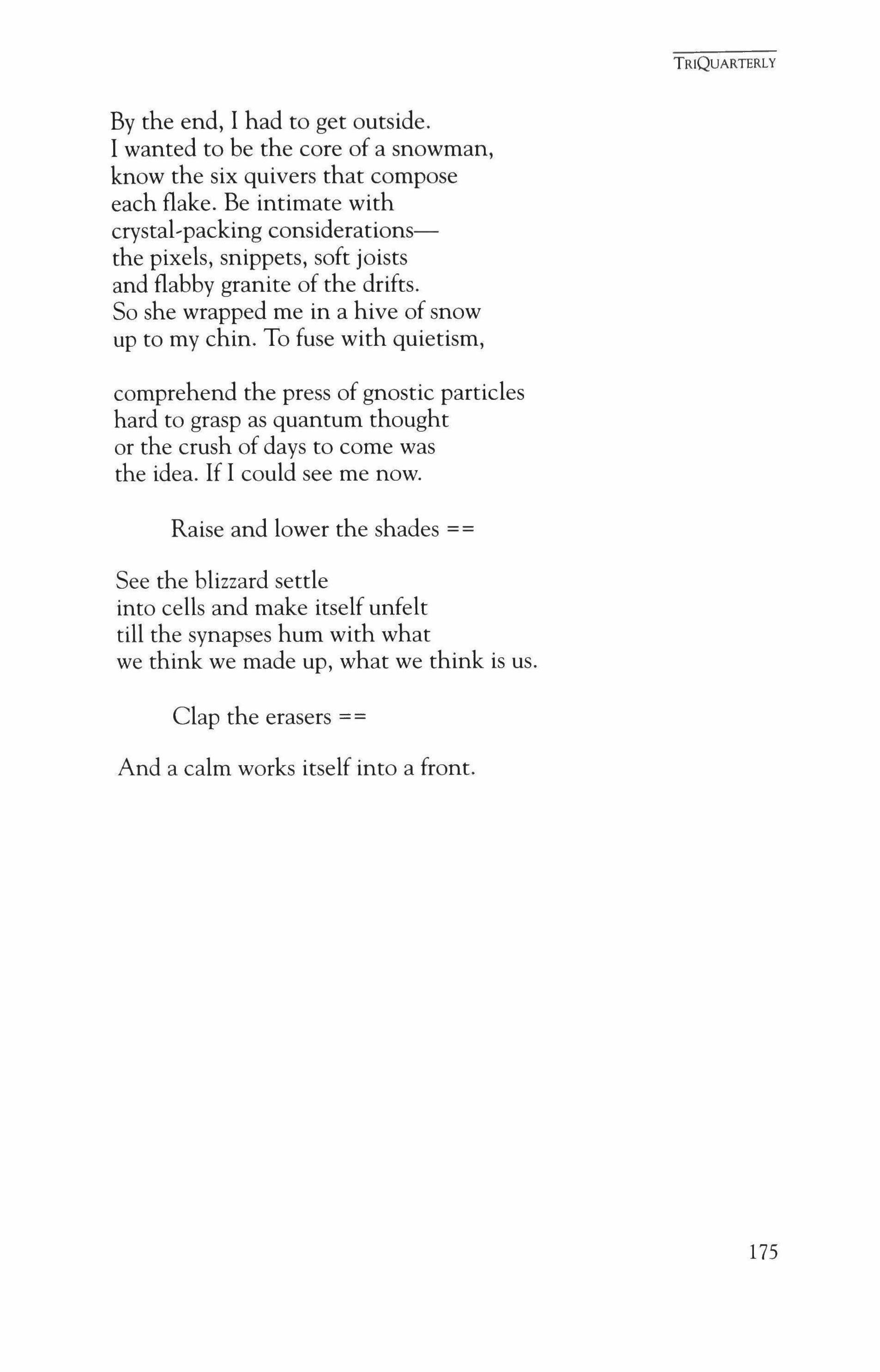
By the end, I had to get outside. I wanted to be the core of a snowman, know the six quivers that compose each flake. Be intimate with crystal-packing considerationsthe pixels, snippets, soft joists and flabby granite of the drifts. So she wrapped me in a hive of snow up to my chin. To fuse with quietism,
comprehend the press of gnostic particles hard to grasp as quantum thought or the crush of days to come was the idea. If I could see me now.
Raise and lower the shades
See the blizzard settle into cells and make itself unfelt till the synapses hum with what we think we made up, what we think is us.
Clap the erasers = =
And a calm works itself into a front.
TRIQUARTERLY
175
A Fate's Brief Memoir
Agha Shahid Ali
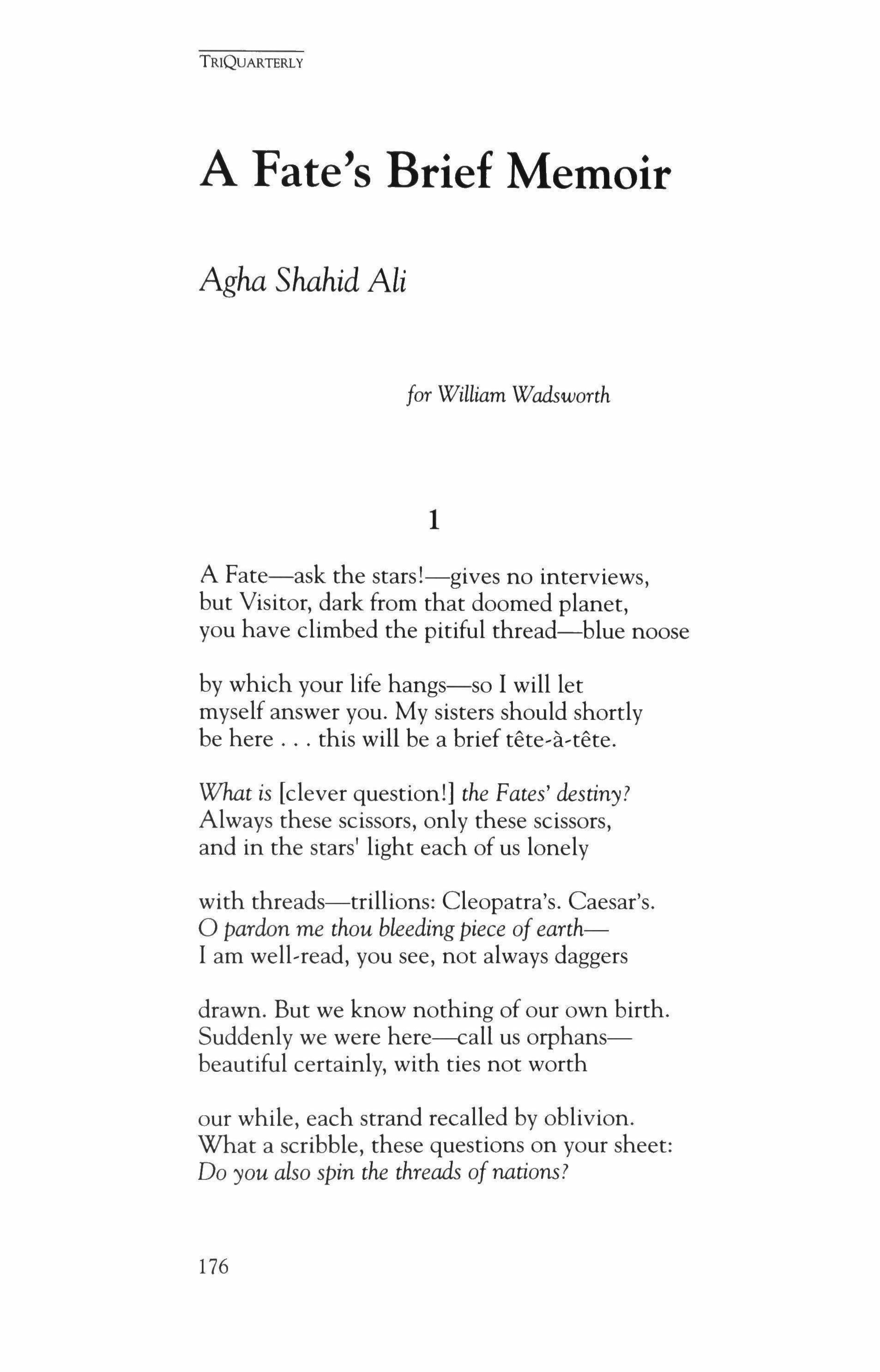 for
for
William Wadsworth
1
A Fate-ask the stars!-gives no interviews, but Visitor, dark from that doomed planet, you have climbed the pitiful thread-blue noose by which your life hangs-so I will let myself answer you. My sisters should shortly be here this will be a brief tete-a-tete.
What is [clever question!] the Fates' destiny? Always these scissors, only these scissors, and in the stars' light each of us lonely with threads-trillions: Cleopatra's. Caesar's. o pardon me thou bleedingpiece ofearthI am well-read, you see, not always daggers drawn. But we know nothing of our own birth. Suddenly we were here--call us orphansbeautiful certainly, with ties not worth our while, each strand recalled by oblivion. What a scribble, these questions on your sheet: Do you also spin the threads of nations?
TRIQUARTERLY
176

2
Are you feminists? YOU must be an athlete to have climbed so neatly all this way to us. We too outwit Ways we cannot defeat-
through dashes-so imagine! To become conscious thus in this island universe-no pastborn cold holding steel in our hands? Jesus!
I never swear, but notice the thinness of breaths about to break. We recycle them wholly black till their cobwebs incandesce
into-see those sheets: our letterhead: no last name, just: FATE FATE FATE and then for address (cross it outl) E+ERN·ITY. That we've outclassed.
3
So cruel then that each star be our jewel and no one to witness it. For ornament, my sisters empty nebulas by the fistful-
soon they will be here. The skies are rent by stillborn suns. So glad that we have met, that you have come; for, yes, we do miss men
o that way madness lies sweet heaven, 0 let me not be mad for when, by reflex, we execute Heaven's texts-hammered on the Guarded Tablet-
we again learn our weakness: we can't commute a sentence. My sister's hands-the youngest one1sshook when she let a nation go. She uproots stars, plucks them wildly-Call it adolescenceand with their edges scratches the sky's glass. After such knowledge what forgiveness? What defense?
TRIQUARTERLY 177
TRIQUARTERLY
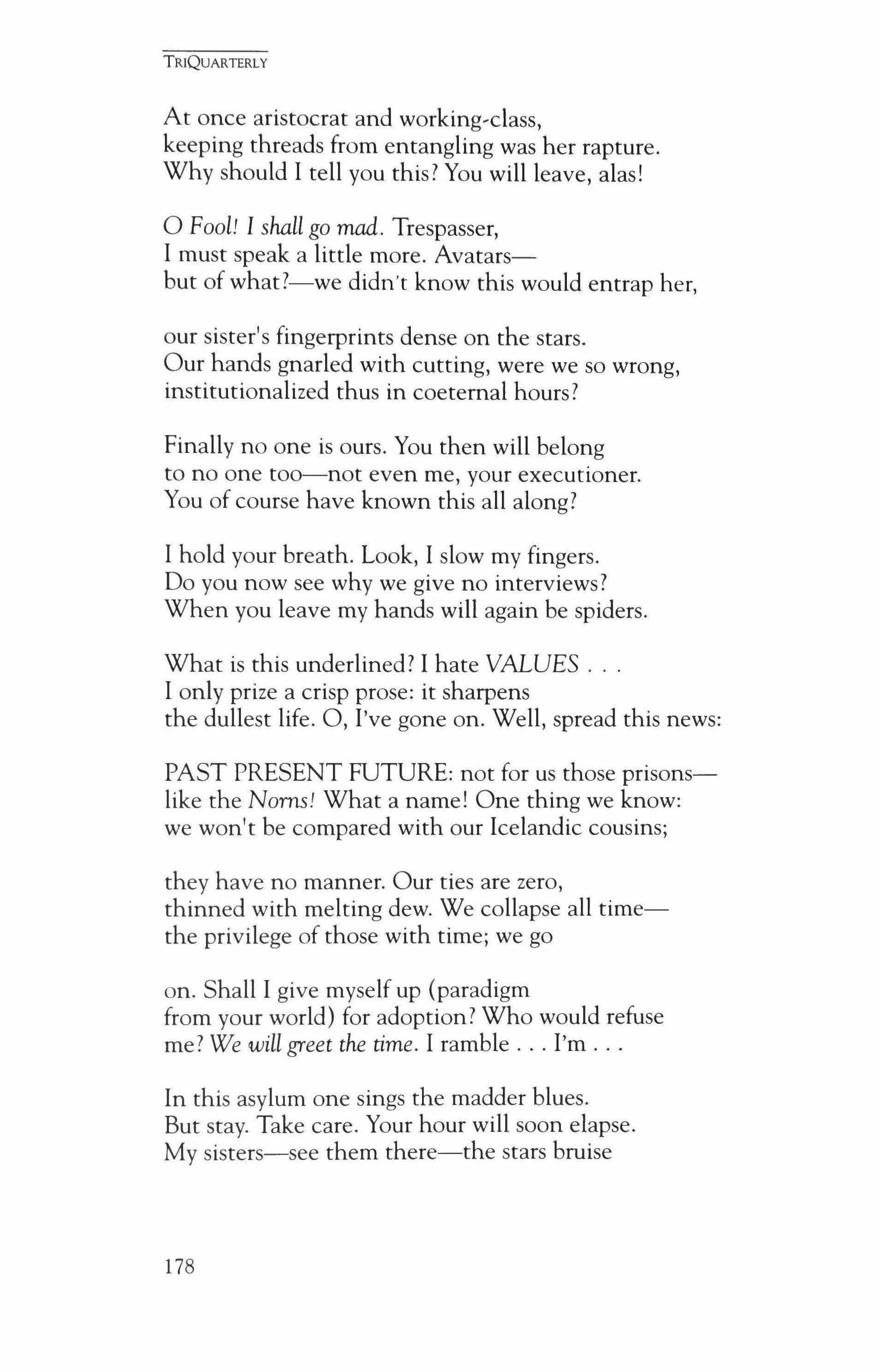
At once aristocrat and working-class, keeping threads from entangling was her rapture. Why should I tell you this? You will leave, alas!
o Fool! I shall go mad. Trespasser, I must speak a little more. Avatarsbut of what?-we didn't know this would entrap her, our sister's fingerprints dense on the stars. Our hands gnarled with cutting, were we so wrong, institutionalized thus in coeternal hours?
Finally no one is ours. You then will belong to no one too-not even me, your executioner. You of course have known this all along?
I hold your breath. Look, I slow my fingers. Do you now see why we give no interviews? When you leave my hands will again be spiders.
What is this underlined? I hate VALUES I only prize a crisp prose: it sharpens the dullest life. 0, I've gone on. Well, spread this news:
PAST PRESENT FUTURE: not for us those prisonslike the Noms! What a name! One thing we know: we won't be compared with our Icelandic cousins;
they have no manner. Our ties are zero, thinned with melting dew. We collapse all timethe privilege of those with time; we go on. Shall I give myself up (paradigm from your world) for adoption? Who would refuse me? We will greet the time. I ramble I'm
In this asylum one sings the madder blues. But stay. Take care. Your hour will soon elapse. My sisters-see them there-the stars bruise
178
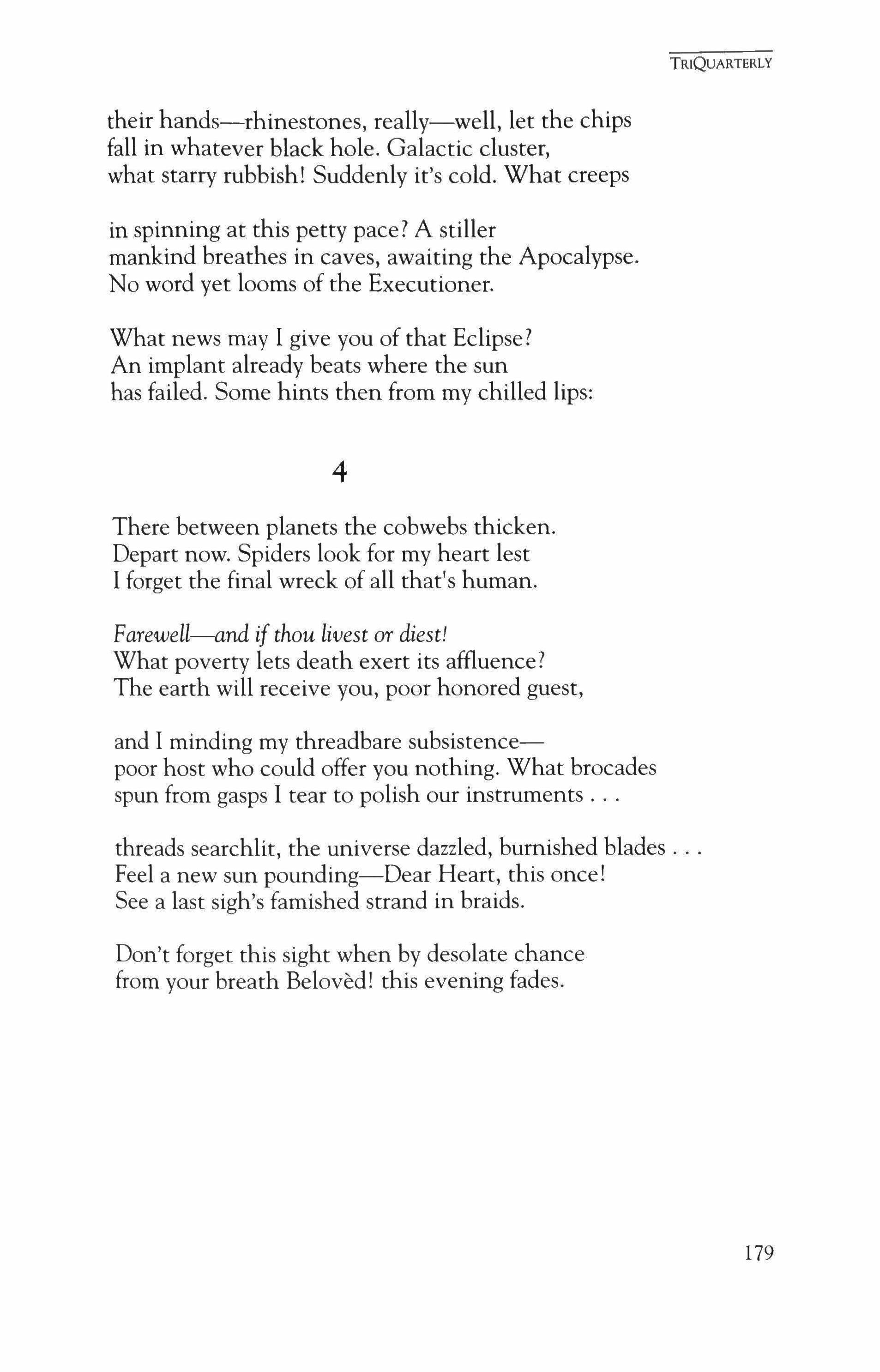
their hands-rhinestones, really-well, let the chips fall in whatever black hole. Galactic cluster, what starry rubbish! Suddenly it's cold. What creeps
in spinning at this petty pace? A stiller mankind breathes in caves, awaiting the Apocalypse. No word yet looms of the Executioner.
What news may I give you of that Eclipse? An implant already beats where the sun has failed. Some hints then from my chilled lips:
4
There between planets the cobwebs thicken. Depart now. Spiders look for my heart lest I forget the final wreck of all that's human.
Farewell-and if thou livest or diest! What poverty lets death exert its affluence? The earth will receive you, poor honored guest, and I minding my threadbare subsistencepoor host who could offer you nothing. What brocades spun from gasps I tear to polish our instruments
threads searchlit, the universe dazzled, burnished blades Feel a new sun pounding-Dear Heart, this once! See a last sigh's famished strand in braids.
Don't forget this sight when by desolate chance from your breath Beloved! this evening fades.
TRIQUARTERLY
179
Moon Goddess
Alec Marsh
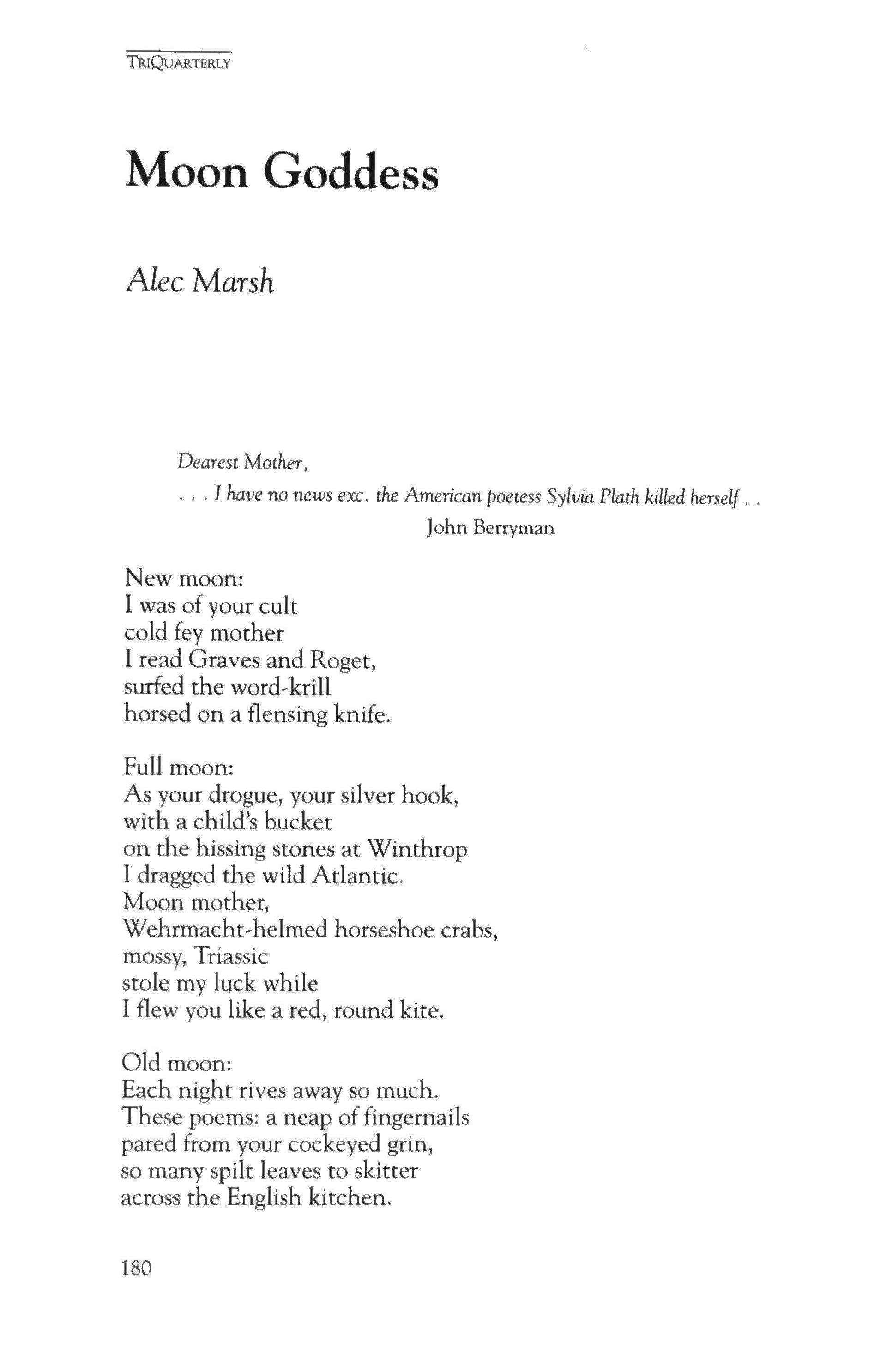
Dearest Mother,
I have no news exc. the American poetess Sylvia Plath killed herself John Berryman
New moon:
I was of your cult cold fey mother I read Graves and Roget, surfed the word-krill horsed on a flensing knife.
Full moon:
As your drogue, your silver hook, with a child's bucket on the hissing stones at Winthrop I dragged the wild Atlantic. Moon mother, Wehrmacht,helmed horseshoe crabs, mossy, Triassic stole my luck while I flew you like a red, round kite.
Old moon:
Each night rives away so much. These poems: a neap of fingernails pared from your cockeyed grin, so many spilt leaves to skitter across the English kitchen. 180
TRIQUARTERLY
Domestic
sibyl: The blue propane wind under the morning kettle prophecies my elsewhere. Day and night it whistles whistles, whistles while the children fret and stare.
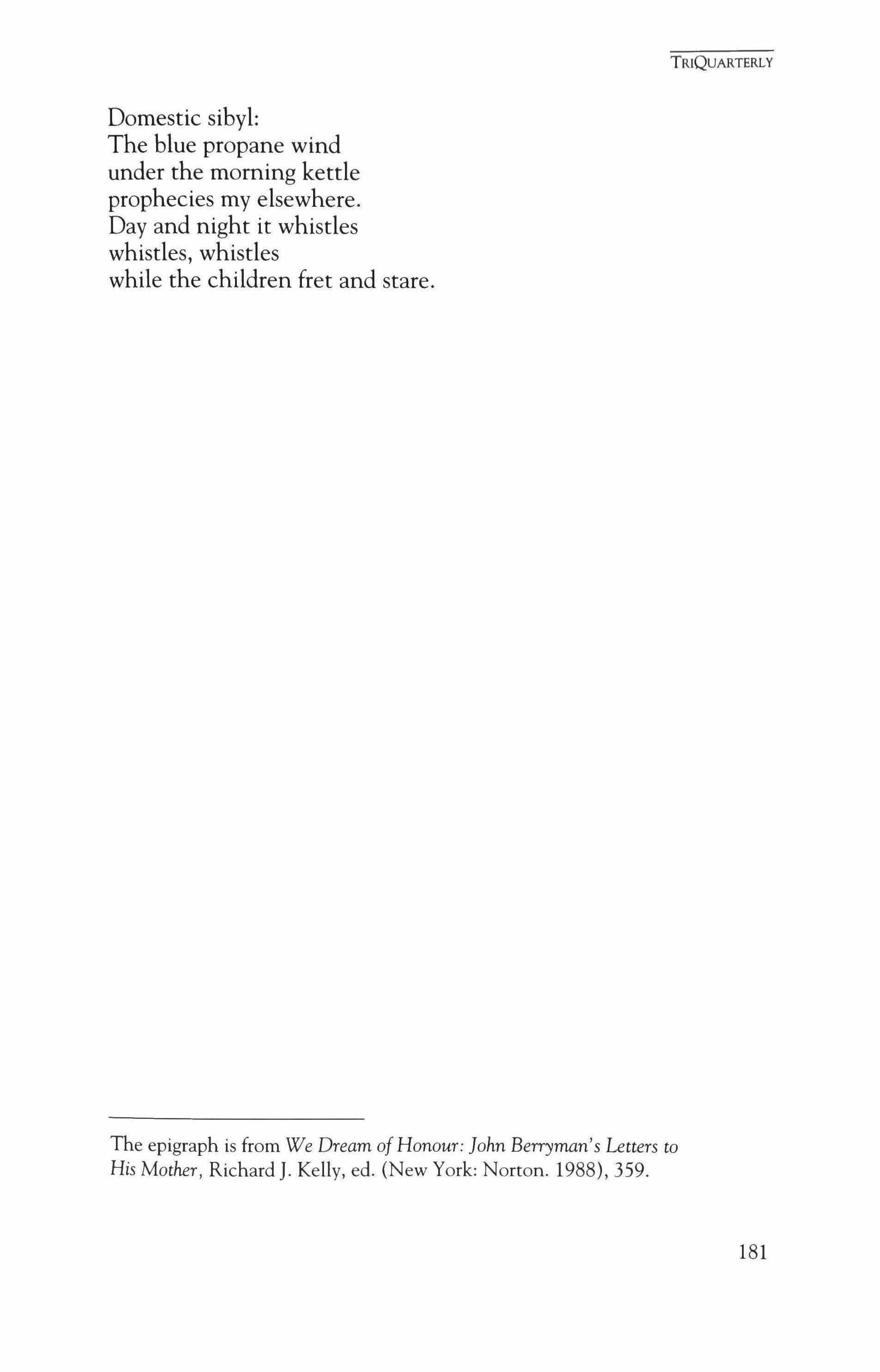
The epigraph is from We Dream of Honour: John Berryman's Letters to His Mother, Richard]. Kelly, ed. (New York: Norton. 1988),359.
TRIQUARTERLY
181
Krishna Speaks to the Summer Carpenter
Alicia Ostriker
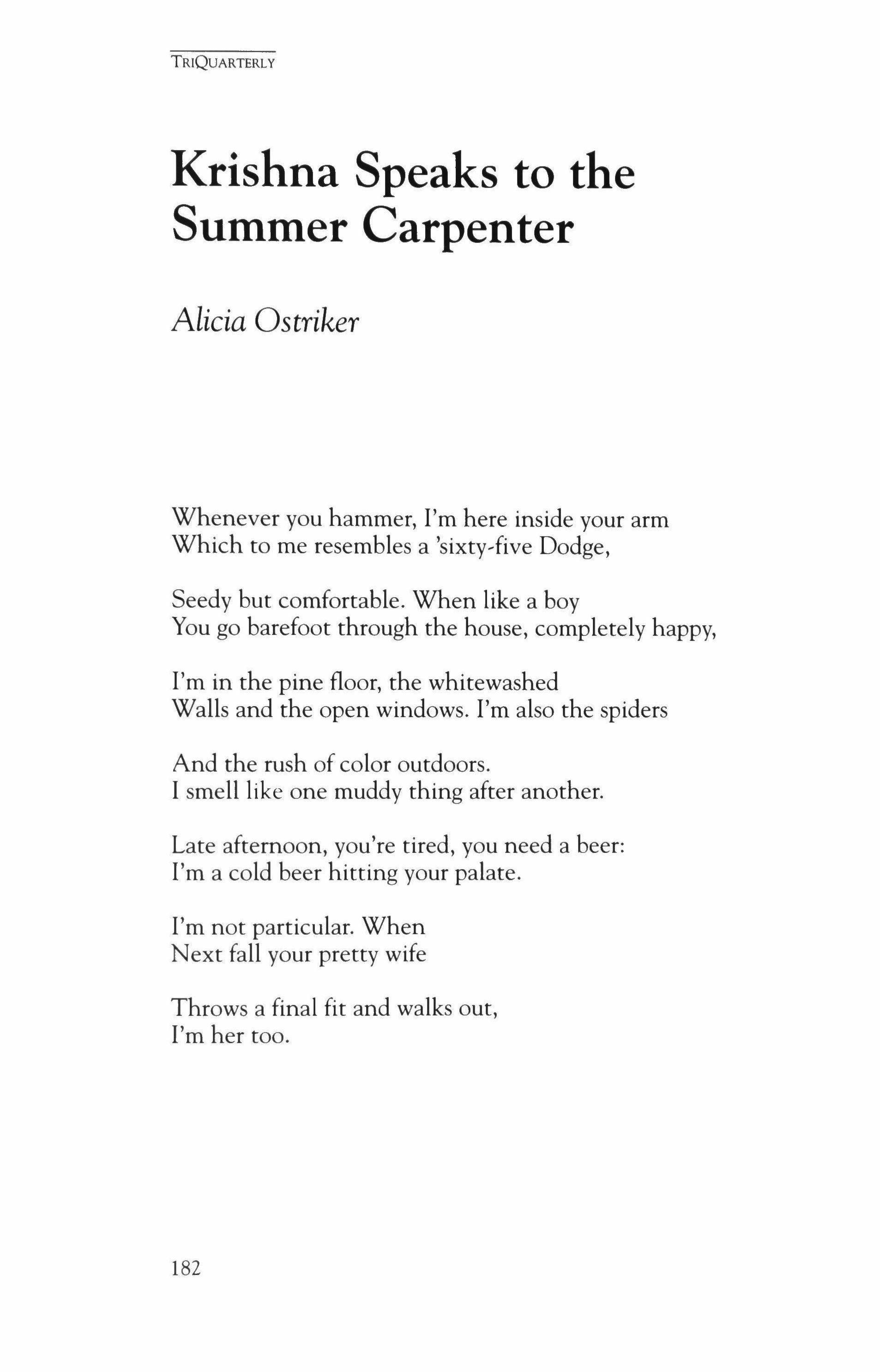
Whenever you hammer, I'm here inside your arm
Which to me resembles a 'sixty-five Dodge,
Seedy but comfortable. When like a boy You go barefoot through the house, completely happy,
I'm in the pine floor, the whitewashed Walls and the open windows. I'm also the spiders
And the rush of color outdoors. I smell like one muddy thing after another.
Late afternoon, you're tired, you need a beer: I'm a cold beer hitting your palate.
I'm not particular. When Next fall your pretty wife
Throws a final fit and walks out, I'm her too.
TRIQUARTERLY
182
Moses in Paradise
 Jacqueline Osherow
Jacqueline Osherow
And they saw the God ofIsrael and underneath his foot it was like a brickwork ofsapphire and the sky itselffor purity.
Exodus 24: 10
You'll laugh when I tell you how I spend my time here (I'm still not used to it; such greens and blues And no one buzzing orders in my ear)
I read poetry: Ezekiel's, David's, Isaiah's; I love the burning coals, the threats, the bones And the way insatiable David offers praise
Not only from himself, but skies and mountains How can he know for certain what a palm Tree wants? An island? Bolts of lightning? Stones?
But what could have induced such gloomy wisdom In David's subtle-minded jaded son? Surely, he didn't intend to back a claim
Like there is nothing new under the sun. Up here, there's a new poem every week: (Though never as wondrous as what's with you, ocean
TRIQUARTERLY 183
TRIQUARTERLY

That you ran away: Jordan, that you fell back?) I remember an Italian one we made a lot of; Too bad I was too old to learn to speak
But it was enough to hear those smooth vowels move In and out of cadences, like muffled chimes. Still, I suspect they dwelt too much on love
Which is not--despite those clever triple rhymesTake it from me-really a divine motive. God doesn't much go in for simple themes
And I don't think he ever bothers to give Particular thought to how a person feels, For example, what it might be like to leave
Whatever it is you know: the clump of hills That goes purple in the half light, even at Goshen Not that He wasn't kind to me; His calls
Were never loud or pushy, and He showed compassion At my sluggishness in getting stories down (I was never very good at taking dictation).
Once, He even let me write a lineIt was after the strangest thing I heard Him dictate: And they saw the God of Israel. He then went on
With something else entirely and I blurted out But surely you won't just leave it hanging there? Then I looked up and underneath His foot
It was like a brickwork ofsapphire
And the sky itselffor purity and God Humored me and murmured in my ear
You like that? Write it down. Go ahead. My eight words in Exodus. My poem. Every chance I got, I'd scroll back and read
184

Them out again; I'd even try to chant them; Nights, I'd find them in the names the stars Had scrawled across sky's graffitied dome
My dreams were crammed with feet, skies, sapphires, Each with such a flair for deviation, It's a pity you can't know them all without the scars
Of my slightly bumbling scribe's English translation (Etzem, you see, means itself, essence, bone); I found her working out the cantillation;
She'd stopped at my eight words, overthrown, So I had to use her, though her Hebrew's imprecise And you can't say in English: heaven's bone
Which is what I meant to get at: the eeriness Of its solid and unyielding white interior, What Ezekiel calls the eye of terrible ice
Which he sees under the appearance of a sapphireCoincidence?-Upon the likeness of a throneI'd like to think my poem might have helped inspire
His vision, but I know he saw that throne. That throne, those rising bones, the wheels in wheels, The wings of eyes, the creatures-all his own.
Maybe I should have tried eating scrolls
But that was not what God had in mind. My lot was mine; Ezekiel's was Ezekiel's
And neither one involved a promised land. For poor Ezekiel it was just bad luck While I actually bungled a command;
You know the story: I had to tell a rockThe people were thirsty-to bring forth water. But all I could think of when I tried to speak
TRIQUARTERLY 185

Was: imagine, rock, that you're a sapphire; Imagine that you close your hard blue eye And feel God's foot exert its slightest pressure.
How the pure sky within you starts to liquefy, How the earth around you celebrates, soaked through Those same paltry words: foot, sapphire, sky; David's boy was right-there's nothing new. I thought my heart would break from its own aridityIt belongs in the desert it condemned me to-
And struck the rock for failing to inspire me. I didn't deserve to enter the promised land
Though I wish I could've stayed in the vicinity
Long enough to see a bunch of grapes that spanned Two poles carried by giants. Even here There's nothing quite so worthy of a legend.
But I wouldn't have found the words for it either. If God was grooming me to be a poet, I'm afraid He was something of a failure.
All I ever really managed was anecdoteThough not for lack of trying-however vivid. I don't blame God for growing so remote
And spending all His spare time coaching David. I have no complaints; I'm heaped with fame. Anyway-I wrote it-it's forbidden to covet
Other people's things, even a psalm. Besides, which would I choose? They're all so luminous And not a single sapphire among them.
Still, I have no good reason to be envious. Every other Chasid bears my name. There's even a church named for me in Venice
TRIQUARTERLY
186

And David's friend in Florence who did so well by him Made me a better likeness, even with its horns. And I've seen splendid things: the still-green stem
That cools the heart of anything that bums, The sapphire footpath underneath the sea, The fish retreating, flashy as the gemstones
On my princess's fingers as she'd fondle me. She always pledged to give me one some dayI was hoping for the lapis lazuli,
But then I killed a slave driver and ran away. How could I have done it?-and Pharaoh's son, Who used to take me swimming every Wednesday,
(I remember he would leave his headdress on So I would catch a glimpse, with every breath, Of sunlight on its hem of sapphire stone)
Perhaps he would have grown more like his fatherThat was, after all, what he was groomed forBut I could so easily have stopped his death
With a simple bloody mark on his chamber door Though it would, needless to say, have spoiled everything; I did what I was told, no less, no more.
It's hard to break a lifetime's habit of listening Which is why I subscribe to David's concert series; He's got something booked for every evening
And he's very open-minded. He once asked the Furies (A fiasco-the noise was overpowering) And, when Deborah canceled, Mohammed's houris,
Who were wonderful to watch but couldn't sing; We even heard my sister's tambourine last night And afterwards Isaiah sang a lovely thing
TR!QUARTERLY
187
TRIQUARTERLY

About the beauty of the mountains beneath the feet
Of any messenger who brings good news Did I tell you? David's asked me for tonight
And, well, really, what have I got to lose? He promised to accompany me on the lyre. Do you think there's something here that I might use?
I could teach it in an hour to the choir. They learn quickly and their diction is sublime. But I wish I had a bit more of a repertoire;
You never know--do you?-who might come. I was hoping I might catch a glimpse of sapphire
Beneath a tapping foot, keeping time
188


Sadness of the Body
Jason Brown

It is sown in dishonour; it is raised in glory.
1 Corinthians 15:43
In 1968 my uncle was in charge of the body count. He says very few of the bodies had all their parts by the time he found them, and that some of the smaller parts had already been taken as trophies. A dead body, he says, is like a bag of sand. The war, he says, was all about bodies.
We four cousins, my uncle and his girlfriend sit half nude in a rented vacation cottage drinking iced tea and vodka in the 1020 heat. The liquid pours in our mouths and then pours off our bodies as if it were sifting through sand. When it's this hot and none of us can sleep, we wander around all night looking for cooler places. When it's this hot, the body becomes sad.
What is the Body?
My uncle says the body is for buying beer. The body is mostly ocean anyway, he says, mostly liquid. It is constantly drowning. My cousins and I have come from all over the country to stay here with him and his girlfriend. At night we can hear the surf, and during the day we hear people yelling as they run and dive into it. We're here on vacation.
Our parents, most of them ten years older than my uncle, the baby of the family, stay in a bigger house just down the beach. My uncle prefers to stay with us, he hates grownups, he says.
My mother thinks the body is a way to get to the store. My father
TRIQUARTERLY
191
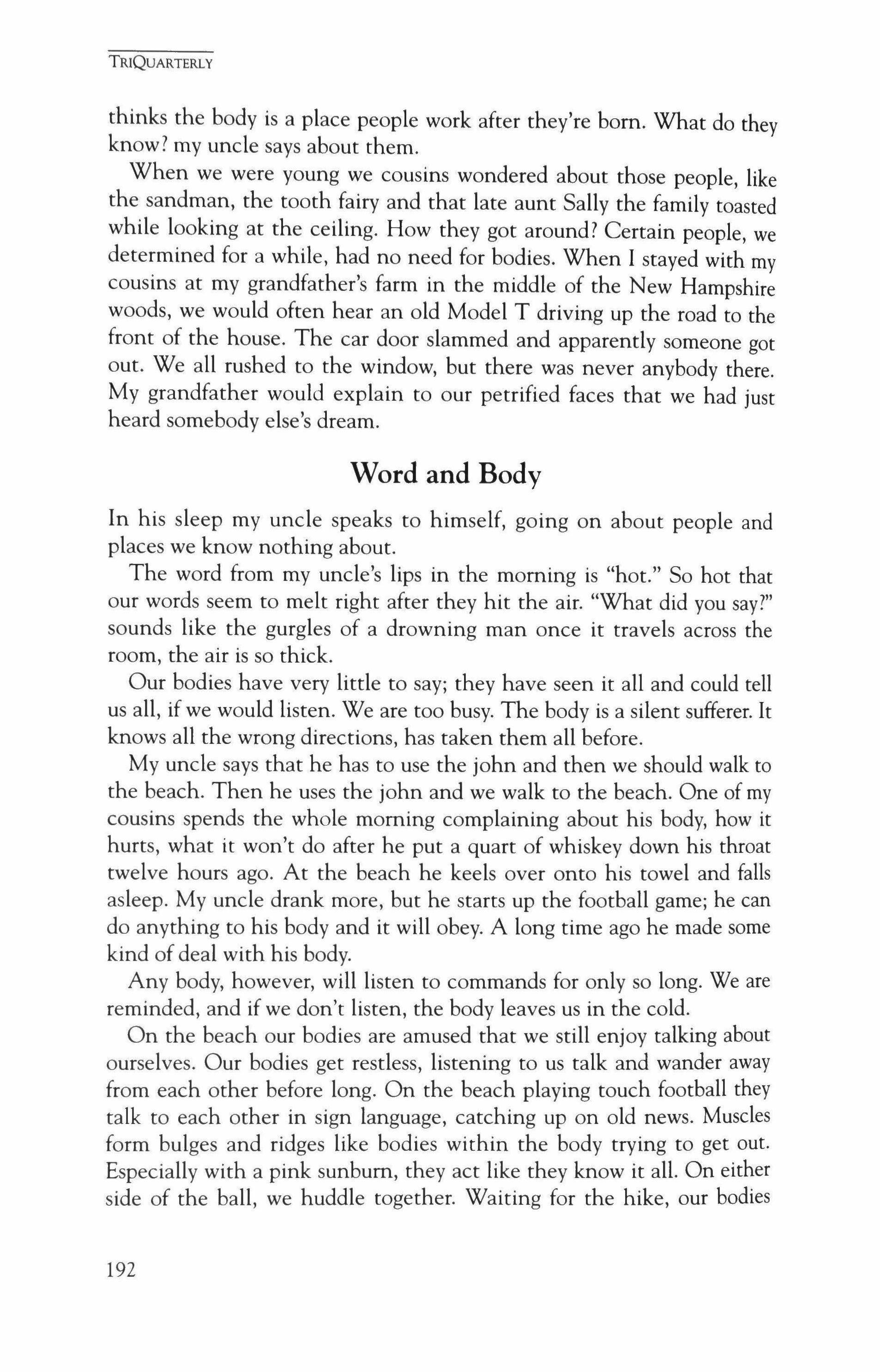
thinks the body is a place people work after they're born. What do they know? my uncle says about them.
When we were young we cousins wondered about those people, like the sandman, the tooth fairy and that late aunt Sally the family toasted while looking at the ceiling. How they got around? Certain people, we determined for a while, had no need for bodies. When I stayed with my cousins at my grandfather's farm in the middle of the New Hampshire woods, we would often hear an old Model T driving up the road to the front of the house. The car door slammed and apparently someone got out. We all rushed to the window, but there was never anybody there. My grandfather would explain to our petrified faces that we had just heard somebody else's dream.
Word and Body
In his sleep my uncle speaks to himself, going on about people and places we know nothing about.
The word from my uncle's lips in the morning is "hot." So hot that our words seem to melt right after they hit the air. "What did you say!" sounds like the gurgles of a drowning man once it travels across the room, the air is so thick.
Our bodies have very little to say; they have seen it all and could tell us all, if we would listen. We are too busy. The body is a silent sufferer. It knows all the wrong directions, has taken them all before.
My uncle says that he has to use the john and then we should walk to the beach. Then he uses the john and we walk to the beach. One of my cousins spends the whole morning complaining about his body, how it hurts, what it won't do after he put a quart of whiskey down his throat twelve hours ago. At the beach he keels over onto his towel and falls asleep. My uncle drank more, but he starts up the football game; he can do anything to his body and it will obey. A long time ago he made some kind of deal with his body.
Any body, however, will listen to commands for only so long. We are reminded, and if we don't listen, the body leaves us in the cold.
On the beach our bodies are amused that we still enjoy talking about ourselves. Our bodies get restless, listening to us talk and wander away from each other before long. On the beach playing touch football they talk to each other in sign language, catching up on old news. Muscles form bulges and ridges like bodies within the body trying to get out. Especially with a pink sunburn, they act like they know it all. On either side of the ball, we huddle together. Waiting for the hike, our bodies
TRIQUARTERLY
192
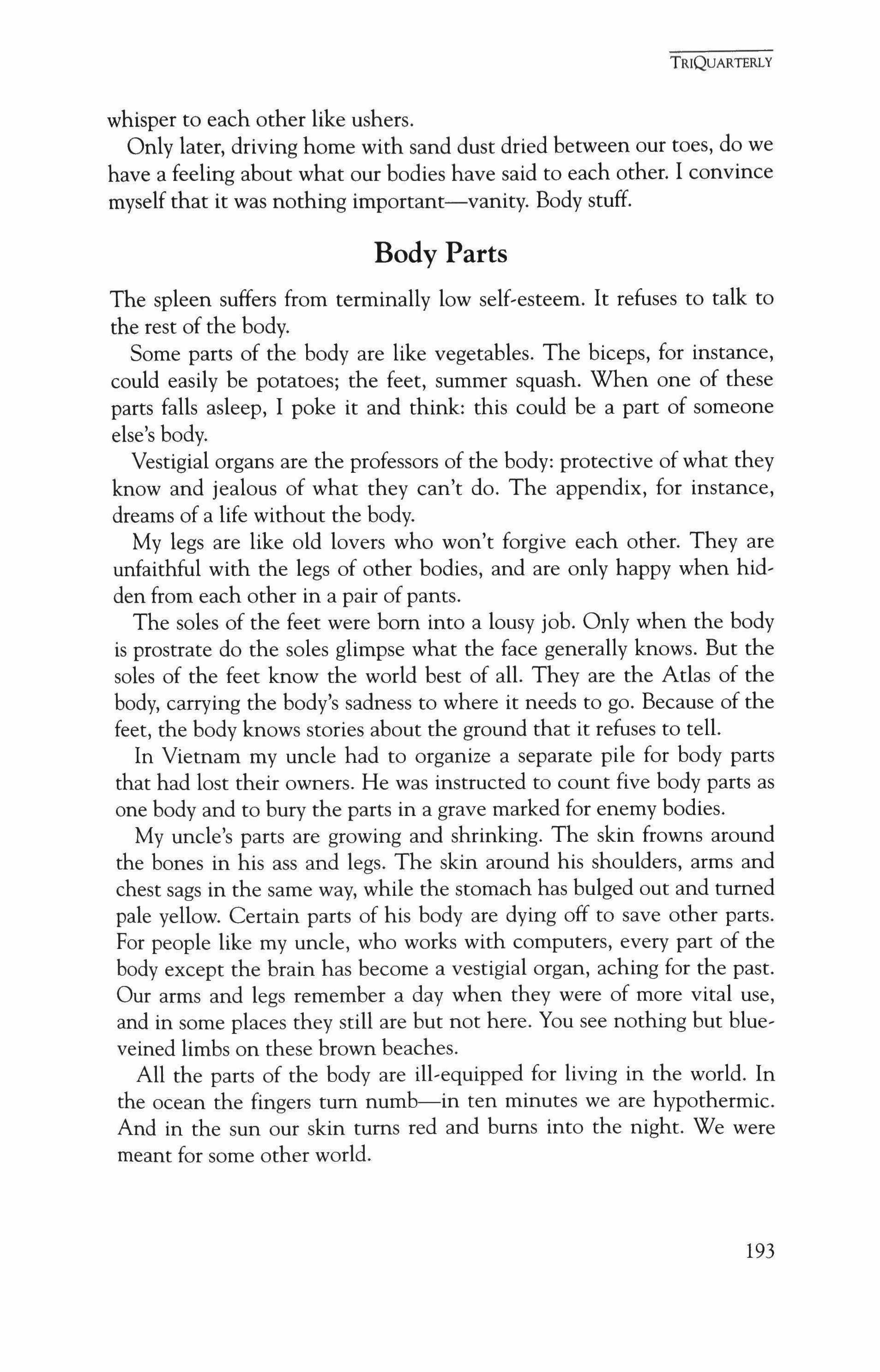
whisper to each other like ushers.
Only later, driving home with sand dust dried between our toes, do we have a feeling about what our bodies have said to each other. I convince myself that it was nothing important-vanity. Body stuff.
Body Parts
The spleen suffers from terminally low self-esteem. It refuses to talk to the rest of the body.
Some parts of the body are like vegetables. The biceps, for instance, could easily be potatoes; the feet, summer squash. When one of these parts falls asleep, I poke it and think: this could be a part of someone else's body.
Vestigial organs are the professors of the body: protective of what they know and jealous of what they can't do. The appendix, for instance, dreams of a life without the body.
My legs are like old lovers who won't forgive each other. They are unfaithful with the legs of other bodies, and are only happy when hid, den from each other in a pair of pants.
The soles of the feet were born into a lousy job. Only when the body is prostrate do the soles glimpse what the face generally knows. But the sales of the feet know the world best of all. They are the Atlas of the body, carrying the body's sadness to where it needs to go. Because of the feet, the body knows stories about the ground that it refuses to telL
In Vietnam my uncle had to organize a separate pile for body parts that had lost their owners. He was instructed to count five body parts as one body and to bury the parts in a grave marked for enemy bodies.
My uncle's parts are growing and shrinking. The skin frowns around the bones in his ass and legs. The skin around his shoulders, arms and chest sags in the same way, while the stomach has bulged out and turned pale yellow. Certain parts of his body are dying off to save other parts. For people like my uncle, who works with computers, every part of the body except the brain has become a vestigial organ, aching for the past. Our arms and legs remember a day when they were of more vital use, and in some places they still are but not here. You see nothing but blue, veined limbs on these brown beaches.
All the parts of the body are ill-equipped for living in the world. In the ocean the fingers tum numb-in ten minutes we are hypothermic. And in the sun our skin turns red and bums into the night. We were meant for some other world.
TRIQUARTERLY
193
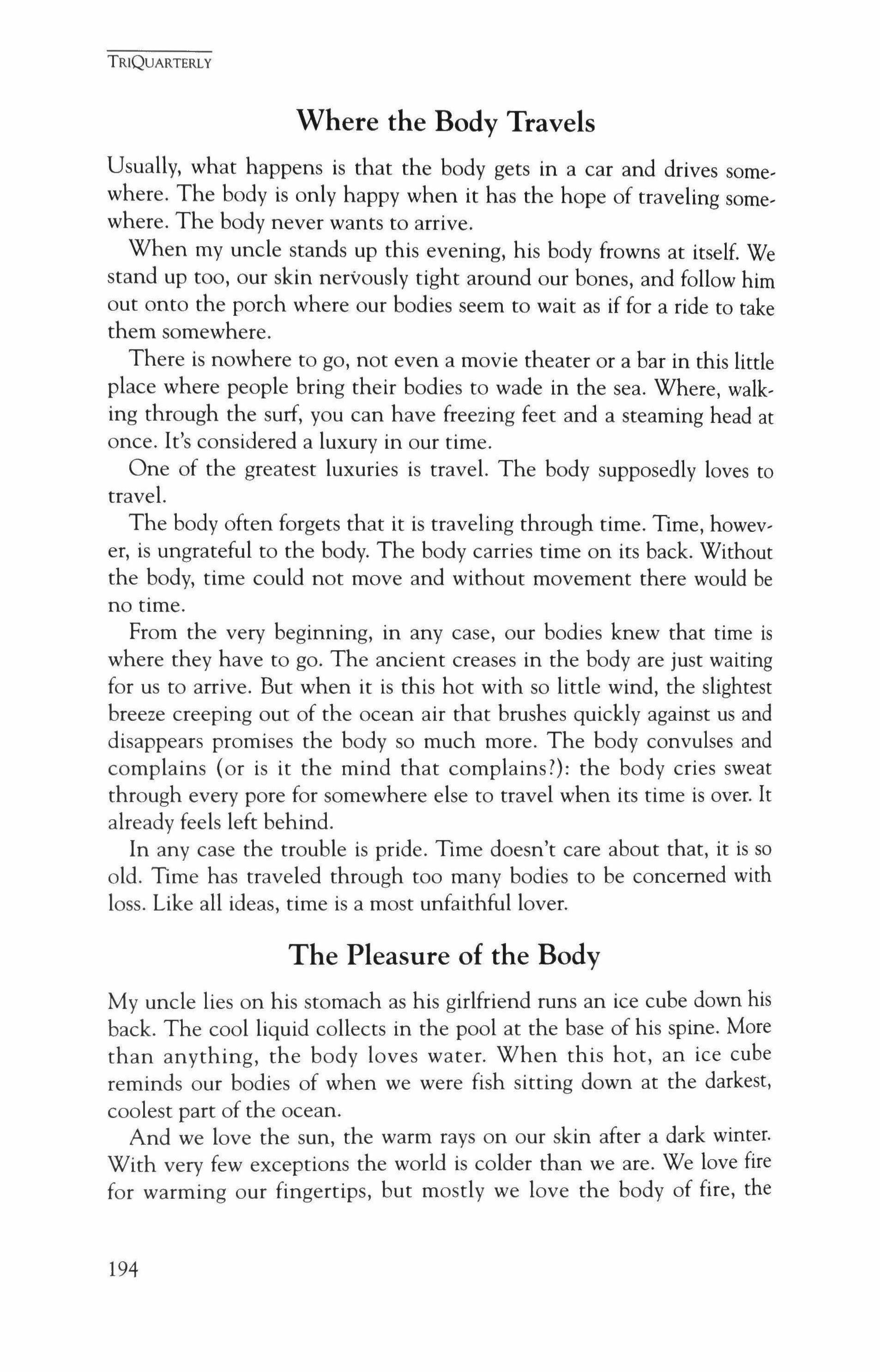
Where the Body Travels
Usually, what happens is that the body gets in a car and drives somewhere. The body is only happy when it has the hope of traveling somewhere. The body never wants to arrive.
When my uncle stands up this evening, his body frowns at itself. We stand up too, our skin nervously tight around our bones, and follow him out onto the porch where our bodies seem to wait as if for a ride to take them somewhere.
There is nowhere to go, not even a movie theater or a bar in this little place where people bring their bodies to wade in the sea. Where, walking through the surf, you can have freezing feet and a steaming head at once. It's considered a luxury in our time.
One of the greatest luxuries is travel. The body supposedly loves to travel.
The body often forgets that it is traveling through time. Time, however, is ungrateful to the body. The body carries time on its back. Without the body, time could not move and without movement there would be no time.
From the very beginning, in any case, our bodies knew that time is where they have to go. The ancient creases in the body are just waiting for us to arrive. But when it is this hot with so little wind, the slightest breeze creeping out of the ocean air that brushes quickly against us and disappears promises the body so much more. The body convulses and complains {or is it the mind that complains?}: the body cries sweat through every pore for somewhere else to travel when its time is over. It already feels left behind.
In any case the trouble is pride. Time doesn't care about that, it is so old. Time has traveled through too many bodies to be concerned with loss. Like all ideas, time is a most unfaithful lover.
The Pleasure of the Body
My uncle lies on his stomach as his girlfriend runs an ice cube down his back. The cool liquid collects in the pool at the base of his spine. More than anything, the body loves water. When this hot, an ice cube reminds our bodies of when we were fish sitting down at the darkest, coolest part of the ocean.
And we love the sun, the warm rays on our skin after a dark winter. With very few exceptions the world is colder than we are. We love fire for warming our fingertips, but mostly we love the body of fire, the
TRIQUARTERLY
194

flames. Flames dance with a kind of freedom that the body knows and the mind can only imagine. The body itself is slowly burning.
My uncle, one other cousin, my uncle's girlfriend and I are sitting in the quiet heat listening to the waves cooling the beach. Our bodies love to believe a good lie. My uncle's girlfriend, seven years younger than my uncle and a mere ten years older than my cousin and me, lies against my uncle's body on the couch and puts the ice cube in her mouth. Her nipples stand up against her tank top and the bottom of her bikini rides up between her legs. My cousin and I stare at her while my uncle lies on his stomach facing the wall. They are from another time. Our bodies tingle at the sight of them, but our minds are afraid.
My uncle suddenly turns on his side facing us, takes his beer off the table and slowly pours it over her body, soaking her hair, her shoulders, stomach, waist and legs. She turns on her side also, leaning on one elbow and with the opposite hand spreads the beer over herself like suntan lotion. Then she props one leg up, keeping the other one straight, and she looks at me. My uncle puts the beer down and reaches down in back between her legs with his free hand. Her eyelids sag but she still stares at me. My cousin stands up and walks to the bedroom. When her eyes close I stand up and walk out onto the porch. I walk halfway down the steps, sit down and stare at the dark space where the ocean meets the beach. It's night. I pull several pills out of my shirt pocket and plop them in my mouth, washing them down with a can of beer. The pills roll down the back of my throat and scrape their way down to the middle of my body. I sip from the beer again, the cold bite on my tongue in this steamy heat, the cold traveling in a wave down to the center of my body. Lying back in the sand, I wait for the feeling of having no bones. I lift some sand and sift it slowly onto my belly.
The body loves taking off shoes after a long walk, and it loves the first give of a pillow before a nap and the last moments before sleep. After climbing down a mountain, the body loves lowering its face into an icy stream. The body loves ice cream.
The body goes from body to body and sees nothing wrong, only pleasure.
At my grandfather's funeral this summer, mine was the only body that laughed. Laughing is one of the body's favorite ways to get rid of things.
Mind and Body
My uncle is a philosopher of bad ideas. As he goes to the window this morning, he flexes the map of the United States tattooed on his back.
TRIQUARTERLY
195

Montana bulges out of the shoulder.
The body has been lying awake forever waiting for the mind to remember. When it wakes the body has forgotten everything. This morning my cousin turns to me with a glass of iced coffee, his eyes half open with sleep and says, "Here His sleepy mind can't remember my name. At first I think this peculiar, but then it makes sense. Our bodies know what they see-another body.
Later, when our minds scramble to focus on the day, my cousin will no longer seem like just a body with its angles and particular features. It's how our minds gradually clothe our bodies to face the day.
Walking by the upstairs bathroom, I hear a "psssst." Looking in I see my uncle sitting on the edge of the tub. He holds the top of the long plastic tube toward me. I grab the middle and raise the end to my mouth, placing my thumb over the hole. He flicks the lighter as I inhale, listening to the sizzle of burning grass.
Then: "Com'ere," he says from by the window. I walk over (it seems to take forever) and blow the smoke out the window. "Down there," he says. We can see over the fence into the neighbor's lawn where a young woman leans back in a lawn chair with her top off. She puts her palm on her stomach and spreads her fingers there. "If I were you I would fall in love," my uncle says, resting his hand on my shoulder.
"She's nice," I say.
"Go over there in the nude, and tell her you're in love-that's what I would do."
"I don't know," I say, "if that sounds like such a good idea."
"Whatever you do," he says, running his hand down along a purple scar that stretches from hip to nipple, "Don't waste your time."
In 1969 my uncle's helicopter crashed somewhere in the I Trang, deep in the jungle. He and three other men crawled out of the wreckage and rested their broken bones next to a tree. One of the men lay dead in the helicopter. My uncle collapsed on his stomach, half unconscious, while a Viet Cong patrol came out of the brush and shot the two men sitting against the tree. The other man, lying a foot to the left of my uncle, was stabbed to death with a bayonet. Then the Viet Cong soldier jabbed his bayonet into my uncle's side and tore the skin off from the hip to the arm pit. My uncle, who was already covered with the blood of his dead friend, did not flinch. The soldier took him for dead and left him there. Six hours later a rescue helicopter picked him up along with the bodies of his friends. He was nearly dead. In a matter of hours, he was home in the United States, his body flown across the Pacific by jet. Weeks later
TRIQUARTERLY
196

he stood on a platform with the wives of his dead friends and received a medal. It was as if, my uncle has said, the wives were living parts of his dead friends' bodies.
The night after he received the medal my uncle ripped all the stitches out of his side and wandered around San Francisco drunk, blood pouring down his side. A teenage girl found him leaning against the side of a building. She called an ambulance.
"If I were yOU my uncle says again. Then he steps into the show, er. I can hear the water falling over his body, the long drips racing down his thighs and into the drain.
Body Mistakes
Casey Mills, from years ago, acted like someone who was rich enough to own another body. Young men like my cousins and I who aren't really young anymore and whose bodies don't like our jobs at home, often complain that our bodies behave like women.
My uncle shows me something he learned in Vietnam: he slaps his wrist as if it has done something wrong. He inserts the needle and releases the strap. He leans his head back and spreads his arms as if wait, ing for it to fall from the ceiling: that feeling of more. He doesn't know that I've already learned on my own. I sit down next to him, drawing in half of what he did and find the blue line in my arm. Finally, I loosen the strap on my arm letting the built-up blood rush through my body. The peace falls over my nerves. My body has no choice but to believe the lie. Then eventually, I know, the body starts to believe that it can't live without the lie.
As part of the 1st Cav, my uncle often went on first light and last light sweeps over the Mekong Delta. Using the modem version of the Gatling gun or a mounted M,60, the door gunner was ordered to shoot anything that moved, whether it appeared to be a cow, a civilian or a piece of machinery. Any fallen body was a kill, tallied and sent back to Washington as evidence of winning the war.
How many bodies could the enemy have? An endless number, my uncle says. They had an endless number of bodies. That's how they won.
My uncle's girlfriend comes out of the bathroom shaking her head. Everyone else is down at the beach, soaking themselves in the ocean. She has just come back from there and washed the salt off her body in a cold shower. My uncle nods off, tipping over on the couch and falling asleep.
TRIQUARTERLY
197

She picks the needle up off the bed. "Help me," she says, grabbing one of his shoulders. I stand up with some difficulty and grab the other shoulder; we drag him into the bedroom and lay him down. Grab the other end, she says, pulling on one of his shirt sleeves. I walk around to her side of the bed and stand next to her. I lean next to her, my arm touching hers, and grab onto his shirt and pulL
"Pull harder," she says. But I'm afraid his arm will come off. "Pull harder," she says again with her eyes clamped shut, and I do. Outside the room she leans on the wall, and then she leans on me in her bikini, sobbing on my neck. The tiny hairs that run down my stomach and vanish into my shorts bristle against her flat, brown stomach. I think I can tell you what it's like for her to lean against my stomach. There's nobody around to stop us, there's no stopping my body. Hunger is a kind of insatiable grief. I watch myself falling down to the floor over my uncle's girlfriend, but worse than that, I watch myself falling down into my uncle's life. Both things are hard to watch.
It is so easy to blame the body for what we do not know, as if it were a scientist who made promises.
History of the Body
We have come a long way. The body never lies. We may rely absolutely on what it says.
The body is history. In the story of time the body is never lost. It is a temporary accretion of incomplete material ideas, nothing more. It is not afraid.
We are afraid because we know nothing about history. We try to find ourselves there but see only darkness. We cannot read the lines in our own faces.
At some point this afternoon my uncle wandered out to the beach and fell asleep in the sun. By night fall, his body has developed a heat rash across its chest. He squeezes his eyes shut, clenches his teeth and tries to think about something else. He surrenders to the temptation of the body to itch, digging his fingers into the collar bone and scraping them down to his belly. The rest of his body is momentarily appreciative, but then the itching gets worse. He thrashes at his chest, slapping it with the palms of his hands. He punches himself hard like an animal showing off at the zoo. Then he starts swearing, digging his fingernails into his chest and scraping them down until he draws blood. Some relief comes to his face until his girlfriend takes his arm and pulls it away. He pushes her onto the couch. She puts her head between her knees and
TRIQUARTERLY
198
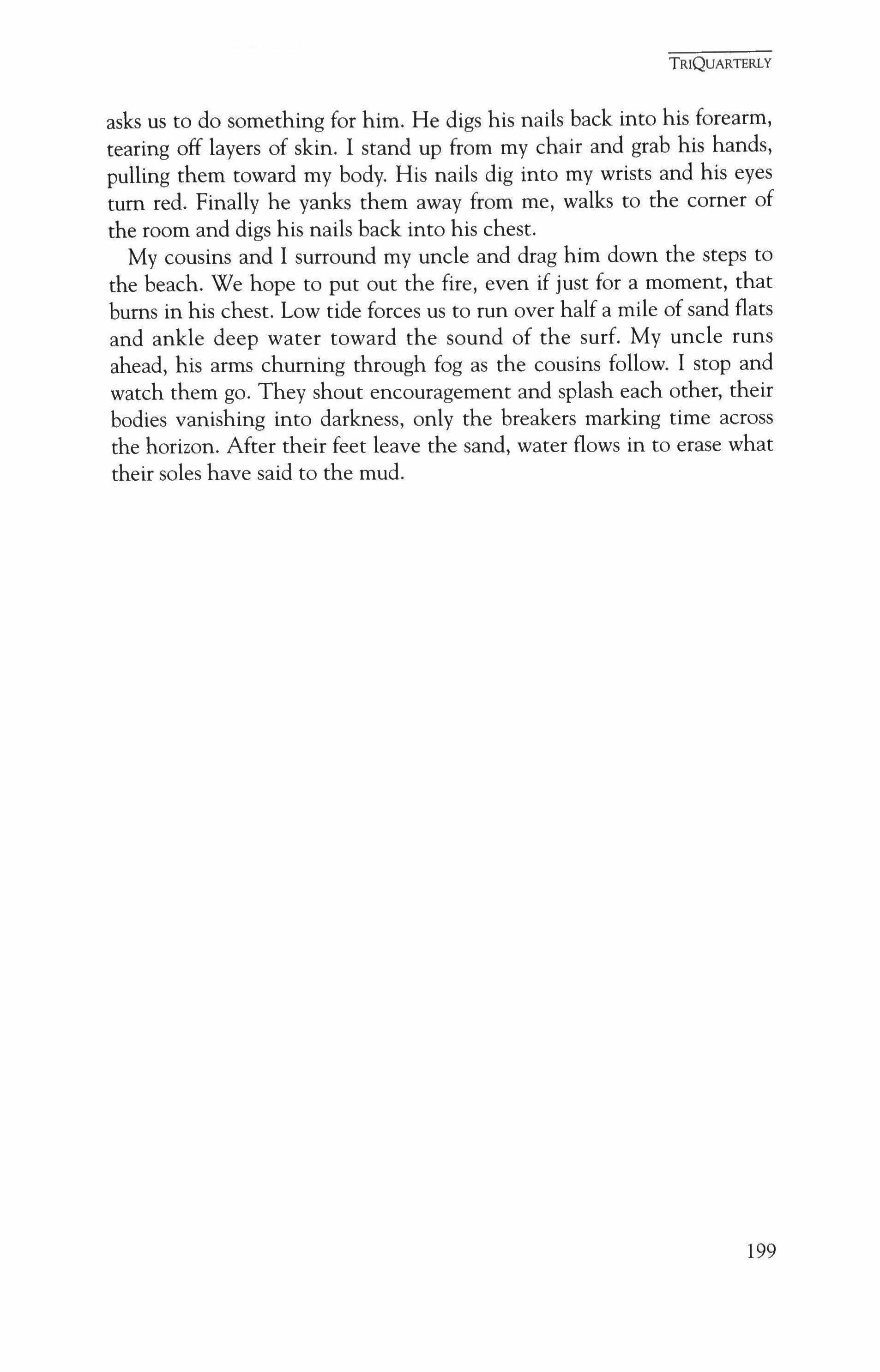
asks us to do something for him. He digs his nails back into his forearm, tearing off layers of skin. I stand up from my chair and grab his hands, pulling them toward my body. His nails dig into my wrists and his eyes tum red. Finally he yanks them away from me, walks to the comer of the room and digs his nails back into his chest.
My cousins and I surround my uncle and drag him down the steps to the beach. We hope to put out the fire, even if just for a moment, that bums in his chest. Low tide forces us to run over half a mile of sand flats and ankle deep water toward the sound of the surf. My uncle runs ahead, his arms churning through fog as the cousins follow. I stop and watch them go. They shout encouragement and splash each other, their bodies vanishing into darkness, only the breakers marking time across the horizon. After their feet leave the sand, water flows in to erase what their soles have said to the mud.
TRIQUARTERLY
199
No Sorry
Catherine Bowman

Do you have any scissors I could borrow? No, I'm sorry I don't. What about a knife? You got any knives? A good paring knife would do or a simple butcher knife or maybe a cleaver? No, sorry all I have is this old bread knife my grandfather used to butter his bread with every morning. Well then, how about a hand drill or hammer, a bike chain, or some barbed wire? You got any rusty razor,edged barbed wire? You got a chain saw? No, sorry I don't. Well then maybe you might have some sticks? I'm sorry, I don't have any sticks. How about some stones? No, I don't have any sticks or stones. Well how about a stone tied to a stick? You mean a club? Yeah, a club. You got a club? No, sorry, I don't have any clubs. What about some fighting picks, war axes, military forks, or tomahawks? No, sorry, I don't have any kind of war fork, axe, or tomahawk. What about a morning star? A morning star? Yeah, you know, those spiked ball and chains they sell for riot control. No, nothing like that. Sorry. Now, I know you said you don't have a knife except for that dull old thing your grandfather used to butter his bread with every morning and he passed down to you but I thought maybe you just might have an Australian dagger with a quartz blade and a wood handle, or a bone dagger, or a Bowie, you know it doesn't hurt to ask? Or perhaps one of those lethal multipurpose stilettos? No, sorry. Or maybe you have a simple blow pipe? Or a complex airgun? No, I don't have a simple blow pipe or a complex airgun. Well then maybe you have a jungle carbine, a Colt, a revolver, a Ruger, an axis bolt,action repeating rifle with telescopic sight for sniping,
TRIQUARTERLY
200

a sawed,off shotgun? Or better yet, a gas'operated self,loading fully automatic assault weapon? No, sorry I don't. How about a hand grenade? No. How about a tank? No. Shrapnel? No. Napalm? No. Napalm 2. No, sorry I don't. Let me ask you this. Do you have any intercontinental ballistic missiles? Or submarine, launched cruise missiles? Or multiple independently targeted reentry missiles? Or terminally guided anti-tank shells or projectiles? Let me ask you this. Do you have any fission bombs or hydrogen bombs? Do you have any thermonuclear warheads? Got any electronic measures or electronic counter,measures or electronic counter-counter-measures? Got any biological weapons or germ warfare, preferably in aerosol form? Got any enhanced tactical neutron lasers emitting massive doses of whole-body gamma radiation? Wait a minute. Got any plutonium? Got any chemical agents, nerve agents, blister agents, you know, like mustard gas, any choking agents or incapacitating agents or toxin agents? Well I'm not sure. What do they look like? Liquid vapor powder colorless gas. Invisible. I'm not sure. What do they smell like? They smell like fruit, garlic, fish or soap, new,mown hay, apple blossoms, or like those little green peppers that your grandfather probably would tend to in his garden every morning after he buttered his bread with that old bread knife that he passed down to you.
TRIQUARTERLY
201
Stalks and barn, Chelberg farm, near Indiana Dunes National Park
Two Poems
David Breskin
Evidence of Bear
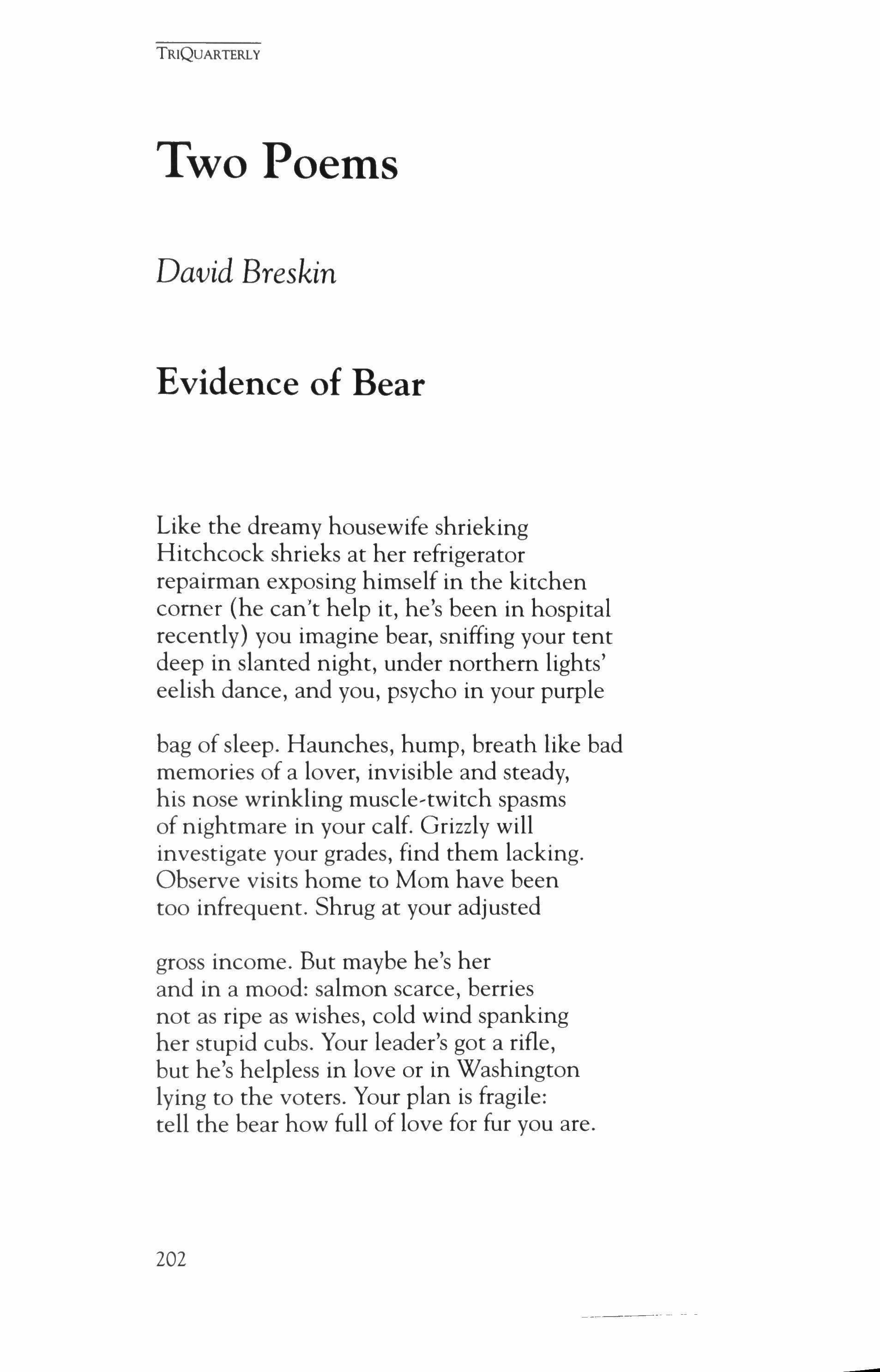
Like the dreamy housewife shrieking Hitchcock shrieks at her refrigerator repairman exposing himself in the kitchen comer (he can't help it, he's been in hospital recently) you imagine bear, sniffing your tent deep in slanted night, under northern lights' eelish dance, and you, psycho in your purple bag of sleep. Haunches, hump, breath like bad memories of a lover, invisible and steady, his nose wrinkling muscle-twitch spasms of nightmare in your calf. Grizzly will investigate your grades, find them lacking. Observe visits home to Mom have been too infrequent. Shrug at your adjusted
gross income. But maybe he's her and in a mood: salmon scarce, berries not as ripe as wishes, cold wind spanking her stupid cubs. Your leader's got a rifle, but he's helpless in love or in Washington lying to the voters. Your plan is fragile: tell the bear how full of love for fur you are.
TRIQUARTERLY
202
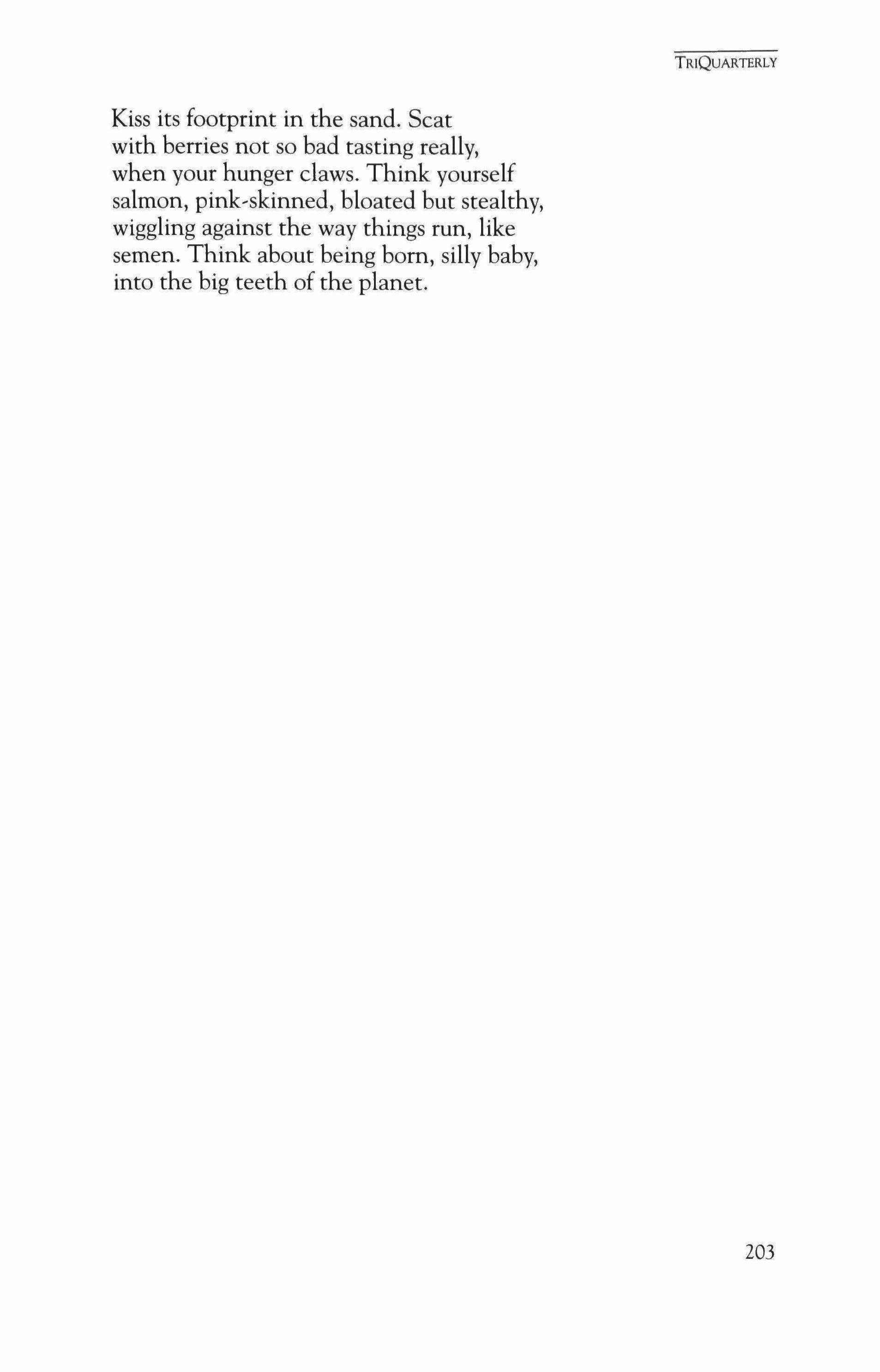
Kiss its footprint in the sand. Scat with berries not so bad tasting really, when your hunger claws. Think yourself salmon, pink-skinned, bloated but stealthy, wiggling against the way things run, like semen. Think about being born, silly baby, into the big teeth of the planet.
TRIQUARTERLY
203

The Day I Take Her to the Hospital
is the day she needs me to help her move into her seventh apartment of the decade. What a male partner did or didn't do to her
at the firm has sent her over the cliff she's always driven close to the edge of, thick wind in her blonde piled tangles, skinned knees from bumping into things, paranoia. I've grown accustomed to your Mace is what I say when her purse spills open and deltas everything onto the stained rug. We make three sweaty trips, stuffing my car to its gills, poking through the sun
roof. Her glassy eyes and quivering bottom lip suggest restrained fear but her closets cry hysterical: hand-me-downs of sister and neverworn pouffy dresses of mom, old crinkled plastic bags of golf balls and tees (two lessons four years ago), thirty,three
pairs of shoes (two of the steep red fuck-rne variety), brown garbage bags full of old blouses, modems, small unmarked samples
from famous bodies (the Colorado, the Coruh, the Urubamba, the Alsek, the Antarctic Sea) in antique bottles with chipped stoppers, ultra-slim feminine hygiene products, dog,eared gifts I gave her. She shows me a huge potato shaped like a heart she's been secretly saving
TRIQUARTERLY
204
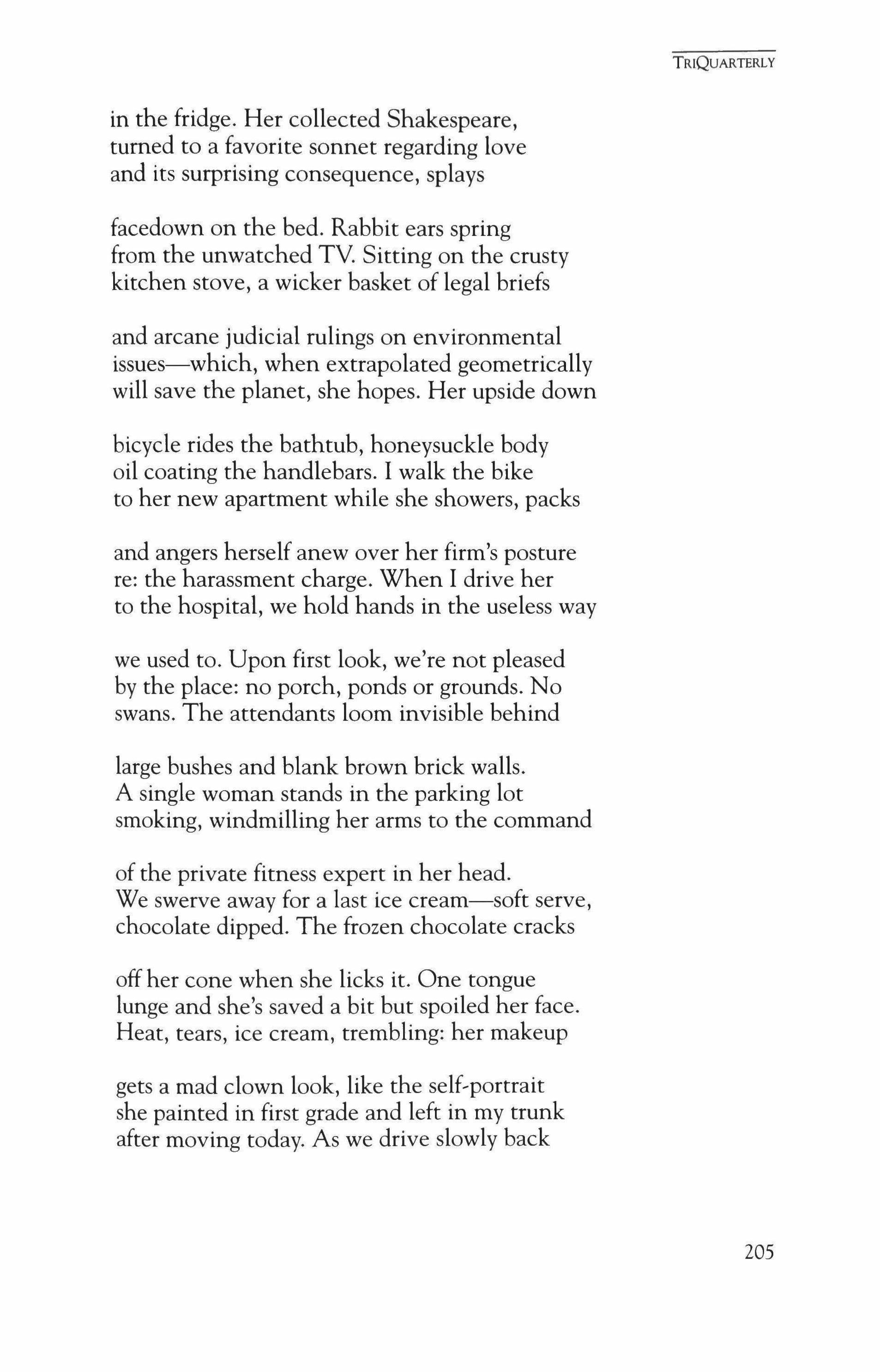
in the fridge. Her collected Shakespeare, turned to a favorite sonnet regarding love and its surprising consequence, splays
facedown on the bed. Rabbit ears spring from the unwatched TV. Sitting on the crusty kitchen stove, a wicker basket of legal briefs and arcane judicial rulings on environmental issues-which, when extrapolated geometrically will save the planet, she hopes. Her upside down bicycle rides the bathtub, honeysuckle body oil coating the handlebars. I walk the bike to her new apartment while she showers, packs and angers herself anew over her firm's posture re: the harassment charge. When I drive her to the hospital, we hold hands in the useless way
we used to. Upon first look, we're not pleased by the place: no porch, ponds or grounds. No swans. The attendants loom invisible behind large bushes and blank brown brick walls. A single woman stands in the parking lot smoking, windmilling her arms to the command of the private fitness expert in her head. We swerve away for a last ice cream-soft serve, chocolate dipped. The frozen chocolate cracks
off her cone when she licks it. One tongue lunge and she's saved a bit but spoiled her face. Heat, tears, ice cream, trembling: her makeup
gets a mad clown look, like the self-portrait she painted in first grade and left in my trunk after moving today. As we drive slowly back
TRIQUARTERLY 205
TRIQUARTERLY

to the hospital, I clean her mouth's corners with an index finger of my spit. We park and sit in the blasting sun, criticizing
the lack of swans. I walk her baggage in and hug her goodbye just as the clipboards come marching down the hall to get her.
206
Roots of sequoia, Yosemite National Park
Revelation
Richard Chess
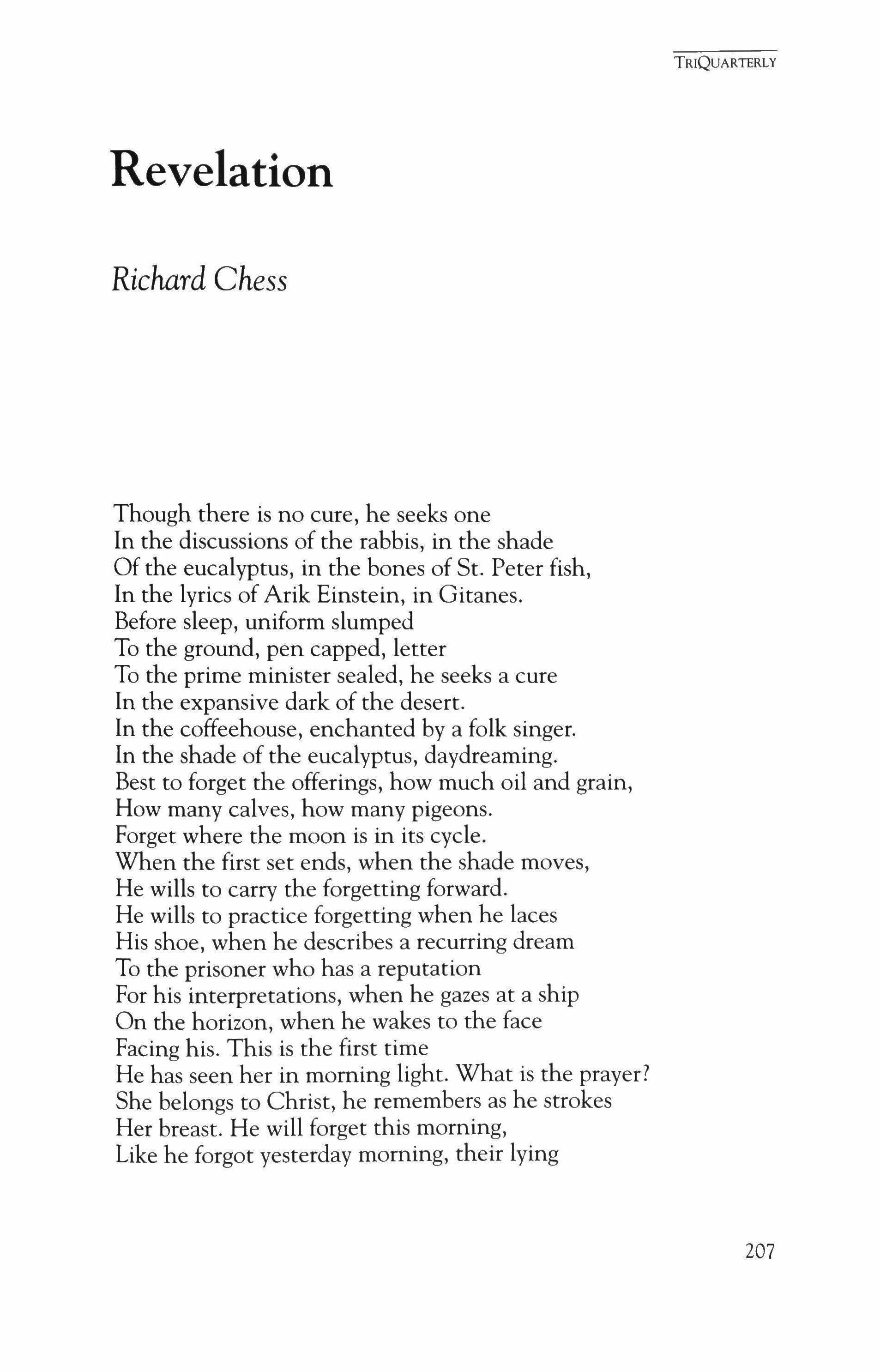
Though there is no cure, he seeks one
In the discussions of the rabbis, in the shade
Of the eucalyptus, in the bones of St. Peter fish,
In the lyrics of Arik Einstein, in Gitanes.
Before sleep, uniform slumped
To the ground, pen capped, letter
To the prime minister sealed, he seeks a cure
In the expansive dark of the desert.
In the coffeehouse, enchanted by a folk singer.
In the shade of the eucalyptus, daydreaming.
Best to forget the offerings, how much oil and grain, How many calves, how many pigeons.
Forget where the moon is in its cycle.
When the first set ends, when the shade moves,
He wills to carry the forgetting forward.
He wills to practice forgetting when he laces
His shoe, when he describes a recurring dream
To the prisoner who has a reputation
For his interpretations, when he gazes at a ship
On the horizon, when he wakes to the face
Facing his. This is the first time
He has seen her in morning light. What is the prayer?
She belongs to Christ, he remembers as he strokes
Her breast. He will forget this morning, Like he forgot yesterday morning, their lying
TRIQUARTERLY 207
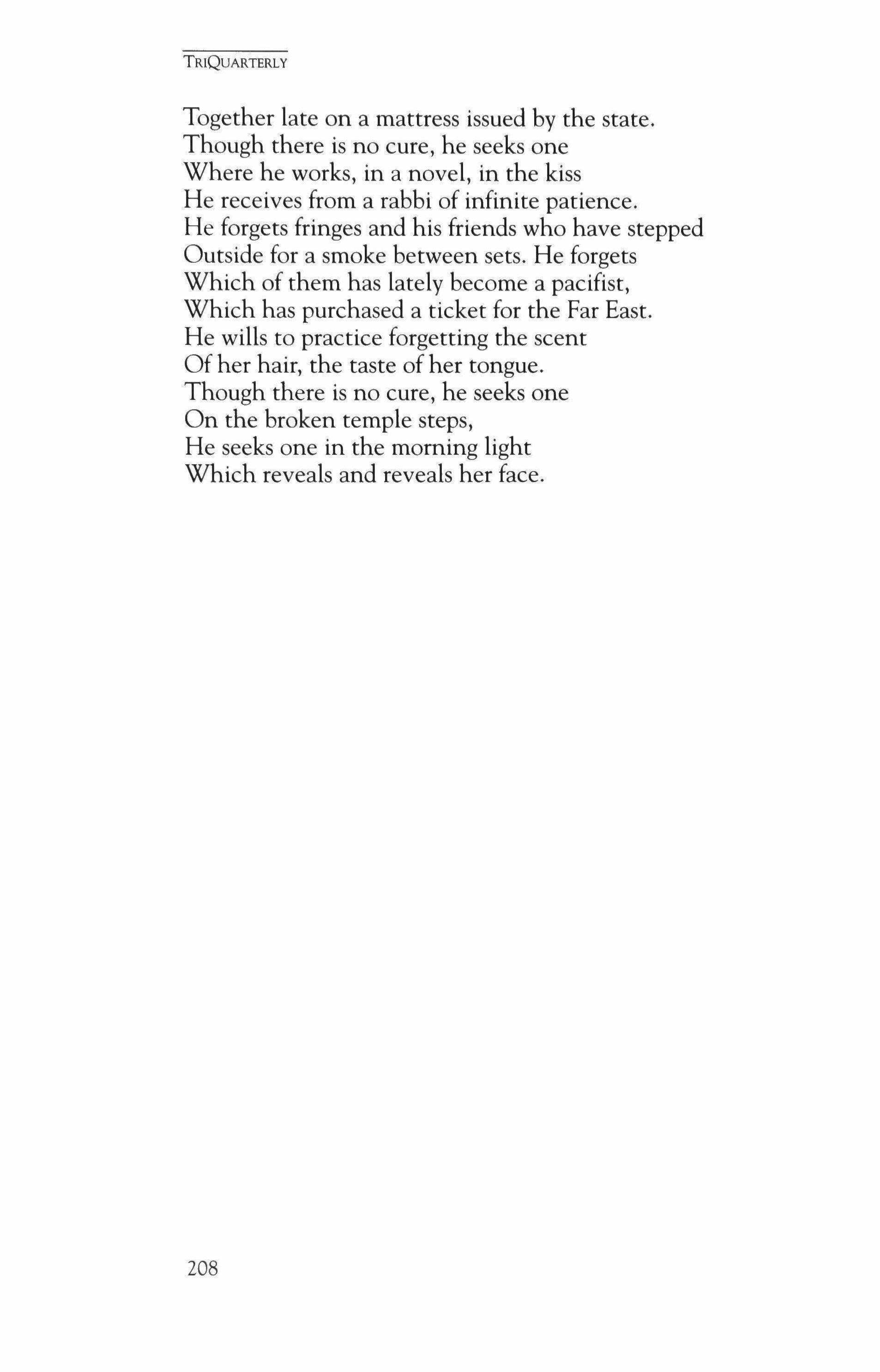
Together late on a mattress issued by the state. Though there is no cure, he seeks one Where he works, in a novel, in the kiss He receives from a rabbi of infinite patience. He forgets fringes and his friends who have stepped Outside for a smoke between sets. He forgets Which of them has lately become a pacifist, Which has purchased a ticket for the Far East. He wills to practice forgetting the scent Of her hair, the taste of her tongue. Though there is no cure, he seeks one On the broken temple steps, He seeks one in the morning light Which reveals and reveals her face.
TRIQUARTERLY
208
Ragtime
David Zivan
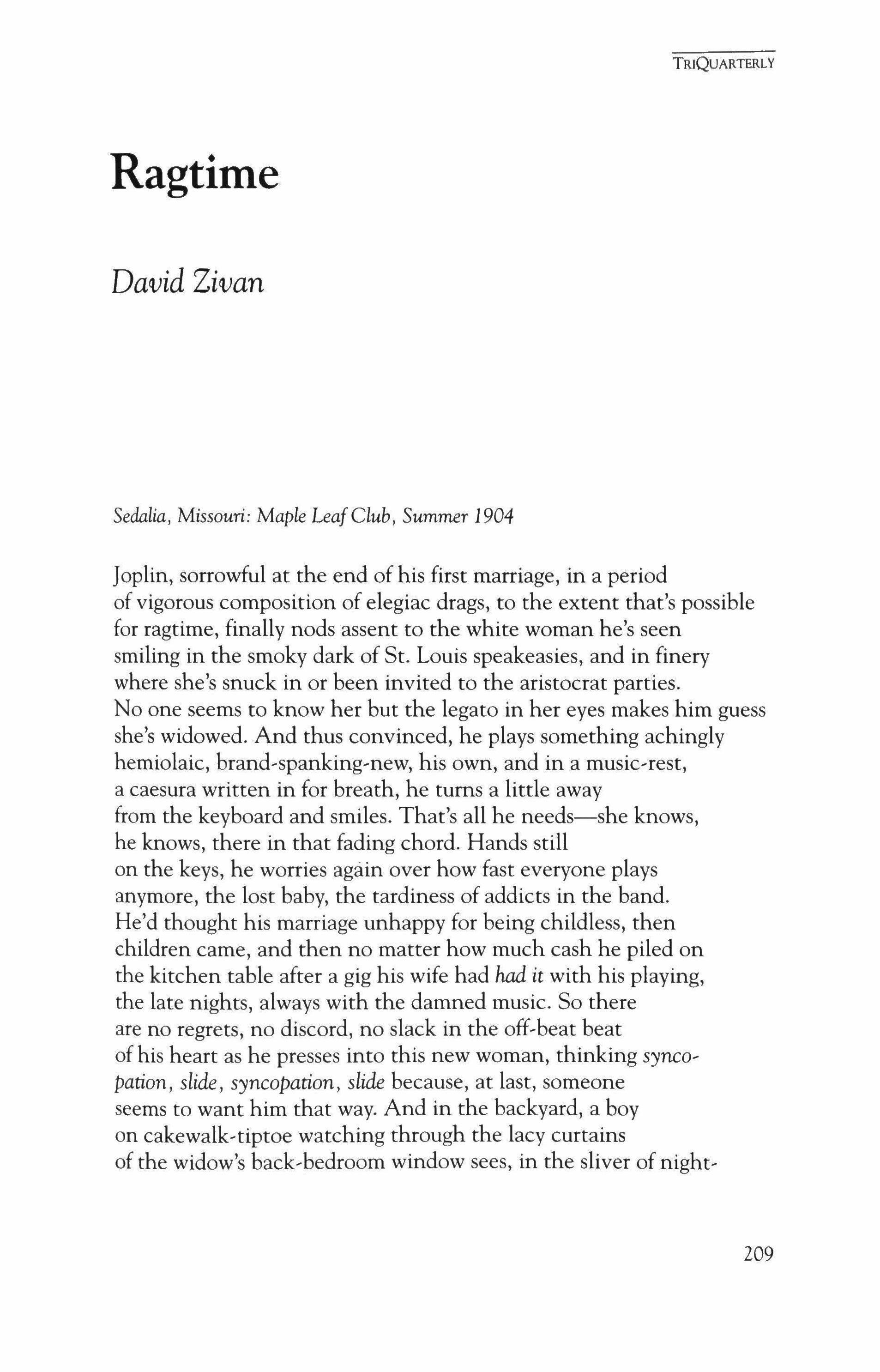
Sedalia, Missouri: Maple LeafClub, Summer 1904
Joplin, sorrowful at the end of his first marriage, in a period of vigorous composition of elegiac drags, to the extent that's possible for ragtime, finally nods assent to the white woman he's seen smiling in the smoky dark of St. Louis speakeasies, and in finery where she's snuck in or been invited to the aristocrat parties. No one seems to know her but the legato in her eyes makes him guess she's widowed. And thus convinced, he plays something achingly hemiolaic, brand-spanking-new, his own, and in a music-rest, a caesura written in for breath, he turns a little away from the keyboard and smiles. That's all he needs-she knows, he knows, there in that fading chord. Hands still on the keys, he worries again over how fast everyone plays anymore, the lost baby, the tardiness of addicts in the band. He'd thought his marriage unhappy for being childless, then children came, and then no matter how much cash he piled on the kitchen table after a gig his wife had had it with his playing, the late nights, always with the damned music. So there are no regrets, no discord, no slack in the off-beat beat of his heart as he presses into this new woman, thinking syncopation, slide, syncopation, slide because, at last, someone seems to want him that way. And in the backyard, a boy on cakewalk-tiptoe watching through the lacy curtains of the widow's back-bedroom window sees, in the sliver of night-
TRIQUARTERLY
209
TRIQUARTERLY

after-the-new-moon moonlight only the paleness of her, covered here and there with shadow, a fitful liquid blackness covering first one breast, then the other, then opening her mouth. Then somehow raising her legs into crazy dancing. He'd have thought it was a devil but for the soft breathing and how, later, all three knew it as their only pleasure that hot season excepting the cool World's Fair fountains, 200 miles east, which each had seen, and one had written music for.
210
Holy Name Cathedral organ pipes, Chicago
Three Poems
Ann Townsend
First Death
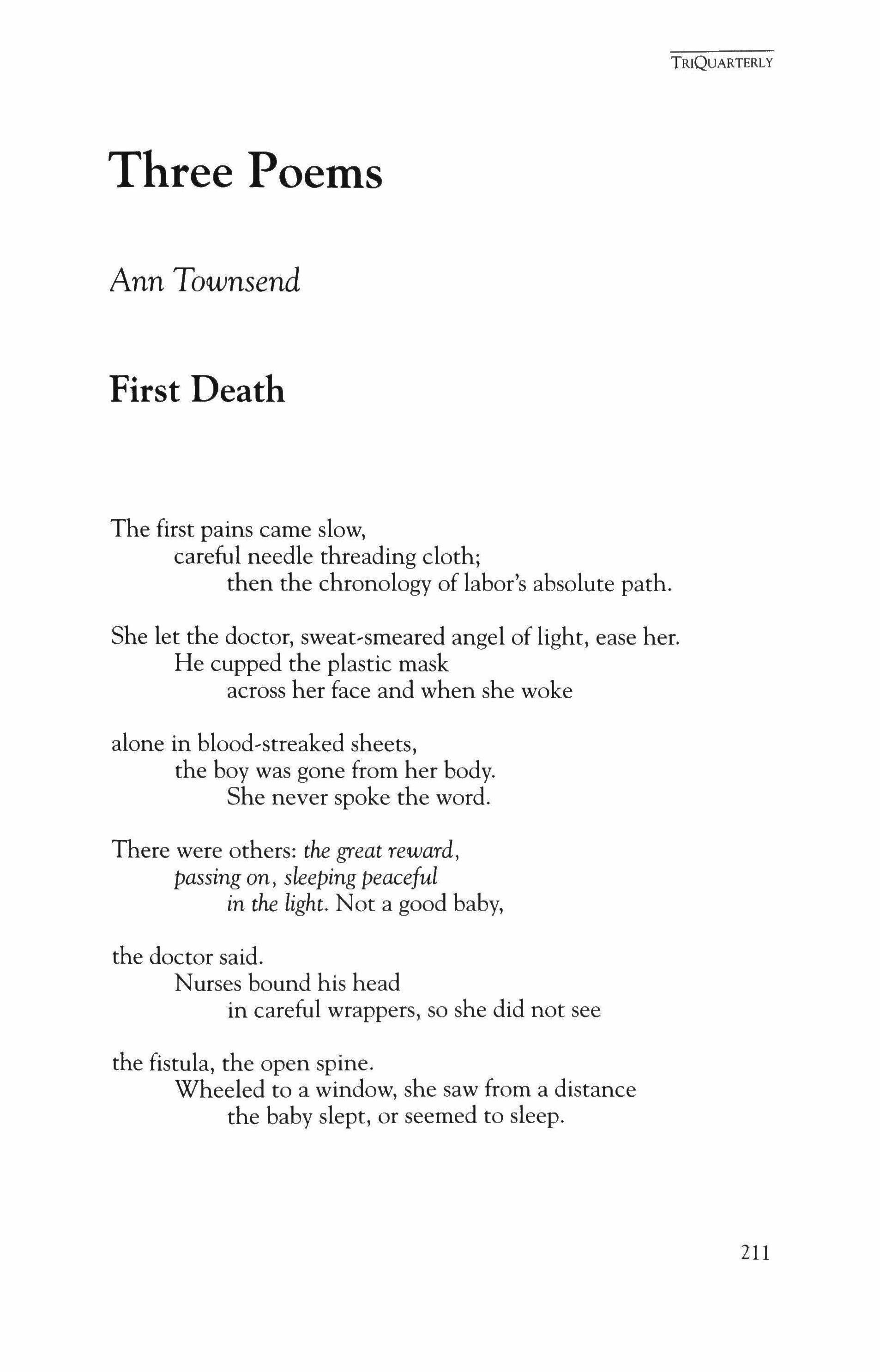
The first pains came slow, careful needle threading cloth; then the chronology of labor's absolute path.
She let the doctor, sweat-smeared angel of light, ease her. He cupped the plastic mask across her face and when she woke alone in blood-streaked sheets, the boy was gone from her body. She never spoke the word.
There were others: the great reward, passing on, sleepingpeaceful in the light. Not a good baby, the doctor said. Nurses bound his head in careful wrappers, so she did not see the fistula, the open spine. Wheeled to a window, she saw from a distance the baby slept, or seemed to sleep.
TRIQUARTERLY
211

But, herself, she lived, and later years there were others: living children followed, fat, healthy, heads full of hair. She kept no diary, she kept no record. Even the grave was lost in water-marked files.
But every night, brushing sparks from their fine, wild hair, she cupped the solid mass of each one's skull, its declivities, its secret provinces, its skin and hair grown out of nakedness toward joy. And that was her sorrow.
TRIQUARTERLY
212
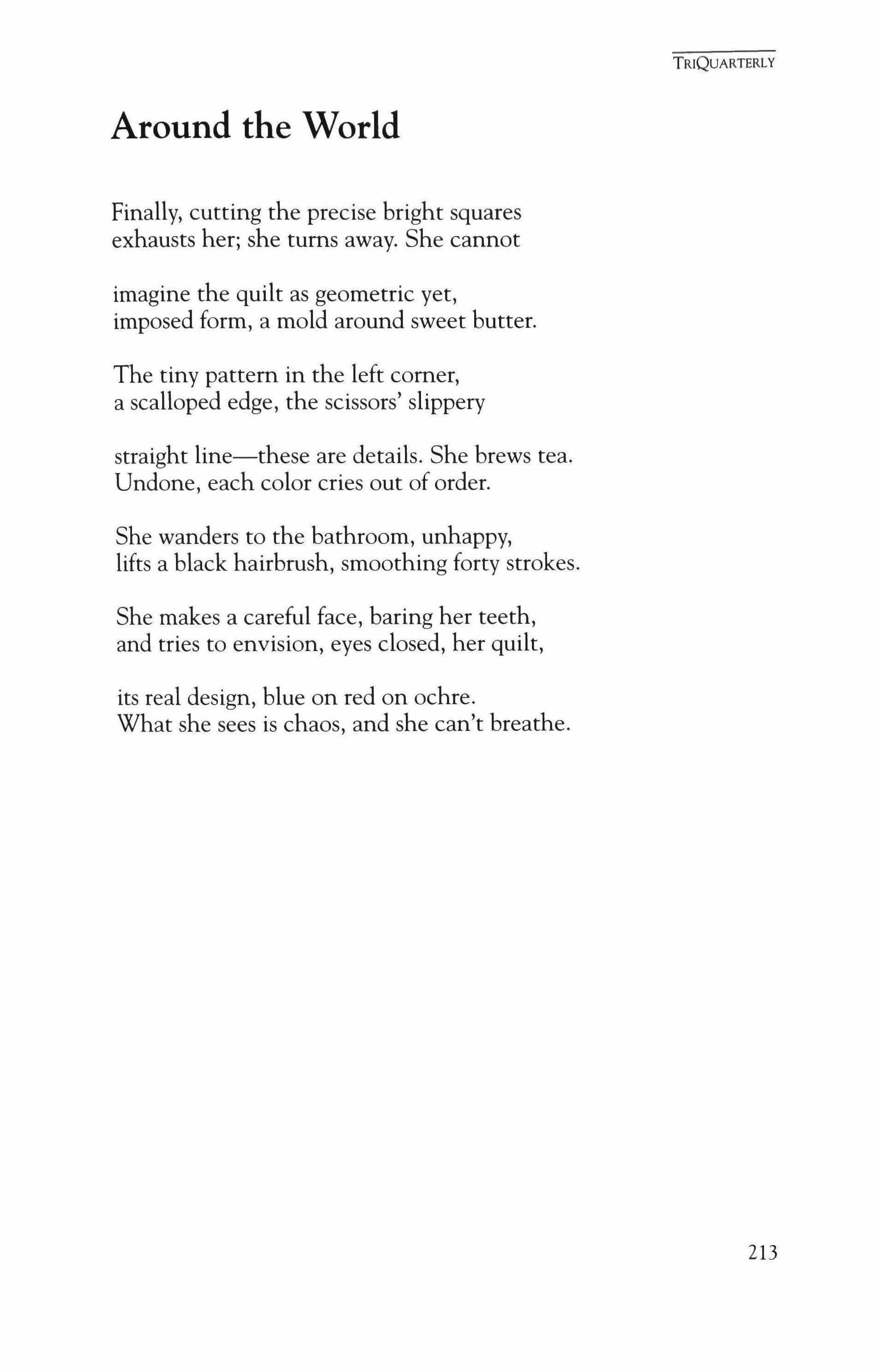
Around the World
Finally, cutting the precise bright squares exhausts her; she turns away. She cannot
imagine the quilt as geometric yet, imposed form, a mold around sweet butter.
The tiny pattern in the left comer, a scalloped edge, the scissors' slippery
straight line-these are details. She brews tea. Undone, each color cries out of order.
She wanders to the bathroom, unhappy, lifts a black hairbrush, smoothing forty strokes.
She makes a careful face, baring her teeth, and tries to envision, eyes closed, her quilt, its real design, blue on red on ochre. What she sees is chaos, and she can't breathe.
TRIQUARTERLY 213

First Language
You say hi to the soft face of the TV mommy who sings and scrubs a kitchen while her boys track mud again across the floor. This spring black ants soldier in busy pairs beneath the doorframes, harbingers of rain, and you've lifted one to your lips before I can see what's wrong as you cry hi, hi, hi and paw your tongue with helpless hands. I see the ant stapled hard to your tongue. He won't come loose. I doctor you with cups of water; you gag, wail, laugh. It's fun to cough. Nearly, you forget the ant. He doesn't forget you. Only with tweezers does he detach, piece by piece from your tongue, until at last the dark head and sharp pincers are left behind, sour dot, raisin you cannot eat, here at the center of our insufficiency, the new syllables breaking from your mouth.
TRIQUARTERLY
214
The Widow
Alan Michael Parker
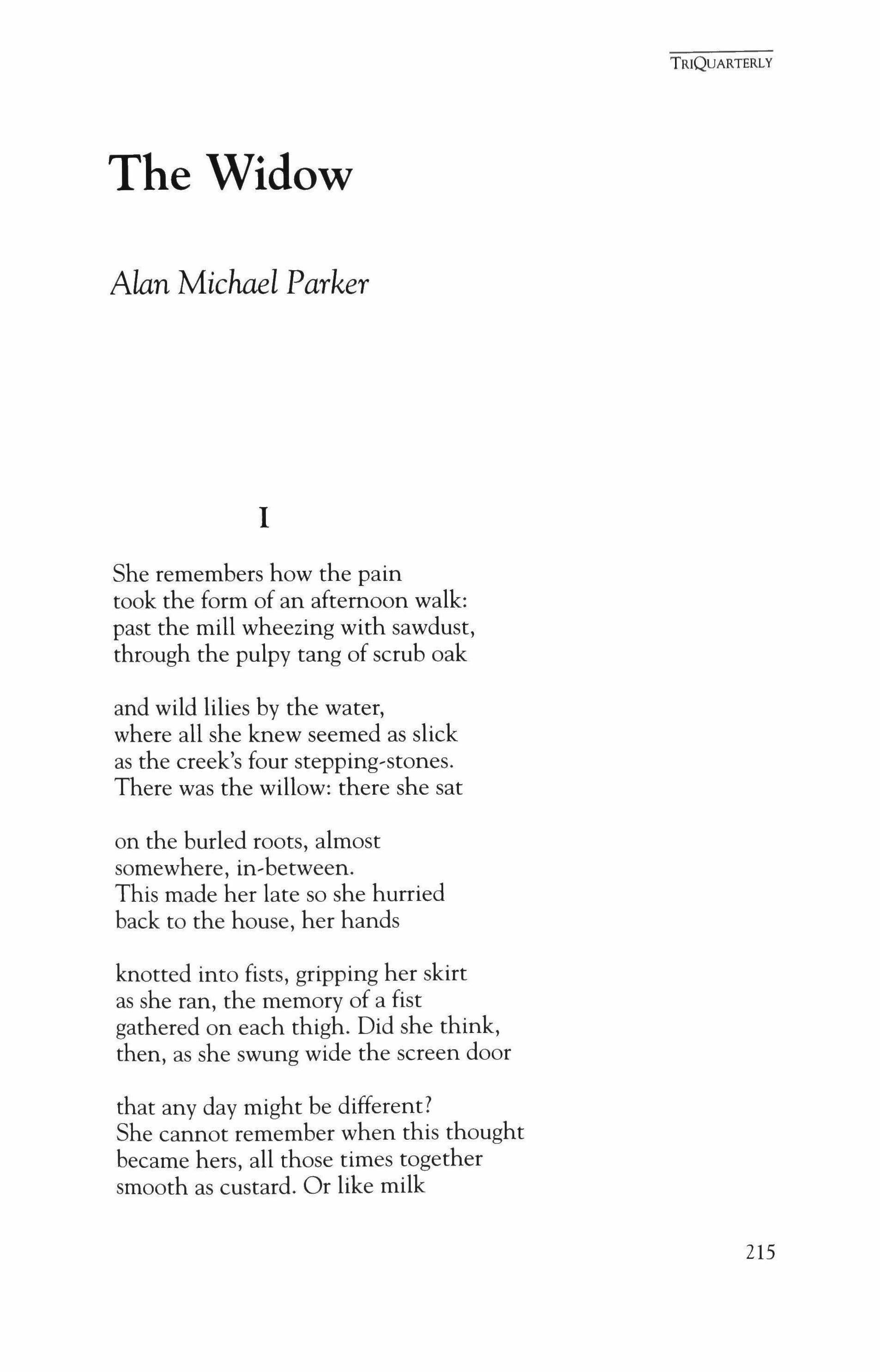
IShe remembers how the pain took the form of an afternoon walk: past the mill wheezing with sawdust, through the pulpy tang of scrub oak and wild lilies by the water, where all she knew seemed as slick as the creek's four stepping-stones. There was the willow: there she sat on the burled roots, almost somewhere, in-between. This made her late so she hurried back to the house, her hands
knotted into fists, gripping her skirt as she ran, the memory of a fist gathered on each thigh. Did she think, then, as she swung wide the screen door that any day might be different? She cannot remember when this thought became hers, all those times together smooth as custard. Or like milk
TRIQUARTERLY
215
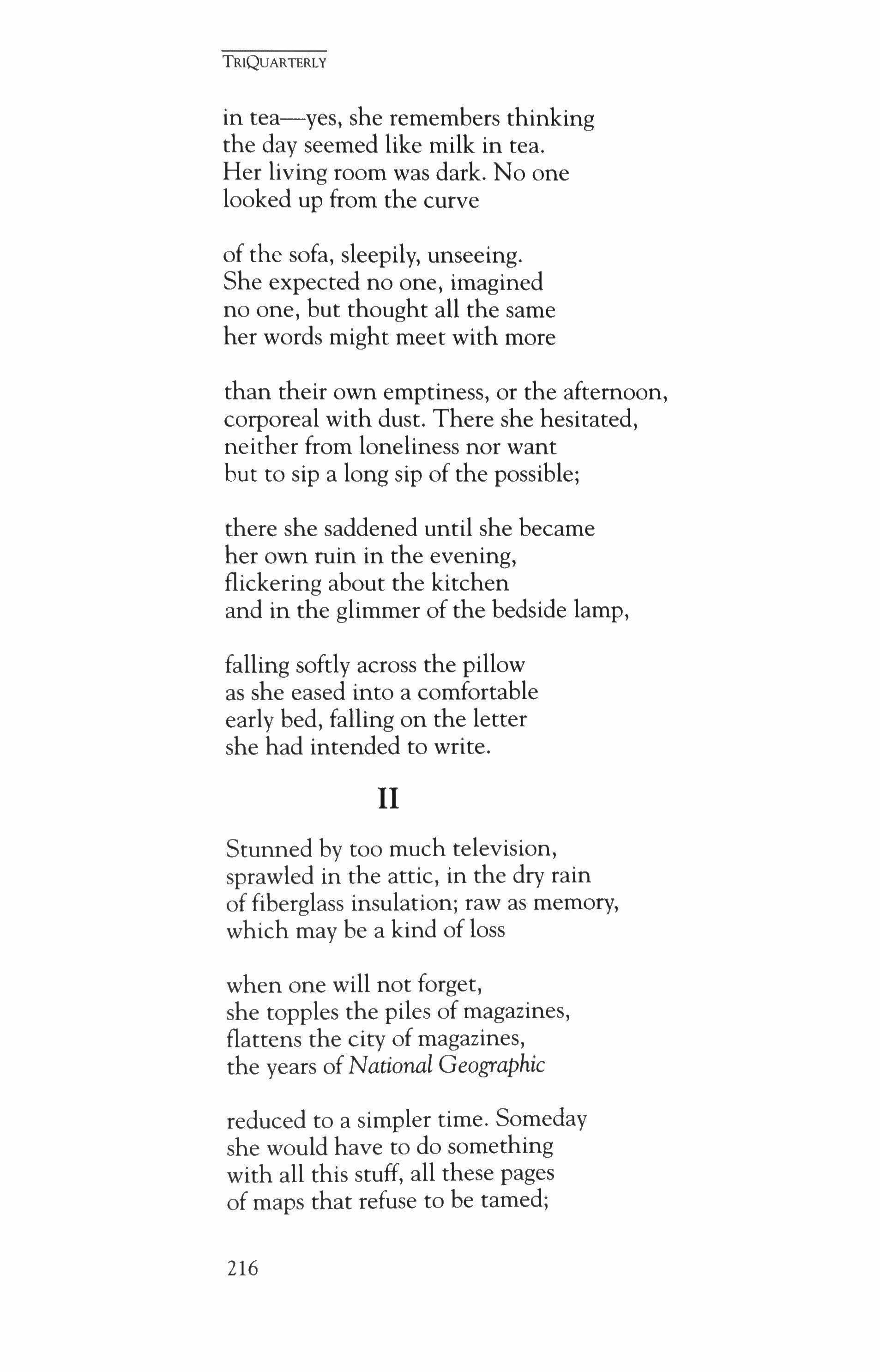
in tea-yes, she remembers thinking the day seemed like milk in tea. Her living room was dark. No one looked up from the curve of the sofa, sleepily, unseeing. She expected no one, imagined no one, but thought all the same her words might meet with more than their own emptiness, or the afternoon, corporeal with dust. There she hesitated, neither from loneliness nor want but to sip a long sip of the possible;
there she saddened until she became her own ruin in the evening, flickering about the kitchen and in the glimmer of the bedside lamp,
falling softly across the pillow as she eased into a comfortable early bed, falling on the letter she had intended to write.
II
Stunned by too much television, sprawled in the attic, in the dry rain of fiberglass insulation; raw as memory, which may be a kind of loss when one will not forget, she topples the piles of magazines, flattens the city of magazines, the years ofNational Geographic
reduced to a simpler time. Someday she would have to do something with all this stuff, all these pages of maps that refuse to be tamed;
TRIQUARTERLY
216
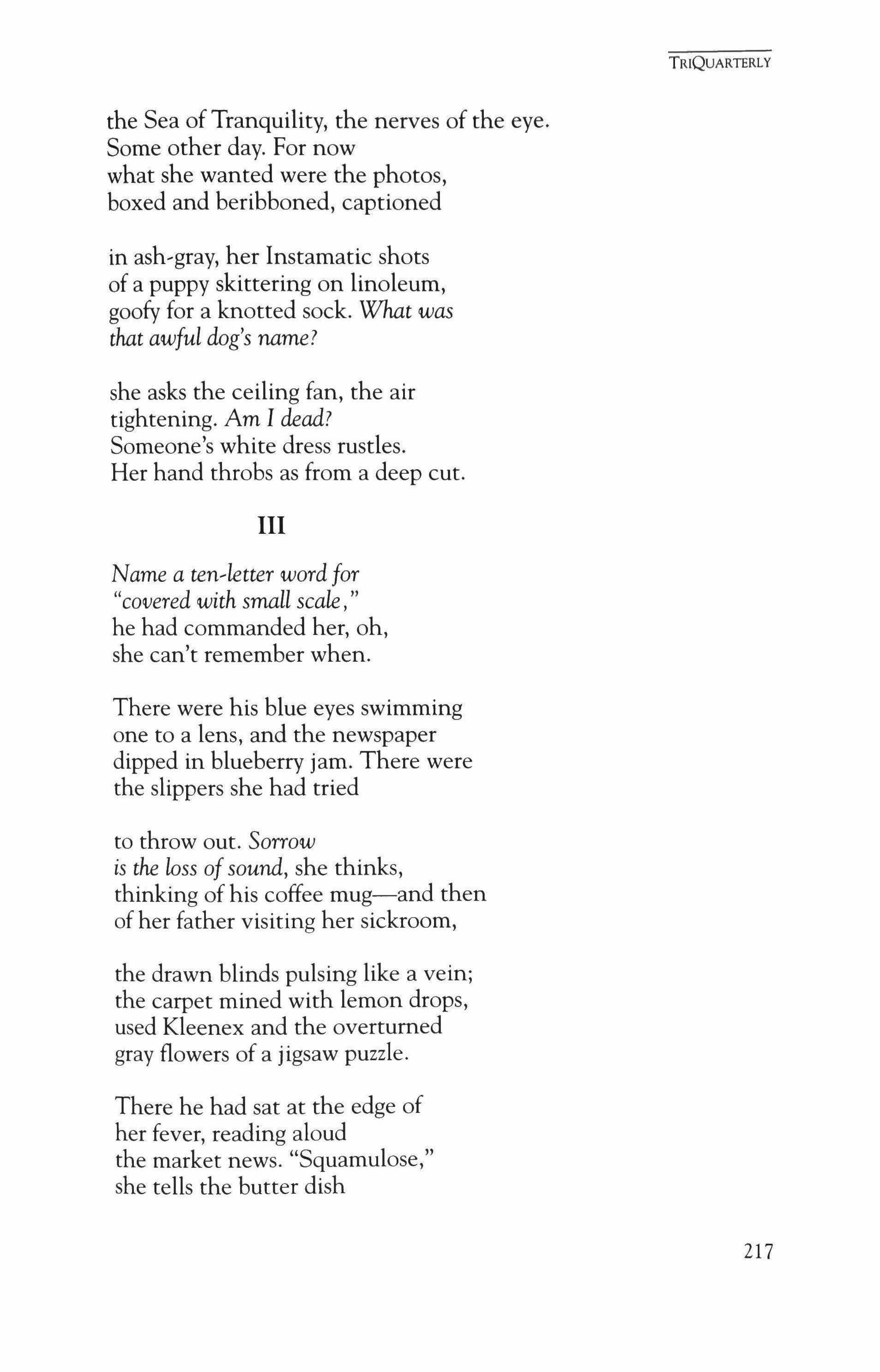
the Sea of Tranquility, the nerves of the eye. Some other day. For now what she wanted were the photos, boxed and beribboned, captioned
in ash-gray, her Instamatic shots of a puppy skittering on linoleum, goofy for a knotted sock. What was that awful dog's name?
she asks the ceiling fan, the air tightening. Am I dead? Someone's white dress rustles. Her hand throbs as from a deep cut.
III
Narne a ten-Ierter word for "covered with small scale, he had commanded her, oh, she can't remember when.
There were his blue eyes swimming one to a lens, and the newspaper dipped in blueberry jam. There were the slippers she had tried
to throw out. Sorrow is the loss ofsound, she thinks, thinking of his coffee mug-and then of her father visiting her sickroom,
the drawn blinds pulsing like a vein; the carpet mined with lemon drops, used Kleenex and the overturned gray flowers of a jigsaw puzzle.
There he had sat at the edge of her fever, reading aloud the market news. "Squamulose," she tells the butter dish
TRIQUARTERLY
217
TRIQUARTERLY

this morning, having looked up the word and found other words: spurtle, sprit and sprink, more emptiness than she knows
how to fill. It feels like living inside a doll, moving a doll's hands. It feels like the summer she was condemned to summercamp,
writing home to tell her parents that she had died. And oh, what a look her father had given her, on Visiting Day -the look she learned to want
from a man, as though through water, the look he gives when making love, the look that quickens as it dies.
218
Sewing place, Old World Wisconsin, near Eagle, Wisconsin
Marsena Sportsman's Club
Joyce Carol Oates
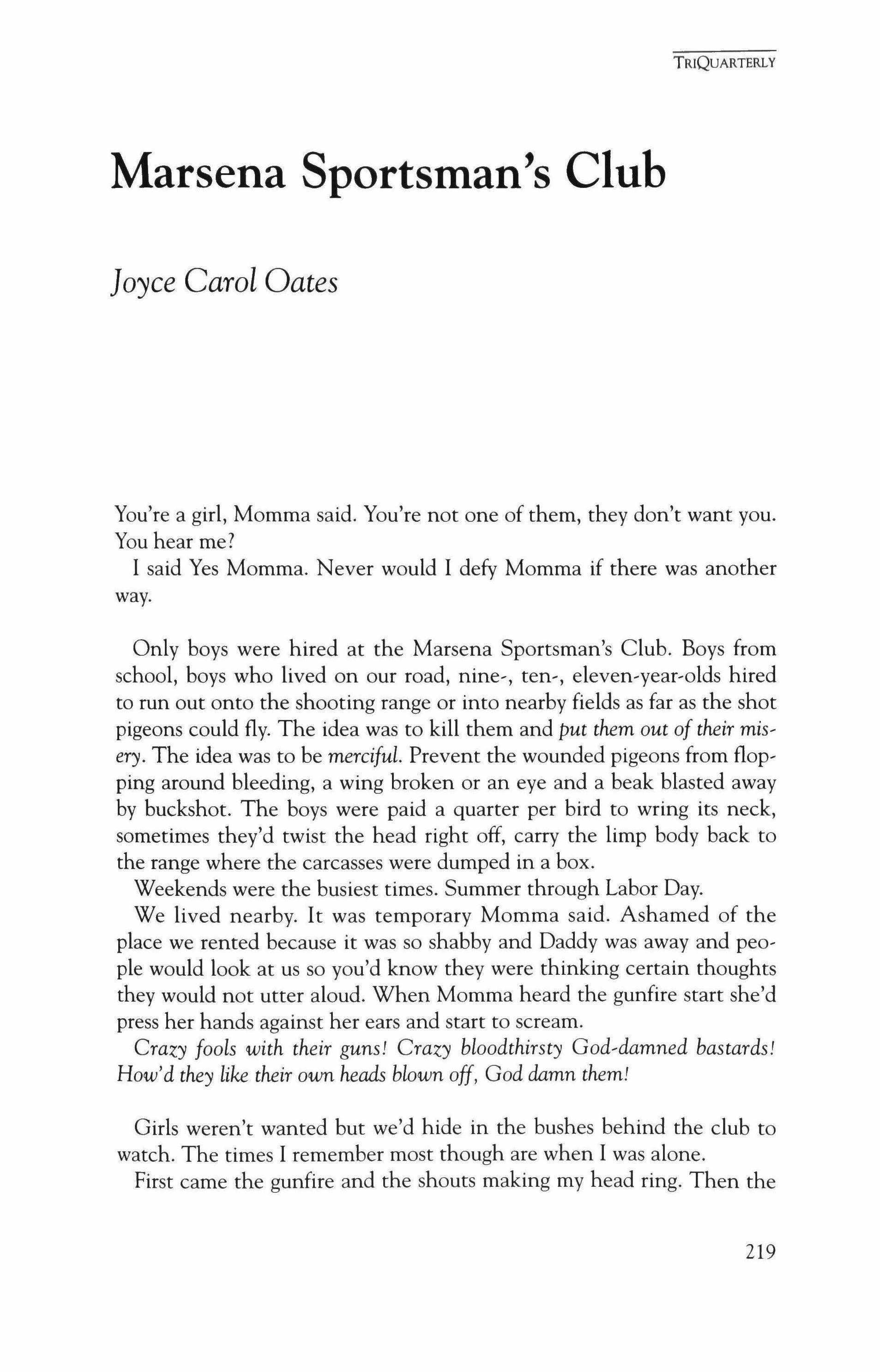
You're a girl, Momma said. You're not one of them, they don't want you. You hear me?
I said Yes Momma. Never would I defy Momma if there was another way.
Only boys were hired at the Marsena Sportsman's Club. Boys from school, boys who lived on our road, nine" ten" eleven-year-olds hired to run out onto the shooting range or into nearby fields as far as the shot pigeons could fly. The idea was to kill them and put them out of their nusery. The idea was to be merciful. Prevent the wounded pigeons from flop, ping around bleeding, a wing broken or an eye and a beak blasted away by buckshot. The boys were paid a quarter per bird to wring its neck, sometimes they'd twist the head right off, carry the limp body back to the range where the carcasses were dumped in a box.
Weekends were the busiest times. Summer through Labor Day. We lived nearby. It was temporary Momma said. Ashamed of the place we rented because it was so shabby and Daddy was away and people would look at us so you'd know they were thinking certain thoughts they would not utter aloud. When Momma heard the gunfire start she'd press her hands against her ears and start to scream.
Crazy fools with their guns! Crazy bloodthirsty God,damned bastards! How'd they like their own heads blown off, God damn them!
Girls weren't wanted but we'd hide in the bushes behind the club to watch. The times I remember most though are when I was alone. First came the gunfire and the shouts making my head ring. Then the
TRIQUARTERLY
219
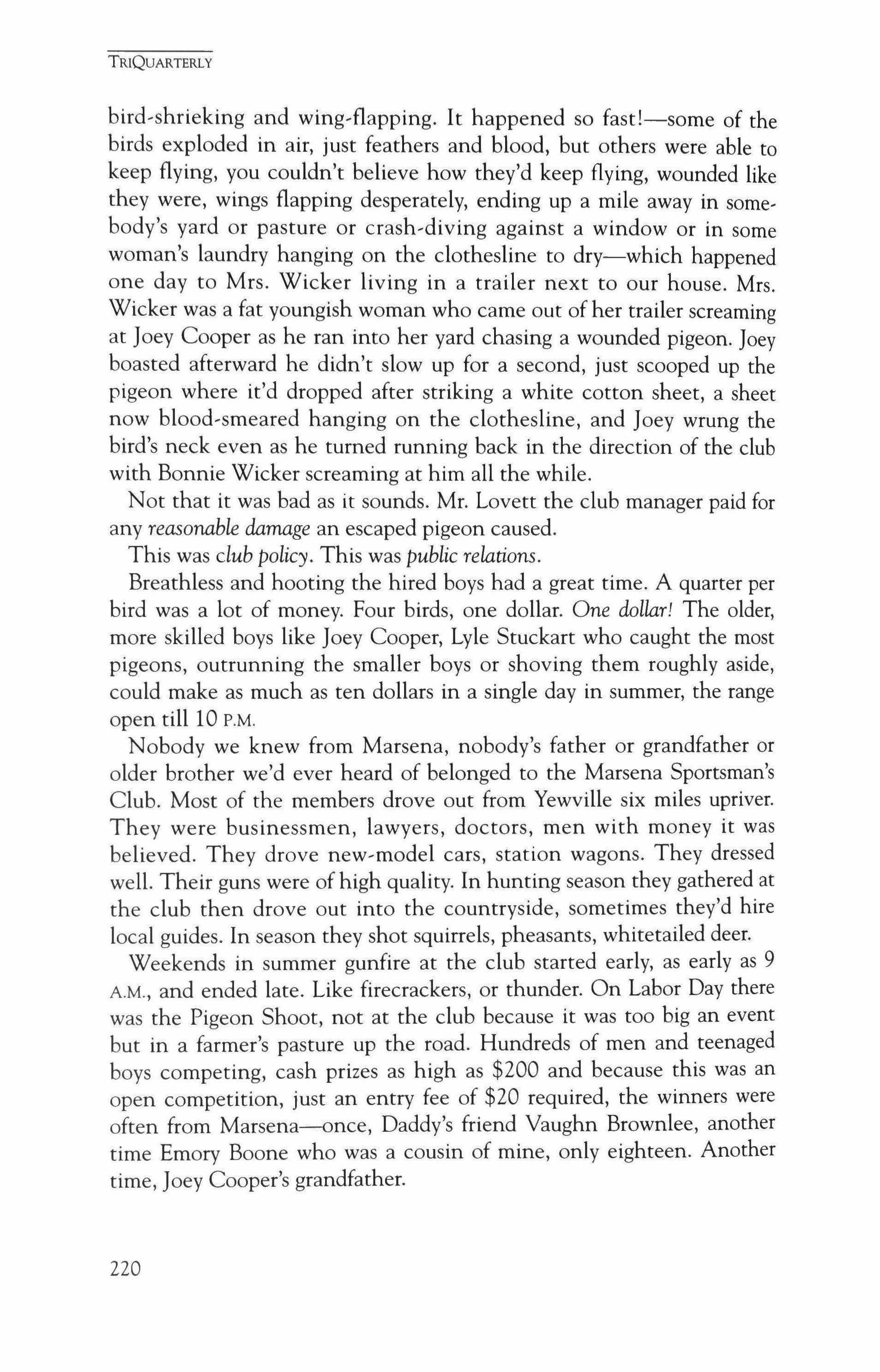
bird-shrieking and wing-flapping. It happened so fast!-some of the birds exploded in air, just feathers and blood, but others were able to keep flying, you couldn't believe how they'd keep flying, wounded like they were, wings flapping desperately, ending up a mile away in some, body's yard or pasture or crash-diving against a window or in some woman's laundry hanging on the clothesline to dry-which happened one day to Mrs. Wicker living in a trailer next to our house. Mrs. Wicker was a fat youngish woman who came out of her trailer screaming at Joey Cooper as he ran into her yard chasing a wounded pigeon. Joey boasted afterward he didn't slow up for a second, just scooped up the pigeon where it'd dropped after striking a white cotton sheet, a sheet now blood-smeared hanging on the clothesline, and Joey wrung the bird's neck even as he turned running back in the direction of the club with Bonnie Wicker screaming at him all the while.
Not that it was bad as it sounds. Mr. Lovett the club manager paid for any reasonable damage an escaped pigeon caused.
This was club policy. This was public relations.
Breathless and hooting the hired boys had a great time. A quarter per bird was a lot of money. Four birds, one dollar. One dollar! The older, more skilled boys like Joey Cooper, Lyle Stuckart who caught the most pigeons, outrunning the smaller boys or shoving them roughly aside, could make as much as ten dollars in a single day in summer, the range open till 10 P.M.
Nobody we knew from Marsena, nobody's father or grandfather or older brother we'd ever heard of belonged to the Marsena Sportsman's Club. Most of the members drove out from Yewville six miles upriver. They were businessmen, lawyers, doctors, men with money it was believed. They drove new,model cars, station wagons. They dressed well. Their guns were of high quality. In hunting season they gathered at the club then drove out into the countryside, sometimes they'd hire local guides. In season they shot squirrels, pheasants, whitetailed deer.
Weekends in summer gunfire at the club started early, as early as 9 A.M., and ended late. Like firecrackers, or thunder. On Labor Day there was the Pigeon Shoot, not at the club because it was too big an event but in a farmer's pasture up the road. Hundreds of men and teenaged boys competing, cash prizes as high as $200 and because this was an open competition, just an entry fee of $20 required, the winners were often from Marsena-once, Daddy's friend Vaughn Brownlee, another time Emory Boone who was a cousin of mine, only eighteen. Another time, Joey Cooper's grandfather.
TRIQUARTERLY
220

The winners' pictures were taken and published in the Yewville Journal.
Why do they want to shoot pigeons, I asked Momma and Momma said, They're men. It's what men do when they can't shoot one another. Just don't hang around that damned place, you hear? Momma said. She'd look at me in that way of hers, squinting against the smoke of her cigarette. You promise?
My secret place was on a hill above the club where there was underbrush, sumac and honeysuckle and wild rose and a big fallen-over oak tree rotted and covered in vines and stippled with toadstools that crumbled almost to powder when you touched them. I could hide here behind the tree and not be seen like I was invisible and if a boy came running crashing through the underbrush yelling in pursuit of a wounded pigeon he'd never see me.
Not once did one of them see me. I can dream of it to this day and in my acid-trips I'd be returned there, that tree, crouching behind that tree, but I'd be flying too, flapping my wings rising into the air in just that instant before the crack! of the gun but the buckshot would miss me, or pass through me. Rising to God, feeling God's breath. That sharp smell of gunpowder.
Another thing I can see: in front of the club inside the horseshoe driveway there was a tall metal flagpole, a really tall flagpole you could see from a long distance. When the club was open, the flag was always up. RED WHITE AND BLUE STRIPES blowing in the wind.
It was Joey Cooper I spied on when I could. Even one day in a light drizzle, and another time, after a storm the night before, in wet grass, mud. Joey was eleven years old when I was eight, skinny and fast on his feet as a young deer. He might've been any age, he seemed almost grown-up to me. Him and his brother Floyd I knew from school and from the bus we all had to take into town and back. The boys' mouths grinning, the words that flew from those mouths were fuck, fucker, shit, cocksucker, suck, it sucks, it all sucks and I would shape these words with my lips but never dared utter them aloud even to myself. Momma knew Joey's and Floyd's aunt but warned me to stay away from them, especially don't let them get you alone Momma said. No telling what kids like that might do.
Promise? Momma said holding my shoulders, stooping to peer into my eyes like she was trying to look into the future and I said, Yes Momma I promise.
TRIQUARTERLY
221

Joey Cooper never knew my name nor gave me a second glance, I was too young, but I remember him, always I'll remember him, and the other boys, Floyd Cooper, Lyle Stuckart, a red-haired boy named Willy from the trailer court-their flushed sweaty faces lit up with smiles, fingers gripping lifeless birds, bloodied feathers. Young, I knew not to expect mercy from such hands.
Y
TRIQUARTERL
222
Chapel, Yosemite National Park
Seven Poems
David Wojahn
Rajah in Babylon

We hanged our harps upon the willows in the midst thereof. Psalm 137:2
Rajah doesn't like Nirvana but he seems to tolerate Jimmy Cliff: The Harder They Come is Rachael's little joke, and it's chuffing from her boom box as Rajah paces, his planetary backand-forth, manic orbits, exactly like Rilke's panther. The bars and his stripes run parallel and fuse, head abob like a marionette's, the snare drum of his paws on the cement.
He's fasted for three days, and thinks that Rachael's brought ten pounds of horse meat in her pail, but his flared puzzled nostrils don't smell a thing and Noelle bends down to the tranquilizer gun while Rachael coos endearments meant to slow him down so Noelle will get a decent shot.
Good Rajah Pretty Rajah Big RajahEyes wide, he turns, and Noelle aims and fires
TRIQUARTERLY
223
TRIQUARTERLY
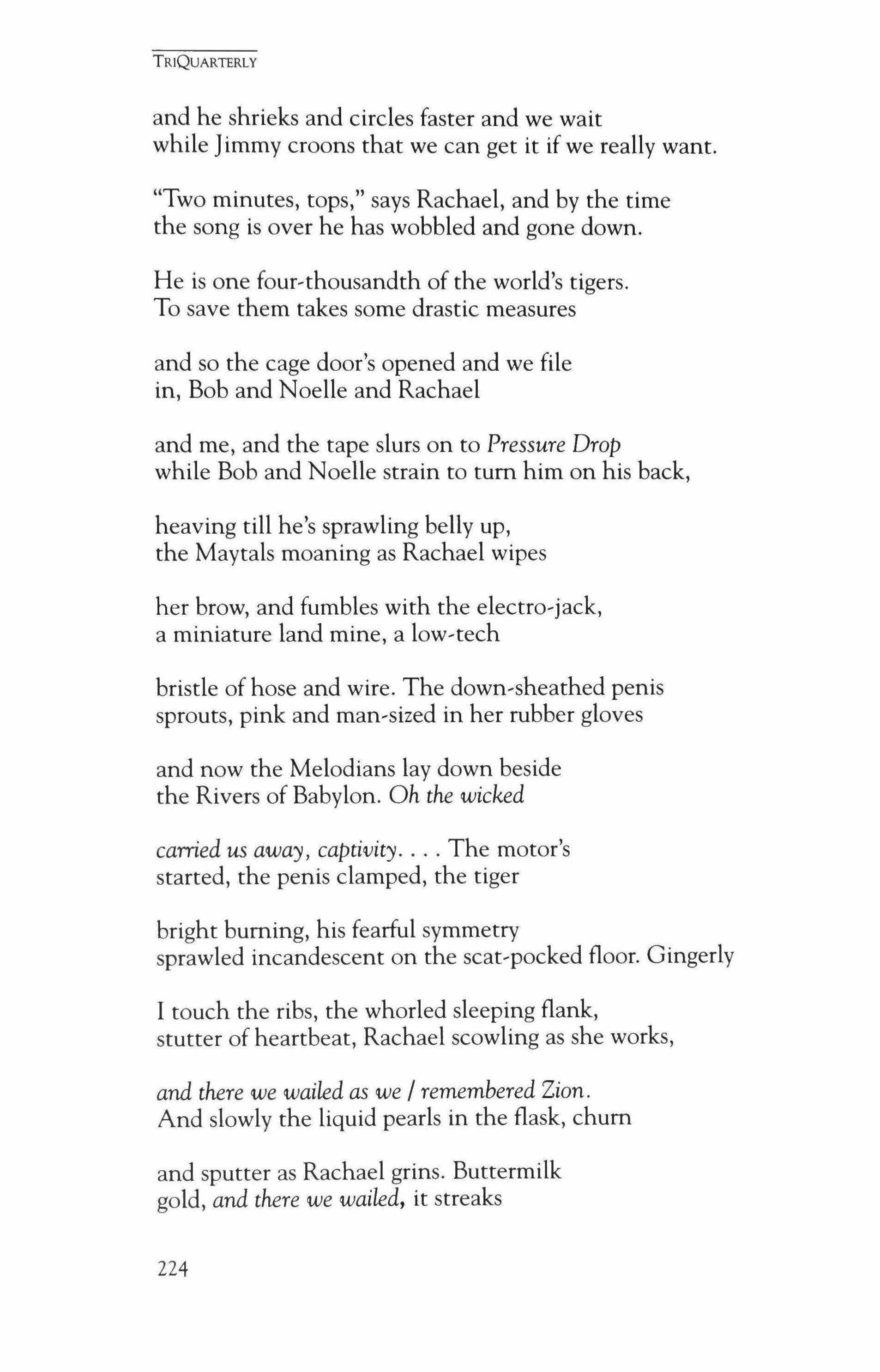
and he shrieks and circles faster and we wait while Jimmy croons that we can get it if we really want.
"Two minutes, tops," says Rachael, and by the time the song is over he has wobbled and gone down.
He is one four,thousandth of the world's tigers. To save them takes some drastic measures
and so the cage door's opened and we file in, Bob and Noelle and Rachael and me, and the tape slurs on to Pressure Drop while Bob and Noelle strain to tum him on his back,
heaving till he's sprawling belly up, the Maytals moaning as Rachael wipes her brow, and fumbles with the electro-jack, a miniature land mine, a low-tech
bristle of hose and wire. The down-sheathed penis sprouts, pink and man-sized in her rubber gloves
and now the Melodians lay down beside the Rivers of Babylon. Oh the wicked carried us away, captivity The motor's started, the penis clamped, the tiger
bright burning, his fearful symmetry sprawled incandescent on the scat-pocked floor. Gingerly
I touch the ribs, the whorled sleeping flank, stutter of heartbeat, Rachael scowling as she works, and there we wailed as we / remembered Zion. And slowly the liquid pearls in the flask, chum and sputter as Rachael grins. Buttermilk gold, and there we wailed, it streaks
224
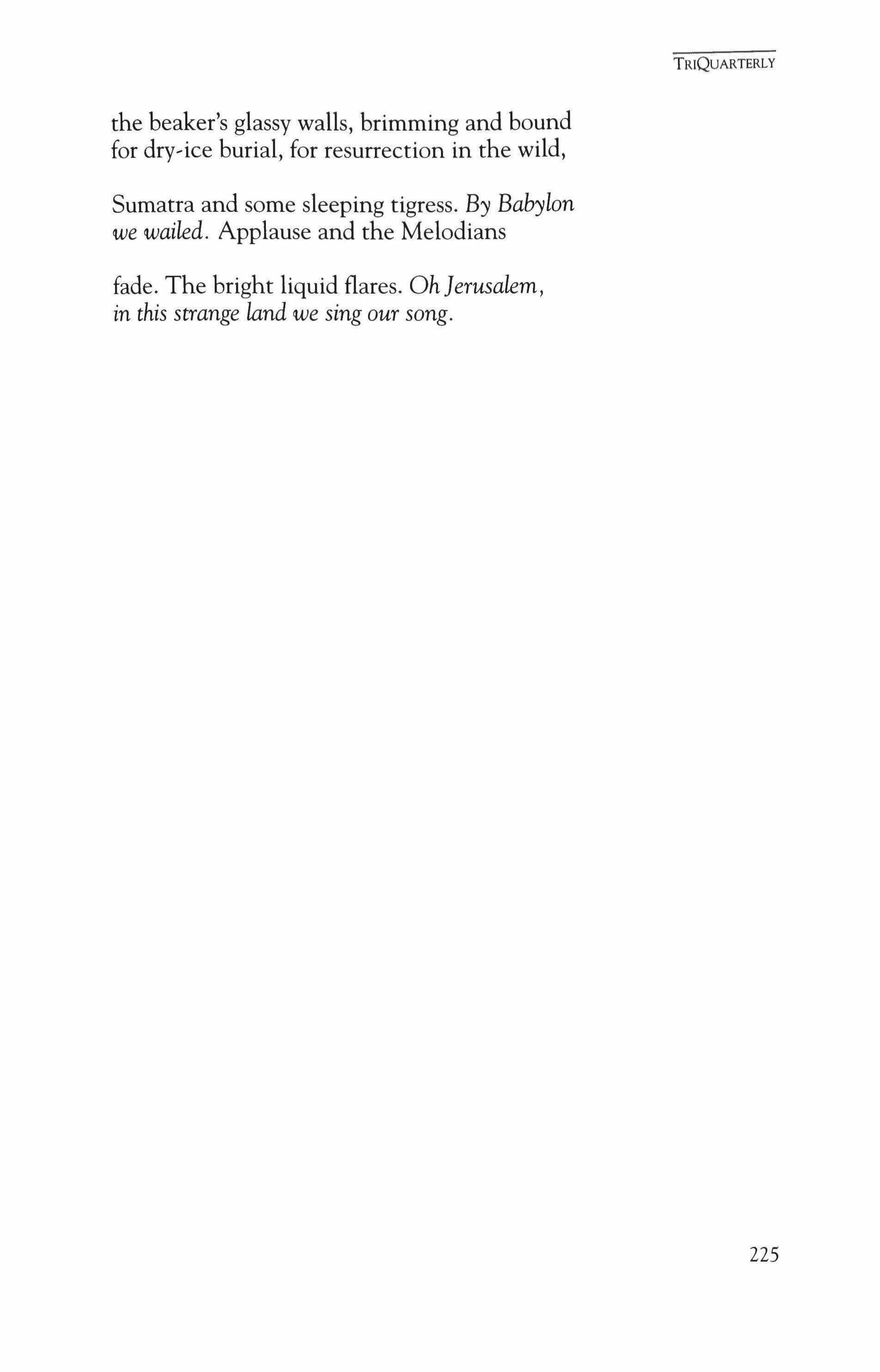
the beaker's glassy walls, brimming and bound for dry-ice burial, for resurrection in the wild,
Sumatra and some sleeping tigress. By Babylon we wailed. Applause and the Melodians
fade. The bright liquid flares. Oh]erusalem, in this strange land we sing our song.
TRIQUARTERLY
225
After Wittgenstein
The girl is bleeding from the shoulders and the face
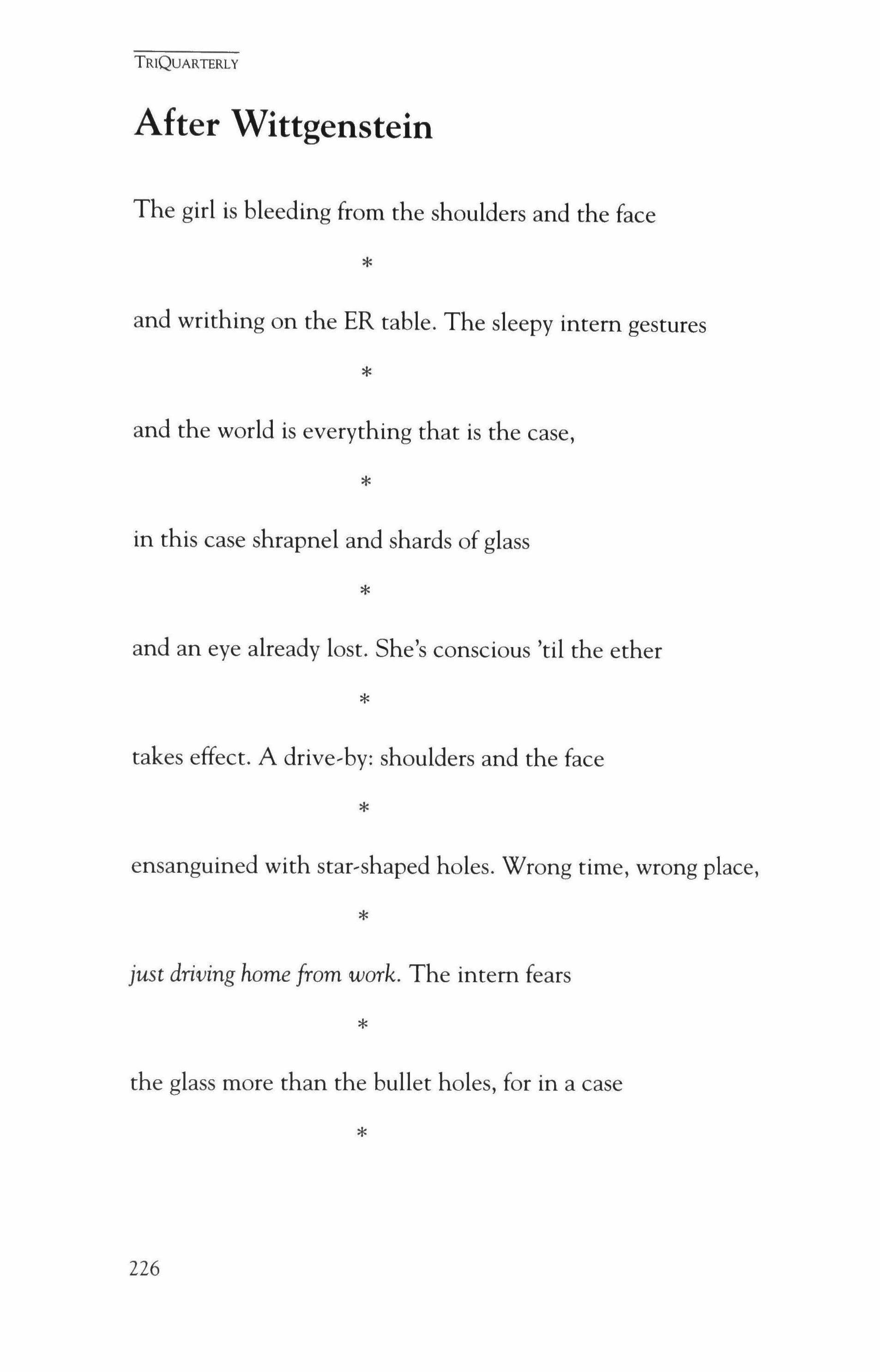
and writhing on the ER table. The sleepy intern gestures
and the world is everything that is the case,
in this case shrapnel and shards of glass
and an eye already lost. She's conscious 'til the ether
takes effect. A drive-by: shoulders and the face
ensanguined with star-shaped holes. Wrong time, wrong place,
just driving home from work. The intern fears
the glass more than the bullet holes, for in a case
TRIQUARTERLY
*
*
*
*
*
*
*
*
* 226
like this the shards can migrate from the face
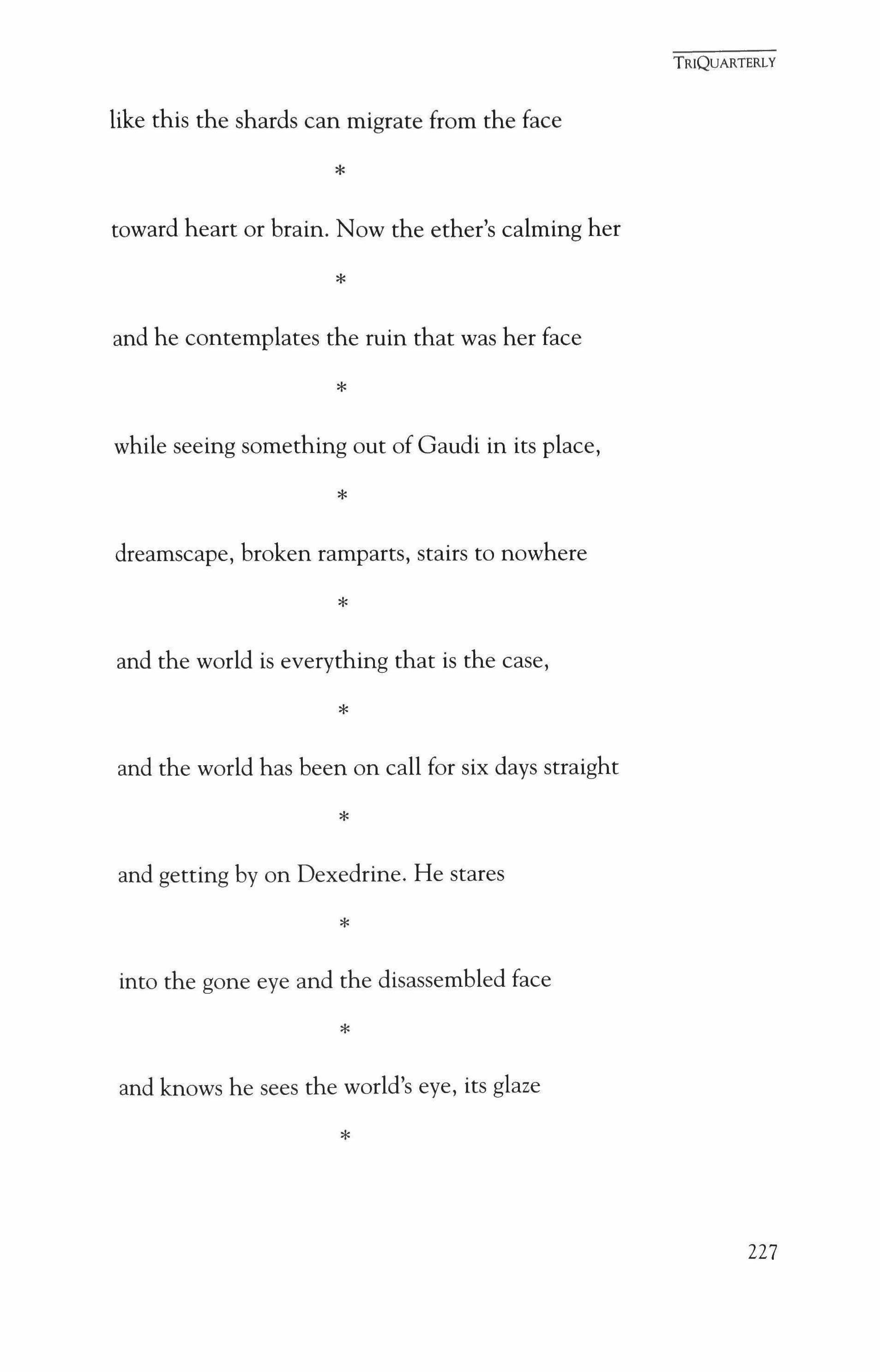
toward heart or brain. Now the ether's calming her
and he contemplates the ruin that was her face
while seeing something out of Gaudi in its place,
dreamscape, broken ramparts, stairs to nowhere
and the world is everything that is the case,
and the world has been on call for six days straight
and getting by on Dexedrine. He stares
into the gone eye and the disassembled face
and knows he sees the world's eye, its glaze
*
*
*
*
*
*
*
*
*
* TRIQUARTERLY 227
describing severed optic nerves. And here's
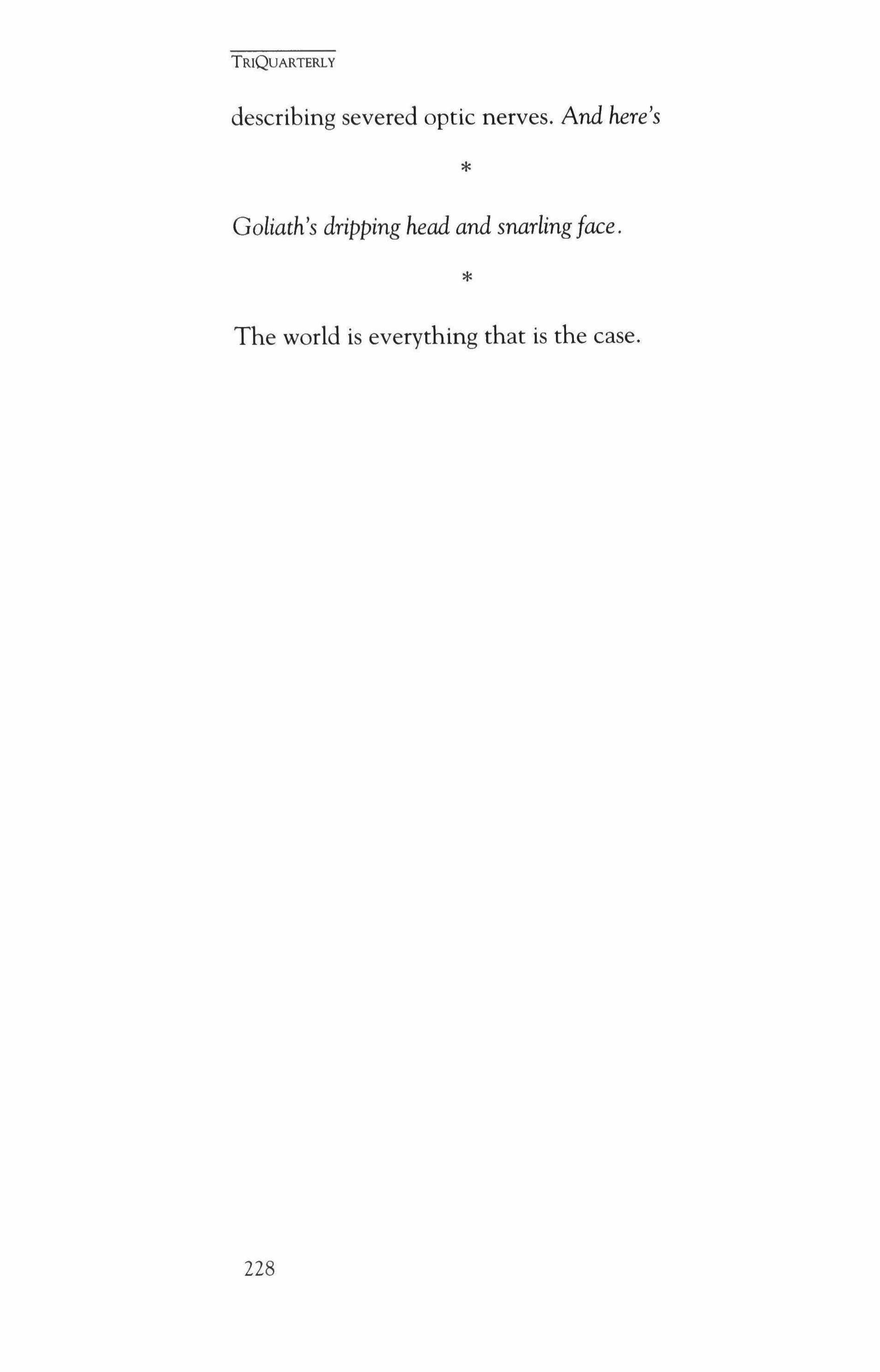
Goliath's dripping head and snarlingface.
The world is everything that is the case.
TRIQUARTERLY
*
228
*
Hey,Joe
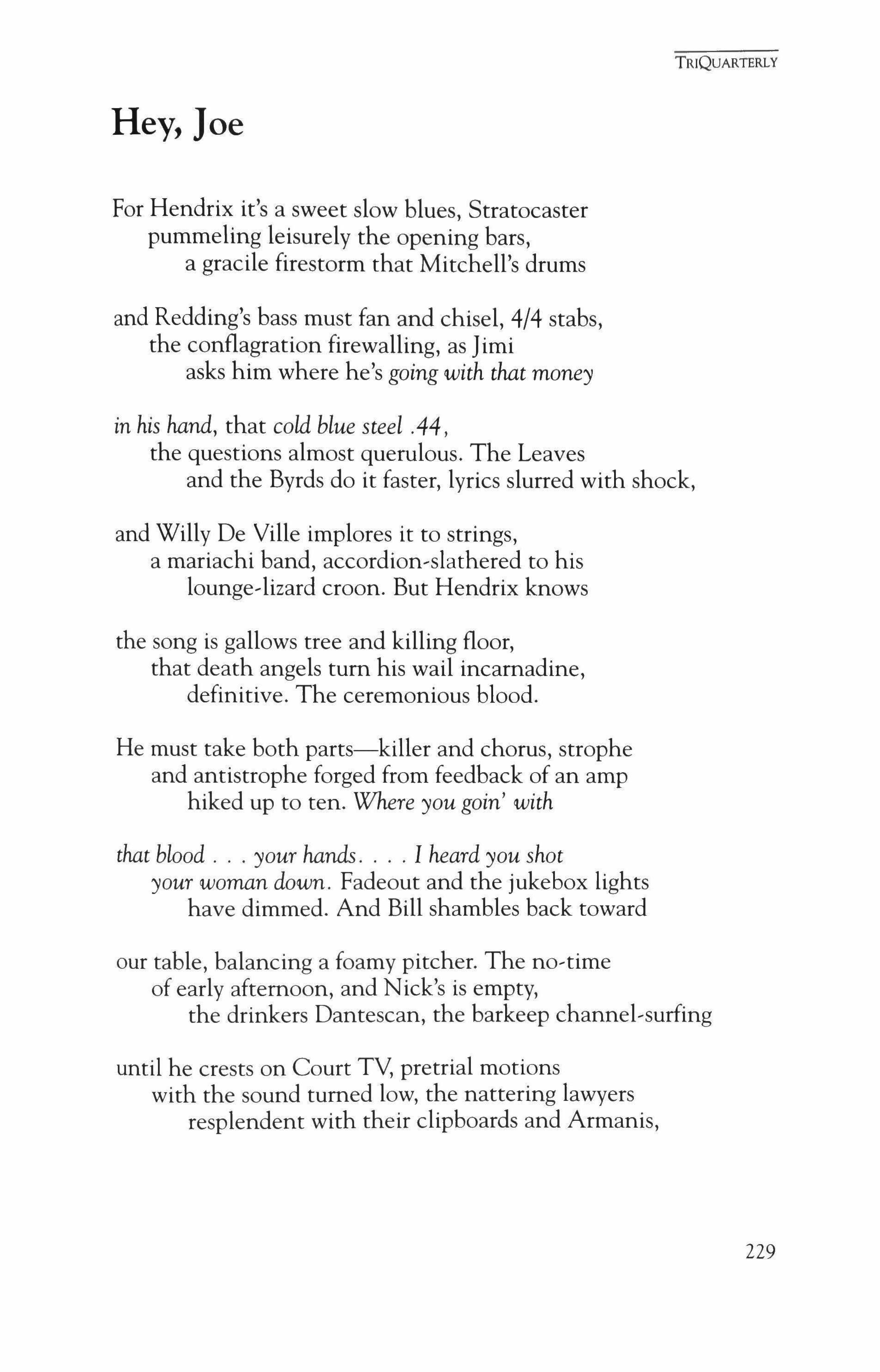
For Hendrix it's a sweet slow blues, Stratocaster pummeling leisurely the opening bars, a gracile firestorm that Mitchell's drums and Redding's bass must fan and chisel, 4/4 stabs, the conflagration firewalling, as Jimi asks him where he's going with that money in his hand, that cold blue steel .44, the questions almost querulous. The Leaves and the Byrds do it faster, lyrics slurred with shock, and Willy De Ville implores it to strings, a mariachi band, accordion-slathered to his lounge-lizard croon. But Hendrix knows the song is gallows tree and killing floor, that death angels tum his wail incarnadine, definitive. The ceremonious blood.
He must take both parts-killer and chorus, strophe and antistrophe forged from feedback of an amp hiked up to ten. Where you goin' with that blood your hands. I heard you shot your woman down. Fadeout and the jukebox lights have dimmed. And Bill shambles back toward our table, balancing a foamy pitcher. The no-time of early afternoon, and Nick's is empty, the drinkers Dantescan, the barkeep channel-surfing until he crests on Court TV, pretrial motions with the sound turned low, the nattering lawyers resplendent with their clipboards and Armanis,
TRIQUARTERLY
229
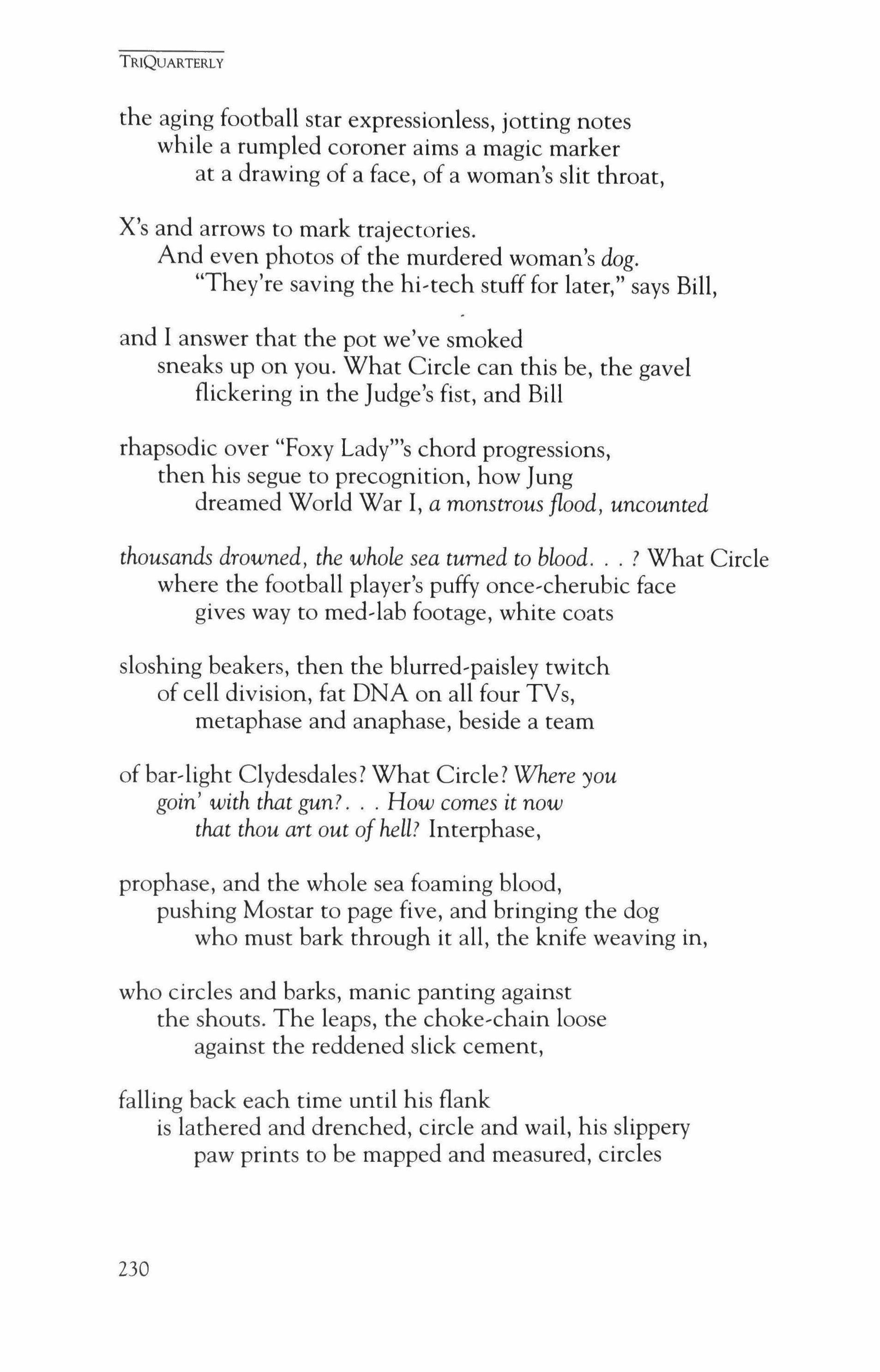
the aging football star expressionless, jotting notes while a rumpled coroner aims a magic marker at a drawing of a face, of a woman's slit throat,
X's and arrows to mark trajectories. And even photos of the murdered woman's dog. "They're saving the hi-tech stuff for later," says Bill, and I answer that the pot we've smoked sneaks up on you. What Circle can this be, the gavel flickering in the Judge's fist, and Bill rhapsodic over "Foxy Lady"'s chord progressions, then his segue to precognition, how [ung dreamed World War I, a monstrous flood, uncounted thousands drowned, the whole sea turned to blood ? What Circle where the football player's puffy once-cherubic face gives way to med-Iab footage, white coats
sloshing beakers, then the blurred-paisley twitch of cell division, fat DNA on all four TVs, metaphase and anaphase, beside a team of bar-light Clydesdales? What Circle? Where you goin' with that gun? How comes it now that thou art out ofhell? Interphase, prophase, and the whole sea foaming blood, pushing Mostar to page five, and bringing the dog who must bark through it all, the knife weaving in,
who circles and barks, manic panting against the shouts. The leaps, the choke-chain loose against the reddened slick cement, falling back each time until his flank is lathered and drenched, circle and wail, his slippery paw prints to be mapped and measured, circles
TRIQUARTERLY
230

in circles, tightening, his howl against ensanguined cries, until it seems he turns to us, his muzzle pulsing huge from every screen, the click of his nails as he paws at the netherworld's gates.
TRIQUARTERLY
231

Allegorical Figure
You danced with my father, who now is crematorium smoke. Gravelly ash, houndstoothed with bone. Yes, I remember him Danced him silly on the various wards, arms akimbo, wires dangling and the unguents' glow, lips caked white from the meds. I've heard this all before, you say.
May I have the next dance? you say. 6 A.M. I dance you as I run the April beach, warm enough now so the willows sprout drunks, homeless in sleeping bags, Mad Dog already foaming their lips. "Get ya fingurs offa me"-wino X, to no one in particular.
Black lab and borzoi, full trot in the distance. Look me in the eyes while we dance you say.
The lab who tore after me last year to bestow my left calf's star-shaped scar. I like you better now that you've stopped the pills. The Zoloft didn't suit you. The Paxill didn't match your eyes.
In California, the Unabomber's wakened, dainty gelignite valentines. And the "rescuers" in Oklahoma will find only bodies now, the explosion one week old. How graceful your small talk. How endless and trivial this dance with you. And yet we love each other so. Now turning back
TRIQUARTERLY
232

down Sheridan toward home: Cafe No Exit, Cafe Ennui. Have I told you how much I like those names?
And the Morse Street EI, and KOREA NOODLES, garlic already wafting, recap tire shop, graffitied
playground Pegasus. And the pier where L. would walk, her ashes scattered there.
I knew you'd come around to her. But don't you love me better? At home can you slip into something more comfortable? Do you always answer questions with questions, cheri?
Something noirish, something numb, something on the rocks. And haven't I been
the faithful one? We can stay in bed for days. I feel your hands on me already.
And I'll fuck you in all the ways you like.
TRIQUARTERLY
233
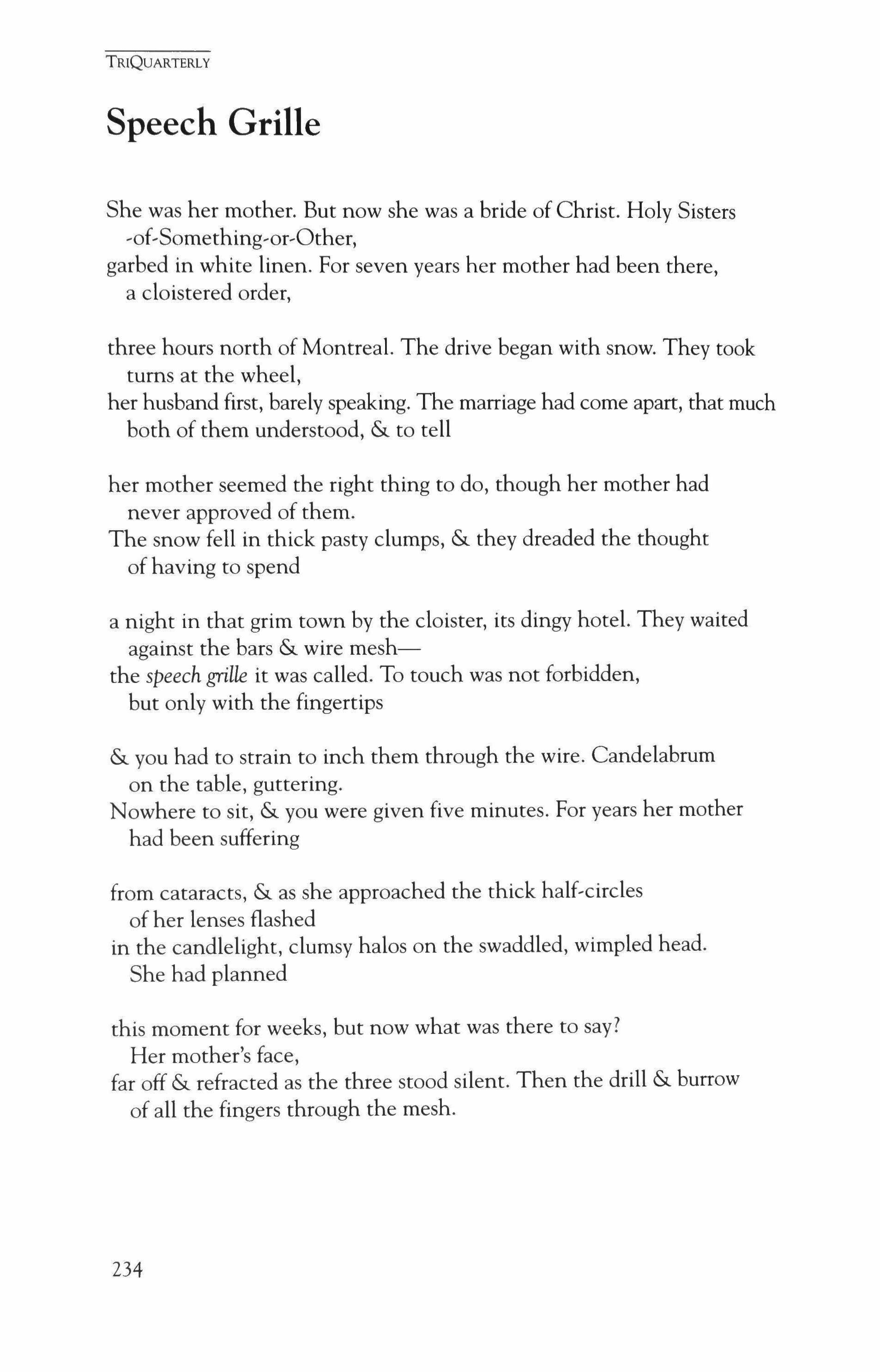
Speech Grille
She was her mother. But now she was a bride of Christ. Holy Sisters -of-Something-or-Other, garbed in white linen. For seven years her mother had been there, a cloistered order, three hours north of Montreal. The drive began with snow. They took turns at the wheel, her husband first, barely speaking. The marriage had come apart, that much both of them understood, & to tell her mother seemed the right thing to do, though her mother had never approved of them. The snow fell in thick pasty clumps, & they dreaded the thought of having to spend
a night in that grim town by the cloister, its dingy hotel. They waited against the bars & wire meshthe speechgrille it was called. To touch was not forbidden, but only with the fingertips & you had to strain to inch them through the wire. Candelabrum on the table, guttering.
Nowhere to sit, & you were given five minutes. For years her mother had been suffering from cataracts, & as she approached the thick half-circles ofher lenses flashed in the candlelight, clumsy halos on the swaddled, wimpled head. She had planned this moment for weeks, but now what was there to say?
Her mother's face, far off & refracted as the three stood silent. Then the drill & burrow of all the fingers through the mesh.
TRIQUARTERLY
234

Oracle
(after Plutarch)
No, below is water in its form of wind-pummeled cloud. In fact we are standing on Hurricane Ridge.
And the Park Service road, whipsnaking below. The tree line, the Sound and Victoria Island fifty miles distant into mist. And Ray Carver, shades on, with Lynda in the photograph, the three of us posed stiffly. One head taller than me, he points to a hawk soaring thermals.
And I am the one who can write this. Flat blue screen, the characters unscroll, juggled on the laptop all week. The words are barley cakes, kneaded with honey to appease the grotto's sacred serpents. You plunge down a kind of chute, and at the bottom
enter a coffin,like chamber. And now the serpents, helixing legs and torso, crisscrossing tongues on fingertip, on nipple. Plutarch reports it: the shrine set on a mountside in Thrace
astride a grove, its location still in dispute. ("Look at that hawk," he says, sunglasses off. "She has a snake in her mouth.") The future was apparently revealed to initiates in different ways.
Some had visions, others heard voices. In his poem the future revealed by X Ray,
TRIQUARTERLY 235
TRIQUARTERLY

so many dark smudges the doctor can't pick the good cells out. "And I may even
have thanked him habit being so strong." Grotto or flat blue screen, I wait.
They swallow the barley cakes so delicately, too dark to see their coloration, skin dry as paper.
Lie here and be still, as the papyri instruct. The sutures of the head shall part, the soul
spread out like a sail. All the sleeping bodies below, lit up like islands with softfire, assumingfirst one color, then another. In the grotto where the vision of them comes to me.
Enclosed in the chamber where the vision of them living comes to me. Blue screen and never the future.
The vision mostly Lynda, 1985. Scarcely a year, and the marriage already lost. The cottage in Port Townsend where we argued that night-recrimination sharp and flaring like a firecracker stringalmost to dawn. Then the drive to his house where he'd worked that morning on a poem.
I believe he had stopped writing stories. Only poems now, and his joy at them.
His study window, bare desk and the sea, how L. told me later she was calmed by that:
"Can we ever learn to live that way?" And never the future. On his desk
236

the notebook open, as the morning fog burns off and in the breeze the pages rustle.
I am the one who can write this. On my eyelids, flick and burrow of the tongues.
TRIQUARTERLY 237
Dirge and Descent
The Howard Line, the Argyle stop, the window
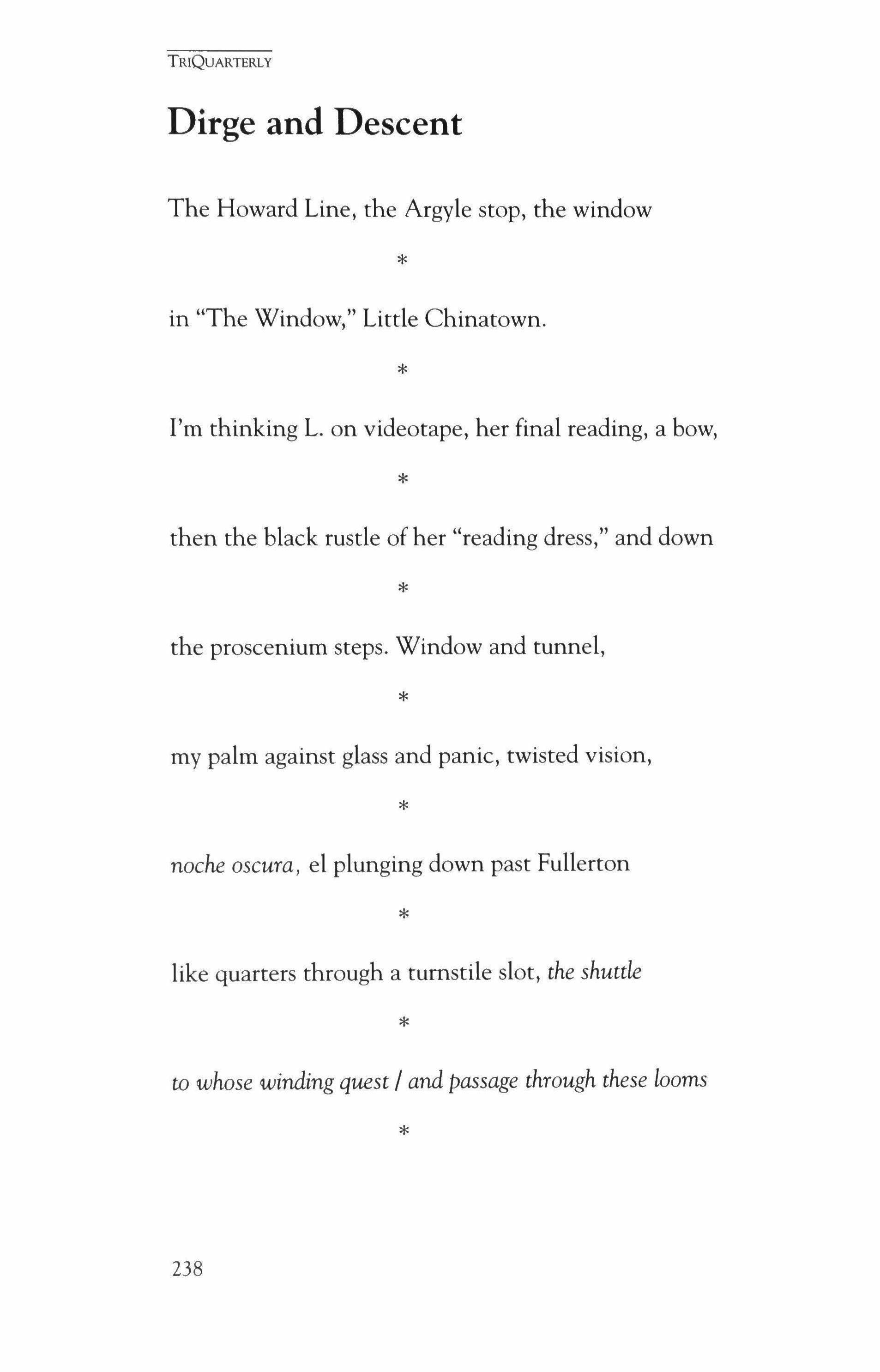
in "The Window," Little Chinatown.
I'm thinking L. on videotape, her final reading, a bow,
then the black rustle of her "reading dress," and down
the proscenium steps. Window and tunnel,
my palm against glass and panic, twisted vision,
noche oscura, el plunging down past Fullerton
like quarters through a turnstile slot, the shuttle
to whose winding quest / and passage through these looms
TRIQUARTERLY
*
*
*
*
*
*
*
*
* 238
God ordered motion but ordained no rest.

Whirlwind hiss, hip,hop bleeding through some homeboy's headset.
North and Clyboum, Chicago and State, the nair psalm's
ebb and flow, the wheels' scraping ululation.
Where are you now and where am 1? The doors blaze open.
TRIQUARTERLY
*
*
*
*
239
On a Windy Night
Stephen Dixon

He's at the dinner table talking to his wife, their daughter's sitting between them and says to him "May I be excused?" and he says "How come you always ask me?" and she says "I don't always; I just did this time and some times before. May I?" and he says "Well, I don't know," glancing at her plate, "this is a pretty big decision and not so easy for one person to decide," and looks at his wife and she indicates Irene's done well enough with her dinner, and says to Irene "O.K., Mommy and I think you did all right, not too much spread around your plate to make it appear you ate almost everything," and she stands and he says "Please bring your plate and stuff into the kitchen" and she does and goes to the piano at the far end of the next room and sits at it and he wants to resume the conversation with his wife, the subject was the mortar shelling two days ago of an elementary school in a large city in Central America, there hadn't been classes in it for months but children were playing in the school playground and some ten of them were killed, he said the national forces should go in and bomb the shit out of the bastards that shelled the city, she said that'll only lead to more shelling and bombing and killing of kids and soldiers who are just kids and who knows what else, "Then what are they going to do about it," he said, "nothing?" which was when Irene asked if she could leave the table, now he says to his wife "What were we talking of before you know, just before she-" and she says "Better we drop it, it was much too depressing, as things always are when the subject's suffering and there are no answers to it except more of the same and possibly even worse, though I don't know what could be worse than the incident we were talking about," and he says "Oh yeah, now I remember, you think it's
TRIQUARTERLY
240

what drove her away from the table?-maybe it was, and my cursing; she hates it, particularly the word 'shit," time's around 7:30, month's January, the end of it and it's very cold outside, approaching zero degrees and it'll probably be minus ten by morning, record of Haydn piano sonatas and variations that was playing in the next room just ended, he thinks of getting up and turning it over even if he played the other side during the first part of dinner, though he missed most of it because of their conversation, when Irene starts playing the piano. Of course, he thinks, she sat down at it so why wouldn't he think she was going to play? Well, because she knows they don't like her playing while they're still eating. Either she sits at the table till all three of them are done, they've told her, or she does something quiet in the living room, like reading or drawing, or whatever she wants to do in any other place in the house so long as it's not something noisy or doesn't involve a lot of running around after she just had her dinner. Should he tell her to stop? Did she wait till the record was over before she started playing? It's a nice piece, though, mostly on the high keys but with occasional notes in the middle and bottom octaves and seems to be the most advanced and complicated one she's played, and he says "What's that you're playing, Irene? Irene?" and his wife says "Shh," smiling, finger over her lips and he mouths "Of course." The piece ends. It took about a minute, maybe a minute and a half, and she immediately starts playing it again. The piano's an upright, one his wife's grandfather gave her when she was Irene's age, or a few years older: twelve, he thinks she said, and less than a year later she stopped taking piano lessons and took up ballet. "Maybe because you suddenly had this big responsibility of owning your own new piano and you felt you could never live up to using it-that happened to me with an expensive paint set my mother bought me," and she said "Maybe that was it." Irene continues to play and he looks at her and listens and doesn't know what but something happens to him, he gets lost in it, thinks she has such a lovely light touch, he's never heard her play better, but more than that, there's something much more than that, what is it? This has got to be one of the most beautiful moments in his life, he thinks, he doesn't know why this is. Maybe the calmness of the whole thing or something, her serious look and way she's sitting so erect, studious way she looks at the music book, certainly because it's his daughter playing and so well and that it seems like a difficult piece, especially for someone so young with only a couple years of lessons, and that she's reading the music rather than playing it from memory, he forgot that she could, and the piece is a slow sweet one and all those high
TRIQUARTERLY
241

keys and she seems to love playing it and that she's doing it only for herself, now a third or fourth time and each time as delicately and where the piece seems as pretty and sweet. And other things: soft light from the side table lamp beside her lighting up her hair, that he's sitting here so comfortable after dinner, wine in his hand, and he sets the glass down, lifts and sips it and sets it down again, his wife across from him and both silently agreeing not to spoil the moment, that it is-he can tell by the way she's staring at Irene, elbow on the table and hand holding up her chin, eyes never off her and with this wistful pensive looksomething special for her too, and that it's so cold out, treacherous, even, with all the ice around the house, couldn't get his car out of the port now if he tried, so they're sort of stuck here for the night, not that they'd be going anyplace unless there was an emergency, yet warm inside, the room what? sixty-five? sixty-six], anyway, an ideal temperature, not too warm or cool, fire in the living-room fireplace out but that's all right, nice glow from it gone but the crackle of the fire might interfere with the sound of Irene playing, but his thoughts are interfering with his just taking in the whole thing, so he'll stop. He listens till she's finished. Then she gets up, turns around and bows in their direction but without noticing them it seems, so she's probably been rehearsing for a music-school recital coming up, and goes back to the table, seemingly oblivious she's been watched. "Sweetheart, what was the name of that piece?" he asks after she sits, his wife resuming eating her salad, Irene picking a roll crumb off her place mat and about to put it in her mouth and she says '''On a Windy Night." "'A Windy Night'? But it was so slow and sad-like and tinkly. You'd think it'd have some title like 'Falling Leaves' or 'Distant Chimes' or something." "No, 'On a Windy Night.' That's because the wind, it's moving things back and forth, the trees swinging with it-I mean, pushed by the wind. Oh, I can't explain it. Here," and she runs to the piano, gets the music book and runs back and opens it to "On a Windy Night." "See-the words down here; it's a song as well as music," and she sings "'Over and over I hear a soft crying, down by the river the wind is sighing.' So there's the wind, pushing the willows and stuff. I thought so first too what you said but Miss Rose told me," and he says "So you're playing that piece for a recital pretty soon, right?" and she says "Friday. You didn't see the paper they gave me for it? It's on the refrigerator. And 'Old Abe Lincoln.'" "How's that go?" and she says "Faster and louder, like logs being chopped by a tall strong man." "You played very well-didn't she, Bea?" he says to his wife and she says "Gloriously. I've never heard you play so well, dear," and he says
TRIQUARTERLY
242

"Same here. It was beautiful. I was very moved," and Irene says "Moved?" and he says "You know, touched, here, the heart," jabbing his chest. "And almost to tears-I mean, my eyes. Your playing and the music did it but especially your playing. And to see you doing it so well, hearing you, watching you, I'm telling you, my darling, it was one of the most beautiful moments in my life. I'm sure I'll remember it always," and she says "Oh no you won't," and Bea says "You're supposed to say 'thank you' or simply nod modestly or say nothing and look away. That was quite the compliment, and I feel the same as Daddy," and he says "Nah, she doesn't have to respond in any way to what I said. I'm saying thanks to her for the experience. I don't know what it means to me," to Irene, "so you can't know what it means, and that's the way it should be. You're a real pianist and you're playing real music-music that touches us with its sounds and whatever the rest of what music gives," and she says "No I'm not, and it's a kid's piece. I'm not even playing two years now," and he says "So?"
She takes a music book out of the piano bench, sits at the piano and plays a Brahms intermezzo she learned about twenty years ago. She's out of practice and the piece doesn't come out right. She has this piano and she should use it more. She used to get so much enjoyment from playing. No one had to force her to practice or play or even remind her. One, two hours a day she was usually at it. A half-hour, maybe, and on weekends, at the most one. In fact, that was her parents' approach: She didn't want to practice or play, so be it; she never wanted to take another lesson or even sit down at the piano again, that was her choice. She loved her two piano teachers when she was young, Miss Rose and Miss Beth. Such nice people and they loved children and were never strict or critical or anything like it and they gave her presents on her birthday and Christmas and after recitals and every so often stuck candy in her coat pocket as she was leaving and she always liked talking to them about different things if they had time. Her son doesn't want to have anything to do with the piano. She's tried to get him to take lessons but he says he hates the piano, all instruments that look serious, but the piano, upright or baby grand, he thinks is a particularly ugly one and he also hates the sound of it and that it takes up so much space in their little living room. "I like to listen to the guitar and drums sometimes," he's said, "but I'm definitely not a music person." Too bad, for when he sings he shows he has a good ear, besides a lovely voice, so why doesn't he give the piano or any kind of instrument, even the voice, a chance? She plays part of a Chopin mazurka from memory and it sounds better than
TRIQUARTERLY
243

the Brahms piece but it isn't one-fifth as good as she once played it. And up till a few years ago she was playing Chopin ballades, scherzos, an etude or two of Debussy's and some of the more difficult pieces by Satie. Suddenly she has a memory of her father. He was at the dinner table with her mother. It's her fondest memory of him, she's had it a dozen times at least, but not for years. She has many fond memories of her mother but this one is of her father. He was drinking beer or wine, maybe he was a little high from it, now that she realizes, but he didn't speak as if he were, or the way she remembers it, and he didn't look it either-the picture in her head she has-and it was too early in the evening for him to be high, at the end of dinner, and what's she talking about for she can't remember ever seeing him even a bit tipsy except at her grandparents' fiftieth wedding anniversary. Then he got plastered and had to be driven horne and put to bed. Anyway, her parents were having dessert, she thinks-that part she really forgets, though she once remembered it. She was playing the piano in the living room, practicing for her lesson in a day or two, probably. She remembers the name of the piece: "On a Wintry Night." And it might have been winter also, for she remembers a fire in the fireplace and he only started one on his own when it was very cold in the house, so, freezing outside, and he wanted to save on the heat. He didn't much light them for aesthetic reasons, he said a number of times, except when her mother asked him to. Her mother loved fires, and for any reason. In Maine where they went for a few summers she liked them first thing in the morning in the iron cook stove and early evening in the fireplace when it wasn't even cold out, just cool. But he was never as nice to her as on that night when she was playing the piano, which is probably why the incident stuck and memory of it stayed. At least she can't remember him ever being so nice, complimentary and polite all at the same time. He said she looked beautiful and that she played very well. Usually he ignored saying what he thought she looked like unless she asked. He didn't like complimenting her too much because he thought it would go to her head and wouldn't really do anything for her but make her feel good for the moment. He used to say good looks can be useful but aren't important, it's what's under the pees and skull that count. Not an original or clever thought or even an inventive tum of phrase, except for the pees, but what he said. But she's getting away from it. The wintry night, her playing. He left the table and quietly sat beside her on the bench and when she looked up at him, while she was between pieces or just during a momentary lull in her playing, he looked, how should she call it?, uncustomari-
TRIQUARTERLY
244
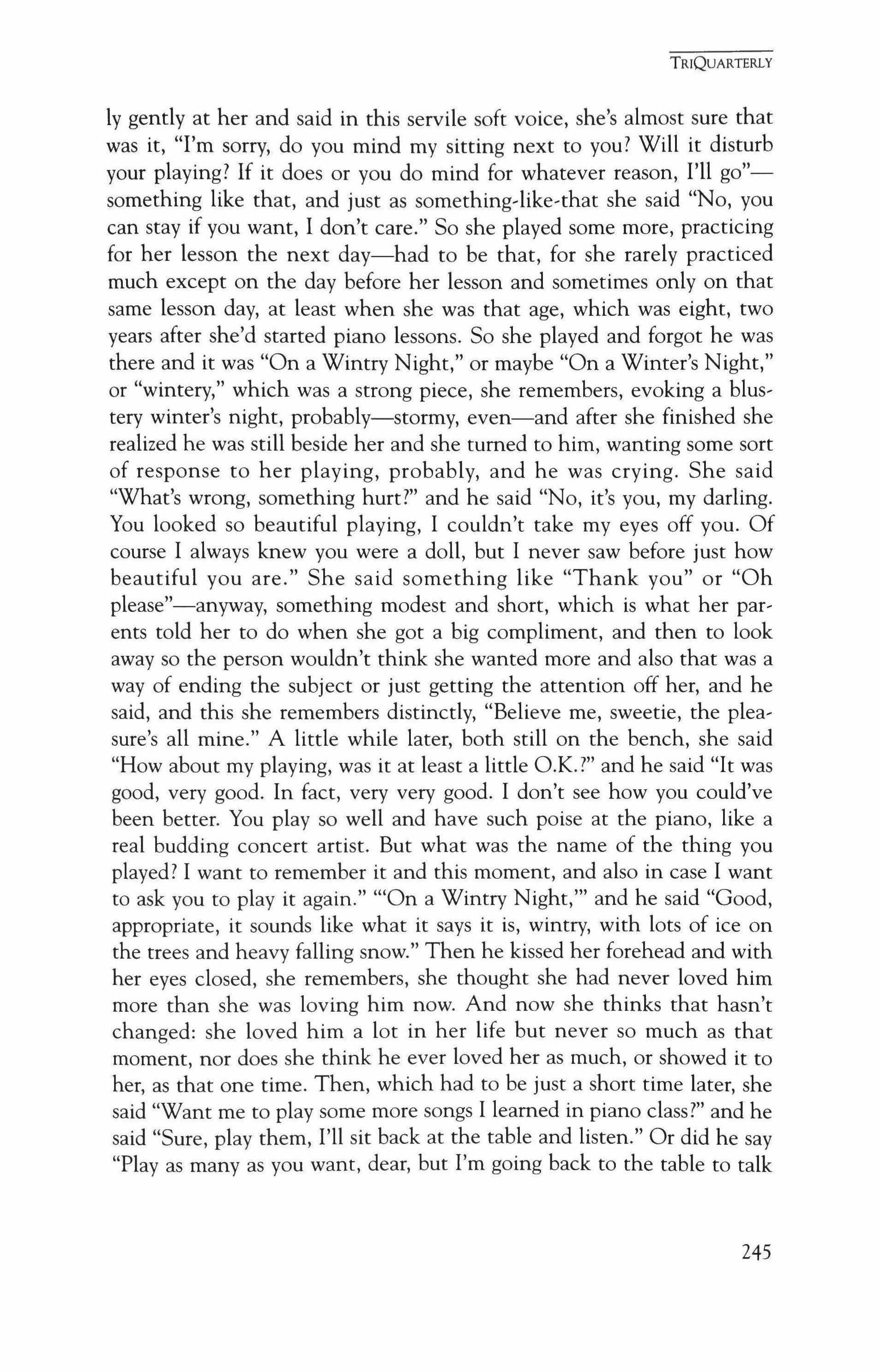
ly gently at her and said in this servile soft voice, she's almost sure that was it, "I'm sorry, do you mind my sitting next to you? Will it disturb your playing? If it does or you do mind for whatever reason, I'll go"something like that, and just as something-like-that she said "No, you can stay if you want, I don't care." So she played some more, practicing for her lesson the next day-had to be that, for she rarely practiced much except on the day before her lesson and sometimes only on that same lesson day, at least when she was that age, which was eight, two years after she'd started piano lessons. So she played and forgot he was there and it was "On a Wintry Night," or maybe "On a Winter's Night," or "wintery," which was a strong piece, she remembers, evoking a blustery winter's night, probably-stormy, even-and after she finished she realized he was still beside her and she turned to him, wanting some sort of response to her playing, probably, and he was crying. She said "What's wrong, something hurt?" and he said "No, it's you, my darling. You looked so beautiful playing, I couldn't take my eyes off you. Of course I always knew you were a doll, but I never saw before just how beautiful you are." She said something like "Thank you" or "Oh please"-anyway, something modest and short, which is what her parents told her to do when she got a big compliment, and then to look away so the person wouldn't think she wanted more and also that was a way of ending the subject or just getting the attention off her, and he said, and this she remembers distinctly, "Believe me, sweetie, the pleasure's all mine." A little while later, both still on the bench, she said "How about my playing, was it at least a little O.K.?" and he said "It was good, very good. In fact, very very good. I don't see how you could've been better. You play so well and have such poise at the piano, like a real budding concert artist. But what was the name of the thing you played? I want to remember it and this moment, and also in case I want to ask you to play it again." '''On a Wintry Night,'" and he said "Good, appropriate, it sounds like what it says it is, wintry, with lots of ice on the trees and heavy falling snow." Then he kissed her forehead and with her eyes closed, she remembers, she thought she had never loved him more than she was loving him now. And now she thinks that hasn't changed: she loved him a lot in her life but never so much as that moment, nor does she think he ever loved her as much, or showed it to her, as that one time. Then, which had to be just a short time later, she said "Want me to play some more songs I learned in piano class?" and he said "Sure, play them, I'll sit back at the table and listen." Or did he say "Playas many as you want, dear, but I'm going back to the table to talk
TRIQUARTERLY
245
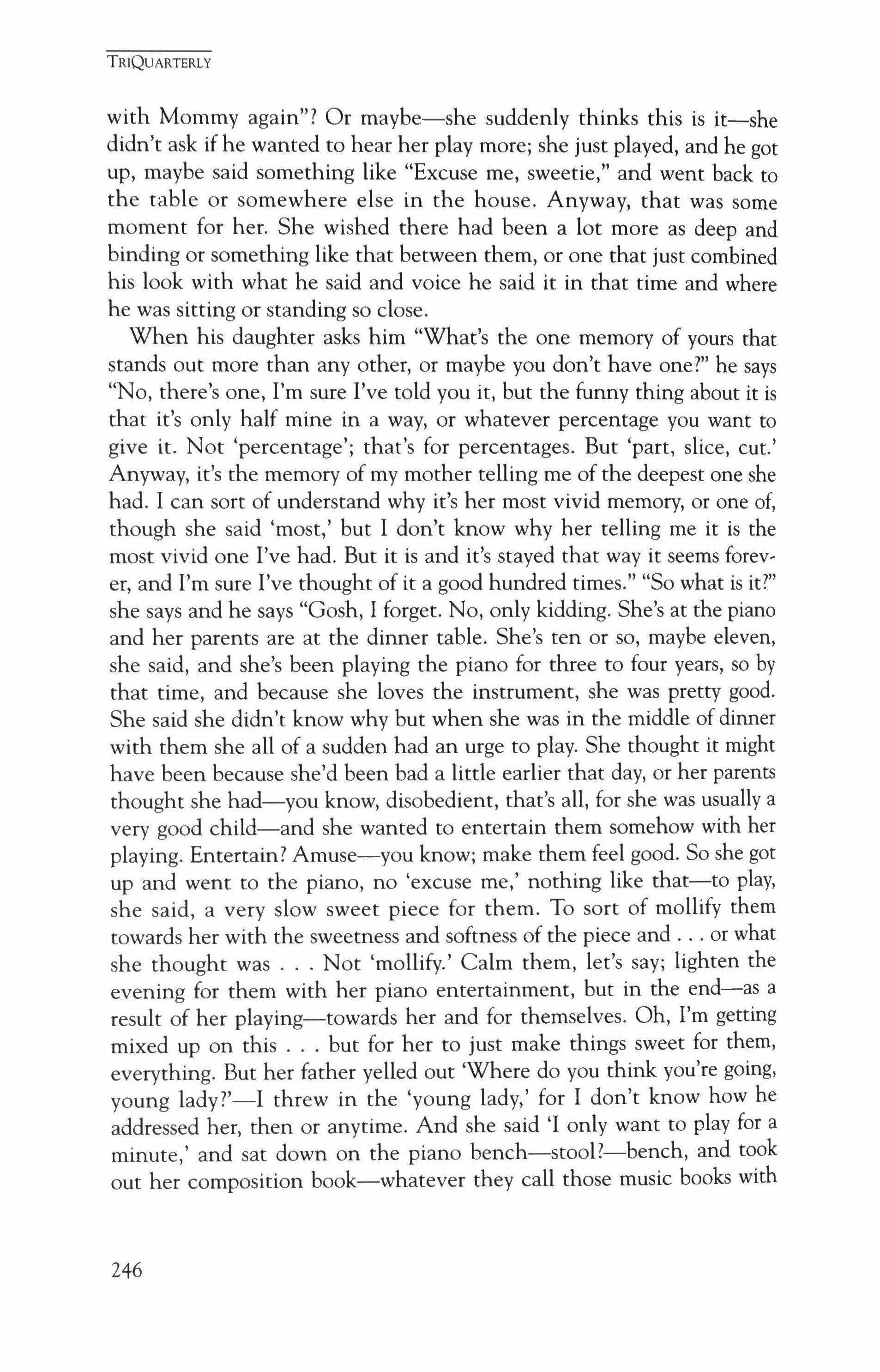
with Mommy again"? Or maybe-she suddenly thinks this is it-she didn't ask if he wanted to hear her play more; she just played, and he got up, maybe said something like "Excuse me, sweetie," and went back to the table or somewhere else in the house. Anyway, that was some moment for her. She wished there had been a lot more as deep and binding or something like that between them, or one that just combined his look with what he said and voice he said it in that time and where he was sitting or standing so close.
When his daughter asks him "What's the one memory of yours that stands out more than any other, or maybe you don't have one?" he says "No, there's one, I'm sure I've told you it, but the funny thing about it is that it's only half mine in a way, or whatever percentage you want to give it. Not 'percentage'; that's for percentages. But 'part, slice, cut.' Anyway, it's the memory of my mother telling me of the deepest one she had. I can sort of understand why it's her most vivid memory, or one of, though she said 'most,' but I don't know why her telling me it is the most vivid one I've had. But it is and it's stayed that way it seems forever, and I'm sure I've thought of it a good hundred times." "So what is it?" she says and he says "Gosh, I forget. No, only kidding. She's at the piano and her parents are at the dinner table. She's ten or so, maybe eleven, she said, and she's been playing the piano for three to four years, so by that time, and because she loves the instrument, she was pretty good. She said she didn't know why but when she was in the middle of dinner with them she all of a sudden had an urge to play. She thought it might have been because she'd been bad a little earlier that day, or her parents thought she had-you know, disobedient, that's all, for she was usually a very good child-and she wanted to entertain them somehow with her playing. Entertain? Amuse-you know; make them feel good. So she got up and went to the piano, no 'excuse me,' nothing like that-to play, she said, a very slow sweet piece for them. To sort of mollify them towards her with the sweetness and softness of the piece and or what she thought was Not 'mollify.' Calm them, let's say; lighten the evening for them with her piano entertainment, but in the end-as a result of her playing-towards her and for themselves. Oh, I'm getting mixed up on this but for her to just make things sweet for them, everything. But her father yelled out 'Where do you think you're going, young lady?'-I threw in the 'young lady,' for I don't know how he addressed her, then or anytime. And she said 'I only want to play for a minute,' and sat down on the piano bench-stool?-bench, and took out her composition book-whatever they call those music books with
TRIQUARTERLY
246

the pieces of music in them, the music pieces." "Music book," his daughter says; "that's what I call mine." "O.K., music book, and opened it to a composition called 'On a Winter's Night,' I believe, and started playing. Yes, definitely, I remember: 'On a Winter's Night.' You wouldn't have come across that same piece in one of yours, huh?" "I don't remember it," she says. "Just, if you did have it Anyway, her father said 'Now listen, you, come back, you're not done with dinner. And your hands are dirty from the food-greasy-and you'll get grease on the keys and you're disobeying me besides. Play all you want, so long as it's not bang' ing, after you finish dinner, but not now.' But she continued to play. He must've been saying 'Do you hear me, do you hear me!' You know how fathers are. But she said it was a situation where either she couldn't win if she returned to the table, for by now they'd be even angrier at her, at least her father, but she might win if she stayed and played and the music appeased him and-pacified him, I mean, calmed him down. Her mother said nothing. You never met her, she was a wonderful person, but her philosophy was that if two people have a dispute, let them work it out together till fireworks erupt; that before then, a third party should only butt in if asked. So so, well, she continued playing and he got up and she could hear him throwing his chair back and she thought 'Oh my God, he's really angry,' but she kept playing this sweet piece, still hoping to win him over with the music while also calming him with it." "What do you mean?" his daughter says and he says "Why, wasn't that clear? Anyway, not important, because the music must've done what she thought it would. For after this very short piece was over-it might've taken three minutes, she said-she looked around, half expecting him to tear her off the piano bench, but he was back sitting at the table, smiling at her with this adoring smile she'd almost never seen on him before and then applauding quietly. 'That was beautiful.' he said. 'As beautiful a playing of a piano piece as I think I've ever heard. Sure, some of that feeling from me comes because you're my daughter, so I wanted to think those things. But I didn't know you had such talent. Even bet' ter, such love for the piano and music. Better than that, even, that you had such a gift for playing. For that's what you have, I swear to you and without exaggeration: a gift. If your intention was to calm me some' what, you succeeded beyond everything. If it was also to get me to say what a beautiful child I have, you succeeded there too. I was deeply moved. Would you play the same piece for me again and then once more?' She couldn't believe it, she told me. She'd never seen such a quick change in him, at least from the bad to the good. And at first she
TRIQUARTERLY
247

really didn't believe it. She thought he might be setting her up-you know, tricking her; getting her to feel great about herself with these compliments and then after she played the piece a couple more times, saying 'And you thought that was good? What a laugh! It stunk to high heaven. You'd believe anything I'd say if it made you feel good. Boy, what power a father has over his kid.' But he didn't. She played it twice more and when she turned around to her parents at the table, she thought, he was standing right behind her and kissed the top of her head and said 'That was beautiful. As beautiful as the first time, and it left me with the same feeling. If you ever told me your goal in life was to become a concert pianist, I'd say that's not an unlikely thing for you to want to become.' Not 'unlikely.' What's the word?" "Unreasonable?" his daughter says and he says "No, but something like that, and good word, your 'unreasonable.' Anyway, he said to her that she played beautifully or divinely or one of those. And that he loved her-s-'I love you, sweetheart'-and she said 'And I love you too, Daddy,' and that's all she remembered of her deepest memory and that she's had it dozens and dozens of times. And for some reason it's also become-I must've been around eight when she told me it-my deepest memory too." "That's odd," she says, "that someone else's deepest memory could become yours, but not improbable." '"Improbable,''' he says. "Good word too. Jesus, where you getting them from? But it's also the word her father said about her if professional or concert piano-playing was to become her goal. That 'That's not an improbable prospect at all,' I think she said were his exact words, or close. Anyway, there's my most vivid memory. Big deal, right?"
TRIQUARTERLY
248
From Translation
Robert
von Hallberg

The most highly esteemed poet among American intellectuals is probably the Irishman Seamus Heaney; the most widely honored is surely the Lithuanian Czeslaw Milosz. I mean not only that American readers have a special attraction to foreign poets, but also that the recent history of American poetry can exclude neither the writing of foreign-born American residents nor the efforts of American-born poets to rewrite the poetry of other languages. In "The Day Lady Died" (1959), Frank O'Hara casually records picking up "an ugly NEW WORLD WRITING to see what the poets / in Ghana are doing these days."! American poetry since 1945 has been cosmopolitan in an obvious imperial sense: it has absorbed much more than American poetry ever has before. "The simile of an exhausted, Hellenic Europe surrendering its fate," George Steiner remarked in 1964, "to an imperial, Augustan America gained a certain currency. There was, until ca. 1959 a touch of Rome about American power, and a shade of Greece about the nervous, worn brilliance of European artistic and Intellectual life.'?
I am purposely making a wide circuit around the topic of translation, because my real subject is the interaction of American literary culture with other literatures, not just what is usually called translation. Our half-century has been especially greedy, especially curious about the world's art, as well as its other resources. Clearly, we have a poetry of global ambitions partly because our economy is global and our political interests extensive. It is much too simple, though, to say only that one causes the other. Poets, professors and plumbers often begin their days with a newspaper, or relax in the evening with the television news. We wear shirts made in Asia for American or European designers. The
TRIQUARTERLY
249

kitchens and restaurants that feed us produce facsimiles of international cuisine, daily, everywhere, for various classes of Americans. None of us escapes the constant awareness that we live well beyond our national boundaries. Of course, American poets wonder what poets in Ghana are up to.
What happens when foreign poems are naturalized, as the expression goes, into American products? What kind of poems do Americans want to naturalize, and why? What about the poets who are themselves naturalized? What difference does it make to them that they have been naturalized into American literary citizens?
Translation is ostensibly one of the humbler functions of the poet, but it also presents a path to the highest aspirations of poetry. Allen Grossman, whose poems are often in a high style, speaks of poetry as "a demonized activity it is not the speech of a mortal or merely singular person. Poetry in my view has its power because it is the speech not of an individual but of another who is more than and different from the individual.'? Skeptical, agnostic audiences do not easily give credence to demonized activity, but translations are different: one can believe that someone in another country or at another time was entitled to speak vatically. The very label of translation provides a hedged access to a kind of poetry that, as agnostics, we otherwise deny ourselves.
"Carrying over" is what the word means, and from one's awareness of displacement come questions about poetic authority. With what authority do poets speak? Does poetic language have an origin different from that of ordinary language? These questions bear on all poems, but more obviously on translations. When Pound presented himself to the London literary world in August 1908, he was an American poet with a book of poems just printed at his own expense in Venice. Six months earlier he had been an assistant professor of French and Spanish at Wabash College in Crawfordsville, Indiana-but that was no basis for poetic authority. In London he was to be a picturesque mover between the medieval and the modern, England and the continent, America and Europe. He repeatedly insisted that his authority was borrowed from other poems, even when he was not publishing translations. The early poems were written to sound like translations; he never gave up the garb of archaic poetic authority. His archaic diction and awkward syntax were exotic, from a remote origin, sanctified-that was the idea.
Translation is all about sources, which is where one goes when the branches get shallow. Translated poetry can be exactly right when one hungers for intensity and authenticity, though authenticity is just what
TRIQUARTERLY
250

translations can never supply; some surplus evades the compromises of a translator. Translators are intermediaries not visionaries, however motivated they are by that quest for the real thing that moves their readers. In 1955 Ben Belitt translated Lorca's influential essay on the duende, the spirit of "the roots that probe through the mire that we all know of, and do not understand, but which furnishes us with whatever is sustaining in art."4 The appeal of a poetry that penetrated to this subterranean basis of the art was very great in 1955, when Auden was editing the Yale Younger Poets series and Wilbur was an acknowledged master of the light touch. "No one, I think," said Lorca, "is amused by the dances or the bulls of Spain.">
Max Hayward has said that translations can powerfully influence a culture only after a period of isolation.v But since 1945 Americans have rather become connoisseurs of world poetry. Earlier Anglo-American modernist poetry was driven, at the outset, by contact with late-nineteenth century French poetry, then by fresh excitement about archaic poetry; Anglo-American modernist writing was unlike that of the continental avant-gardes precisely in its openness to tradition. The proliferation of translations by both sides in the Cold War was intended to establish legitimacy in a pluralist world order. Americans do not expect to be powerfully affected by translations; at this stage of saturation, all we want is seasoning for our own pot. American poets have shown great confidence in the strength of American writing; they have approached the task of translation with special boldness, and willingness to try new things. Consider Frank Bidart's wonderful little version of Catullus:
I hate and love. Ignorant fish, who even wants the fly while writhing. 7
The first four words come directly from the Latin, but the remainder is Bidart's invention. Bidart's friend Lowell translated Pasternak, though he knew no Russian. Pound's Propertius stood behind Bidart, legitimating invention. Louis Zukofsky, who began his poetic career in the early 1930s as a protege of Pound, completed an audacious translation of Catullus in 1969.
o th'hate I move love. Quarry it fact I am, for that's so re queries. Nescience, say th'fiery scent lowe whets crookeder.f
TRIQUARTERLY
251
TRIQUARTERLY

Pound had reminded poets of the responsibility to translate poems into poems, to assure that a new poem in English is the result of their labors. Bidart has taken the point. Zukofsky, though, is not bound by the simple rule of making coherent English sense of his Latin original; he does not try to bring Catullus into a plausible English. His words are inconceivable as natural utterance; they often bear a negligible semantic relation to the literal sense of Catullus's poem. Nonetheless his too is a close translation.
Odi et amo, quare id faciam, fortasse requiris. nescio, sed fieri sentio et excrucior.
Zukofsky has found English words that approximate the sound of Catullus's words, and he has followed the sequence of the syntax exact, ly. Zukofsky's fidelity to sound rather than sense is extremist among con' temporary translators of canonical verse. Clarence Brown commented on the translation that he and Merwin did of Osip Mandelstam in 1973: "It need scarcely be said, I suppose, that we never considered the folly of trying to convey to the ear of our English readers the sounds of the Russian."? Pound taught American poets that they might attempt, as Merwin did, to translate from languages more or less unknown to them, if they had a crib, as he had Fenollosa's manuscript translations for the production of Cathay (1915), or a knowledgeable collaborator. Robert Bly, Denise Levertov, Clayton Eshleman, Jerome Rothenberg, Robert Pinsky, Robert Hass, and many of their contemporaries translated as part of a team, where other, learned members bore responsibility for the literal sense of the original language. But in imitating the situation in which one overhears an unknown foreign language, Zukofsky was way out on a limb, even among his adventurous contemporaries, as Clarence Brown's remark shows. The opening poems of his Catullus show some effort to approximate the literal sense of the Latin, but the project soon moves away from any fidelity to the paraphrasable sense. His strictness lies all in the phonetic relations between Latin and English. Where a sonic equivalency produces serendipitous contact between the literal sense of the poem in two languages, Zukofsky seems to feel his project justified. These magical moments motivate the poet consistently: won' derful, that the meaning of utterances can be carried from one language to another on waves of sound over the heads of those who think they know Latin or English.
The boldness of Zukofsky's translation expresses something important about the period: first, the secure sense that American poets are entitled
252

to make whatever they can of the history of poetry; second, the belief, particularly among avant-garde poets, that language bears meaning that cannot be explained historically (i.e., by philological methods}; and, third, that the differences between Rome and America, the archaic and the contemporary, are not to be overcome by claims about continuity of ideas or meaning. A chasm stands between Catullus and Zukofsky, and Zukofsky wanted it to be visible, in Lawrence Venuti's terms. In 1977 Ronald Johnson, one of Zukofsky's readers, published Radi os, based on Milton's Paradise Lost. Here is a passage:
What if the breath Awaked, should plunge us in the flames; or from above if all were opened,
One day upon our heads;
Each on his rock transfixed, all things at one view? then, live at the spear in timelO
By excision, Johnson translated Milton's English blank verse into American free verse. He perforated an 1892 edition of Milton in order to let the figure of his versions stand exposed, as the title Radi os is a reduction of Paradise Lost.
What if the breath that kindl'd those grim fires Awak'd should blow them into sevenfold rage And plunge us in the flames? or from above Should intermitted vengeance arm again
TRIQUARTERLY
253
TRIQUARTERLY

His red right hand to plague us? what if all Her stores were op'n'd, and this Firmament
Of Hell should spout her Cataracts of Fire, Impendent horrors, threat'ning hideous fall
One day upon our heads; while we perhaps Designing or exhorting glorious war,
Caught in a fiery Tempest shall be hurl'd
Each on his rock transjixt, the sport and prey
Of rocking whirlwinds, or for ever sunk
Under yon boiling Ocean, wrapt in Chains; There to converse with everlasting groans, Unrespited, unpitied, unrepriev'd,
Ages of hopeless end; this would be worse.
War therefore, open or conceal'd, alike
My voice dissuades; for what can force or guild
With him, or who deceive his mind, whose eye Views all things at one view? he from Heav'n's highth
All these our motions vain, sees and derides; Not more Almighty to resist our might
Than wise to frustrate all our plots and wiles.
Shall we then live thus vile, the race of Heav'n
Thus trampl'd, thus expell'd to suffer here
Chains and these Torments? better these than worse
By my advice; since fate inevitable
Subdues us, and Omnipotent Decree,
The Victor's will. To suffer, as to do,
Our strength is equal, nor the Law unjust
That so ordains: this was at first resolv'd,
If we were wise, against so great a foe
Contending, and so doubtful what might fall.
I laugh, when those who at the Spear are bold
And vent'rous, if that fail them, shrink and fear
What yet they know must follow, to endure Exile, or ignominy, or bonds, or pain,
The sentence of thir Conqueror: This is now
Our doom; which if we can sustain and bear, Our Supreme Foe in time may much remit
His anger, and perhaps thus far remov'd
Not mind us not offending, satisfi'd
With what is punisht; whence these raging fires
Will slack'n, if his breath stir not thir flames.U [My italics.]
Johnson has abstracted Belial's speech to the council in Hell (II, 170-
254

214). His poem, like Milton's, advocates the acceptance of limits, particularly those imposed by mortality. What Belial describes as God's possible ire seems in Radi os rather a reflection on the pain that would follow a full awareness of "all things." Belial's argumentation is pruned back into an expression of awe at the prospect of divine knowledge. Restraint is not at all what the free-verse mode warrants. Johnson transforms a counsel of prudence into carpe diem: "live / at the spear / in time."
Eric Cheyfitz has argued that "translation was, and still is, the central act of European colonization and imperialism in the Americas."12 Among literary scholars, there is now a widespread suspicion of translation on political grounds. The editors of a new series on translation studies with Routledge define translation as "manipulation, undertaken in the service of power."13 After kindly saying that one translates what one has fallen in love with, Richard Wilbur then adds that one wants to "claim it for one's own tongue."!" The very terms for discussing translation, its motives and consequences, are saturated with the ideology of expansion and conquest. "One conquered when one translated," Nietzsche said.I> But the other view of translation-as benign, not predatory-has its adherents too.
"It will do you no harm, Latin," [a lyric poet] says, "if I take this lyric of Catullus and try to bestow it as a gift on my own language, which suddenly seems to me impoverished without it; you will still have Catullus when I am through, quite undamaged, and something new, not otherwise possible, will have come into existence.t'U'
There was a good measure of naive optimism about translation in the mid- and late-1960s. Vincent McHugh and C. H. Kwock said that literature "embodies the one common language down under all the others: the universal language of human feeling. It's our one chance for all men to get in touch with each other."17 Straightforward access to a universal language, to peace, harmony, and so on? Probablement pas. Translation brings poets up against the fact of citizenship. Facing pages of French, Spanish, or German, Bly, Hecht, and Hass are plainly American poets, though in the streets of Paris, Madrid, or Berlin they may feel the less obvious fact of being citizens of the world, or of the republic of poets too. The German fiction writer Hans Erich Nossack, who brought Joyce Cary and Sherwood Anderson into German, recalled feeling at one time that it was "more important to translate a foreign
TRIQUARTERLY
255

book than to write one myself."IS "There is, for each individual writer," he said,
something that seems to exist that could only be called a feeling of national solidarity with other members of the literary community, a feeling of citizenship in literature as a supranational and antinational and, one might add, ahistorical community. In certain moments this feeling of solidarity intensifies-most often as a defense against the recurring historical tendency to be dominated and controlled by one single ideology. It then becomes more important for the individual writer to advocate literature as a whole than to offer his own individual contribution to literature.l?
One dreams of a republic of poets and tries even to live responsive to its laws, but translators know that passports are never put altogether aside. Paradoxically, translation enhances the national culture of the translator, while also producing a supranational sense of artistic culture. Dante Gabriel Rossetti said that the "only true motive for putting poetry into a fresh language must be to endow a fresh nation, as far as possible, with one more possession of beauty."2o "Each nation is imprisoned by its language," Octavio Paz has remarked, but thanks "to translation, we become aware that our neighbors do not speak and think as we do."21 The history and theory of translation is laden with the imperial ambitions of the Romans, the French, Germans, or British, but also with Enlightenment cosmopolitanism. Dryden speaks of it as "an art so very useful to an enquiring people, and for the improvement and spreading of knowledge, which is none of the worst preservatives against slavery."22 "Translation," as Nossack says, "represents a means of exchanging news between one human being and another, a kind of underground radio station used by partisans of humanity throughout the world to send news of their endangered existence "23 Poetry maintains the large view, Paz claims, because "No trend, no style has ever been national, not even the so-called artistic nationalism."24 Any account of the consequences of translation has to hold onto the doubleness-conqueror, cosmopoliteof the project.
William Duffy and Robert Bly started a new journal in 1958: The Fifties, that later become The Sixties and The Seventies, under Bly's sole editorship. The first issue began with "Ten Pages of Modem European Poems," and Bly identified himself militantly with the need to translate Latin American and European poetry into English for the benefit of American poetry. He became enormously influential as both advocate
TRIQUARTERLY
256

and translator. Imagery, as he saw it, is the essence of poetry, the source of its power and depth; many diversely positioned writers and critics of the 1960s agreed that images were the essential matter to be translated. Nabokov, no natural ally of Bly, said in 1969 that "a poet's imagery is a sacred, unassailable thing."25 "The metaphorical act," Jack Ludwig stated, "the transforming gesture, should come from the language of the present grasping the delicate and historical toughness of the past. The translator must courageously, perhaps dangerously, choose his metaphorical equivalents for words, sounds, dramatic confrontations."26 For Ludwig, Bly, and many others, the target was the language of the exact present moment. The obvious implication is that that elusive moment is like no other, here or elsewhere. American poets were therefore justified in feeling urgency and license in their translations. The focus on the image was like a search for the coin that happens to fit the slotCanadian quarter, German five-pfennig piece.
Jerome Rothenberg said that discussion of the image followed from the logically prior notion of poetry's distinction from ordinary language.27 Many poets and readers too turned to foreign poetry, under Bly's influence, in search of stunning images. By 1960, however, a few poets had begun to respond critically to this development. Creeley wrote to Rothenberg:
I think translation, dealt with too loosely, has not been able to surmount the problem of logopoeia, and this has made an accumulation of loosely structured poems exciting mainly for their 'content,' their reference as 'pictures' of states of feeling etc. I'd hate to see that generalizing manner become dominant, no matter the great relief of having such information about what's being written in other countries etc.28
Creeley was right to worry about the generalizing manner of translated poetry becoming dominant: the influence of Merwin and of translated Latin American and East European poetry produced a period style in the late 1960s. Rothenberg answered that poetry is translatable at the level of the image and that the effort to talk across national and linguistic boundaries was imperative. This was the basis of his advocacy of what was called Deep Image poetics in the early 1960s and associated with the little magazine Trobar.29 "The editors of TROBAR [George Economou, Joan and Robert Kelly] believe that American poetry must re-establish contact with the perennial strength of the deep image."30
Deep-image poetry, according to Robert Kelly, was designed to bring all the force of other poetries into contemporary American: "The
TRIQUARTERLY
257
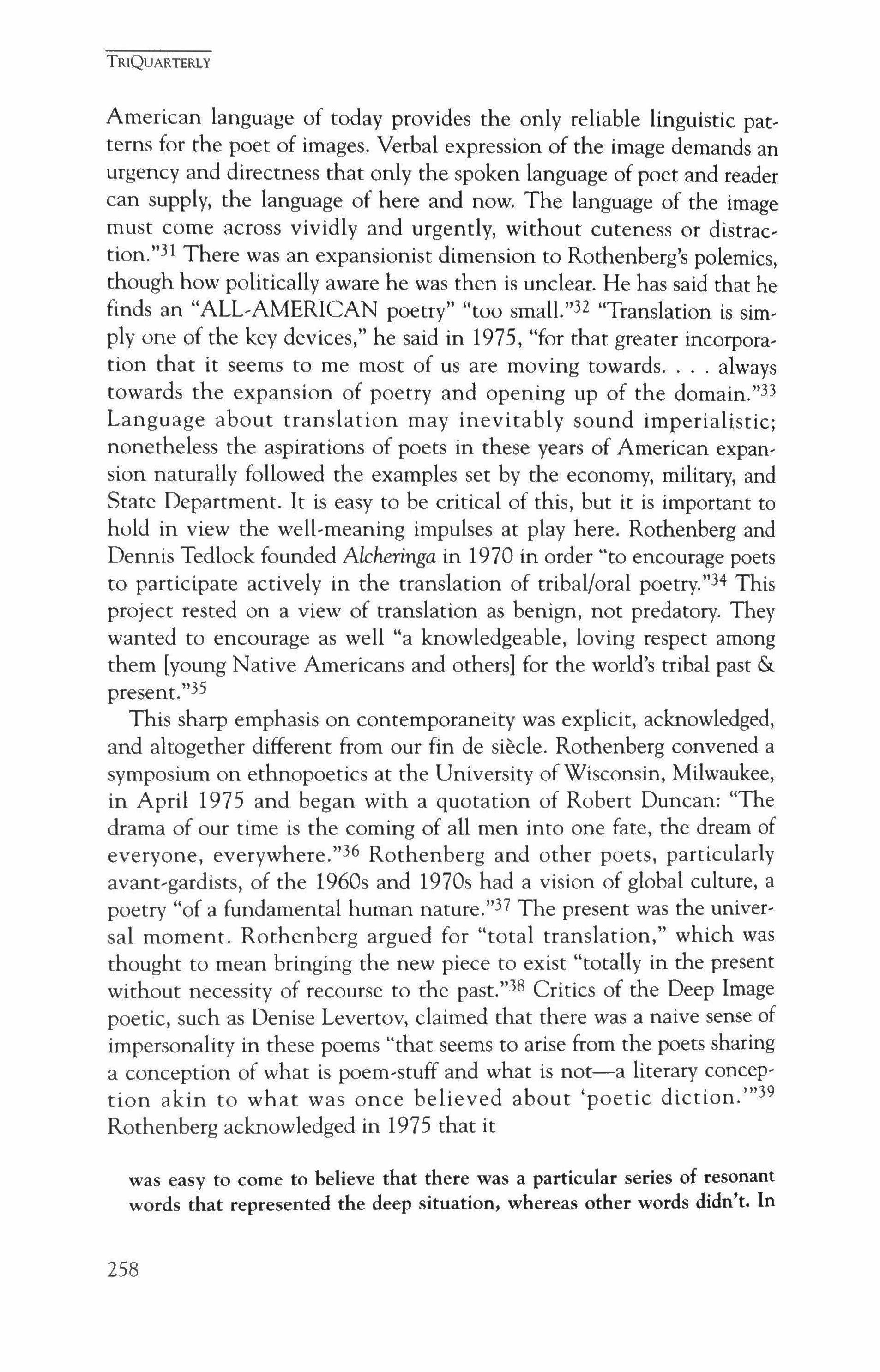
American language of today provides the only reliable linguistic patterns for the poet of images. Verbal expression of the image demands an urgency and directness that only the spoken language of poet and reader can supply, the language of here and now. The language of the image must come across vividly and urgently, without cuteness or distraction."31 There was an expansionist dimension to Rothenberg's polemics, though how politically aware he was then is unclear. He has said that he finds an "ALL-AMERICAN poetry" "too small."32 "Translation is simply one of the key devices," he said in 1975, "for that greater incorporation that it seems to me most of us are moving towards always towards the expansion of poetry and opening up of the domain."33 Language about translation may inevitably sound imperialistic; nonetheless the aspirations of poets in these years of American expansion naturally followed the examples set by the economy, military, and State Department. It is easy to be critical of this, but it is important to hold in view the well-meaning impulses at play here. Rothenberg and Dennis Tedlock founded Alcheringa in 1970 in order "to encourage poets to participate actively in the translation of tribal/oral poetry."34 This project rested on a view of translation as benign, not predatory. They wanted to encourage as well "a knowledgeable, loving respect among them [young Native Americans and others} for the world's tribal past & present."35
This sharp emphasis on contemporaneity was explicit, acknowledged, and altogether different from our fin de siecle. Rothenberg convened a symposium on ethnopoetics at the University of Wisconsin, Milwaukee, in April 1975 and began with a quotation of Robert Duncan: "The drama of our time is the coming of all men into one fate, the dream of everyone, everywhere."36 Rothenberg and other poets, particularly avant-gardists, of the 1960s and 1970s had a vision of global culture, a poetry "of a fundamental human nature."37 The present was the universal moment. Rothenberg argued for "total translation," which was thought to mean bringing the new piece to exist "totally in the present without necessity of recourse to the past."38 Critics of the Deep Image poetic, such as Denise Levertov, claimed that there was a naive sense of impersonality in these poems "that seems to arise from the poets sharing a conception of what is poem-stuff and what is not-a literary conception akin to what was once believed about 'poetic diction."'39 Rothenberg acknowledged in 1975 that it
was easy to come to believe that there was a particular series of resonant words that represented the deep situation, whereas other words didn't. In
TRIQUARTERLY
258
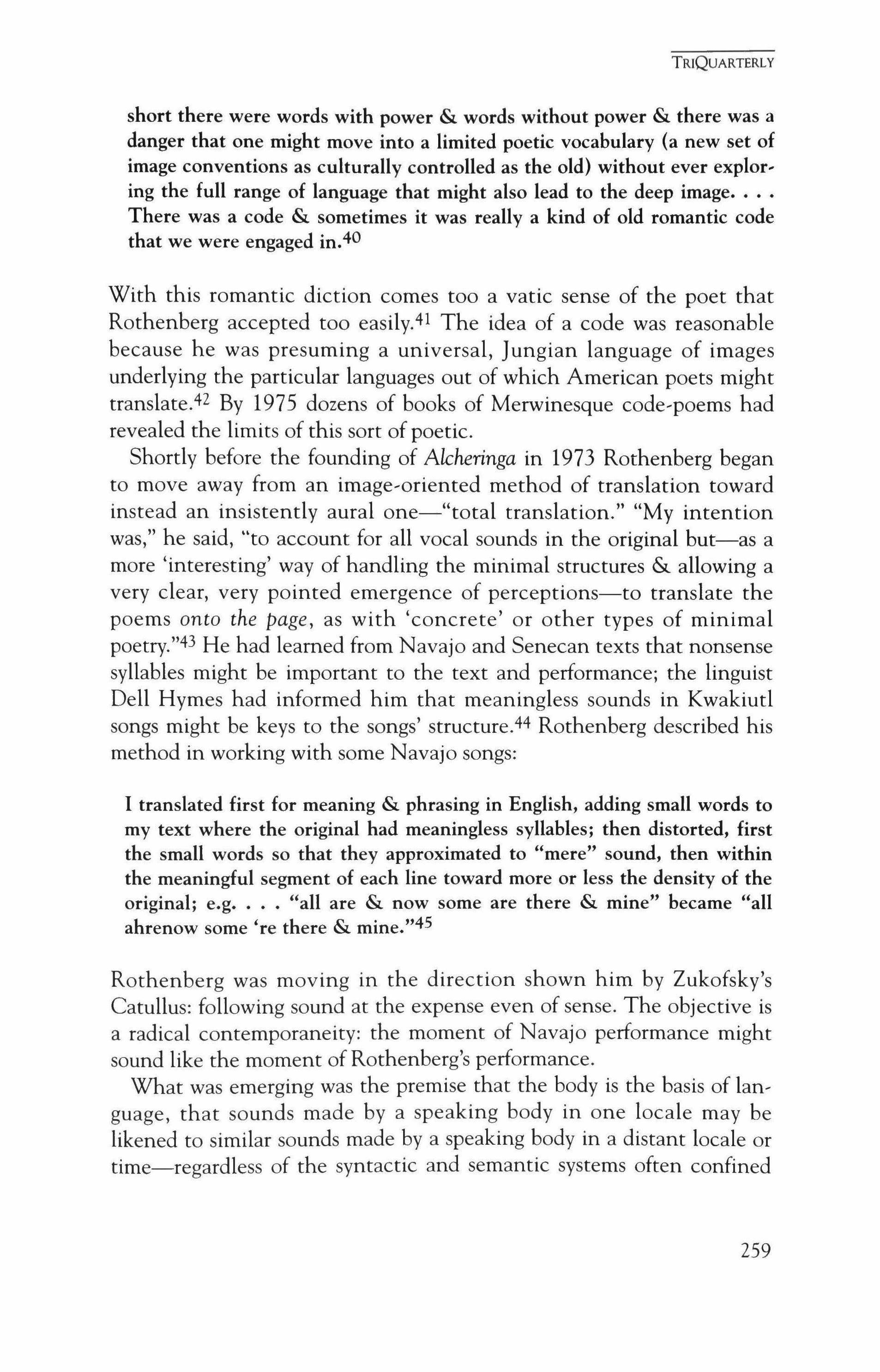
short there were words with power & words without power & there was a danger that one might move into a limited poetic vocabulary (a new set of image conventions as culturally controlled as the old) without ever exploring the full range of language that might also lead to the deep image. There was a code & sometimes it was really a kind of old romantic code that we were engaged in.40
With this romantic diction comes too a vatic sense of the poet that Rothenberg accepted too easilv.f! The idea of a code was reasonable because he was presuming a universal, Jungian language of images underlying the particular languages out of which American poets might translate.t- By 1975 dozens of books of Merwinesque code-poems had revealed the limits of this sort of poetic.
Shortly before the founding of Alcheringa in 1973 Rothenberg began to move away from an image,oriented method of translation toward instead an insistently aural one-"total translation." "My intention was," he said, "to account for all vocal sounds in the original but-as a more 'interesting' way of handling the minimal structures & allowing a very clear, very pointed emergence of perceptions-to translate the poems onto the page, as with 'concrete' or other types of minimal poetry."43 He had learned from Navajo and Senecan texts that nonsense syllables might be important to the text and performance; the linguist Dell Hymes had informed him that meaningless sounds in Kwakiutl songs might be keys to the songs' structure.44 Rothenberg described his method in working with some Navajo songs:
I translated first for meaning & phrasing in English, adding small words to my text where the original had meaningless syllables; then distorted, first the small words so that they approximated to "mere" sound, then within the meaningful segment of each line toward more or less the density of the original; e.g "all are & now some are there & mine" became "all ahrenow some 're there & mine."45
Rothenberg was moving in the direction shown him by Zukofsky's Catullus: following sound at the expense even of sense. The objective is a radical contemporaneity: the moment of Navajo performance might sound like the moment of Rothenberg's performance.
What was emerging was the premise that the body is the basis of language, that sounds made by a speaking body in one locale may be likened to similar sounds made by a speaking body in a distant locale or time-regardless of the syntactic and semantic systems often confined
TRIQUARTERLY
259
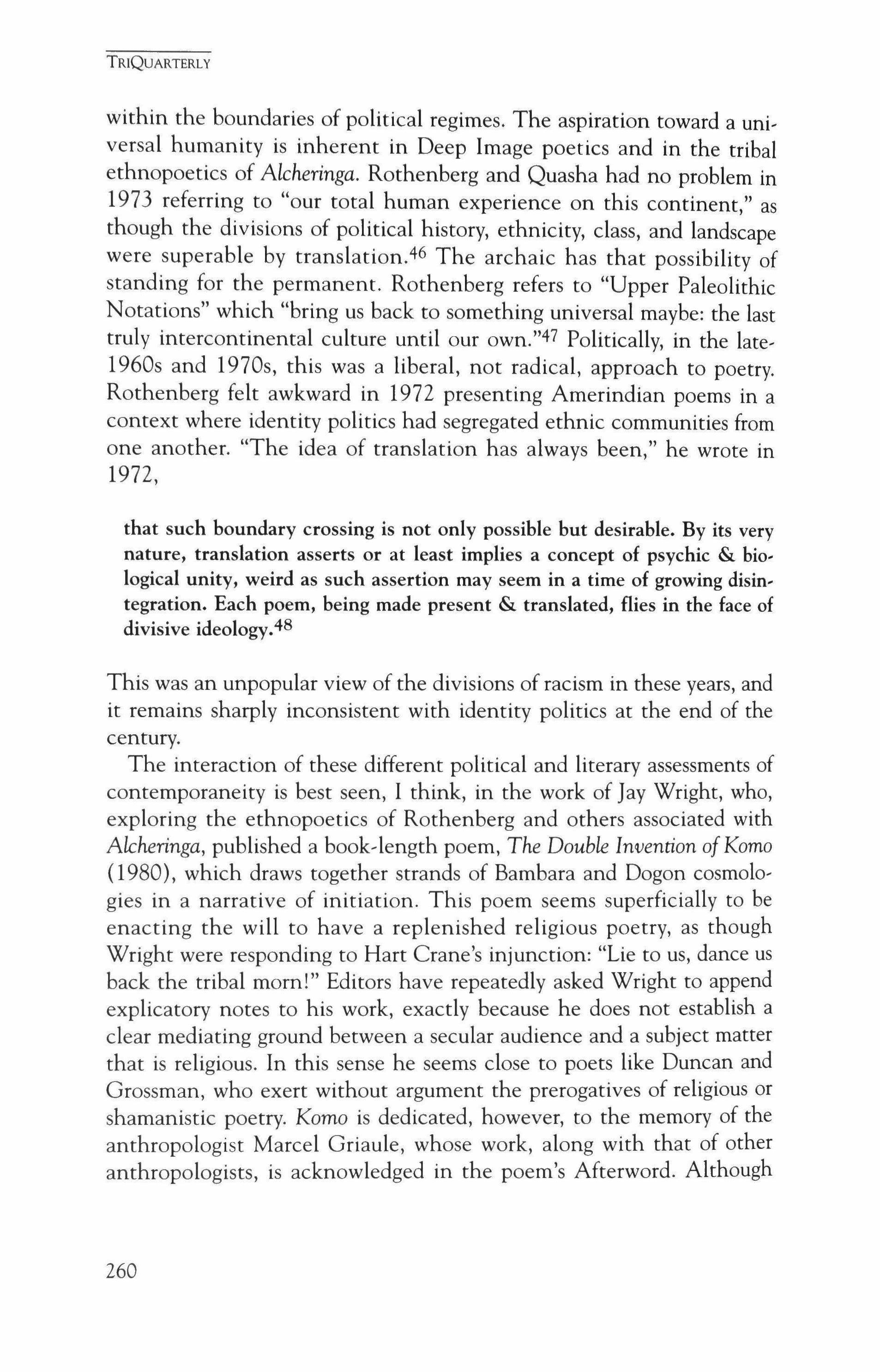
within the boundaries of political regimes. The aspiration toward a universal humanity is inherent in Deep Image poetics and in the tribal ethnopoetics of Alcheringa. Rothenberg and Quasha had no problem in 1973 referring to "our total human experience on this continent," as though the divisions of political history, ethnicity, class, and landscape were superable by translation.46 The archaic has that possibility of standing for the permanent. Rothenberg refers to "Upper Paleolithic Notations" which "bring us back to something universal maybe: the last truly intercontinental culture until our own."47 Politically, in the late1960s and 1970s, this was a liberal, not radical, approach to poetry. Rothenberg felt awkward in 1972 presenting Amerindian poems in a context where identity politics had segregated ethnic communities from one another. "The idea of translation has always been," he wrote in 1972,
that such boundary crossing is not only possible but desirable. By its very nature, translation asserts or at least implies a concept of psychic & biological unity, weird as such assertion may seem in a time of growing disintegration. Each poem, being made present & translated, flies in the face of divisive ideology.48
This was an unpopular view of the divisions of racism in these years, and it remains sharply inconsistent with identity politics at the end of the century.
The interaction of these different political and literary assessments of contemporaneity is best seen, I think, in the work of Jay Wright, who, exploring the ethnopoetics of Rothenberg and others associated with Alcheringa, published a book-length poem, The Double Invention ofKoma (1980), which draws together strands of Bambara and Dogon cosmologies in a narrative of initiation. This poem seems superficially to be enacting the will to have a replenished religious poetry, as though Wright were responding to Hart Crane's injunction: "Lie to us, dance us back the tribal mom!" Editors have repeatedly asked Wright to append explicatory notes to his work, exactly because he does not establish a clear mediating ground between a secular audience and a subject matter that is religious. In this sense he seems close to poets like Duncan and Grossman, who exert without argument the prerogatives of religious or shamanistic poetry. Komo is dedicated, however, to the memory of the anthropologist Marcel Griaule, whose work, along with that of other anthropologists, is acknowledged in the poem's Afterword. Although
TRIQUARTERLY
260

Wright tries to recreate in English a sense of Bambaran and Dogon rituals, this poet is content to write with secular distance ultimately from the religions of Africa. "A poem is not ritual," Wright has said. "The poetry's goal, early and late, has always been to bring a critical and ereative vision to bear on an enlarged realm of experience "49
The enlargement that Wright manages is based on a liberal attitude toward racial politics. In Kama he speaks of undertaking a return to African roots out of a sense of his own hvbriditv. "I elevate the trinity of races in my blood."5o
I take this road again to articulate my discontent with what is given.
I have learned that there is a blessing in my body's disrupted blood.
"We black African-Americans have been much too ready," he has argued, "to allow other people to divest us of our other selves. No black African-American can have escaped grounding in other cultures. You can have escaped critical confrontation with and assimilation of them What is necessary is to think carefully about what you possess, and I contend that we all possess more than we know and are willing to acknowledge."51 Wright begins not with a fiction about any essential Africanness, but with the knowledge that his identity has no one essence:
The seed of my being does not exist, except in the act of taking notice.
You see I have the faculty of being absent.
Father-I call youspirit of the apprehension of absence, the precedent refusa1.52
One of the most lucid passages of Kama concerns the son's recollections and reconstructions of his absent father, though the patriarchal
TRIQUARTERLY
261

Christian God is also part of this passage. The speaker seems to have lost his father to the fast life. At the level of American narrative, the father stands for separation, loss, excision: he left the family. Wright's sense of identity derives from this sense of loss, absence. The process of history is one of reconstitution, through inquiry, attention, and compassion. Wright has no interest in a prelapsarian moment of African blackness; the job of maturation is one of reconstruction. And the politics of this are deliberately liberal, not radical. "We have a picture of a world," Wright has said, "in which all relations are ordered but in which the significance of any event is its ability to lead to reconciliation and selfrealization, call it integration."53 Integration is the yardstick for measuring the significance of all acts.
Clearly Wright means more than racial integration here, but he means that too. Integration is a metaphysical process he sees everywhere:
There is always the going forth and the returning; there is always the act, the slow fusion of being. All things, by the strength of being joined, will continue; the sin is to turn away; ignorance is inattention to the voice, which feeds you.54
How far have we come toward integration? Very far, is the answer given by this poetry-for three reasons. First, the basis of ritual generally is "separation, transition and incorporation." Boys become men by passing through such a process; culture teaches what must follow separation. Second, African-Americans enact this process in bold terms. "You must note the central position of transition in this process That test is a paradigm of Afro-American experience, a consciousness of risk, separation, self-alienation and, ultimately, reconciliation."55 Third, this process of integration involves conscious decisions that are hard to acknowledge publicly. But privately, often secretly, cultures are always crossing: three cross in Wright. He discriminates African-Americans from black African-Americans, because many African-Americans are not seen as black. The issue is not whether cultures will integrate, but whether individuals will attend to the ways their cultures and their bod-
TRIQUARTERLY
262

ies have already integrated differences that can be understood. The Dogon and Bambaran myths and religious practices that Wright translates into African-American poetry provide a deep sanction for a political program that in an American context is hard to advocate full-rhroatedly, though the lives of many American intellectuals are in fact dedicated to racial integration. The authority of a translated culture here {more than a text} gains a hearing for a cause with more adherents than advocates-integrationist politics.
Milosz is one of four Nobel poet laureates living in the United States, none of whom was born in America or to American parents. They have all adopted this self-denigrating literary culture-not only because it regards them highly. "We do not look to our [American] poets," Sven Birkerts has admitted, "even the best of them, for clues about how to live in the face of Fear When the spirit feels the clutch of that fear, the hand reaches for Milosz, Mandelstam, Celan, Montale, Akhmatova, Zbigniew Herbert, Heaney, Brodsky "56 The poet Bruce Murphy has responded:
Literary journals, the popular press, and publishers have made household names of a handful of Eastern European writers: Czeslaw Milosz, Joseph Brodsky, Zbigniew Herbert. One is regaled with chestnuts about ordinary people in the Eastern bloc who care about "the Word," manuscripts passed from hand to hand, even poems preserved orally. Inevitably, the questions are revived: Where are the great American poets? Has American poetry been reduced to private confessions and personal trivia? Why is it that our poetry lacks that public, political relevance? The answer to such questions is often that we do not have the weight of History on our backs, the state oppression under which, as Milosz says, "poetry is no longer alienated," no longer "a foreigner in society," and can become more important than bread.57
Milosz has come to stand for this alternative poetry. His work, much of it compellingly presented to American readers by his translators {now U.S. Poet Laureate} Robert Hass and Robert Pinsky, makes the best case for the view that American poetry is thin by comparison to what is available in translation.
Milosz's presentation of himself as an exile has been enormously effective. He regards himself as no less Lithuanian because he lives in Berkeley, California, and frankly asserts that his merit as a writer derives from his Eastern European identity, his personal experience of the histo-
TRIQUARTERLY
263

ry of the twentieth century. But his secondary claim to authority is contradictory because it derives from his estrangement from the very culture that shaped his sensibility. Writers often say that exile awakens memories of the lost home and strengthens feelings for lost loved ones and landscapes; exiled writers are commonly patriots. But that is not Milosz's point, however much it bears on his own career. He more interestingly suggests that becoming American was possible exactly because displacement is essential here: American "inhabitants have always suffered from homelessness and uprootedness, later called alienation (for who besides the Indians was not an alien?)."s8 Easy assimilation is a consoling byproduct of a situation that Milosz generally represents as quite destructive. As a young man, he planned to become neither a poet nor a professor but a naturalist. The working life he wanted would have demanded his immersion in the landscape and life quite local to Lithuania. By 1951, however, when he became cultural attache to the Polish embassy in Paris, he knew that he had chosen an intellectual life that depended both on his distance from his home country and, paradoxically, on his reluctance to accept exile and surrender his passport. Living in Paris he was permitted to "publish impudent articles and poems whose every word was an insult to the Method [of Soviet Marxismj.T'? If he had lived in Warsaw or Vilno he would have enjoyed less latitude. He was tolerated in Paris because the risk that he would defect "was not great. Almost more than anyone else, I felt tied to my country. I was a poet; I could write only in my native tongue; and only in Poland was there a public-made up chiefly of young people-with which I could communicate."60 The postwar Polish regime, like the one in East Germany, knew that most writers would isolate themselves from their audiences only very reluctantly. "The abyss for me," he wrote, "was exile, the worst of all misfortunes, for it meant sterility and inaction."61
Milosz has made an advantage of his adversity, and in ways that illuminate the literary taste of our era. There is another specifically literary benefit that comes to exiles in the American literary context. Exiles feel stripped of cultural baggage: first of all, of a native language, but much else falls by the wayside too. Theirs are borrowed clothes, whether their Polish poems are translated into English, as Milosz's are, or they actually compose poems in English, as Joseph Brodsky has done. Yet as anyone knows who has lived with a foreign language, it can be simpler to say some things in a borrowed language. When Pound wished to express tender feelings or fond beliefs in Cantos, he spoke French, Italian, or even Latin: "le paradis n'est pas artificiel": "tell Caro, te amo"; "amo
TRIQUARTERLY
264
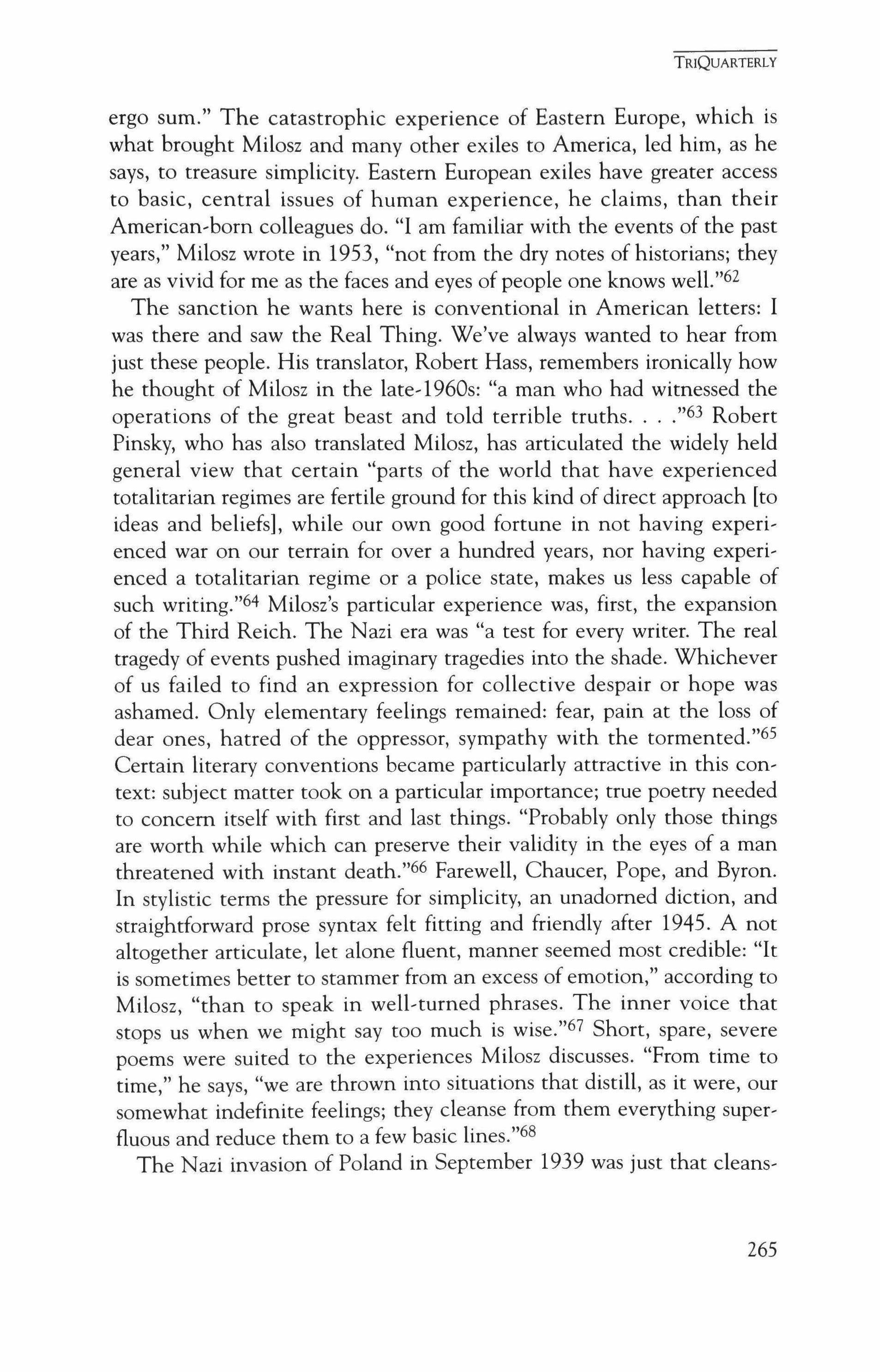
ergo sum." The catastrophic experience of Eastern Europe, which is what brought Milosz and many other exiles to America, led him, as he says, to treasure simplicity. Eastern European exiles have greater access to basic, central issues of human experience, he claims, than their American-born colleagues do. "I am familiar with the events of the past years," Milosz wrote in 1953, "not from the dry notes of historians; they are as vivid for me as the faces and eyes of people one knows welL"62
The sanction he wants here is conventional in American letters: I was there and saw the Real Thing. We've always wanted to hear from just these people. His translator, Robert Hass, remembers ironically how he thought of Milosz in the late-1960s: "a man who had witnessed the operations of the great beast and told terrible truths "63 Robert Pinsky, who has also translated Milosz, has articulated the widely held general view that certain "parts of the world that have experienced totalitarian regimes are fertile ground for this kind of direct approach [to ideas and beliefs], while our own good fortune in not having experienced war on our terrain for over a hundred years, nor having experienced a totalitarian regime or a police state, makes us less capable of such writing."64 Milosz's particular experience was, first, the expansion of the Third Reich. The Nazi era was "a test for every writer. The real tragedy of events pushed imaginary tragedies into the shade. Whichever of us failed to find an expression for collective despair or hope was ashamed. Only elementary feelings remained: fear, pain at the loss of dear ones, hatred of the oppressor, sympathy with the tormented."65 Certain literary conventions became particularly attractive in this context: subject matter took on a particular importance; true poetry needed to concern itself with first and last things. "Probably only those things are worth while which can preserve their validity in the eyes of a man threatened with instant death."66 Farewell, Chaucer, Pope, and Byron. In stylistic terms the pressure for simplicity, an unadorned diction, and straightforward prose syntax felt fitting and friendly after 1945. A not altogether articulate, let alone fluent, manner seemed most credible: "It is sometimes better to stammer from an excess of emotion," according to Milosz, "than to speak in well-turned phrases. The inner voice that stops us when we might say too much is wise."67 Short, spare, severe poems were suited to the experiences Milosz discusses. "From time to time," he says, "we are thrown into situations that distill, as it were, our somewhat indefinite feelings; they cleanse from them everything superfluous and reduce them to a few basic lines."68
The Nazi invasion of Poland in September 1939 was just that cleans-
TRIQUARTERLY
265

ing, distilling catalyst, with the consequence that certain ordinary objects gained new cachet for writers and some sorts of discourse lost all credibility: "That long-dreaded fulfillment had freed us from the selfreassuring lies, illusions, subterfuges; the opaque had become transparent; only a village well, the roof of a hut, or a plow were real, not the speeches of statesmen recalled now with ferocious irony. The land was singularly naked, as it can only be for people without a state, torn from the safety of their habits."69 Milosz was surprisingly close to Williams in this one regard: "I would like to trust my five senses, to encounter naked reality nakedly, but between me and what I see and touch there is a pane of glass-my conception of nature "70 The young poets like Creeley and Olson who turned to Williams in the postwar years were responding not just to polemics about meter but more importantly to international disgust at what ideas and ideology had made of the world. They all saw history as maya, or what Milosz characterizes as a labyrinthine cocoon of mental constructs from which he would like to escape altogether, though he acknowledges, as Williams never did, that "We are unable to live nakedly."71 But the audience for Milosz's writing was in the Partisan Review, not in the Black Mountain Review. The cult of naked experience had a political significance in New York: it meant opposition to utopian ideology. In literary terms this cult attached itself to the translation of central European writing and undergirded a plain, even flat style-anonymous, joyless.
It is always commonplace for journalists to celebrate poets for their extraordinary lives and experiences, whereas poet-critics remind readers that poets deserve celebrity only for their writing. In the case of Milosz, however, even poet-critics take the journalist's tack; the poems are presented as documents of a special life more than as artifacts. Seamus Heaney has expressed his admiration of Milosz's short poem "Incantation" in a way that illuminates the issue greatly.
It counted for much that this poem was written by somebody who had resisted the Nazi occupation of Poland and had broken from the ranks of the People's Republic after the war and paid for the principle and pain of all that with a lifetime of exile and self-scrutiny, The poem, in fact, is a bonus accruing to a life lived in the aftermath of right and hurtful decisions, and it elicits the admiration of English-speaking readers partly because of this extra-literary consideration. It is therefore typical of work by many other poets, particularly in the Soviet republics and the Warsaw Pact countries, whose poetry not only witnesses the poet's refusal to lose his or her cultural memory but also testifies thereby to the continuing effi-
TR1QUARTERLY
266

cacy of poetry itself as a necessary and fundamental human act.72
The celebration of Eastern European poetry has produced an embarrassing martyrology, as Heaney goes on to suggest, but it has reminded American readers nonetheless of the resources and authority of poetry. If American readers treat poetry as marginal, translation has demonstrated that the art itself is not to blame. It may be that, as Heaney says, poetic "greatness is shifting away from [the English language]."73 Or, one might say, with Joseph Epstein and many others, that American poets have not answered to the responsibilities of their art. One problem with the appreciative response to translated poetry has been the challenge that American poets, if they wish for an audience, produce a similar product. There are many reasons to object to the biographical approach to Eastern European poetry, but it is exactly the approach that Milosz himself has more or less requested. "By fusing individual and historical elements in my poetry," he wrote in his autobiography, "I had made an alloy that one seldom encounters in the West."74 He has done more than simply write about the Nazi invasion of the East and the experience of the Holocaust; he has established in his poems a personal angle on these momentous events. His poetry is deliberately presented as a witness to history, and his readers and collaborators have been satisfied to take him at his word.
It has to be admitted that Milosz's dwelling on the idea of historyand this idea has been a fixed feature of American poetry since long before his work received attention-often produces a kind of ponderous melancholy.
-For history
Is no more comprehensible. Our species Is not ruled by any reasonable law. The boundaries of its nature are unknown. It is not the same as I, you, a single human.i"
But there is no reason to judge poets by their weaknesses; the job is rather to account for the strengths, and Milosz's are great. If by history one means narratives or explanations about how the significant events of the past have shaped the present, it is clear that readers, journalists and critics surely do not want that in poetry; otherwise Charles Olson might be a popular poet. Rather, history is commonly meant to signify not the explanations of the past but the force of the
TRIQUARTERLY
267

past itself, and what is alleged is that certain poets have felt that force and retain the memory of it, that they somehow embody that force. This is important, because history as a body of discourse is regarded as a source of knowledge, though the critics who complain about the absence of history in American poetry do not look to poets for knowledge. They look instead for feeling, and expect a memory of the past, like an echo chamber, to amplify that feeling's significance. The feelings that, in Milosz, arise in response to history-as-force are interestingly not those that seem appropriate to a sense of history-as-knowledge. Knowledge of history is usually complicated, not simple; thoroughly mediated, not direct and straightforwardly present; impersonal and unsympathetic. Is this what the poetry of Milosz presents?
A Confession
My Lord, I loved strawberry jam And the dark sweetness of a woman's body. Also well-chilled vodka, herring in olive oil, Scents, of cinnamon, of cloves. So what kind of prophet am I? Why should the spirit Have visited such a man? Many others Were justly called, and trustworthy. Who would have trusted me? For they saw How I empty glasses, throw myself on food, And glance greedily at the waitress's neck. Flawed and aware of it. Desiring greatness, Able to recognize greatness wherever it is, And yet not quite, only in part, clairvoyant, I knew what was left for smaller men like me: A feast of brief hopes, a rally of the proud, A tournament of hunchbacks, literature.
Berkeley, 198576
This wonderful short poem, translated with Hass, seems to me a long way from historical knowledge, and not because history is not mentioned in the poem. The poem's pleasures are charismatic and corne from the shapely revelation of character, not from any specificity of local life. Milosz's verse consistently invokes imagery, as here, in a generic fashion, often even in his best poems (as in "In Music") sentimentally remembering the Dorfleben of Eastern Europe; in other poems,
TRIQUARTERLY
268

like "Bypassing Rue Descartes," he uses cities as settings for historical parables. The vodka, herring and cinnamon here stand, credibly, effectively, for the urbane pleasures of the body, in Eastern Europe. The confession is of apparent veniality, and how clever to begin with strawberry jam. The strength of the poem is in its assured reticence: he knows himself and is comfortable to leave much only partly said. For example, the pleasures of the body seem innocent, yet the confession is real, because the disturbing issue is what he would do for food, drink, or women, what trust he would betray. That he has so betrayed trust is tacitly acknowledged in the sequence of questions-is that venial? Is pride? He won't question whether the spirit has truly visited him; that much is presumed. "Desiring greatness ," his ability to see it in others comes from thatambition, striving, envy. His corruption, like his greatness, is presented in relation to that of others-the tournament of hunchbacks is right here: yes, he names his avarice bitingly {ll. 9�10}, but what matters to him is not only the fact of his corruptibility but also that they, the justly chosen, saw it. The last line is stunning and harsh as a characterization of the literary life, yet, after this speech, plausible, maybe only just.
Milosz presents himself generally not simply as one who happened to be present at certain historical events; he has argued explicitly that the twentieth century deserves to be defined not in terms of scientific or technological achievement, or philosophical development, but rather in terms of the elevation of history to a new status. "In modern times," he wrote, "the great metaphysical operation has been the attempt to invest history with meaning."?" History, he said in 1953, "has taken the place of God in this century "78 On the one hand, this elevation of history was the work of Marxists attempting to rationalize brutal oppression: sacrifices had to be made in the pursuit of revolution; the future justified them. This is Stalinist logic, which Milosz deplored.Z? On the other hand, though, he agreed that the Stalinist priests of the New Faith understood their moment: the sanction of history is the highest authority a modern writer can invoke. No wonder that Milosz seeks just this. In historiographical terms, however, Milosz is a strict constructionist. History shows that people are capable of anything and evervthing.s? He rejects the revelationist or scientific {read: Stalinist} notion that history is "governed by unshakable and already known laws," though this is the basis of the Marxist claim for the authority of historical proof [Milosz's emphasis].81 On the contrary, his claim to having witnessed momentous events expresses the sense that only one who has seen what was unimaginable in fact occur can understand the transience of governments and
TRIQUARTERLY
269

institutions. As a boy during World War I Milosz and his family lived in a covered wagon: history is entirely fluid, life is "ceaseless wandering."82 His condescension to western, particularly American, writers derives from the belief that those who have not witnessed the destruction of their homes and the dissolution of their governments cannot know what life has to offer. "The man of the East cannot take Americans seriously," Milosz wrote bluntly, in a book addressed to an American audience, "because they have never undergone the experiences that teach men how relative their judgments and thinking habits are."83 With no sense of history, they naively think their institutions and environment immurable.f+
Milosz's view of American culture is a European commonplace.8S The naivete, however, is rather with the Europeans who, like Milosz, believe that America is without its history. This is quite a different belief from the claim that Americans naively ignore their own history. Only once in his prose does Milosz notice similarity between European and American history: when reflecting on the courage of the Donner party, he is reminded of the fortitude of the prisoners of the concentration camps.86 Why does this man of two lives, one as European, one as Californian, so seldom find similarity between European culture and that of North America? It is particularly revealing and disappointing too that, the one time he identifies such a similarity, the two historical events are themselves lurid. Europeans like to conceive of American history in extremist terms: slavery, racism, and war are the topics of historical experience that recur in European discussions of American history. Milosz might well have some acquaintance with American social, economic, or diplomatic history, say; cannibalism and genocide are the lurid hot spots ofhistory. The danger here is that history be conceived as operatic. This is not to say that Milosz is in fact dismissive of American culture generally. He has repeatedly referred to the intellectual and cultural achievement and promise of America: "it is clearly becoming the most poetic and artistic country in the world."87 The future looks so bright to him because of the American investment in research and higher education.88 He argued strenuously in his 1983 Norton lectures at Harvard that poets of our time have not adequately responded to the challenges brought by the expansion of scientific knowledge. What he sees in America's future is not only the cultural effects of its prosperity; his argument runs much deeper. There is a brutality about the American experience that has taught him strength and humility. The American experience does, in his view, reinforce the Cold War vision of a future
TRIQUARTERLY
270

"beyond ideology." Here he has come to see not only the folly of utopian ideologies, such as Marxism, but more generally the limits of intellectual control of the future. Europeans often express horror at the complacency of Americans before the banality of life here.89 He understands the American experience as essentially "corrosive": beliefs, values, and hopes drop away in the course of American life. Life in the American empire, as in the Roman, seems to breed toughness: "America pushes you to the wall and compels a kind of stoic virtue: to do your best and at the same time to preserve a certain detachment that derives from an awareness of the ignorance, childishness, and incompleteness of all people, oneself included.Y? America is, as Milosz said, "the unintentional precursor of modem life," because communities all over the world must come to terms with estrangement from their immediate past; hierarchies everywhere have collapsed, and Americans are ahead insofar as they survived the collapse long ago.91
Much of what I have discussed here is not translation in the narrow and common sense of the word, but all of it is a carrying over, sometimes of a poem, sometimes of a career, sometimes of a nontextual cultural practice. In all these transactions, questions about the source of authority arise. The mere pursuit of the genuine in some foreign place or text is usually sentimental, as the American taste for Milosz and other Eastern European poets usually is; but critical examination of any claim to genuineness is indeed valuable, and that is what one has in Milosz's poems. We should not hastily speak about the imperialism of translations, I think, because so often they stir admirable curiosity, and self-skepticism: and poets writing translations are often seeking to experience differences that may change their work or life, not just consolidate their authority. Although there are certainly translations, attractive and cornpelling ones, that borrow authority from other times and places, there are still others that question the authority of our contemporary cultural practices, or of the poet's own writing. Translation provides an opportunity for contemplating limits and boundaries. Lawrence Venuti argues cogently for the need to mark those boundaries linguistically. None of the poets cited here has tried to obscure or slide over the differences between one poetry or culture and another. American poetry of this half-century has been extraordinarily rich in this art of the provisional, where texts themselves are obviously divided within themselves. Boldness and audacity have indeed been abundant in recent translations, but not self-satisfaction.
TRIQUARTERLY
271

Notes
1. Frank O'Hara, The Selected Poems, ed. Donald Allen (New York: Knopf, 1974),146.
2. George Steiner, "An Arion Questionnaire: 'The Classics and the Man of Letters," Arion III, 4 (Winter 1964), 83.
3. Allen Grossman with Mark Halliday, The Sighted Singer (Baltimore: Johns Hopkins University Press, 1992),61.
4. Federico Garda Lorca, "The Duende: Theory and Divertissement," in Poet in New York, trans. Ben Belitt (New York: Grove, 1955), 154.
5. Ibid., 163
6. Max Hayward, "Conversation on Literary Translation," in The Poet's Other Voice: Conversations on Literary Translations, ed. Edwin Honig (Amherst: University of Massachusetts Press, 1985), 129.
7. Frank Bidart, In the Western Night (New York: Farrar, Straus & Giroux, 1990),52.
8. Catullus (Gai Valeri Catulli Veronensis Liber), trans. Celia and Louis Zukofsky (London: Cape Goliard, 1969), Carmen 85.
9. Clarence Brown, "An Afterthought on the Translation," in OsiP Mandelstam: Selected Poems, trans. Clarence Brown and W. S. Merwin (New York: Atheneum, 1973), xv.
10. Ronald Johnson, Radi os, OI�OIV (Berkeley: Sand Dollar, 1977), n.p.
11. John Milton, Complete Poems and Major Prose, ed. Merritt Y. Hughes (New York: Odyssey, 1957), 236�37.
12. Eric Cheyfitz, The Poetics of Imperialism (New York: Oxford University Press, 1991), 104.
13. Susan Bassnett and Andre Lefevere, "General Editors' Preface," in Lawrence Venuti, The Translator's Invisibility: A History ofTranslation (London: Routledge, 1995), vii.
14. Response to a "Questionnaire: The State of Translation," Delos 2 (1968), 66.
15. Nietzsche, quoted in George Steiner, After Babel (New York: Oxford University Press, 1975),247.
16. David Young, "Second Honeymoon: Some Thoughts on Translation," Field 11 (Fall 1974), 80.
17. Response to Questionnaire, Delos 2 (1968),47.
18. Hans Erich Nossack, "Translating and Being Translated," in Theories of Translation: An Anthology of Essays from Dryden to Derrida, Rainer Schulte and John Biguenet, eds. (Chicago: University of Chicago Press, 1992), 228.
19. Ibid., 229.
20. Dante Gabriel Rossetti, Preface to The Early Italian Poets, ibid., 65.
21. Octavio Paz, "Translation: Literature and Letters," ibid., 154.
22. John Dryden, "On Translation," in Theories ofTranslation, 30.
23. Nossack, 234.
TRIQUARTERLY
272

24. Paz, 160.
2S. Quoted by David Young in Field 11 (Fall 74),83.
26. Jack Ludwig, "An Arion Questionnaire," 62.
27. Jerome Rothenberg, "Why Deep Image?" Trobar 3 (1961),31.
28. Robert Creeley to Jerome Rothenberg, 6 November 1960, in "Jerome Rothenberg and Robert Creeley: An Exchange," Kulchur II, 6 (Autumn 1962), 27. Clayton Eshleman was also critical of Bly's too easy translations of Latin American poetry; see his review of Twenty Poems of Cesar Vallejo in Kulchur IV, 14 (Summer 1964), 90.
29. Jerome Rothenberg to Robert Creeley, 28 November 1960, ibid., 34-3S.
30. Editorial Statement, Trobar 2 (1961), 2.
31. Robert Kelly, "Notes on the Poetry of Deep Image," Trobar 2 (1961),16.
32. Jerome Rothenberg, Letter to the Editors, Kulchur III, 11 (Autumn 1963), lOS.
33. Barry Alpert, "Jerome Rothenberg-An Interview," Vort III, 1 (197S), 109.
34. Jerome Rothenberg and Dennis Tedlock, "Statement of Intention," Alcheringa I, 1 (Autumn 1970), 1.
3S. Ibid.
36. Jerome Rothenberg, "Pre-Face to a Symposium on Ethnopoerics," Alcheringa II, 2 (1976), 6.
37. Ibid., 7.
38. Toronto Research Group, "TRG Research Report 1: Translation," Vort IIl.1 (197S), 134.
39. Denise Levertov, "An Argument," The Floating Bear 11 (1961), l1S.
40. Kevin Power, "Conversation with Jerome Rothenberg," Vort III, 1 (197S),141.
41. Vort III, 1; 146.
42. See Kevin Power, An Image is an Image is an Image, Vort III, 1; 154, 156.
43. Jerome Rothenberg, Pre-Faces & Other Writings (New York: New Directions, 1981), 83.
44. Ibid., 77.
45. Jerome Rothenberg, "A Note to Accompany 'The First Horse-Song of Frank Mitchell,'" Alcheringa I, 1 (Autumn 1970), 63.
46. George Quasha and Jerome Rothenberg, eds., American, a Prophecy (New York: Vintage, 1973), xxxii.
47. Jerome Rothenberg, Pre-Faces, 30-31.
48. Ibid., 93.
49. Charles Rowell, "'The Unraveling of the Egg': An Interview with Jay Wright," Callaloo VI, 3 (Fall 1983), 9.
50. Jay Wright, The Double Invention of Komo (Austin: University of Texas, 1980),42.
51. Rowell, 14.
52. The Double Invention ofKomo, 45.
TRIQUARTERLY
273

53. Jay Wright, "Desire's Design, Vision's Resonance: Black Poetry's Ritual and Historical Voice," Callaloo X, 1 (Winter 1987),18.
54. The Double Invention ofKomo, 45.
55. Wright, "Desire's Design ," 14.
56. Sven Birkerts, The Electric Life: Essays on Modern Poetry (New York: William Morrow, 1989),81.
57. Bruce Murphy, "The Exile of Literature: Poetry and the Politics of the Other(s)," Critical Inquiry XVII, 1 (Autumn 1990), 162.
58. Czeslaw Milosz, Visions from San Francisco Bay, trans. Richard Lourie (New York: Farrar, Straus & Giroux, 1982),206.
59. Milosz, The Captive Mind, trans. Jane Zielonko (New York: Knopf, 1953), 161.
60. Ibid., 161.
61. Ibid., ix.
62. Ibid., 217.
63. Robert Hass, Twentieth Century Pleasures (New York: Ecco, 1984), 178.
64. "A Conversation with Robert Pinsky," TriQuarterly #92 (Winter 1994/95),22.
65. Milosz, Captive Mind, 86.
66. Ibid., 39.
67. Ibid., 105.
68. Czeslaw Milosz, Native Realm, trans. Catharine S. Leach (Berkeley: University of California Press, 1981), 139.
69. Ibid., 204.
70. Milosz, Visions, 21
71. Ibid., 176.
72. Seamus Heaney, The Government of the Tongue (New York: Farrar, Straus & Giroux, 1989),38.
73. Ibid.
74. Milosz, Native Realm, 248.
75. Milosz, Provinces: Poems 1987�1991, trans. with Robert Hass (Hopewell, N.J.: Ecco, 1991), 14.
76. Milosz, The Collected Poems, 1931�1987 (Hopewell, N.J.: Ecco, 1988), 451.
77. Milosz, Visions, 178.
78. Milosz, Captive Mind, 29.
79. Ibid., 199,211.
80. Ibid., 27�28.
81. Ibid., 191.
82. Milosz, Native Realm, 41.
83. Milosz, Captive Mind, 28.
84. Milosz, Native Realm, 263.
85. Donald Davie believes on the contrary that Milosz has for many years been a critical but often also sympathetic critic of North American society
TRIQUARTERLY
274
(Donald Davie, Czeslaw Milosz and the Insufficiency of Lyric [Knoxville, Tenn.: University of Knoxville Press, 1986]), x-xi.
86. Milosz, Visions, 61.
87. Ibid., 124.
88. Ibid., 200.
89. Ibid., 146.
90. Ibid., 219.
91. Ibid., 208.

TRIQUARTERLY
275
Juniper I, Arches National Park
In the saliva / in the paper
Frida Kahlo
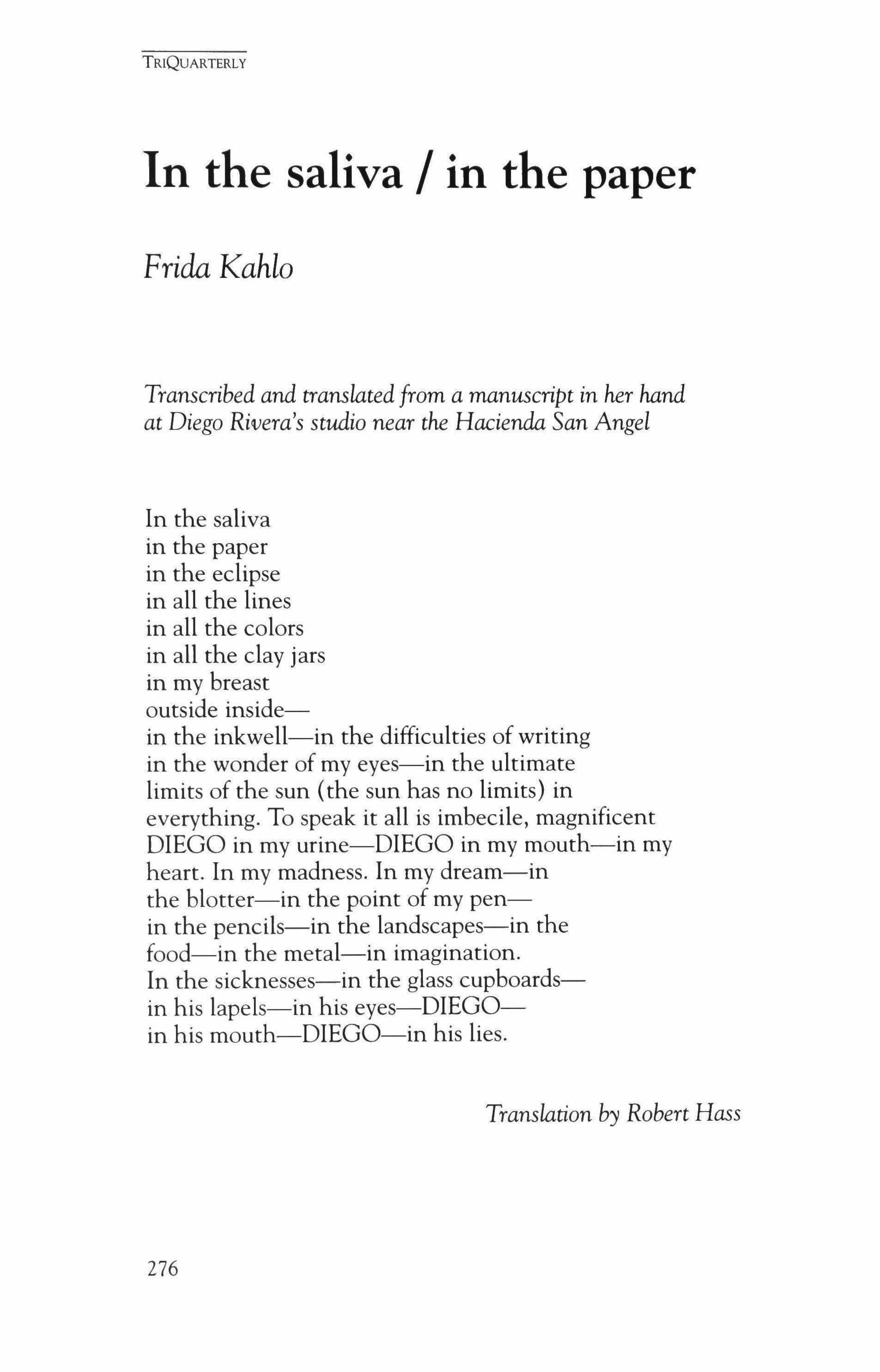
Transcribed and translated from a manuscript in her hand at Diego Rivera's studio near the Hacienda San Angel
In the saliva in the paper in the eclipse in all the lines in all the colors in all the clay jars in my breast outside insidein the inkwell-in the difficulties of writing in the wonder of my eyes-in the ultimate limits of the sun (the sun has no limits) in everything. To speak it all is imbecile, magnificent DIEGO in my urine-DIEGO in my mouth-in my heart. In my madness. In my dream-in the blotter-in the point of my penin the pencils-in the landscapes-in the food-in the metal-in imagination. In the sicknesses-in the glass cupboardsin his lapels-in his eyes-DIEGOin his mouth-DIEGO-in his lies.
Translation by Robert Hass
TRIQUARTERLY
276
Contributors

Robert Whittaker is the co-editor of Russian editions of the American letters to Tolstoy and of the letters of the nineteenth-century poet and critic Apollon Grigoriev, the latter of which will be published in Russia in 1996. He has also completed a biography of Grigoriev entitled Russia's Last Romantic. * * * U.S. Poet Laureate Robert Hass's most recent books, all published by Ecco Press, are a volume of poems, Human Wishes (1989), a book of translations, The Essential Haiku: Versions of Basho, Buson, and Isa (1994), and a translation of Czeslaw Milosz's volume, Facing the River: New Poems (1995), on which he collaborated with the author. * * * John Barth's latest books, both published by Little, Brown, are the novel/memoir, Once Upon a Time (1994), and the essay collection, Further Fridays (1995). * * * Philip Levine's most recent book, The Simple Truth (Knopf, 1994), won the Pulitzer Prize in Poetry. * * * Harry Thomas is the translator of Gorbunov and Gorchakov by Joseph Brodsky (Farrar, Straus & Giroux, 1988) and the editor of Selected Poems of Thomas Hardy (United Kingdom: Penguin, 1993). He is at work on lake's Mania, a meditation on Hemingway and persecution, and on Montale in English, the latter of which is forthcoming from Penguin.
Sharon Olds's fifth book of poems, The Wellspring, is being published by Knopf in 1996. * * * Elise Paschen's poems have appeared in the New Yorker, Poetry, the New Republic, the Nation and in two anthologies, Unleashed: Poems by Writers' Dogs, edited by Amy Hempel and Jim Shepard (Crown, 1995), and A Formal Feeling Comes: Poems in Form by Contemporary Women, edited by Annie Finch (Storyline, 1994). * * * Edward Kleinschmidt's second book of poems, First Language
TRIQUARTERLY
277

(University of Massachusetts Press, 1990), received the Juniper Prize in 1989. The poem appearing in this issue is drawn from a new book, Temporale, from which other parts have been published in the Iowa Review, Boulevard, Partisan Review, New England Review and other journals. * * * Billy Collins's most recent book of poems is The Art of Drowning (University of Pittsburgh Press, 1995). * * * Katherine Min's stories have appeared in Ploughshares and TQ #89 and are forthcoming in Prairie Schooner and ACM. * * * Lynn Marie's story, "Lovesong," is drawn from her first novel, The Momentum of Beauty, other excerpts of which have appeared in the Kenyon Review, African American Review and the Gettysburg Review. * * * Alan Michael Parker's poems have appeared in Antaeus, Boulevard, the Paris Review, the New Yorker and other magazines. He is the co-editor of The Routledge Anthology of Cross-Gendered Verse (Routledge, 1996). * * *
Mark Willhardt is the co-editor, with Alan Michael Parker, of The Routledge Anthology of Cross-Gendered Verse. He is writing a book about the intersections of modem Scottish poetry and politics, entitled Hugh MacDiarmid and the Contradictions of Nation.
Carl Phillips is the author of two books of poems: In the Blood (Northeastern University Press, 1992) and Cortege (Graywolf, 1995).
* * * Linda Gregg's most recent book of poems is Chosen by the Lion (Graywolf, 1994).
* * * Michael Heffernan is the author of five books of poems, including most recently The Back Road to Arcadia (Dublin, Ireland: Salmon Poetry, 1994) and Love's Answer (University of Iowa, 1994), winner of the Iowa Poetry Prize. * * * Diana Hume George's books include Oedipus Anne: The Poetry ofAnne Sexton (1988) and The Lonely Other: A Woman Watching America (1996), both published by the University of Illinois Press. * * * Cynthia Macdonald has published six books of poems, including Living Wills: New and Selected Poems (Knopf, 1991) and the just-completed I Can't Remember.
* * * Maxine Kumin's eleventh book of poems, Connecting the Dots, is being published by W. W. Norton in 1996. Her other books include Women, Animals and Vegetables: Essays and Stories (W. W. Norton, 1994) and In Deep, which received the Pulitzer Prize in 1973. * * * Joyce Carol Oates's most recent book is the novel, Zombie (Dutton, 1995). Her forthcoming story collection, Will You Always Love Me?, includes two stories originally published in TQ, one of which ("You Petted Me, and I Followed You Home") was reprinted in Prize Stories: The o. Henry Awards 1995.
Campbell McGrath is the author of two volumes of poems, Capitalism
TRIQUARTERLY
278
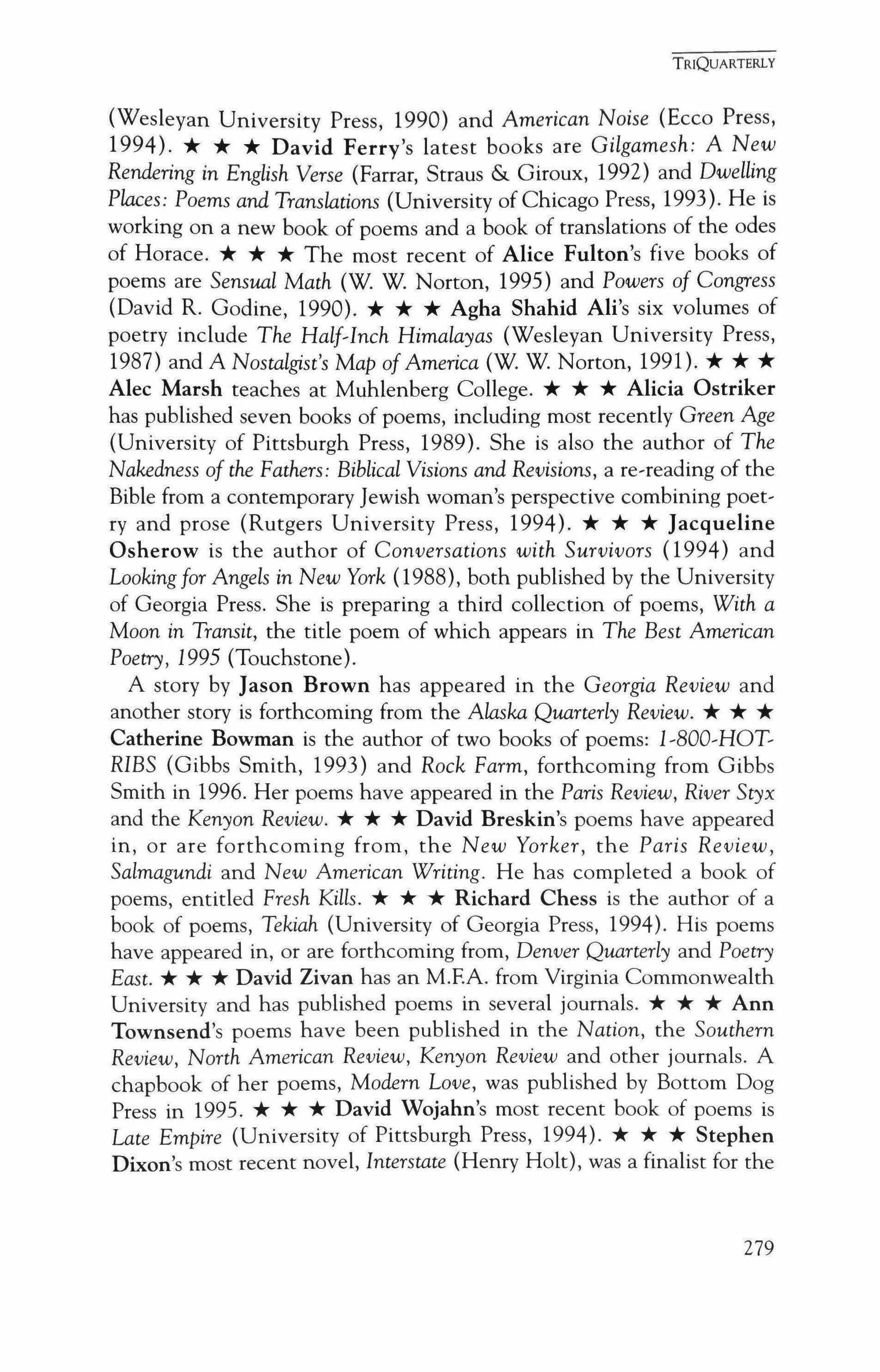
(Wesleyan University Press, 1990) and American Noise (Ecco Press, 1994). * * * David Ferry's latest books are Gilgamesh: A New Rendering in English Verse (Farrar, Straus & Giroux, 1992) and Dwelling Places: Poems and Translations (University of Chicago Press, 1993). He is working on a new book of poems and a book of translations of the odes of Horace. * * * The most recent of Alice Fulton's five books of poems are Sensual Math (W. W. Norton, 1995) and Powers of Congress (David R. Godine, 1990). * * * Agha Shahid Ali's six volumes of poetry include The HalfInch Himalayas (Wesleyan University Press, 1987) and A Nostalgist's Map of America (W. W. Norton, 1991). * * * Alec Marsh teaches at Muhlenberg College. * * * Alicia Ostriker has published seven books of poems, including most recently Green Age (University of Pittsburgh Press, 1989). She is also the author of The Nakedness of the Fathers: Biblical Visions and Revisions, a re-reading of the Bible from a contemporary Jewish woman's perspective combining poetry and prose (Rutgers University Press, 1994). * * * Jacqueline Osherow is the author of Conversations with Survivors (1994) and Lookingfor Angels in New York (1988), both published by the University of Georgia Press. She is preparing a third collection of poems, With a Moon in Transit, the title poem of which appears in The Best American Poetry, 1995 (Touchstone).
A story by Jason Brown has appeared in the Georgia Review and another story is forthcoming from the Alaska Quarterly Review. * * * Catherine Bowman is the author of two books of poems: 1�800�HOT� RIBS (Gibbs Smith, 1993) and Rock Farm, forthcoming from Gibbs Smith in 1996. Her poems have appeared in the Paris Review, River Styx and the Kenyon Review. * * * David Breskin's poems have appeared in, or are forthcoming from, the New Yorker, the Paris Review, Salmagundi and New American Writing. He has completed a book of poems, entitled Fresh Kills. * * * Richard Chess is the author of a book of poems, Tekiah (University of Georgia Press, 1994). His poems have appeared in, or are forthcoming from, Denver Quarterly and Poetry East. * * * David Zivan has an M.F.A. from Virginia Commonwealth University and has published poems in several journals. * * * Ann Townsend's poems have been published in the Nation, the Southern Review, North American Review, Kenyon Review and other journals. A chapbook of her poems, Modern Love, was published by Bottom Dog Press in 1995. * * * David Wojahn's most recent book of poems is Late Empire (University of Pittsburgh Press, 1994). * * * Stephen Dixon's most recent novel, Interstate (Henry Holt), was a finalist for the
TRIQUARTERLY
279
National Book Award in fiction in 1995. He is publishing two new books in 1996, a collection of stories, Man on Stage: Playstories (Hijinx), and a novel, Abortions (Henry Holt).
Robert von Hallberg is the author of two new books, Poetry, Politics, Intellectuals (Cambridge History of American Literature, forthcoming) and Literary Intellectuals and the Dissolution of the State: Professionalism and Conformity in the GDR (University of Chicago Press, 1996)
*
* * Frida Kahlo (1907-54) was the Mexican painter noted for her brilliantly colored self-portraits rendered in a primitivist mode. In 1925 she was in a disabling bus accident. While convalescing she began to paint seriously and showed some of her work to the muralist Diego Rivera, who encouraged her. They were married in 1929.
*
* * Arthur W. Schaefer's black and white prints have won many awards in the Chicago Area Camera Clubs Association and in the Garden Photographic Society. In 1995, he received the prize for excellence in photography at the Deerpath Festival.

I am very grateful to Professor Edward Wasiolek, Avalon Foundation Distinguished Service Professor Emeritus, Departments of Slavic Languages and Literatures, Comparative Literature, English Language and Literature and the College at the University of Chicago, for putting me in touch with Robert Whittaker and thereby helping to obtain the Tolstoy letters appearing in this issue.
Susan Hahn
TRIQUARTERLY
280
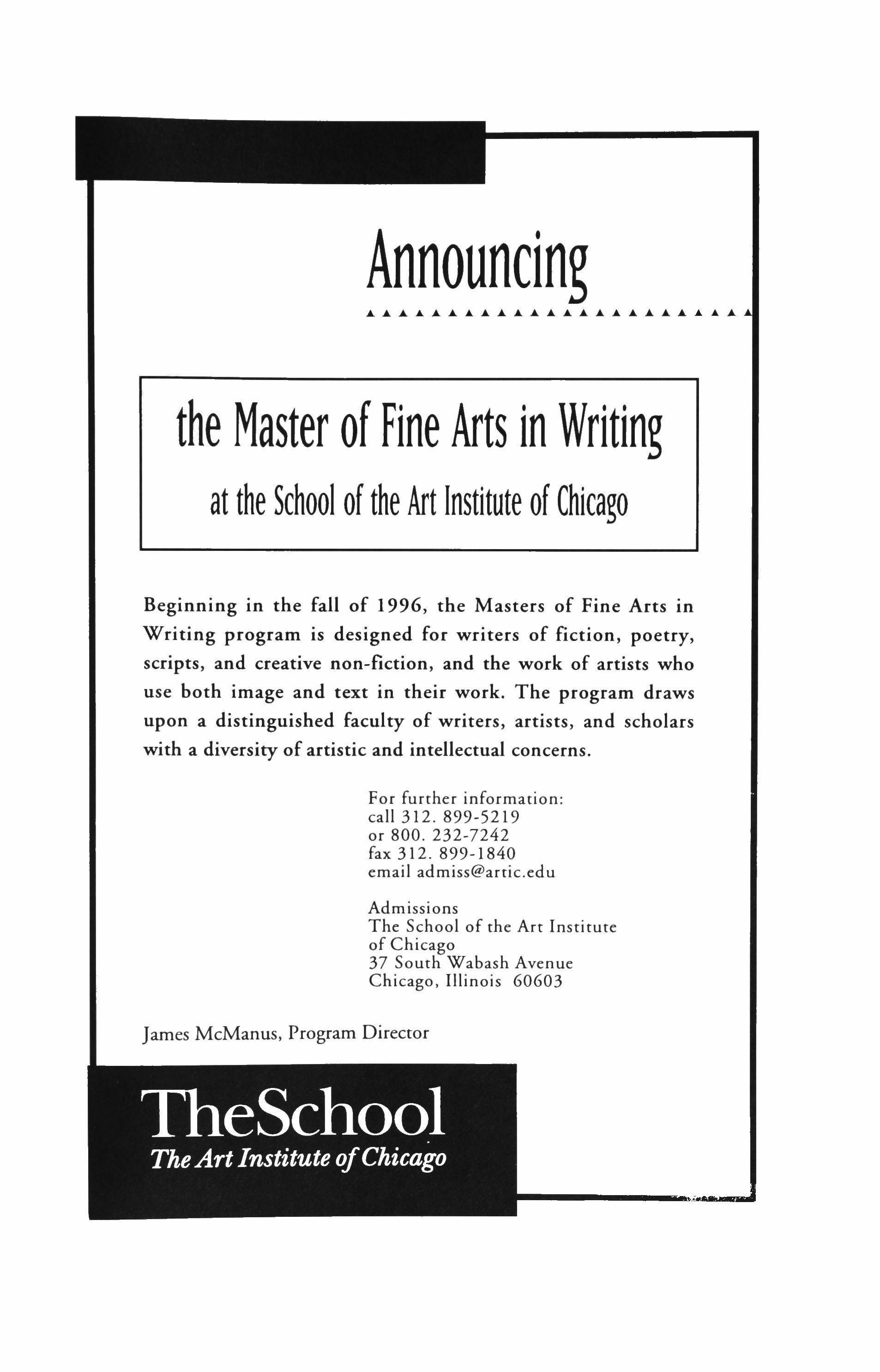
Announcing the Master of Fine Arts in Writing
at the School ofthe Art Institute of Chicago
Beginning in the fall of 1996, the Masters of Fine Arts in Writing program is designed for writers of fiction, poetry, scripts, and creative non-fiction, and the work of artists who use both image and text in their work. The program draws upon a distinguished faculty of writers, artists, and scholars with a diversity of artistic and intellectual concerns.
For further information: call 312. 899-5219 or 800. 232-7242 fax 312.899-1840 email admiss@artic.edu
Admissions
The School of the Art Institute of Chicago 37 South Wabash Avenue Chicago, Illinois 60603
James McManus, Program Director
TheSchool
TheArt Institute ofChicago

TriC02Mcruuli®[J�y
•
• Art •
Fiction
Poetry
Criticism
8uatemaltecas / From rQ
TriQuarterly publishes poetry-and fiction, translations and graphic art-of rare and consistent excellence. For nearly three decades, TriQuarterly has been noted for literary exploration and discovery-always lively, serious and varied. Subscribe now! $24/year $44/2 years 2020 Ridge Avenue Evanston, IL 60208 CALL TOLL-FREE: 800-832-3615
Rene Arceo: MUjeres
#86
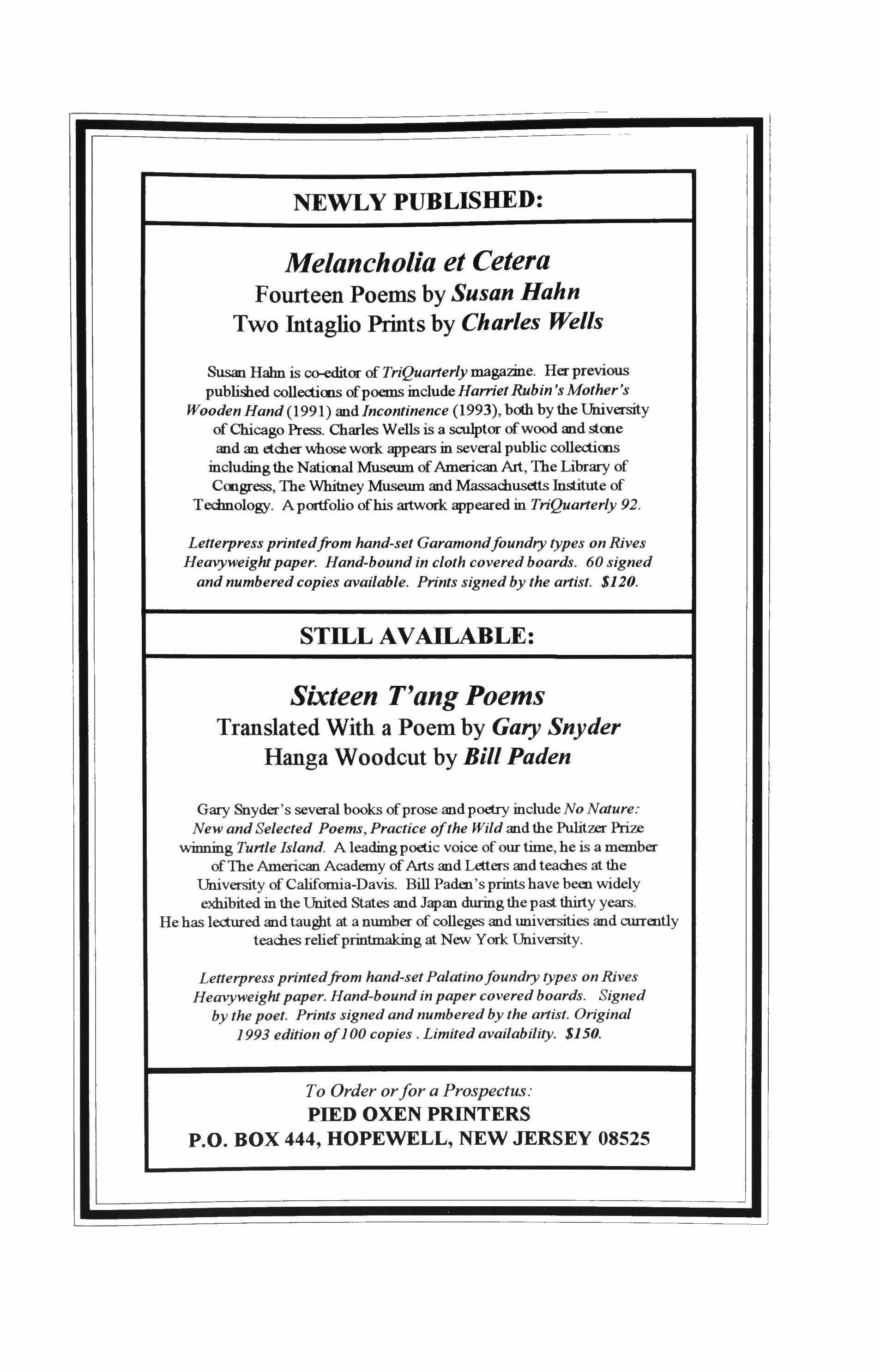
NEWLY PUBLISHED:
Melancholia et Cetera
Fourteen Poems by Susan Hahn
Two Intaglio Prints by Charles Wells
Susan Hahn is co-editor of TriQuarterlymagazine. Her previous published collections ofpoems includeHarrietRubin'sMother's Wooden Hand (1991) and Incontinence (1993), both by the Uiliversity of Chicago Press. Charles Wells is a sculptor ofwood and stme and an etcher whose work appears in several public collections includingthe Natimal Museum ofAmerican Art, The Library of Congress, The Whitney Museum and Massadtusetts Institute of Tedmology. Aportfolio ofhis artwork appeared in TriQuarterly 92.
Letterpressprintedfrom hand-set Garamondfoundry types on Rives Heavyweightpaper. Hand-bound in cloth covered boards. 60 signed and numbered copies available. Prints signedby the artist. $120.
STILL AVAILABLE:
Sixteen T'ang Poems
Translated With a Poem by Gary Snyder Hanga Woodcut by Bill Paden
Gary Snyder's several books ofprose andpoetry include No Nature: New and Selected Poems, Practice ofthe Wild and the Pulitzer Prize winning Turtle Island. A leadingpoetic voice of our time, he is a member ofThe American Academy ofArts and Letters and teaches at the University of Califomia-Davis. Bill Paden's prints have been widely exhibited in the United States and Japan during thepast thirty years. He has lectured and taught at a number of colleges and universities and currently teaches reliefprintmaking at New York University,
Letterpressprintedfrom hand-setPalatinofoundry types on Rives Heavyweightpaper. Hand-bound in paper covered boards. Signed by the poet. Prints signed and numbered by the artist. Original 1993 edition of100 copies. Limited availability. $150.
To Order orfor a Prospectus: PIED OXEN PRINTERS P.O. BOX 444, HOPEWELL, NEW JERSEY 08525
the modern writer as witness
Contributors
John Balaban
American Cities
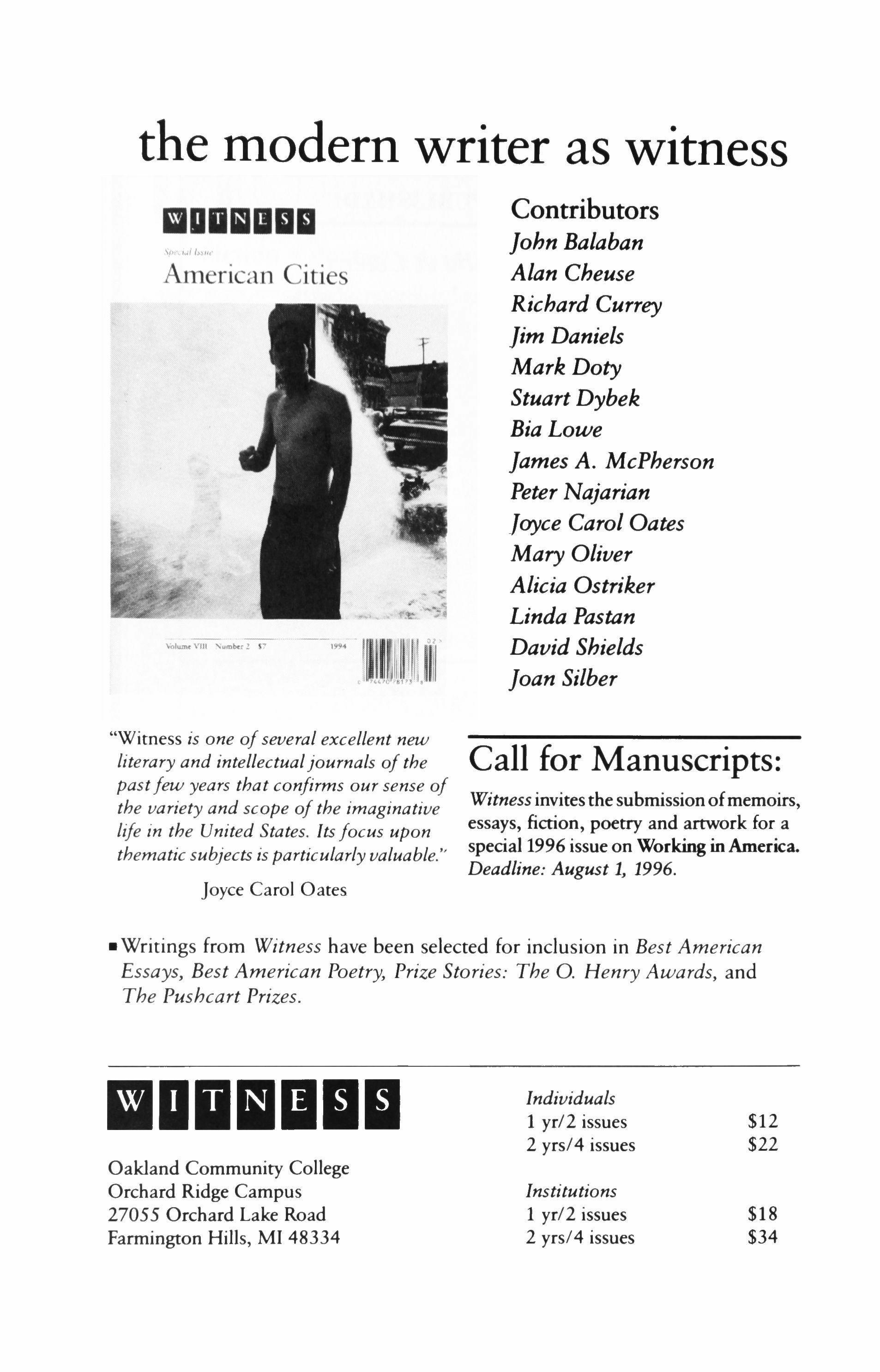
"Witness is one ofseveral excellent new literary and intellectualjournals of the pastfew years that confirms our sense of the variety and scope of the imaginative life in the United States. Its focus upon thematic subjects is particularly valuable."
Joyce Carol Oates
Alan Cheuse
Richard Currey
Jim Daniels
Mark Doty
Stuart Dybek
Bia Lowe
James A. McPherson
Peter Najarian
Joyce Carol Oates
Mary Oliver
Alicia Ostriker
Linda Pastan
David Shields
Joan Silber
Call for Manuscripts:
Witness invitesthesubmissionofmemoirs, essays, fiction, poetry and artwork for a special 1996 issue on Working in America. Deadline: August 1, 1996.
• Writings from Witness have been selected for inclusion in Best American Essays, Best American Poetry, Prize Stories: The 0. Henry Awards, and The Pushcart Prizes.
Oakland Community College
Orchard Ridge Campus
27055 Orchard Lake Road
Farmington Hills, MI 48334
111111111111
-"<:: .,.;".�;� --,,,,��ll ,Il
111111111
Individuals 1 yr/2 issues 2 yrs/4 issues $12 $22 Institutions 1 yr/2 issues 2 yrs/4 issues $18 $34
CONTEMPORARY LITERATURE
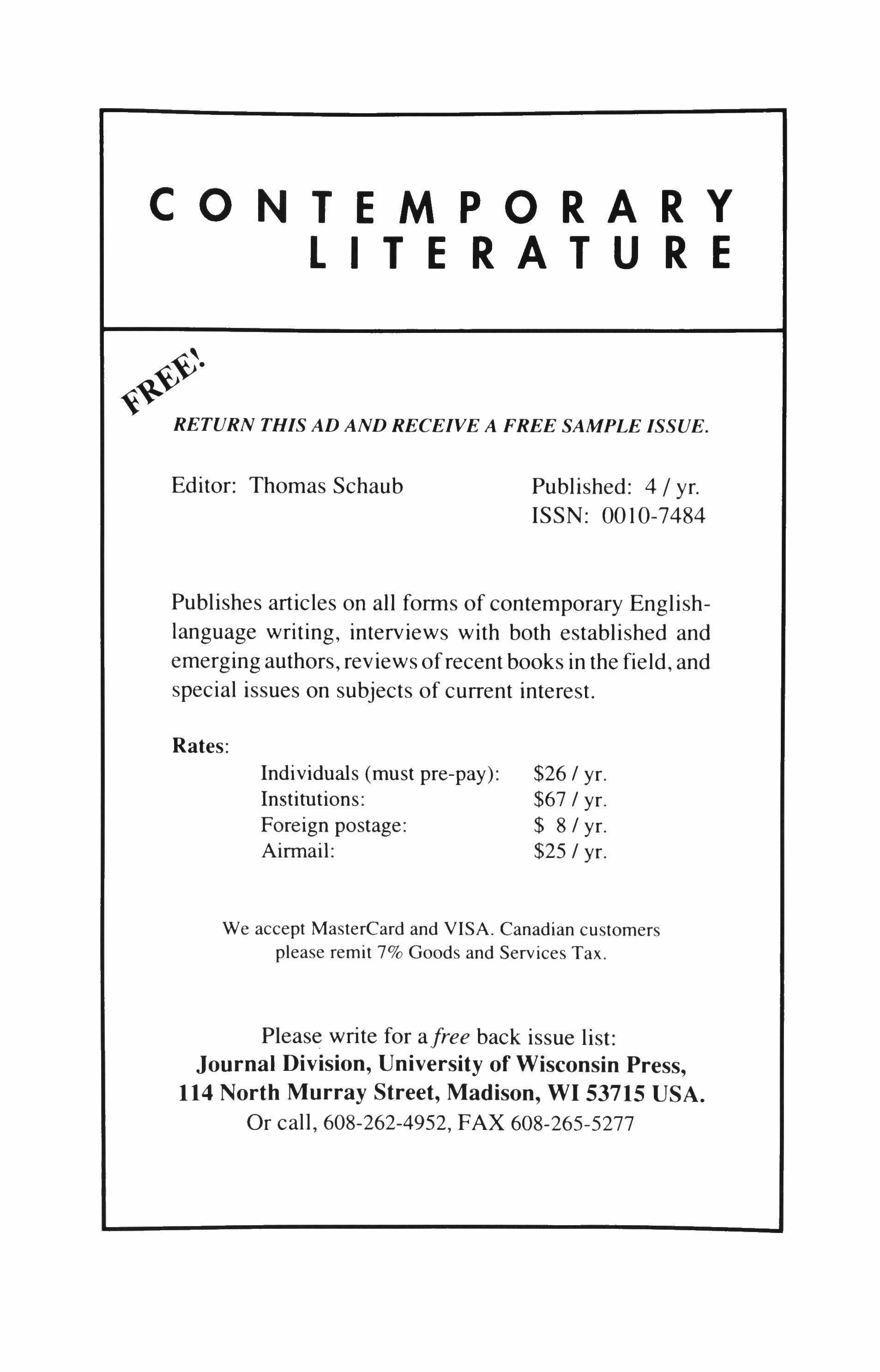
RETURN THIS AD AND RECEIVE A FREE SAMPLE ISSUE.
Editor: Thomas Schaub
Published: 4 / yr.
ISSN: 0010-7484
Publishes articles on all forms of contemporary Englishlanguage writing, interviews with both established and emerging authors, reviews ofrecent books in the field, and special issues on subjects of current interest.
Rates:
Individuals (must pre-pay):
Institutions:
Foreign postage: Airmail:
$261 yr.
$67 1 yr.
$ 81 yr.
$251 yr.
We accept MasterCard and VISA. Canadian customers please remit 7% Goods and Services Tax.
Please write for afree back issue list: Journal Division, University of Wisconsin Press, 114 North Murray Street, Madison, WI 53715 USA. Or call, 608-262-4952, FAX 608-265-5277
��.��

SUBSCRIPTIONS:
NOTRE DAME � ·ANTHONY WALTON,. �1CHAfiD ELMAN �EAMUS H��NEY .' JAI�:(�GORDON ., CZES�AW MII:.:OSZ.AND R9BERT HASS .i DEREK�MAHON JOHN PECK ERNEST SANDEEN MICHAEL COLLINS WILLIAM BRONK CHRISTOPHER JANE CORKERY BERYL SCHLOSSMAN • JULIA BUDENZ I DENISE LEVERTOV • MICHAEt ANANIA AN iNTERVIEW W"H ROBERT OLEN BUTLER
PRICE: $6
OR MONEY ORDER: THE NOTRE DAME REVIEW THE ENGLISH DEPARTMENT THE CREATIVE WRITING PROGRAM UNIVERSITY OF NOTRE DAME NOTRE DAME, IN 46556 INAUGURA41SSUE PUBLISHED SPRING 1995
$15 (INDIVIDUALS) $20 (INSTITUTIONS) SINGLE COpy
CHECK
EDITED BY BOB PERLONGO

1\ Copious COlllltendhull of Facts, I?iglu·es and FIUl altoni the t.uiverse. -'10[1('.\'. SlIm''''", th lUl.iilfo_ Thne. P.� :'\'llhlr.'o ,'tlkl'So AI'. mll'mudl IIIUI't'! ---SICOND
THE UPDATED SOURCE BOOK FOR EVERYONE
"What a jam packed interesting book. The amazing thing to me, as a writer, is 'How do you know when you're finished writing it?' It's not like there's stuff that's supposed to be there."
-Columnist Chuck Shepherd (News of the Weird)
The Everyday AlmanacIt's not your everyday almanac. CAPRA PRESS /468 pp, / $15,95 PB, / ISBN O�88496�398�5
iEVERYDAY �ALMANAC
IDIIION---
TriQuarterly thanks the following past donors and life subscribers:
David C. Abercrombie
Mr. and Mrs. Walter L. Adams
Amin Alimard
Lois Ames
Richard H. Anderson
Roger K. Anderson
Sandy Anderson
I. N. C. Aniebo
Anonymous
University of Arizona Poetry Center
Gayle Arnzen
Michael Attas
Asa Baber
Hadassah Baskin
Tom G. Bell
Sandra Berris
Simon J. Blattner, Jr.
Mr. and Mrs. Andrew K. Block
Louise Blosten
Carol Bly
Susan DeWitt Bodemer
Kay Bonetti
Robert Boruch
Mr. and Mrs. Richard S. Brennan
Van K. Brock
Gwendolyn Brooks
Timothy Browne
Paul Bundy
Eric O. Cahn
David Cassak
Stephen Chapman
Anthony Chase
Michael Chwe
Willard Cook
Mr. and Mrs. William Cottle
Robert A. Creamer
Andrew Cyr
Doreen Davie
Kenneth Day
Mark W. DeBree
Elizabeth Des Pres
Anstiss Drake
J. A. Dufresne
Mr. and Mrs. Donald Egan
John B. Elliott
Christopher English
Carol Erickson
Steven Finch
David R. Fine
Mr. and Mrs. H. Bernard Firestone

Melvin P. Firestone, M.D.
Mr. and Mrs. Solway Firestone
Paul Fjelstad
Torrence Fossland
C. Dwight Foster
Jeffrey Franklin
Peter S. Fritz
Mrs. Angela M. Gannon
Kathy M. Garness
Robert Gislason
Mr. and Mrs. Stanford J. Goldblatt
Lawrence J. Gorman
Maxine Groffsky
Jack Hagstrom
Mrs. Donald Haider
Mrs. Heidi Hall-jones
Mrs. James E. Hayes
Joanna Hearne
Ross B. Heath
Charles Hedde
Gene Helton
Donald Hey
Donald A. Hillel
Mr. and Mrs. David C. Hilliard
Mr. and Mrs. Thomas D. Hodgkins
Craig V. Hodson
Irwin L. Hoffman
Irwin T. Holtzman
P. Hosier
Mary Gray Hughes
Charles Huss
Curtis Imrie
Helen Jacob
Del Ivan Janik
Fran Katz
Gary Michael Katz
Dr. Alfred D. Klinger
Loy E. Knapp
Sydney Knowlton
Mr. and Mrs. Martin Koldvke
Mr. and Mrs. Carl A. Kroch
Greg Kunz
Judy Kunz
Conrad A. Langenberg
John Larroquette
Isaac Lassiter
Dorothy Latiak
Elizabeth Leibik
Patrick A. Lezark
Patricia W. Linton
Philip Lister
Mr. and Mrs. W. J. Lorentz de Haas
Kubet Luchterhand
Ellen L. Marks
Richard Marmulstein
James Marquardt
Charles T. Martin, Jr.
Ms. Jane Mayer
Kevin McCanna
Robert D. McChesney
Charles Gene McDaniel
Martin H. McGrath
Robert McMillan
Mr. and Mrs. Andrew McNally
Michael Meaney
George Meredith
Lois Adele Meyer
Cliff Michel Gallery
University of Michigan Hopwood Room
Michal Miller
Ralph Miller
Kenneth Monroe
William T. Morgan
Max Nathan
Dean Neprud
Fred S. Novy
Catherine Ohs
Lenrie Peters
Paul Peters and Rosemarie Kozdron
Scott Peters
Jane Petro
Lee Phillip
Mrs. Marlene Welsh Phillips
Evelyn Pine
Doyle Pitman
Fran Podulka
Geraldine R. Pratt
Alex T. Primm
Richard Prinz, M.D.
Honora Rankine-Galloway
Anne Katheryn Ream
J. M. Reese
Peter Reich
Susan Reiners
Don Reynolds
Mary Ellen Reynolds
Christopher Richter
Diane Rider
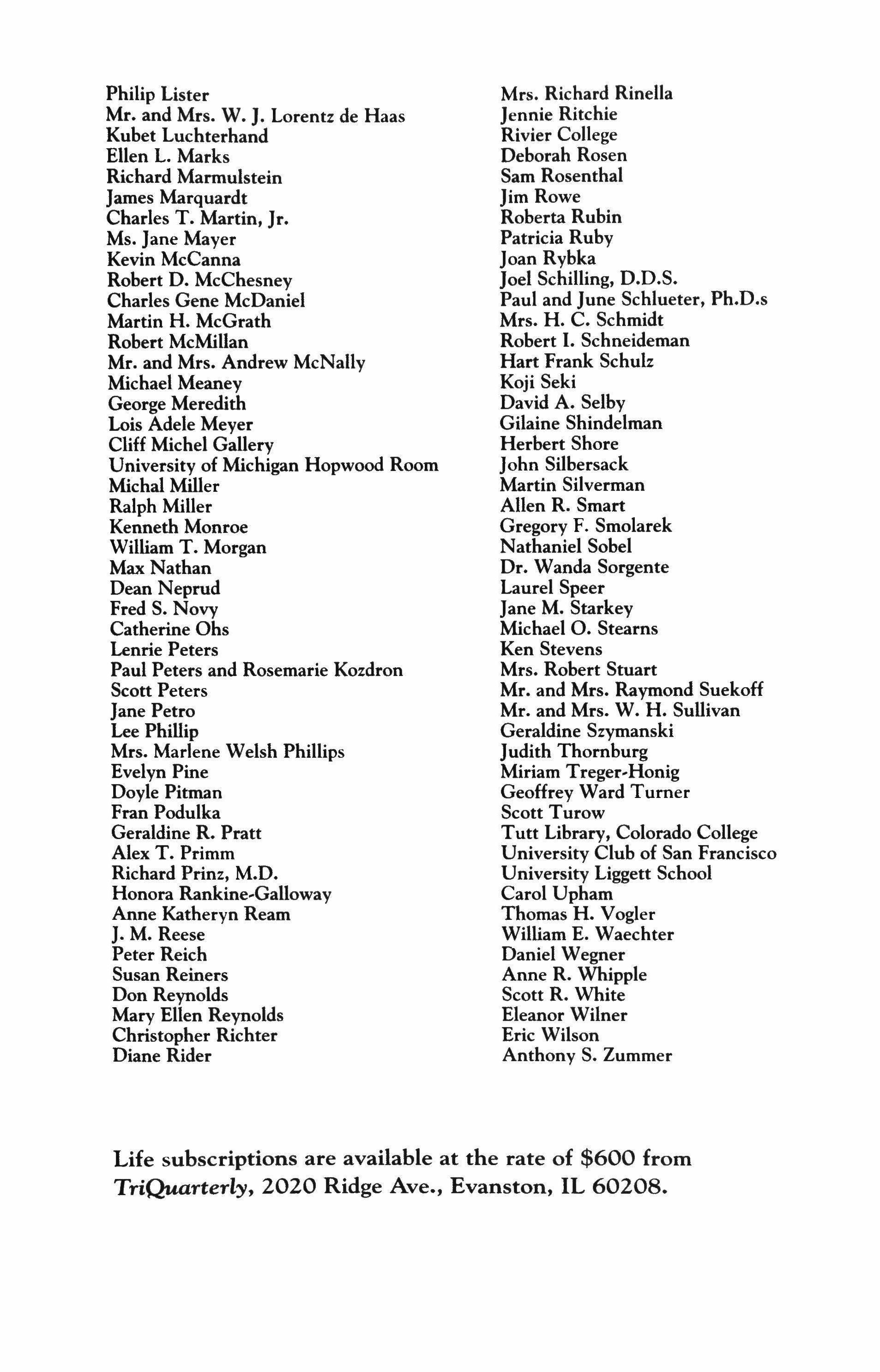
Mrs. Richard Rinella
Jennie Ritchie
Rivier College
Deborah Rosen
Sam Rosenthal
Jim Rowe
Roberta Rubin
Patricia Ruby
Joan Rybka
Joel Schilling, D.D.S.
Paul and June Schlueter, Ph.D.»
Mrs. H. C. Schmidt
Robert I. Schneideman
Hart Frank Schulz
Koji Seki
David A. Selby
Gilaine Shindelman
Herbert Shore
John Silbersack
Martin Silverman
Allen R. Smart
Gregory F. Smolarek
Nathaniel Sobel
Dr. Wanda Sorgente
Laurel Speer
Jane M. Starkey
Michael O. Stearns
Ken Stevens
Mrs. Robert Stuart
Mr. and Mrs. Raymond Suekoff
Mr. and Mrs. W. H. Sullivan
Geraldine Szymanski
Judith Thornburg
Miriam Treger-Honig
Geoffrey Ward Turner
Scott Turow
Tutt Library, Colorado College
University Club of San Francisco
University Liggett School
Carol Upham
Thomas H. Vogler
William E. Waechter
Daniel Wegner
Anne R. Whipple
Scott R. White
Eleanor Wilner
Eric Wilson
Anthony S. Zummer
Life subscriptions are available at the rate of $600 from TriQuarterly, 2020 Ridge Ave., Evanston, IL 60208.
"Tolstoy's
American Mailbag"
an article by Robert Whittaker with unpublished letters by leo Tolstoy
Philip levine talks with Harry Thomas's students, plus new poems
"Blizzard into Text: Contemporary Cross-Gendered Verse," an essay by Alan Michael Parker and Mark Willhardt with poems by Carl Phillips, linda Gregg, Michael Heffernan, Diana Hume George, Cynthia Macdonald, Maxine Kumin, Joyce Carol Oates, Campbell McGrath, David Ferry, Alice Fulton, Agha
Shahid Ali, Alec Marsh, Alicia Ostriker, Jacqueline Osherow
Robert Hass
John Barth
Sharon Olds
Elise Paschen
Edward Kleinschmidt
Billy Collins
Katherine Min lynn Marie
Jason Brown
Catherine Bowman
David Breskin
Richard Chess
David Zivan
Ann Townsend
Alan Michael Parker
Joyce Carol Oates
David Wojahn
Stephen Dixon
Frida Kahlo

Robert von Hallberg on Translation
64> 3 I o 74470 79069
TriQuarterly





















































































 Philip Levine
Philip Levine




































































 Michael Heffernan
Michael Heffernan



 Cynthia Macdonald
Cynthia Macdonald



















 for
for






 Jacqueline Osherow
Jacqueline Osherow








































































































